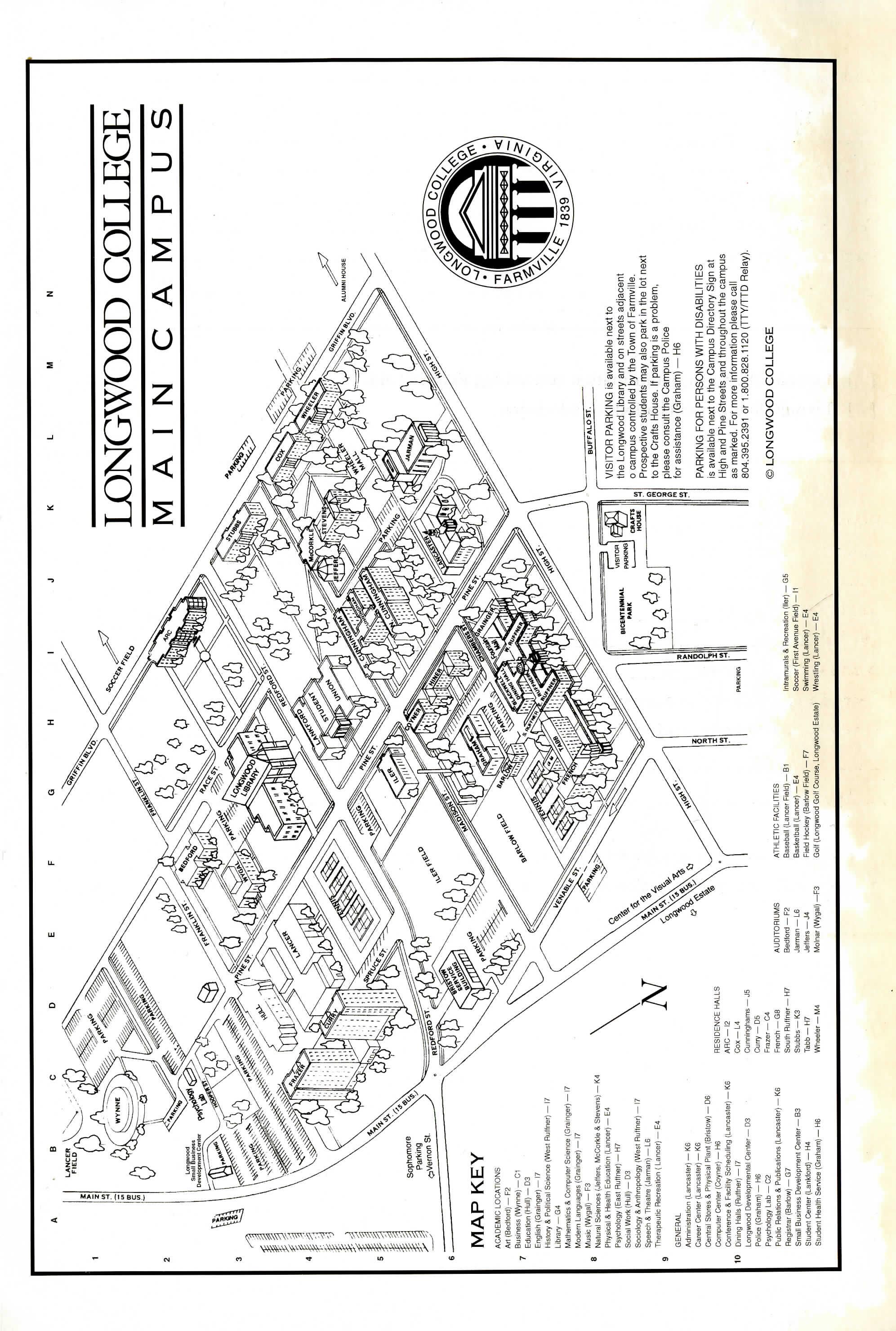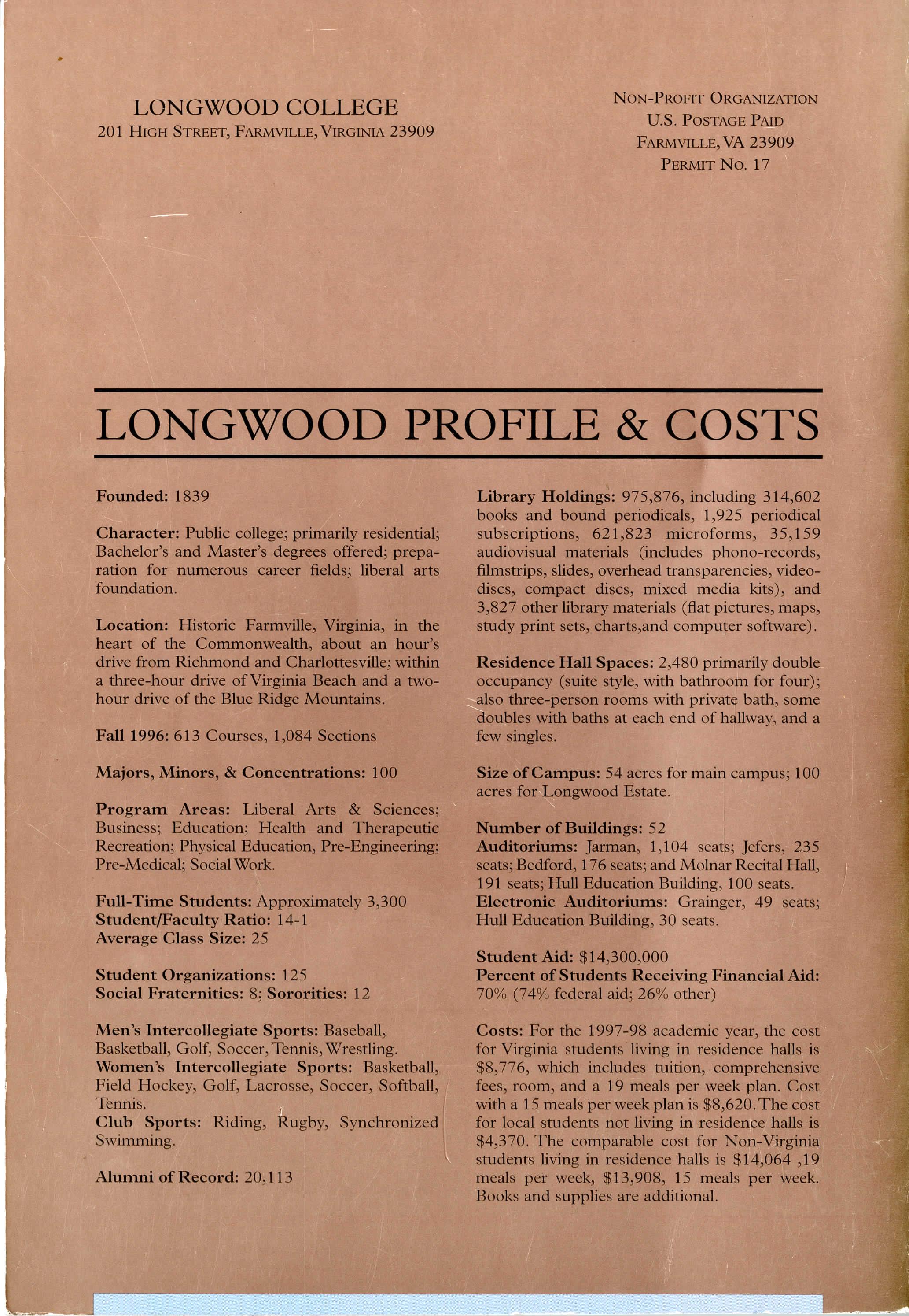




This catalog describes academic course numbers, descriptions, and standards for student progress and retention at the time of publication. However, the provisions of this publication are not to be regarded as an irrevocable contract between the student and Longwood College . There are established procedures for making changes which protect the institution's right to make changes deemed appropriate. A change of curriculum or graduation requirement is not made retroactive unless the alteration is to the student's advantage and can be accommodated within the span of years normally required for graduation .
Longwood College reserves the right to require a series of student proficiency assessment tests prior to graduation. The purpose of these assessment tests is (a) to help individual students develop to their fullest potential and (b) to improve the educational programs of the College. Students are required to participate; students who fail to participate may lose their priority ranking for registration and housing. The College may withhold transcripts for three months for graduating seniors who fail to participate.
Longwood College Undergraduate Bulletin, August, 1997. Announcements 1997-98. In effect until August 1, 1998. Longwood College is accredited by Commission on Colleges of the Southern Association of Colleges and Schools to award bachelor's and master's degrees, National Council for Accreditation of Teacher Education, Virginia State Board of Education, National Association of Schools of Music; undergraduate Social Work Program accredited by the Council on Social Work Education; undergraduate Therapeutic Recreation Program accredited by the National Recreation and Park Association in cooperation with the American Association for Leisure and Recreation
Longwood adheres to the principle of equal opportunity without ' regard to race, sex, creed, color, disability, national origin, age, or religion. This policy extends to all programs and activities supported by the College and to all employment opportunities at the College. Anyone with questions concerning ·access or accommodations should contact Disability Support Services at 804-395-2391 (v?; 800-828-1120 (TT Relay).
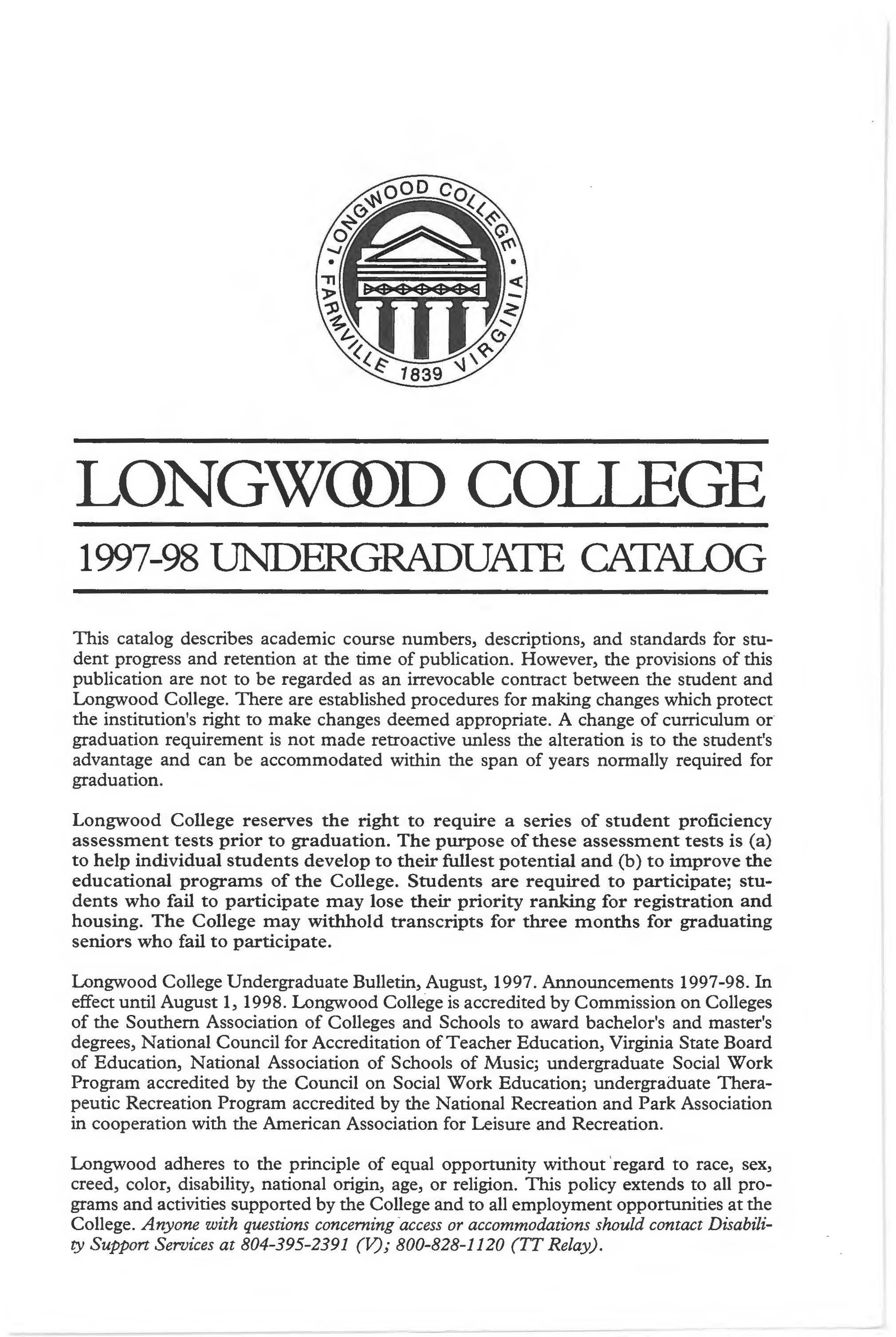

201 High Street, Farmville, Virginia 23909
Dear Friends:
"Legendary service" is a term you most often hear when someone describes a first-class resort, a magnificent cruise ship, or a very special meal at an elegant restaurant. At Longwood, it is defined as the commitment that faculty, staff, and administration have to our students.
Legendary service manifests itself from the moment you inquire about the possibility of attending Longwood to your initial introduction to this beautiful campus, and extends to your experiences in the classroom, the residence halls, the business office, the basketball court, the dining hall, the library, and to every office on campus.
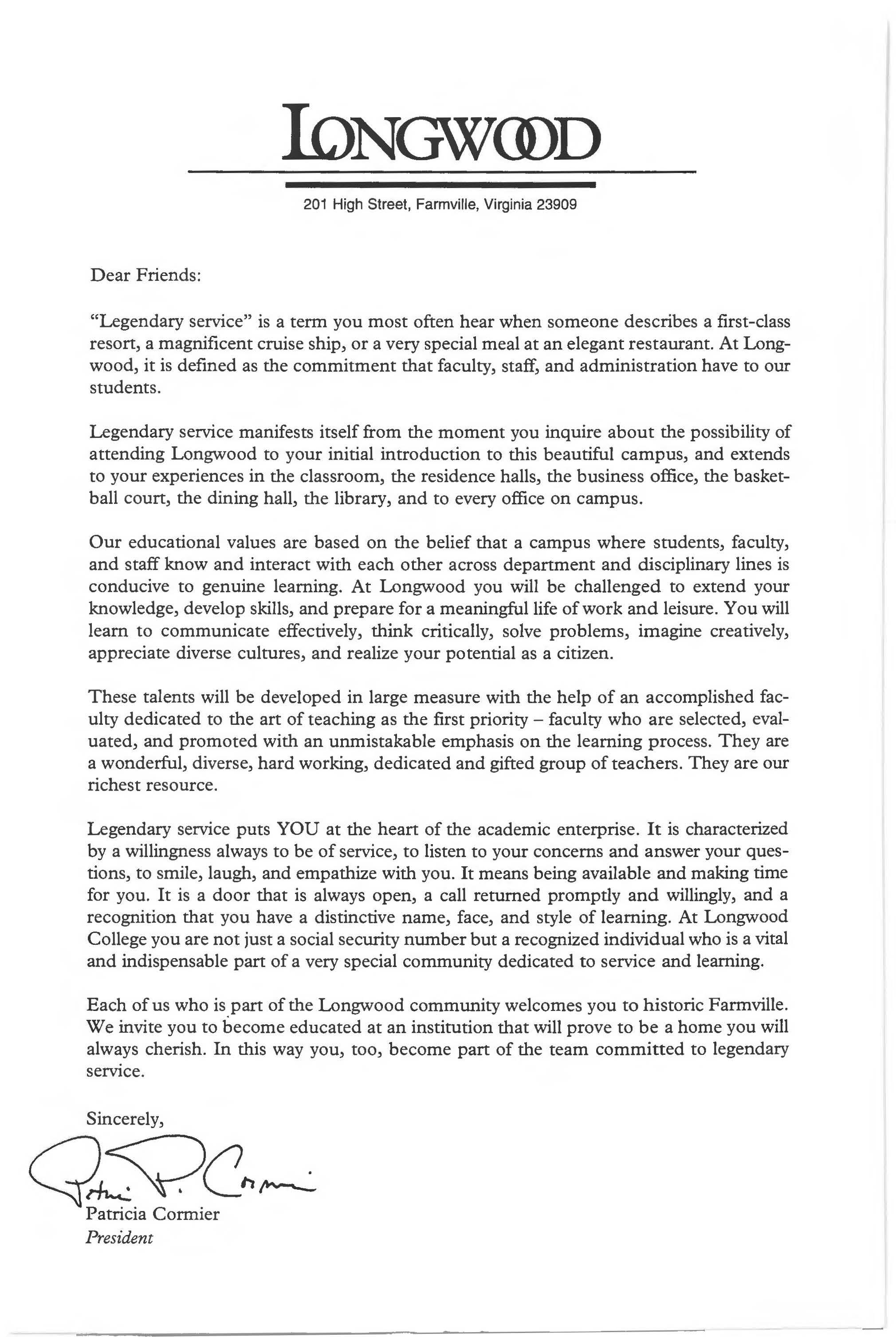
Our educational values are based on the belief that a campus where students, faculty, and staff know and interact with each other across department and disciplinary lines is conducive to genuine learning. At Longwood you will be challenged to extend your knowledge, develop skills, and prepare for a meaningful life of work and leisure. You will learn to communicate effectively, think critically, solve problems, imagine creatively, appreciate diverse cultures, and realize your potential as a citizen.
These talents will be developed in large measure with the help of an accomplished faculty dedicated to the art of teaching as the first priority faculty who are selected, evaluated, and promoted with an unmistakable emphasis on the learning process. They are a wonderful, diverse, hard working, dedicated and gifted group of teachers. They are our richest resource.
Legendary service puts YOU at the heart of the academic enterprise. It is characterized by a willingness always to be of service, to listen to your concerns and answer your questions, to smile, laugh, and empathize with you. It means being available and making time for you. It is a door that is always open, a call returned promptly and willingly, and a recognition that you have a distinctive name, face, and style of learning. At Longwood College you are not just a social security number but a recognized individual who is a vital and indispensable part of a very special community dedicated to service and learning.
Each of us who is part of the Longwood community welcomes you to historic Farmville. We invite you to become educated at an institution that will prove to be a home you will always cherish. In this way you, too, become part of the team committed to legendary service.
Sincerely,
Patricia Cormier President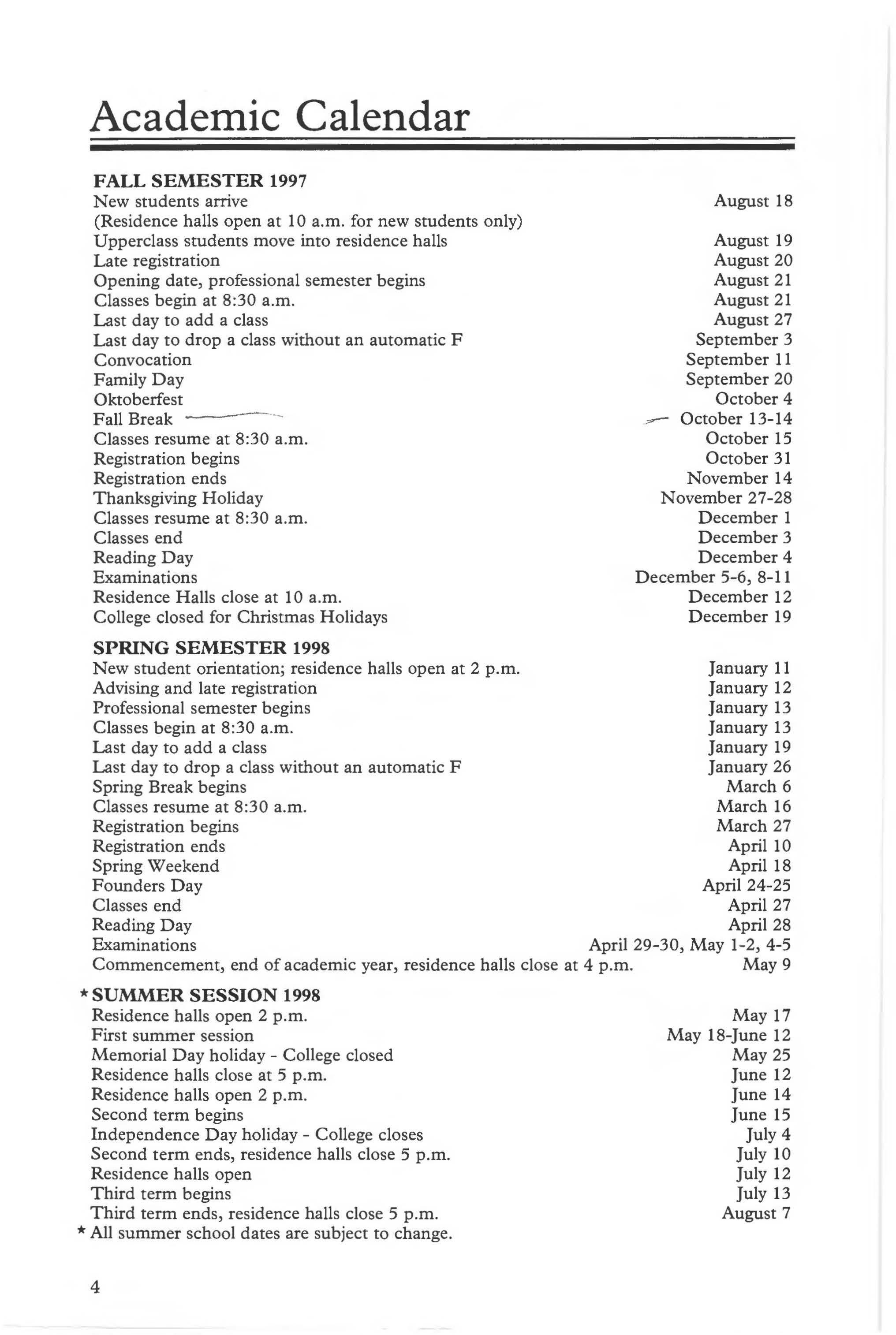
New students arrive
(Residence halls open at 10 a.m. for new students only)
Upperclass students move into residence halls
Late registration
Opening date, professional semester begins
Classes begin at 8:30 a.m. Last day to add a class Last day to drop a class without an automatic F Convocation Family Day
Oktoberfest
Fall Break
Classes resume at 8:30 a m.
Registration begins Registration ends
Thanksgiving Holiday Classes resume at 8:30 a.m. Classes end Reading Day Examinations
Residence Halls close at 10 a.m . College closed for Christmas Holidays
New student orientation; residence halls open at 2 p.m.
August 18 August 19 August 20 August 21 August 21 August 27 September 3 September 11 September 20 October 4 __- October 13-14 October 15 October 31 November 14 November 27-28 December 1 December 3 December 4 December 5-6, 8-11 December 12 December 19
January 11
Advising and late registration January 12
Professional semester begins January 13 Classes begin at 8:30 a.m. January 13 Last day to add a class January 19 Last day to drop a class without an automatic F January 26
Spring Break begins March 6 Classes resume at 8:30 a.m. March 16
Registration begins March 27 Registration ends April 10 Spring Weekend April 18
Founders Day April 24-25 Classes end April 27 Reading Day April 28 Examinations
April 29-30, May 1-2, 4-5
Commencement, end of academic year, residence halls close at 4 p.m. May 9
Residence halls open 2 p.m .
First summer session
Memorial Day holiday College closed
Residence halls close at 5 p m.
Residence halls open 2 p.m.
Second term begins
Independence Day holiday College closes
Second term ends, residence halls close 5 p.m.
Residence halls open
Third term begins
Third term ends, residence halls close 5 p m
* All summer school dates are subject to change.
May 17 May 18-June 12 May25 June 12 June 14 June 15 July 4 July 10 July 12 July 13 August 7
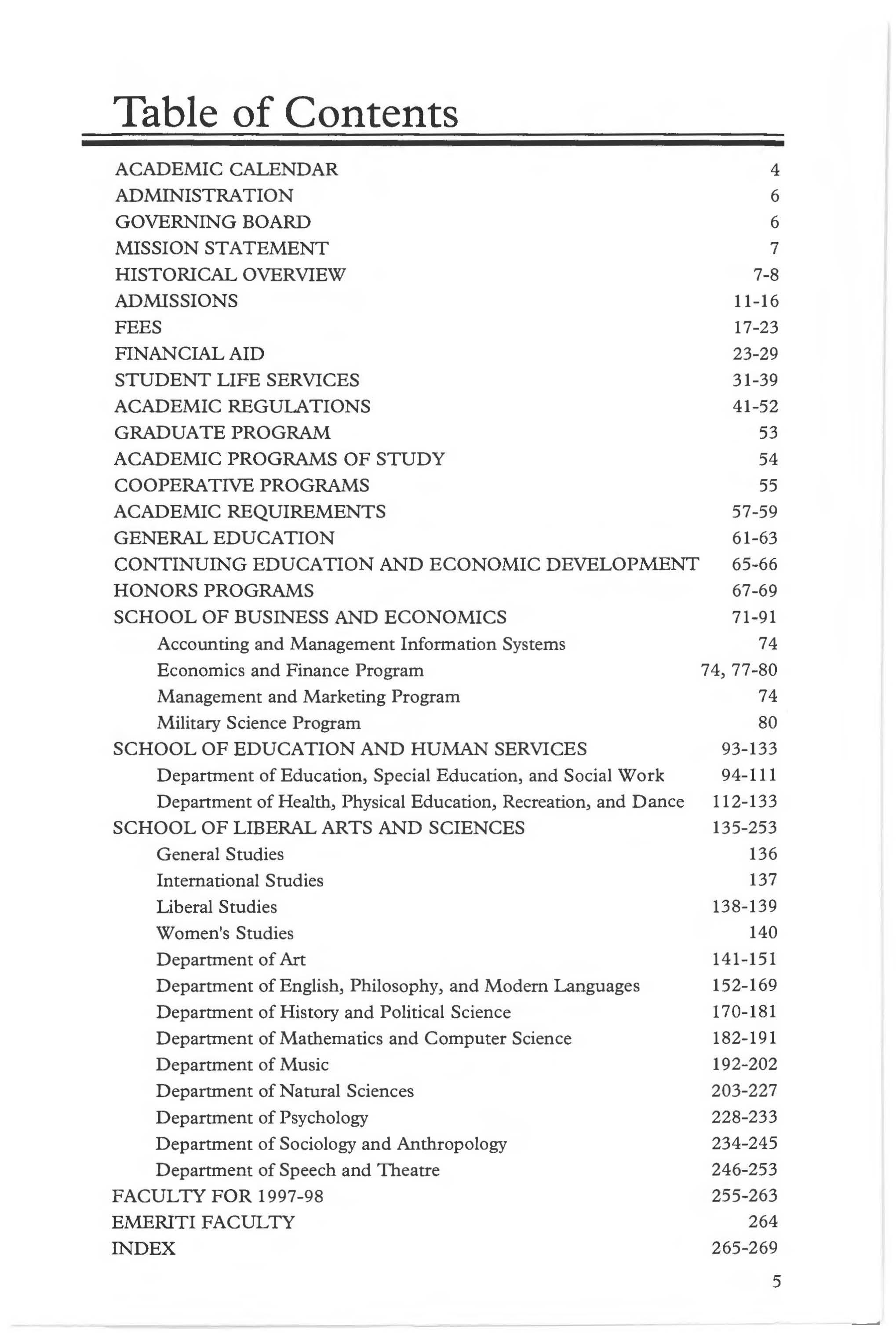
ADMINISTRATION
GOVERNING BOARD
MISSION STATEMENT
HISTORICAL OVERVIEW
ADMISSIONS
FEES
FINANCIAL AID
STUDENT LIFE SERVICES
ACADEMIC REGULATIONS
GRADUATE PROGRAM
ACADEMIC PROGRAMS OF STUDY
COOPERATIVE PROGRAMS
ACADEMIC REQUIREMENTS
GENERAL EDUCATION
CONTINUING EDUCATION AND ECONOMIC DEVELOPMENT
HONORS PROGRAMS
SCHOOL OF BUSINESS AND ECONOMICS
Accounting and Management Information Systems
Economics and Finance Program
Management and Marketing Program
Military Science Program
SCHOOL OF EDUCATION AND HUMAN SERVICES
Department of Education, Special Education, and Social Work
Department of Health, Physical Education, Recreation, and Dance
SCHOOL OF LIBERAL ARTS AND SCIENCES
General Studies International Studies Liberal Studies Women's Studies
Department of Art Department of English, Philosophy, and Modern Languages
Department of History and Political Science
Department of Mathematics and Computer Science
Department of Music
Department of Natural Sciences
Department of Psychology
Department of Sociology and Anthropology
Department of Speech and Theatre
FACULTY FOR 1997-98
EMERITI FACULTY
4 6 6 7 7-8 11-16 17-23 23-29 31-39 41-52 53 54 55 57-59 61-63 65-66 67-69 71-91 74 74, 77-80 74 80 93-133 94-111 112-133 135-253 136 137 138-139 140 141-151 152-169 170-181 182-191 192-202 203-227 228-233 234-245 246-253 255-263 264 265-269
MRS. ALICE C. STALLARD, Rector Civic Leader, Midlothian, VA
MRS. VIRGINIA A. RUSSELL, Vice Rector Educator, Richmond, VA
MRS. DOLORES G. ANDERSON, Secretary Director, Elementary Education and Personnel, Fluvanna County Public Schools, Palmyra, VA
MR. CARROLL P. FREEMAN, Member-at-Large Attorney, Freeman, Dunn, and Sweeney, Lynchburg, VA
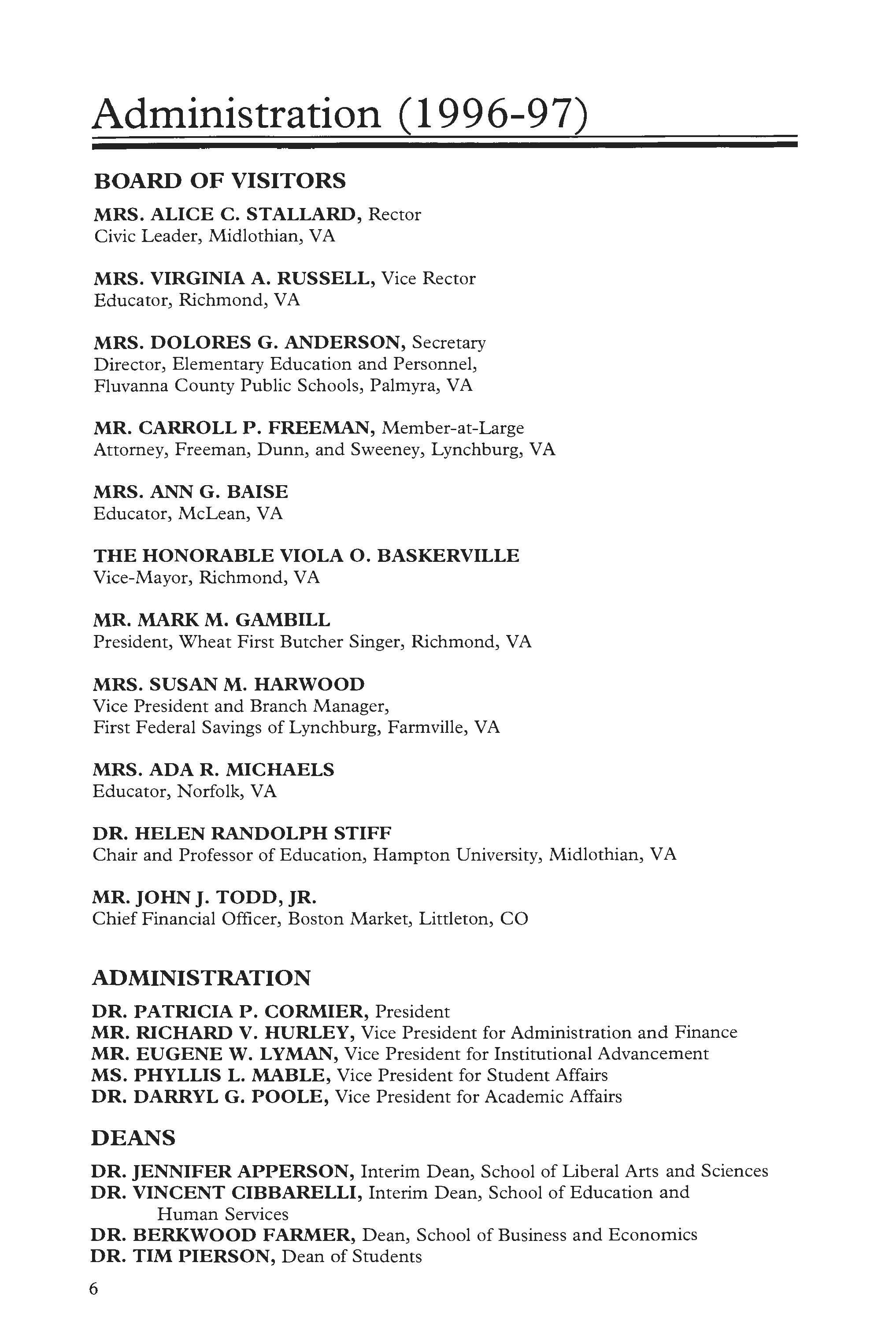
MRS. ANN G. BAISE Educator, McLean, VA
THE HONORABLE VIOLA 0. BASKERVILLE Vice-Mayor, Richmond, VA
MR. MARK M. GAMBILL President, Wheat First Butcher Singer, Richmond, VA
MRS. SUSAN M. HARWOOD Vice President and Branch Manager, First Federal Savings of Lynchburg, Farmville, VA
MRS. ADA R. MICHAELS Educator, Norfolk, VA
DR. HELEN RANDOLPH STIFF Chair and Professor of Education, Hampton University, Midlothian, VA
MR. JOHN J. TODD, JR. Chief Financial Officer, Boston Market, Littleton, CO
DR. PATRICIA P. CORMIER, President
MR. RICHARD V. HURLEY, Vice President for Administration and Finance
MR. EUGENE W. LYMAN, Vice President for Institutional Advancement
MS. PHYLLIS L. MABLE, Vice President for Student Affairs
DR. DARRYL G. POOLE, Vice President for Academic Affairs
DR. JENNIFER APPERSON, Interim Dean, School of Liberal Arts and Sciences
DR. VINCENT CIBBARELLI, Interim Dean, School of Education and Human Services
DR. BERK.WOOD FARMER, Dean, School of Business and Economics
DR. TIM PIERSON, Dean of Students
Longwood College, founded in 1839, is a medium-size, state-assisted, coeducational, largely residential, comprehensive college offering programs leading to the bachelor's and master's degrees. Longwood offers courses both on the main campus and at educational sites in other locations. As a state-assisted institution of higher education, Longwood College is committed to the principles of equal opportunity and affirmative action.
The primary educational objective of Longwood College is to provide a baccalaureate and graduate degree curriculum distinguished by academic excellence Essential to the goal of academic excellence is a faculty committed to the highest standards of teaching and research and / or creative arts.
Longwood is oriented both to the liberal arts and to professional and pre-professional programs. Its strong commitment to the liberal arts is reflected in its General Education requirement for all students and in its sponsorship of degree programs in the humanities, fine arts, social sciences, natural sciences, and mathematics. In addition to its traditionally strong programs in health related sciences, pre-engineering, and teacher education, the College offers professional and pre-professional programs in such areas as business, social work, and therapeutic recreation. Longwood also maintains cooperative programs with other institutions of higher learning.
Longwood is dedicated to the total education of its students and seeks to provide an atmosphere supportive of individual development. Through the offices of the Vice President for Academic Affairs, the Vice President for Student Affairs, the Deans, and the Learning Center, Longwood is committed to the intellectual, social, personal, and career development of each student.
Longwood's strong commitment to public service and economic development primarily for the citizens of Southside Virginia is reflected in a wide variety of Continuing Education programs, the services of the Small Business Development Center, an extensive calendar of public lectures, concerts, art exhibits and performances, provision of campus facilities for use by community groups, and the encouragement of community service by faculty, staff, and students
Approved by the Board of Visitors, February 3, 1984 Amended by the Board of Visitors, April 19, 198 7, October 4, 1989
Revised 1991. Approved by the Board of Visitors, February 3, 1992.
The College is located in historic Farmville, Virginia sixty-five miles west of Richmond and Petersburg, forty-eight miles east of Lynchburg, and sixty miles south of Charlottesville. U.S Highways 15 and 460 intersect in town Commercial bus systems provide service to the town.
Farmville is a pleasant college town with a population of 6,500; it is the business and education center of the area. Located in and near town are churches, hotels, motels, a country club, a municipal airport, and a community hospital. Hampden-Sydney College, a liberal arts college for men, is five miles south of the campus . Many points of interest are within a short distance of Farmville, including Appomattox Courthouse and Sailors Creek Battlefield.
Longwood College, a pioneer first in private and later in public education, is one of the oldest colleges in the United States. The College was founded on March 5, 1839, this being the date that the Farmville Female Seminary Association was incorporated by the General Assembly of Virginia
In the succeeding years the increasing prosperity of the Farmville Female Seminary led the stockholders to expand the seminary into a college, and the Farmville Female College was incorporated in 1860. On April 7, 1884, the State of Virginia acquired the
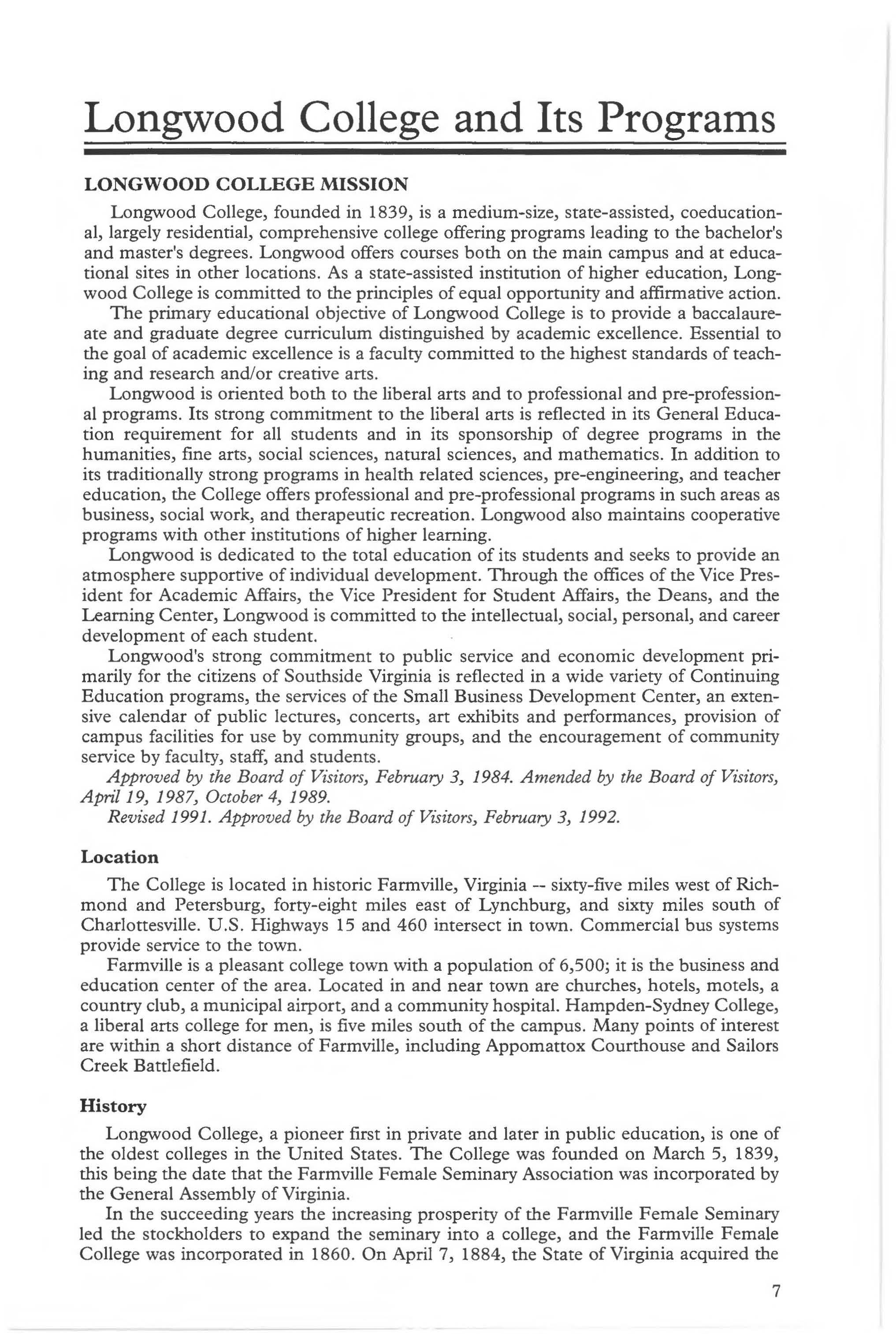
property of the Farmville Female College, and in October of the same year the Normal School opened with 110 students enrolled. This was the first state institution of higher learning for women in Virginia .
With the passage of the years, the Normal School expanded its curricula and progressed through a succession of names. It became the State Normal School for Women in 1914, the State Teachers College at Farmville in 1924, and Longwood College in 1949
The College was first authorized to offer four-year curricula leading to the degree of Bachelor of Science in Education in 1916. It was authorized to offer the degree of Bachelor of Arts in 1935, the degree of Bachelor of Science in 1938, curricula in business education the same year, courses leading to a degree in music education in 1949, and the degree of Bachelor of Science in Business Administration in 1976 In 1978, the College was authorized to offer the Bachelor of Fine Arts, and in 1981, the Bachelor of Music. In 1954, graduate programs were authorized. Longwood became fully coeducational in June 1976.
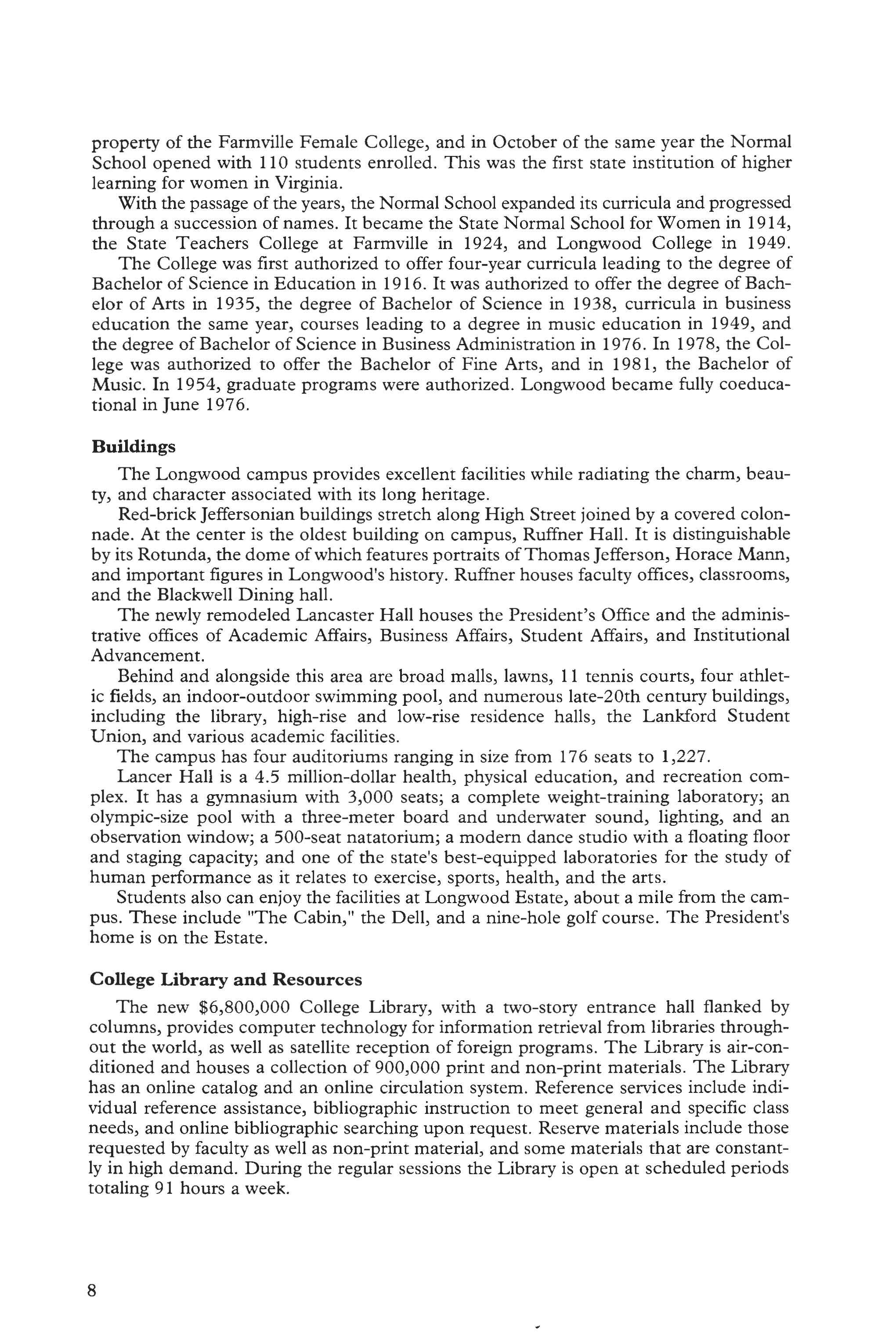
The Longwood campus provides excellent facilities while radiating the charm, beauty, and character associated with its long heritage.
Red-brick Jeffersonian buildings stretch along High Street joined by a covered colonnade. At the center is the oldest building on campus, Ruffner Hall. It is distinguishable by its Rotunda, the dome of which features portraits of Thomas Jefferson, Horace Mann, and important figures in Longwood's history. Ruffner houses faculty offices, classrooms, and the Blackwell Dining hall .
The newly remodeled Lancaster Hall houses the President's Office and the administrative offices of Academic Affairs, Business Affairs, Student Affairs, and Institutional Advancement.
Behind and alongside this area are broad malls, lawns, 11 tennis courts, four athletic fields, an indoor-outdoor swimming pool, and numerous late-20th century buildings , including the library, high-rise and low-rise residence halls, the Lankford Student Union, and various academic facilities.
The campus has four auditoriums ranging in size from 176 seats to 1,227.
Lancer Hall is a 4 5 million-dollar health, physical education, and recreation complex It has a gymnasium with 3,000 seats; a complete weight-training laboratory; an olympic-size pool with a three-meter board and underwater sound, lighting, and an observation window; a 500-seat natatorium; a modern dance studio with a floating floor and staging capacity; and one of the state's best-equipped laboratories for the study of human performance as it relates to exercise, sports, health, and the arts.
Students also can enjoy the facilities at Longwood Estate, about a mile from the campus. These include "The Cabin," the Dell, and a nine-hole golf course. The President's home is on the Estate.
The new $6,800,000 College Library, with a two-story entrance hall flanked by columns, provides computer technology for information retrieval from libraries throughout the world, as well as satellite reception of foreign programs The Library is air-conditioned and houses a collection of 900,000 print and non-print materials. The Library has an online catalog and an online circulation system. Reference services include individual reference assistance, bibliographic instruction to meet general and specific class needs, and online bibliographic searching upon request. Reserve materials include those requested by faculty as well as non-print material, and some materials that are constantly in high demand. During the regular sessions the Library is open at scheduled periods totaling 91 hours a week.
The college year consists of a regular session, including two semesters of 15 weeks each, and a summer session. The summer session for undergraduate students consists of three four-week terms. The graduate summer session consists of two four-week terms. The summer session makes it possible for an undergraduate student to complete a degree program in three calendar years as compared with the traditional four academic years generally required to complete such a program. Both undergraduate and graduate classes during the summer are scheduled for five days a week.
Longwood welcomes a variety of students to its summer sessions by offering basic courses and advanced courses in the majors in a wide variety of academic disciplines in the three four-week sessions as well as specialized instruction available through a broad range of workshop offerings.
Registration procedures for summer sessions are published in the summer brochure which is usually available on or about January 1 and which may be obtained by calling the Registrar's Office (804-395-2095).
Commencement exercises are normally held once a year, in May. Upon sufficient demand by students completing degree requirements in December, a December commencement may be held. Those students completing a degree program between commencements may receive their degrees in August or December and may participate in the following May or December commencement of their choice.
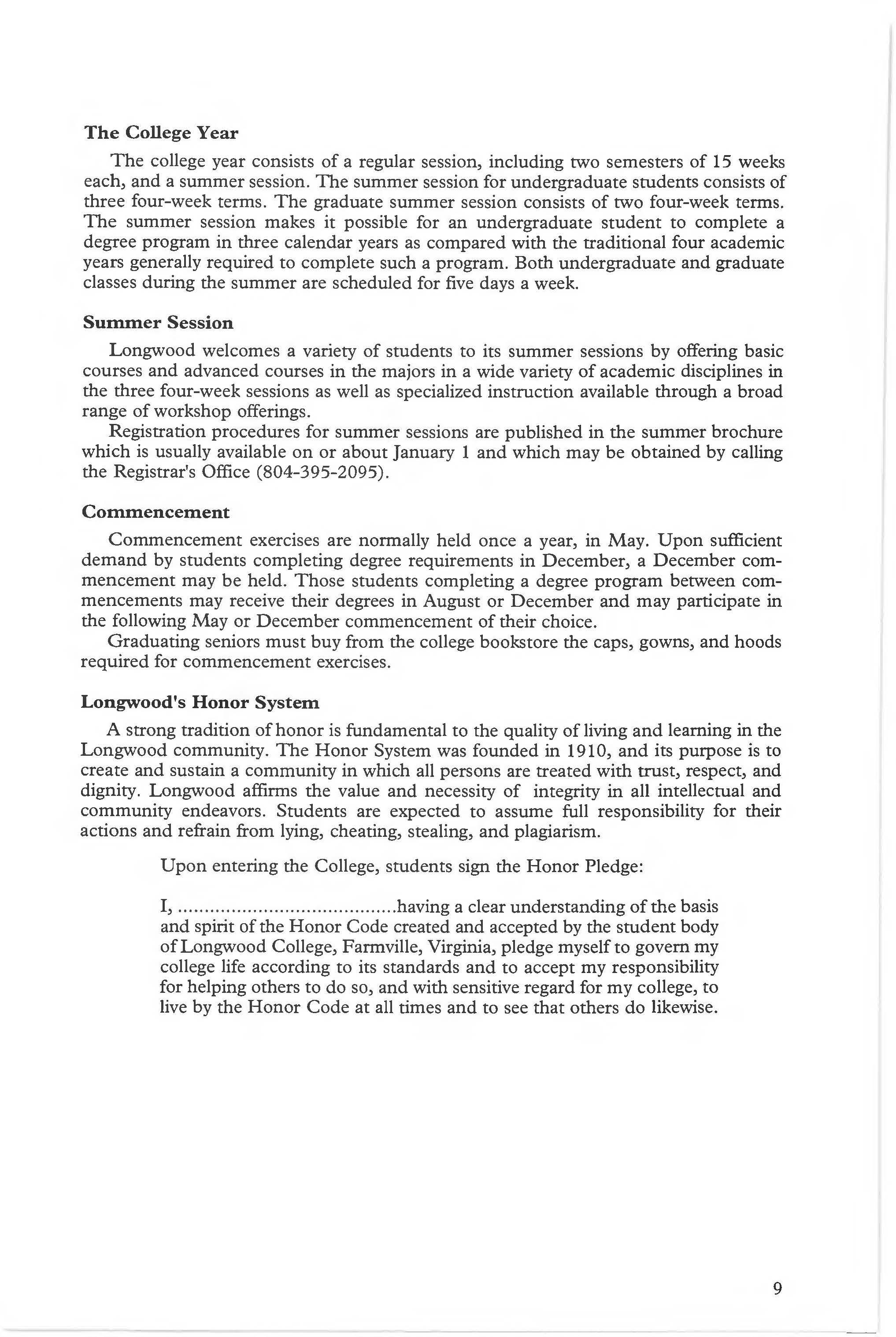
Graduating seniors must buy from the college bookstore the caps, gowns, and hoods required for commencement exercises.
A strong tradition of honor is fundamental to the quality of living and learning in the Longwood community. The Honor System was founded in 1910, and its purpose is to create and sustain a community in which all persons are treated with trust, respect, and dignity. Longwood affirms the value and necessity of integrity in all intellectual and community endeavors. Students are expected to assume full responsibility for their actions and refrain from lying, cheating, stealing, and plagiarism.
Upon entering the College, students sign the Honor Pledge:
I, ......................................... having a clear understanding of the basis and spirit of the Honor Code created and accepted by the student body of Longwood College, Farmville, Virginia, pledge myself to govern my college life according to its standards and to accept my responsibility for helping others to do so, and with sensitive regard for my college, to live by the Honor Code at all times and to see that others do likewise.
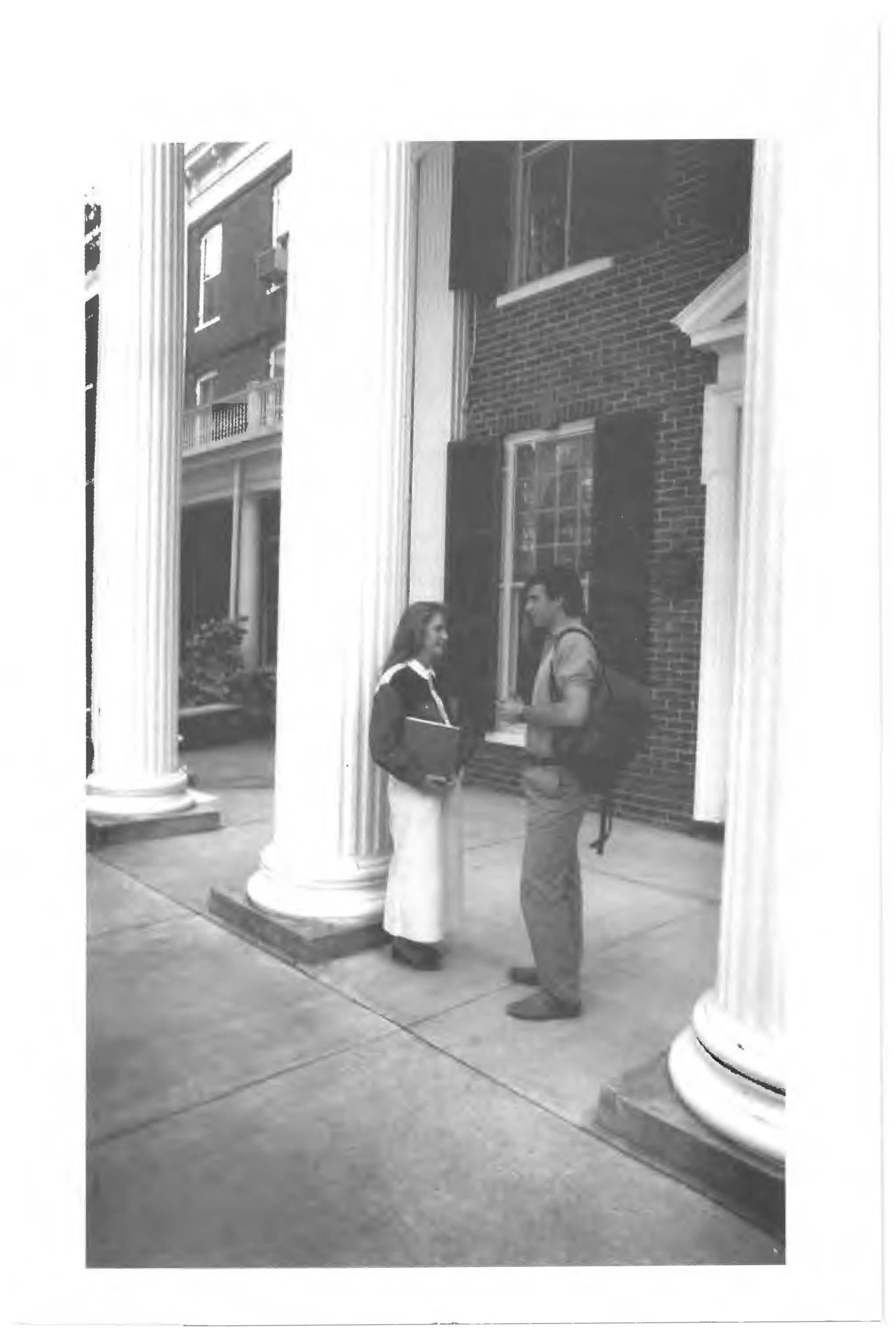
Longwood College accepts applicants for both fall, spring, and summer terms and is pledged to a non-discriminatory admissions policy. To facilitate easier and faster communication for information about the College you may contact Longwood on the Internet at lcadmit@longwood.lwc.edu and on the Web at www.lwc . edu.
1. Complete and return the Undergraduate Application for Admission . The application must be accompanied by a non-refundable application fee of $25.00, or by an official Fee Waiver Form of the College Entrance Examination Board which has been issued and signed by the student's counselor. Longwood College application forms may be obtained in most high school or community college counseling offices or by writing to the Office of Admissions, Longwood College, Farmville, VA, 23909-1898.
2 Request that the student's high school submit to the Director of Admissions an official transcript of high school records . Students who have attended other colleges or universities under dual enrollment programs must also request that the registrars of those institutions send official transcripts of their records.
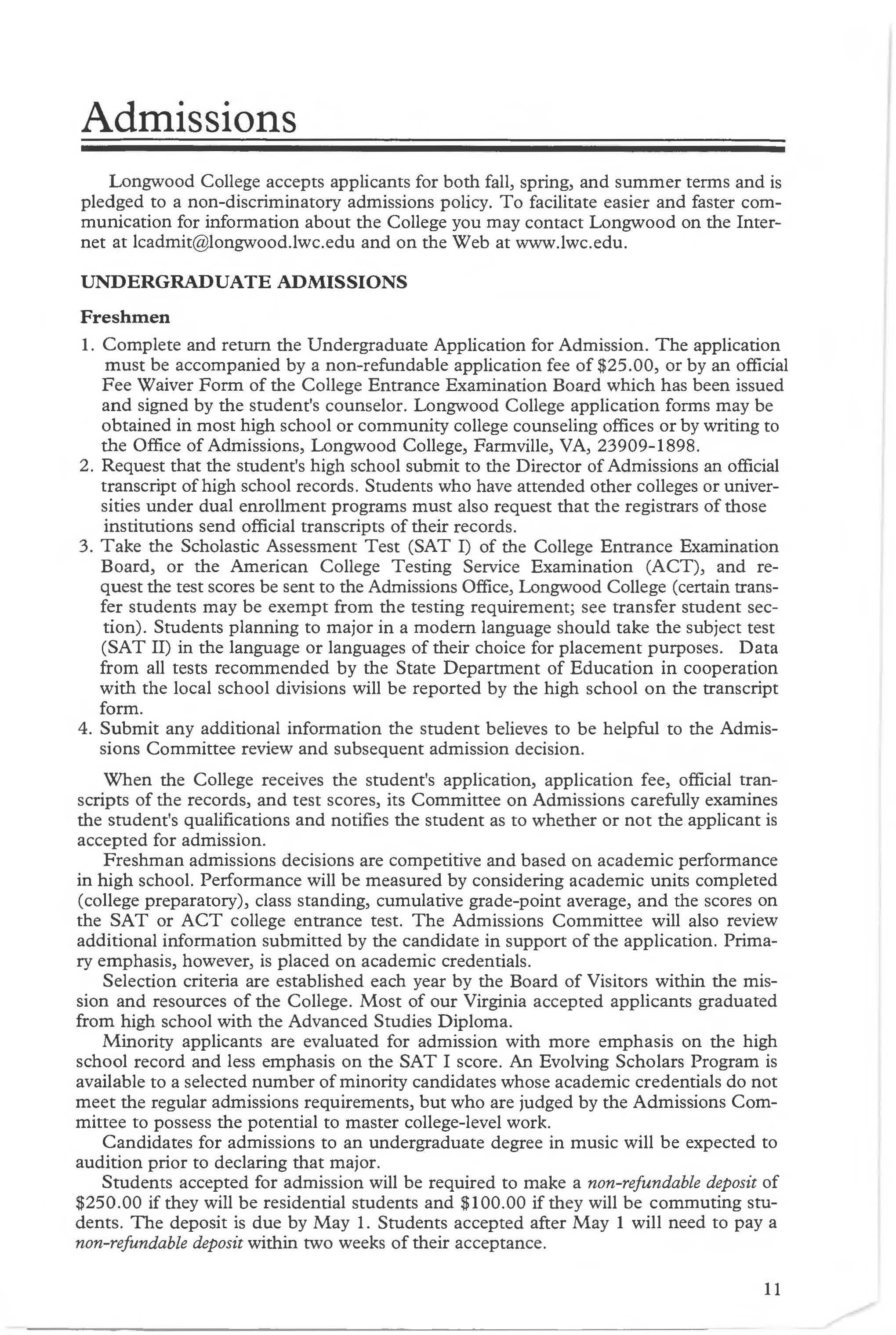
3. Take the Scholastic Assessment Test (SAT I) of the College Entrance Examination Board, or the American College Testing Service Examination (ACT), and request the test scores be sent to the Admissions Office, Longwood College (certain transfer students may be exempt from the testing requirement; see transfer student section). Students planning to major in a modern language should take the subject test (SAT II) in the language or languages of their choice for placement purposes. Data from all tests recommended by the State Department of Education in cooperation with the local school divisions will be reported by the high school on the transcript form.
4. Submit any additional information the student believes to be helpful to the Admissions Committee review and subsequent admission decision .
When the College receives the student's application, application fee, official transcripts of the records, and test scores, its Committee on Admissions carefully examines the student's qualifications and notifies the student as to whether or not the applicant is accepted for admission.
Freshman admissions decisions are competitive and based on academic performance in high school. Performance will be measured by considering academic units completed (college preparatory), class standing, cumulative grade-point average, and the scores on the SAT or ACT college entrance test. The Admissions Committee will also review additional information submitted by the candidate in support of the application. Primary emphasis, however, is placed on academic credentials.
Selection criteria are established each year by the Board of Visitors within the mission and resources of the College . Most of our Virginia accepted applicants graduated from high school with the Advanced Studies Diploma.
Minority applicants are evaluated for admission with more emphasis on the high school record and less emphasis on the SAT I score An Evolving Scholars Program is available to a selected number of minority candidates whose academic credentials do not meet the regular admissions requirements, but who are judged by the Admissions Committee to possess the potential to master college-level work.
Candidates for admissions to an undergraduate degree in music will be expected to audition prior to declaring that major.
Students accepted for admission will be required to make a non-refundable deposit of $250 00 if they will be residential students and $100.00 if they will be commuting students The deposit is due by May 1. Students accepted after May 1 will need to pay a non-refundable deposit within two weeks of their acceptance
Longwood College offers Early Action Admission to freshman applicants who possess above-average high school records, class standing, and SAT I or ACT scores. To be considered for Early Action, applications must be received by December 1 and successful candidates will be notified by early January. Students not selected for Early Action will automatically be considered for regular undergraduate admission.
High school juniors who have demonstrated high academic achievement in a college preparatory high school program may be considered for Early Admission. General application procedures and deadlines are the same as for seniors, with the following documentation additionally required: written endorsement from the Director of Guidance or Principal; a letter from the parents or guardian in support of the decision; and a statement from the applicant outlining the reasons why they wish to begin college after their junior year.
Transfer students should complete and return an application for admission, accompanied by a $25 non-refundable application fee. The student should request a final official high school transcript and official transcripts from each college attended to be sent directly to the Office of Admissions. It is important to indicate on the application form if an Associates Degree from a Virginia Community College will be received before transferring to Longwood.
Transfer students who transfer 45 or more semester hours in to Longwood must declare a major prior to admission to the college. Undeclared transfer students must declare a major upon completion of 45 credit hours (includes Longwood hours and transferred hours).
Students 25 years and older or whose life experiences (family, marital status, employment history, military service, etc.) indicate nontraditional consideration should complete an Adult Application for Admission and submit a statement of educational goals. Students who have attended other accredited post-secondary institutions must have official transcripts from each institution forwarded directly to the Admissions Office. Official high school transcripts or GED Certification must also be submitted. A personal interview with an admissions counselor is highly recommended and may be required.
Freshmen: Applicants for undergraduate degree programs should be graduates of an accredited high school, anticipating graduation from an accredited high school, or hold the GED Certificate with satisfactory scores. All students, whether high school graduates or GED holders, are expected to meet certain minimum unit requirements for admission. These minimum units include:
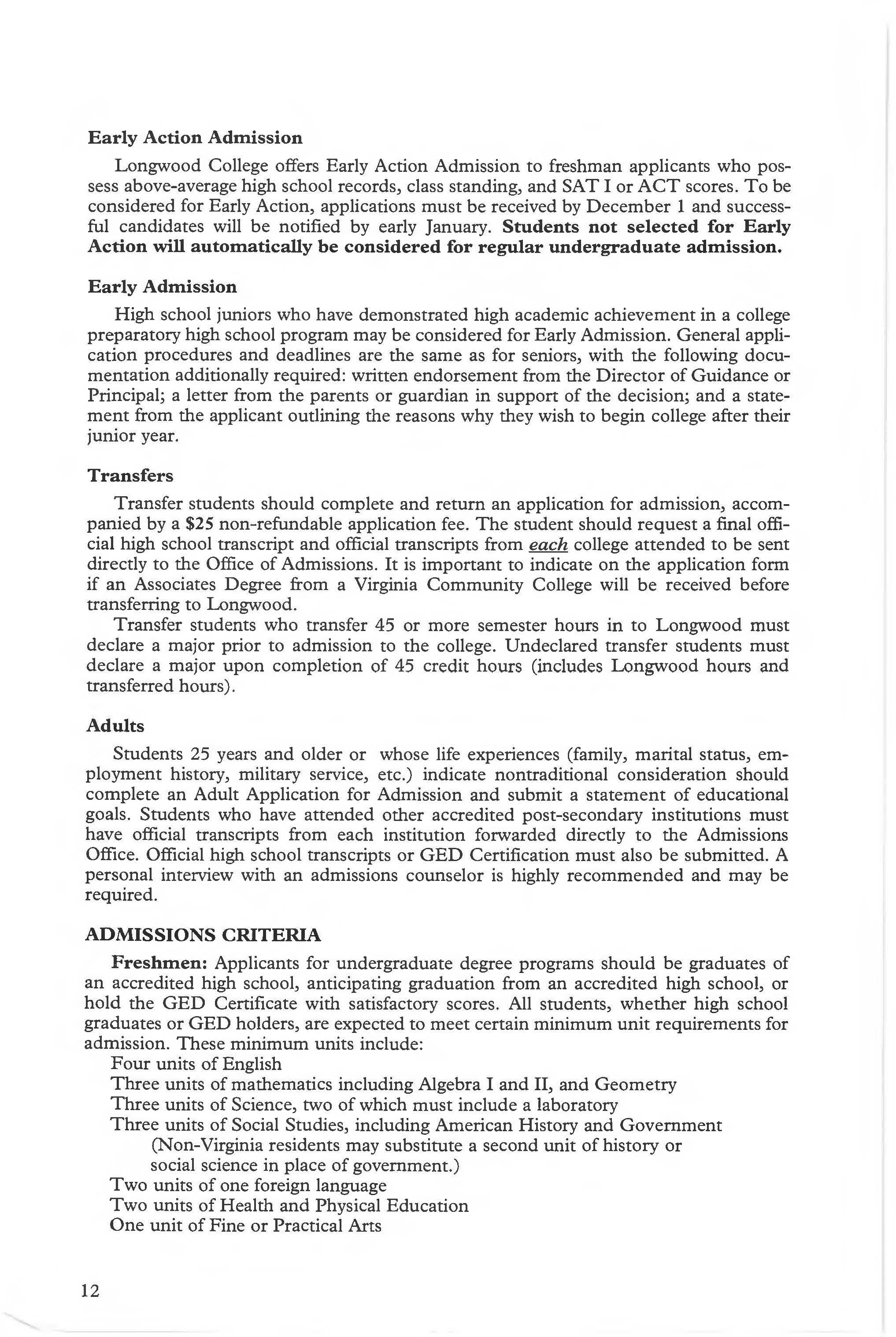
Four units of English
Three units of mathematics including Algebra I and II, and Geometry
Three units of Science, two of which must include a laboratory
Three units of Social Studies, including American History and Government (Non-Virginia residents may substitute a second unit of history or social science in place of government.)
Two units of one foreign language
Two units of Health and Physical Education
One unit of Fine or Practical Arts
The College highly recommends additional units in science, mathematics, social studies, fine arts, and foreign languages. An advanced studies curriculum js preferred.
Transfer Students: Applicants for advanced standing in undergraduate degree programs must present evidence of good standing at the last institution attended. A cumulative 2.2 GPA (on a 4.0 scale) for all hours attempted at all accredited colleges attended is expected to be considered for admission. Achievement of the minimum GPA does not imply automatic admission. Transfer applications are reviewed with primary emphasis on academic course work taken at the college-level. Students are expected to have completed successfully academic course work in four main academic areas: English, Mathematics, Science, and History/Social Science. Transfer applicants who will have earned fewer than 30 transferable semester hours in college-level subjects prior to enrollment at Longwood and who are under 22 years of age may also be evaluated on their high school academic performance and SAT scores.
Virginia community college students planning to transfer to Longwood should consult with their community college counselor and review the Longwood College Transfer Guide: Take The Next Step. Specific questions about transfer policies and practices should be addressed to the Office of Admissions or by calling that office at 804395-2060 or 800-281-4677. Copies of the Longwood College-VCCS Transfer Guide are available upon request. The Guide is also available on the Internet under the Longwood Gopher.
Nontraditional Students: Adult applicants who do not meet the standard requirements of minimum academic units and/or SAT scores may be accepted provisionally. A conditional acceptance would require the successful completion of three general education or major requirement courses with a grade of "C" or better. A student deficient in a major subject area, such as, Mathematics, English, or Science, may be required to complete specific courses at a community college before entering Longwood.
International Students: The College welcomes applications from prospective international students. In addition to the program of study and SAT I requirements, the international student must also demonstrate proficiency in the English language through the TOEFL (Test of English as a Foreign Language). A minimum score of 550 is needed for admission. In certain cases, SAT scores may exempt students from the TOEFL Exam. International students seeking admission to the College should request a copy of the International Student Guide.
International students should mail the International Student Application for Admission and high school records at least six months before planning to enroll. This will allow time for credential evaluation and unexpected delays in international mail. The Admissions Office requires an English translation for each transcript.
International students should pay particular attention to possible medical needs and be immunized for the following diseases: Measles (Rubeola), German Measles (Rubella), Mumps, Diphtheria, Tetanus, Polio, and have a Tuberculin Skin Test (ppd) within the past year. Medical insurance is mandatory. Should students have particular medication needs, they should write to the Longwood Student Health office to determine whether the medications can be obtained here. All international students and any dependent residing with them in the U.S. must obtain medical insurance which provides coverage for hospitalization expenses, medication evacuation, and repatriation expenses.
Students .mJ!fil certify sufficient financial resources in order to be issued visa to attend Longwood. A foreign national must provide an affidavit that shows that he/she has enough money to pay for four years at Longwood. The affidavit must be signed by the student, parent, and notarized by a bank official. Longwood does not provide financial aid for international students.
Cancellation of an Admissions Offer: Longwood's Honor Code prohibits lying, cheating, and stealing. Students who complete the Application for Admission pledge to
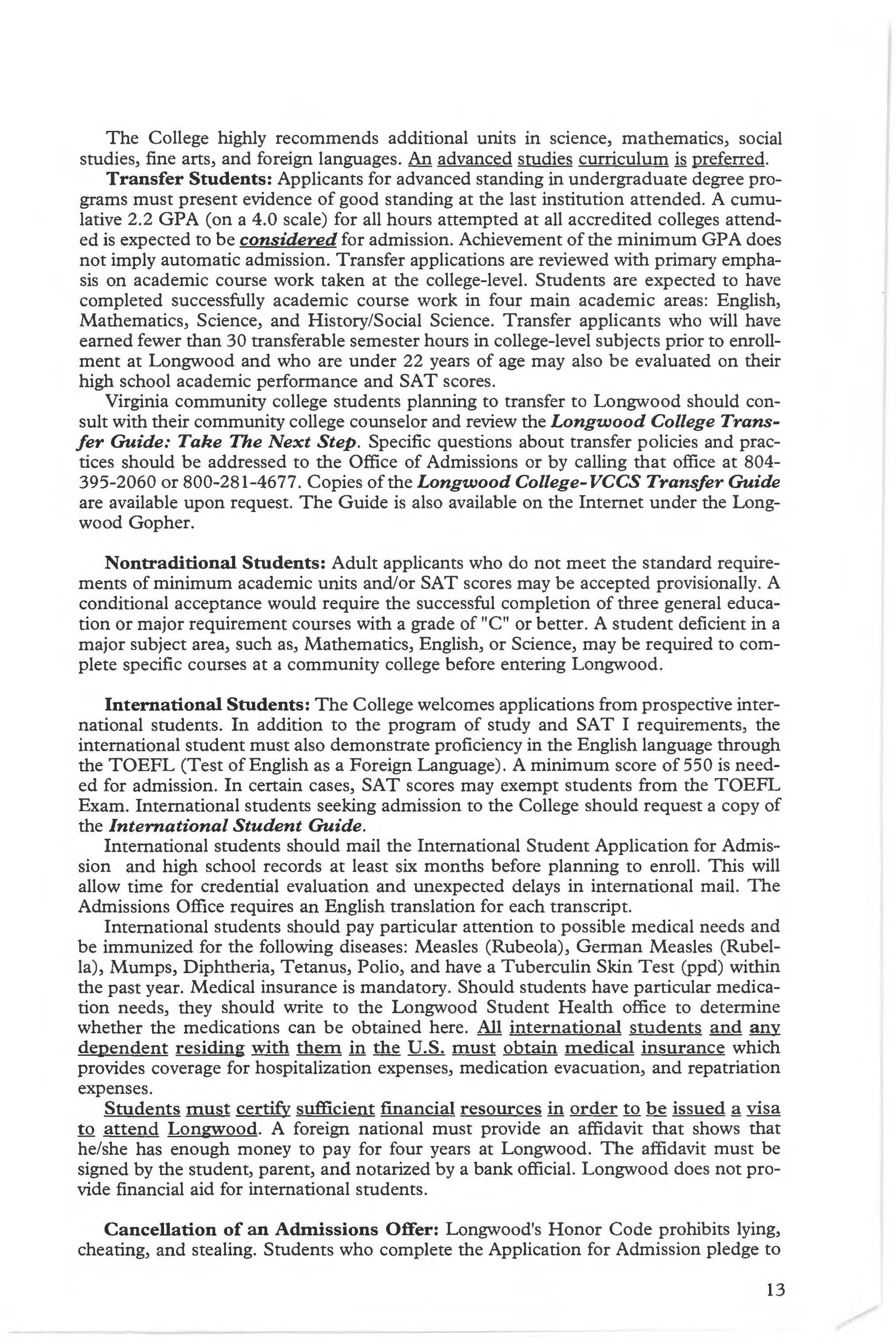
abide by The Honor Code. Should a student falsify the information provided on the application, alter academic documents, plagiarize the essay, or otherwise issue an untrue statement as part of the application process, the offer of admission will be revoked. The College also reserves the right to revoke an offer of admission should a student's academic performance fall below established minimums or should a student fail to meet written conditions stated in the admission letter prior to matriculation.
In accordance with Title V, Section 504 of the Rehabilitation Act of 1973, students with physical and/or learning disabilities will not be discriminated against on the basis of their disabilities.
Admission to Longwood College is based on the requirements outlined in the College Catalog. Admissions decisions are made without regard to disabilities. All applicants to the College are reviewed through the same admissions procedures. All students are expected to present academic credentials at or above the minimum standards for admission as established annually by the Admissions Committee. Students, with identified disabilities, eligible to take the SAT/ACT under accommodated conditions may submit those scores.
For applicants who choose to identify themselves in the admissions process, the Admissions Committee will review alternative measures for admissions criteria under the following conditions:
1. If a standard of admission interacts in a disproportionately adverse way with the applicant's documented disability, then a request by the applicant for a substitution in that criterion may be submitted.
2. The alternative measure must be a valid measure of the same skills, aptitudes, or areas of achievement as the admissions standards.
Applicants who wish to request accommodations in the admissions process; or who wish to request Admissions literature, the College Catalog, or an application in an alternate format should contact the Coordinator of Services for Individual with Disabilities at (804) 395-2391; TDDrrTY relay service: (800) 828-1120.
Once admitted, students seeking accommodations must notify the Coordinator of Services for Individuals with Disabilities. The Coordinator will determine what documentation must be provided in order to determine the most appropriate accommodations. In addition to reviewing the documentation, the Coordinator may request an interview between the student and a professional competent to evaluate the student's needs.
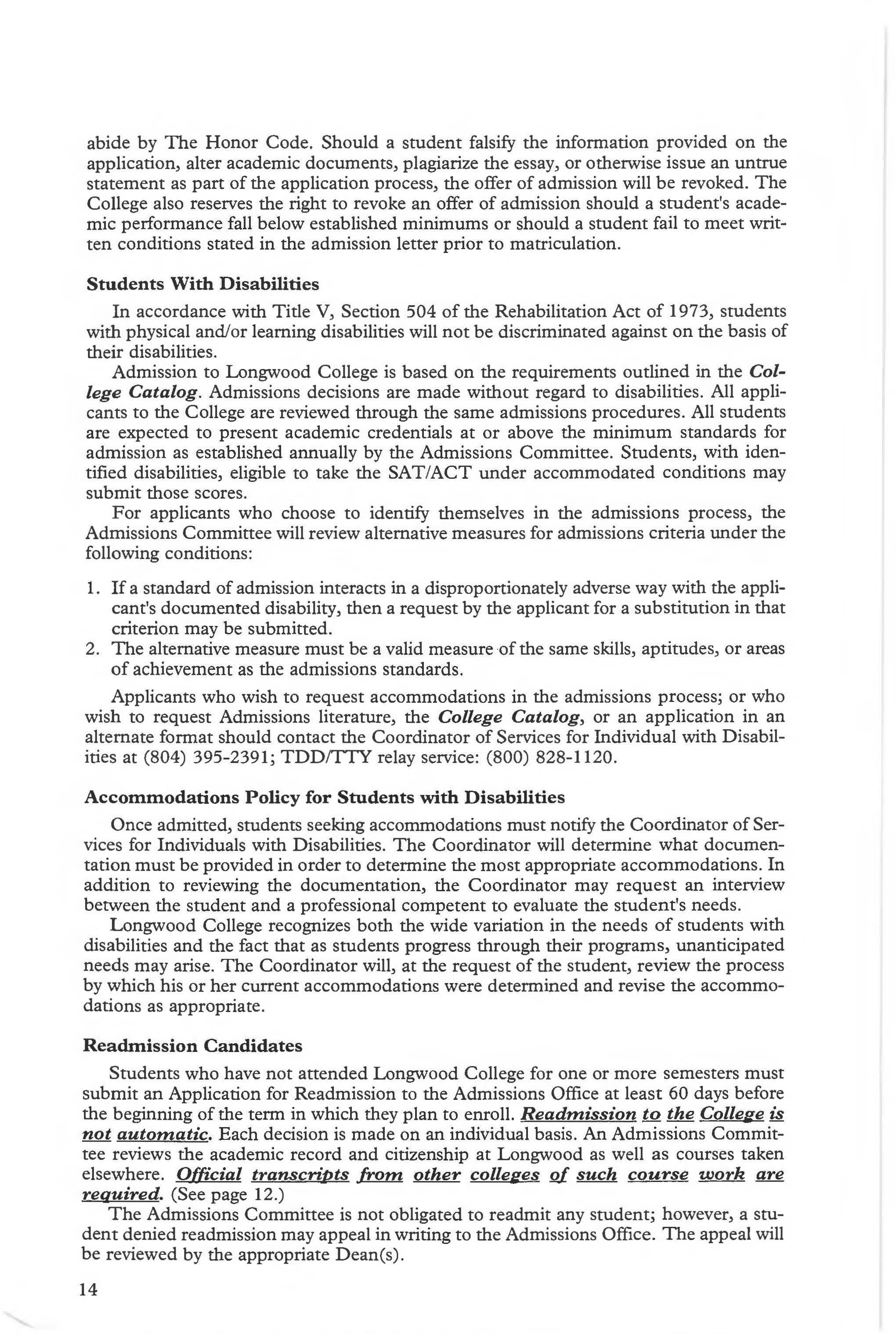
Longwood College recognizes both the wide variation in the needs of students with disabilities and the fact that as students progress through their programs, unanticipated needs may arise. The Coordinator will, at the request of the student, review the process by which his or her current accommodations were determined and revise the accommodations as appropriate
Students who have not attended Longwood College for one or more semesters must submit an Application for Readmission to the Admissions Office at least 60 days before the beginning of the term in which they plan to enroll. Readmission to the Colleee is not automatic. Each decision is made on an individual basis. An Admissions Committee reviews the academic record and citizenship at Longwood as well as courses taken elsewhere. Official transcripts frgm other colleees Qf such course work are required. (See page 12.)
The Admissions Committee is not obligated to readmit any student; however, a student denied readmission may appeal in writing to the Admissions Office. The appeal will be reviewed by the appropriate Dean(s).
Students eligible to be readmitted to the College may not, in some cases, be eligible to enroll in a particular major because their academic standing may be below the required minimum for the program.
Any student withdrawing during a semester or at the end of a semester who wishes to return at the next regular term must submit an Application for Readmission along with the $15.00 fee if applicable. Eligibility to return will be based on current academic standing at Longwood College.
Applications for readmission are available from the Office of Admissions in person, by mail, or by calling 804-395-2060.
Students not seeking a degree may be permitted to take courses for which they are qualified. (Advanced courses must have the instructor's approval.) Students who have been denied regular admission to an undergraduate program at Longwood may not register as special students without permission from the Director of Admissions and the Dean of the School of the student's intended major. Special students must maintain at least a "C" average in order to continue. A student in this category who wishes to carry a full-time load (12 credits or more) must have permission from the Registrar; such permission is generally limited to those students who are working toward a special certification or license and who have demonstrated their ability to do college-level work.
Special students may register for classes directly through the Registrar's Office. (Special packets are available approximately three weeks prior to the start of classes for each regular semester.) First-time special students must complete an information sheet and the Application for Virginia In-State Tuition Rates. Tuition and fee payments are due in full at the time of registration.
Special students are advised that credits earned as a special student are not necessarily applicable toward a Longwood degree program. After admission to the College, such credits as well as credits earned at other colleges or universities, will be evaluated as to applicability to the specific degree program in which the student wishes to enroll.
Special students are encouraged to apply for admission to the College before they complete 24 credit hours. Special permission is required from the Registrar in order to take more than 24 hours as a special student.
A student who has earned a baccalaureate degree from an accredited institution may complete the course requirements for teacher licensure in Virginia. These students may register as special students.
Information about required courses and procedures for application for licensure is available from the Chair of the Education Department, School of Education, 804/3952324
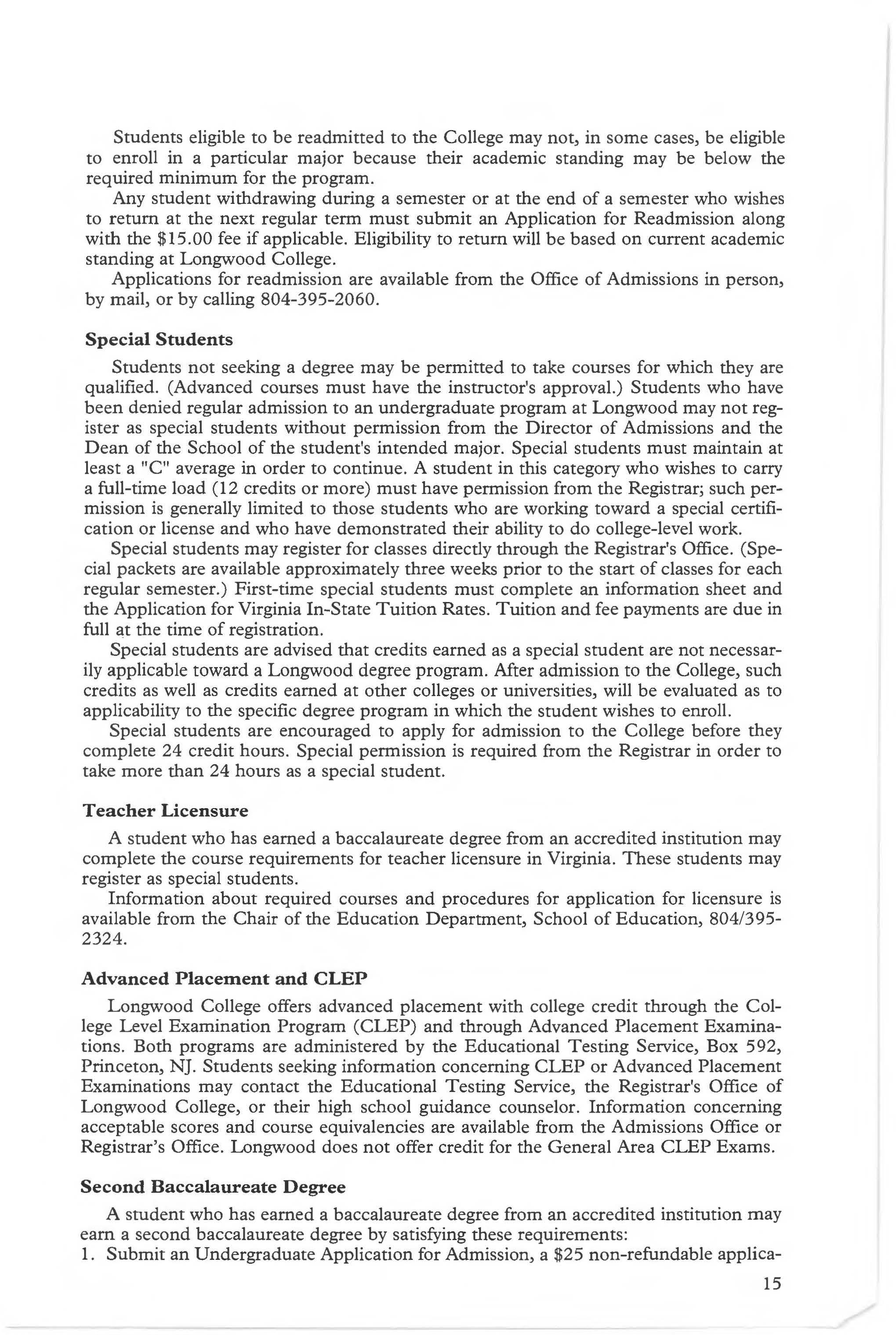
Longwood College offers advanced placement with college credit through the College Level Examination Program (CLEP) and through Advanced Placement Examinations. Both programs are administered by the Educational Testing Service, Box 592, Princeton, NJ. Students seeking information concerning CLEP or Advanced Placement Examinations may contact the Educational Testing Service, the Registrar's Office of Longwood College, or their high school guidance counselor. Information concerning acceptable scores and course equivalencies are available from the Admissions Office or Registrar's Office. Longwood does not offer credit for the General Area CLEP Exams.
A student who has earned a baccalaureate degree from an accredited institution may earn a second baccalaureate degree by satisfying these requirements: 1 . Submit an Undergraduate Application for Admission, a $25 non-refundable applica-
tion fee, and all official college transcripts directly to the Office of Admissions. The student must also submit a completed Application for Degree along with a $25 Degree Application fee directly to the Registrar's Office before the student will be admitted to the college. In order to complete the Application for Degree, the student must meet with the appropriate Department Chair to plan a course of study.
2. Complete, at Longwood, at least 30 additional semester hours in a course of study beyond that work applied toward the first degree.
3. Complete all major and degree requirements in the second degree program.
4. Maintain a minimum cumulative grade point average of 2.0 with a 2.0 or higher in the second major.
As part of the advising and registration process, all entering freshmen will take diagnostic/placement tests in writing and mathematics. Students earning above a predetermined score on the Scholastic Assessment Tests (SAT) may be exempted from the writing assessment.
The results of the assessments will be used by students and college advisors to guide first semester registration. Students scoring below specified minimums on these placement tests will be required to participate in developmental courses. Developmental courses are designed to insure that students are prepared to succeed in Longwood's rigorous curriculum.
At the end of their developmental course work, students will be tested to determine if they have reached an established competency level before advancing to English 100 or college mathematics courses. Students who fail to meet a prescribed standard within two attempts will not be retained at the institution. Students diagnosed as underprepared in reading may be restricted to courses which do not have intensive reading requirements. Normally students are expected to complete successfully all developmental work within the first two academic years.
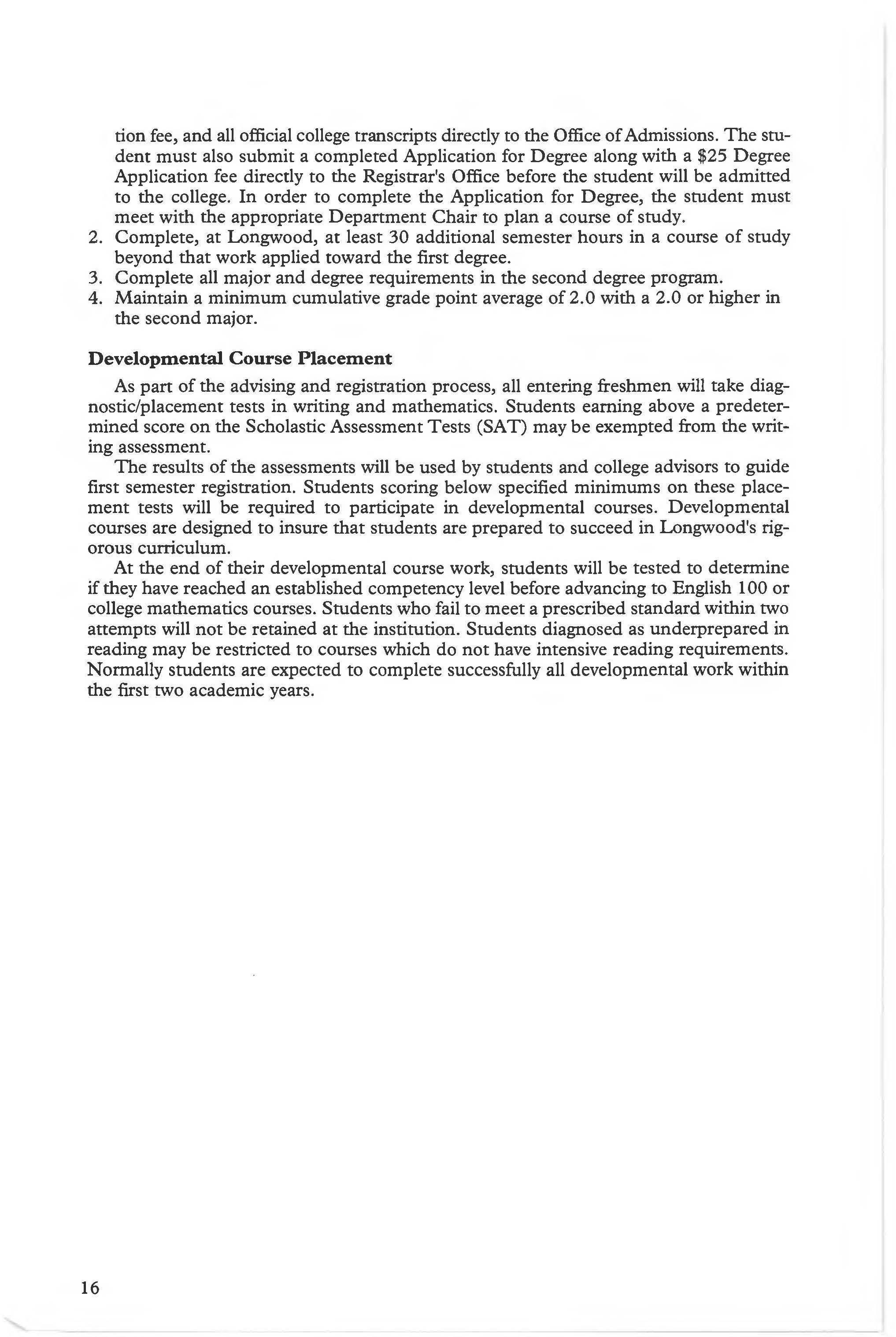
Fees and Expenses for Undergraduate Students Living in Residence Halls* Virginia Students
Tuition (all) $2,684 Comprehensive Fee** . . . . . . . . 1,612 Board**** 14 plus-meal plan ....... . 15-meal plan ........... . 19-meal plan ........... . Room Activity Fee
TOTALS
1,774 1,698 1,854 2,506 120 with 14-meal plan ..... ... $8,696 with 15-meal plan ........ $8,620 with 19-meal plan ........ $8,776
Non-Virginia Students $8,156 1,612 1,774 1,698 1,854 2,506 120 ........... .... ......... $14,168 $14,092 $14,248
Fees and Expenses for Undergraduate Students Not Living in Residence Halls Virginia Students

Tuition (all) $2,684 Comprehensive Fee** . . . . . . . . 1,612 Activity Fee. . . . . . . . . . . . . . . . 120 TOTALS ............... .. $4,416
Non-Virginia Students $8,156 . . . . . . . . . . . . . . . . . . . . . . . . 1,612 120
TOTALS $9,888
NOTE CHANGE IN POLICY: Due to the rising cost of credit card service charges, we will no longer accept credit cards for tuition and fees. Tuition financing can be handled through the Monthly Payment Plan.
The fees indicated are for the 1997-98 academic year and are subject to change by the Board of Visitors at any time.
*As a residential institution, Longwood College promotes student learning and personal development through both the curriculum and co-curriculum. The College implements a residence requirement and policy; this applies to students unless they live at home (with parents) in the Farmville area, are 23 years of age prior to the beginning of the fall semester, are married, have 100 credit hours prior to the beginning of fall semester, have eight semesters of campus residence, are eligible for the off-campus privilege (89 credit hours) implemented in the spring of each year for the following fall semester. Each one of these circumstances requires specific approval procedures through the Housing Office prior to an off-campus lease arrangement.
Part-time students are not permitted to live in the residence hall unless permission is given by the Vice President for Student Affairs in conjunction with the student's Academic Adviser. These part-time students will be charged full-time comprehensive and activity fees. An unauthorized part-time student living in the residence hall will be charged full-time tuition and fees
The residence hall requirement and policy applies to students unless they live at home, are 23 years of age prior to the beginning of fall semester, are married, have 100 credit hours prior to the beginning of fall semester, have eight semesters of campus residency, are eligible for the off-campus privilege (89 credit hours) which is implemented in the Spring of each year, and have some sort of unusual situation. Students who fit these categories should work with the Director of Housing before finalizing off-campus leases Information and forms must be complete before any approvals are authorized
**Includes charges for Athletics, Student Union, Student Health Service, and other services . These fees are charged to all full-time students, including interns and student
teachers.
***All students residing in campus residence halls must pay a damage/contingency deposit of $100 upon initial assignment to residence halls, excluding the summer term. Subsequently, if the deposit balance falls below $50 at any time, the student must restore the deposit to the $100 level. The assessment of individual and group damages may be made against the deposit.
In addition to individual student responsibility for damage to room accommodations (beyond normal wear), students will be liable for damages to common areas of their residence hall when individual responsibility cannot be determined and assigned. Responsibility for damage will be determined by the location of the damages and the nature of the circumstances surrounding the damage. Charges will be made against the damage deposit of each student living in the area.
The deposit balance will be refunded approximately three months after graduation from Longwood or withdrawal from the residence hall. The refunded amount will be net of any outstanding balance owed to the College for tuition and fees, course fees, parking fees or telecommunication charges. No deposit refunds will be processed for $10.00 or less .
****The Residence Hall Room and Board Agreement spells out the terms of the meal plans available. Students select meal plans in the agreement and are permitted to change their selected meal plan during specific periods of time as stated in the Residence Hall Room and Board Agreement.
Entitlement to classification as a Virginia student and the privilege of paying in-state tuition is determined at the time of admission from information submitted by the student on the state domiciliary form. This form is attached to the application for admission, readmission, or will be sent to the student for completion by the Office of Admissions. In-state classifications are determined pursuant to the Code of Virginia.

The College may initiate a reclassification inquiry at any time after the occurrence of events or change in facts which give rise to a reasonable doubt about the validity of existing residential classification.
Appeal of the initial classification or subsequent reclassification requests should be made to the Dean of Students Office. Information and appeal forms may be obtained from the Office of Admissions or the Dean of Students Office.
The college bills only full-time degree seeking students. Payment for all other students is expected at the time of registration.
Bills for Full-Time Degree Seeking Students.
First Semester: one-half of the annual charges, less any credits, will be billed on or about July 1, and are payable by August 1. Failure to receive fl bill does NOT waive reguirement for payment when due.
Second Semester: the remaining half of the charges, less any credits, will be billed on or about November 1, and are payable by December 1. Failure to receive fl bill does NOT waive reguirement for payment when due.
A late fee of$50 will be assessed if bills are not paid by the due date noted on the invoice.
Plan. The College offers a Monthly Payment Plan to full-time students as an option for paying tuition bills. The deadline to apply for the Monthly Payment Plan is June 2 for the fall semester and November 3 for the spring semester.
Enrollment for each semester is not complete until fees and other charges have been paid or arrangements to pay have been made to the satisfaction of the College.
No credit for college work will be given to any student for a diploma, a teacher's certificate, or for transfer purposes until all financial obligations to the College have been paid or secured to the satisfaction of the College. This will also prevent future registration and adding or dropping of classes.
All student accounts with an unpaid balance not secured by a payment plan, will be canceled as of 5 p.m. the fifth day of classes. To have classes reinstated, students must arrange with the Student Accounts Office to pay the unpaid balance and arrange with the Registrar's Office and professors to authorize reinstatement. All accounts with an outstanding balance as of 5 p.m. the fifth day of classes will be charged an additional $50 late fee.
The public is hereby placed upon notice that failure to pay in full at the time services are rendered or when billed will result in the imposition of interest at the rate of 10% per month on the unpaid balance. If the matter is referred for collection to an attorney or to a collection agency, the debtor will then be liable for attorney's fees or additional collection fees of 50% of the then unpaid balance. Returned checks will incur a handling fee of $25. Requesting or accepting services will be deemed to be acceptance of these terms.
The student is responsible for all charges assessed regardless of any arrangments or agreements made with other parties.
Students are responsible for the security of their authorization code, and will be liable for any charges made with their code. All students are required to pay telephone accounts within 30 days of the billing date. Failure to pay within 45 days of the billing date will result in a hold flag being placed on the student's record. This will prevent registration, adding or dropping of classes, and processing of transcripts. The student's authorization code will also be deactivated, preventing any additional long distance calls. Returned checks will incur a handling fee of $25. 00. If the matter is referred for collection to an attorney or to a collection agency, then the debtor will be liable for attorney's fees or additional collection fees of 50% of the then unpaid balance. Requesting or accepting services will be deemed to be acceptance of these terms.
A non-refundable application fee of $25.00 is required of all undergraduate students making their first application to Longwood College. For returning students, a nonrefundable $15.00 readmission fee will be invoiced by the Office of Cashiering and Student Accounts on or about February 15, and is payable on or about March 15.
A $100.00 student fee deposit is required of all commuter students to reserve their admission to Longwood College. A $250.00 student fee deposit is required of all residence hall students to reserve their admission to Longwood College.
Current students will be invoiced for the deposit on or about February 15, and it shall be payable on or about March 15. Failure to receive a bill does not waive requirement for payment when due.
New students will be invoiced for the deposit in the letter of admission from the Longwood College Admissions Office.
The deposit is refundable until June 1 in the case of current students, May 1 for new students admitted for the Fall semester and December 1 for the Spring semester. Requests for refunds must be made in writing to the Vice President for Student Affairs. Deposit payments made after May 1 (Fall) or December 1 (Spring) are non-refundable.
Official notification of withdrawal must be processed prior to any consideration for refund. This notification should, if at all possible, be made in person or in writing to the Academic Dean's Office of the student's major. Refunds will be based on the effective date of withdrawal. NOTE: Title IV (Federal) financial aid recipients see section entitled "Refund Policy for Title IV Federal Financial Aid Recipients."
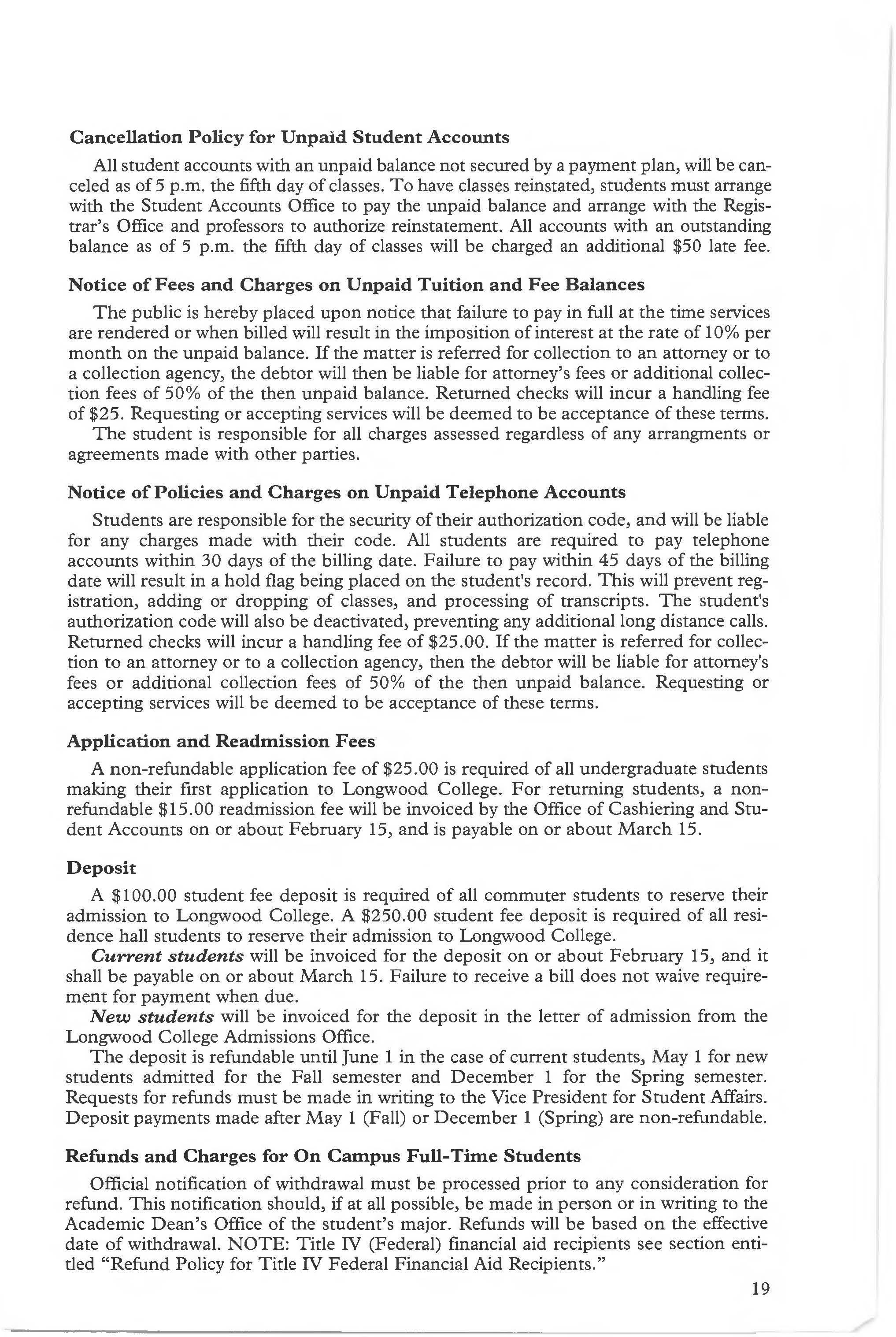
The following charges and refunds will be made to students withdrawing from college:
(a) A student withdrawing from the first 5 days of classes will be refunded I 00% of total charges less a $250.00 withdrawal fee.
(b) A student withdrawing during the first 25% of the academic period will be refunded 50% of total charges.
(c) A student withdrawing during the period from 26% to 50% of the academic period will be refunded 25 % of total charges.
Exceptions: In unusual circumstances, refunds beyond the above schedule may be recommended to the Assistant Vice President for Finance, by the Vice President for Student Affairs for students who leave the College "for reasons beyond the student's control," such as for a verified incapacitation, illness, injury, or military reservist called to active duty. Enforced withdrawals, such as disciplinary suspension, do not involve refunds beyond the above schedule .
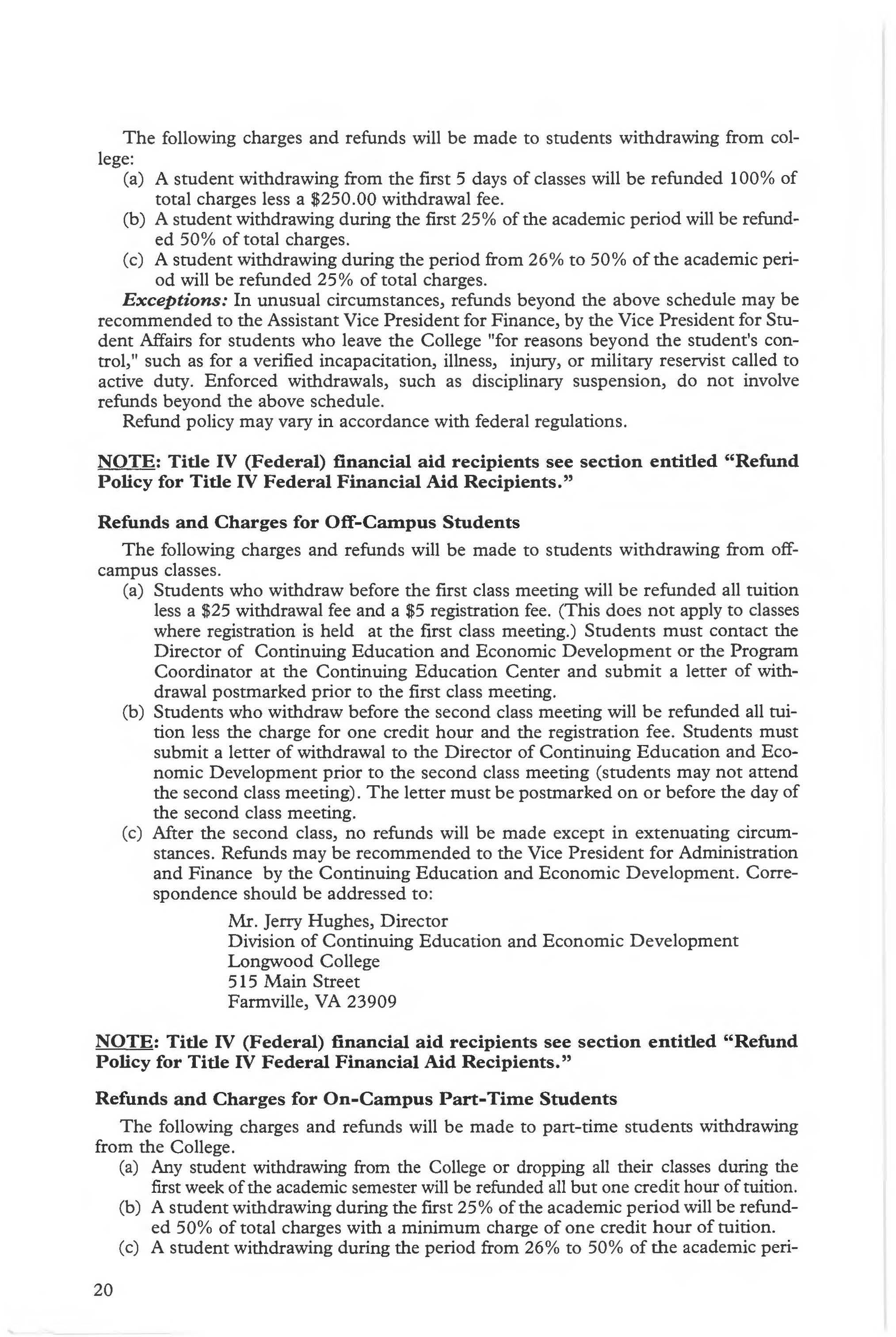
Refund policy may vary in accordance with federal regulations.
NOTE: Title IV (Federal) financial aid recipients see section entitled "Refund Policy for Title IV Federal Financial Aid Recipients."
The following charges and refunds will be made to students withdrawing from offcampus classes.
(a) Students who withdraw before the first class meeting will be refunded all tuition less a $25 withdrawal fee and a $5 registration fee. (This does not apply to classes where registration is held at the first class meeting.) Students must contact the Director of Continuing Education and Economic Development or the Program Coordinator at the Continuing Education Center and submit a letter of withdrawal postmarked prior to the first class meeting.
(b) Students who withdraw before the second class meeting will be refunded all tuition less the charge for one credit hour and the registration fee. Students must submit a letter of withdrawal to the Director of Continuing Education and Economic Development prior to the second class meeting (students may not attend the second class meeting). The letter must be postmarked on or before the day of the second class meeting.
(c) After the second class, no refunds will be made except in extenuating circumstances. Refunds may be recommended to the Vice President for Administration and Finance by the Continuing Education and Economic Development. Correspondence should be addressed to:
Mr. Jerry Hughes, Director Division of Continuing Education and Economic Development Longwood College 515 Main Street Farmville, VA 23909
NOTE: Title IV (Federal) financial aid recipients see section entitled "Refund Policy for Title IV Federal Financial Aid Recipients."
The following charges and refunds will be made to part-time students withdrawing from the College.
(a) Any student withdrawing from the College or dropping all their classes during the first week of the academic semester will be refunded all but one credit hour of tuition.
(b) A student withdrawing during the first 25% of the academic period will be refunded 50% of total charges with a minimum charge of one credit hour of tuition.
(c) A student withdrawing during the period from 26% to 50% of the academic peri-
od will be refunded 25 % of total charges with a minimum charge of one credit hour of tuition.
(d) After 50% of the academic period, no refunds will be made.
An official notification of withdrawal must be processed before any reduction in charges or refunds will be made . This can be done by contacting the Academic Dean's Office of the student's major.
NOTE: Title IV (Federal) financial aid recipients see section entitled "Refund Policy for Title IV Federal Financial Aid Recipients."
Student Federal financial aid (SFA) programs are covered by specific guidelines included in the Higher Education Amendments of 1992 . Students receiving assistance from a Stafford Loan, Perkins Loan, Plus Loan, Pell Grant, and Supplemental Educational Opportunity Grant are subject to specific federal guidelines based on the official date of withdrawal and type of aid received. If the SFA recipient is a first-time student at Longwood and withdraws within the first 60% of the enrollment period, the refund is based on a pro-rata calculation In this calculation, a student is charged based on the number of weeks of attendance. If the SFA recipient is not a first-time student or is a first time student withdrawing after the first 60 % of the enrollment period, the College ' s regular refund calculation is used .
Refunds for SFA recipients must be distributed according to a specific order of priority prescribed by Federal law and regulations as follows: Supplemental Loans, Unsubsidized Stafford Loans, Subsidized Stafford Loans, Parental Loans, Perkins Loans, Pell Grants, Supplemental Educational Opportunity Grants, other SFA programs, other Federal, State, private, or institutional sources of aid, and the student. A portion of the refund can be paid to the student only if funds remain after the refund has been returned to the Federal aid programs and other sources in order
Complete Student Federal financial aid regulations governing withdrawals and refunds and examples may be found in the Financial Aid Office.
Once a student has preregistered, registered, or otherwise been assigned classes for any semester, he / she must officially withdraw from the College before the 1st day of class for the academic semester to prevent tuition and fee charges. Students withdrawing on the 1st day of classes or later, will be charged as previously stated under the section "refunds and charges."
Withdrawal is not considered official unless a formal withdrawal is processed in the Academic Dean's Office of the student's major. Undeclared and special students should report to the Dean of Liberal Arts and Sciences. Dropping of classes in the Registrar's office does not fulfill the requirements for withdrawal.
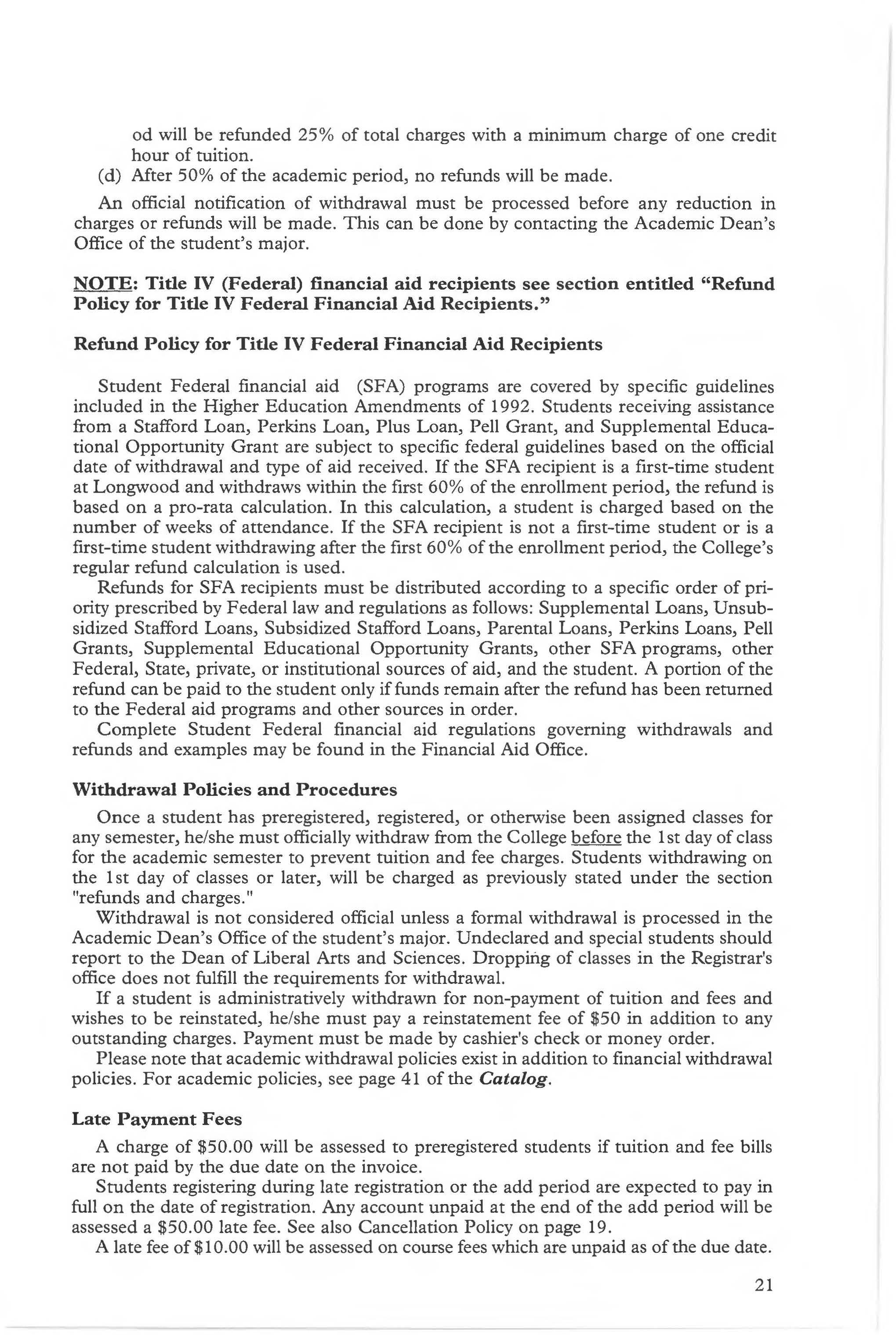
If a student is administratively withdrawn for non-payment of tuition and fees and wishes to be reinstated, he / she must pay a reinstatement fee of $50 in addition to any outstanding charges. Payment must be made by cashier's check or money order.
Please note that academic withdrawal policies exist in addition to financial withdrawal policies. For academic policies, see page 41 of the Catalog.
A charge of $50.00 will be assessed to preregistered students if tuition and fee bills are not paid by the due date on the invoice.
Students registering during late registration or the add period are expected to pay in full on the date of registration. Any account unpaid at the end of the add period will be assessed a $50.00 late fee. See also Cancellation Policy on page 19
A late fee of$10.00 will be assessed on course fees which are unpaid as of the due date.
A charge of $50.00 will be assessed to students registering during late registration who were academically eligible for preregistration.
Children between the ages of 16 and 25, either of whose parents was killed in action, is missing in action or a prisoner of war in any armed conflict, or is or may hereafter become totally disabled due to service subsequent to December 6, 1941, while serving in the army, navy, marine corps, air force, or coast guard of the United States, is eligible for free tuition and institutional charges at any educational or training institution of collegiate or secondary grade in the Commonwealth of Virginia if approved by the Director of the Division of War Veterans' Claims with the following stipulations:
I. Parent was a citizen of Virginia at the time of such service.
2. Parent is, and has been, a citizen of Virginia for at least ten years immediately prior to the date on which the application was submitted by or on behalf of such child for admission to any educational or training institution of collegiate or secondary grade in this Commonwealth.
3. If parent is deceased, was a citizen of Virginia on the date of his or her death, and had been a citizen of Virginia for at least ten years immediatley prior to his or her death.
Eligibility for these benefits is established by the Director of War Veterans' Claims, Richmond, VA 23216. Students who consider themselves eligible should contact the Director or may seek assistance from the Director of Admissions at Longwood. Verification of eligibility must be on file with Cashiering and Students Accounts before the first day of classes each semester.

Senior citizens aged 60 or over, with a federal taxable income of less than $10,000 per year, and who have lived in Virginia for one year can enroll in credit courses free of tuition, provided they meet the admissions standards of the college and space is available. Any senior citizen aged 60 or over can enroll in a non-credit course or audit a credit course free of tuition, regardless of taxable income, provided space is available. The senior citizen is obligated to pay fees established for the purpose of paying for course materials, such as laboratory fees. A maximum of three courses may be taken per semester.
Approval to register for classes under the Senior Citizens Higher Education Act may be obtained in the Student Accounts Office, Lancaster 344.
Students taking 12 or more credit hours will be charged full rates. Undergraduate Virginia students taking less than 12 credit hours will be charged at the rate of $112.00 per credit hour. Undergraduate non-Virginia students will be charged at the rate of $340.00 per credit hour.
Students classified as graduate students will be charged at the rate of $127 per credit hour for Virginia students and $340 per credit hour for non-Virginia students.
A comprehensive fee of $25.00 per credit hour is charged for all part-time students enrolled for eleven credit hours or less.
The college does not bill part-time students. Payment is expected at the time of registration.
See also Cancellation Policy on page I 9.
Due to the high cost of processing refunds, no refund checks will be issued for $10.00 or less.
Refund checks will be issued in the name of the enrolled student, regardless of who originally made the payment.
Automobile Registration. A fee of $15.00 per semester or $30.00 per year is charged for each automobile registered. A student enrolled in student teaching will be charged a parking fee of $6.00. Parking on campus is permitted if the permit issued on payment of this fee is displayed.
Diploma Fee. A fee of$25.00 will be charged for a Bachelor's diploma and a $25.00 fee for a Master's diploma. This fee is payable to the Registrar at the time application is made for graduation and is non-refundable.
Field Courses. Since charges vary for students enrolled in student teaching, semester rates may be obtained in the Cashiering and Student Accounts Office. Fees range from $50 to $150.
Meals for Guests. Students entertammg guests in the College dining hall are charged the following rates, tax included: breakfast--$2.90, lunch--$3.95, dinner--$5.25, and premium dinner--$5.95.
Special Examination Fee. A charge of $25.00 will be made for each approved deferred examination and for the one re-examination permitted each senior.
Course Fees. Some academic classes require an additional course fee. These will be assessed to all students enrolled in the class at the end of the add/drop period. Fees range from $5 to $150.
Overload Fee. An overload charge at the per credit rate will be assessed for each credit greater than 18 for which a student is enrolled in each semester. The 18 hour limit applies to both on and off campus classes or any combination of these classes.
Special Note. Any student who has completed an undergraduate degree at any college or university will be charged graduate tuition rates.
The purpose of the Longwood College student aid program is to provide financial assistance to students who, without such aid, would place an unreasonable financial hardship on their families. The College assumes that the primary responsibility for financing a college education lies with the students and their parents. Awards by the College are intended to supplement the family's contribution.

The Financial Aid Office offers financial information and counseling to all students attending Longwood. The types of financial assistance offered include grants and scholarships, loans, and student employment. Eligibility for these programs is determined by completing the Free Application for Federal Student Aid which is available from high schools or Longwood College. New students should apply prior to February 15 (March 15 for current students) of the academic year for which funds are being requested.
Specific information about financial aid may be obtained by calling (804-395-2077) or writing the Financial Aid Office, Longwood College, 201 High Street, Farmville, VA 23909. Visitors are welcome.
If a student fails to make satisfactory academic progress, the student may be ineligible to receive aid. Most programs either have a limit on the number of semesters of eligibility and/or a limit on the total amount of funds that can be received. To maintain satisfactory academic progress, a student must meet the Academic Probation and Suspension Policy as stated in this catalog. Also, some programs require a student to progress a grade level each year in order to maintain eligibility. Grade level progression is as follows: 1-29 credit hours, Freshman; 30-59 credit hours, Sophomore; 60-89 credit hours, Junior; and 90 credit hours and above, Senior.
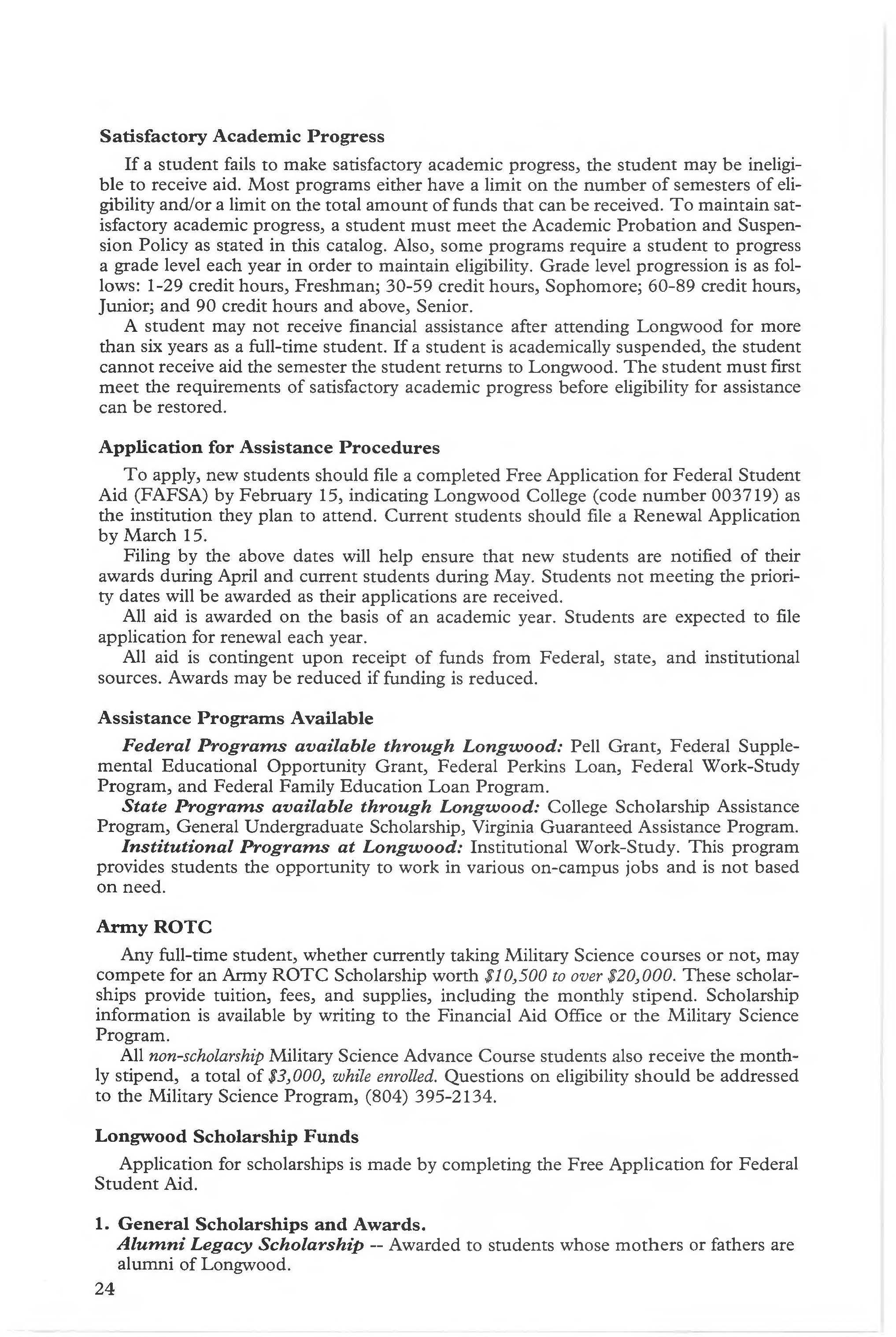
A student may not receive financial assistance after attending Longwood for more than six years as a full-time student. If a student is academically suspended, the student cannot receive aid the semester the student returns to Longwood. The student must first meet the requirements of satisfactory academic progress before eligibility for assistance can be restored.
To apply, new students should file a completed Free Application for Federal Student Aid (FAFSA) by February 15, indicating Longwood College (code number 003719) as the institution they plan to attend. Current students should file a Renewal Application by March 15.
Filing by the above dates will help ensure that new students are notified of their awards during April and current students during May. Students not meeting the priority dates will be awarded as their applications are received.
All aid is awarded on the basis of an academic year. Students are expected to file application for renewal each year.
All aid is contingent upon receipt of funds from Federal, state, and institutional sources. Awards may be reduced if funding is reduced.
Federal Programs available through Longwood: Pell Grant, Federal Supplemental Educational Opportunity Grant, Federal Perkins Loan, Federal Work-Study Program, and Federal Family Education Loan Program.
State Programs available through Longwood: College Scholarship Assistance Program, General Undergraduate Scholarship, Virginia Guaranteed Assistance Program.
Institutional Programs at Longwood: Institutional Work-Study. This program provides students the opportunity to work in various on-campus jobs and is not based on need.
Any full-time student, whether currently taking Military Science courses or not, may compete for an Army ROTC Scholarship worth $10,500 to over $20,000. These scholarships provide tuition, fees, and supplies, including the monthly stipend. Scholarship information is available by writing to the Financial Aid Office or the Military Science Program.
All non-scholarship Military Science Advance Course students also receive the monthly stipend, a total of $3,000, while enrolled. Questions on eligibility should be addressed to the Military Science Program, (804) 395-2134.
Application for scholarships is made by completing the Free Application for Federal Student Aid.
Alumni Legacy Scholarship Awarded to students whose mothers or fathers are alumni of Longwood.
ARA Scholarship Awarded to a student worker with ARA Services.
Herbert R. Blackwell Scholarship Awarded to a student who has shown unusual academic promise in the freshman year
Corbin-Bigby Scholarship Awarded to a full-time freshman with a 3.0 or above pursuing a degree leading to a teaching position in elementary education.
CHI Emergency Scholarship Awarded by CHI to students with emergency need. Students should contact the Office of Alumni Relations if an emergency situation arises
Class of 1940 Scholarship Awarded to a full-time student who is a resident of Virginia and has shown academic achievement. Must maintain a 3.0 GPA for scholarship renewal.
Class of 1941 Scholarship Awarded to a full-time student who is a resident of Virginia and has shown academic achievement. Must maintain a 3.0 GPA for scholarship renewal.
Class of 1942 Scholarship --Awarded to a full-time student who is a resident of Virginia and has a relative who is a graduate of Longwood . Must maintain a 3.0 GPA.
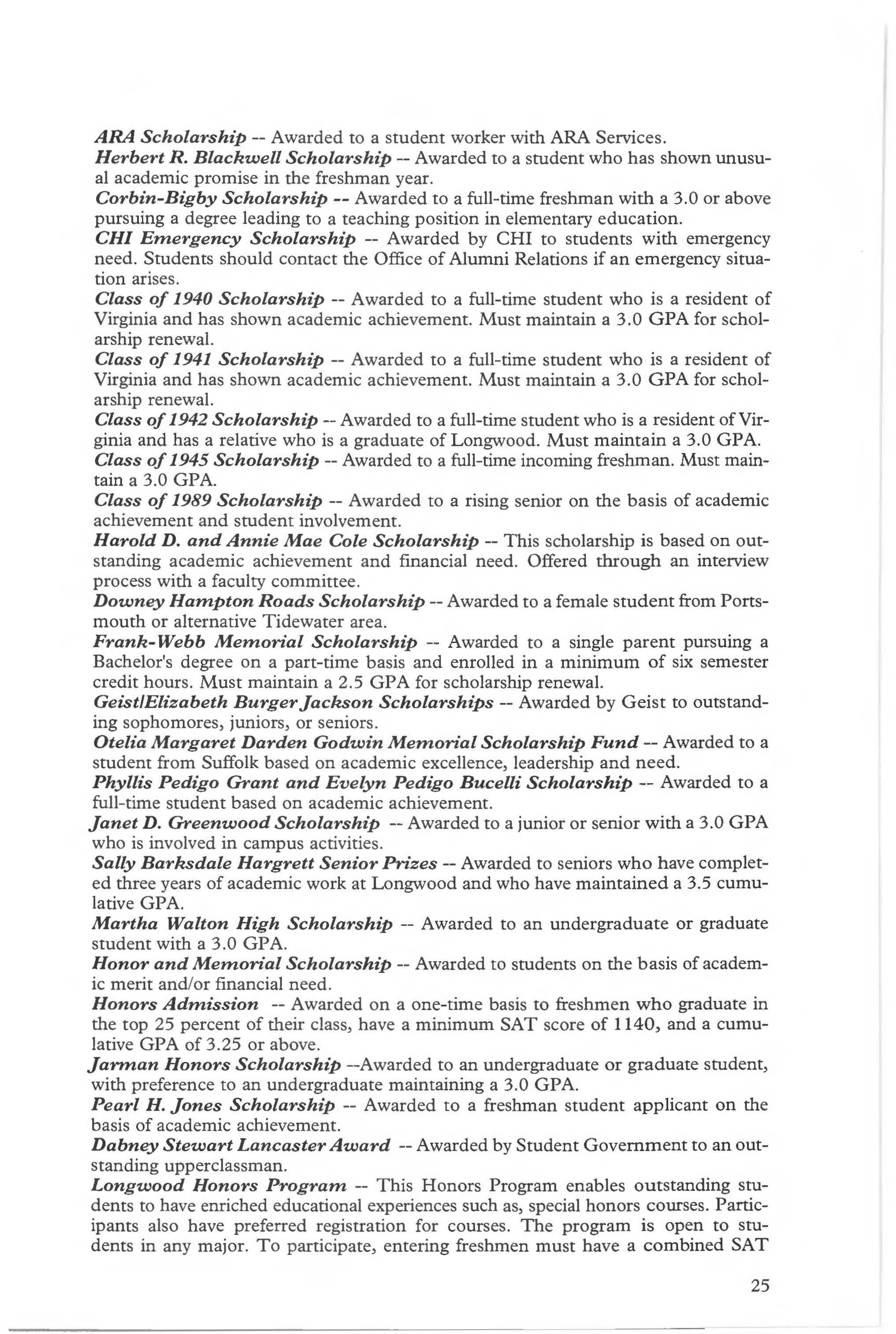
Class of 1945 Scholarship --Awarded to a full-time incoming freshman. Must maintain a 3.0 GPA.
Class of 1989 Scholarship Awarded to a rising senior on the basis of academic achievement and student involvement .
Harold D. and Annie Mae Cole Scholarship This scholarship is based on outstanding academic achievement and financial need. Offered through an interview process with a faculty committee
Downey Hampton Roads Scholarship Awarded to a female student from Portsmouth or alternative Tidewater area .
Frank-Webb Memon"al Scholarship Awarded to a single parent pursuing a Bachelor's degree on a part-time basis and enrolled in a minimum of six semester credit hours. Must maintain a 2 5 GPA for scholarship renewal.
Geist/Elizabeth Burger Jackson Scholarships Awarded by Geist to outstanding sophomores, juniors, or seniors.
Otelia Margaret Darden Godwin Memorial Scholarship Fund --Awarded to a student from Suffolk based on academic excellence, leadership and need.
Phyllis Pedigo Grant and Evelyn Pedigo Bucelli Scholarship Awarded to a full-time student based on academic achievement .
Janet D. Greenwood Scholarship --Awarded to a junior or senior with a 3.0 GPA who is involved in campus activitie s.
Sally Barksdale Hargrett Senior Prizes Awarded to seniors who have completed three years of academic work at Longwood and who have maintained a 3.5 cumulative GPA.
Martha Walton Hi'gh Scholarship Awarded to an undergraduate or graduate student with a 3 0 GPA.
Honor and Memorial Scholarship Awarded to students on the basis of academic merit and / or financial need.
Honors Admission Awarded on a one-time basis to freshmen who graduate in the top 25 percent of their class, have a minimum SAT score of 1140, and a cumulative GPA of 3 25 or above
Jarman Honors Scholarship --Awarded to an undergraduate or graduate student, with preference to an undergraduate maintaining a 3.0 GPA.
Pearl H. Jones Scholarship Awarded to a freshman student applicant on the basis of academic achievement.
Dabney Stewart Lancaster Award Awarded by Student Government to an outstanding upperclassman .
Longwood Honors Program This Honors Program enables outstanding students to have enriched educational experiences such as, special honors courses . Participants also have preferred registration for courses The program is open to students in any major. To participate, entering freshmen must have a combined SAT
score ofat least 1140 and a 3.25 GPA. See the "Honors Programs" section of the Catalog for more information about the program.
Longwood Scholars Scholarships This program provides approximately five scholarships annually to exceptionally capable students. It is open to matriculating freshmen who intend to fulfill the requirements for a bachelor's degree awarded by Longwood College. Applicants must rank in the top 10 percent of their graduating class, have a GPA of at least 3.25 and have SAT scores of 1140 or above. A brochure and application outlining this program may be obtained from the Admissions Office, Longwood College. Longwood Scholars awards are established in recognition of: Franklin Federal Savings Bank, Dr. Elizabeth Burger Jackson, Dr. Joseph L. Jarman, Clara Duncan Smith, Florence H. Stubbs, Dr. Henry I. Willett, Jr., and Frances Roberdeau Wolfe.
McGrath-Lewis Eastern Shore Scholarship Awarded to a student based on academic achievement who is a resident of the Eastern Shore of Maryland or Virginia. Minority Scholarships Awarded as a one-time scholarship and based on high school performance, test scores, financial need, recommendations, and co-curricular activities.
Nellie Ward Nance Scholarships Awarded on the basis of academic performance, test scores, curricular activities, and letters of recommendation. Preference is given to new students from Campbell and Bedford counties and from the city of Lynchburg. Recipients are selected by the Scholarship Selection Committee and may receive the award for four years if their GPA is maintained at 2.5 or above.
Jane Royall Phlegar Scholarship Awarded to a full-time student from the Tidewater/Hampton Roads or Tazewell area.
Catherine Meriwether Scott Scholarships Awarded on basis of high school performance, test scores, recommendations, co-curricular activities, and financial need.
Hylah Hope Camp Simmons Scholarship Awarded to a freshman who is first or second in their high school class ranking.
Edith Goff Street Scholarship Awarded to a student from one of the following Virginia counties in the order of priority listed: (1) Buchanan, (2) Dickenson, (3) Tazewell.
Frances W. Titsworth Scholarship Awarded to a full-time or part-time student from Halifax or Charlotte counties.
Ilma Von Schilling Scholarship --Awarded to a full-time student majoring in Modern Languages with a concentration in German.
Excellence for Education Scholarship --Awarded on the basis of high school academic performance and pursuit of a degree leading to teacher licensure in Elementary Education, Secondary Education, or Special Education. Recipients selected must have a minimum of 3.25 cumulative grade point average and 1140 SAT score. Ten full-tuition, in-state rate, awarded annually, renewable for three years provided a cumulative 3.25 grade point average is maintained.
Transfer Scholarships Ten $1,000 scholarship, renewable for one year for those students who maintain a 3.25 grade point average, to transfer students who have earned an associate degree in a university-parallel program at a community college. Five scholarships are reserved for area community colleges.
2. Department Scholarships and Awards. Many departments offer scholarships within the specific academic area. For further information concerning these scholarships, contact the department of the academic area involved.
(1) Art Department: Virginia Estes Bedford Memorial Scholarship, Franklin Federal Art Scholarship, Lucile B. Walton Art Scholarship.
(2) Athletics: Barbara Smith Scholarship.
(3) Business/Economics School: Jimmy Gayle Atkins Memorial Scholarship, JohnE. Carr, III Accounting Scholarship, Central Fidelity Bank Scholarship, Central Fidelity Bank Minority Scholarship, Evelyn M. Coleman Scholar-

ship, JackJacques/Delta Sigma Pi Scholarship, Special Accounting Award.
(4) Education: Ruth Denton Angleman Scholarship, Isabelle Ball Baker Memorial Scholarship, Sue Yeaman Britton Scholarship, Alice E. Carter Scholarship, Class of 1934 Scholarship, Marion S. Combs Scholarship, Lelia Holloway Davis Scholarship, William F. and MarthaJ. Dorrill Scholarship, Lulie Evelyn Duke Scholarship, Betty J. Shackelford Ellison Scholarship, J. B. Fuqua Scholarship, Lillie Evelyn Goodrich Scholarship, Helen McGuire Hahn Scholarship, S. Virginia and Berta M. Newell Scholarship, Kathleen Ranson Scholarship, Martha Sinclair Rust and Mary Sinclair Rust Memorial Scholarship, Teacher Education Centennial Scholarship, Virginia Price Waller Scholarship, Lady Boggs Walton Scholarship, Louise B. Watson Memorial Scholarship.
(5) English Department: Verna Mae Barr Scholarship, English Education Scholarship/Loan, Marian Camper Fuller Scholarship, Mary Clay Hiner Scholarship, Simonini Award, Rosemary Sprague Memorial Scholarship, Maria Bristow Starke Scholarship.
(6) Health, Physical Education and Recreation: Eleanor Bobbitt Scholarship, Olive T. Iler Award, Linda Marie Hall Mahonney Scholarship.
(7) History and Political Science: C. G. Gordon Moss Scholarship.
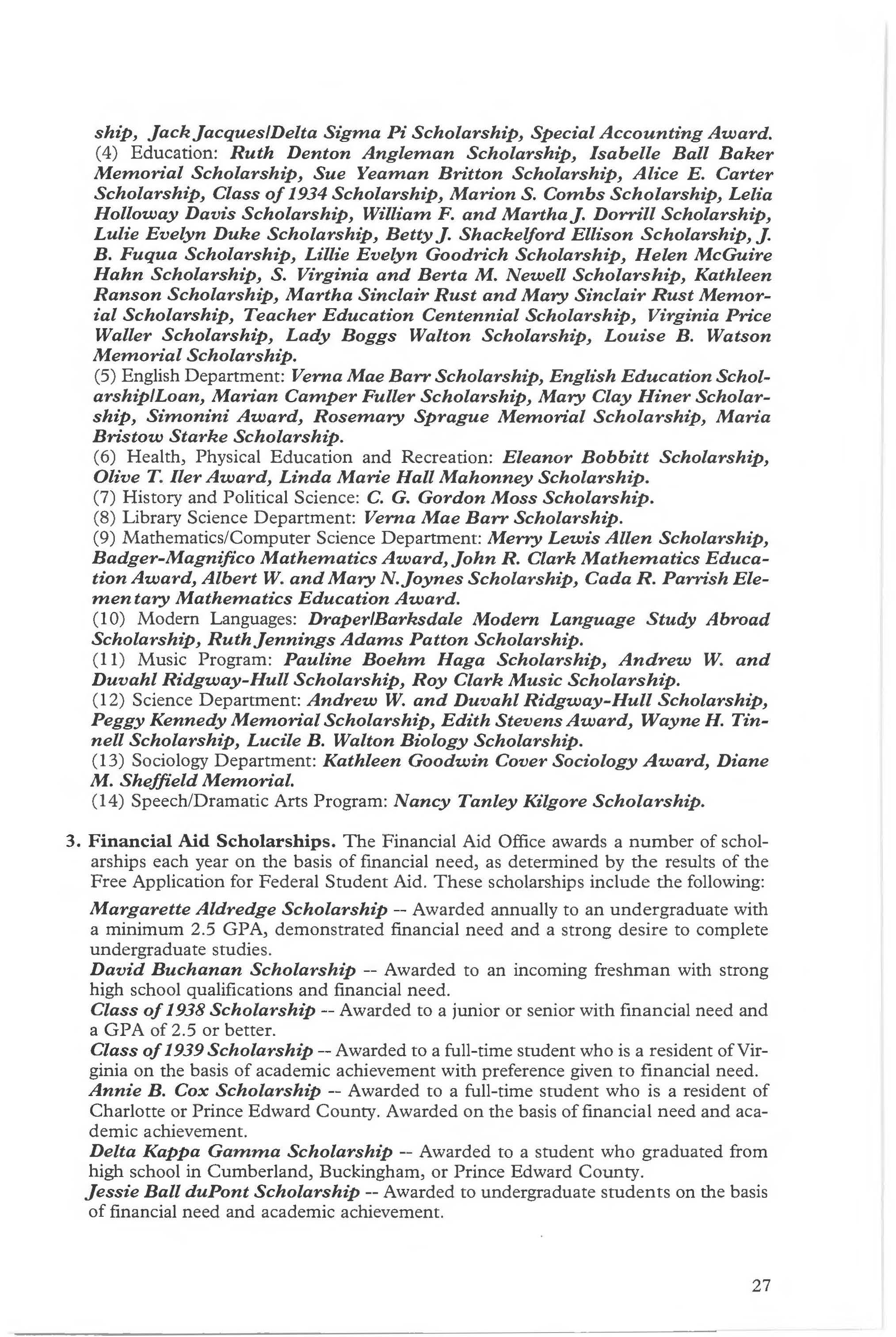
(8) Library Science Department: Verna Mae Barr Scholarship.
(9) Mathematics/Computer Science Department: Merry Lewis Allen Scholarship, Badger-Magnifico Mathematics Award, John R. Clark Mathematics Education Award, Albert W. and Mary N.Joynes Scholarship, Cada R. Parrish Elementary Mathematics Education Award.
(10) Modern Languages: Draper/Barksdale Modern Language Study Abroad Scholarship, Ruth Jennings Adams Patton Scholarship.
( 11 ) Music Program : Pauline Boehm Haga Scholarship, Andrew W. and Duvahl Ridgway-Hull Scholarship, Roy Clark Music Scholarship.
( 12 ) Science Department: Andrew W. and Duvahl Ridgway-Hull Scholarship, Peggy Kennedy Memorial Scholarship, Edith Stevens Award, Wayne H. Tinnell Scholarship, Lucile B. Walton Biology Scholarship.
(13) Sociology Department: Kathleen Goodwin Cover Sociology Award, Diane M. Sheffield Memorial.
(14) Speech/Dramatic Arts Program : Nancy Tanley Kilgore Scholarship.
3. Financial Aid Scholarships. The Financial Aid Office awards a number of scholarships each year on the basis of financial need, as determined by the results of the Free Application for Federal Student Aid. These scholarships include the following:
Margarette Aldredge Scholarship Awarded annually to an undergraduate with a minimum 2.5 GPA, demonstrated financial need and a strong desire to complete undergraduate studies .
David Buchanan Scholarship Awarded to an incoming freshman with strong high school qualifications and financial need.
Class of 1938 Scholarship --Awarded to a junior or senior with financial need and a GPA of 2.5 or better.
Class of 1939 Scholarship --Awarded to a full-time student who is a resident of Virginia on the basis of academic achievement with preference given to financial need.
Annie B. Cox Scholarship Awarded to a full-time student who is a resident of Charlotte or Prince Edward County. Awarded on the basis of financial need and academic achievement.
Delta Kappa Gamma Scholarship Awarded to a student who graduated from high school in Cumberland, Buckingham, or Prince Edward County.
Jessie Ball duPont Scholarship --Awarded to undergraduate students on the basis of financial need and academic achievement
Martha Cooke Elder Scholarship/Loan Awarded to students with a demonstrated financial need, a minimum 2.0 GPA and special circumstances as determined by the Financial Aid Office.
Carey Jeter Finley Scholarship --Awarded on the basis of financial need and academic achievement.
Gamma Theta/Kappa Delta Scholarship Awarded on the basis of academic ac hievement and financial need .
Margaret Helm Gilmore Scholarship
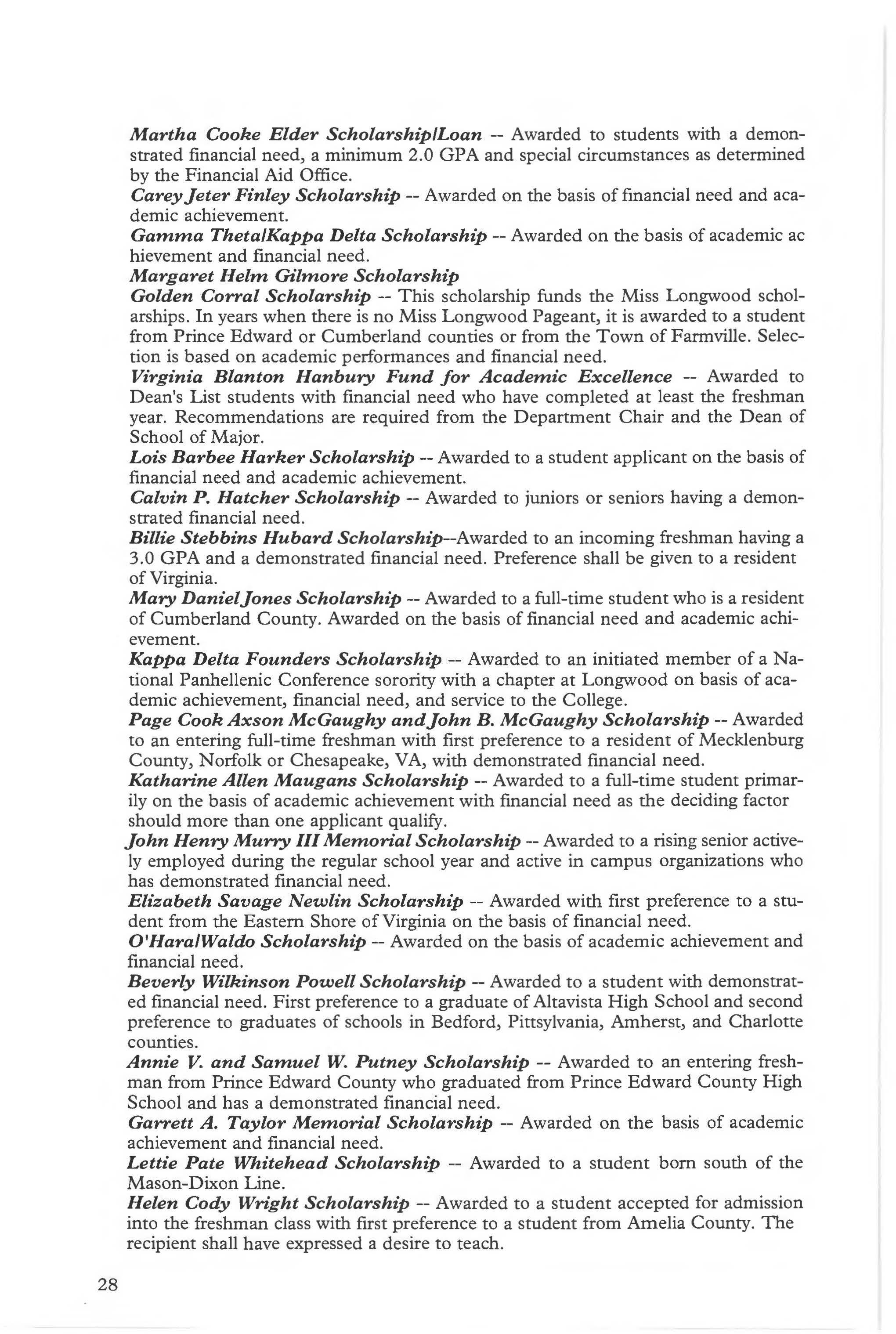
Golden Corral Scholarship This scholarship funds the Miss Longwood scholarships . In years when there is no Miss Longwood Pageant, it is awarded to a student from Prince Edward or Cumberland counties or from the Town of Farmville. Selection is based on academic performances and financial need.
Virginia Blanton Hanbury Fund for Academic Excellence Awarded to Dean's List students with financial need who have completed at least the freshman year. Recommendations are required from the Department Chair and the Dean of School of Major.
Lois Barbee Harker Scholarship --Awarded to a student applicant on the basis of financial need and academic achievement.
Calvin P. Hatcher Scholarship Awarded to juniors or seniors having a demonstrated financial need.
Billie Stebbins Hubard Scholarship--Awarded to an incoming freshman having a 3 0 GPA and a demonstrated financial need Preference shall be given to a resident of Virginia.
Mary Danie/Jones Scholarship Awarded to a full-time student who is a resident of Cumberland County. Awarded on the basis of financial need and academic achievement.
Kappa Delta Founders Scholarship Awarded to an initiated member of a National Panhellenic Conference sorority with a chapter at Longwood on basis of academic achievement, financial need, and service to the College.
Page Cook Axson McGaughy andJohn B. McGaughy Scholarship Awarded to an entering full-time freshman with first preference to a resident of Mecklenburg County, Norfolk or Chesapeake, VA, with demonstrated financial need.
Katharine Allen Maugans Scholarship Awarded to a full-time student primarily on the basis of academic achievement with financial need as the deciding factor should more than one applicant qualify.
John Henry Murry Ill Memorial Scholarship Awarded to a rising senior actively employed during the regular school year and active in campus organizations who has demonstrated financial need.
Elizabeth Savage Newlin Scholarship Awarded with first preference to a student from the Eastern Shore of Virginia on the basis of financial need.
O'Hara/Waldo Scholarship Awarded on the basis of academic achievement and financial need.
Beverly Wilkinson Powell Scholarship Awarded to a student with demonstrated financial need. First preference to a graduate of Altavista High School and second preference to graduates of schools in Bedford, Pittsylvania, Amherst, and Charlotte counties.
Annie V. and Samuel W. Putney Scholarship Awarded to an entering freshman from Prince Edward County who graduated from Prince Edward County High School and has a demonstrated financial need.
Garrett A. Taylor Memorial Scholarship Awarded on the basis of academic achievement and financial need.
Lettie Pate Whitehead Scholarship Awarded to a student born south of the Mason-Dixon Line.
Helen Cody Wright Scholarship Awarded to a student accepted for admission into the freshman class with first preference to a student from Amelia County. The recipient shall have expressed a desire to teach
Dan Daniel Award for Scholarship and Citizenship. This award is announced at commencement each year. Selection is based upon academic ranking, and citizenship and leadership qualities both on and off campus.
Sally Barksdale Hargrett Prize for Academic Excellence. This prize will be given each year at commencement to the graduating senior who has attended Longwood as a full-time student for a minimum of 3 academic years and has achieved the highest academic record. The recipient will receive a certificate and a cash award of$2,000. The prize is to be "an incentive to encourage students to greater effort in achieving academic excellence to enrich their college experience and advance their own well-being and that of the College."
Methodist Student Loan. A student who is a full member of The United Methodist Church, a citizen of the United States, is admitted to a degree program, and has a "C" average, may be eligible to borrow up to $900 as an undergraduate student and $1,200 as a graduate student each calendar year. Interest varies but is always considerably lower than interest rates on commercial loans and payments do not begin until six months after graduation or withdrawal from school. For more information, contact the Director of the United Methodist Campus Ministry at Longwood College, 204 High St., Farmville, VA 23901, or phone 804-392-8089.
Veterans Assistance. All types of programs available to veterans/children of veterans are administered through the Financial Aid Office. If you are eligible for any assistance through these programs, please have your paperwork completed in the Financial Aid Office.
Children of persons killed, disabled, missing in action, or prisoners of war in any armed conflict are entitled to free tuition, and all required fees (educational and auxiliary) if deemed eligible by the Director of the Division of War Veterans' Claims. However, user fees, such as room and board charges, shall not be included in the authorization to waive tuition and fees (23- 7 .1 (f) of the Code of Virginia).


Longwood's six broad student-development goals reflect our commitment to your intellectual, social, and personal development, as well as to your career preparation. They also emphasize your involvement in shaping the quality of your experiences here, and to finding meaning in your own values and directions.
1. Mastery of a Broad Body of Knowledge in the liberal arts and sciences, so you can see things in perspective, appreciate and enjoy artistic expression, and critically, creatively, and logically respond to the complex world around you.
2. Mastery of g Specialized ,llQ.dy of Knowledge, so you'll have the expertise to be competitive and successful in your chosen career.
1. A Sense of Personal Direction, so you can plan your future wisely and with honor, acquiring self-understanding, self-confidence, and a meaningful philosophy of life.
2. A Balanced and Healthy Lifestyle, which means making responsible choices related to values, friends, family, work, recreation, and life-long education.
1. Interpersonal Effectiveness and an appreciation of diversity and differences, so you can establish genuine, trusting, and honorable relationships within the broad family of humanity.
2. Responsible Citizenship, so you can do your best in ways uniquely your own and have the motivation to contribute to a better life for all through community participation and leadership.
The Longwood Board of Visitors endorsed Student Development, as expressed in the student goals, as a focus for program planning, design and implementation; as a policy pertinent to all programs and procedures; and as a concept, focus, and direction for programs and procedures. The Board endorsed the following:
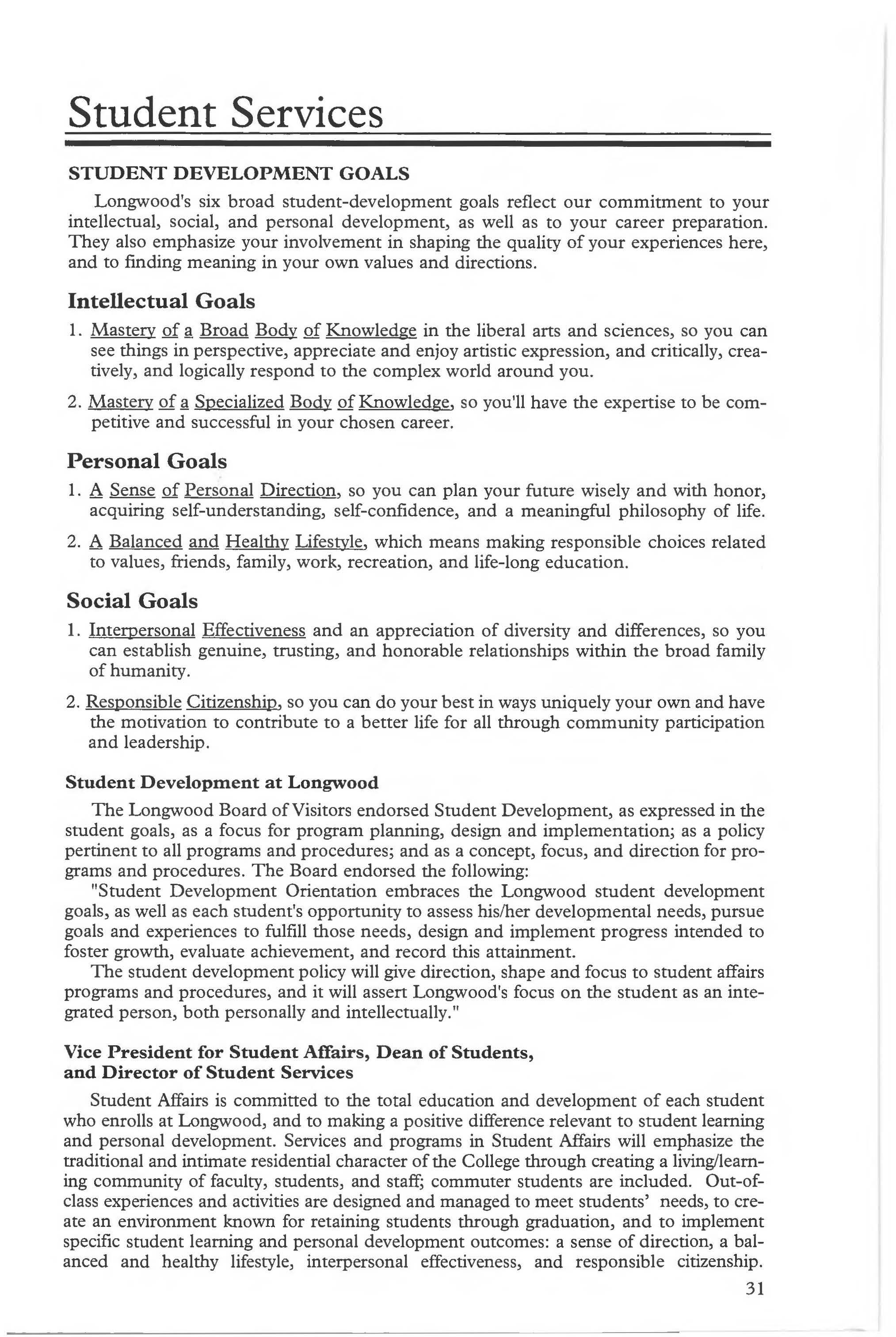
"Student Development Orientation embraces the Longwood student development goals, as well as each student's opportunity to assess his/her developmental needs, pursue goals and experiences to fulfill those needs, design and implement progress intended to foster growth, evaluate achievement, and record this attainment.
The student development policy will give direction, shape and focus to student affairs programs and procedures, and it will assert Longwood's focus on the student as an integrated person, both personally and intellectually."
Vice President for Student Affairs, Dean of Students, and Director of Student Services
Student Affairs is committed to the total education and development of each student who enrolls at Longwood, and to making a positive difference relevant to student learning and personal development. Services and programs in Student Affairs will emphasize the traditional and intimate residential character of the College through creating a living/learning community of faculty, students, and staff; commuter students are included. Out-ofclass experiences and activities are designed and managed to meet students' needs, to create an environment known for retaining students through graduation, and to implement specific student learning and personal development outcomes: a sense of direction, a balanced and healthy lifestyle, interpersonal effectiveness, and responsible citizenship.
Students are expected to be responsible for their personal behavior, responsible for taking advantage of their learning experiences, and responsible for establishing a purposeful balance of academic and social involvement. Student Affairs staff, in partnership with students, create and implement the design of communities where students are respected as individuals and where such values as care, motivation, honor, civility, and responsibility are emphasized Student Affairs staff will continue to promote the importance of involvement as necessary for each student's academic and social learning. Involvement is not simply participation in activities, but it connects investment of time with commitment to identified goals for personal and academic development, including Longwood's goals for general education.
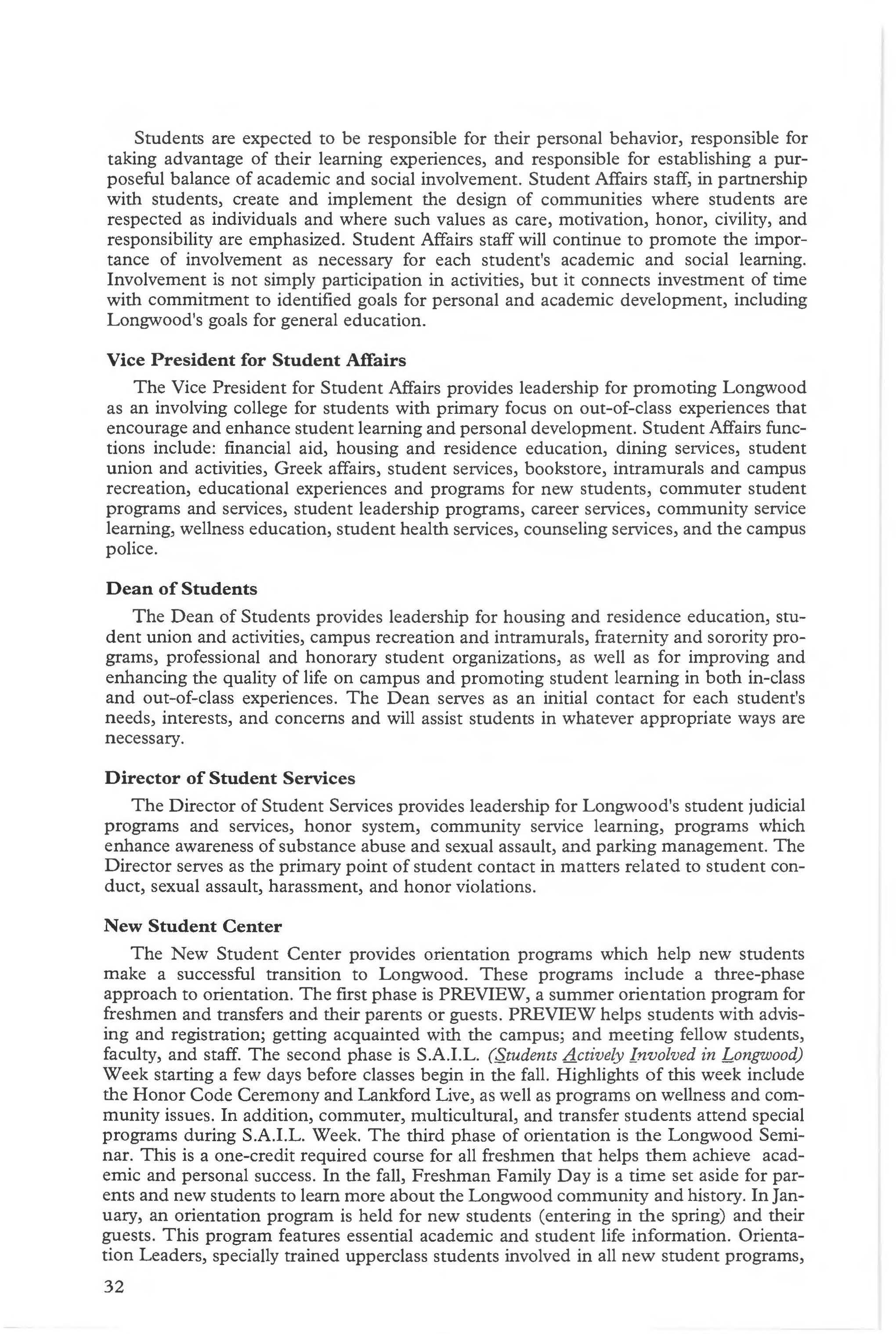
The Vice President for Student Affairs provides leadership for promoting Longwood as an involving college for students with primary focus on out-of-class experiences that encourage and enhance student learning and personal development. Student Affairs functions include: financial aid, housing and residence education, dining services, student union and activities, Greek affairs, student services, bookstore, intramurals and campus recreation, educational experiences and programs for new students, commuter student programs and services, student leadership programs, career services, community service learning, wellness education, student health services, counseling services, and the campus police.
The Dean of Students provides leadership for housing and residence education, student union and activities, campus recreation and intramurals, fraternity and sorority programs, professional and honorary student organizations, as well as for improving and enhancing the quality of life on campus and promoting student learning in both in-class and out-of-class experiences. The Dean serves as an initial contact for each student's needs, interests, and concerns and will assist students in whatever appropriate ways are necessary.
The Director of Student Services provides leadership for Longwood's student judicial programs and services, honor system, community service learning, programs which enhance awareness of substance abuse and sexual assault, and parking management The Director serves as the primary point of student contact in matters related to student conduct, sexual assault, harassment, and honor violations.
The New Student Center provides orientation programs which help new students make a successful transition to Longwood. These programs include a three-phase approach to orientation. The first phase is PREVIEW, a summer orientation program for freshmen and transfers and their parents or guests. PREVIEW helps students with advising and registration; getting acquainted with the campus ; and meeting fellow students, faculty, and staff. The second phase is S.A.I.L. (S,tudents A_ctively Involved in Longwood) Week starting a few days before classes begin in the fall. Highlights of this week include the Honor Code Ceremony and Lankford Live, as well as programs on wellness and community issues. In addition, commuter, multicultural, and transfer students attend special programs during S.A.I.L. Week. The third phase of orientation is the Longwood Seminar. This is a one-credit required course for all freshmen that helps them achieve academic and personal success In the fall, Freshman Family Day is a time set aside for parents and new students to learn more about the Longwood community and history. In January, an orientation program is held for new students (entering in the spring) and their guests. This program features essential academic and student life information. Orientation Leaders, specially trained upperclass students involved in all new student programs,
work to ensure that new students' transition to Longwood is welcoming, positive, and informative.

Residence Education Coordinators, who are full-time professional staff members, and Resident Assistants, who are students, provide leadership in each residence hall to stimulate and sustain a variety of interests among students. They also assist students in realizing their individual as well as community objectives. Student responsibility for behavior, community, activity, and learning is encouraged; students learn the meaning of care and consideration for people and property. Students are expected to live in the residence halls as part of the residential education program, unless they choose to live with parents. The Director of Housing is responsible for the residence requirements and works with students as they make their plans.
Students are responsible for the care and cleanliness of their rooms and for the condition of their floor and residence hall. A damage/contingency deposit is collected from each student and serves as an incentive for responsible involvement and behavior. In order to personalize rooms, students are encouraged to consider (with roommate) unique furnishings and are expected to supply lamps, bedspreads, drapes, blankets, pillows, and linens. Longwood provides beds, dressers, desks, and closets. Kitchens, laundry and vending facilities are located in each residence hall; study lounges and recreation rooms are available. Fire safety procedures and inspections are part of residence education and are strictly enforced.
Thirteen residence halls offer a variety of social and educational options for men and women. Tabb and French Halls, the oldest halls, are located east of Ruffner Hall and overlook the College Colonnade and Sunken Gardens. South Ruffner has been renovated and reopened for the Fall '97 semester. The Cunninghams, constructed in 1928, 1932, and 1938, form a complex of halls in the center of campus. Wheeler, Cox, and Stubbs Halls were built during the period, 1960-66, and are located on the western edge of the campus. Curry and Frazer are modern high-rise facilities that were completed in 1969 and 1970 respectively; they are centrally air-conditioned. The newest facility, ARC, was completed in the spring of 1992. It is centrally air-conditioned. Special living areas with themes bring together students with common interests. Information on special living options is available from the Housing Office.
Longwood Dining Services are an integral part of campus life. Residential students are required to participate in the community dining program by purchasing a 14 meal plan with $100 bonus dollars, a 15 meal plan or a 19 meal plan, or a block 150 meal plan plus $75 bonus dollars. There are two full-service dining facilities for students. The Blackwell Dining Room offers traditional homestyle meals in an elegant setting. The Rotunda Market is a state of the art quick serve facility. The Lancer Cafe in the Lankford Student Union features Longwood's very own Pizza Hut Express, Taco Bell Express and Freshen's Yogurt. Commuter students are welcome to participate in any of the operations by purchasing a meal plan, purchasing a commuter 5 meal deal or joining the Longwood Dollars declining balance program. Longwood Dollars is a pre-paid charge account where purchases are deducted from the account by way of the I.D. Longwood Dollars can be used at any 1.DS facility.
Longwood's Leaming Center provides support to the learning process through services to students, faculty, and staff. The goals of the Learning Center are to assist students in improving their academic performance and in becoming independent life-long learners.
The Leaming Center provides a range of services in a central location with easy access for students. Among the services offered by the Leaming Center are peer tutoring, study
skills workshops, standardized test preparation workshops, a library of self-paced instructional software, and writing assistance .
Other services housed at the Leaming Center include the Longwood Seminar, the Office of Multicultural Affairs, Disabled Student Services, and the Office of Advising. The Office of Multicultural Affairs exists to provide a welcoming environment for students of many cultures and to develop programs to enhance campus-wide understanding of and appreciation of diversity.
The College recognizes the needs of commuter students and appreciates the unique role commuter students play in enhancing Longwood's educational mission and the partnership between the Longwood and Southside Virginia communities. There are over 900 commuters at Longwood more than half of whom live outside the Farmville area .
Services are provided for commuters including designated parking areas and a Commuter Lounge in Lankford which has cooking facilities, lockers, messaging facilities, and College/community information designed for the unique needs of commuters. The Commuter Lounge also serves as a Computer Center, and provides wordprocessing, desktop publishing, and recreational facilities for commuters A special "Ride and Information Board" has been established in the center of the campus with information about ride sharing and other matters of interest to commuters.
Longwood considers students living off of the campus to be commuter students . Thus, whether students "commute" by walking from an apartment or by driving from a community outside of Farmville, they are commuters. The Commuter Student Association, governed by a council of students, meets on a weekly basis to plan social and informational events and represent the needs, interests, and concerns of the large and diverse commuter constituency. All commuters are automatically members of this organization.
Services and activities for commuter students are coordinated through the Center for Commuter Student Affairs and Student Leadership Programs, located in 207 Lankford Student Union.
Longwood College has developed a comprehensive student outcomes assessment program that is critical to the continued success of the College and to the academic and personal success of each Longwood student. This widely-supported program recognizes the "holistic" nature of education and is designed to measure student affective developmental outcomes as well as knowledge outcomes. Students gain personal information that can assist them in making purposeful choices about their involvement academically and socially, and Longwood gains descriptive information that serves to enhance the learning environment and institutional effectiveness of the College.

Longwood provides many opportunities for student involvement outside the classroom. Presently, there are over 80 student organizations serving the needs and interests of Longwood students. It is through these organizations that student life is defined. Programs offered are developed by students within each group in response to student interests and emerging issues in society. The activities provide opportunities for student learning that compliment the academic experience .
Students are encouraged to get involved in clubs and organizations. Exploring several groups of interest before deciding which ones are appropriate for full participation is the recommended strategy Longwood's student organizations include arts and entertainment groups, Greeks, academic clubs and honoraries, governance councils, intramurals, and others . The Student Union Office publishes a list of student groups each fall. Anyone interested in a specific organization, or just wondering what is available, is invited to stop by Lankford room 218, or call 395-2103. Lancer Productions is the major student programming organization on campus. Funded by student fees, this group of stu-
dents plans and implements a balanced schedule of social, cultural, educational, and recreational activities for the Longwood community. Programs sponsored by Lancer Productions include films, contemporary concerts, comedy clubs, coffeehouse entertainment, lectures, interactive and novelty events, and Spring Weekend.
Lankford Student Union is not only a building, but also an organization and a program that is an integral part of the educational and co-curricular agenda of Longwood College. The Union is a central focus of college community life serving as the "living room" of the campus. The Union and its programs, both formal and informal, serve as a laboratory for students to explore social, cultural, and educational involvements, student governance, campus leadership, group participation, and student employment. It is a place where students, faculty, and staff can get to know and understand each other outside the classroom.
The Student Union is an ongoing training mechanism for students who work together with staff to plan and implement a balanced schedule of social, cultural, educational, and recreational activities. Student programmers learn transferable skills and are challenged in the area of personal development.
The Student Union is both a campus resource and a service. Campus information, quality food service, programming and meeting facilities, convenience items, and courtesies are readily available to the College community. The Student Union includes the Lankford Information Center, Commonwealth Ballroom, Meeting Rooms, Leadership Resource Center, Commuter Student Lounge, Student Government Office, Lancer Productions Office, Recreation Area featuring four bowling lanes, pool and ping pong tables, and video games, Lancer Snack Bar and Cafe with Taco Bell and Pizza Hut operations, Greek Affairs Office, Leadership and Commuter Affairs Office, U.S. Post Office, and publications offices for the Rotunda, Virginian, and Gyre.
At Longwood College, students are encouraged to participate in decision-making. Students have substantive contributions to make; their participation will have educational value to them as well.
Students are given the opportunity to participate in the decision-making process at the highest levels through involvement in the Student Government Association. Student Government strives to "... achieve and maintain appropriate representation on all college, administrative, and faculty bodies and committees that make decisions affecting the student body of Longwood College ... "(Article 1, Section 2 of the Student Government Constitution).
The mission statement of SGA also provides that the Student Government Association should "serve as the official voice of the student body through which student opinion may be expressed to the administration of Longwood College."
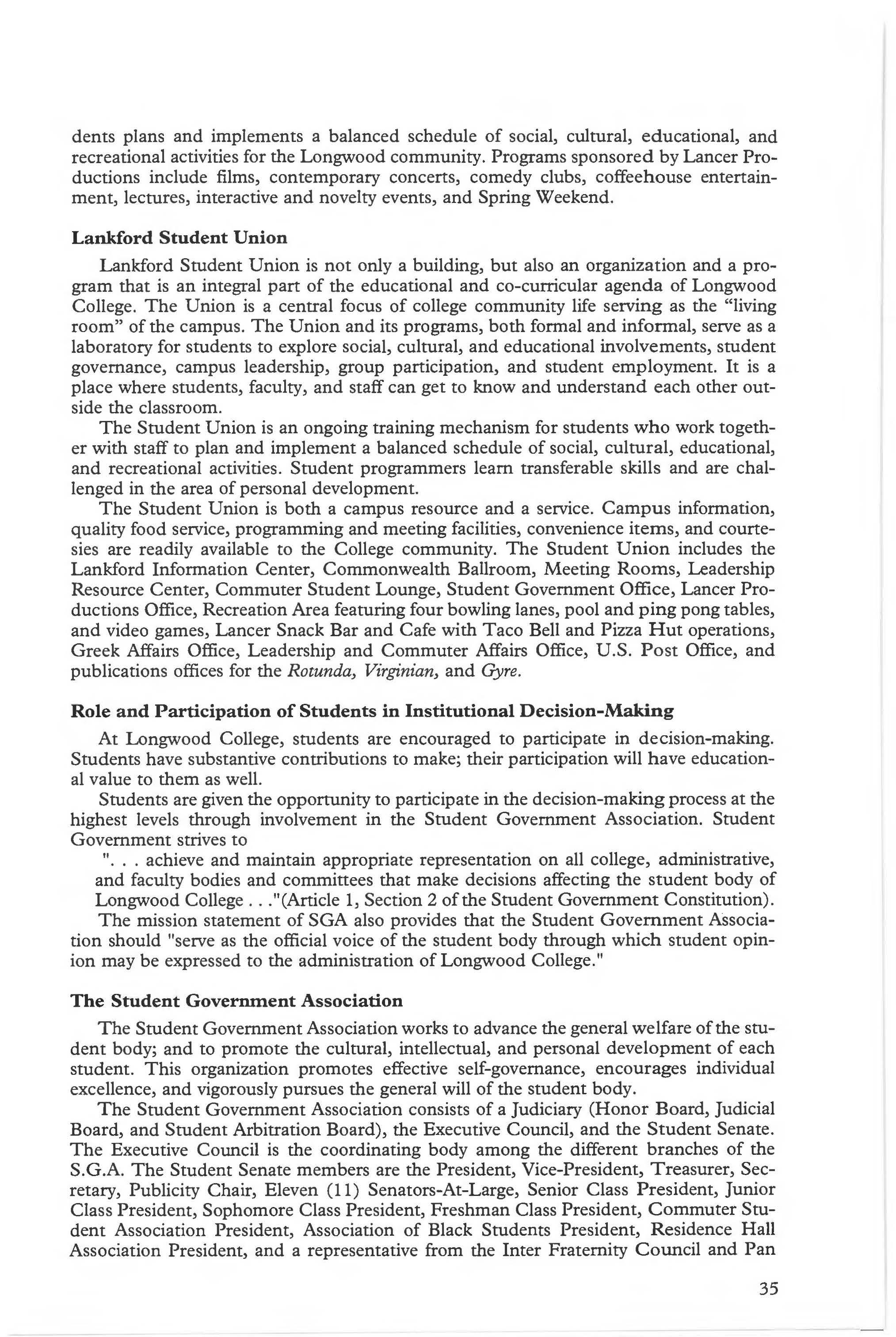
The Student Government Association works to advance the general welfare of the student body; and to promote the cultural, intellectual, and personal development of each student. This organization promotes effective self-governance, encourages individual excellence, and vigorously pursues the general will of the student body.
The Student Government Association consists of a Judiciary (Honor Board, Judicial Board, and Student Arbitration Board), the Executive Council, and the Student Senate. The Executive Council is the coordinating body among the different branches of the S.G.A. The Student Senate members are the President, Vice-President, Treasurer, Secretary, Publicity Chair, Eleven (11) Senators-At-Large, Senior Class President, Junior Class President, Sophomore Class President, Freshman Class President, Commuter Student Association President, Association of Black Students President, Residence Hall Association President, and a representative from the Inter Fraternity Council and Pan
Hellenic Council. The Student Senate meets each Tuesday at 12:45 p.m. in the Appomattox, Buckingham, and Cumberland Rooms of the Lankford Student Union. The Executive Council meets at 9:00 p.m. on Thursday in the Charlotte Room of the Lankford Student Union. All meetings are open to the public. You are encouraged to attend. If you desire more information, call 2111, or stop by the office located in the Lankford Leadership Lounge.
The Rotunda is the student newspaper. It keeps the students and faculty informed of events and the interests of Longwood as observed from the students' point of view. It expresses the attitude of the students toward the various phases of student life and current activities.
Gyre is a literary magazine . Students contribute essays, poetry, short stories, and other writings, as well as art work.
The Virginian is the yearbook which provides a "picture" of college events and activities.
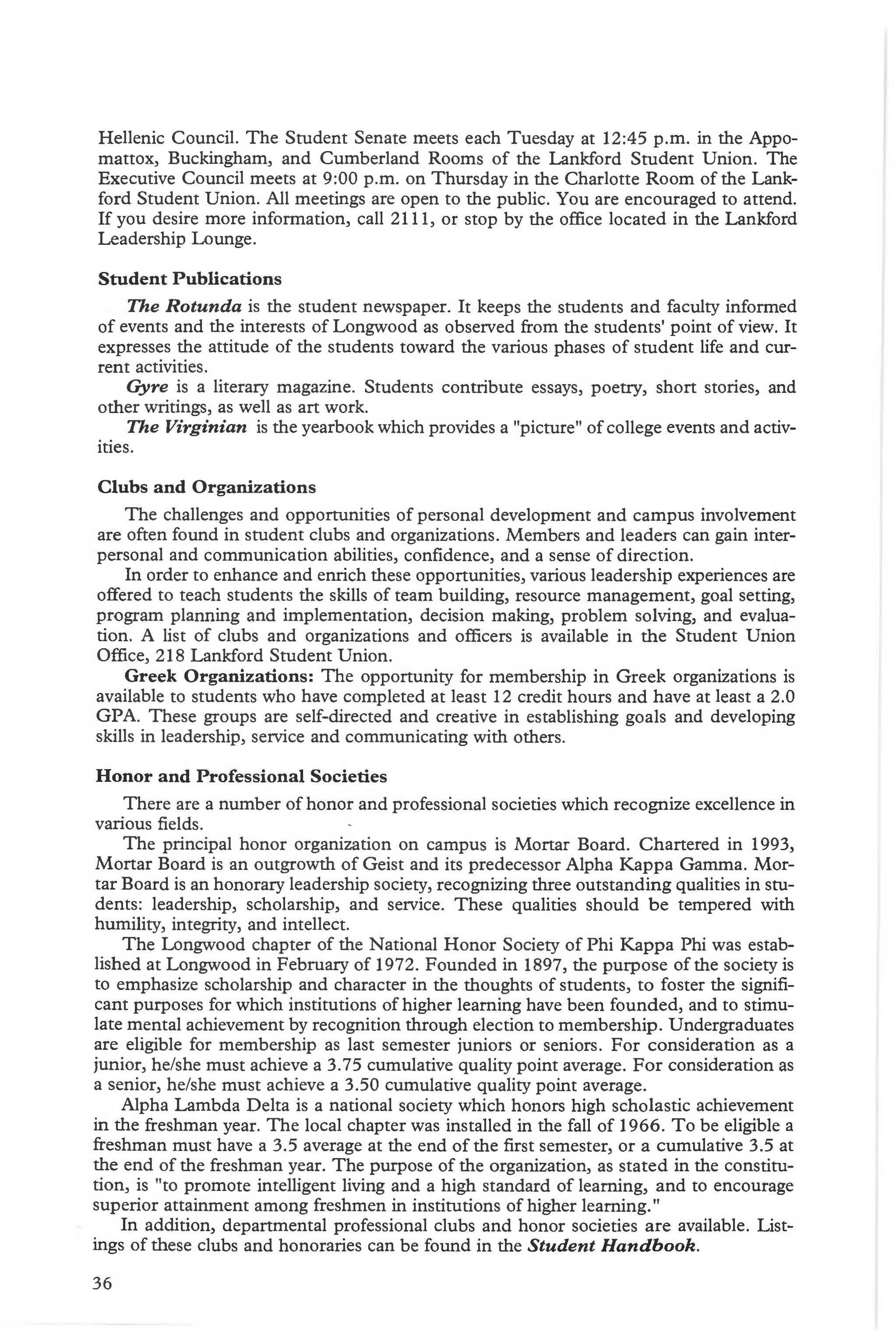
The challenges and opportunities of personal development and campus involvement are often found in student clubs and organizations. Members and leaders can gain interpersonal and communication abilities, confidence, and a sense of direction.
In order to enhance and enrich these opportunities, various leadership experiences are offered to teach students the skills of team building, resource management, goal setting, program planning and implementation, decision making, problem solving, and evaluation. A list of clubs and organizations and officers is available in the Student Union Office, 218 Lankford Student Union.
Greek Organizations: The opportunity for membership in Greek organizations is available to students who have completed at least 12 credit hours and have at least a 2.0 GPA. These groups are self-directed and creative in establishing goals and developing skills in leadership, service and communicating with others.
There are a number of honor and professional societies which recognize excellence in various fields.
The principal honor organization on campus is Mortar Board. Chartered in 1993, Mortar Board is an outgrowth of Geist and its predecessor Alpha Kappa Gamma. Mortar Board is an honorary leadership society, recognizing three outstanding qualities in students: leadership, scholarship, and service. These qualities should be tempered with humility, integrity, and intellect.
The Longwood chapter of the National Honor Society of Phi Kappa Phi was established at Longwood in February of 1972. Founded in 1897, the purpose of the society is to emphasize scholarship and character in the thoughts of students, to foster the significant purposes for which institutions of higher learning have been founded, and to stimulate mental achievement by recognition through election to membership. Undergraduates are eligible for membership as last semester juniors or seniors. For consideration as a junior, he/she must achieve a 3. 75 cumulative quality point average. For consideration as a senior, he/she must achieve a 3.50 cumulative quality point average.
Alpha Lambda Delta is a national society which honors high scholastic achievement in the freshman year. The local chapter was installed in the fall of 1966. To be eligible a freshman must have a 3.5 average at the end of the first semester, or a cumulative 3.5 at the end of the freshman year. The purpose of the organization, as stated in the constitution, is "to promote intelligent living and a high standard of learning, and to encourage superior attainment among freshmen in institutions of higher learning."
In addition, departmental professional clubs and honor societies are available. Listings of these clubs and honoraries can be found in the Student Handbook.
All undergraduate and graduate students taking 8 credits or more are eligible to participate in the activities sponsored by Intramurals and Campus Recreation. Some of these activities are: aerobic fitness classes taught in Iler Gym by qualified student instructors and a Walk Program for students, faculty, and staff who like to walk for exercise. Maps, charts, and awards are part of the program. There is also a 10 station fitness trail that starts in front of Iler.
Weekly tournaments are conducted in the following activities: flag football, bowling, wallyball, 3-on-3 basketball, racquetball, volleyball, billiards, basketball, ping pong, badminton, spades (cards), innertube water polo, tennis doubles, softball, arm wrestling, 2on-2 volleyball on the sand courts, foul shooting, and dual superstars. In several sports, there is an A and B league so every student can participate at his/her skill level. Tournaments are offered on weekends: coed softball, coed bowling, backgammon, racquetball, coed flag football, floor hockey, basketball, horseshoes, and outdoor volleyball on the sand court.
The racquetball courts, weight room, outdoor basketball courts, outdoor volleyball courts, fitness trail, gyms, swimming pools, and fields are open for "free" play/recreation during specified times. Students may check out equipment for use with their college ID card.
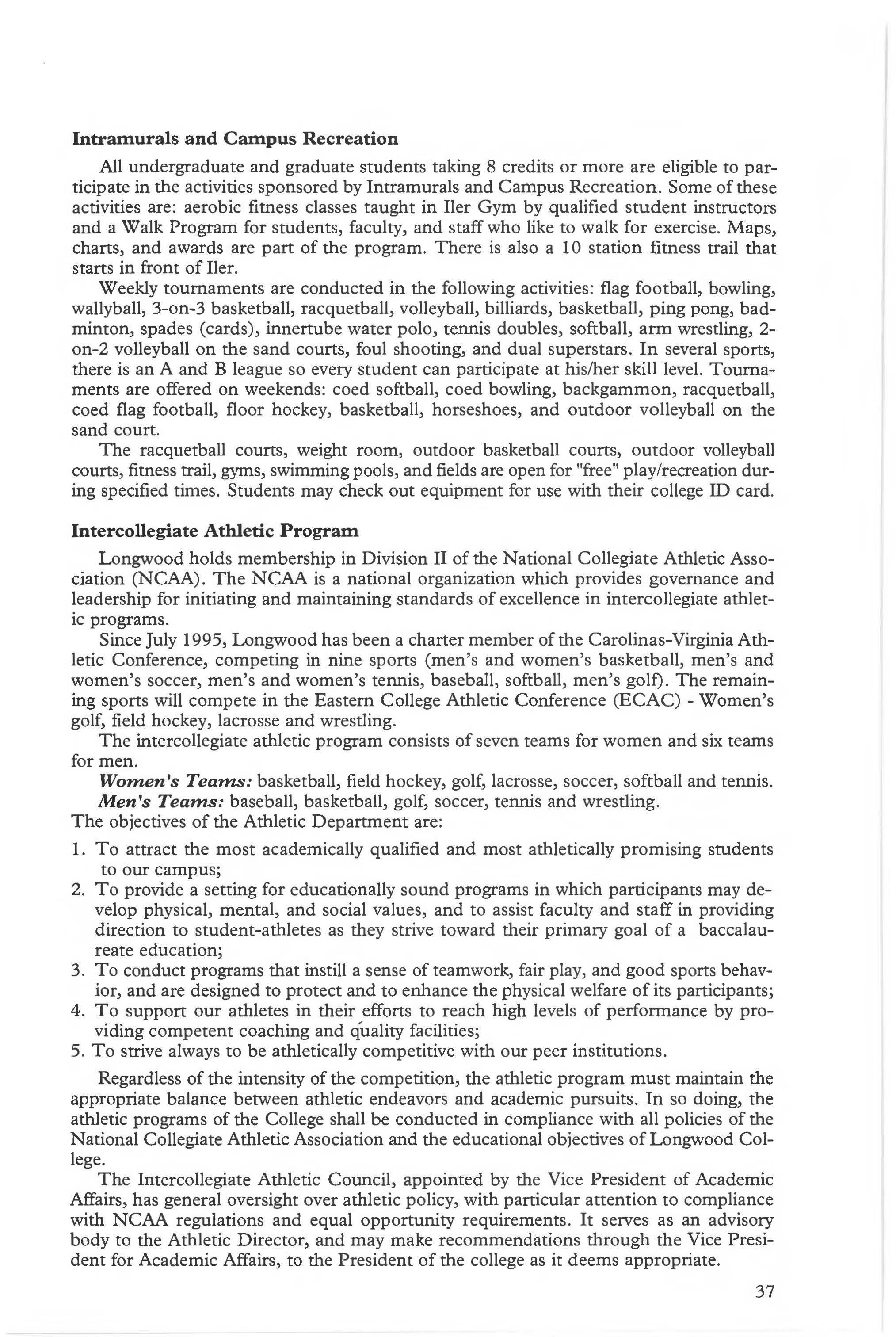
Longwood holds membership in Division II of the National Collegiate Athletic Association (NCAA). The NCAA is a national organization which provides governance and leadership for initiating and maintaining standards of excellence in intercollegiate athletic programs.
Since July 1995, Longwood has been a charter member of the Carolinas-Virginia Athletic Conference, competing in nine sports (men's and women's basketball, men's and women's soccer, men's and women's tennis, baseball, softball, men's golf). The remaining sports will compete in the Eastern College Athletic Conference (ECAC) Women's golf, field hockey, lacrosse and wrestling.
The intercollegiate athletic program consists of seven teams for women and six teams for men.
Women's Teams: basketball, field hockey, golf, lacrosse, soccer, softball and tennis.
Men's Teams: baseball, basketball, golf, soccer, tennis and wrestling. The objectives of the Athletic Department are:
1. To attract the most academically qualified and most athletically promising students to our campus;
2. To provide a setting for educationally sound programs in which participants may develop physical, mental, and social values, and to assist faculty and staff in providing direction to student-athletes as they strive toward their primary goal of a baccalaureate education;
3. To conduct programs that instill a sense of teamwork, fair play, and good sports behavior, and are designed to protect and to enhance the physical welfare of its participants;
4. To support our athletes in their efforts to reach high levels of performance by providing competent coaching and quality facilities;
5 . To strive always to be athletically competitive with our peer institutions.
Regardless of the intensity of the competition, the athletic program must maintain the appropriate balance between athletic endeavors and academic pursuits. In so doing, the athletic programs of the College shall be conducted in compliance with all policies of the National Collegiate Athletic Association and the educational objectives of Longwood College.
The Intercollegiate Athletic Council, appointed by the Vice President of Academic Affairs, has general oversight over athletic policy, with particular attention to compliance with NCAA regulations and equal opportunity requirements. It serves as an advisory body to the Athletic Director, and may make recommendations through the Vice President for Academic Affairs, to the President of the college as it deems appropriate.
As part of their education and experience at Longwood, students refine ideals and values, and connect these values with personal and academic goals. The Farmville churches value students, and many sponsor groups and activities designed to meet the spiritual interests of students. Students are encouraged to participate in the religious life of the community.
The Campus Police have the responsibility of law enforcement, security, and parking enforcement. The south-center portion of the Graham Building houses the Campus Police Operations Center. A student escort service is available. The telephone number is 2091.
Parking areas are limited on the Longwood campus. As a result, parking is by Longwood permit only for students, faculty, and staff. Every attempt is made to provide ample parking on the campus; however, Longwood cannot guarantee a place on campus for every student wishing to bring a vehicle, nor is it liable for theft from, or vandalism of, these vehicles while parked on campus .
The Counseling Center provides the services of professional counselors to students facing challenges and problems in any area of academic or personal development. The Counseling Center's staff members are committed to helping students achieve the maximum from their education, as well as their personal experiences and involvement. Students come to the Counseling Center to learn more about themselves and their life goals and to deal with problems and issues that are difficult to resolve alone. In addition to individual counseling, a variety of workshops and support groups are offered. All services are confidential.
Wellness programs at Longwood are designed to assist students in assuming responsibility for their lives and to help them make informed, healthy choices. The wellness concept encompasses intellectual, physical, emotional, occupational, social, and spiritual health and is incorporated into the student development goals. Longwood encourages wellness through academic and co-curricular activities, the residential experience, and student-led educational programs.The Wellness Center coordinates the College's substance abuse and sexual assault prevention programs. The center offers information and educational programs on alcohol and other drugs, sexual abuse, sexuality, and other health issues. Programs are designed to increase student knowledge about the issues, improve their ability to make health-enhancing choices, and provide information about campus resources.
Planning for a career/ advanced study and learning the techniques for securing meaningful employment after graduation are integral parts of the collegiate experience. The Career Center assists students in that developmental process.
Within the Career Center's Library, students may obtain information regarding career options and utilize materials which will assist them in identifying and evaluating their values, skills, and interests . Computerized career guidance systems such as Sigi Plus are available to guide students through the process of selecting a career . In addition, Graduate School Selector and review software are helpful to students considering graduate school as an option. Workshops on job search strategies, interviewing skills and resume /letter writing, along with special topical programs are presented The Center also serves as a liaison for students, alumni, and prospective employers.
All seniors are encouraged to establish a credentials file which may be mailed to prospective employers upon request. A fee is charged to establish the file which is maintained for ten years after the date of graduation.
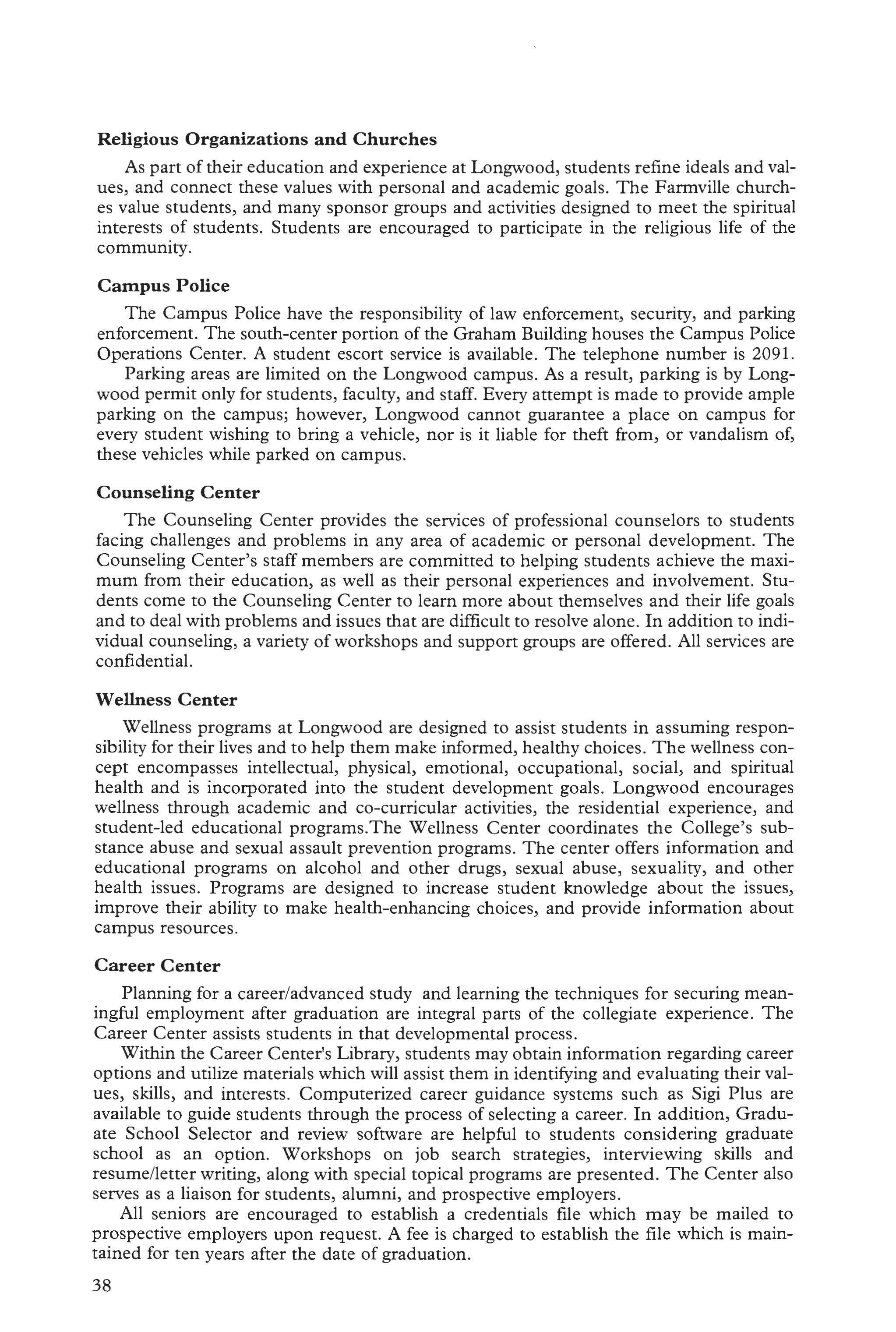
The Work Experience Program, under the Career Center, is a student employment activity designed to help students finance their college education, recognize work experience as a valid career exploration tool, and increase their marketability upon graduation. The program offers many advantages to students and to the community.
Longwood's Work Experience includes the following programs:
Federal Work-Study: designed for those students who have demonstrated financial need.
College Work-Study: institutionally funded and administered parallel to the federal program.
Community Service: developed for off-campus employment opportunities, with primary goal being to encourage students to participate in community service activities.
Longwood maintains Student Health Services for students needing nursing and medical care, as well as preventive health care. Services of consultants, hospitalization, private nurses, prescriptions, x-rays, and laboratory tests are at the expense of the student. All student health records are confidential.
Southside Community Hospital is located only a few blocks from Longwood. It is well-equipped and has a capable staff of physicians and surgeons.
Full-time graduate and undergraduate students must have a Health Record on file in Student Health. State law requires that all students must be immunized against measles, rubella, mumps, polio, diptheria, and tetanus. Screening for tuberculosis, with PPD (mantoux) test and/or chest x-ray, is also required. Failure to comply will result in a stop code being placed on registration. Students are encouraged to maintain a personal record of immunizations should they decide to enroll at other institutions.

A physician is available to see students on a regular basis each week during the academic year by appointment. A nurse practitioner is also available by appointment. Allergy injections are given only when a physician is in attendance.
Longwood College strongly recommends that all full-time students have health insurance coverage. Students who need health insurance coverage may wish to purchase the school accident and sickness insurance plan. Brochures are available in Student Health. Premiums must be paid by the student to the insurance carrier.
Longwood carries liability insurance for all students engaged in observation and field experiences. Medical malpractice insurance is provided to students in the allied health programs acting within their assignments.
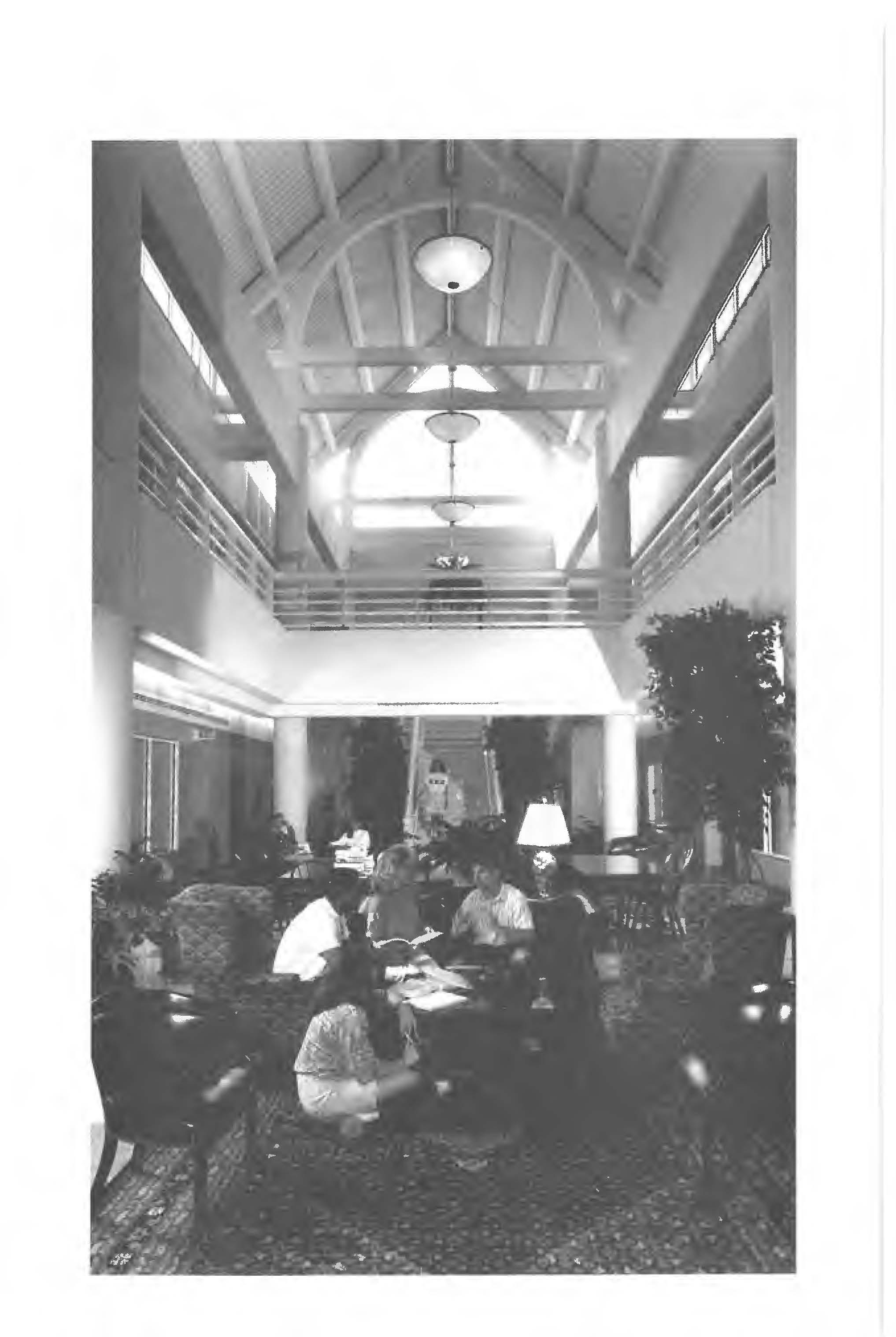
Summarized in this section is important information related to the academic work of the College. Students must be familiar with the information in this section. It is the responsibility of each student to be certain that academic requirements necessary for graduation are completely fulfilled. The catalog for the year in which a student enters Longwood College governs academic regulations, general education, and graduation requirements. Transfer students may choose the catalog which applies to continuous full-time students at their class level. If a student reenrolls in Longwood College after an absence of two or more semesters, the applicable catalog will be the one in effect at the time of re-enrollment. Deans and Department Chairs may waive or substitute major course requirements where appropriate. Under extenuating circumstances, exceptions to academic policies may be presented to the Faculty Petitions Committee. Students must contact the Registrar for information and deadlines for submitting an appeal.
The purpose of assessment at Longwood College is (a) to help individual students develop to their fullest potential and (b) to improve the educational programs of the College. In the case of both the student and the College, we intend to assess how effectively consensually developed goals are being achieved, and based on these assessment data, we intend to generate recommendations and plans of action that will help achieve these goals.
In 1986 the Virginia Senate adopted Joint Resolution 83 directing state institutions of higher education to "establish assessment programs to measure student achievement." Additionally, the Southern Association of Colleges and Schools requires for accreditation that an institution "must define its expected educational results and describe how the achievement of these results will be ascertained" (Criteria for Accreditation: Commission on Colleges, Section III: Institutional Effectiveness, 1989).
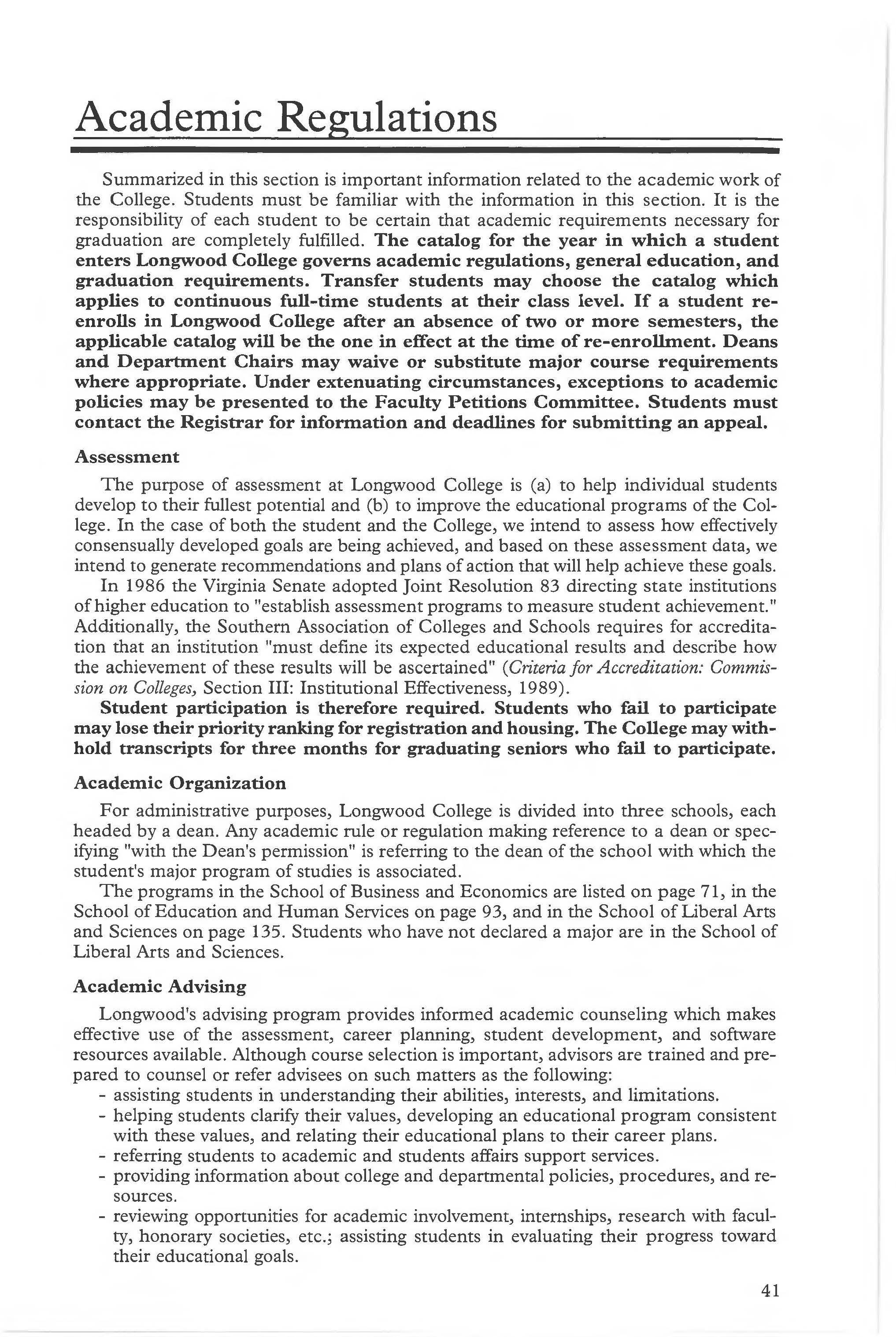
Student participation is therefore required. Students who fail to participate may lose their priority ranking for registration and housing. The College may withhold transcripts for three months for graduating seniors who fail to participate.
For administrative purposes, Longwood College is divided into three schools, each headed by a dean. Any academic rule or regulation making reference to a dean or specifying "with the Dean's permission" is referring to the dean of the school with which the student's major program of studies is associated.
The programs in the School of Business and Economics are listed on page 71, in the School of Education and Human Services on page 93, and in the School of Liberal Arts and Sciences on page 135. Students who have not declared a major are in the School of Liberal Arts and Sciences.
Longwood's advising program provides informed academic counseling which makes effective use of the assessment, career planning, student development, and software resources available. Although course selection is important, advisors are trained and prepared to counsel or refer advisees on such matters as the following: assisting students in understanding their abilities, interests, and limitations. helping students clarify their values, developing an educational program consistent with these values, and relating their educational plans to their career plans. referring students to academic and students affairs support services. providing information about college and departmental policies, procedures, and resources.
reviewing opportunities for academic involvement, internships, research with faculty, honorary societies, etc.; assisting students in evaluating their progress toward their educational goals.
Newly admitted students who have declared their intention to pursue a degree in a particular discipline are assigned advisors in the appropriate school. The assignment of the advisor generally is not changed unless the student changes his/her degree program. Students who have not declared a major are advised by a special group of advisors who participate in the Longwood Seminar program.
Prior to registration, students are required to consult with their assigned academic advisor regarding course selection, career goals, and relevant academic policies. Advisor signatures are required on all registration forms. (Note: Students who do not consult with their advisor prior to registering for class may be prohibited from using telephone registration.)
Although the academic advisor assists students with curriculum decisions and options, the student bears full responsibility for meeting graduation requirements.
Students may declare a major upon entering Longwood. Undeclared students who have completed at least 45 credit hours must declare a major prior to registration. To change a major, a student must complete a Change of Major form available in the Registrar's Office.
Any student identified by a faculty member as lacking proficiency in English composition may be referred to the English Proficiency Committee for testing. If the test reflects an inability to write correctly and effectively according to the standards established by the faculty of the college, the student will be placed on communication condition. Students placed on communication condition must undertake the remedial work stipulated by the English Proficiency Committee (usually English 061) by the semester after they are placed on condition and continue it until they pass the examination. Students may not participate in an internship or graduate until they have demonstrated proficiency by passing the examination.

The courses listed in this catalog that are numbered between 100 and 199 are designed primarily for first and second year students; those between 200 and 299 are for first, second, and third year students; those between 300 and 399 are for second, third, and fourth year students; and those between 400 and 499 are for third and fourth year students. Undergraduate Honors Research Courses are numbered 498 and 499. Courses numbered from 500 to 599 are for graduates and advanced undergraduates; courses numbered 600 to 699 are for graduates only.
Course numbers between 000 and 099 indicate foundation level courses. These courses may be required of some students to master deficiencies in certain fundamental skill areas prior to enrolling in courses requiring those skills. Foundation level courses do not carry credit toward an undergraduate degree.
Selected undergraduate "Honors" course carry the designation 'Section 50' in the Master Schedule of Classes. A full description of the Honors Program and the eligibility requirements for these courses appears on page 67.
The College is organized on the semester plan whereby the credit hour, abbreviated as "credit," is the semester hour. Freshmen normally carry 15 to 17 credits, but may carry 18 credits if they earned at least 2.0 on their previous semester's work. Upperclass students normally carry 15 to 18 credits, but may carry up to 21 if they earned at least 2.0 on their previous semester's work. Students on probation or readmitted after suspension may not enroll in more than 15 credits per semester. A schedule beyond these limits requires special permission from the student's dean or department chair. Students must take at least 12 credits to maintain full-time status.
Undergraduate students are expected to register in person or by telephone during one of the opportunities provided during the academic year:
1. Registration normally a two week period in November for the following spring semester or in March/April for the following fall semester and limited to currently enrolled degree-seeking students.
2. Late registration the day immediately preceding the first day of classes each semester. (An additional fee is incurred by the student who does not register prior to late registration.)
3. Summer Preview special registration procedures are provided for new freshmen and new transfer students during summer orientation. New students who cannot attend one of these programs register on late registration day.
Add Period Students may make schedule adjustments (adds and/or drops) during the first five class days of each semester. An advisor signature is required for any change made during this period.
Drop Period Students may drop classes (with advisor approval) during the first ten class days of each semester. Courses dropped during this period do not appear on the transcript.
"Free W" (No Academic Penalty Withdrawal) Period Students may withdraw from individual classes with a grade of "W" (not computed in the GPA) through noon on Friday of the seventh full week of classes. Residential students who fall below full-time status with such a withdrawal will be referred to the academic dean for special permission.
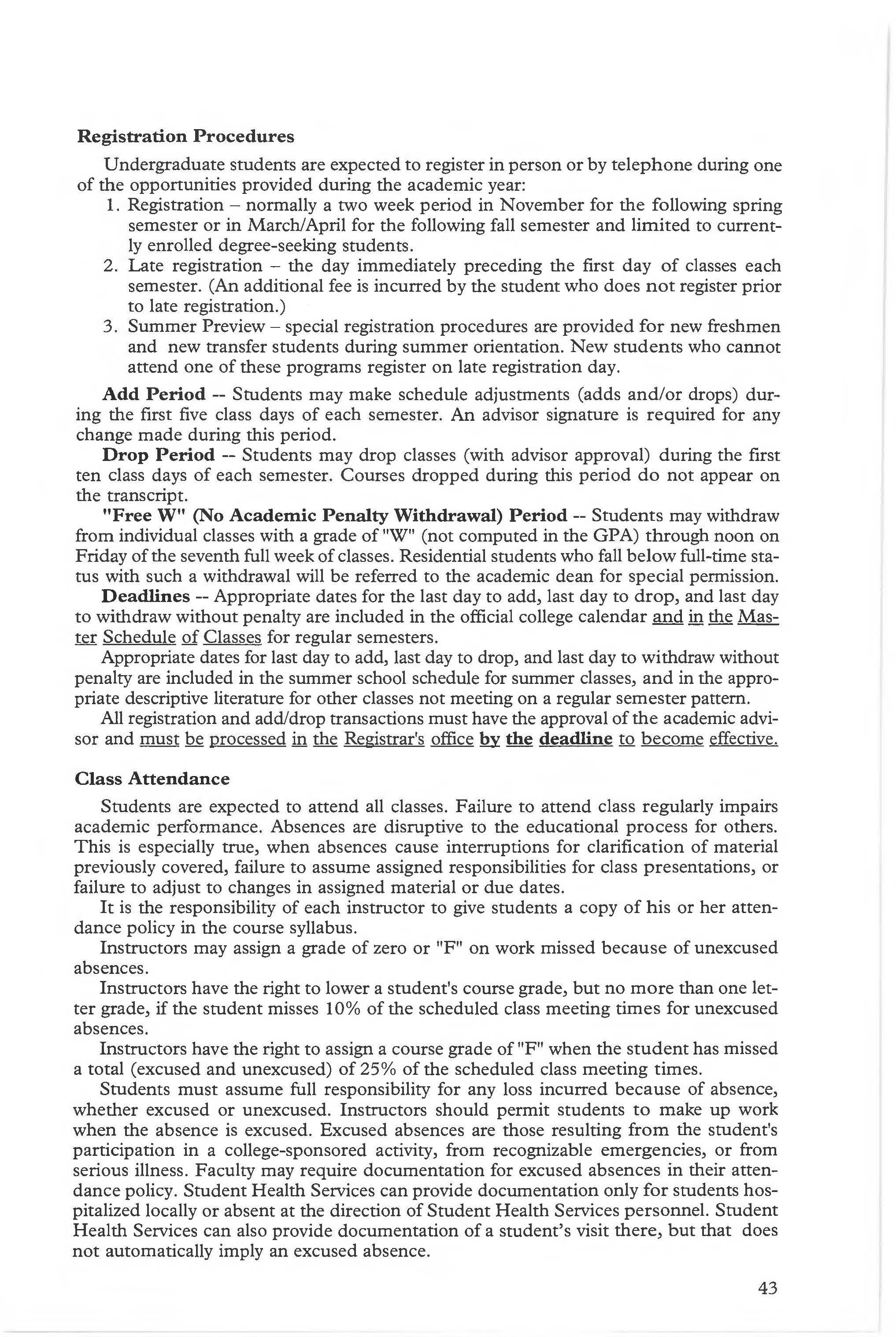
Deadlines Appropriate dates for the last day to add, last day to drop, and last day to withdraw without penalty are included in the official college calendar and in the Master Schedule of Classes for regular semesters.
Appropriate dates for last day to add, last day to drop, and last day to withdraw without penalty are included in the summer school schedule for summer classes, and in the appropriate descriptive literature for other classes not meeting on a regular semester pattern.
All registration and add/drop transactions must have the approval of the academic advisor and must be processed in the Registrar's office the deadline to become effective.
Students are expected to attend all classes. Failure to attend class regularly impairs academic performance. Absences are disruptive to the educational process for others. This is especially true, when absences cause interruptions for clarification of material previously covered, failure to assume assigned responsibilities for class presentations, or failure to adjust to changes in assigned material or due dates.
It is the responsibility of each instructor to give students a copy of his or her attendance policy in the course syllabus.
Instructors may assign a grade of zero or "F" on work missed because of unexcused absences.
Instructors have the right to lower a student's course grade, but no more than one letter grade, if the student misses 10% of the scheduled class meeting times for unexcused absences.
Instructors have the right to assign a course grade of "F" when the student has missed a total (excused and unexcused) of 25% of the scheduled class meeting times.
Students must assume full responsibility for any loss incurred because of absence, whether excused or unexcused. Instructors should permit students to make up work when the absence is excused. Excused absences are those resulting from the student's participation in a college-sponsored activity, from recognizable emergencies, or from serious illness. Faculty may require documentation for excused absences in their attendance policy. Student Health Services can provide documentation only for students hospitalized locally or absent at the direction of Student Health Services personnel. Student Health Services can also provide documentation of a student's visit there, but that does not automatically imply an excused absence.
Written comprehensive examinations are given at the end of each course. For the regular session, three hour examination blocks are scheduled during the final examination period which is indicated as part of the official college calendar. This scheduling is based on the course meeting pattern and is published with the Master Schedule of Classes for the semester.
During the summer session and for courses not offered according to the traditional semester format, the examination is normally given at the time of the final class session.
Students may withdraw from individual classes with a grade of "W" until noon on Friday of the seventh full week of classes. After that date, withdrawals from individual classes are not permitted except for medical or other non-academic emergencies. A student who withdraws, for medical reasons, from the College or from a class after the seventh full week of classes must, by noon of the last class day, have a letter sent to the Dean of the student's school by a physician, detailing the nature of the illness and recommending withdrawal for medical reasons. In extenuating circumstances not related to academic performance, the Dean may grant a withdrawal if a written request from the student is received by noon of the last class day. If the Dean approves the request, the Dean will send a copy of the request or letter to the Registrar and all affected grades for that semester will be noted as "W" on the student's transcript. The Dean will notify the student's faculty members of any grade changes.
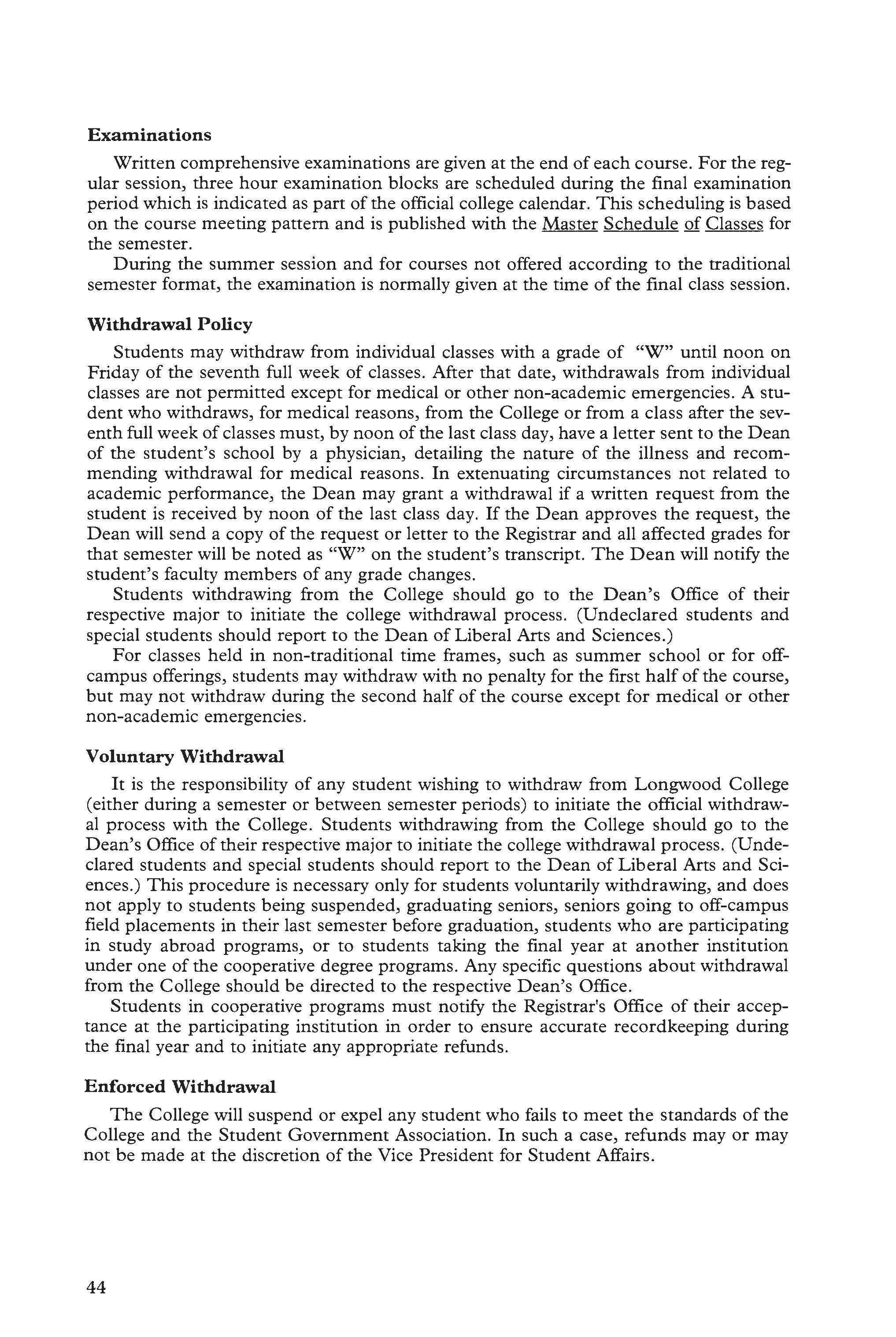
Students withdrawing from the College should go to the Dean's Office of their respective major to initiate the college withdrawal process. (Undeclared students and special students should report to the Dean of Liberal Arts and Sciences.)
For classes held in non-traditional time frames, such as summer school or for offcampus offerings, students may withdraw with no penalty for the first half of the course, but may not withdraw during the second half of the course except for medical or other non-academic emergencies.
It is the responsibility of any student wishing to withdraw from Longwood College (either during a semester or between semester periods) to initiate the official withdrawal process with the College. Students withdrawing from the College should go to the Dean's Office of their respective major to initiate the college withdrawal process. (U ndeclared students and special students should report to the Dean of Liberal Arts and Sciences.) This procedure is necessary only for students voluntarily withdrawing, and does not apply to students being suspended, graduating seniors, seniors going to off-campus field placements in their last semester before graduation, students who are participating in study abroad programs, or to students taking the final year at another institution under one of the cooperative degree programs. Any specific questions about withdrawal from the College should be directed to the respective Dean's Office.
Students in cooperative programs must notify the Registrar's Office of their acceptance at the participating institution in order to ensure accurate recordkeeping during the final year and to initiate any appropriate refunds.
The College will suspend or expel any student who fails to meet the standards of the College and the Student Government Association. In such a case, refunds may or may not be made at the discretion of the Vice President for Student Affairs.
The achievement of a student in a course is indicated by the grade that is received. Grades for courses taken for undergraduate credit are recorded as follows:
A: Superior work
B: Above average work
C: Average work
D: Below average, but passing work
P: This grade indicates that the student has received credit for the course on a pass/fail grading option. This option is generally limited to elective courses and to certain courses offered only on a pass/fail basis.
F: Failure
Plus and minus grades may, at the discretion of the instructor involved , be recorded. Pluses and minuses do not affect the computation of the grade point average .
I: This grade indicates that because of illness or for other good reason the work of the semester has not been completed. When this work has been completed acceptably, a final grade will be reported. A grade of "Incomplete" will revert automatical ly to a grade of "F" if the necessary makeup work has not been completed and the grade recorded by the middle of the subsequent regular semester.
R: Re-enroll. This symbol indicates that a student has made satisfactory progress, but needs to repeat the course to reach the required exit proficiency level. The R grade will be used only in English 051, and 061 and Mathematics 004.
AU: This symbol indicates participation on a non-credit (audit) basis by students who meet certain minimum standards set by the course instructor. Students wishing to audit must have permission from the chair of the department (except for courses in the School of Business and Economics, see the Dean) in which the course is offered and are subject to the same tuition and fees as students enrolled for credit.
W: This symbol indicates withdrawal without penalty . It is automatically assigned for withdrawal from the end of the drop period (first two weeks) through the seventh week of the semester and for other documented withdrawals (see paragraph on Withdrawal Policy).
Students may take certain courses under the pass/fail system approved by the faculty in 1974. Pass/Fail courses are open to undergraduate students with 30 or more credit hours. A student may take a maximum of three courses; these courses may not be those which are required for general education or for major or minor requirements. Special non-degree students may also elect the pass/fail grading option.
The student must do satisfactory work in order to obtain a passing grade. Satisfactory work is defined as "C" work or better. Courses taken under the pass/fail option will not be included in the calculation of the grade point average. Students who wish to take a course for Pass/Fail credit must notify the Registrar of that fact by the end of the first six weeks of classes in the semester, or the equivalent portion of a summer session. Once this declaration is made, grading status cannot be changed.
In addition to the elective pass/fail grading option described above, certain courses in the college curriculum are designated for pass/fail grading Such courses do not ordinarily satisfy general education, major, or minor requirements; the students enrolled do not need to make any special declaration and are subject to no restrictions.
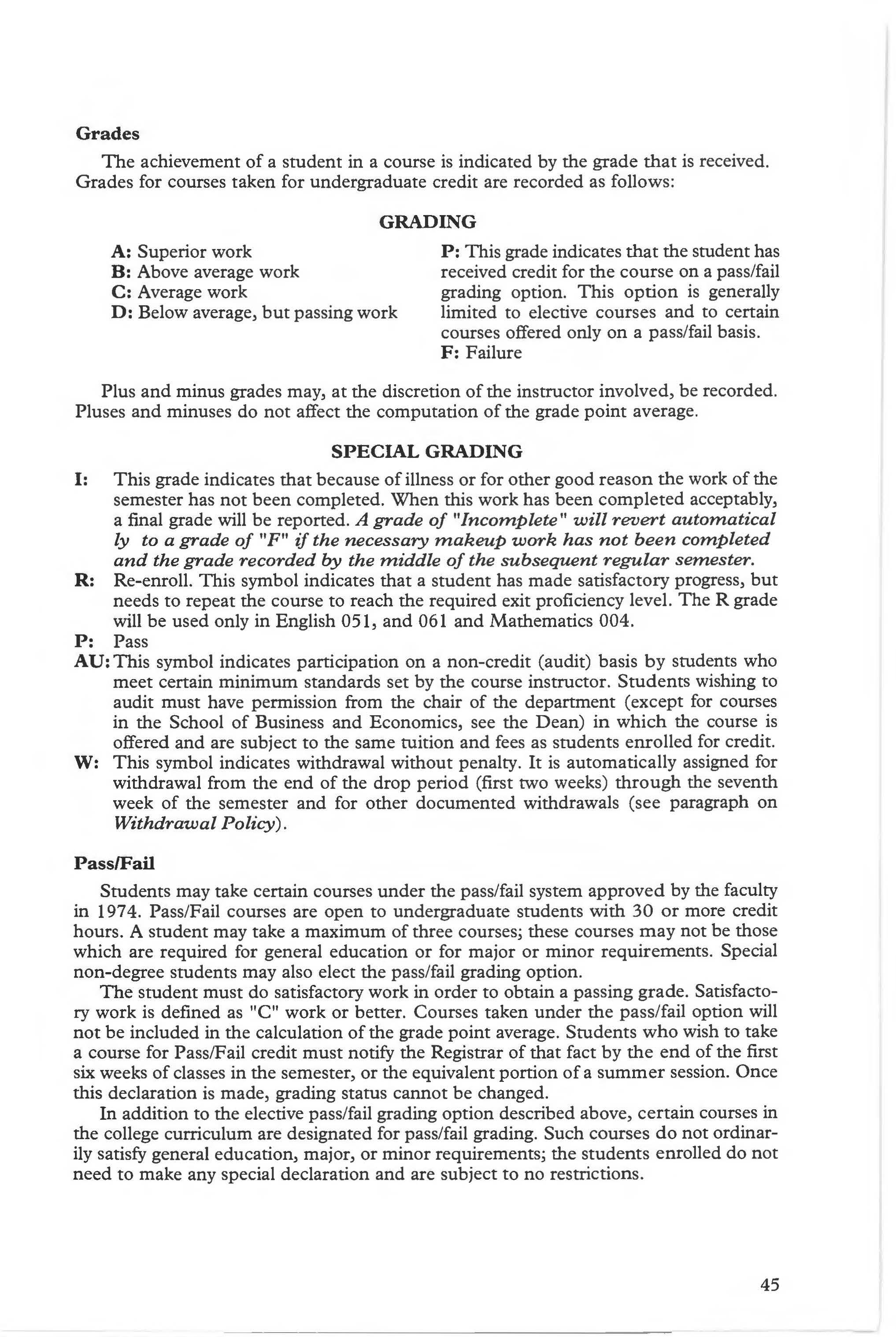
Class size permitting and with department approval, a student may register for a course on an audit basis. Auditing a course means that a student enrolls in a course but does not receive academic credit. A student who registers for audit may be subject to other course requirements at the discretion of the instructor. Audit students are charged the regular rate of tuition and fees, and an audit course is counted as part of the student's semester load. (For purposes of enrollment certification for VA benefits or other programs requiring "for credit" enrollment, audit courses will not count toward the minimum number of credits required for full-time status.)
A change in registration from "audit" to "credit" or from "credit" to "audit" must be effected by the end of the add period. A course taken for audit cannot be changed to credit at a later date, nor can a course taken for credit be changed at a later date to audit.
The quality of work completed by a student is recognized by the assignment of points to the various grades, commonly referred to as the Four Point System.
Under this system, 4 quality points are given for each credit on which an "A" grade is made; 3 quality points are given for each credit on which a "B" grade is made; 2 quality points are given for each credit on which a "C" grade is made; and I quality point is given for each credit on which a "D" grade is made. No quality points are given if a grade of "F" is made.
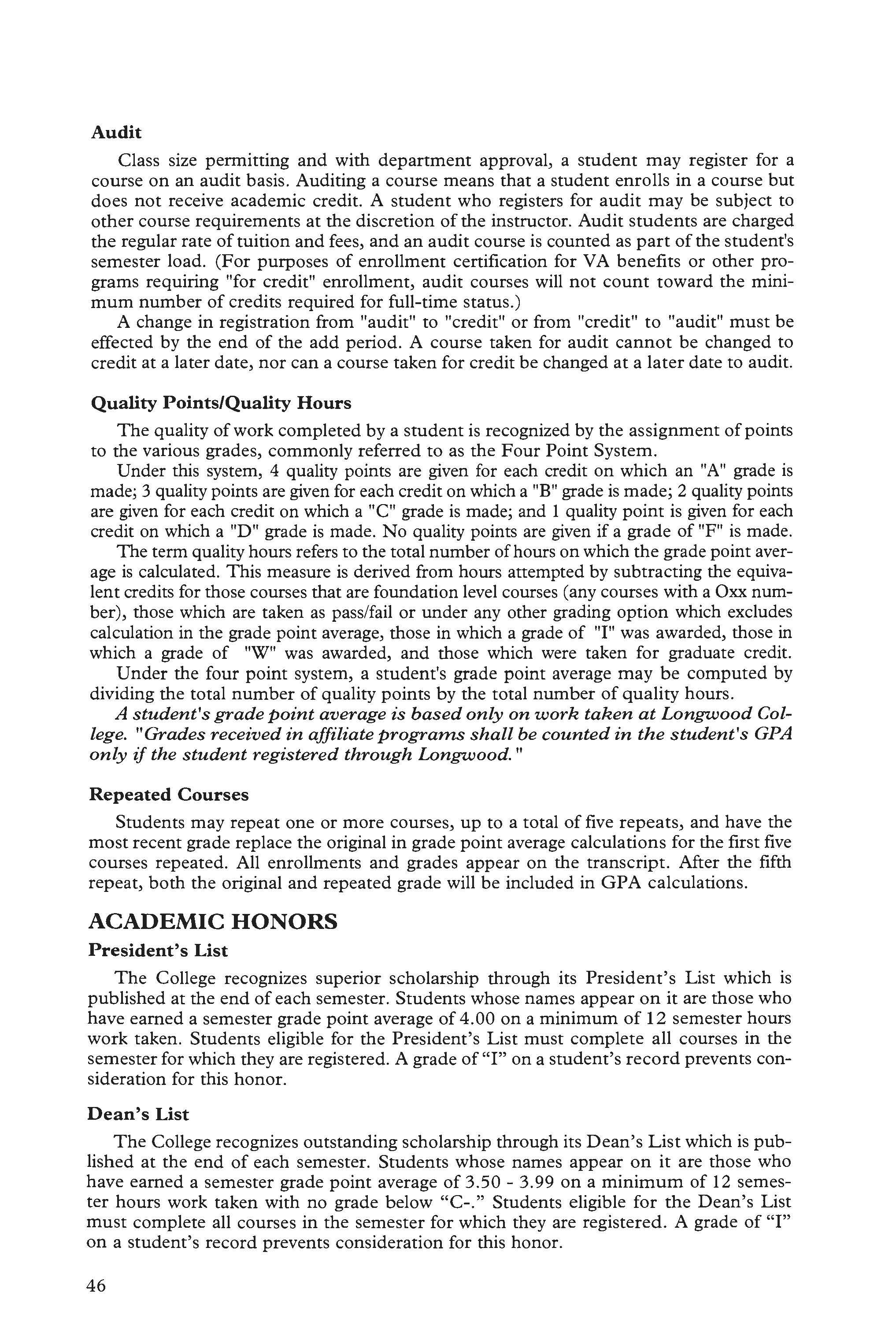
The term quality hours refers to the total number of hours on which the grade point average is calculated. This measure is derived from hours attempted by subtracting the equivalent credits for those courses that are foundation level courses (any courses with a Oxx number), those which are taken as pass/fail or under any other grading option which excludes calculation in the grade point average, those in which a grade of "I" was awarded, those in which a grade of "W" was awarded, and those which were taken for graduate credit.
Under the four point system, a student's grade point average may be computed by dividing the total number of quality points by the total number of quality hours.
A student's grade point average is based only on work taken at Longwood College. "Grades received in affiliate programs shall be counted in the student's GPA only if the student registered through Longwood. "
Students may repeat one or more courses, up to a total of five repeats, and have the most recent grade replace the original in grade point average calculations for the first five courses repeated. All enrollments and grades appear on the transcript. After the fifth repeat, both the original and repeated grade will be included in GPA calculations.
The College recognizes superior scholarship through its President's List which is published at the end of each semester. Students whose names appear on it are those who have earned a semester grade point average of 4.00 on a minimum of 12 semester hours work taken. Students eligible for the President's List must complete all courses in the semester for which they are registered. A grade of "I" on a student's record prevents consideration for this honor.
The College recognizes outstanding scholarship through its Dean's List which is published at the end of each semester. Students whose names appear on it are those who have earned a semester grade point average of 3.50 3.99 on a minimum of 12 semester hours work taken with no grade below "C-." Students eligible for the Dean's List must complete all courses in the semester for which they are registered. A grade of "I" on a student's record prevents consideration for this honor.
During the regular session, grade estimates are issued to all first-year students, students making a "D" or "F", and students who are not making satisfactory academic progress (all students with a cumlative gpa less than 2.0). Estimate grades are due to the Registrar by noon on Monday of the sixth full week of classes and are mailed to the student at the permanent address with copies provided to the academic advisor and to the Dean of the School.
Estimates are not recorded as part of the student's permanent academic record. They are, however, an important warning of academic risk to students and advisors.
The faculty of Longwood College is unequivocally committed to the principle that evaluation of student work and assignment of grades is a responsibility and a prerogative to be exercised solely by the individual instructor.
However, should a student feels the final course grade received was unfairly or inaccurately awarded, the student first should see the instructor involved, for an explanation of why the grade was assigned. If the student continues to feel the grade is unfair, the student may file a written appeal with the department chair or for students in Business and Economics, the School Dean, giving the reasons why the grade should be changed, with any available supporting evidence. The Department Chair/Dean will forward a copy of the appeal to the faculty member and will invite the faculty member to make a written response. For grades awarded in the fall semester, the written appeal must be submitted no later than February 1; for grades awarded in the spring smester and in summer school, the appeal must be filed no later than September 15. Appeals filed later will not be considered.
The Department Chair/Dean will within two weeks hold a joint consultation with the student and the faculty member awarding the grade. If the matter cannot be resolved, the Department Chair/Dean will within one week of the joint consultation, request in writing that the Executive Committee of the Faculty Senate appoint a committee to review all matters pertinent to the appeal. The committee will consist of three members of the fulltime faculty in the same or related discipline(s). The Department Chair/Dean will send a copy of the request to the Vice President for Academic Affairs. When the committee has been named, the Executive Committee of the Faculty Senate shall inform the Department Chair/Dean, who will forward to the committee members the student's original written appeal, a course syllabus, any written response from the faculty member, and all other materials pertinent to the appeal. Through the Department Chair/Dean, the committee may request other materials from the student or faculty member. The committee shall decide that the grade originally assigned will remain unchanged or that it will be changed to a grade decided on by the committee. The decision of the committee is final. The committee will report its decision in a letter signed by all three members and addressed to the Department Chair/Dean, with a copy to the Vice President for Academic Affairs, the appropriate Dean, the faculty member, the student, and the Registrar, who will record the grade. The review must be completed so that the grade will be final by the end of the eighth full week of classes.
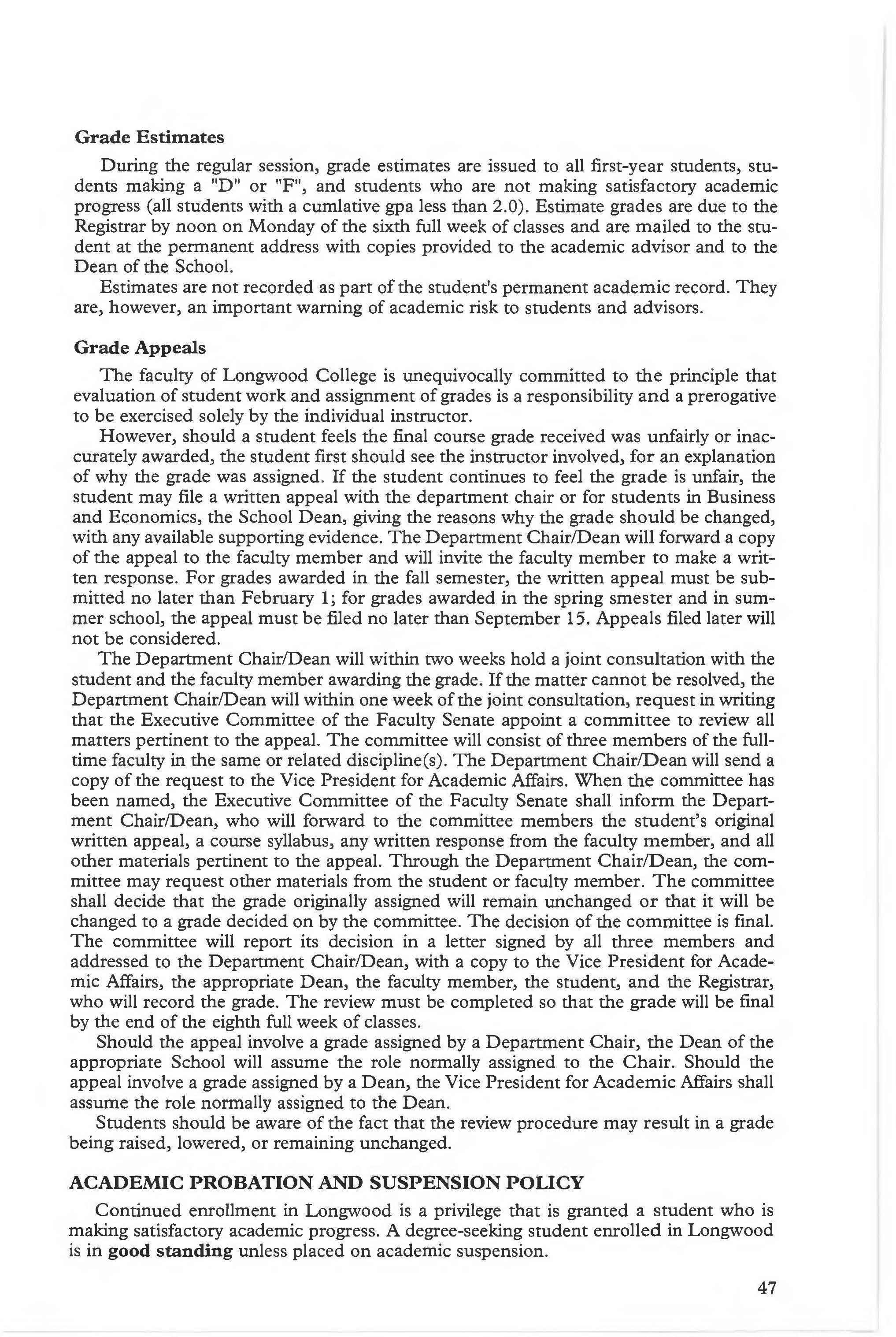
Should the appeal involve a grade assigned by a Department Chair, the Dean of the appropriate School will assume the role normally assigned to the Chair. Should the appeal involve a grade assigned by a Dean, the Vice President for Academic Affairs shall assume the role normally assigned to the Dean.
Students should be aware of the fact that the review procedure may result in a grade being raised, lowered, or remaining unchanged.
Continued enrollment in Longwood is a privilege that is granted a student who is making satisfactory academic progress. A degree-seeking student enrolled in Longwood is in good standing unless placed on academic suspension.
Academic Probation. Students with a cumulative grade point average below the minimum 2.0 are placed on academic probation. This indicates serious academic difficulty and notice is placed on the student's academic record. Students on academic probation may not take more than 15 credits per semester and are encouraged to seek assistance in the Leaming Center.
Academic Suspension. Students will be suspended from Longwood if:
1. they remain on academic probation for two consecutive regular semesters (fall or spring); or
2. their cumulative grade point average falls below 1.2 with 1-23 quality hours at Longwood; or
3. their cumulative grade point average falls below 1.5 with 24 or more quality hours at Longwood.
No student can be suspended for academic reasons after only one semester at Longwood. The first academic suspension means required withdrawal from the College for the semester (fall or spring) immediately following the semester in which the suspension occurs. A second suspension means required withdrawal from the College for a minimum of five calendar years. Notice of suspension is placed on the student's academic record. Under extenuating circumstances, appeals for readmission or other exceptions to academic policies may be presented to the Faculty Petitions Committee. Students must contact the Registrar for information and deadlines for submitting an appeal.
Readmission after Suspension. Suspended students may apply for readmission to Longwood for the semester following completion of the suspension period. The student must apply at least 60 days before enrollment to the Admissions Committee, which will review the student's record and citizenship at Longwood as well as courses taken elsewhere. A student denied readmission may appeal in writing through the Admissions Office to the appropriate deans(s). Readmission to the College is not automatic, even if the student has raised his/her cumulative grade point average.
A student readmitted after suspension must satisfy the following conditions until the student's cumulative grade point average is a minimum of 2.0: 1. enroll under the status of academic probation, 2. maintain a minimum semester grade point average of 2.0 in each semester, and 3. the student may not enroll in more than 15 credits. If a student fails to achieve the minimum grade point average of 2.0 in any semester before achieving a cumulative grade point average of at least 2.0, the student will receive a second suspension . .
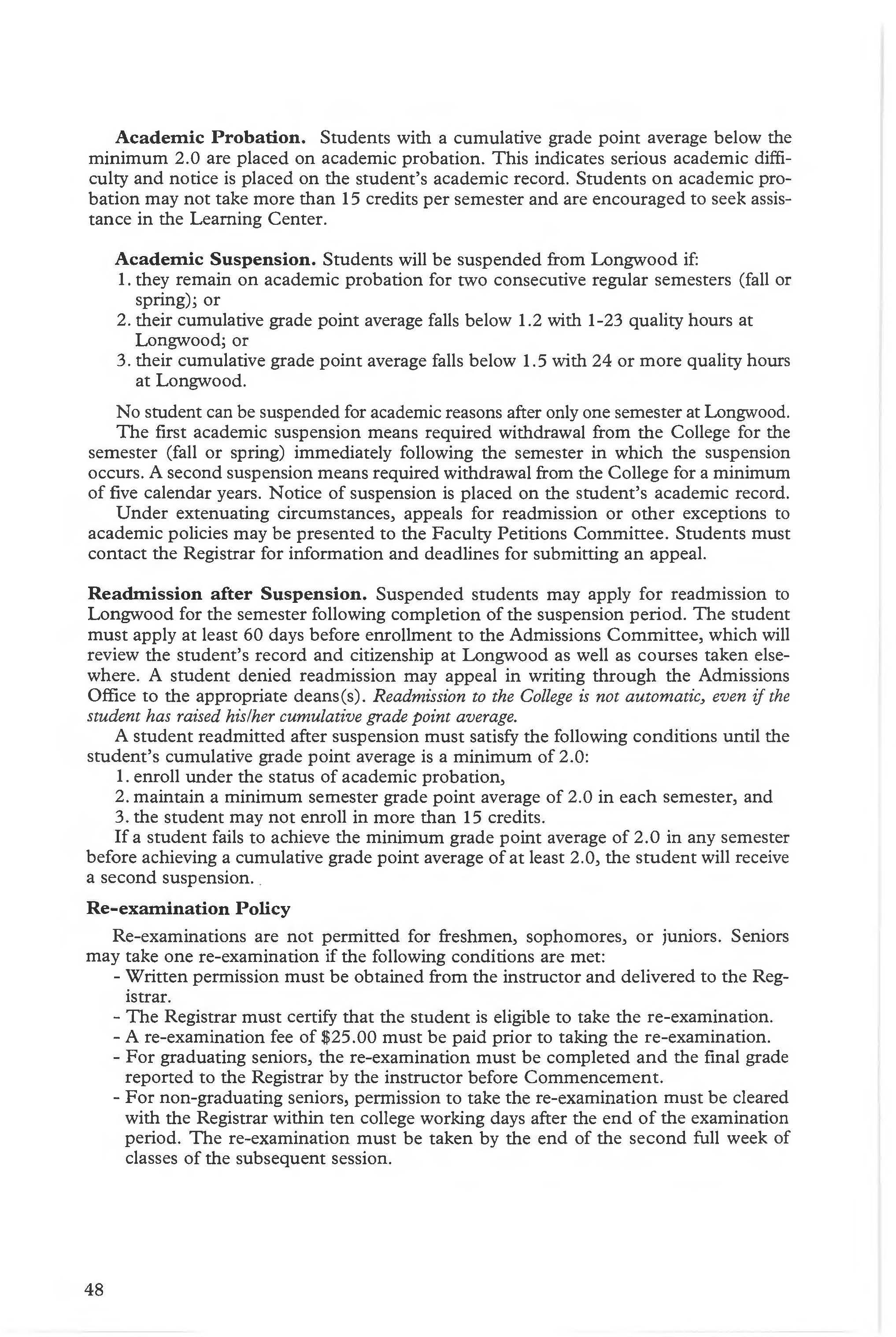
Re-examinations are not permitted for freshmen, sophomores, or juniors. Seniors may take one re-examination if the following conditions are met:
Written permission must be obtained from the instructor and delivered to the Registrar.
The Registrar must certify that the student is eligible to take the re-examination. A re-examination fee of $25.00 must be paid prior to taking the re-examination. For graduating seniors, the re-examination must be completed and the final grade reported to the Registrar by the instructor before Commencement.
For non-graduating seniors, permission to take the re-examination must be cleared with the Registrar within ten college working days after the end of the examination period. The re-examination must be taken by the end of the second full week of classes of the subsequent session.
Longwood College student record policies comply fully with the Family Educational Rights and Privacy Act of 1974, as amended, enacted as section 438 of the General Education Provisions Act. The accumulation, processing, and maintenance of student data by the College is limited to that information, including grades, which is necessary and relevant to the purposes of the college. Personal data of students will be used only for the purpose for which it is collected.
Student data, whenever possible, shall be collected directly from the student; every effort will be made to ensure its accuracy and security. It shall be the express responsibility of the student to notify the Dean of Students' Office of any changes in status. Any student who initially or subsequently refuses to supply accurate and complete personal information as is legally allowed may jeopardize their current student status. Falsification of records with the intent to give untrue information is a violation of the Longwood College Honor Code.
The College shall provide for the confidentiality and security of official student data and will release student information only as follows:
(a) Directory information which may include the student's name, birth date, sex, ethnicity, nationality, local address, permanent address, telephone number, Parent's name, major field of study, classification, participation in officially recognized activities and sports, weight and height of members of athletic teams, dates of attendance, degrees and awards received, most recent educational institution attended by the student, dates of field experience, and other similar information.
A student may inform the Registrar in writing that any or all directory information may not be released without prior written consent. A student who desires to restrict directory information from the public must complete the Student Directory Information Restriction form (available in the Registrar's Office) at the time of registration for the current academic year. Forms received after the last day to add a class for any semester, including summer, will not become effective until the following semester.
(b) To the students themselves.
(c) To parents or a financial institution where financial support of the student is in evidence as defined in Section 152 of the IRS Code of 1970.
(d) To authorized College personnel (administrative officers, faculty, or their designees) who have legitimate educational interests as determined by the College, such as instruction, advising or educational research or in performance of other duties promoting necessary functions and management of the College as approved by the records access control officer.
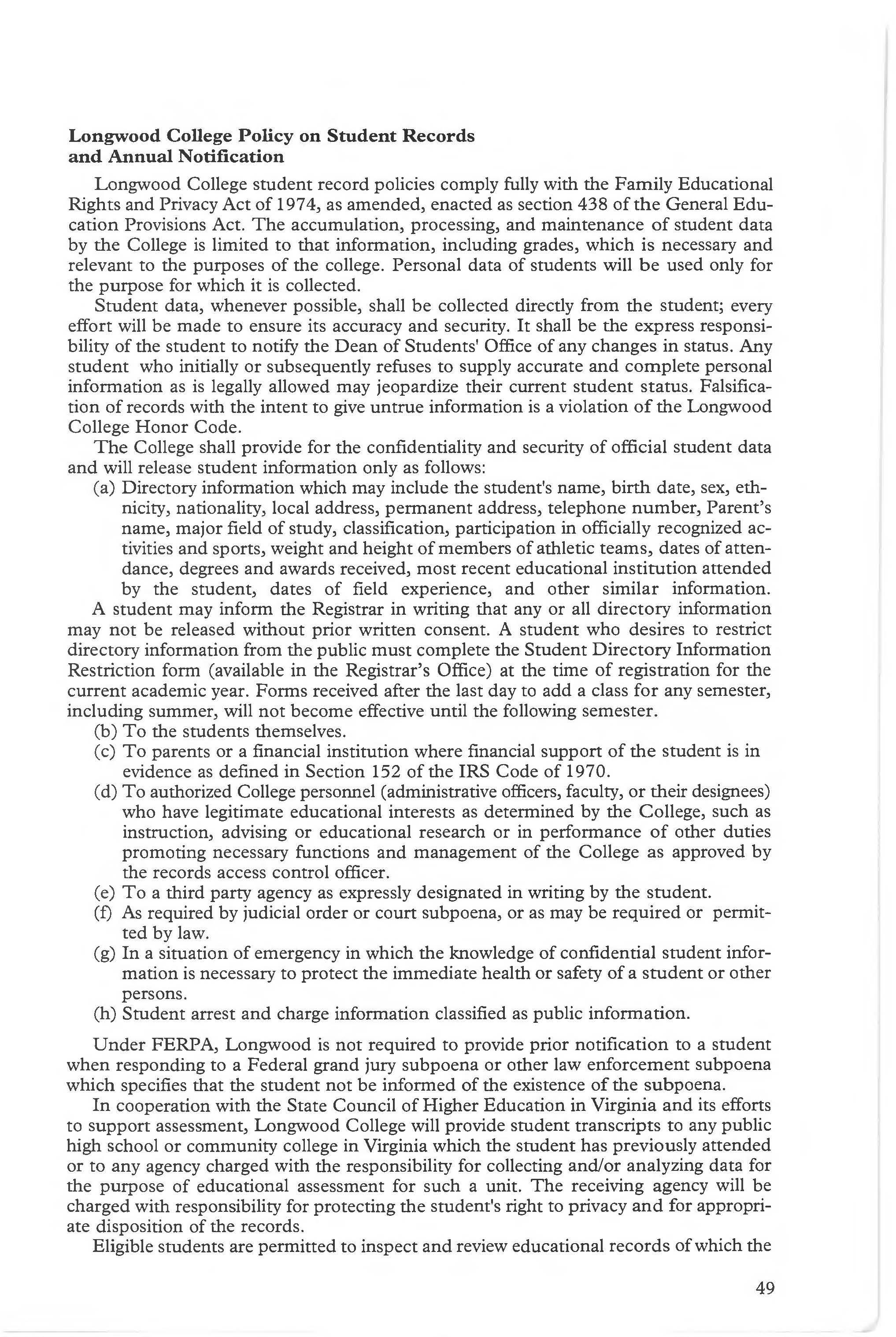
(e) To a third party agency as expressly designated in writing by the student.
(f) As required by judicial order or court subpoena, or as may be required or permitted by law.
(g) In a situation of emergency in which the knowledge of confidential student information is necessary to protect the immediate health or safety of a student or other persons.
(h) Student arrest and charge information classified as public information.
Under FERPA, Longwood is not required to provide prior notification to a student when responding to a Federal grand jury subpoena or other law enforcement subpoena which specifies that the student not be informed of the existence of the subpoena.
In cooperation with the State Council of Higher Education in Virginia and its efforts to support assessment, Longwood College will provide student transcripts to any public high school or community college in Virginia which the student has previously attended or to any agency charged with the responsibility for collecting and/or analyzing data for the purpose of educational assessment for such a unit. The receiving agency will be charged with responsibility for protecting the student's right to privacy and for appropriate disposition of the records.
Eligible students are permitted to inspect and review educational records of which the
student is the sole subject. College policy regarding the inspection and disclosure of educational records is in compliance with the federal statue. To obtain a copy of the Family Rights and Privacy Act of 197 4 (Section 438) or a copy of the college's policy on student records, contact the Registrar's Office, Longwood College, 201 High Street, Farmville, VA 23909.
Student access to all personal records shall be permitted within 45 days of a written request, during normal office hours. All records shall be available and in a form comprehensible to the student except for :
(a) Medical records which, upon written authorization, shall be submitted to a psychologist or physician designated by the student.
(b) Confidential financial statements and records of parents as excluded by law.
(c) Third party confidential recommendations when such access has been waived by the student. Where a waiver has been given, parents as well as students are excluded from viewing such confidential information. Students may also obtain copies of most parts of their records for a nominal fee .
During normal office hours, the College shall provide an opportunity, for a student either in person, or by mail with proper identification, to challenge information believed to be inaccurate, incomplete, inappropriate, or misleading. All personal data challenged by a student shall be investigated by College officials . Completion of an investigation shall result in the following actions :
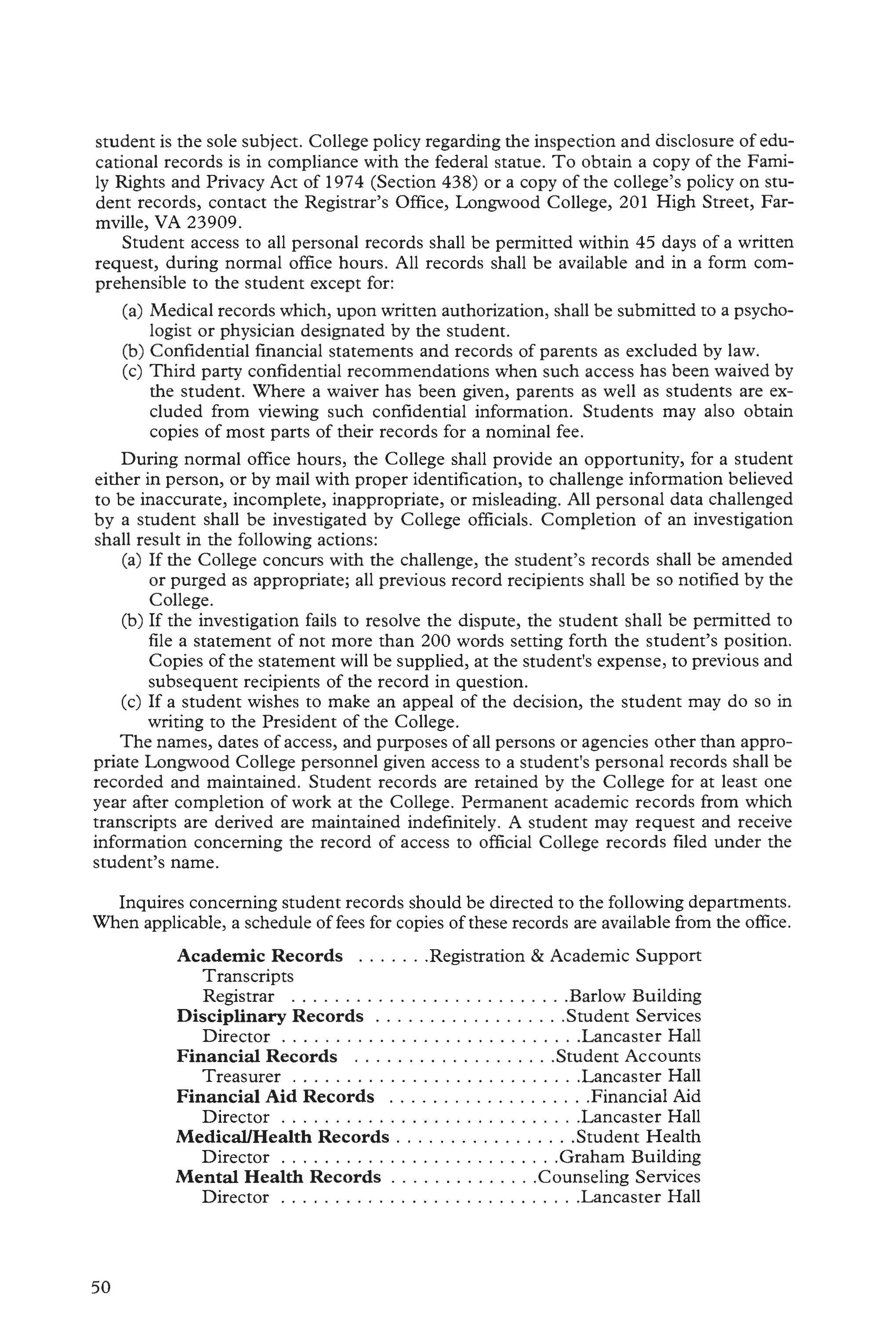
(a) If the College concurs with the challenge, the student's records shall be amended or purged as appropriate; all previous record recipients shall be so notified by the College.
(b) If the investigation fails to resolve the dispute, the student shall be permitted to file a statement of not more than 200 words setting forth the student's position. Copies of the statement will be supplied, at the student's expense, to previous and subsequent recipients of the record in question.
(c) If a student wishes to make an appeal of the decision, the student may do so in writing to the President of the College.
The names, dates of access, and purposes of all persons or agencies other than appropriate Longwood College personnel given access to a student's personal records shall be recorded and maintained. Student records are retained by the College for at least one year after completion of work at the College. Permanent academic records from which transcripts are derived are maintained indefinitely. A student may request and receive information concerning the record of access to official College records filed under the student's name.
Inquires concerning student records should be directed to the following departments . When applicable, a schedule offees for copies of these records are available from the office .
Building
Counseling Services Director
Lancaster Hall
Longwood assumes all undergraduate students to be financially dependent on their parents; therefore, parents have access to student grades, schedules, transcripts, housing records, and directory information. Grade reports will be mailed to students at their permanent (home) address. Duplicate sets of grades can be made available on request and mailed to parents.
A student who wishes to be treated as financially independent must apply for independent status by completing and filing the appropriate form with the Registrar. Upon approval, the student's grades and records will be available only to him or her.
Parents of students who have declared themselves to be financially independent may gain access to student records and grades only by demonstrating to the College that the student is considered a dependent under the IRS code.
All graduate and non-traditional students will be treated as financially independent. Non-traditional students are 24 years or older and do not reside on campus.
Requests for transcripts of academic records should be directed to the Registrar's Office. Upon written request by the student, an official transcript of the academic record will be issued to the person or institution designated, provided that all the student's obligations to Longwood College have been satisfactorily settled
The only circumstances in which a student's transcripts are released in the absence of a written authorization are those specific exceptions stated in the preceding policy on student records .
Written requests for transcript generally require one week for processing.
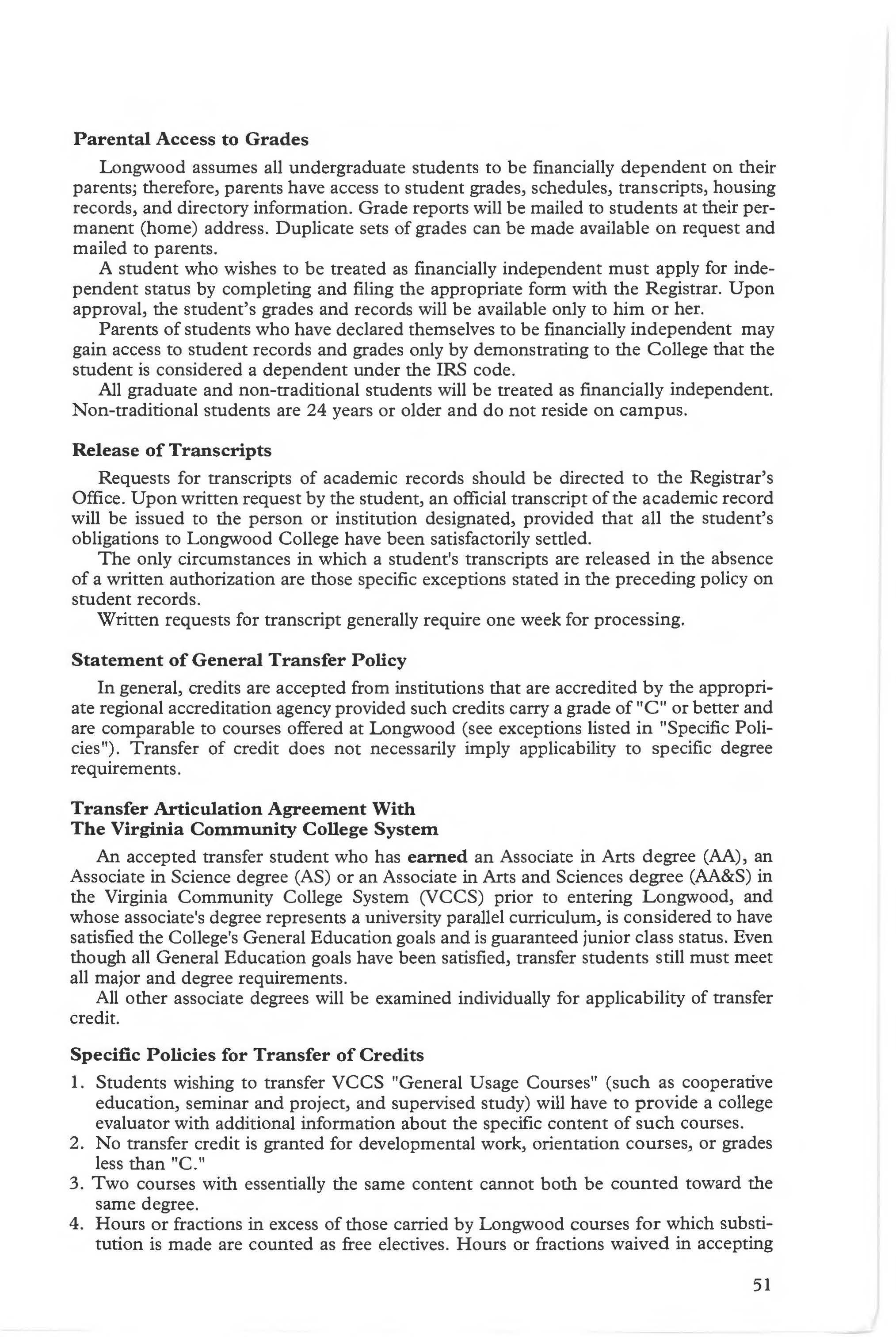
In general, credits are accepted from institutions that are accredited by the appropriate regional accreditation agency provided such credits carry a grade of "C" or better and are comparable to courses offered at Longwood (see exceptions listed in "Specific Policies"). Transfer of credit does not necessarily imply applicability to specific degree requirements.
An accepted transfer student who has earned an Associate in Arts degree (AA), an Associate in Science degree (AS) or an Associate in Arts and Sciences degree (AA&S) in the Virginia Community College System (VCCS) prior to entering Longwood, and whose associate's degree represents a university parallel curriculum, is considered to have satisfied the College's General Education goals and is guaranteed junior class status. Even though all General Education goals have been satisfied, transfer students still must meet all major and degree requirements
All other associate degrees will be examined individually for applicability of transfer credit.
1. Students wishing to transfer VCCS "General Usage Courses" (such as cooperative education, seminar and project, and supervised study) will have to provide a college evaluator with additional information about the specific content of such courses.
2. No transfer credit is granted for developmental work, orientation courses, or grades less than "C."
3. Two courses with essentially the same content cannot both be counted toward the same degree.
4 . Hours or fractions in excess of those carried by Longwood courses for which substitution is made are counted as free electives. Hours or fractions waived in accepting
course substitutions must be made up by elective credits to meet the total semester hour requirements for a degree.
The cumulative grade point average of each student will be calculated only on work taken at Longwood. Transfer credit accepted from other institutions will be used to reduce the number of credits required for graduation, but will not enter into the calculation of the grade point average.
Any regularly enrolled undergraduate who wishes to take work at another institution to transfer to Longwood must secure permission from his/her Dean prior to enrolling in such courses. Prior approval provides the student the opportunity to have the course reviewed to determine: 1) whether the course will transfer; 2) whether the course will satisfy a particular requirement; and 3) whether the course might be considered a duplicate of a course already taken at Longwood. Upon completion of work, official transcripts must be sent from the host institution to his/her Dean.
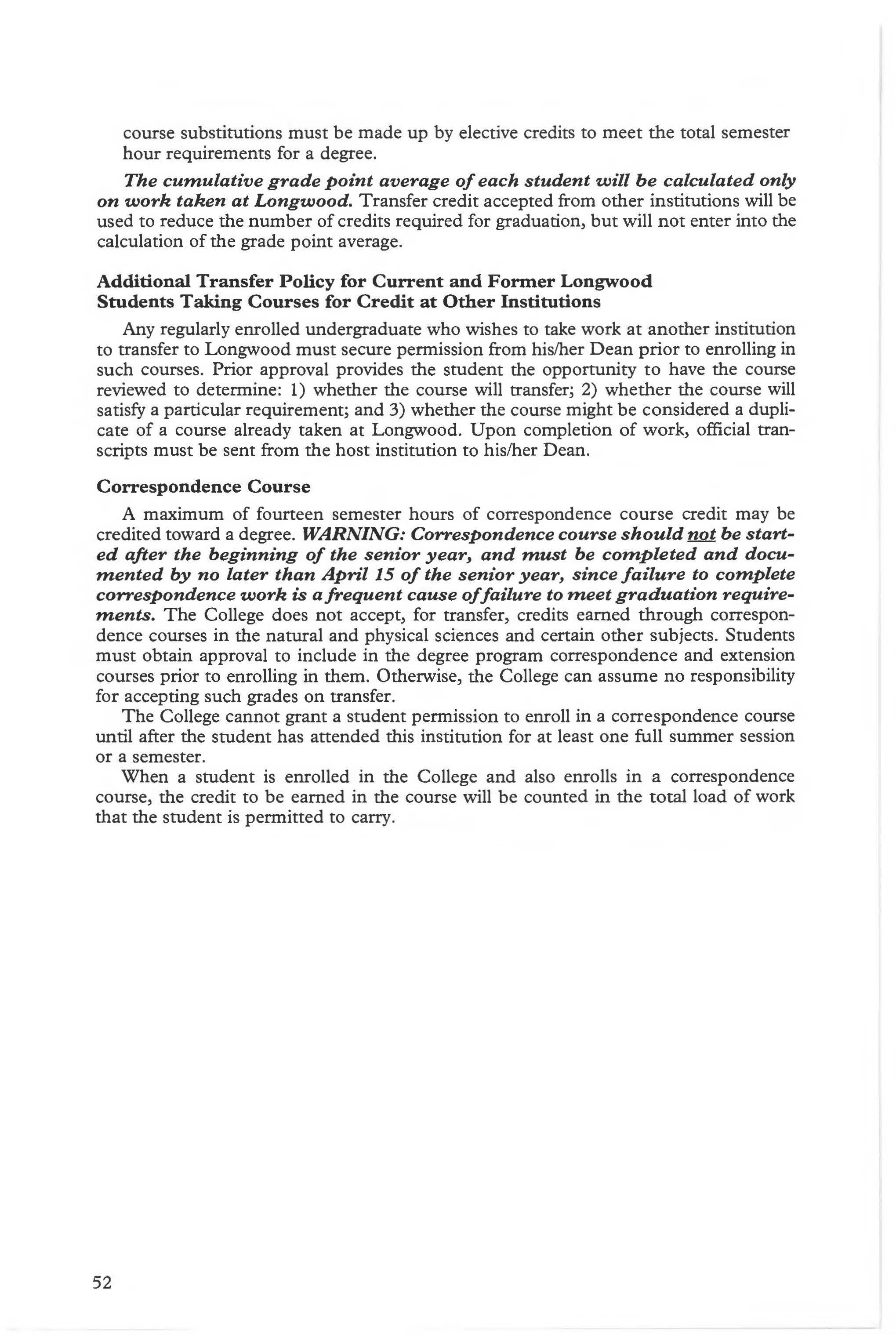
A maximum of fourteen semester hours of correspondence course credit may be credited toward a degree. WARNING: Correspondence course should not be started after the beginning of the senior year, and must be completed and documented by no later than April 15 of the senior year, since failure to complete correspondence work is a frequent cause offailure to meet graduation requirements. The College does not accept, for transfer, credits earned through correspondence courses in the natural and physical sciences and certain other subjects. Students must obtain approval to include in the degree program correspondence and extension courses prior to enrolling in them. Otherwise, the College can assume no responsibility for accepting such grades on transfer.
The College cannot grant a student permission to enroll in a correspondence course until after the student has attended this institution for at least one full summer session or a semester.
When a student is enrolled in the College and also enrolls in a correspondence course, the credit to be earned in the course will be counted in the total load of work that the student is permitted to carry.
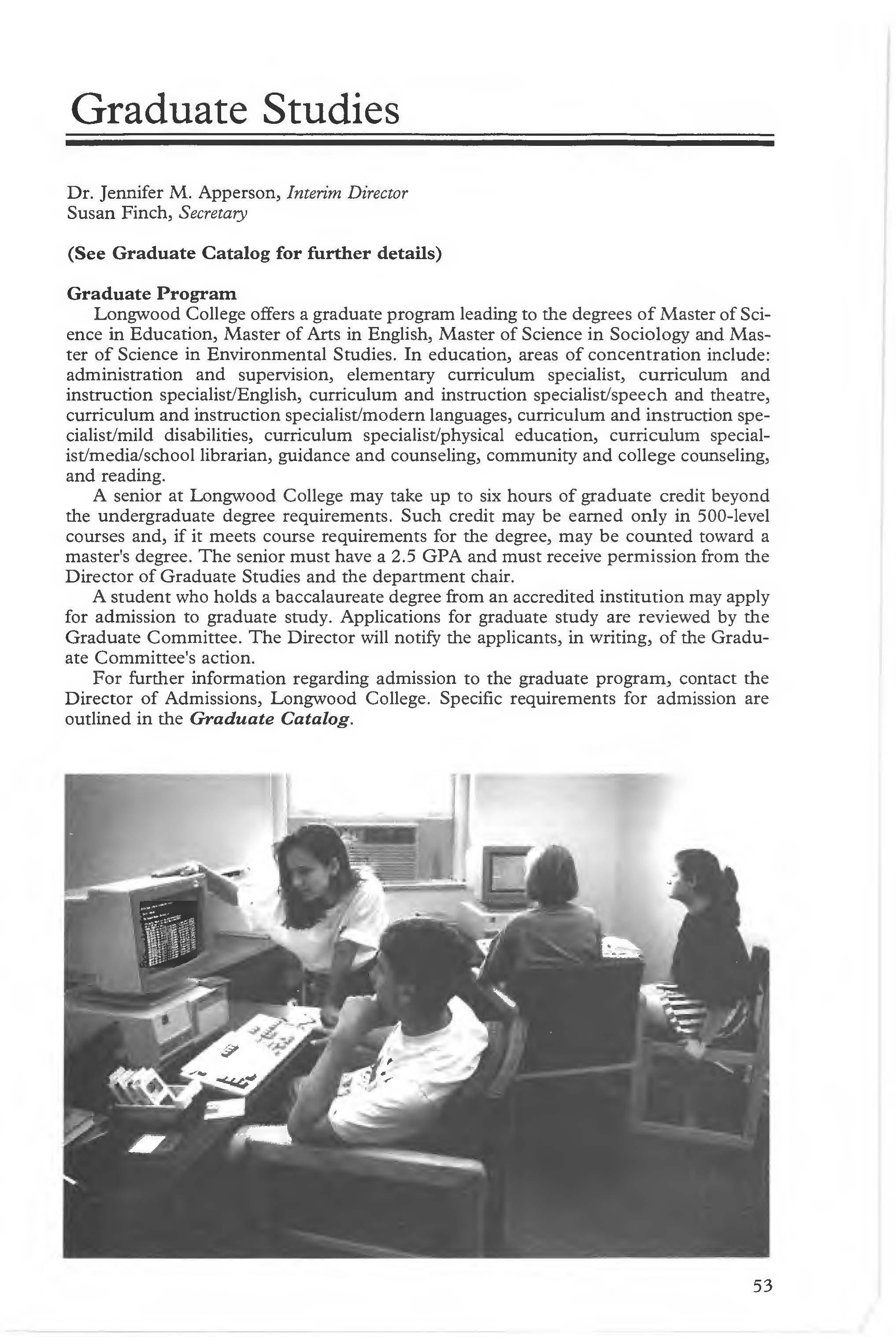
Longwood College offers a graduate program leading to the degrees of Master of Science in Education, Master of Arts in English, Master of Science in Sociology and Master of Science in Environmental Studies. In education, areas of concentration include: administration and supervision, elementary curriculum specialist, curriculum and instruction specialist/English, curriculum and instruction specialist/speech and theatre, curriculum and instruction specialist/modern languages, curriculum and instruction specialist/mild disabilities, curriculum specialist/physical education, curriculum specialist/media/school librarian, guidance and counseling, community and college counseling, and reading.
A senior at Longwood College may take up to six hours of graduate credit beyond the undergraduate degree requirements. Such credit may be earned only in 500-level courses and, if it meets course requirements for the degree, may be counted toward a master's degree. The senior must have a 2.5 GPA and must receive permission from the Director of Graduate Studies and the department chair.
A student who holds a baccalaureate degree from an accredited institution may apply for admission to graduate study. Applications for graduate study are reviewed by the Graduate Committee. The Director will notify the applicants, in writing, of the Graduate Committee's action.
For further information regarding admission to the graduate program, contact the Director of Admissions, Longwood College. Specific requirements for admission are outlined in the Graduate Catalog.
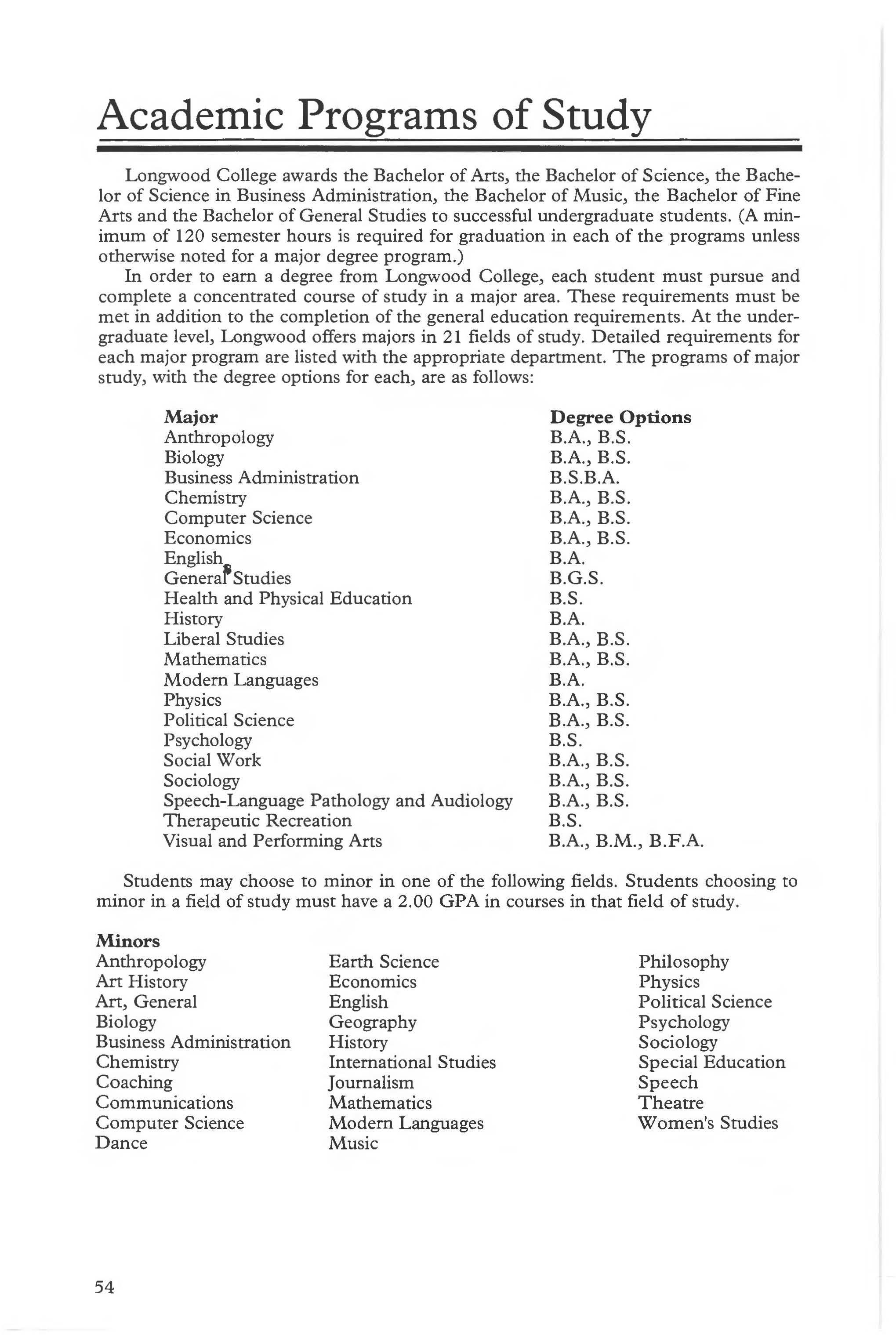
Longwood College awards the Bachelor of Arts, the Bachelor of Science, the Bachelor of Science in Business Administration, the Bachelor of Music, the Bachelor of Fine Arts and the Bachelor of General Studies to successful undergraduate students. (A minimum of 120 semester hours is required for graduation in each of the programs unless otherwise noted for a major degree program.)
In order to earn a degree from Longwood College, each student must pursue and complete a concentrated course of study in a major area. These requirements must be met in addition to the completion of the general education requirements At the undergraduate level, Longwood offers majors in 21 fields of study . Detailed requirements for each major program are listed with the appropriate department. The programs of major study, with the degree options for each, are as follows:
Major Anthropology Biology Business Administration Chemistry Computer Science Economics English Generaf Studies Health and Physical Education History Liberal Studies Mathematics Modem Languages Physics Political Science Psychology Social Work Sociology Speech-Language Pathology and Audiology Therapeutic Recreation Visual and Performing Arts
B.A., B.S. B.A., B.S. B.S.B.A. B.A., B.S. B.A., B.S. B.A., B.S. B.A . B .G.S . B.S B.A. B.A., B.S. B.A., B.S. B.A. B.A., B.S. B.A., B.S. B.S B A., B.S. B.A., B.S. B .A., B.S . B.S . B.A., B.M., B.F.A.
Students may choose to minor in one of the following fields. Students choosing to minor in a field of study must have a 2.00 GPA in courses in that field of study.
Minors
Anthropology Art History Art, General Biology Business Administration Chemistry Coaching Communications Computer Science Dance
Earth Science Economics English Geography History International Studies Journalism Mathematics Modem Languages Music
Philosophy Physics Political Science Psychology Sociology Special Education Speech Theatre Women's Studies
Longwood has cooperative programs with Old Dominion University, V.C.U. and the Georgia Institute of Technology which make it possible for students to earn either a B.S. or B.A. degree in physics from Longwood and a B.S. degree in engineering from ODU or Georgia Tech.
Longwood has cooperative "Physicists to Masters in Materials Science Engineering, Nuclear Engineering, and Engineering Physics" programs with the University of Virginia . These programs make it possible for a student to earn a B.S. or B.A. degree in physics from Longwood and a Masters Degree in Materials Science Engineering, Nuclear Engineering, or Engineering Physics from U.Va
Longwood has a cooperative program with Christopher Newport University which makes it possible for a student to earn a B.S. or B.A. in Physics from Longwood and a Master's Degree in Applied Physics from Christopher Newport University.
This curriculum prepares students for admission to accredited schools of medicine, dentistry, veterinary medicine, medical technology, dental hygiene, physical therapy, occupational therapy, and pharmacy. Pre-professional advisors at Longwood will assist the student in selecting the appropriate courses to meet the admission requirements for any health related program.
Longwood also offers several programs in cooperation with other institutions in Virginia Students majoring in Biology with a concentration in Medical Technology spend the first three years at Longwood completing the appropriate pre-professional course work. The fourth year is spent in professional training at an affiliated hospital. Upon successful completion of the senior year training, the student is awarded a B.S. degree in biology with a concentration in Medical Technology from Longwood College.
Completion of the requirements of the Longwood pre-professional curriculum does not guarantee admission to the professional program. Admission to all professional programs is competitive. Admission is based on the student's performance during the preprofessional period, personal recommendations, related work experience, and a personal interview A minimum GPA of 3.0 is usually required for transfer

The variety of courses available to Longwood students is increased by a cooperative arrangement with Hampden-Sydney College and with the Southside Higher Education Consortium which includes Longwood, Hampden-Sydney, Southside Virginia Community College, and Saint Paul's College. Under the terms of the arrangement, full-time degree program students in any one of the participating institutions may enroll in certain courses at any other of the participating institutions without added expense.
Students desiring to take advantage of this program must secure approval from their major advisors and from the Registrar at their home institutions before they enroll at the other institution. Students are registered for courses based on enrollment limits at the host institution. Grades for courses taken under the consortium agreement are maintained only at the home institution. Transportation to the host institution must be arranged by each student.
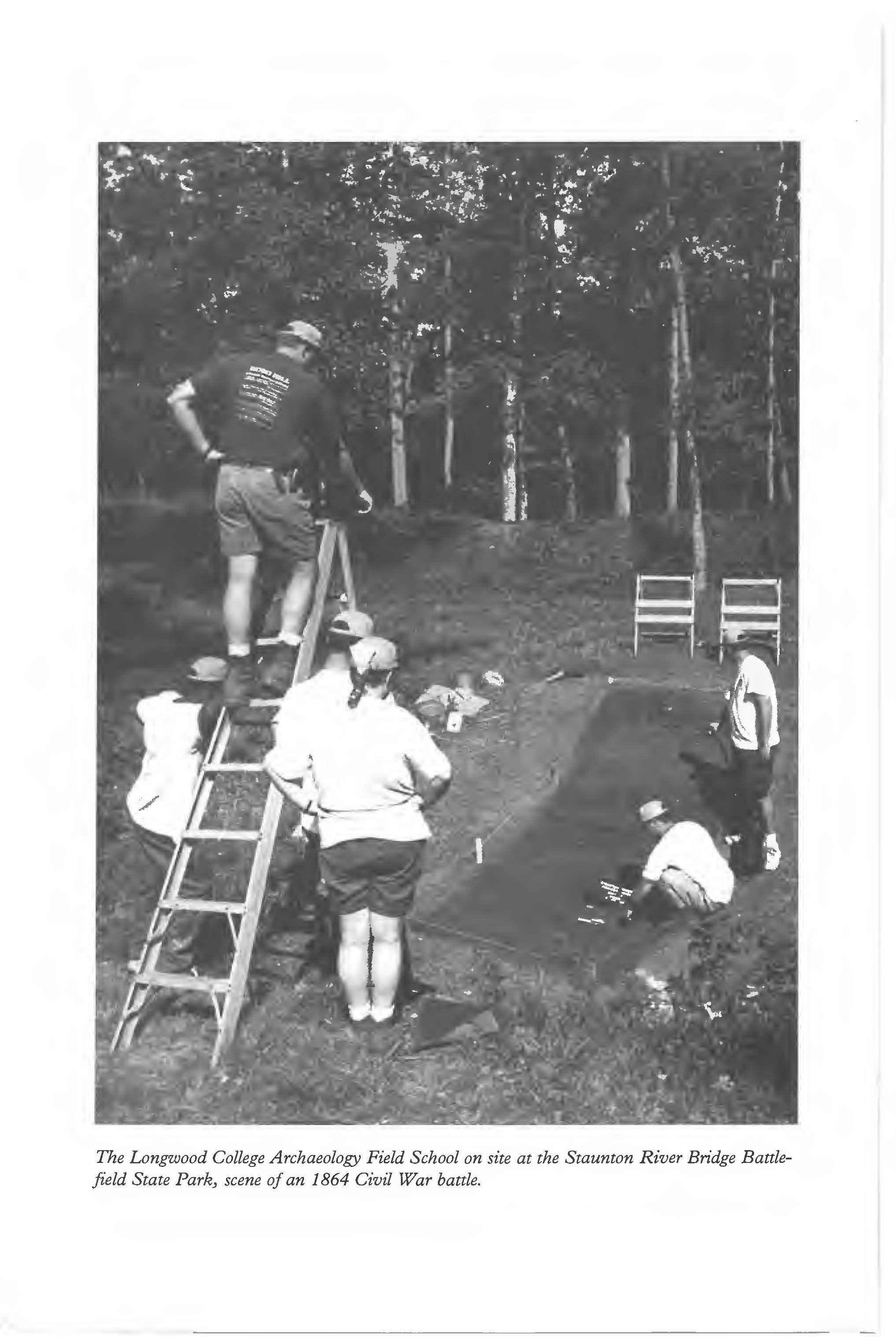 The Longwood College Archaeology Field School on site at the Staunton River Bridge Battlefield State Park, scene of an 1864 Civil War battle.
The Longwood College Archaeology Field School on site at the Staunton River Bridge Battlefield State Park, scene of an 1864 Civil War battle.
The College awards the bachelor's degree to students who have fulfilled the following requirements:
1. Completion of all study required in one of the six degree programs offered. (Bachelor of Arts, Bachelor of Fine Arts, Bachelor of Science, Bachelor of Science in Business Administration, Bachelor of Music, or Bachelor of General Studies).
2. Completion of one hundred twenty (120) semester hours of credit for graduation in major programs unless otherwise noted for a major degree program.
3. A minimum average of "C" (grade point average of 2.0) on all work taken at the College and a minimum average of"C" (grade point average of2.0) in those courses constituting the major subjects or field. These are minimum requirements, some programs may require higher levels of achievement. By definition, the major subject or field consists of all courses listed as "major requirements" in the major program curriculum plus all additional courses taken in the same discipline as the major except those courses which may be specifically excluded by the major department. Students choosing to Minor in a field of study must have a 2.00 GPA in courses in that field of study.
4. All students will take at least 2 writing-intensive courses beyond courses required for general education.
5. Removal of any communication condition.
6. A minimum of 25% of the degree credit must be earned at Longwood, with 30 credit hours at the upper level. (Exceptions: 1. Biology majors with a concentration in Medical Technology who take 300-400 level courses at affiliated institutions will be allowed to count that course work toward fulfilling the 30 hours graduation requirement; 2. students who participate in international exchange programs may request an exception to the 30 credit hour graduation requirement. Exceptions must be approved in writing by the student's school dean prior to the study abroad.)
7. Not more than fourteen hours of credit by correspondence.
8. Approval of the individual by the general faculty as a candidate for graduation.
9. A formal Application for Degree. This application for graduation must be filed with the Registrar at least one full year prior to the date of graduation.
The Longwood Seminar (LSEM 100, 1 credit) is required for all entering freshman and transfer students at the freshman level who have not taken a similar course. It is an introduction to the goals of a college education, the skills and knowledge needed for college involvement and success, and the programs and facilities of Longwood College.
The purpose of the General Education Program of Longwood College is the development of disciplined, informed, and creative minds. The program is defined by ten goals (see the General Education section of the Catalog on pages 59-61 for a complete description of this program). Students may choose among the core courses listed for each goal. Each of the courses listed under each goal has been specifically designed to address that goal. A course used by the student to satisfy a general education requirement may not be used by that student to satisfy a major program requirement except for Goal 10. The Dean may authorize an exemption for any goal when a student, due to major requirements, must take at least two courses listed for that goal. A total of 33 hours of core courses is required for the General Education Program.
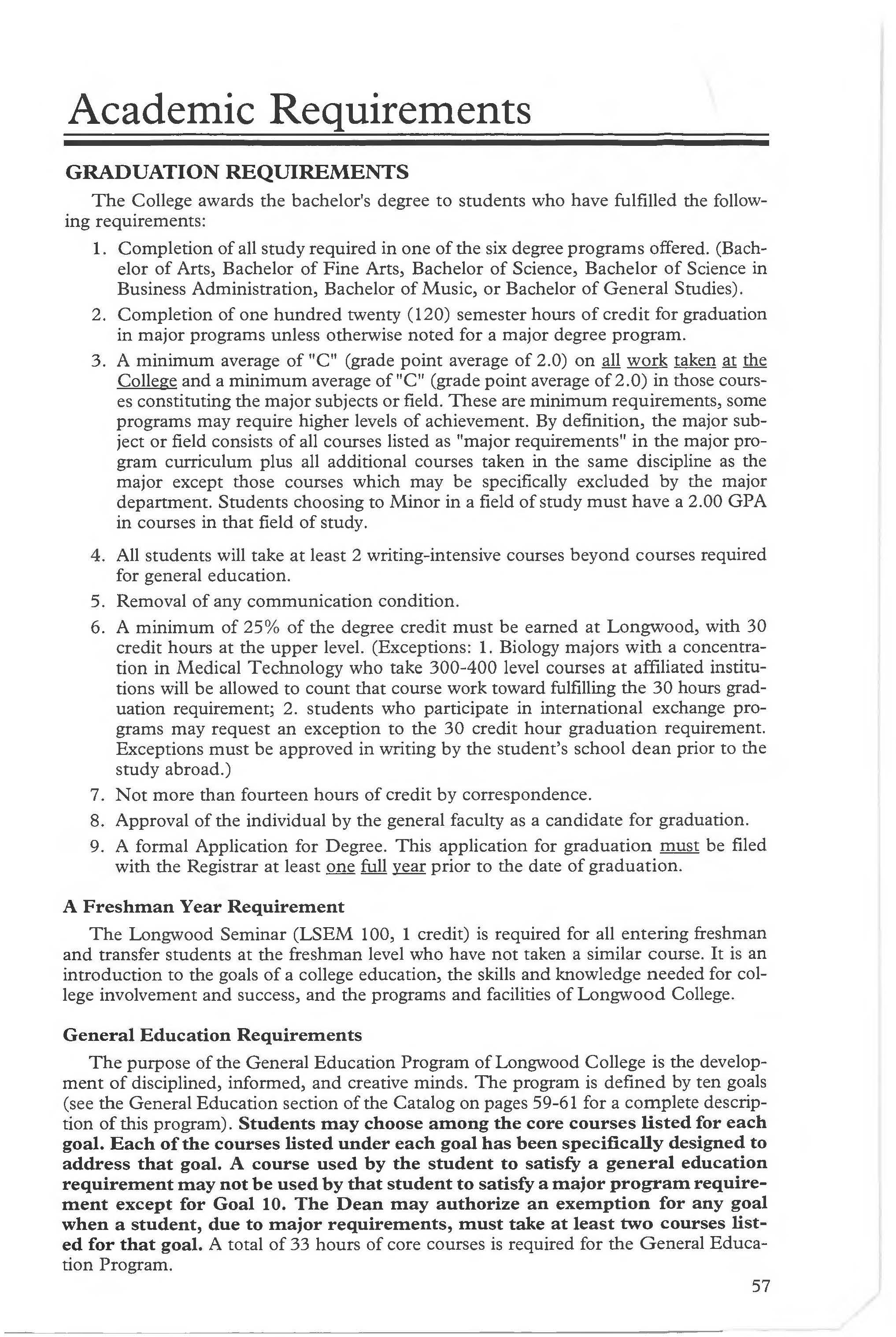
In addition to the 33 hours of core courses required for the General Education Program, students must fulfill the following requirements for specific degrees:
1. Bachelor of Arts Degree Foreign Languages (3 credits) at the 202 level or above Humanities (6 credits) in at least two disciplines and not in the discipline of the major Modern Language majors must complete the degree requirement in a language other than their language of concentration
Students who are not native speakers of English may be exempted from the B.A. language requirement provided that they have received their high school diploma, or its equivalent, from a school in their native land where the language of instruction was other than English.
2. Bachelor of Fine Arts Degree Humanities (6 credits) in at least two disciplines and not in the discipline of the major Social Sciences (3 credits) Students must take one of the following courses: History 200, 336, 354, 359 or 360; Geography 241; Political Science 436, 437, 469, or 3 credits at the 202 or above level foreign language.
3. Bachelor of Science Degree Mathematics or Computer Science (3 credits) Social Science (3 credits) Natural Science (4 credits)
4. Bachelor of Science in Business Administration Degree Mathematics 267 (4 credits) Economics 217 (3 credits) Natural Science (4 credits)
5. Bachelor of Music Degree Humanities (9 credits) in at least two disciplines and not in the discipline of the major
6. Bachelor of General Studies
See the General Studies section of this Catalog (page 136) for a complete description of this program.
The following disciplines fall within the categories of "Humanities" or "Social Sciences": Humanities Social Sciences g Anthropology
Music Economics Theatre
Geography
.Dance History
Modern Language
Political Science Literature Psychology
• Philosophy
Religion Speech
Sociology
The specific major uirements of individual disciplines are listed separately in the Academic Programs section of this catalog. A few majors require a general education core course as part of their major program; in those cases, that core course satisfies a major program requirement and cannot be used to satisfy a general education requirement. The Dean may authorize an exemption for any general education goal when a student, due to major requirements, must take at least two courses listed for that goal.

It is solely the responsibility of the candidate for graduation to nzeet all of the above requirements, including the completion of 120 semester hours unless otherwise noted for that major degree program.
Only those students who have completed the degree requirements established by Longwood College will participate in graduation ceremonies. Graduating students will receive their diplomas on the day of Commencement
Those students who have earned 57 or more hours at Longwood College and whose general averages for all Longwood credits offered for a degree are 3 35 or above are graduated with the following honors:
Cum Laude 3.35-3.54

Magna Cum Laude 3.55-3. 74
Summa Cum Laude 3. 75-4.00
The College also recognizes graduating seniors who have successfully completed an honors program in a specialized academic area
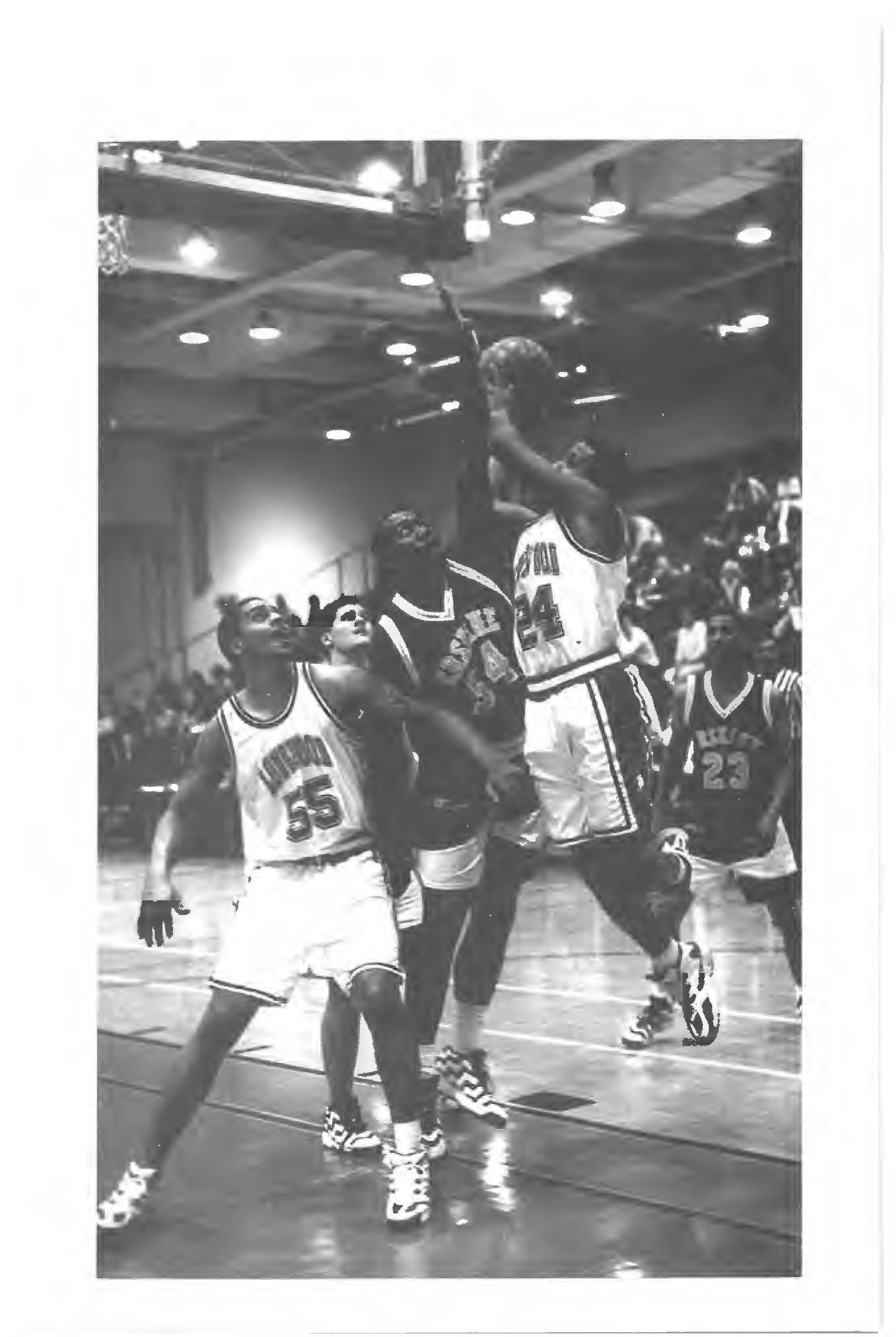
The purpose of the General Education Program of Longwood College is the development of disciplined, informed, and creative minds. The program is defined by the following ten goals. Students may choose among the core courses listed for each goal. Each of the courses listed under each goal has been specifically designed to address that goal. A course used by the student to satisfy a general education requirement may not be used by that student to satisfy a major program requirement except for Goal 10. The Dean may authorize an exemption for any goal when a student, due to major requirements, must take at least two courses listed for that goal. A total of 33 hours of core courses is required for the General Education Program. Complete course descriptions can be found in the Academic Programs section of this Catalog; the appropriate page numbers are listed following the course titles below.
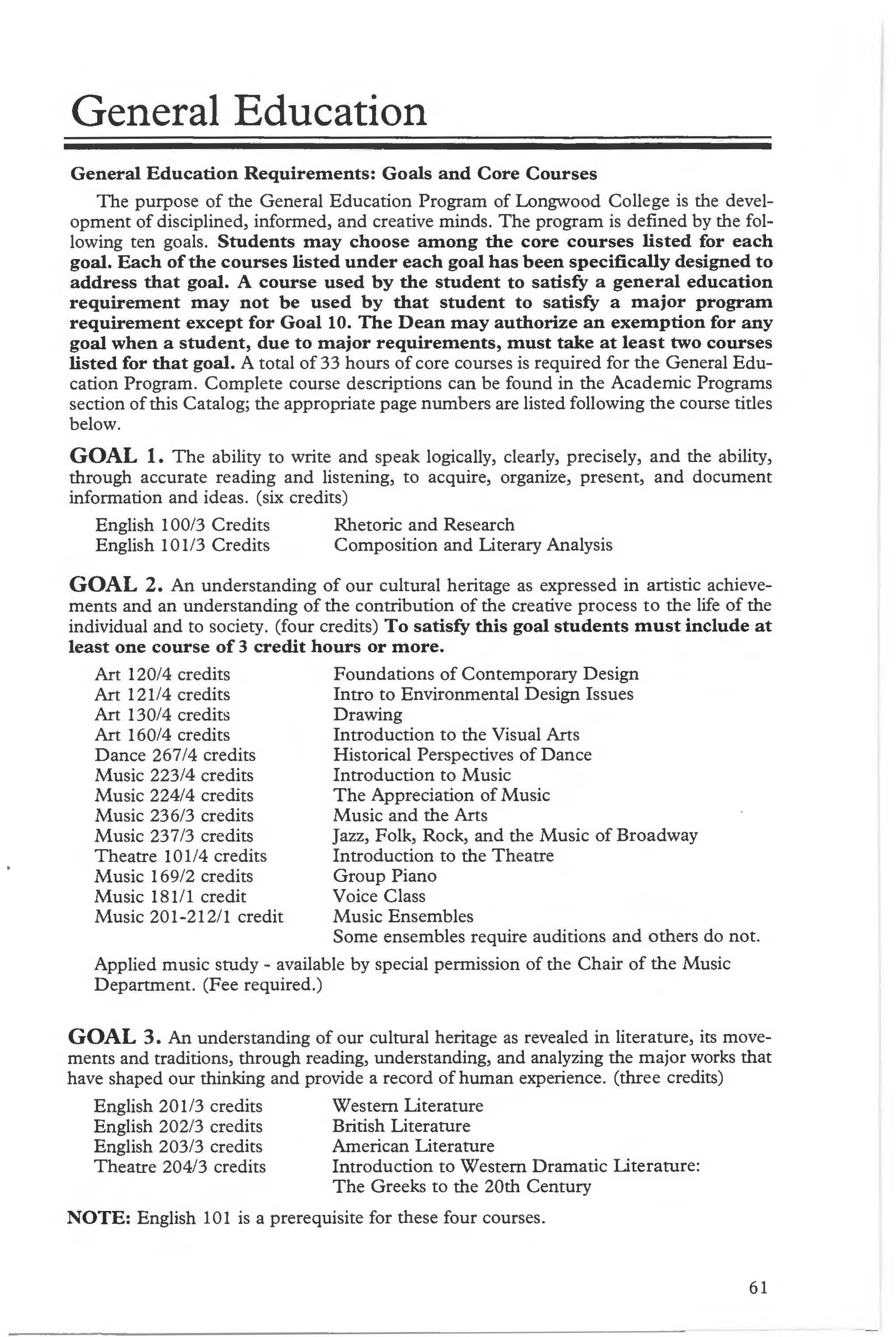
GOAL 1. The ability to write and speak logically, clearly, precisely, and the ability, through accurate reading and listening, to acquire, organize, present, and document information and ideas. (six credits)
English 100/3 Credits Rhetoric and Research
English 101/3 Credits Composition and Literary Analysis
GOAL 2. An understanding of our cultural heritage as expressed in artistic achievements and an understanding of the contribution of the creative process to the life of the individual and to society. (four credits) To satisfy this goal students must include at least one course of 3 credit hours or more.
Art 120/4 credits Foundations of Contemporary Design
Art 121/4 credits Intro to Environmental Design Issues
Art 130/4 credits Drawing
Art 160/4 credits Introduction to the Visual Arts
Dance 267 /4 credits Historical Perspectives of Dance
Music 223/4 credits Introduction to Music
Music 224/4 credits The Appreciation of Music
Music 236/3 credits Music and the Arts
Music 237/3 credits Jazz, Folk, Rock, and the Music of Broadway Theatre 101/4 credits Introduction to the Theatre
Music 169/2 credits Group Piano
Music 181/1 credit Voice Class
Music 201-212/1 credit Music Ensembles
Some ensembles require auditions and others do not.
Applied music study available by special permission of the Chair of the Music Department. (Fee required.)
GOAL 3. An understanding of our cultural heritage as revealed in literature, its movements and traditions, through reading, understanding, and analyzing the major works that have shaped our thinking and provide a record of human experience. (three credits)
English 201/3 credits Western Literature
English 202/3 credits British Literature
English 203/3 credits American Literature
Theatre 204/3 credits Introduction to Western Dramatic Literature: The Greeks to the 20th Century
NOTE: English 101 is a prerequisite for these four courses.
GOAL 4. An understanding of mathematical thought and the ability to conceptualize and apply mathematical logic to problem solving; the ability to use computers for acquiring, processing, and analyzing information. (three credits at a commonly agreed upon skills level comparable to college algebra)
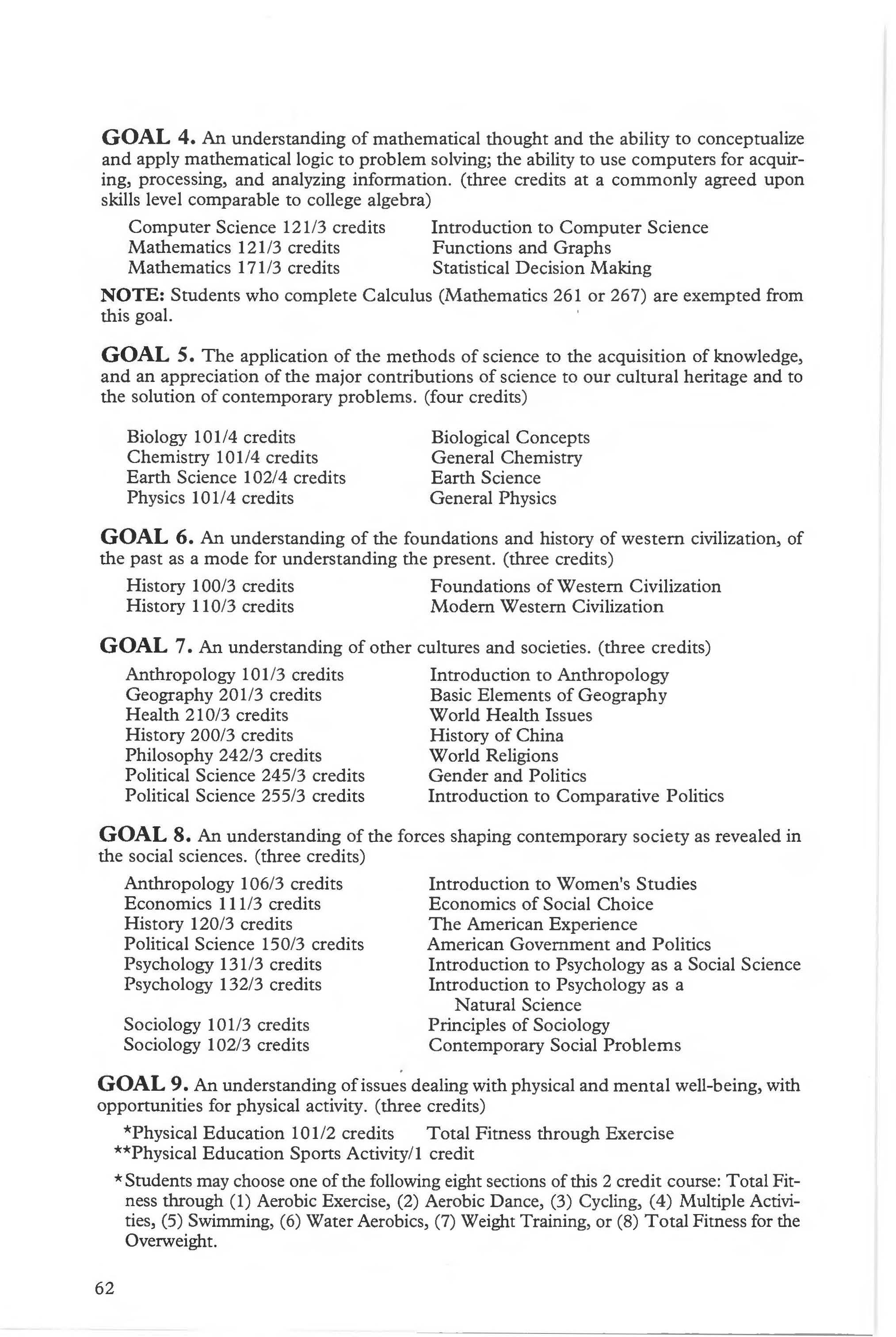
Computer Science 121/3 credits Introduction to Computer Science Mathematics 121/3 credits Functions and Graphs Mathematics 171/3 credits Statistical Decision Making
NOTE: Students who complete Calculus (Mathematics 261 or 267) are exempted from this goal.
GOAL 5. The application of the methods of science to the acquisition of knowledge, and an appreciation of the major contributions of science to our cultural heritage and to the solution of contemporary problems. (four credits)
Biology 101/4 credits
Chemistry 101/4 credits Earth Science 102/4 credits Physics 101/4 credits
Biological Concepts General Chemistry Earth Science General Physics
GOAL 6. An understanding of the foundations and history of western civilization, of the past as a mode for understanding the present (three credits)
History 100/3 credits Foundations of Western Civilization History 110/3 credits Modem Western Civilization
GOAL 7. An understanding of other cultures and societies. (three credits)
Anthropology 101/3 credits Introduction to Anthropology Geography 201/3 credits Basic Elements of Geography Health 210/3 credits World Health Issues History 200/3 credits History of China Philosophy 242/3 credits World Religions
Political Science 245/3 credits Gender and Politics Political Science 255/3 credits Introduction to Comparative Politics
GOAL 8. An understanding of the forces shaping contemporary society as revealed in the social sciences. (three credits)
Anthropology 106/3 credits Economics 111/3 credits History 120/3 credits
Political Science 150/3 credits Psychology 131/3 credits Psychology 132/3 credits
Sociology 101/3 credits Sociology 102/3 credits
Introduction to Women's Studies Economics of Social Choice The American Experience American Government and Politics Introduction to Psychology as a Social Science Introduction to Psychology as a Natural Science Principles of Sociology Contemporary Social Problems
GOAL 9. An understanding of issues dealing with physical and mental well-being, with opportunities for physical activity. (three credits)
*Physical Education 101/2 credits Total Fitness through Exercise
**Physical Education Sports Activity/I credit
* Students may choose one of the following eight sections of this 2 credit course: Total Fitness through (1) Aerobic Exercise, (2) Aerobic Dance, (3) Cycling, (4) Multiple Activities, (5) Swimming, (6) Water Aerobics, (7) Weight Training, or (8) Total Fitness for the Overweight.
** Students must complete one credit sports activity course from the following :
PHED 102-111 , 113 , 114, 117, 120-126, 128-131 , 133,136, 137,140,202,204, 207209, 211,213,214,217,223,224, 228-231.
GOAL 10. The ability to make informed, ethical choices and decisions, and to weigh the consequences of those choices. (junior or senior course of at least one credit departmentally designated or developed)
Anthropology 461/3 credits
Biology 485/1 credit
Computer Science/Mathematics 350/1 credit
Management 473/1 credit
Military Science 402/3 credits
Philosophy 305 / 3 credits or 306/1 credit
Political Science 331 or 332 / 3 credits
Speech Language Pathology and Audiology 391/1 credit and 392 / 2 credits
Social Work 336/3 credits
Sociology 456/3 credits
Therapeutic Recreation 425 / 1 credit
Theatre 485 / 1 credit
Physical Education 398 / 3 credits
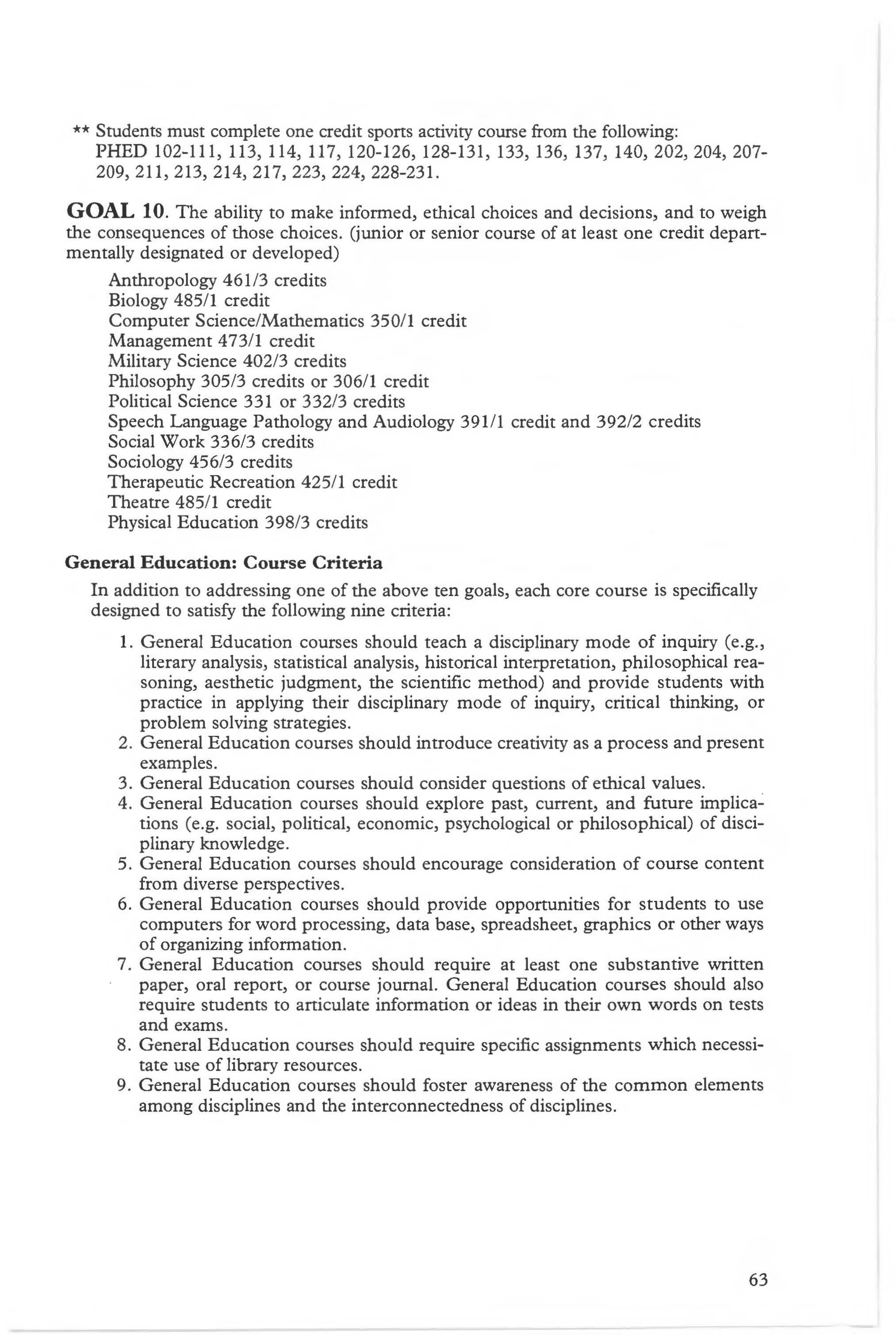
In addition to addressing one of the above ten goals, each core course is specifically designed to satisfy the following nine criteria :
1. General Education courses should teach a disciplinary mode of inquiry (e.g., literary analysis, statistical analysis, historical interpretation, philosophical reasoning, aesthetic judgment, the scientific method) and provide students with practice in applying their disciplinary mode of inquiry, critical thinking, or problem solving strategies
2. General Education courses should introduce creativity as a process and present examples.
3. General Education courses should consider questions of ethical values.
4 . General Education courses should explore past, current, and future implica~ tions (e.g. social, political, economic, psychological or philosophical) of disciplinary knowledge .
5. General Education courses should encourage consideration of course content from diverse perspectives.
6. General Education courses should provide opportunities for students to use computers for word processing, data base, spreadsheet, graphics or other ways of organizing information.
7 General Education courses should require at least one substantive written paper, oral report, or course journal. General Education courses should also require students to articulate information or ideas in their own words on tests and exams .
8 . General Education courses should require specific assignments which necessitate use of library resources.
9. General Education courses should foster awareness of the common elements among disciplines and the interconnectedness of disciplines.
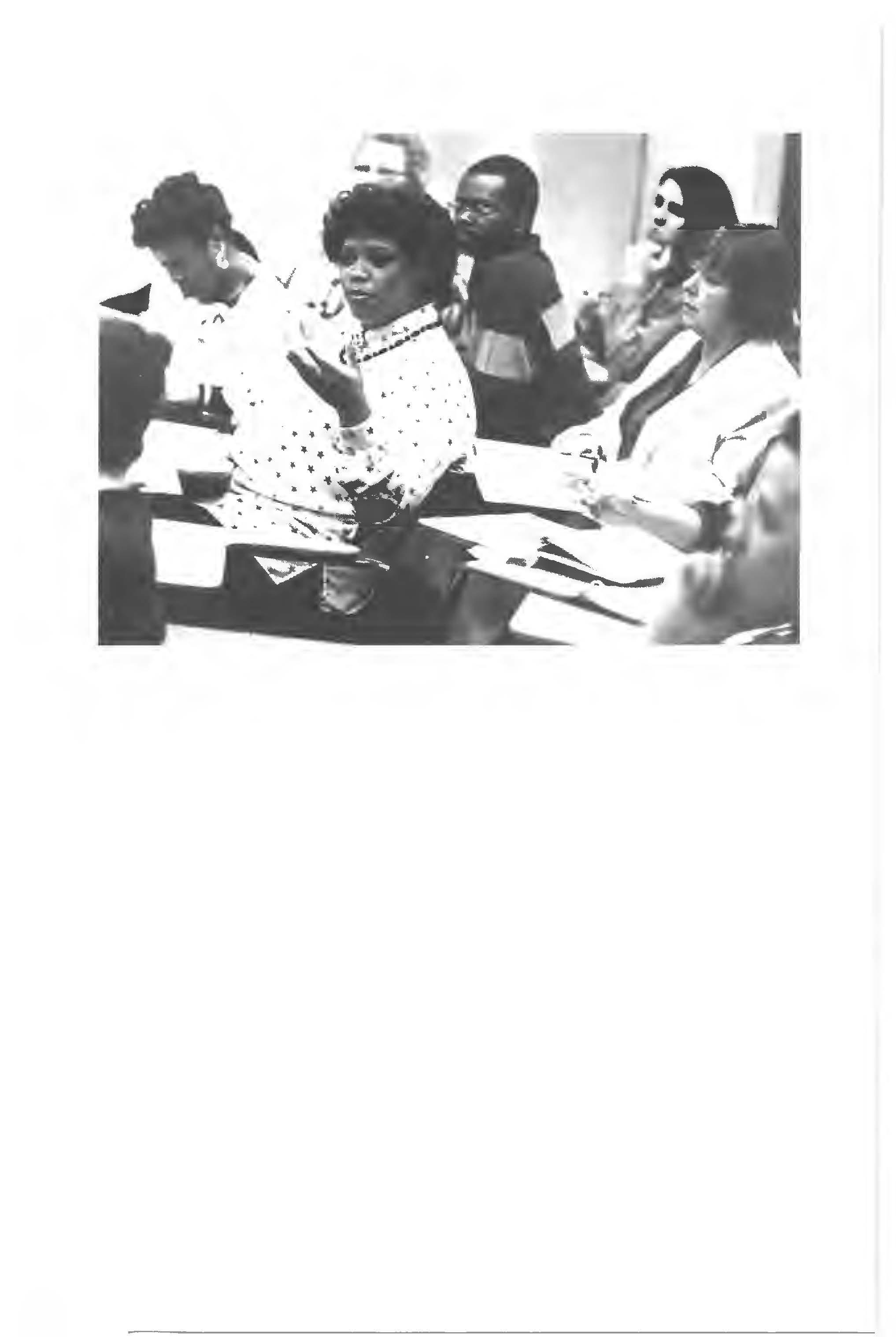
The mission of the Division of Continuing Education and Economic Development is to serve as a catalyst for regional prosperity and advancement by offering professional and educational programs and services to enhance business, employment, and cultural opportunities for the residents of South Central Virginia. Longwood provides college-level experiences, through a variety of off-campus programs, which lead to 1.) graduate degrees in Education and Sociology/Criminal Justice, 2.) teacher recertification, 3.) professional advancement, and 4.) other programs as the need arises. Additional offerings include conferences and avocational, leisure time and children's programs. Continuing Education and Economic Development represents Longwood as a general outreach arm of the college.
Gerald L. Hughes, Jr., Director
Kim LeSueur, Secretary
Amy Hudson, Lead Program Coordinator, CBC
Tim Owen, Program Coordinator, CBC
Sheila Coleman, Secretary, CBC
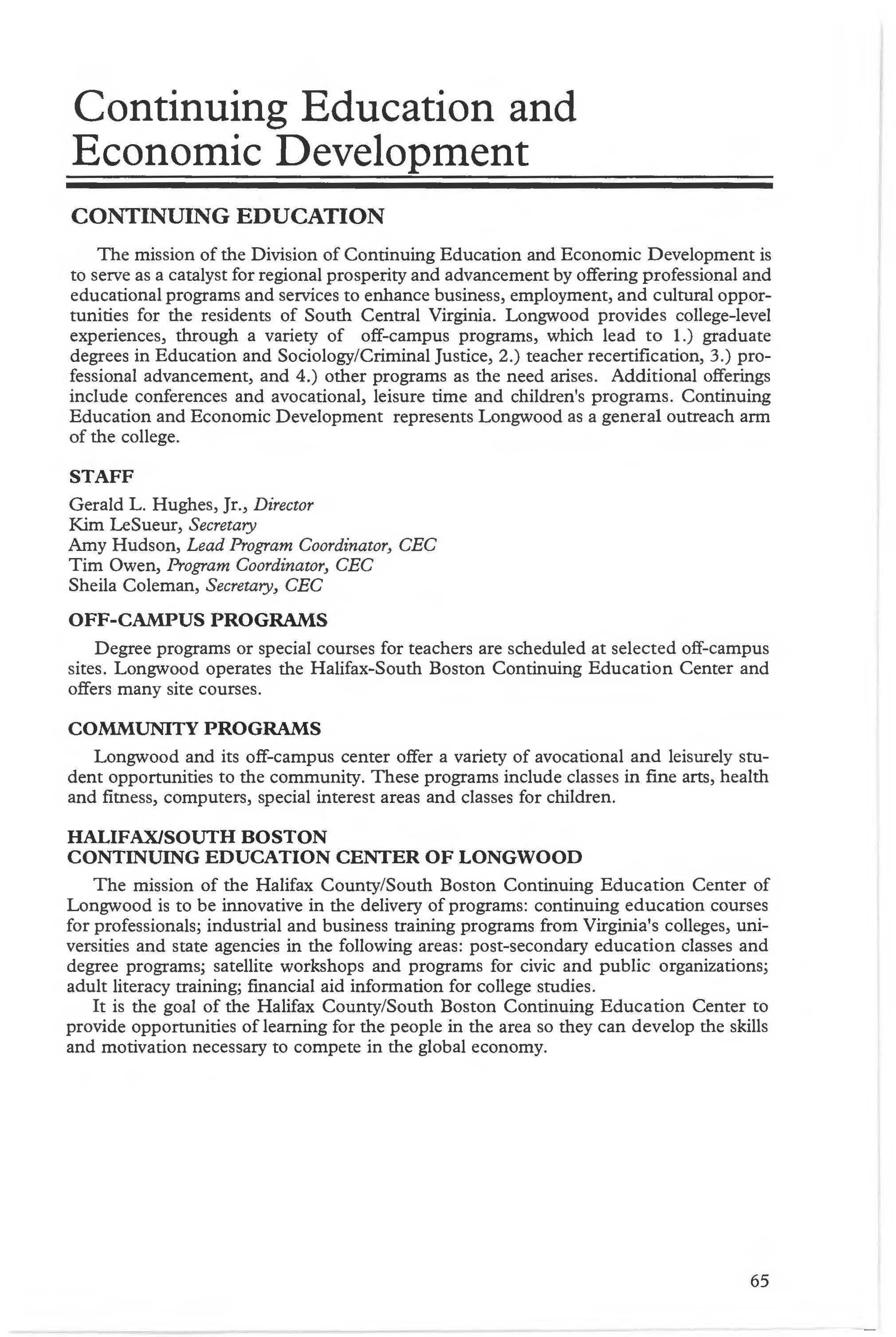
Degree programs or special courses for teachers are scheduled at selected off-campus sites. Longwood operates the Halifax-South Boston Continuing Education Center and offers many site courses.
Longwood and its off-campus center offer a variety of avocational and leisurely student opportunities to the community. These programs include classes in fine arts, health and fitness, computers, special interest areas and classes for children.
The mission of the Halifax County/South Boston Continuing Education Center of Longwood is to be innovative in the delivery of programs: continuing education courses for professionals; industrial and business training programs from Virginia's colleges, universities and state agencies in the following areas: post-secondary education classes and degree programs; satellite workshops and programs for civic and public organizations; adult literacy training; financial aid information for college studies.
It is the goal of the Halifax County/South Boston Continuing Education Center to provide opportunities of learning for the people in the area so they can develop the skills and motivation necessary to compete in the global economy.
Gerald L. Hughes, Jr., Director
Debbie Epperson, Deputy Director
Sheri McGuire, Business Analyst
John Townsend, Business Analyst
Vince Decker, Branch Manager, South Boston Office
Ken Copeland, Branch Manager, Martinsville Office
The Longwood Small Business Development Center is a program designed to offer free services for those starting a business, expanding a business, or in need of assistance in solving business problems.
The Longwood Small Business Development Center offers one-on-one couseling services through offices located in Farmville, South Boston, and Martinsville. Seminars and workshops are offered periodically throughout south central Virginia.
The Center provides research and economic development assistance to state and local government entities and also provides internship opportunities for Longwood students.
Students who withdraw before the first class meeting will be refunded all tuition less a $25 withdrawal fee and a $5 registration fee. (This does not apply to classes where registration is held at the first class meeting.) Students must contact the Director of Continuing Education and Economic Development or the Program Coordinator at the Continuing Education Center and submit a letter of withdrawal postmarked prior to the first class meeting.
Students who withdraw before the second class meeting will be refunded all tuition less one credit hour and the registration fee. Students must submit a letter of withdrawal to the Director of Continuing Education and Economic Development prior to the second class meeting (students may not attend the second class meeting). The letter must be postmarked on or before the day of the second class meeting.
After the second class, no refunds will be made except in extenuating circumstances. Refunds may be recommended to the Vice President for Administration and Finance by the Director of Continuing Education and Economic Development.
In order to withdraw and receive a grade of "W", students must submit a letter of withdrawal to the Director of Continuing Education and Economic Development postmarked before the mid-point of the class. Students who withdraw before the first class meeting will have no record of enrollment in this class on their academic records.
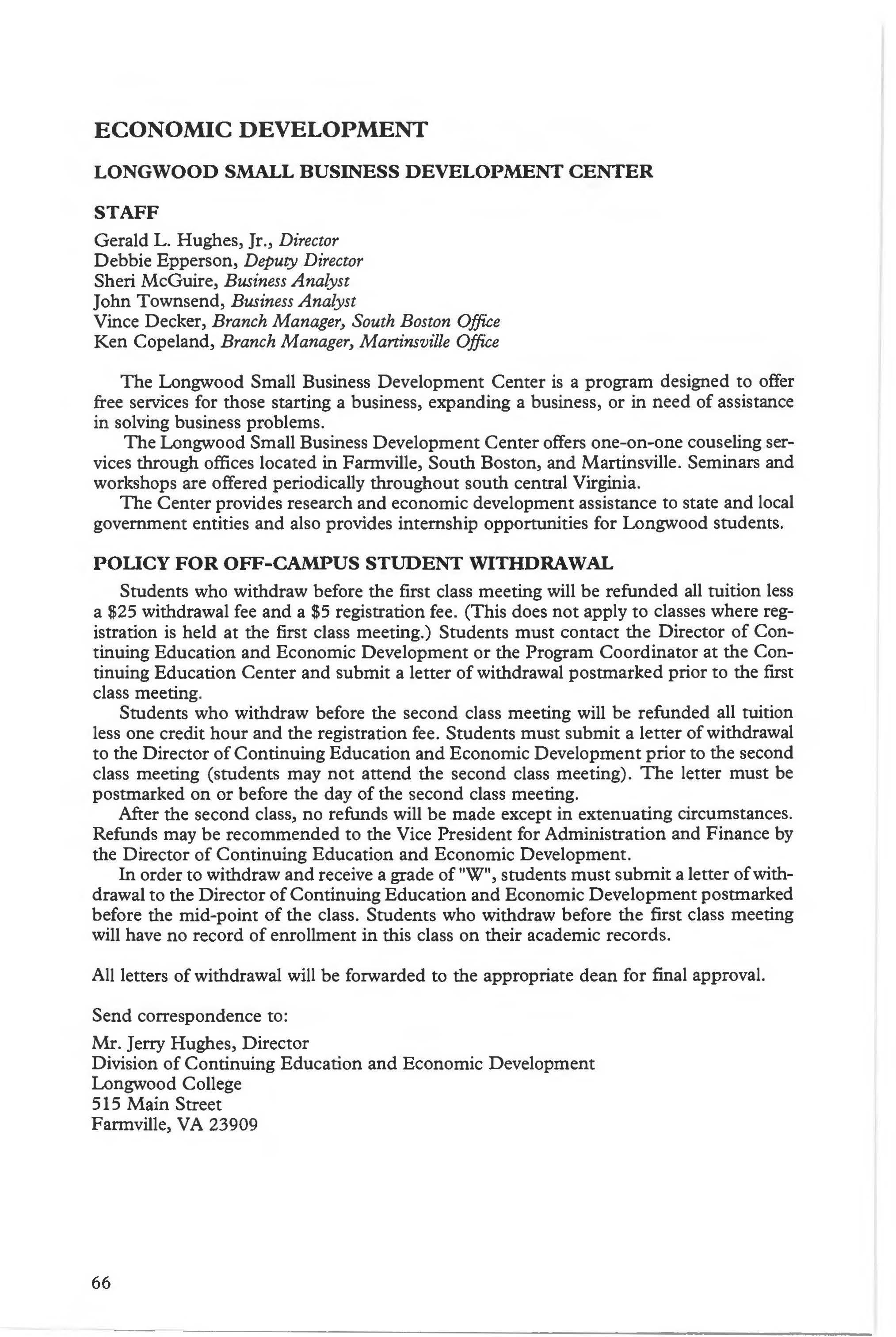
All letters of withdrawal will be forwarded to the appropriate dean for final approval.
Send correspondence to:
Mr. Jerry Hughes, Director
Division of Continuing Education and Economic Development
Longwood College
515 Main Street Farmville, VA 23909
In the fall semester of 1983 Longwood College initiated an Honors Program in Arts and Sciences; in 1990 the program was expanded to include course offerings from disciplines beyond arts and sciences. The program is designed to offer attractive and challenging opportunities for intellectual growth to well-prepared and highly-motivated students. The emphasis in any course designated as "honors" is on teaching students to articulate an understanding of a given field, to relate that field of knowledge to others, to think independently, and to write and speak clearly and cogently . Honors classes are generally smaller than usual and provide opportunities for intensive class discussion and debate and for more than the usual number of individual conferences with course instructors.
Some honors classes are specially designated sections of courses required for general education; others are especially created for honors students and may be team-taught and inter-disciplinary in nature. Upper level courses which do not have prohibitive prerequisites may be designated as honors courses, and students formally enrolled in the Honors Program can arrange for up to three advanced courses in the major field to be "enhanced" for honors credit. Students enrolled in the Longwood Honors Program who also elect to undertake Senior Honors Research may count six hours of that work in place of two of the three upper-level courses.
While the program is open to all entering students with SAT scores of at least 1140 and a high school GPA of at least 3.25, the Honors Committee recognizes that those scores are not the only or even the best predictors of outstanding achievement. The Committee welcomes applications from any second-semester or upperclass student who attains a cumulative grade point average of3.25 and from incoming transfer students with a grade point average of 3.25. Any Longwood student who meets the qualifications for admission to the Honors Program but who does not wish to take a full range of honors work may register for one or more classes
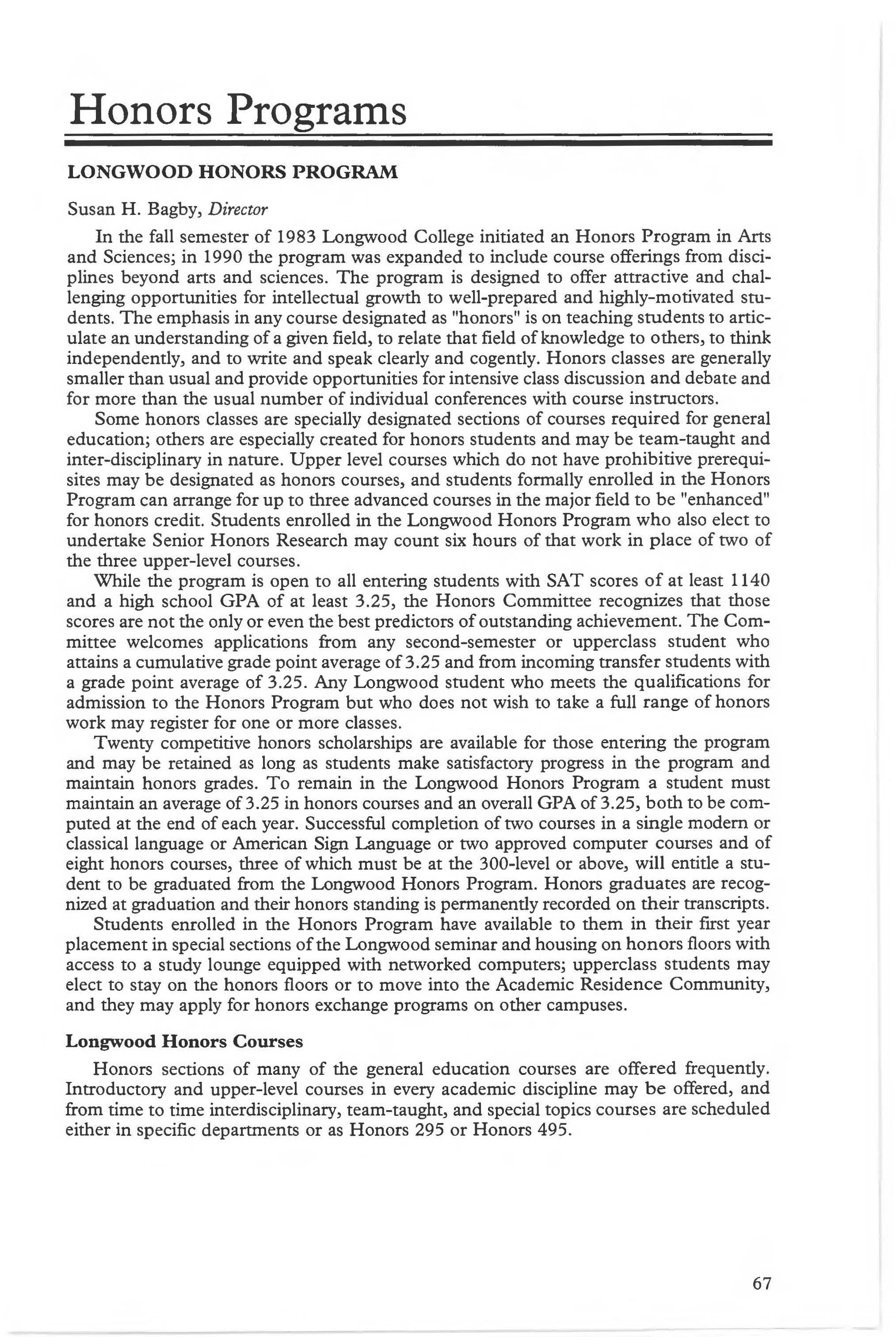
Twenty competitive honors scholarships are available for those entering the program and may be retained as long as students make satisfactory progress in the program and maintain honors grades. To remain in the Longwood Honors Program a student must maintain an average of3.25 in honors courses and an overall GPA of3.25, both to be computed at the end of each year. Successful completion of two courses in a single modem or classical language or American Sign Language or two approved computer courses and of eight honors courses, three of which must be at the 300-level or above, will entitle a student to be graduated from the Longwood Honors Program. Honors graduates are recognized at graduation and their honors standing is permanently recorded on their transcripts.
Students enrolled in the Honors Program have available to them in their first year placement in special sections of the Longwood seminar and housing on honors floors with access to a study lounge equipped with networked computers; upperclass students may elect to stay on the honors floors or to move into the Academic Residence Community, and they may apply for honors exchange programs on other campuses.
Honors sections of many of the general education courses are offered frequently . Introductory and upper-level courses in every academic discipline may be offered, and from time to time interdisciplinary, team-taught, and special topics courses are scheduled either in specific departments or as Honors 295 or Honors 495.
The honors program was inaugurated by the College in 1930 and modified in 1983; it enables capable students to study intensively a subject of their choice, thereby becoming acquainted with methods of research, organization of materials, and the presentation of results in a scholarly manner. Such intensive study stimulates initiative, resourcefulness, and original thought. Students in all departments are eligible to participate in this program The program is administered by the Senior Honors Research Committee. Under this plan, the student is directed in creative research by an instructor who has specialized in the field and who acts as sponsor. The student enrolls in Honors Research 498 and 499, thereby gaining 6 credits toward graduation.
1. A junior or senior who has a minimum grade point average of 2.7, with a 3.0 in his/her major, may enroll in Honors Research 498 after receiving permission from his/her sponsor, department chair, and the Senior Honors Research Committee prior to the Registrar's deadline for adding courses after the semester begins.
2. To receive this permission, students must submit a written proposal stating their thesis, the method and scope of research, and a preliminary bibliography Students are encouraged to submit sufficient copies of their proposal early in the semester prior to their beginning honors work. These copies shall be submitted to the chairman of the Senior Honors Research Committee. After submitting the proposal, students must meet jointly with their department chair, sponsor, and the Senior Honors Research Committee to discuss their proposal.
3. If the proposal has been accepted, the student will enroll in Honors Research 498 and an examining committee to be composed of three members (excluding the sponsor) proposed by the sponsor and approved by the department chair and the Senior Honors Research Committee is to be assigned. The members of this committee will be available for consultation.
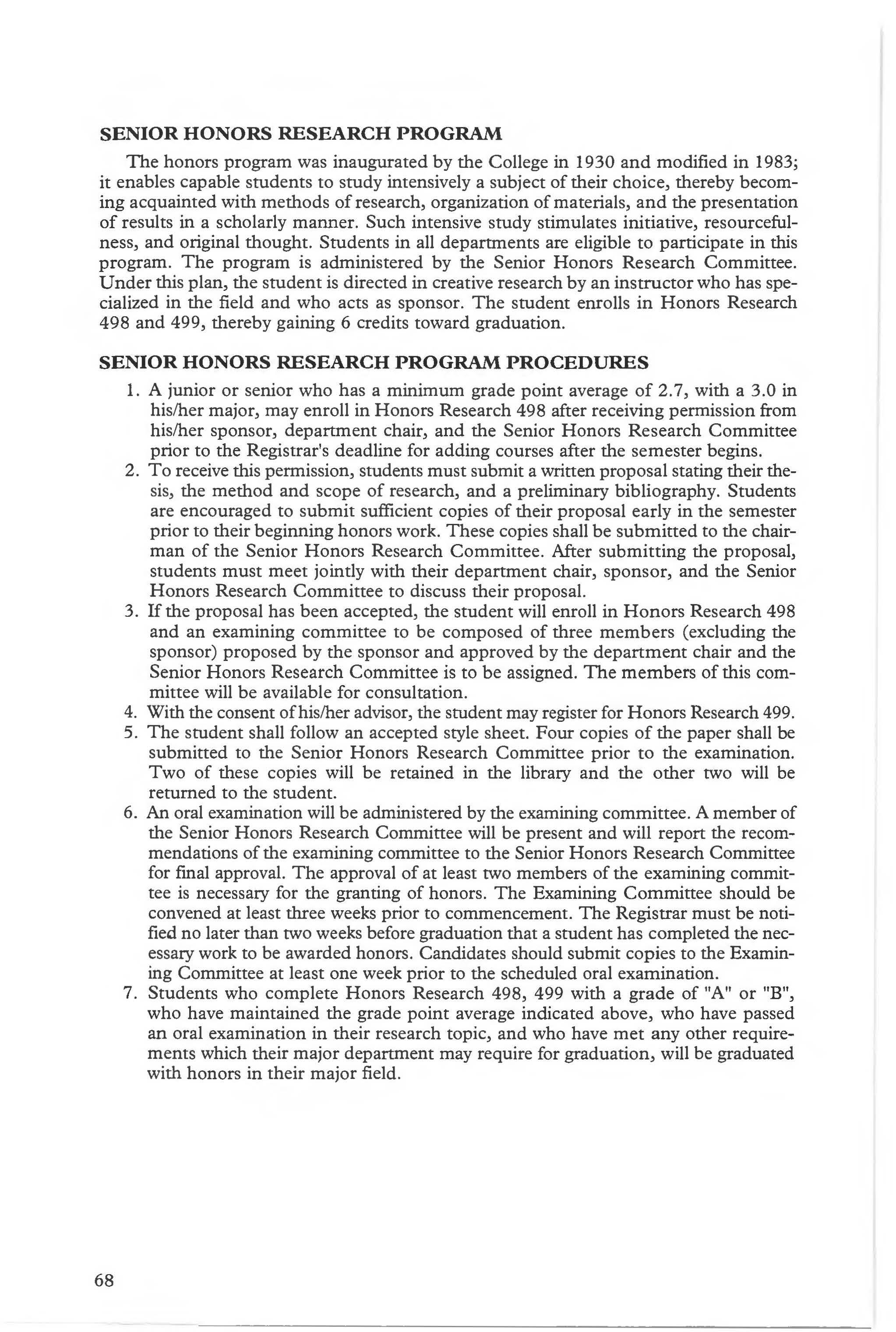
4 With the consent of his/her advisor, the student may register for Honors Research 499.
5 The student shall follow an accepted style sheet Four copies of the paper shall be submitted to the Senior Honors Research Committee prior to the examination. Two of these copies will be retained in the library and the other two will be returned to the student.
6. An oral examination will be administered by the examining committee. A member of the Senior Honors Research Committee will be present and will report the recommendations of the examining committee to the Senior Honors Research Committee for final approval. The approval of at least two members of the examining committee is necessary for the granting of honors. The Examining Committee should be convened at least three weeks prior to commencement. The Registrar must be notified no later than two weeks before graduation that a student has completed the necessary work to be awarded honors . Candidates should submit copies to the Examining Committee at least one week prior to the scheduled oral examination
7. Students who complete Honors Research 498, 499 with a grade of "A" or "B", who have maintained the grade point average indicated above, who have passed an oral examination in their research topic, and who have met any other requirements which their major department may require for graduation, will be graduated with honors in their major field
HON 200. CROSS-CULTURAL COMMUNICATION. This course will explore the concepts of culture and its relevance to the identity and communication patterns of individuals. Students will learn how to communicate effectively with individuals from other cultures. 1 credit.
HON 201. EDUCATION FOR SOCIAL CHANGE. The course will focus on the process of building community and fost~r participatory democracy. The course will provide knowledge and skills that enable students to become effective advocates/ facilitators of community efforts towards social change. The course design is based on the premis that learning occurs in _a variety of ways including direct expenence, reflection, theory, and application. 2 credits.
HON 300. FREUDIAN THEMES IN FAIRY TALES. An exploration of fairy tales and related literature as a literary form. An emphasis will be placed on the role of fairy tales in psychological development through an examination of their structure themes, motifs and symbols ' . Basic elements of literary and psychological perspectives will provide a basis for indepth discussion and analysis of spe~ific stories within their literary, psychological, cultural, historical and personal contexts. 2 credits.
HON 400. THE CIVIL RIGHTS MOVEMENT IN PRINCE EDWARD COUN1Y (1951-65). This lecture/discussion class examines Prince Edward County's place in the national civil rights movement. The focus is on school desegregation issues, including inclusion in the Supreme Court's Brown decision and the subsequent closing of public schools for five years. Local participants in the events of this era will be guess lecturers. Students will research, interview and tape individuals who have agreed to share their experiences. 2 credits.
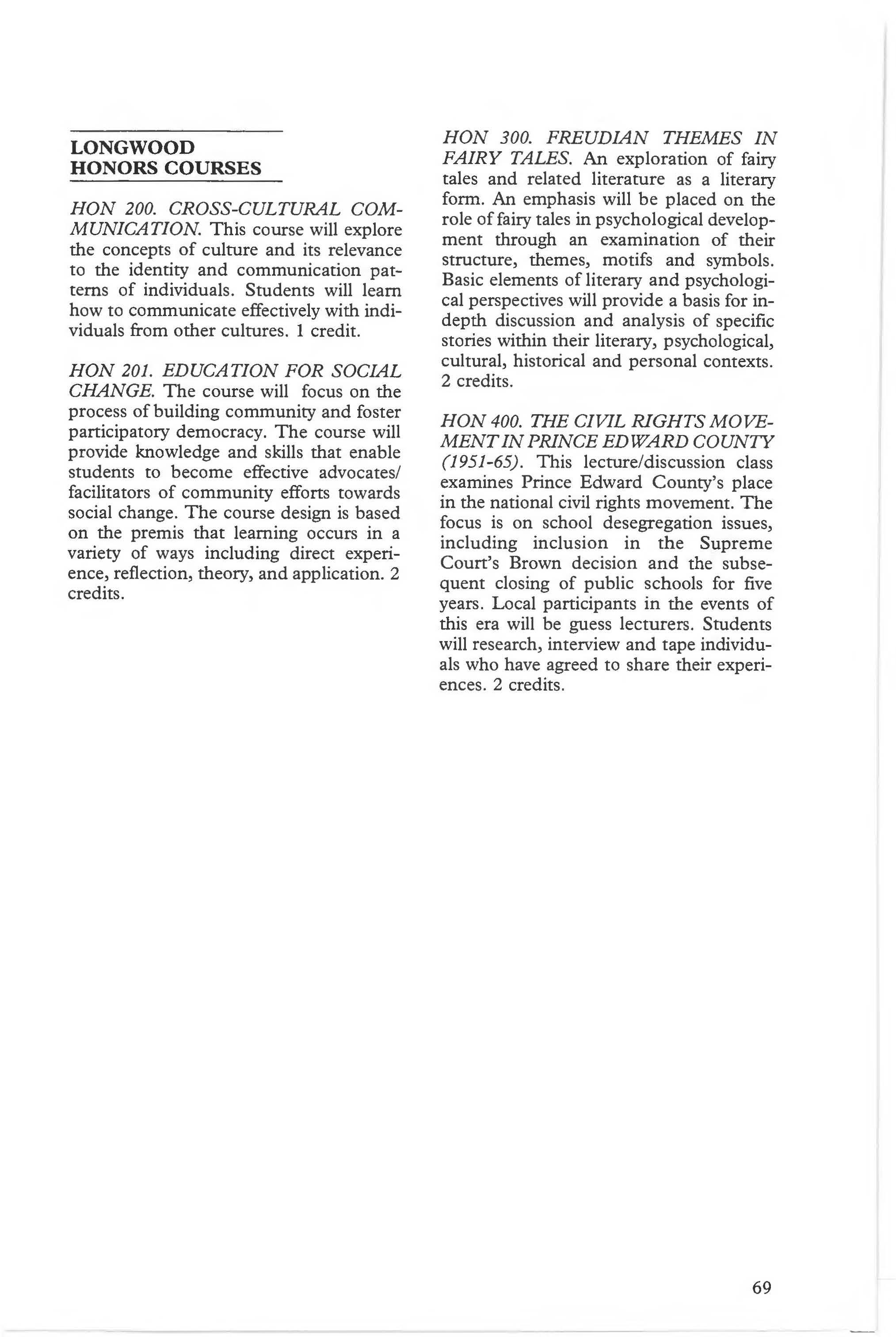
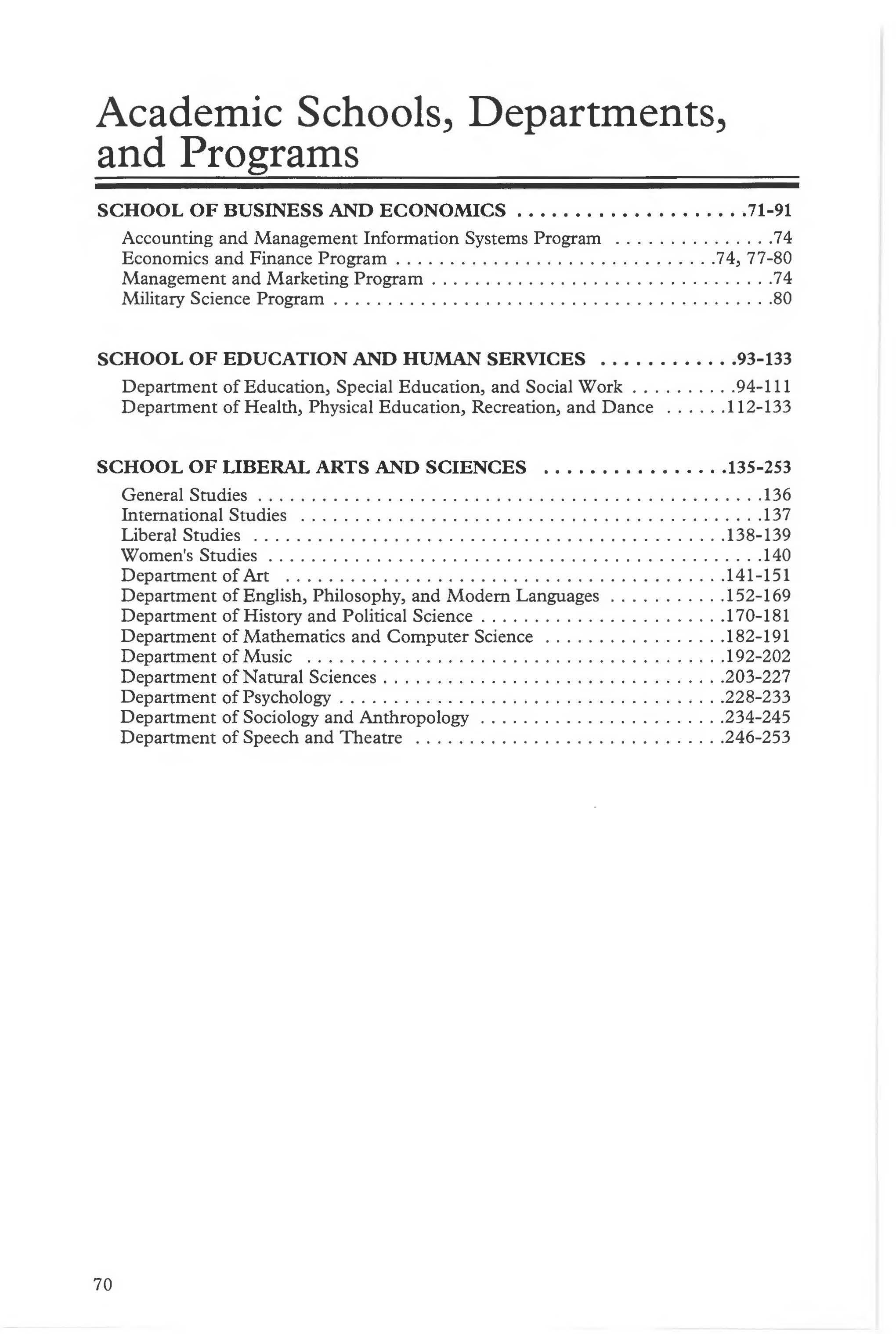
.................... 71-91
Accounting and Management Information Systems Program 74 Economics and Finance Program 74, 77-80 Management and Marketing Program 7 4 Military Science Program . .. . .... . . ............... .......... .... .. 80
. 93-133
Department of Education, Special Education, and Social Work .. ........ 94-111 Department of Health, Physical Education, Recreation, and Dance .... .. 112-133
.
General Studies ... ... .... . .......... .... .... ... ............ ... 136 International Studies 137 Liberal Studies 138-139 Women's Studies 140 Department of Art 141-151 Department of English, Philosophy, and Modern Languages 152-169 Department of History and Political Science 170-181 Department of Mathematics and Computer Science 182-191 Department of Music 192-202 Department of Natural Sciences ................................ 203-227 Department of Psychology 228-233 Department of Sociology and Anthropology ....................... 234-245 Department of Speech and Theatre . .. .......... . . . ........ .... .246-253
Dr. Berkwood M. Farmer, Dean Janet Miller, Executive Secretary to the Dean, Room 134, Wynne Building Janet Evans, Executive Secretary to the Faculty, Room 145, Wynne Building
Degree Program:
Bachelor of Science in Business Administration
Bachelor of Science in Economics Bachelor of Arts in Economics
Minors: Business Administration Economics
Military Science Program Dana Owens, Secretary to Military Science Faculty Room 211, Wynne Building
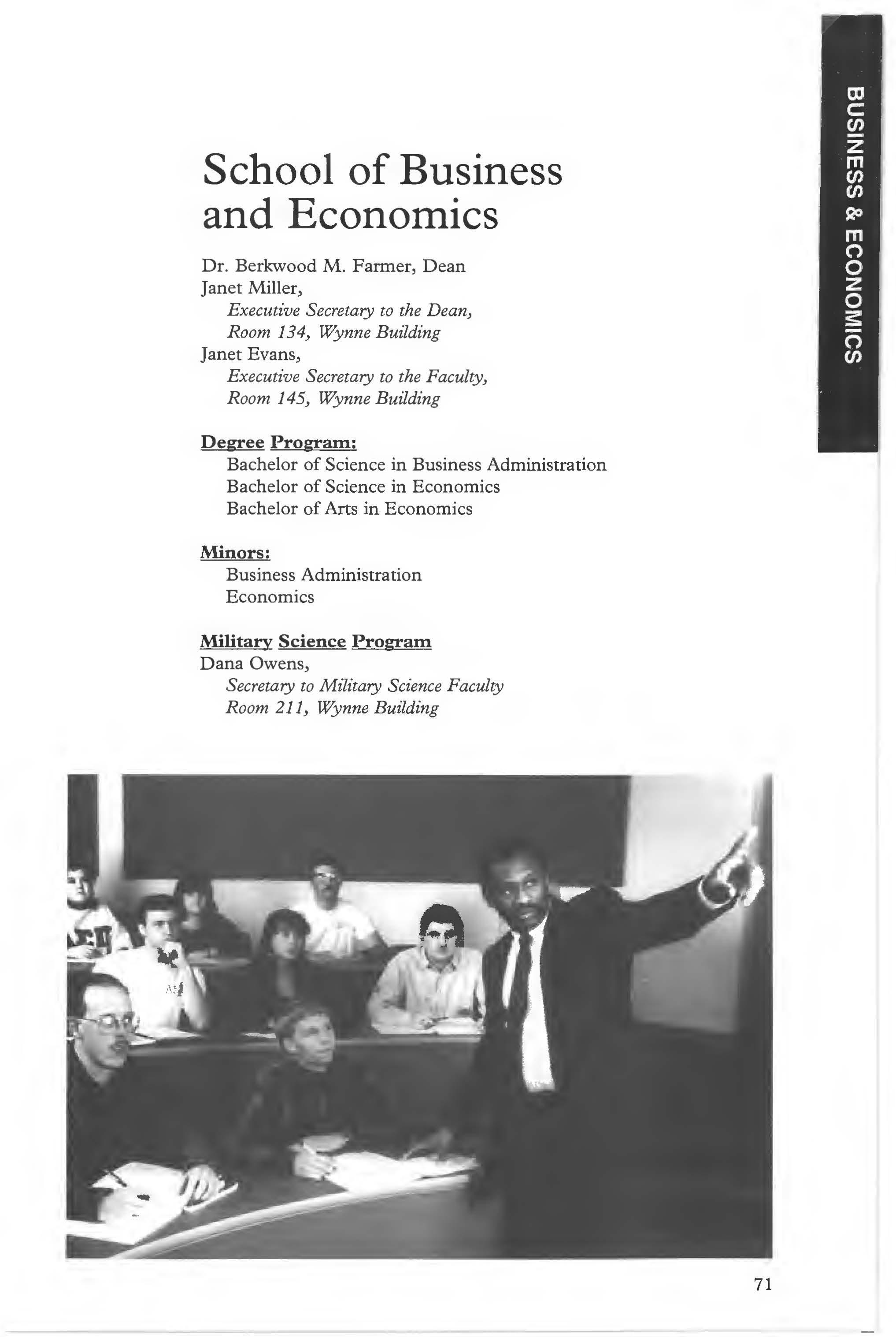
Berkwood M. Farmer, Dean and Professor of Economics Janet Miller, Executive Secretary to the Dean Janet Evans, Secretary to the Faculty
C. Mitchell Adrian, D.B.A., Assistant Professor of Management
Edward 0. Adusei, Ph.D., Associate Professor of Economics
Frank W. Bacon, Ph.D., Associate Professor of Finance
Raymond T. Brastow, Ph.D., Associate Professor of Economics
William P. Brown, Ph.D., CPA, Associate Professor of Accounting
Thomas A. Dukes, D.B.A., Professor of Marketing
Berkwood M. Farmer, Ph.D., Professor of Economics
Mary A. Flanigan, Ph.D., CPA, Associate Professor of Accounting
Melinda I. Fowlkes, M.B.A., CPA, Assistant Professor of Business
Sally W. Gilfillan, MSAcct., CPA, Associate Professor of Accounting
Samuel K. Gyapong, Ph.D., Associate Professor of Marketing
Neil J. Humphreys, Ph.D., Professor of Management
Linda K. Lau, Ph.D , Assistant Professor of Management Information Systems
Joe Lavely, Ph.D., Professor of Finance
Melanie B. Marks, Ph.D., Assistant Professor of Economics
Wayne E. McWee, Ed.D., Professor of Business
Kristine N. Palmer, M.B.A., CPA, Associate Professor of Accounting
G. Dean Palmer, Ed.D., Professor of Business
Man Ying M. Qiu, Ph.D., Assistant Professor of Management Joyce M. Rowe, Ph.D., Associate Professor of Management Information Systems
* Sue 0. Shaw, Ph.D., Professor of Economics Cynthia N. Wood, Ph.D., Acting Assistant to the Dean
*Teaching in Russia Fall 1997; Sabbatical Spring 1998
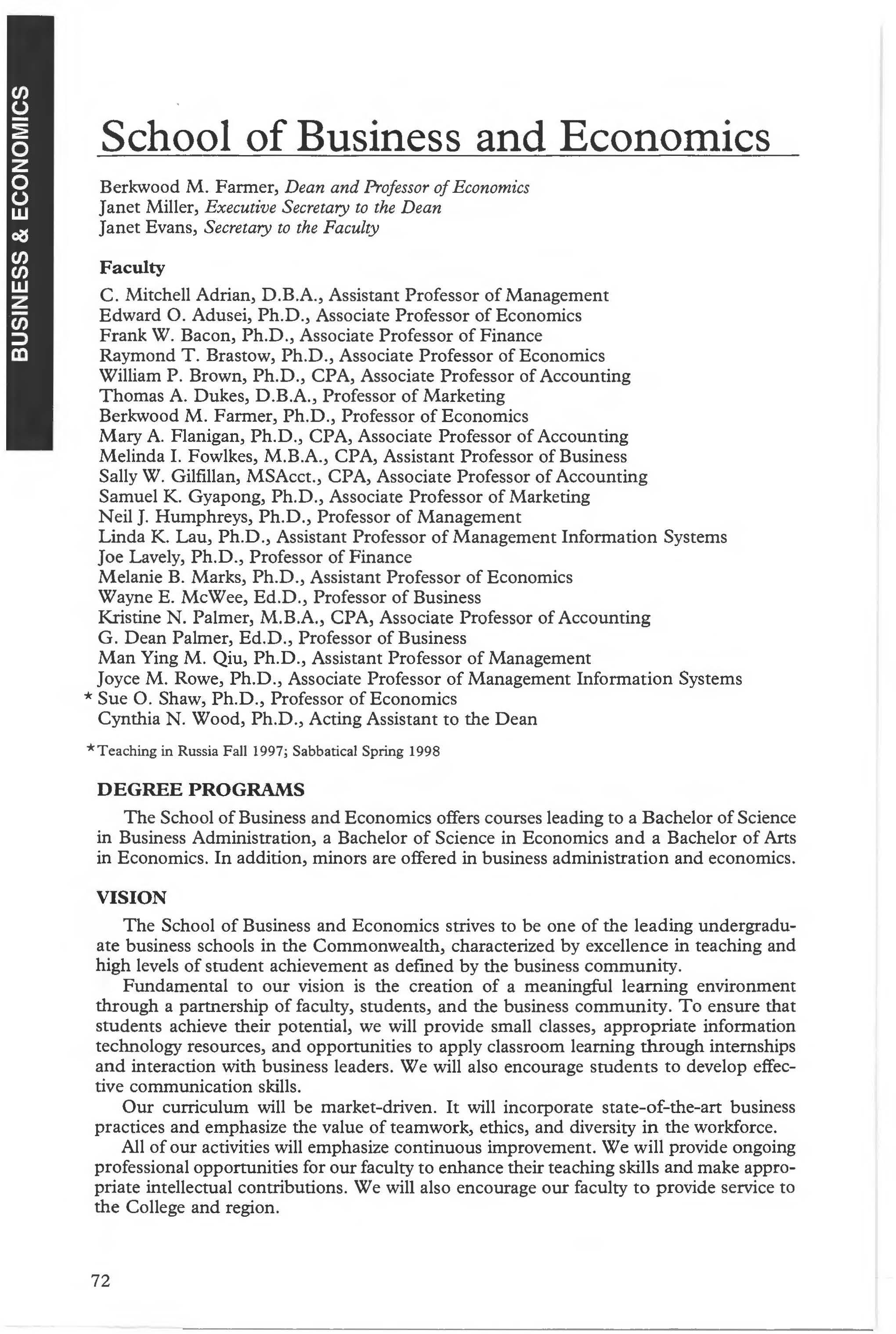
The School of Business and Economics offers courses leading to a Bachelor of Science in Business Administration, a Bachelor of Science in Economics and a Bachelor of Arts in Economics. In addition, minors are offered in business administration and economics.
The School of Business and Economics strives to be one of the leading undergraduate business schools in the Commonwealth, characterized by excellence in teaching and high levels of student achievement as defined by the business community.
Fundamental to our vision is the creation of a meaningful learning environment through a partnership of faculty, students, and the business community. To ensure that students achieve their potential, we will provide small classes, appropriate information technology resources, and opportunities to apply classroom learning through internships and interaction with business leaders. We will also encourage students to develop effective communication skills.
Our curriculum will be market-driven. It will incorporate state-of-the-art business practices and emphasize the value of teamwork, ethics, and diversity in the workforce.
All of our activities will emphasize continuous improvement. We will provide ongoing professional opportunities for our faculty to enhance their teaching skills and make appropriate intellectual contributions. We will also encourage our faculty to provide service to the College and region.
The School of Business and Economics prepares effective and successful business leaders capable of making sound contributions within the global marketplace. The market-driven curriculum reflects a strong commitment to a broad-based education and builds on the College's strong foundation in the liberal arts and science. Through exceptional teaching, superior advising and mentoring, and applied and pedagogical research, we develop graduates who possess the knowledge, skills, and attitudes demanded by the business community.
We will provide graduates with the capability to apply classroom knowledge to actual job situations. Critical to their success is the ability to make effective use of:
• Analytic techniques: Develop methodologies; identify and analyze key issues; make sound inferences from data; use effective problem-solving techniques
• Communication skills: Communicate effectively orally and in writing; organize and share information
• Computer technology: Use computer applications in making decisions
• Teamwork techniques: Interact effectively, be willing to act as a leader and tolerate individual differences
Graduates will also have specific knowledge in: accounting, finance, economics, management, marketing, and management information systems.
In addition, all graduates will have a broad-based general education and develop an awareness of the need for continuous life-long learning.
• Provide customer and market-based data to ensure that all Business School processes reflect the changing business environment
• Establish a supportive and creative faculty culture
• Create an exciting student environment that reflects a diverse society
• Establish a curriculum that reflects the needs of a changing business world
• Provide effective instructional resources
• Promote value-added intellectual contributions

Students accepted by Longwood College may be admitted into the School of Business and Economics.
• Courses must be taken in the order approved by the faculty of the School of Business and Economics. In the first semester, all students will be given a sample schedule. Additional copies are available in the Dean's Office.
• Students must declare a concentration before the preregistration date for the spring semester of their junior year.
• All prerequisites listed for individual courses must be satisfied (see individual course listings for prerequisites).
• Students must meet course requirements in general education, additional degree requirements, major requirements, and the requirements of a selected area of concentration. The B.S.B.A. degree program is structured progressively.
• Students may count no more than six credit hours of internship (the 492 courses) and/or Small Business Problem Solving (Management 468) toward the 120 credithour requirement for any degree offered by the School of Business and Economics.
• Any course substitution involving Major Requirements must be approved by the Dean, School of Business and Economics.
• A minimum of 50% of the total business hours must be taken at Longwood.
• Under special circumstances, a student may have a course prerequisite waived by obtaining written permission of the instructor and Dean of the School of Business and Economics.
• Every attempt has been made to state degree requirements as clearly as possible. Students are strongly encouraged to maintain close communication with their faculty advisor in order to plan a program that meets their individual goals and needs. Prior to registering for the second semester during the first year, all first-year students will be assigned an individual Business School faculty advisor. All transfer students will be assigned an individual Business School faculty advisor prior to registering for any courses. The faculty advisor will assist with program planning, course selection, course registration, and career planning.
• For the purpose of assessing the quality of the program, first year students and graduating seniors will be tested.
• The School of Business and Economics does not guarantee that all courses will be offered every year.
Students pursuing a Bachelor of Science in Business Administration degree (B.S.B.A.) must concentrate in one of the following six areas:
Accounting: Students concentrating in accounting take courses which provide both technical instruction and a managerial perspective relevant to a career in accounting. The accounting concentration is designed to prepare students to be professional accountants in industry, government, or public practice. Students who complete the requirements for a concentration in accounting are eligible to take the Virginia Certified Public Accountant examination.
Economics: Economic logic underlies all business decisions and all government policies. A goal of the economics concentration is to teach students how to think critically about a situation and analyze its implications. Emphasis is placed on exposing students to important consumer, business, government and international situations. Graduates with a background in economics are hired by government and industry. In addition, a concentration in economics is a traditional education for students wishing to enter law school.
Finance: The finance concentration prepares students to make financial assessments and managerial decisions as well as plan and supervise financial activities for businesses and clients. Financial managers must be knowledgeable in a wide variety of fields, including capital budgeting, investments, capital markets, financial institutions, and emerging financial instruments. The finance curriculum provides background in these areas.
Management: The management concentration explores the relationship of behavioral and quantitative managment techniques in the application of human resources, production processes, and organizational development. This curriculum provides students with skills in communication and critical thinking leading to management careers in any organization. In addition, the management skills of planning, directing, motivating, and controlling are essential for achieving organizational goals. The management concentration can provide a strong foundation for future graduate study in business .
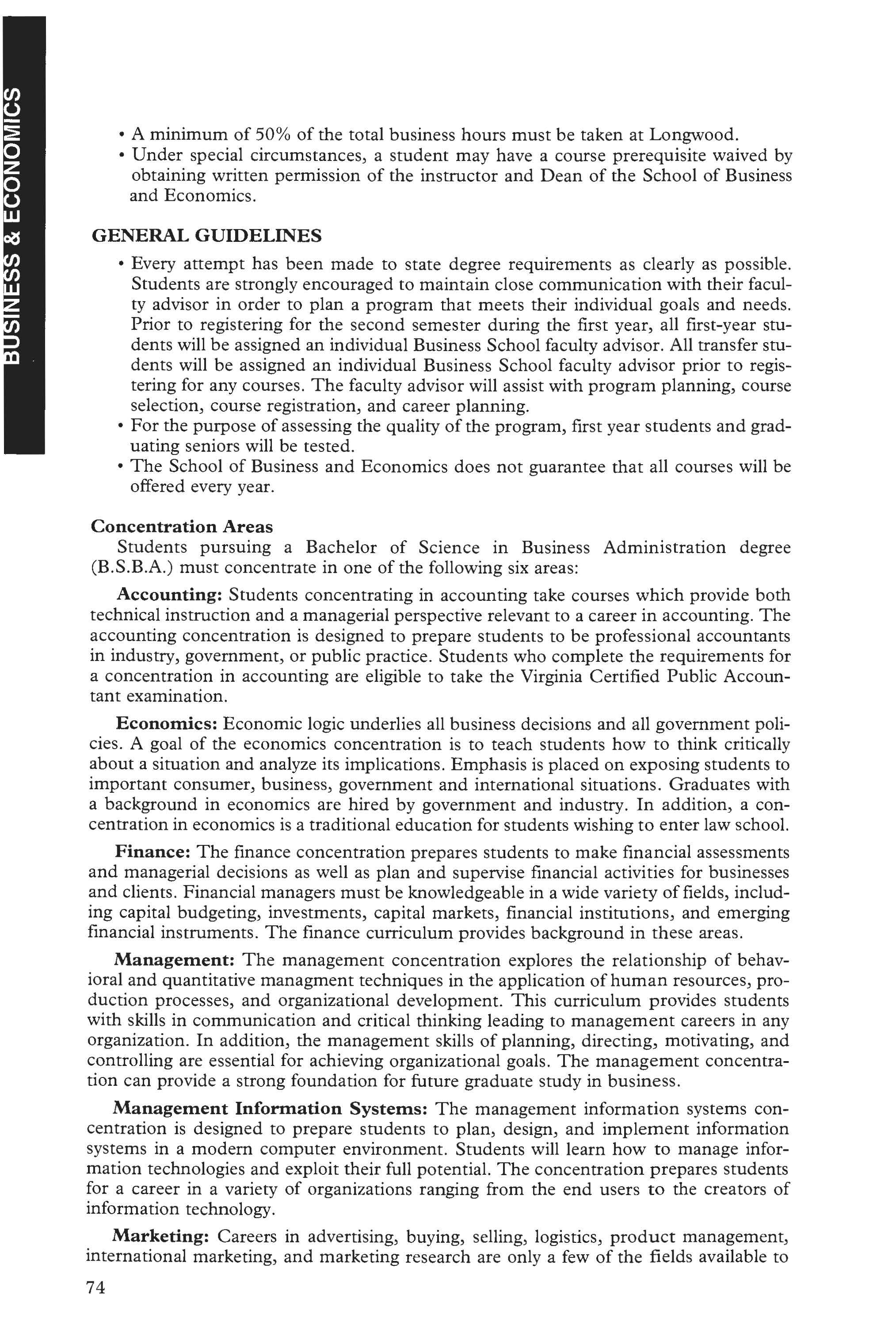
Management Information Systems: The management information systems concentration is designed to prepare students to plan, design, and implement information systems in a modern computer environment . Students will learn how to manage information technologies and exploit their full potential. The concentration prepares students for a career in a variety of organizations ranging from the end users to the creators of information technology.
Marketing: Careers in advertising, buying, selling, logistics, product management, international marketing, and marketing research are only a few of the fields available to
students concentrating in marketing. This concentration is designed to prepare students for managerial positions in these fields. The curriculum includes not-for-profit, governmental, and international applications of marketing knowledge. Classroom knowledge, internship opportunities, and involvement of students in business organizations are integral components of the marketing concentration.
A. General Education Core Reqµirements 33 credits
See General Education Requirements listed on pages 61-63.
Math 267/4 credits
Economics 21 7/3 credits
Natural Science/4 credits
1 General Core
Accounting 240/3 credits
Accounting 242/3 credits
Accounting 292/3 credits
Management 471/1 credit
Management 472/1 credit
Management 473/1 credit (Meets General Education Goal 10)
Economics 218/3 credits Management 275/3 credits
Management Information Systems 170/3 credits Management Information Systems 291/3 credits
Finance 350/3 credits
Management 360/3 credits
Marketing 380/3 credits Management 499/3 credits
Internship 492/1 credit see catalog description in specific concentration
Concentrations require one course from each group as indicated:
International Issues
Accounting 447/3 credits (Accounting), in addition, Accounting students take a 300-400 level economics course.
Economics 319/3 credits (Economics, Finance, Management, Management Information Systems, and Marketing).
Information Systems
Accounting 448/3 credits (Accounting)
Management Information Systems 370/3 credits (Economics, Finance, Management, Management Information Systems, and Marketing).
Quantitative Methods
Accounting 342/3 credits (Accounting)
Economics 312/3 credits (Economics, Finance)
Management 363/3 credits (Management, Management Information Systems, and Marketing).
In addition to completing the requirements, each candidate for the B.S. in Business
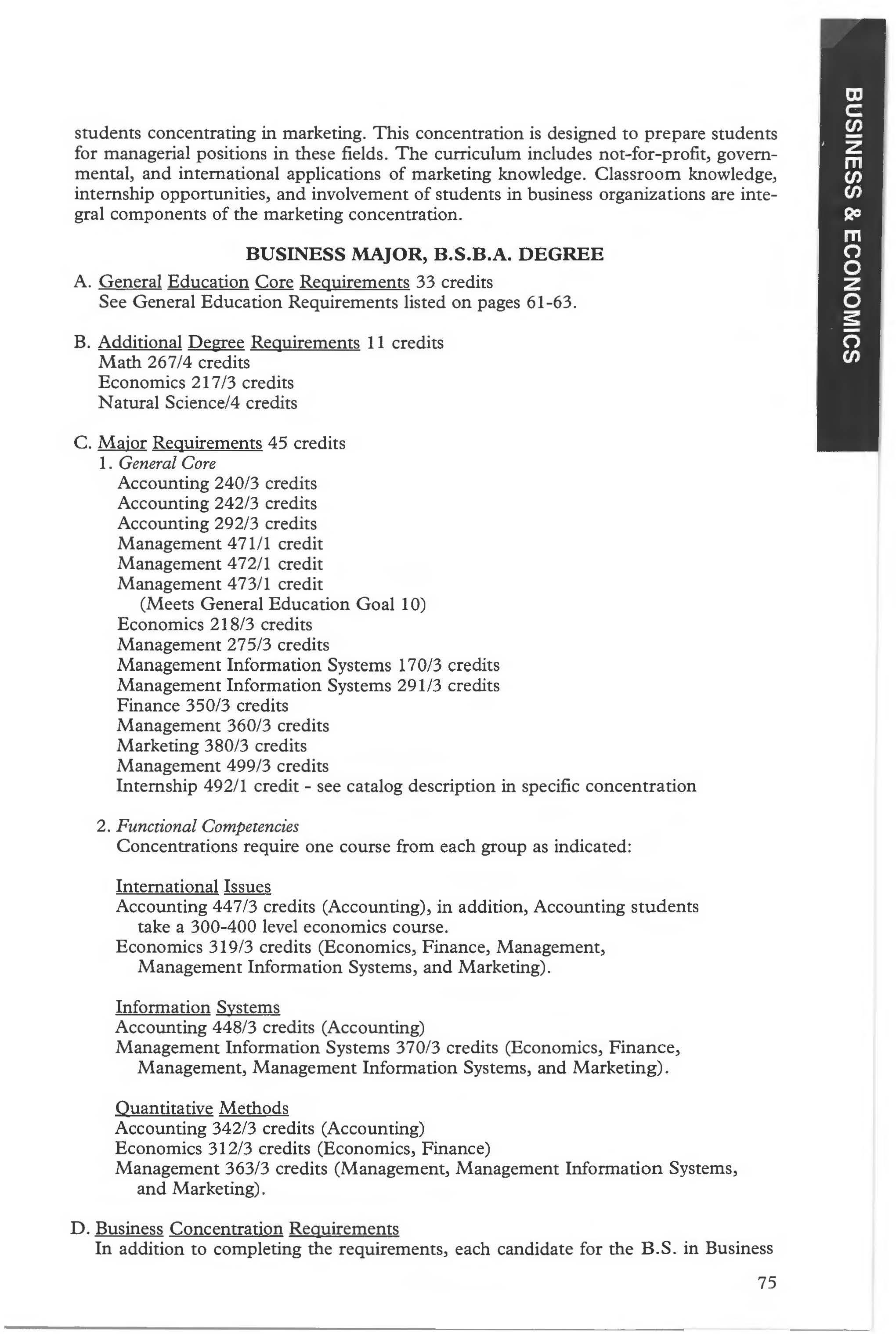
Administration degree shall satisfy the additional specific requirements of one of the following concentrations.
ACCOUNTING -24 credits
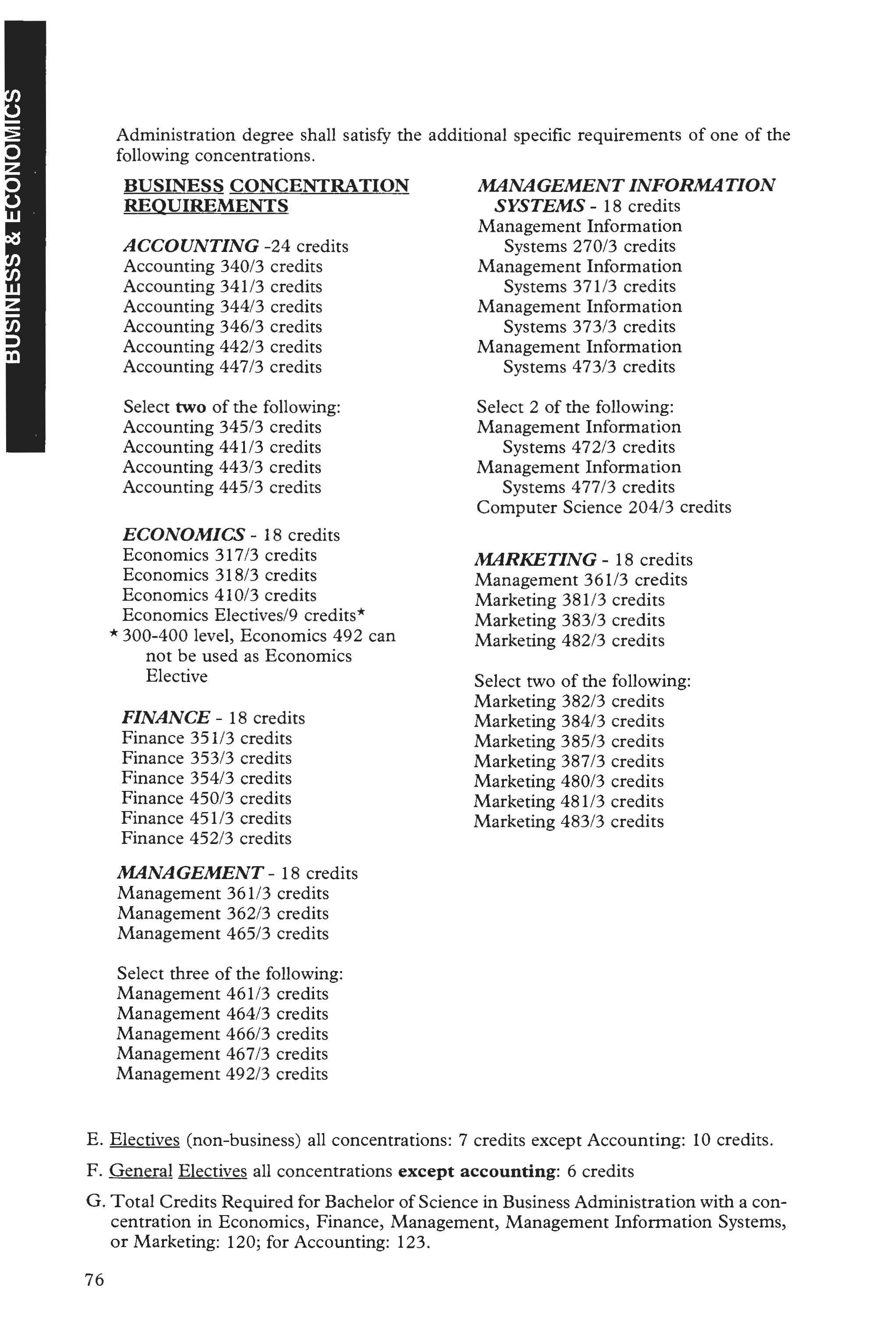
Accounting 340 / 3 credits
Accounting 341/3 credits
Accounting 344/ 3 credits
Accounting 346/3 credits
Accounting 442/3 credits Accounting 44 7 /3 credits
Select two of the following: Accounting 345/3 credits
Accounting 441/3 credits
Accounting 443/3 credits Accounting 445 / 3 credits
ECONOMICS 18 credits
Economics 317 /3 credits
Economics 318/3 credits Economics 410/3 credits Economics Electives/ 9 credits* * 300-400 level, Economics 492 can not be used as Economics Elective
FINANCE - 18 credits
Finance 351/3 credits Finance 353 / 3 credits Finance 354/3 credits Finance 450/3 credits Finance 451/3 credits Finance 452 / 3 credits
MANAGEMENT 18 credits
Management 361/3 credits Management 362/3 credits Management 465 / 3 credits
Select three of the following: Management 461/3 credits Management 464/3 credits Management 466/3 credits
Management 467 / 3 credits Management 492/3 credits
MANAGEMENT INFORMATION SYSTEMS 18 credits
Management Information Systems 270/3 credits Management Information Systems 371 / 3 credits Management Information Systems 373/3 credits Management Information Systems 473/3 credits
Select 2 of the following: Management Information Systems 4 72/3 credits Management Information Systems 4 77 / 3 credits Computer Science 204/3 credits
MARKETING- 18 credits
Management 361/3 credits Marketing 381/3 credits Marketing 383 / 3 credits Marketing 482 / 3 credits
Select two of the following: Marketing 382/3 credits Marketing 384/3 credits Marketing 385 / 3 credits Marketing 387 / 3 credits Marketing 480/3 credits Marketing 481/3 credits Marketing 483 / 3 credits
E. Electives (non-business) all concentrations: 7 credits except Accounting: 10 credits.
F. General Electives all concentrations except accounting: 6 credits
G. Total Credits Required for Bachelor of Science in Business Administration with a concentration in Economics, Finance, Management, Management Information Systems, or Marketing: 120; for Accounting: 123.
The School of Business and Economics offers a minor in Business Administration. Students must complete the following requirements.
BUSINESS ADMINISTRATION- 21 credits
Accounting 240/3 credits
Accounting 242/3 credits
Economics 217 / 3 credits
Economics 218/3 credits
Finance 350/3 credits
Management 360/3 credits Marketing 380/3 credits
MISY 170 and Mang 275 are prerequisites

If ignorance paid dividends, most Americans could make a fortune out of what they don't know about economics. So, imagine what could be done with knowledge about economics Economics is more than the study of the economy at large. Economics extends to business decision-making, such as, the analysis of the costs and benefits associated with a specific activity, determining optimal resource use and optimal output levels, the determination of prices in markets, the effects of regulation In fact, it can be argued that economic logic underlies all business decisions and all government policies. A goal of the economics program is to teach students how to think critically about a situation and analyze its implications. For example, how will businesses and workers be affected by the establishment of a national health care policy? If the price of inputs to a business production process increases, how should it respond? How will a business be affected in the world market by a weakening dollar? Emphasis is placed on exposing students to important analytical techniques. The students will, for example, learn some statistical techniques for data analysis that are commonly used by banking institutions, firms, and government agencies . Graduates with a background in economics are hired by government agencies that require extensive data analysis and policy evaluation. Industry hires economists for analysis and planning positions and financial industries also have a need for individuals with the ability to perform economic analysis. In addition, a major in economics is a traditional pre-law degree since students with a background in economics enter law school with well-refined analytical tools and an ability to think critically.
Two degrees in economics are offered: the Bachelor of Science and the Bachelor of Arts. Both degrees are designed to offer the student flexibility in fashioning the major, by teaching the student how to think critically about typical issues faced in business and social policy and how to analyze their implications Emphasis is placed on exposing the student to decision-making tools used in a variety of career paths All economics majors are required to take 36 hours of economics courses.
There are three curricular tracks offered for the Bachelor of Science in Economics, each of which has a different emphasis. The first track (Business Economics Concentration) focuses on economics while requiring students to take supporting courses in accounting, finance, computing, and statistical methods. It is designed to prepare students for analytical positions in a variety of businesses.
The second track (Technical Analysis Concentration) offers technical analysis and is intended for those students who plan to enroll in a master's or doctoral program upon leaving Longwood. In addition to economics requirements, this concentration emphasizes important analytical tools, such as math and statistics, that are essential to graduate school success. Students interested in this plan will be encouraged to take more math than the requirements suggest.
The third track (the Bachelor of Science degree without a concentration) provides the most flexibility in both course work and career choices.
There is one Bachelor of Arts degree offered, the Bachelor of Arts in International
Economics. This degree provides a wide ranging international experience. As pan of this program, the student is required to take international economics courses and the International Studies Minor. In addition, Longwood's Office of International Studies offers many study-abroad experiences which complement this major.
A. General Education Core Reguirements 33 credits
See General Education Requirements listed on pages 61-63.
B Additional Degree Reguirements IO or 11 credits
Math 164 or 267/3 or 4 credits
Social Science/3 credits Science/4 credits
C. Major Reguirements 55 credits
Economics 217, 218/6 credits
Economics 312/3 credits
Economics 317, 318/6 credits
Economics 410/3 credits
Economics 414/3 credits
Economics 492/1 credit
(Additional credits of ECON 492 may be taken as general electives)
Economics electives/IS credits* (at the 300 or 400 level) *ECON 492 may not be used as Economics electives
Accounting 240, 242/6 credits
Finance 350/3 credits
Finance elective/3 credits (at the 300 or 400 level)
Management Information Systems 170/3 credits Management 275/3 credits
D. Electives: 21 or 22 credits
No more than 12 credits can be taken in Business (ACCT, MANG, MARK, FINC, MISY) There is no limit to how many of these credits can be taken as ECON.
E. Total Credits Reguired for .a B.S. in Economics with .a Business Economics Concentration: 120
A. General Education Core Reguirements 33 credits
See General Education Requirements listed on pages 61-63.
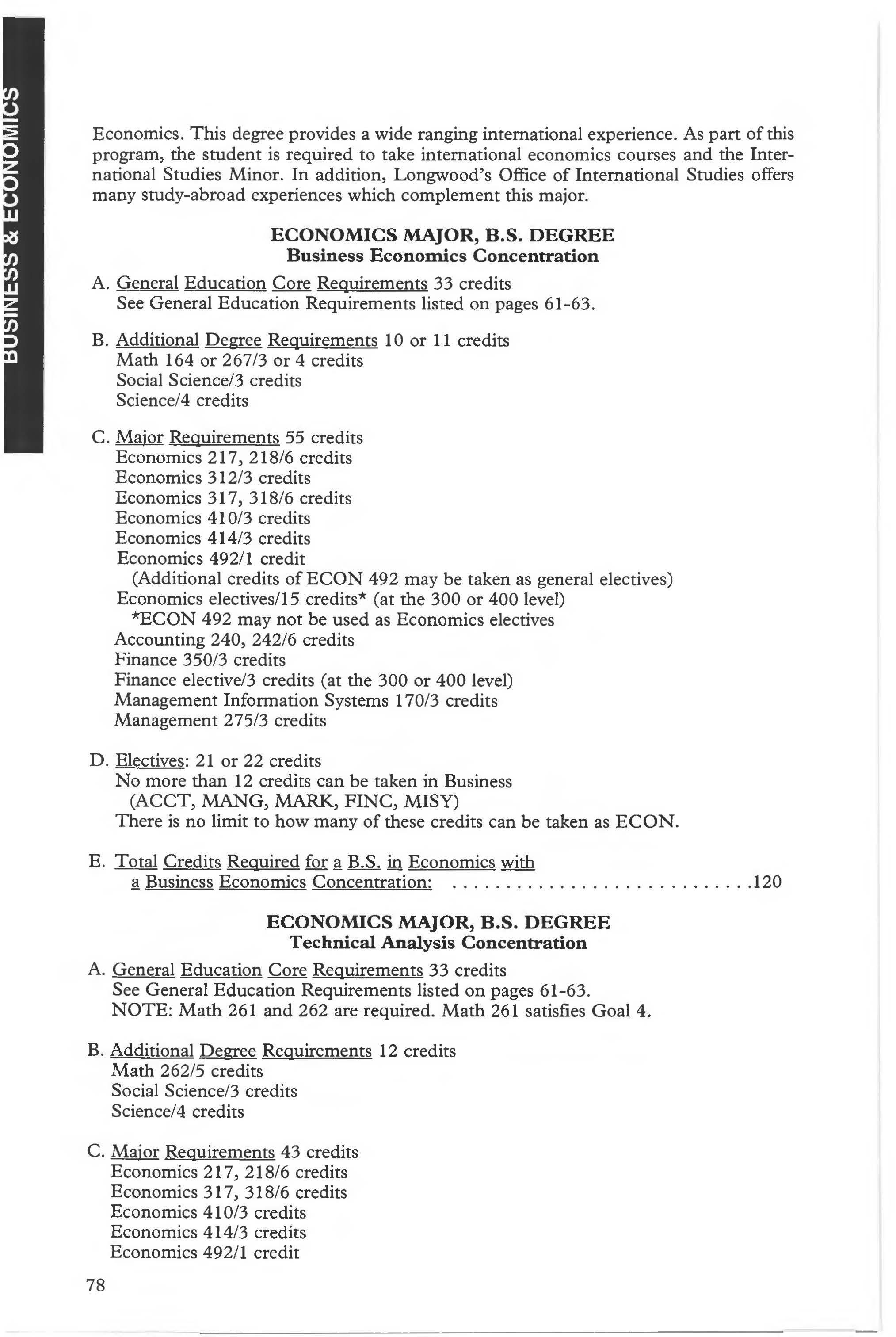
NOTE: Math 261 and 262 are required. Math 261 satisfies Goal 4.
B. Additional Degree Reguirements 12 credits
Math 262/5 credits
Social Science/3 credits Science/4 credits
C. Major Reguirements 43 credits
Economics 217, 218/6 credits
Economics 317, 318/6 credits
Economics 410/3 credits
Economics 414/3 credits
Economics 492/1 credit
(Additional credits of ECON 492 may be taken as general electives)
Economics electives/IS credits* (at the 300 or 400 level)
*ECON 492 may not be used as Economics electives Management Information Systems 170/3 credits Management 275/3 credits
D. Electives: 30 credits. No more than 24 credits can be taken in Business (ACCT, MANG, MARK, PINC, MISY).
There is no limit to how many credits can be taken in ECON.
E. Total Credits Required for .!l B.S. in Economics with .!l Technical Analysis
Concentration: 120
NOTE: Students considering graduate study in economics are strongly advised to consider a minor in math.
concentration)
A. General Education Core Requirements 33 credits
See General Education Requirements listed on pages 61-63.
B. Additional Degree Requirements 10 or 11 credits
Math 164 or 267/3 or 4 credits
Social Science/3 credits Science/4 credits
C. Major Requirements 43 credits
Economics 217, 218/6 credits
Economics 317, 318/6 credits
Economics 410/3 credits Economics 492/1 credit
(Additional credits of ECON 492 may be taken as general electives) Economics electives/21 credits* (at the 300 or 400 level)
*ECON 492 may not be used as Economics electives Management Information Systems 170/3 credits Management 275/3 credits
D. Electives: 33 or 34 credits
No more than 24 credits can be taken in Business (ACCT, MANG, MARK, PINC, MISY)
There is no limit to how many of these credits can be taken as ECON.
E. Total Credits Required for .!l B.S. in Economics: 120
Concentration
A. General Education Core Requirements 33 credits
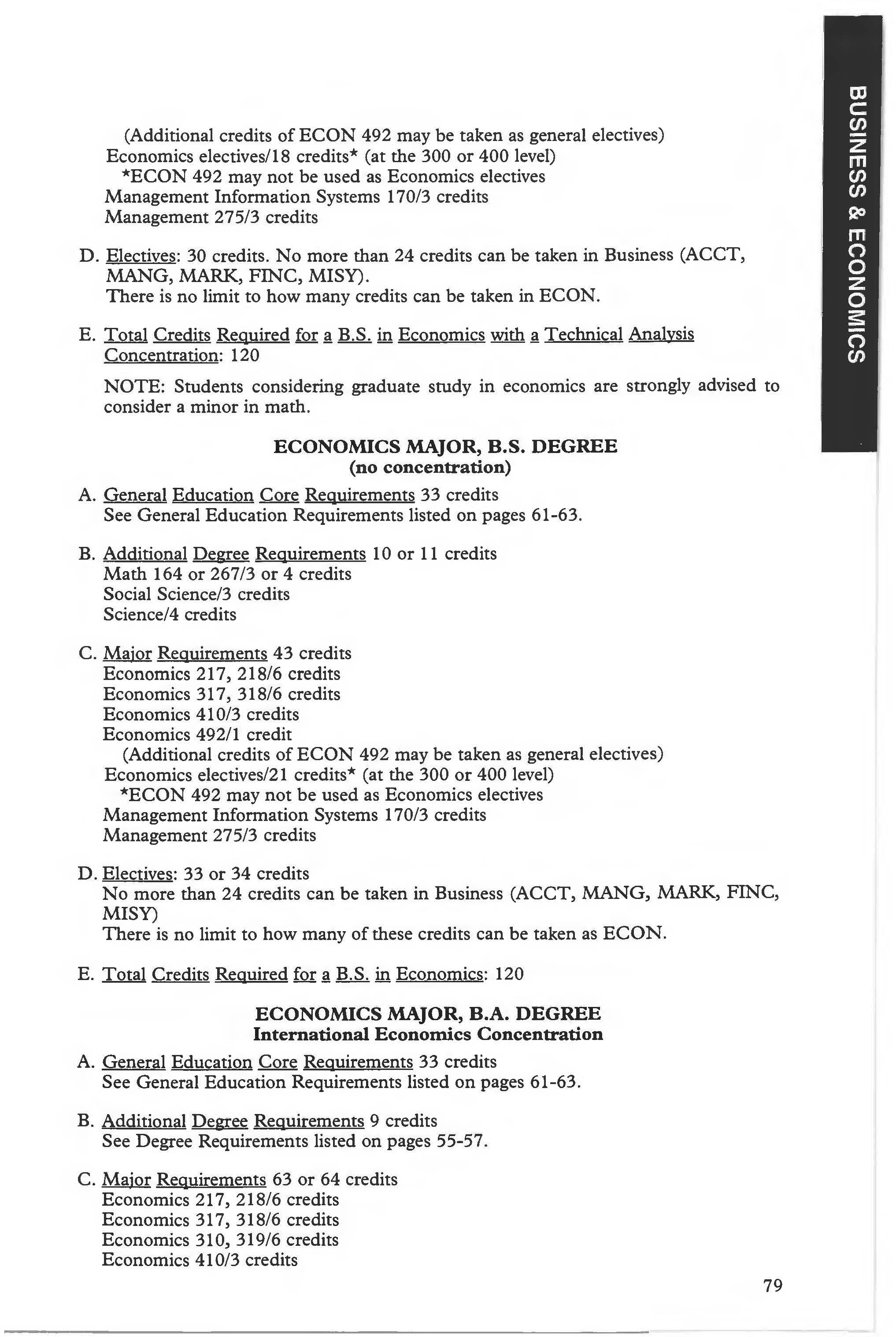
See General Education Requirements listed on pages 61-63.
B. Additional Degree Requirements 9 credits
See Degree Requirements listed on pages 55-57.
C. Major Requirements 63 or 64 credits
Economics 217, 218/6 credits
Economics 317, 318/6 credits
Economics 310, 319/6 credits
Economics 410/3 credits
Economics 492/1 credit
(Additional credits of ECON 492 may be taken as general electives)
Economics electives/15 credits* (at the 300 or 400 level)
*ECON 492 may not be used as Economics electives International Studies Minor/I 8 credits
MISY 170/3 credits
Management 275/3 credits Math 164 or 267 /3 or 4 credits
D. General Electives: 13 or 14 credits
E. Total Credits Reguired for B.S. in Economics with Concentration in International Economics: .......................... 120
The School of Business and Economics offers a minor in Economics. Students must complete the following requirements:
ECONOMICS 21 credits
Economics 217 /3 credits
Economics 218/3 credits
Economics 31 7 or 318/3 credits
Electives in Economics/12 credits (at the 300 or 400 level) (Economics 492 may not be used as Economics elective)
Faculty and Staff
Kevin C. Henderson, Captain, Assistant Professor of Military Science Dana Owen, Secretary SFC David T. Peterson, Instructor
Army ROTC (Reserve Officer's Training Corps) is a four- or two-year course of study, open to men and women, who are interested in exploring the possibility of earning a commission as an army officer during their college years and may be taken by students concurrently with their regular work. Credits earned in Military Science are counted as elective hours and may be applied toward hours required to fulfill the graduate requirements for any degree.
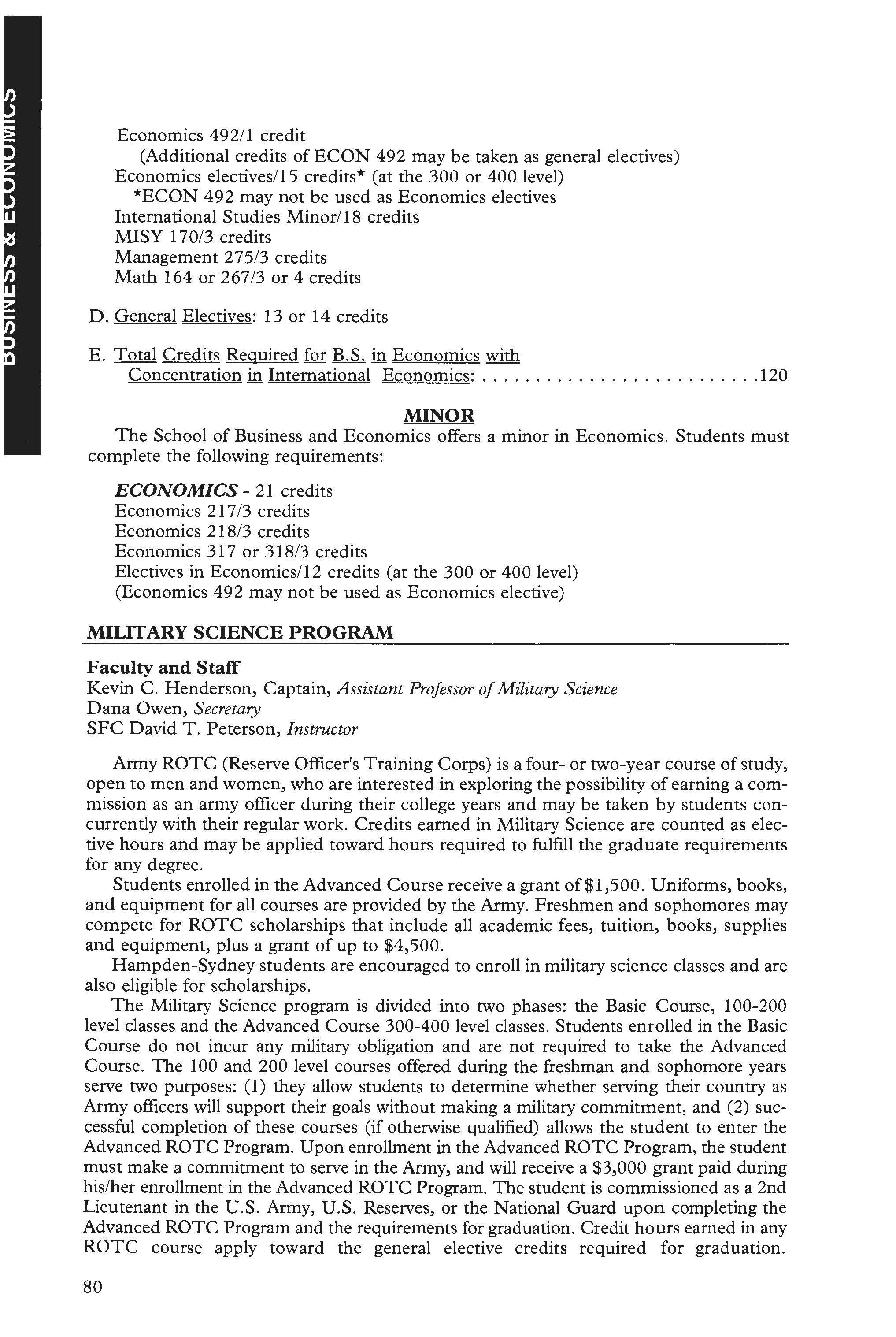
Students enrolled in the Advanced Course receive a grant of$1,500. Uniforms, books, and equipment for all courses are provided by the Army. Freshmen and sophomores may compete for ROTC scholarships that include all academic fees, tuition, books, supplies and equipment, plus a grant of up to $4,500.
Hampden-Sydney students are encouraged to enroll in military science classes and are also eligible for scholarships.
The Military Science program is divided into two phases: the Basic Course, 100-200 level classes and the Advanced Course 300-400 level classes. Students enrolled in the Basic Course do not incur any military obligation and are not required to take the Advanced Course. The 100 and 200 level courses offered during the freshman and sophomore years serve two purposes: (1) they allow students to determine whether serving their country as Army officers will support their goals without making a military commitment, and (2) successful completion of these courses (if otherwise qualified) allows the student to enter the Advanced ROTC Program. Upon enrollment in the Advanced ROTC Program, the student must make a commitment to serve in the Army, and will receive a $3,000 grant paid during his/her enrollment in the Advanced ROTC Program. The student is commissioned as a 2nd Lieutenant in the U.S. Army, U.S. Reserves, or the National Guard upon completing the Advanced ROTC Program and the requirements for graduation. Credit hours earned in any ROTC course apply toward the general elective credits required for graduation.
* General Education Course **n,. . . I . C wrzting ntensive ourses
Accounting 240. PRINCIPLES OF ACCOUNTING I. Basics of the accounting cycle, including use of journals and ledgers, and the preparation of balance sheets and income statements. 3 credits.
Accounting 242. PRINCIPLES OF ACCOUNTING II. Continuation of ACCT 240. Preparation of statement of cash flows. Accounting for owners' equity in partnerships and corporations, standard costs and budgeting, cost-volume-profit analysis, and analysis of financial data. Prerequisite: ACCT 240. 3 credits.
Accounting 292. LEGAL ENVIRONMENT. A survey of the critical business law requirements that are needed for dayto-day business operations. Topics such as contracts, consumer protection, agency and bailments will be included. 3 credits.
Accounting 295. SPECIAL TOPICS IN ACCOUNTING. Selected topics in accounting. Topics may vary from semester to semester. May be repeated for credit when topics change. Prerequisite: Permission of the instructor. 1-3 credits.
Accounting 340. INTERMEDIATE ACCOUNTING I. Review of the accounting cycle; development of the theoretical foundation of financial reporting; accounting for assets; payroll accounting: additional topics related to current developments in financial accounting and reporting. Prerequisites: ACCT 242 with a C- or better. 3 credits.
Accounting 341. INTERMEDIATE ACCOUNTING II. Continuation of Accounting 340. Accounting for assets, liabilities, stockholders' equity, and cash flows; financial statement disclosure and analysis; additional topics related to current developments in accounting. Prequisite: ACCT 340 . 3 credits.
Accounting 342. COST ACCOUNTING. The study of basic cost accounting sys-
terns and concepts. Consideration of inventory costing, cost variance analysis, budgeting, and managerial decision making based on economic considerations. Prerequisite: ACCT 242 with a C- or better. 3 credits.
Accounting 343. MANAGERIAL ACCOUNTING. Accounting concepts and techniques for managerial planning and control. Attention is given to budgeting, capital outlay decisions, evaluation of performance, and current and long-range planning. Prerequisites: ACCT 242 with a C- or better, MISY 170, and MANG 275. 3 credits.
**Accounting 344. TAX ACCOUNTING I. A comprehensive study of income tax problems relating to individuals. These topics, among others, will be studied: income, exclusions, gain or loss on sales, exchange and involuntary conversions, deductions, exemptions and credits. Prerequisite: ACCT 242 with a C- or better. 3 credits.
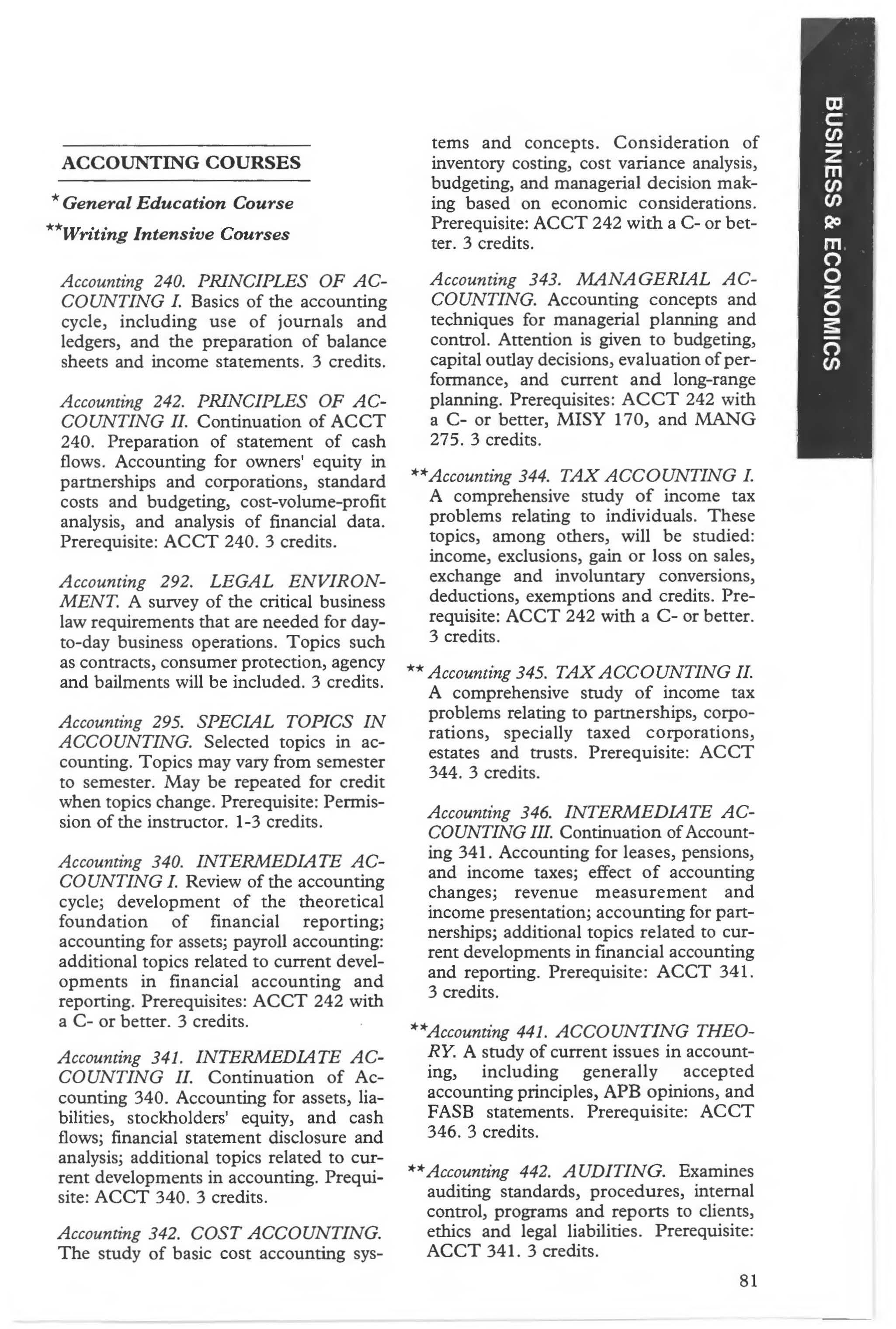
** Accounting 345. TAX ACCOUNTING II. A comprehensive study of income tax problems relating to partnerships, corporations, specially taxed corporations, estates and trusts. Prerequisite: ACCT 344. 3 credits.
Accounting 346. INTERMEDIATE ACCOUNTING Ill. Continuation of Accounting 341. Accounting for leases, pensions, and income taxes; effect of accounting changes; revenue measurement and income presentation; accounting for partnerships; additional topics related to current developments in financial accounting and reporting. Prerequisite: ACCT 341. 3 credits
**Accounting 441. ACCOUNTING THEORY. A study of current issues in accounting, including generally accepted accounting principles, APB opinions, and FASB statements. Prerequisite: ACCT 346. 3 credits.
**Accounting 442. AUDITING. Examines auditing standards, procedures, internal control, programs and reports to clients, ethics and legal liabilities. Prerequisite: ACCT 341. 3 credits.
Accounting 443. GOVERNMENTAL NOT-FOR-PROFIT AND ADVANCED ACCOUNTING. Fund and budget accounting for governmental and not-forprofit entities. Consolidated financial reporting for corporations. Prerequisite: ACCT 341. 3 credits.
Accounting 445. LAW FOR ACCOUNTANTS. This course is designed to present students concentrating in accounting with a broad overview of the legal environment of U.S. business operations with emphasis on areas of substantive law that entry level professional accountants are expected to know. 3 credits.
Accounting 447. INTERNATIONAL ACCOUNTING. This course introduces students to the problems that the U.S. accountant faces when functioning in the global economy. The course starts with a survey of accounting systems around the world. Included are discussions of comparative financial accounting practices and how systems can be grouped or clustered based on their measurement and disclosure requirements. Efforts towards harmonization of accounting standards through International Accounting Standards will be examined. The second part of the course covers the international aspects of specific financial topics: accounting for price changes, foreign currency exposure and translation, and analysis of foreign financial statements . The last part of the course addresses the international audit environment and managerial concepts in the multinational entity. Prerequisite: ACCT 341. 3 credits.
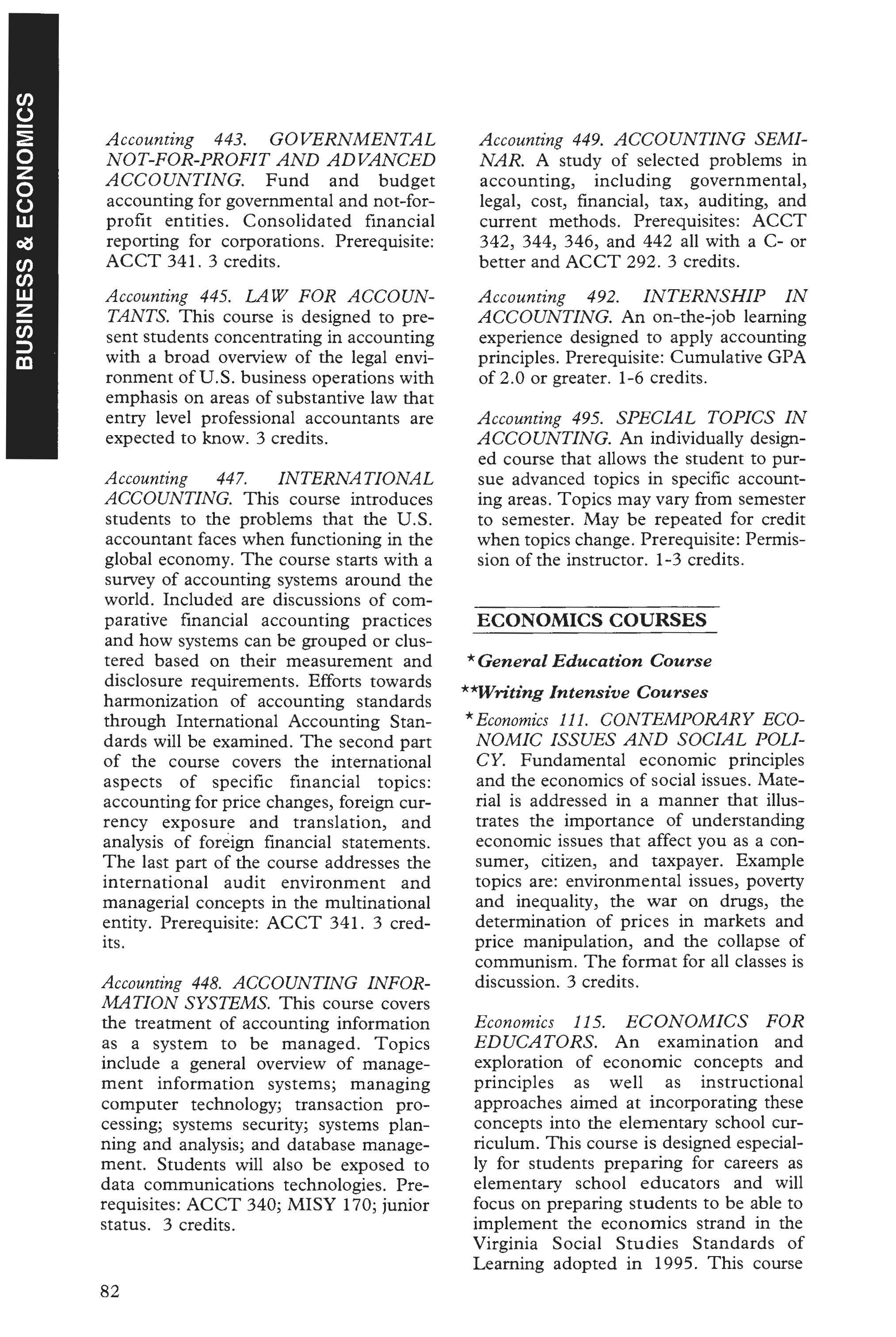
Accounting 448. ACCOUNTING INFORMATION SYSTEMS. This course covers the treatment of accounting information as a system to be managed. Topics include a general overview of management information systems; managing computer technology; transaction processing; systems security; systems planning and analysis; and database management. Students will also be exposed to data communications technologies. Prerequisites: ACCT 340; MISY 170; junior status. 3 credits.
Accounting 449. ACCOUNTING SEMINAR. A study of selected problems in accounting, including governmental, legal, cost, financial, tax, auditing, and current methods. Prerequisites: ACCT 342, 344, 346, and 442 all with a C- or better and ACCT 292. 3 credits.
Accounting 492. INTERNSHIP IN ACCOUNTING. An on-the-job learning experience designed to apply accounting principles. Prerequisite: Cumulative GPA of 2.0 or greater. 1-6 credits.
Accounting 495. SPECIAL TOPICS IN ACCOUNTING. An individually designed course that allows the student to pursue advanced topics in specific accounting areas. Topics may vary from semester to semester. May be repeated for credit when topics change. Prerequisite: Permission of the instructor. 1-3 credits.
* General Education Course
**Writing Intensive Courses
* Economics 111. CONTEMPORARY ECONOMIC ISSUES AND SOCIAL POLICY Fundamental economic principles and the economics of social issues. Material is addressed in a manner that illustrates the importance of understanding economic issues that affect you as a consumer, citizen, and taxpayer. Example topics are: environmental issues, poverty and inequality, the war on drugs, the determination of prices in markets and price manipulation, and the collapse of communism. The format for all classes is discussion. 3 credits.
Economics 115. ECONOMICS FOR EDUCATORS. An examination and exploration of economic concepts and principles as well as instructional approaches aimed at incorporating these concepts into the elementary school curriculum. This course is designed especially for students preparing for careers as elementary school educators and will focus on preparing students to be able to implement the economics strand in the Virginia Social Studies Standards of Learning adopted in 1995. This course
may not be taken for credit by business or economics majors. 3 credits.
Economics 217. PRINCIPLES OF ECONOMICS (MICRO EMPHASIS). Overview of economic theory and real world applications. For example, how are prices in the economy determined? How do economic markets operate? How do economic events such as technological advances, increases in input prices, and government policy changes affect market prices and the consumer? Some time will be spent on discussion of market structures such as competitive markets versus monopoly. Real world applications will be used to illustrate economic theories. 3 credits.
Economics 218. PRINCIPLES OF ECONOMICS (MACRO EMPHASIS). Study of the economy as a whole. Topics include the determination of a general price level for the economy, determinants of inflation, unemployment, interest rates, and Gross Domestic Product. For example, this course addresses how the Federal Reserve uses monetary policy to manipulate economic activity, inflation, and interest rates. 3 credits.
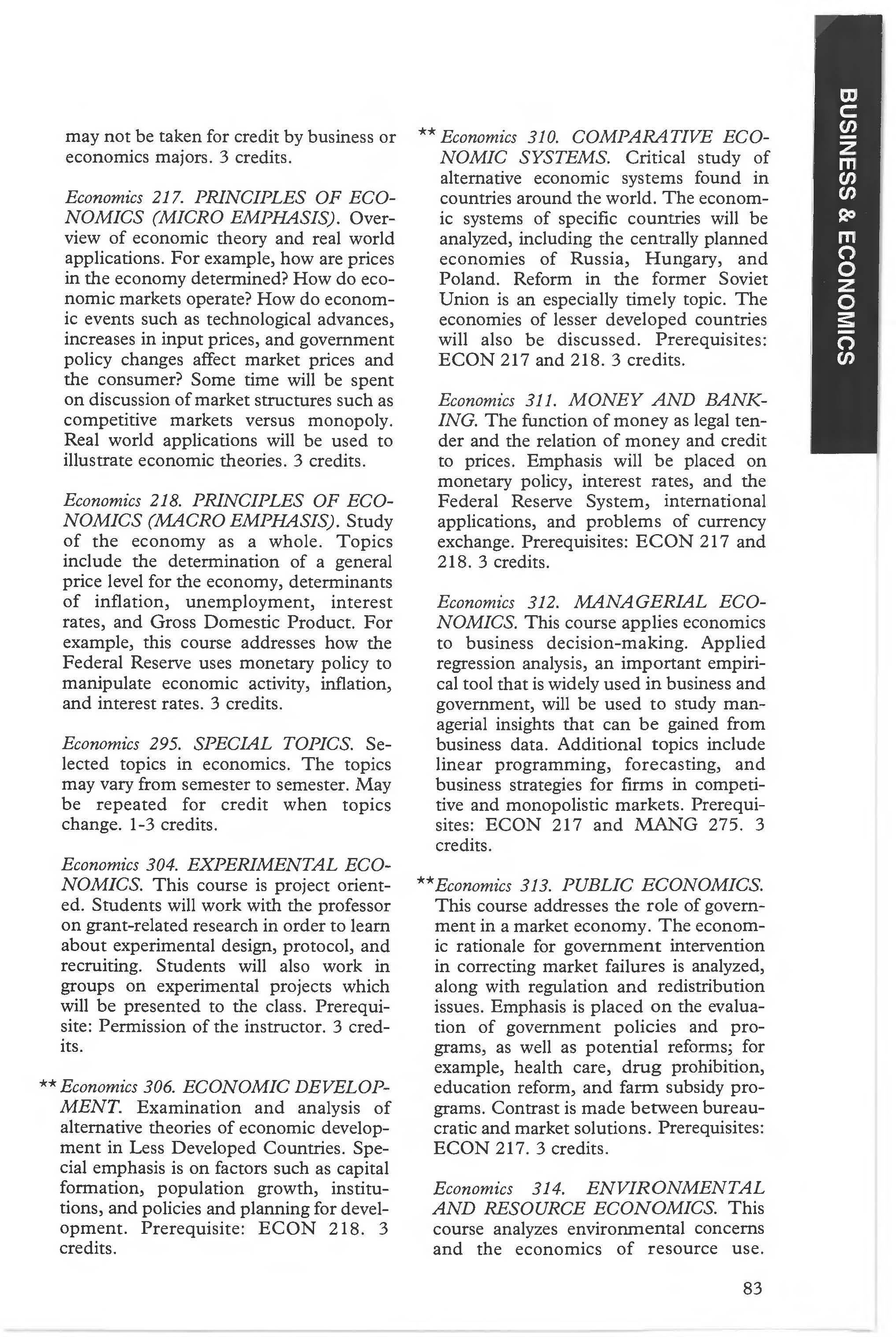
Economics 295. SPECIAL TOPICS. Selected topics in economics. The topics may vary from semester to semester. May be repeated for credit when topics change. 1-3 credits.
Economics 304. EXPERIMENTAL ECONOMICS. This course is project oriented. Students will work with the professor on grant-related research in order to learn about experimental design, protocol, and recruiting. Students will also work in groups on experimental projects which will be presented to the class. Prerequisite: Permission of the instructor. 3 credits.
** Economics 306. ECONOMIC DEVELOPMENT. Examination and analysis of alternative theories of economic development in Less Developed Countries. Special emphasis is on factors such as capital formation, population growth, institutions, and policies and planning for development. Prerequisite: ECON 218. 3 credits.
** Economics 310. COMPARATIVE ECONOMIC SYSTEMS. Critical study of alternative economic systems found in countries around the world. The economic systems of specific countries will be analyzed, including the centrally planned economies of Russia, Hungary, and Poland. Reform in the former Soviet Union is an especially timely topic. The economies of lesser developed countries will also be discussed. Prerequisites: ECON 217 and 218. 3 credits.
Economics 311. MONEY AND BANKING. The function of money as legal tender and the relation of money and credit to prices. Emphasis will be placed on monetary policy, interest rates, and the Federal Reserve System, international applications, and problems of currency exchange. Prerequisites: ECON 217 and 218. 3 credits.
Economics 312. MANAGERIAL ECONOMICS. This course applies economics to business decision-making. Applied regression analysis, an important empirical tool that is widely used in business and government, will be used to study managerial insights that can be gained from business data. Additional topics include linear programming, forecasting, and business strategies for firms in competitive and monopolistic markets. Prerequisites: ECON 217 and MANG 275. 3 credits.
** Economics 313. PUBLIC ECONOMICS. This course addresses the role of government in a market economy. The economic rationale for government intervention in correcting market failures is analyzed, along with regulation and redistribution issues. Emphasis is placed on the evaluation of government policies and programs, as well as potential reforms; for example, health care, drug prohibition, education reform, and farm subsidy programs. Contrast is made between bureaucratic and market solutions. Prerequisites: ECON 217. 3 credits.
Economics 314. ENVIRONMENTAL AND RESOURCE ECONOMICS. This course analyzes environmental concerns and the economics of resource use.
Specifically, a contrast will be made between governmental solutions to environmental issues and market-based environmental reforms. Issues addressed include: animal extinction and common ownership problems, pollution, water management, global warming / global cooling, and land management. The underlying theme of the course is the ability to use economic theory to develop appropriate incentive structures for the use of economic resources. Prerequisite: ECON 217. 3 credits.
** Economics 315. ECONOMIC HISTORY OF THE UNITED STATES The economy of the United States from the Colonial era to the present day. Emphasis is on economic foundations of social and political evolution, from slavery through the Great Depression to the emergence of the Pacific Rim. Paper required . 3 credits.
** Economics 316. HISTORY OF ECONOMIC THOUGHT Selected theories of economics, from Aristotle to Buchanan. Emphasis on developments in economic thinking after the advent of Adam Smith's Wealth of Nations, with particular attention given to mercantilism, classical thought, institutionalists, monetarism, Keynesian economics, and neoclassical thought Paper required. 3 credits.
Economics 317. INTERMEDIATE MICROECONOMICS. Advanced topics in microeconomics supplemented by applications of microeconomic theory to policy and business issues. Theory of the consumer and production will be emphasized. Prerequisite: ECON 217. 3 credits.
Economics 318. INTERMEDIATE MACROECONOMICS. Advanced coverage of monetary and fiscal theory and policy with emphasis on money supply and interest rates, national income determination, unemployment, inflation, and international issues. Prerequisites: ECON 217 and 218. 3 credits.
**Economics 319. INTERNATIONAL ECONOMICS. Analytical approach to gains derived from trade, treatment of various theories of international trade (classical
and current). Includes analysis of economic and political influences on exports and imports, foreign exchange rates, concept of elasticity as applied to international trade, balance of payments, significance of foreign trade and investment. Prerequisites: ECON 217 and 218. 3 credits
** Economics 410 SENIOR SEMINAR. Designed as a seminar for senior level economics students . The course will be project oriented . Emphasis placed on discussion and project presentation. Topics will vary by semester. Prerequisites : Senior status in economics or approval of instructor. 3 credits.
Economics 411. ECONOMICS OF LABOR AND DISCRIMINATION. Economic analysis of labor markets, including issues of labor supply and demand, wage determination, unemployment, job search, education, and other human capital investments. Emphasis will be placed on the analysis of data on labor market outcomes relative to ethnicity and gender. Theories of discrimination will be addressed. Policy issues and programs such as minimum wage, comparable worth pay programs, and affirmative action will be discussed. Prerequisite: ECON 217. 3 credits.
Economics 412. INDUSTRIAL ORGANIZATION AND REGULATION. Focus will be on organization of the firm and the impacts of regulation. Topics include industrial pricing practices, reasons why firms exist, why they vertically or horizontally integrate, and recent downsizing trends. The regulation component will address antitrust legislation, pricing regulations, and rate of return regulations such as those commonly imposed on public utilities. Prerequisite: ECON 217. 3 credits.
Economics 414. ECONOMETRICS AND FORECASTING. Introduction to the basic concepts used in economic data analysis. Emphasis is on applications of linear regression techniques to analyze common empirical problems in economics, business, and government. Forecasting techniques that are commonly used
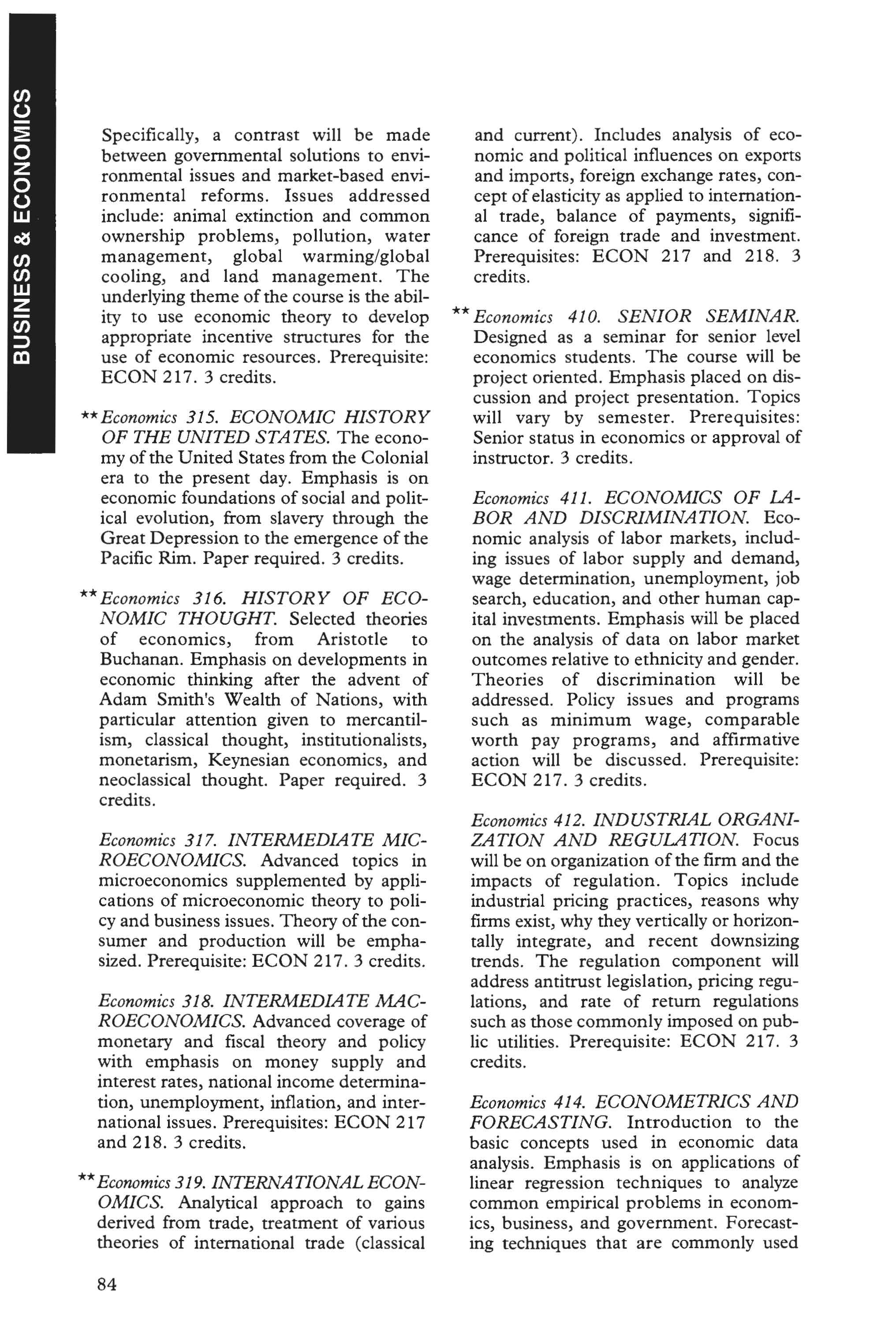
by economists will be covered. Students will receive hands-on experience in data collection, computer software, and project design. Prerequisites: ECON 217 and 218, MANG 275 or Math 171. 3 credits.
Economics 415. TEACHING ENVIRONMENTAL ECONOMICS. Educator oriented course applying economics to environmental issues such as resource scarcity, pollution, property rights, garbage and recycling, oil spills, and endangered species. Students will learn how markets and prices can be used to help solve environmental problems. Course cannot be used as credit towards economics major or minor in economics. Students cannot receive credit for both ECON 415/EDUC 415 and ECON 500 or both ECON 415/EDUC 415 and ECON 314. 3 credits.
Economics 492 INTERNSHIP IN ECONOMICS. Internship in economics is an on-the-job learning experience designed to give students applied experience with economics principles. Prerequisite: Cumlative GPA of 2.0 or greater. 1-6 credits.
Economics 495. SPECIAL TOPICS. Selected topics in economics. The topics may vary from semester to semester May be repeated for credit when topics change. 1-3 credits.
Economics 498. ADVANCED TOPICS IN ECONOMICS. This is an individually designed course that allows the student to pursue advanced topics in specific areas of economics. Prerequisites: Senior standing and permission of instructor. 13 credits.
** Economics 500. ENVIRONMENTAL ECONOMICS. This course analyzes the economics of resource use, focusing on market based environmental reforms. Issues addressed include: animal extinction and common ownership problems, pollution, water and air regulation, garbage and recycling. This course is intended for students in the Masters in Environmental Studies program. Prerequisite: ECON 217. 3 credits.
** Writing Intensive Course
** Finance 250. PERSONAL FINANCE. Basic fundamentals in selected areas of personal finance; role of the individual as a consumer and as an investor. 3 credits
Finance 295 SPECIAL TOPICS. Selected topics in finance . The topics may vary from semester to semester . May be repeated for credit when topics change. Prerequisite: Permission of Instructor. 13 credits .
Finance 350. PRINCIPLES OF FINANCE Principles and practices of financial management within a business firm. Examines acquisition of funds, cash flow, financial analysis, capital budgeting, working capital requirements, and capital structure. Prerequisites: MISY 170, ACCT 240 and 242, ECON 217 and 218, and MANG 275. 3 credits.

Finance 351. RISK MANAGEMENT An introduction to the fundamentals of risk management. General understanding of the varied applications of the principles of insurance to situations involving risk. Prerequisite: FINA 350. 3 credits.
Finance 353. MANAGERIAL FINANCE. This course focuses on corporate financial decision-making Topics include risk assessment, capital budgeting, cost of capital, and asset pricing models Prerequisite: FINA 350. 3 credits.
Finance 354. WORKING CAPITAL AND TREASURY FUNCTIONS. This course complements FINA 353; it concerns managing liquidity, working capital, longterm liabilities, selecting a capital structure, and obtaining long-term financing. Prerequisite: FINA 350. 3 credits.
**Finance 450. FINANCIAL MANAGEMENT. Considerations, analyses and decisions pertinent to the financial management of a business firm. The course will make extensive use of cases. Prerequisite: FINA 350. 3 credits.
Finance 451. INVESTMENT ANALYSIS AND PORTFOLIO MANAGEMENT. Characteristics and analysis of individual securities as well as the theory and practice of optimally combining securities into portfolios. The presentation of material is intended to be rigorous and practical, without being overly quantitative. Prerequisite : FINA 350 . 3 credits .
Finance 452. FINANCIAL MARKETS AND INSTITUTIONS. Characteristics of and interrelationships among financial markets, securities, and institutions. Includes analysis of futures, options, swaps, and other derivative instruments. Prerequisite: FINA 350. 3 credits.
Finance 453. PRINCIPLES OF REAL ESTATE. Principles of ownership and transfer of real property interests; buying, selling, or leasing residential or investment real estate; and legal, economic, financial, and appraisal aspects of the subject matter. Prerequisite: FINA 350. 4 credits
Finance 492. INTERNSHIP IN FINANCE. Internship in finance is an onthe-job learning experience designed to give students applied experience with finance principles. Prerequisite: Cumulative GPA of 2 0 or greater. 1-6 credits.
Finance 495. SPECIAL TOPICS. Selected topics in finance. The topics may vary from semester to semester. May be repeated for credit when topics change Prerequisite: Permission of instructor. 1-3 credits.
Finance 498. AD VAN CED FINANCE TOPICS. Advanced topics in finance. This is an individually designed course that allows the student to pursue advanced topics in specific finance areas. Prerequisites: Senior standing and permission of instructor. 1-3 credits.
* General Education Course
**Writing Intensive Course
Management 190. INTRODUCTION TO THE AMERICAN BUSINESS SYS-
TEM. Operations of the American Business System and its place in the economy. The course provides the basic understanding of the business world, philosophy, objectives, and general responsibilities to the environment, government, and society. 3 credits.
Management 275. BUSINESS STATISTICS. An introductory course in statistics stressing managerial applications. Interpret and analyze business data for use in managerial decision-making. Topics include descriptive statistics, probability sampling, estimation, hypothesis testing, and regression correlation analysis 3 credits.
Management 295. SPECIAL TOPICS: MANAGEMENT. Selected topics in management. The topics may vary from semester to semester. May be repeated for credit when topics changes Prerequisite: Permission of instructor. 1-3 credits.
Management 360 PRINCIPLES OF MANAGEMENT. Management fundamentals with emphasis on theories of management, the evolution of management thought, and the functions of management in organizational activity. Prerequisites : PSYC 101 or 131 or SOCL 101. 3 credits.
Management 361. OPERATIONS MANAGEMENT. Principles and practices related to production and service operations management, including product and service decision, process planning, plant location, facilities layout, scheduling, and associated analytical techniques. Prerequisite : MANG 360. 3 credits.
Management 362. ORGANIZATION BEHAVIOR. Structure and processes of organizations and the dynamics of behavior within organizations. Motivation, group behavior, managing conflict, leadership, communication, decision-making, career processes, and organizational change and development. Prerequisite: MANG 360. 3 credits.
Management 363. INTRODUCTION TO MANAGEMENT SCIENCE. Concepts and techniques of management science
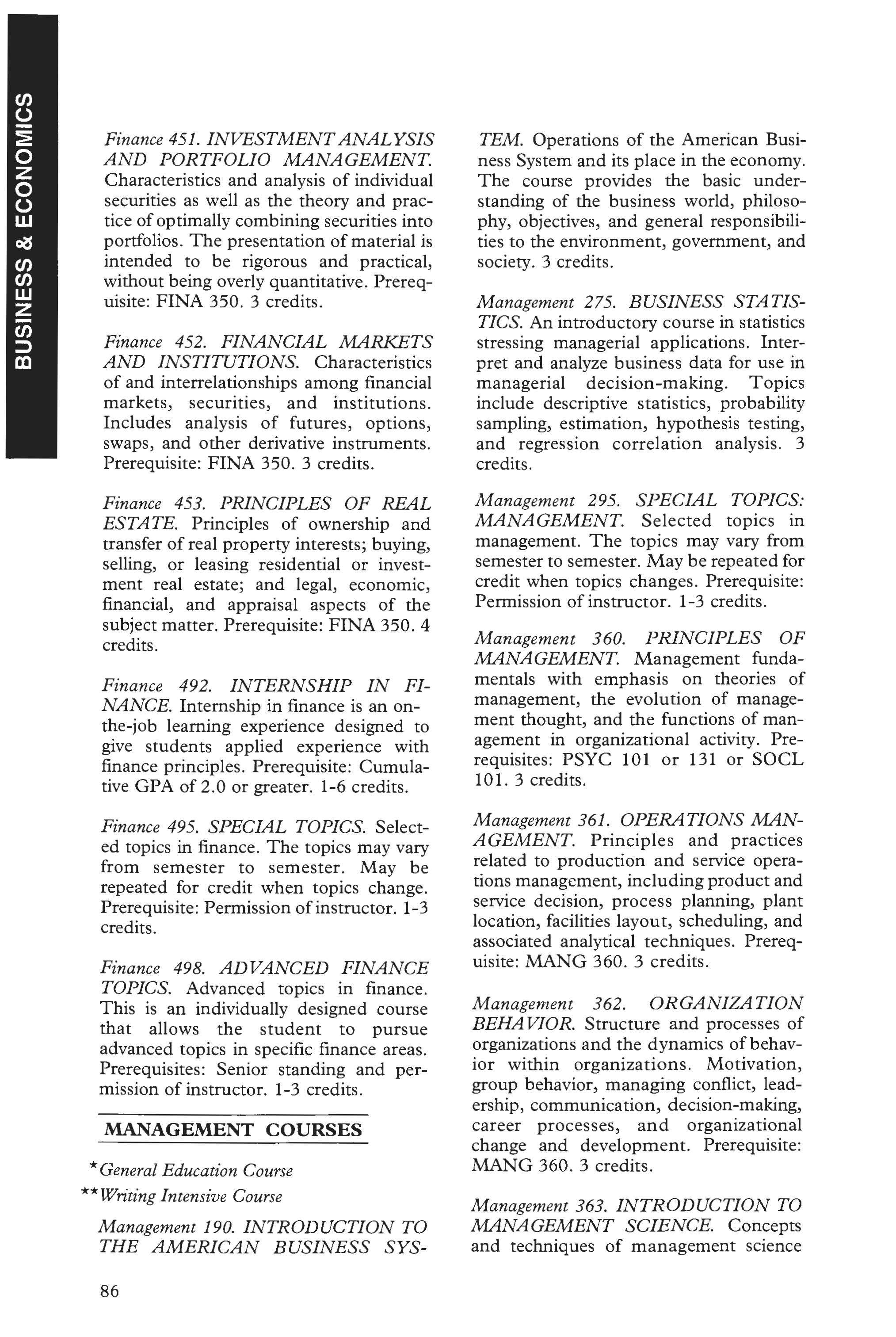
commonly used in managerial decision making with a focus on application. Topics include linear programming, transportation method, assignment model, forecasting, PERT/CPM, queuing models and simulation. Prerequisites: MANG 275 and 360. 3 credits.
** Management 461. ORGANIZATIONAL THEORY. An elaboration of the organizational culture/pluralist perspective on organizations, to explore issues of organizational design and the management of change in an increasingly global, turbulent environment. Topics include organizational typologies, goals, effectiveness and efficiency, organizational design, and the central role of leadership. Prerequisite: MANG 360. 3 credits.
Management 464 MANAGERIAL DECISION MAKING. Theory of decision making, rationality, individuals as decision makers, quantitative and qualitative techniques and case studies. Prerequisite: MANG 361. 3 credits.
** Management 465. HUMAN RESOURCE MANAGEMENT. Principles and problems with particular emphasis upon job analysis, recruitment, selection, training, transfer, promotion, dismissal of employees, employer-employee relationships, industrial unrest, fringe benefits, and recent trends in employment practices. Prerequisite : MANG 360. 3 credits.
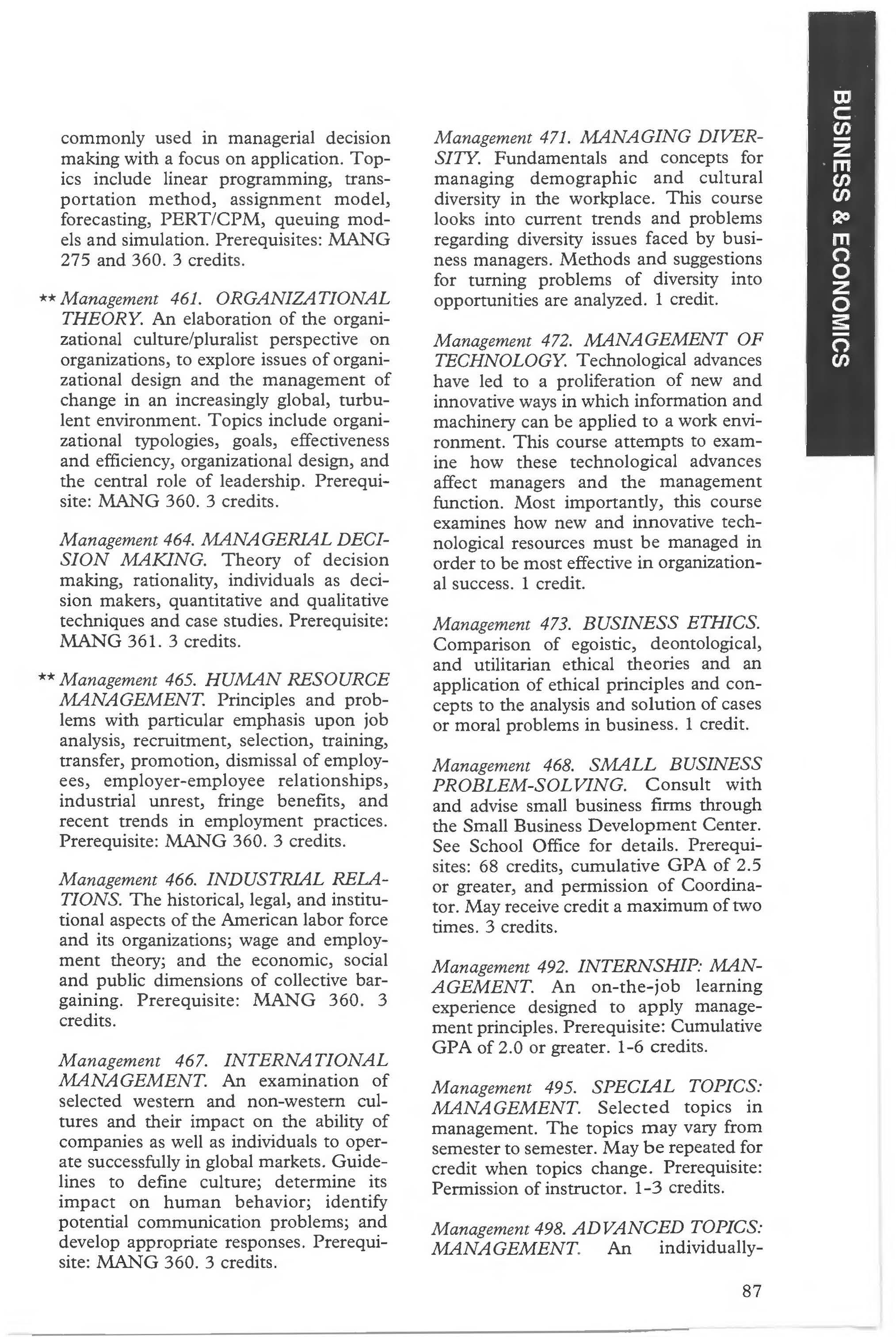
Management 466. INDUSTRIAL RELATIONS. The historical, legal, and institutional aspects of the American labor force and its organizations; wage and employment theory; and the economic, social and public dimensions of collective bargaining. Prerequisite: MANG 360. 3 credits.
Management 467. INTERNATIONAL MANAGEMENT. An examination of selected western and non-western cultures and their impact on the ability of companies as well as individuals to operate successfully in global markets. Guidelines to define culture; determine its impact on human behavior; identify potential communication problems; and develop appropriate responses. Prerequisite: MANG 360. 3 credits.
Management 471. MANAGING DIVER SITY. Fundamentals and concepts for managing demographic and cultural diversity in the workplace This course looks into current trends and problems regarding diversity issues faced by business managers. Methods and suggestions for turning problems of diversity into opportunities are analyzed. 1 credit.
Management 472. MANAGEMENT OF TECHNOLOGY. Technological advances have led to a proliferation of new and innovative ways in which information and machinery can be applied to a work environment. This course attempts to examine how these technological advances affect managers and the management function. Most importantly, this course examines how new and innovative technological resources must be managed in order to be most effective in organizational success. 1 credit.
Management 473. BUSINESS ETHICS. Comparison of egoistic, deontological, and utilitarian ethical theories and an application of ethical principles and concepts to the analysis and solution of cases or moral problems in business. 1 credit.
Management 468. SMALL BUSINESS PROBLEM-SOLVING. Consult with and advise small business firms through the Small Business Development Center. See School Office for details. Prerequisites: 68 credits, cumulative GPA of 2.5 or greater, and permission of Coordinator. May receive credit a maximum of two times. 3 credits.
Management 492 . INTERNSHIP: MANAGEMENT. An on-the-job learning experience designed to apply management principles. Prerequisite: Cumulative GPA of 2.0 or greater. 1-6 credits.
Management 495. SPECIAL TOPICS: MANAGEMENT. Selected topics in management The topics may vary from semester to semester. May be repeated for credit when topics change. Prerequisite: Permission of instructor. 1-3 credits.
Management 498. ADVANCED TOPICS: MANAGEMENT An individually-
designed course that allows the student to pursue advanced topics in specific management areas. Prerequisites: senior standing and permission of instructor. 13 credits.
** Management 499. BUSINESS POLICY. Integrates the various functional areas of business in terms of policy level decisionmaking. The comprehensive case study method is used. Prerequisites: FINA 350, MANG 360, MARK 380, and senior standing. 3 credits.
** Writing Intensive Course
Management Information Systems 170. COMPUTER APPL/CA TIO NS. Three important business-oriented computer tools: spreadsheets, data bases, and word processors. The course provides a solid foundation for the specialized use of these tools in upper-level courses within the School of Business and Economics. 3 credits.
Management Information Systems 270. COBOL PROGRAMMING. An introduction to programming in a business oriented language (COBOL) with emphasis on commercial applications and elementary concepts of file processing. 3 credits.
** Management Information Systems 291. BUSINESS COMMUNICATIONS. Principles, practices, techniques, and mechanics of writing effective letters, memoranda, and short and long reports are emphasized. English skills and oral presentation skills are reinforced. Prerequisite: MISY 170. 3 credits.
** Management Information Systems 3 70. MANAGEMENT INFORMATION SYSTEMS. A general overview of information systems. Planning, designing and implementing MIS systems. Emphasis is on application of the systems. Prerequisite: MISY 170. 3 credits.
Management Information Systems 371. INTRODUCTION TO SYSTEMS ANALYSIS AND DESIGN. Development of
an information system from the analysis of present information flow, system specifications and equipment selection to implementation. Emphasis on analysis of existing systems and design of new systems. Prerequisite: MISY 370. 3 credits.
Management Information Systems 373. DATA BASE MANAGEMENT. Introduction to theory of data structure, implementation of data base models, and applications using a conventional data base system. Prerequisites: MISY 270 and 370. 3 credits.
Management Information Systems 472. EXPERT SYSTEMS AND DECISION SUPPORT SYSTEMS . A survey of decision support systems and expert systems. Includes the use of a decision support system package and an expert system shell. Prerequisite MISY 370. 3 credits.
Management Information Systems 473. NETWORK COMMUNICATIONS. A study of voice and data communications concepts, including network components, strategies, topologies, planning and design issues, security considerations, evaluation/performance criteria, and management control requirements. Topics cover physical components as well as theoretical issues. Course includes inclass lectures as well as hands-on lab experiences with physical media, microcomputer connectors, and network operating systems. Prerequisite: MISY 370. 3 credits.
** Management Information Systems 477. CURRENT TOPICS IN COMPUTER INFORMATION SYSTEMS. A study of current topics of interest to administrators of information systems in organizations. Topics may vary from year to year. Course may be repeated for credit when topics change. Prerequisite: MISY 370 and permission of the instructor. 3 credits.
Management Information Systems 492. INTERNSHIP IN MANAGEMENT INFORMATION SYSTEMS. An on-thejob learning experience designed to apply management information systems concepts and principles. Prerequisite: Cumulative GPA of 2.0 or greater. 1-6 credits.
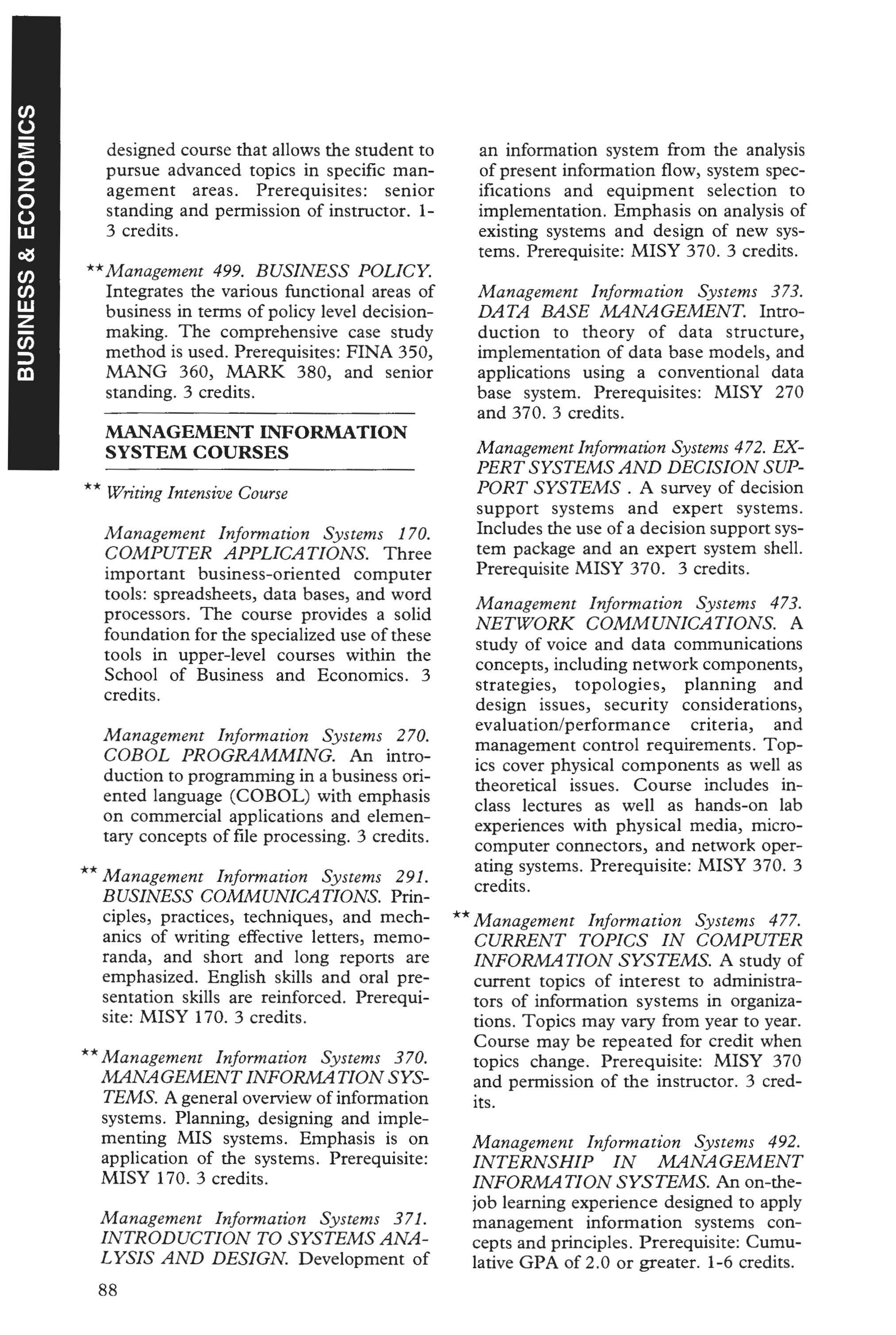
Management Information Systems 495. SPECIAL TOPICS IN MANAGEMENT INFORMATION SYSTEMS. An individually designed course that allows the student to pursue advanced topics in specific management information systems areas. Topics may vary from semester to semester. May be repeated for credit when topics change. Prerequisite: Permission of the instructor. 1-3 credits.
** Writing Intensive Course
Marketing 295. SPECIAL TOPICS: MARKETING. Selected topics in marketing. The topics may vary from semester to semester. May be repeated for credit when topics change. Prerequisite: Permission of instructor. 1-3 credits.
Marketing 380. PRINCIPLES OF MARKETING. An introduction to the functions of marketing in our economy with particular attention to the influence of social, economic, ethical, legal, and technological forces on marketing activities. Problems and policies involved in the marketing of goods and services. 3 credits.
** Marketing 381. MARKETING RESEARCH. An application of scientific research methodology to marketing problems. The systematic gathering, recording, processing, and analyzing of marketing data are applied to studies of market structure, market segmentation, positioning, concept and product testing, name and package testing, advertising pretesting and tracking, and test marketing. Students will complete an individual research project. Prerequisite: MARK 380. 3 credits.
Marketing 382. PROFESSIONAL SELLING. Fundamental principles of selling; the economic problems connected with personal selling; analysis of the product and market; the interview; and building good will. An analysis of the management function of administering an operating sales force. Prerequisite: MARK 380. 3 credits.
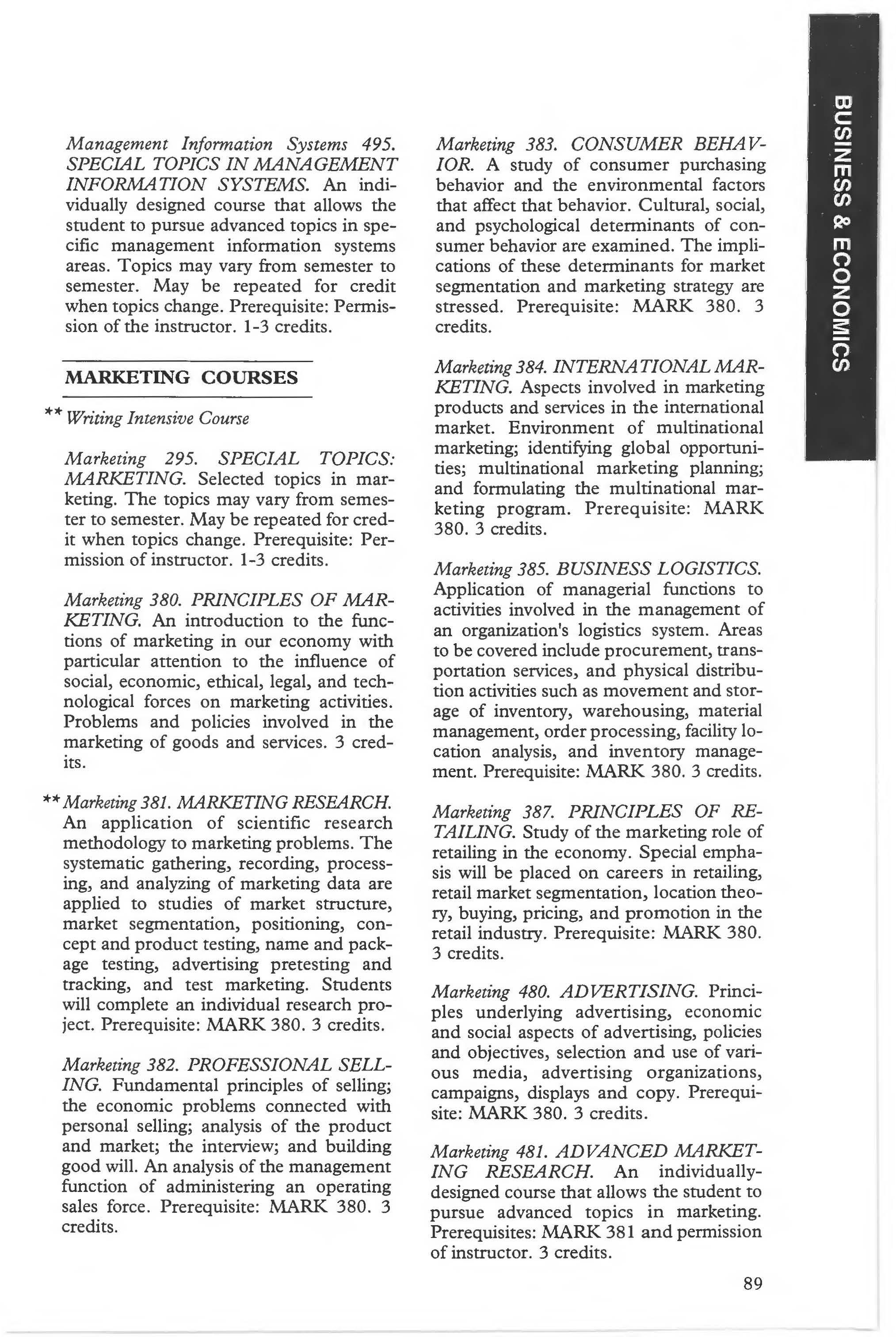
Marketing 383. CONSUMER BERA VIOR. A study of consumer purchasing behavior and the environmental factors that affect that behavior. Cultural, social, and psychological determinants of consumer behavior are examined. The implications of these determinants for market segmentation and marketing strategy are stressed. Prerequisite: MARK 380. 3 credits.
Marketing 384. INTERNATIONAL MARKETING. Aspects involved in marketing products and services in the international market. Environment of multinational marketing; identifying global opportunities; multinational marketing planning; and formulating the multinational marketing program. Prerequisite: MARK 380. 3 credits.
Marketing 385. BUSINESS LOGISTICS. Application of managerial functions to activities involved in the management of an organization's logistics system. Areas to be covered include procurement, transportation services, and physical distribution activities such as movement and storage of inventory, warehousing, material management, order processing, facility location analysis, and inventory management. Prerequisite: MARK 380. 3 credits.
Marketing 387. PRINCIPLES OF RETAILING. Study of the marketing role of retailing in the economy. Special emphasis will be placed on careers in retailing, retail market segmentation, location theory, buying, pricing, and promotion in the retail industry. Prerequisite: MARK 380. 3 credits.
Marketing 480. ADVERTISING. Principles underlying advertising, economic and social aspects of advertising, policies and objectives, selection and use of various media, advertising organizations, campaigns, displays and copy. Prerequisite: MARK 380. 3 credits.
Marketing 481. ADVANCED MARKETING RESEARCH. An individuallydesigned course that allows the student to pursue advanced topics in mark~ti~g. Prerequisites: MARK 381 and perm1ss1on of instructor. 3 credits.
Marketing 482. MARKETING STRATEGY. Policymaking and operating decisions of the marketing manager and tools available to aid in solving marketing problems. Prerequisites: FINA 350, MANG 360, MARK 380, plus senior standing. 3 credits.
Marketing 483. TRANSPORTATION SYSTEMS. An overview of the transportation system of the U.S. and the role it plays in the performance of the movement function of marketing. Examines ~e c?aract_eristics of modes of transportat10n mcludmg cost and service factors and their impact on freight rates. The role of go~ernment in_ the development and regulatlon of the mdustry will be discussed. Prerequisite: MARK 380. 3 credits.
Marketing 487. SALES MANAGEMENT. Sales management is the process of planning, organizing, directing and controlling the activities of the sales force. Special attention will be paid to the formulation of a strategic sales program. The implementation of the sales program and evaluation and control of sales force performance. Prerequisites: MARK 380, 382, and MANG 360. 3 credits.
Marketing 492. INTERNSHIP: MARKETING. An on-the-job learning experience designed to apply marketing principles. Prerequisite: Cumulative GPA of 2.0 or greater. 1-6 credits.
Marketing 495. SPECIAL TOPICS: MARKETING. Selected topics in marketing. The topics may vary from semester to semester. May be repeated for credit when topics change. Prerequisite: Permission of instructor. 1-3 credits.
Marketing 498. ADVANCED TOPICS: MARKETING. Advanced topics in marketing. An individually-designed course that allows the student to pursue advanced topics in specific marketing areas. P~er~quisit~s: Senior standing and permission of mstructor. 1-3 credits.
Military Science 101. INTRODUCTION TO THE MILITARY. A general introduction course which will broaden student knowledge of military structure and operation, customs and courtesies, rank structure, weaponry, threat structure and land navigation. No prerequisites. 2 credits.
Military Science 102. MILITARY HISTORY. A general introduction to the various interpretations of the causes and nature of conflict as exhibited in war; the evolution of the United States armed conflict· the . . ' prmciples of war and their applications· and the influence of society, technology: and personal leadership on the conduct of ~ar. Concentration on American military history from colonial times to the present. No prerequisites. 2 credits.
Military Science 201. LEADERSHIP I. An introduction to the basic concepts and skills required to become an effective leader of small groups. The case study approach is emphasized in analyzing leadership in military, business and other situations. No prerequisites. 2 credits.
Military Science 202. LEADERSHIP II. An overview of Army Leadership doctrine with specific emphasis on the military as a professi?n, the military ethic, leadership c?unsehng and team building. Emphasizes the case study approach of analyzing leadership in military and other environments. No prerequisites. 2 credits.
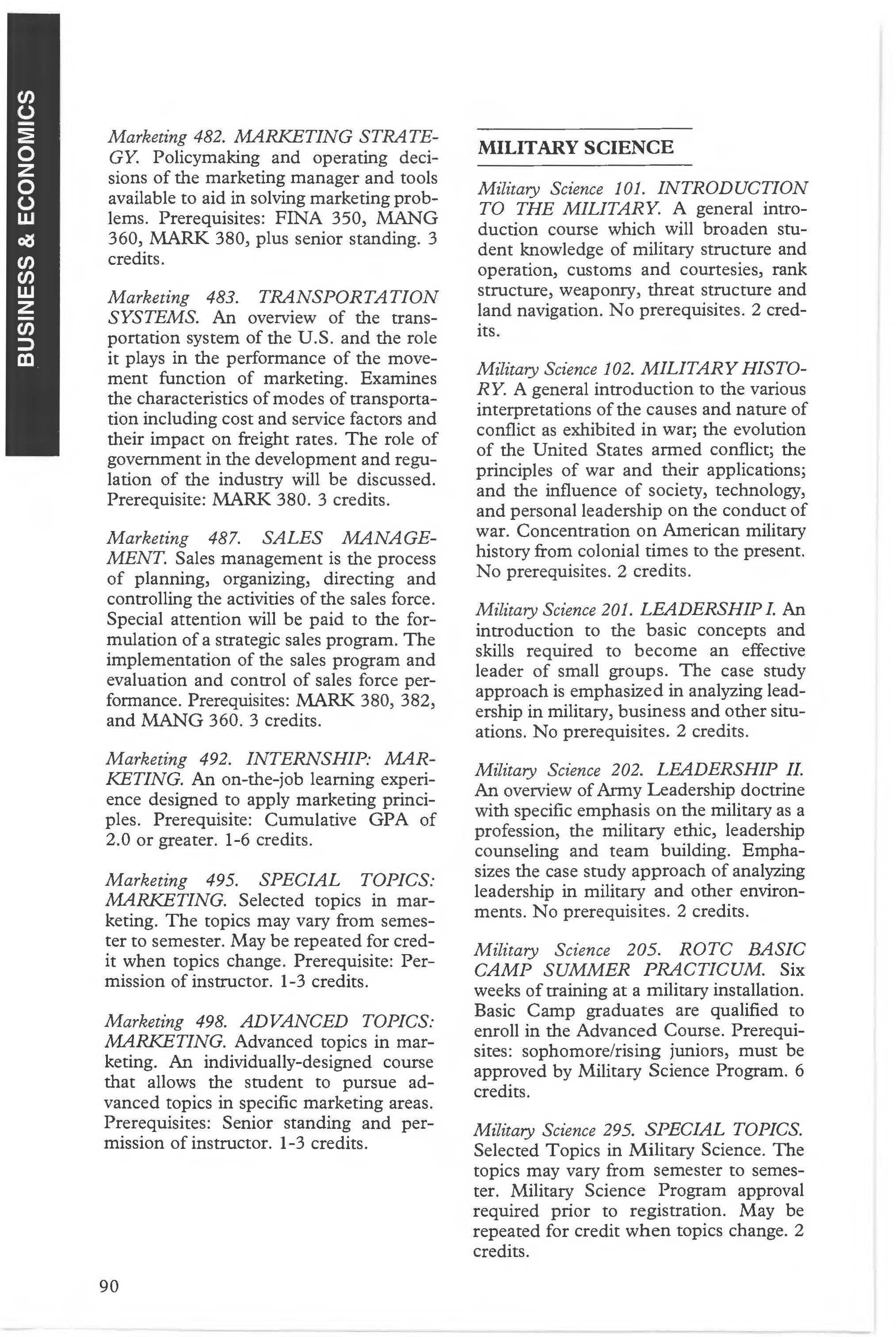
Military Science 205. ROTC BASIC CAMP SUMMER PRACTICUM. Six weeks of training at a military installation. Basic Camp graduates are qualified to e?roll in the Advanced Course. Prerequisites: sophomore/rising juniors, must be approved by Military Science Program. 6 credits.
Military Science 295. SPECIAL TOPICS. Selected Topics in Military Science. The topics may vary from semester to semester. Military Science Program approval required prior to registration. May be repeated for credit when topics change. 2 credits.
Military Science 301. ADVANCED MILITARY SCIENCE I. Detailed reading of military maps and land navigation utilizing a map and a compass. Prerequisites: successful completion of the Basic Course or approval of Military Science Program. 3 credits.
Military Science 302. ADVANCED MILITARY SCIENCE II. Group interactions and the role of the leader. Emphasis is on the sixteen leadership dimensions. Includes development and implementation of a unit physical fitness program. Prerequisites: successful completion of the Basic Course, MS 301 and approval of Military Science Program. 4 credits .
Military Science 305. ROTC ADVANCED CAMP SUMMER PRACTICUM. Six weeks of intensive leadership application. Students are exposed to varying leadership situations requiring problem-solving and decision-making skills under physi-
cally and mentally stressful conditions. Prerequisites: MS 301 and 302. 3 credits.
Military Science 401. COMMAND AND STAFF OPERATIONS. Command and staff operations and procedures, military briefings, and military correspondence are studied in detail. Prerequisites: MS 301 and 302 or approval of Military Science Program. 3 credits .
Military Science 402. ETHICS AND PROFESSIONALISM. Study of military justice, the Law of Warfare, professionalism and ethics . Prerequisite: MISC 401 or permission of instructor. 3 credits.
Military Science 495. SPECIAL TOPICS . Selected topics in military science. The topics may vary from semester to semester Military Science approval required prior to registration. May be repeated for credit when topics change. 3 credits .

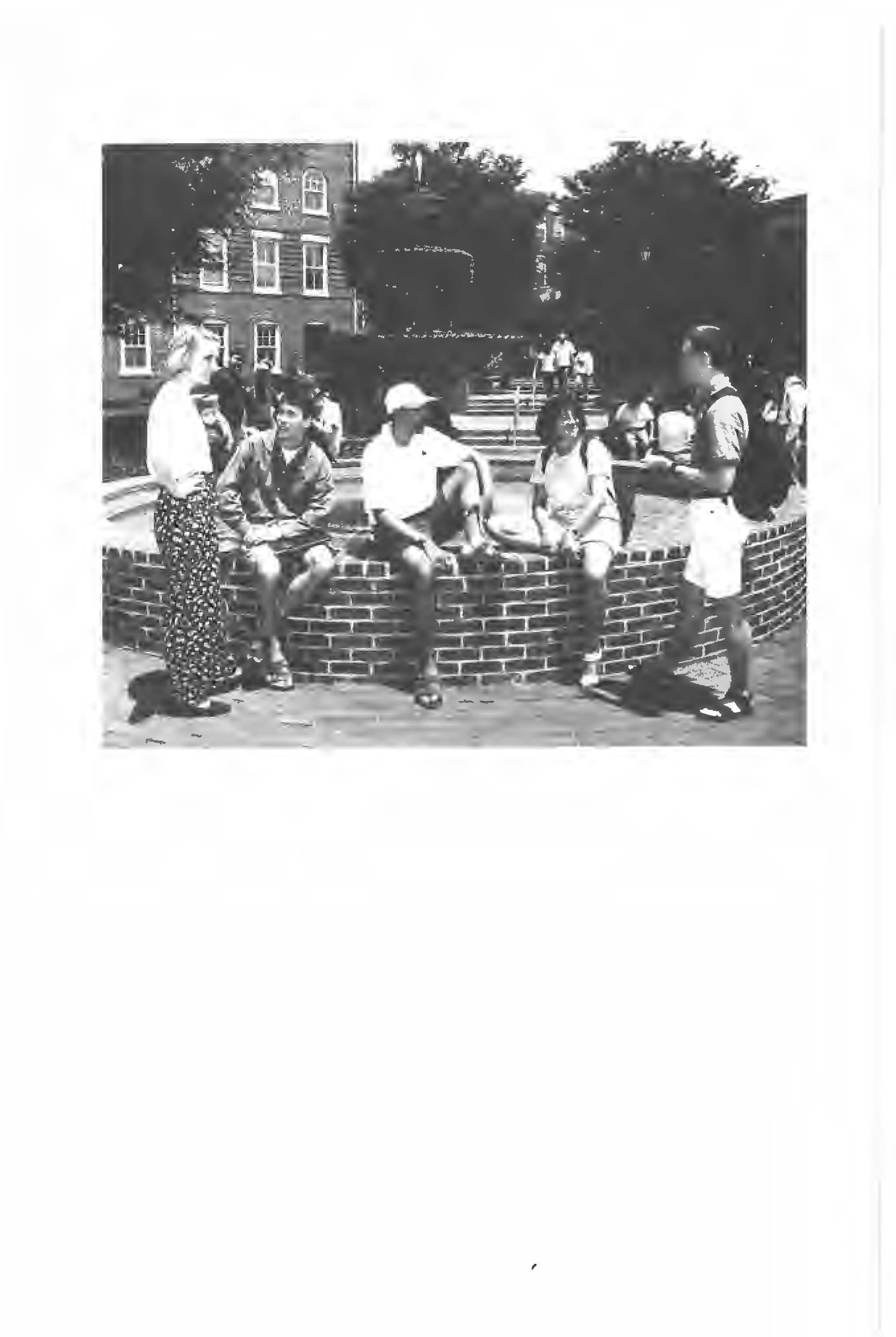
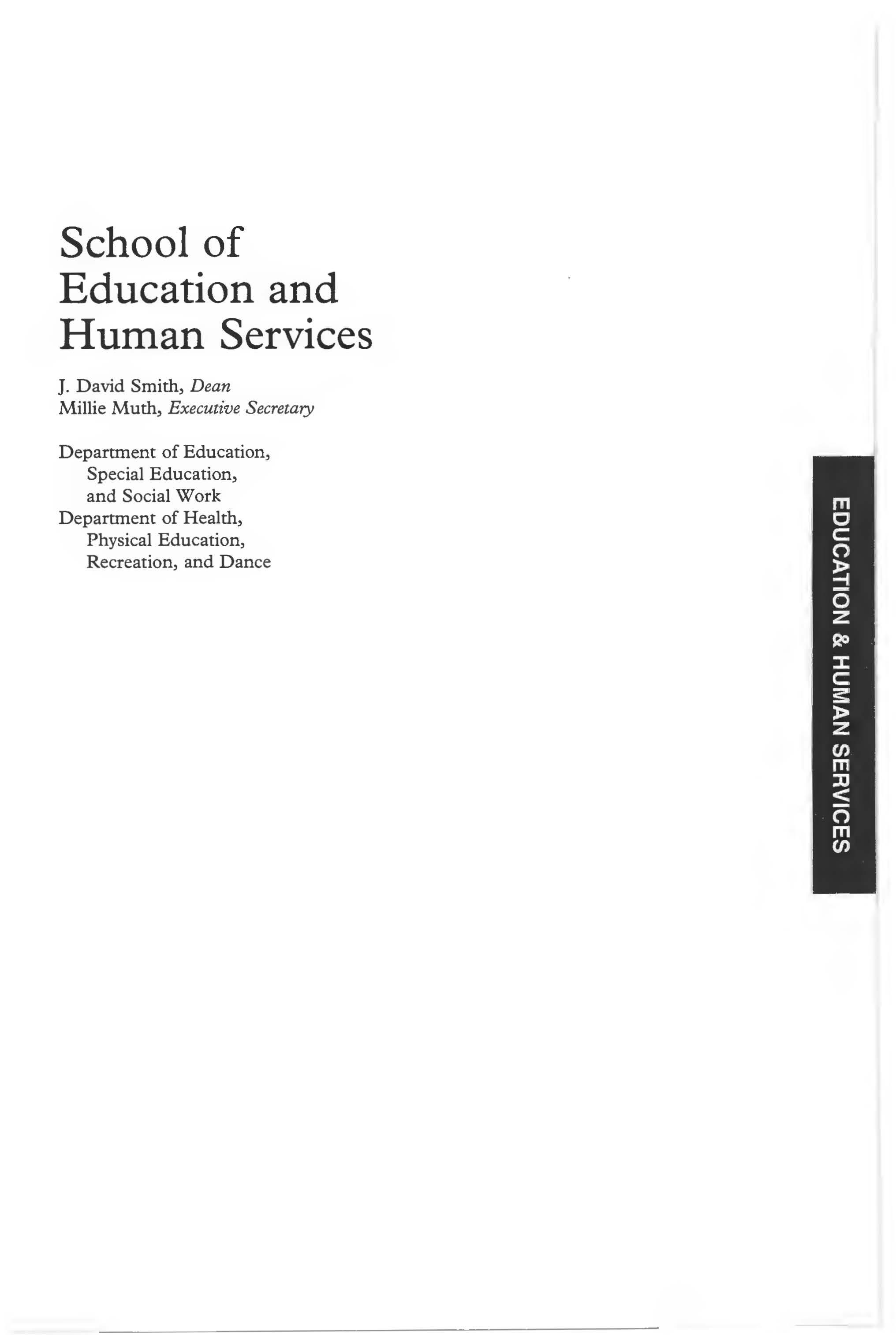
J. David Smith, Dean Millie
Muth, Executive SecretaryDepartment of Education, Special Education, and Social Work Department of Health, Physical Education, Recreation, and Dance
The Department of Education, Special Education and Social Work offers:
A. A 40-credit undergraduate program in elementary education (N, K-8) Liberal Studies is the appropriate major for students who also register for the elementary education program .
B. A five-year program in special education with a N, K-12 mild to moderate disabilities teaching endorsement (emotional disturbance, learning disabilities, and mildmoderate mental retardation.) Students must major in Liberal Studies and register for courses in the special education program . Students completing the undergraduate program will receive a bachelor's degree in Liberal Studies and upon the completion of the fifth year will receive a master's degree in special education. Students must complete the fifth year to be endorsed to teach special education.
C. A B.S. or B.A degree in Social Work.
D A B S. or B.A. degree in Speech/Language Pathology and Audiology. Because this is a preprofessional program, students must earn a master's degree in speech pathology or audiology or education of the deaf/hearing impaired to be licensed as a speech pathologist or audiologist or teacher of the deaf/hearing impaired.
E. A Master of Science in Education degree: Students interested in enrolling in one of the graduate programs need to consult the Longwood College Graduate Catalog.
Admission Into the Teacher Education and Professional Semester Programs:
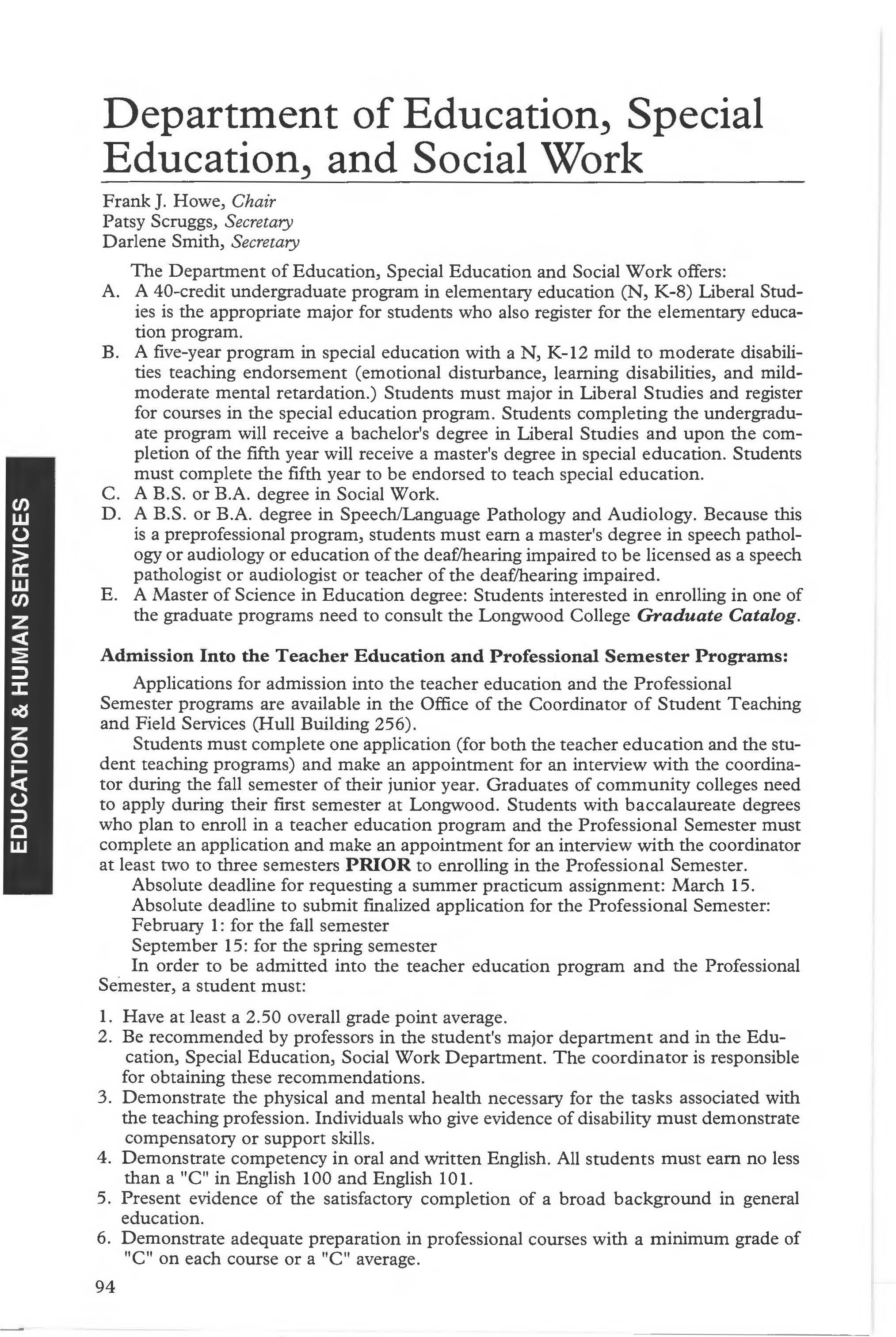
Applications for admission into the teacher education and the Professional Semester programs are available in the Office of the Coordinator of Student Teaching and Field Services (Hull Building 256)
Students must complete one application (for both the teacher education and the student teaching programs) and make an appointment for an interview with the coordinator during the fall semester of their junior year. Graduates of community colleges need to apply during their first semester at Longwood. Students with baccalaureate degrees who plan to enroll in a teacher education program and the Professional Semester must complete an application and make an appointment for an interview with the coordinator at least two to three semesters PRIOR to enrolling in the Professional Semester.
Absolute deadline for requesting a summer practicum assignment: March 15.
Absolute deadline to submit finalized application for the Professional Semester: February 1: for the fall semester September 15: for the spring semester
In order to be admitted into the teacher education program and the Professional Semester, a student must:
1. Have at least a 2 50 overall grade point average.
2. Be recommended by professors in the student's major department and in the Education, Special Education, Social Work Department. The coordinator is responsible for obtaining these recommendations.
3. Demonstrate the physical and mental health necessary for the tasks associated with the teaching profession. Individuals who give evidence of disability must demonstrate compensatory or support skills.
4 Demonstrate competency in oral and written English. All students must earn no less than a "C" in English 100 and English 101.
5. Present evidence of the satisfactory completion of a broad background in general education.
6. Demonstrate adequate preparation in professional courses with a minimum grade of "C" on each course or a "C" average.
Art, Music, Physical Education and Special Education students must have an overall grade point average of 2.50 and satisfactorily complete their major and education (or special education) prerequisites prior to enrolling in the Professional Semester. Specific requirements may be found in other sections of this Catalog.
Secondary education student must have an overall grade point average of 2.50 and satisfactorily complete their major requirements (including the methods course), and satisfactorily complete Education 245, 260, 265 and 455 prior to enrolling in the Professional Semester. Specific requirements by each department may be found in other sections of this Catalog.
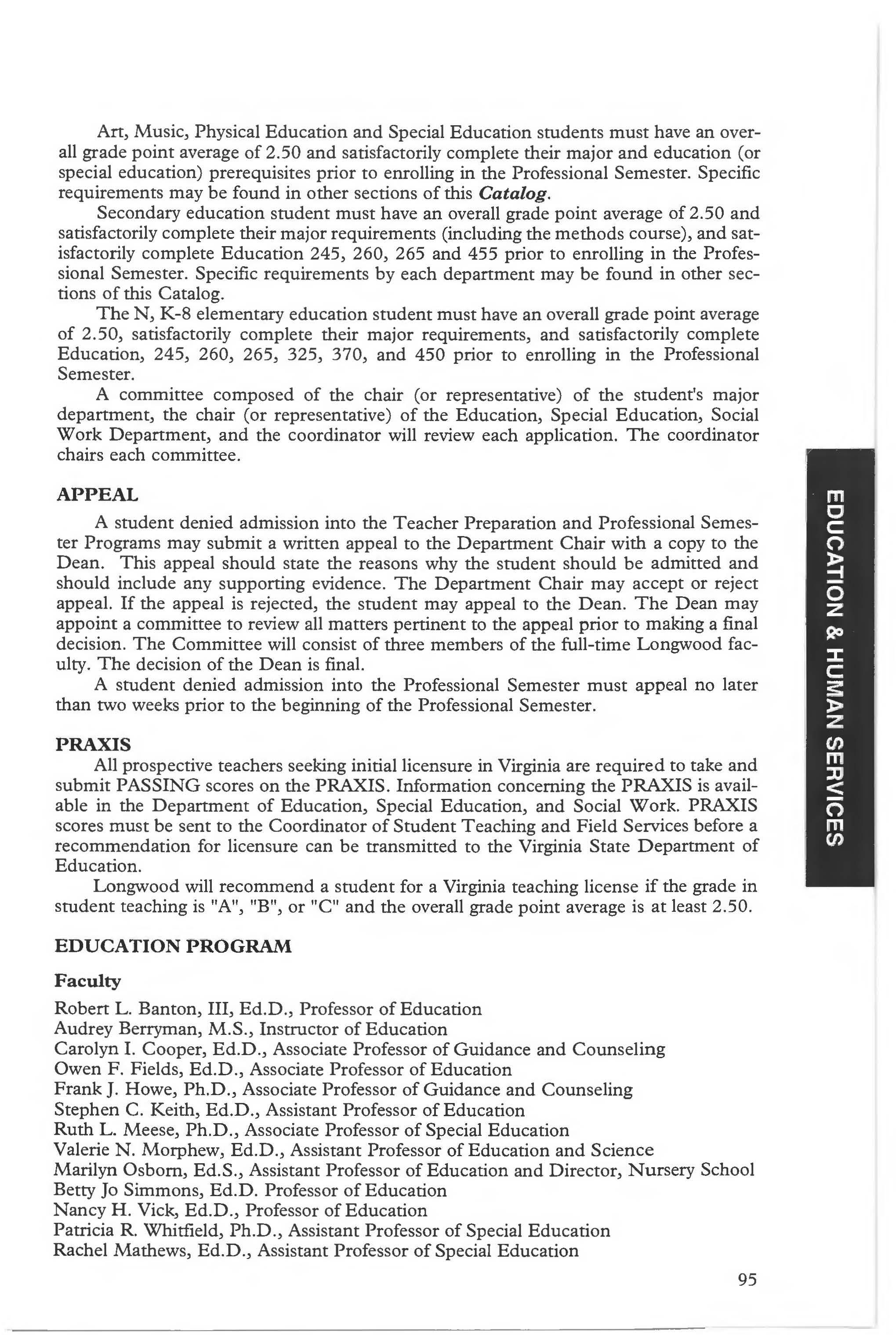
The N, K-8 elementary education student must have an overall grade point average of 2 . 50, satisfactorily complete their major requirements, and satisfactorily complete Education, 245, 260, 265, 325, 370, and 450 prior to enrolling in the Professional Semester.
A committee composed of the chair (or representative) of the student's major department, the chair (or representative) of the Education, Special Education, Social Work Department, and the coordinator will review each application. The coordinator chairs each committee.
A student denied admission into the Teacher Preparation and Professional Semester Programs may submit a written appeal to the Department Chair with a copy to the Dean. This appeal should state the reasons why the student should be admitted and should include any supporting evidence. The Department Chair may accept or reject appeal. If the appeal is rejected, the student may appeal to the Dean. The Dean may appoint a committee to review all matters pertinent to the appeal prior to making a final decision The Committee will consist of three members of the full-time Longwood faculty. The decision of the Dean is final.
A student denied admission into the Professional Semester must appeal no later than two weeks prior to the beginning of the Professional Semester.
All prospective teachers seeking initial licensure in Virginia are required to take and submit PASSING scores on the PRAXIS. Information concerning the PRAXIS is available in the Department of Education, Special Education, and Social Work . PRAXIS scores must be sent to the Coordinator of Student Teaching and Field Services before a recommendation for licensure can be transmitted to the Virginia State Department of Education.
Longwood will recommend a student for a Virginia teaching license if the grade in student teaching is "A", "B", or "C" and the overall grade point average is at least 2.50.
Robert L. Banton, III, Ed . D ., Professor of Education
Audrey Berryman, M.S., Instructor of Education
Carolyn I. Cooper, Ed.D., Associate Professor of Guidance and Counseling
Owen F. Fields, Ed.D., Associate Professor of Education
Frank J Howe, Ph.D., Associate Professor of Guidance and Counseling
Stephen C. Keith, Ed.D., Assistant Professor of Education
Ruth L. Meese, Ph.D., Associate Professor of Special Education
Valerie N. Morphew, Ed.D., Assistant Professor of Education and Science
Marilyn Osborn, Ed.S., Assistant Professor of Education and Director, Nursery School
Betty Jo Simmons, Ed.D. Professor of Education
Nancy H . Vick, Ed.D., Professor of Education
Patricia R. Whitfield, Ph.D ., Assistant Professor of Special Education
Rachel Mathews, Ed.D , Assistant Professor of Special Education
The Department of Education, Special Education, and Social Work offers a 40credit program in elementary education. Students completing the program will be endorsed in Virginia to teach in nursery school and kindergarten through eighth grade (N, K-8) .
The Liberal Studies Major has been designed specifically for students seeking Elementary Education Endorsement to teach all subjects, N,K-8 and is recommended. Requirements for the B.A or B.S. Degree in Liberal Studies are listed elsewhere in the Catalog. By carefully planning each semester's course work, students can use their electives to meet the requirements of the 40-credit elementary education program. This is the same as a double-major, which many college students select . After completing the degree and program requirements, students receive a B.A. or B .S. Degree in Liberal Studies and an endorsement to teach N, K-8.
Students double-majoring in Liberal Studies will be assigned an academic advisor in Liberal Studies or Elementary Education. Such students declare Liberal Studies as their major by the end of the sophomore year and inform the registrar that they will be double-majoring in Liberal Studies and Elementary Education.
The 40-credit program consists of the following courses:
Courses Title Credits
EDUC 260 : Introduction to the Teaching Profession 1
EDUC 245: Human Growth and Development . . . ..... .. . .... 3
EDUC 325: Teaching Reading and Language Arts in the Elementary School ...... . .. . . 6 EDUC 450 : Principles of Elementary Curriculum and Education 6
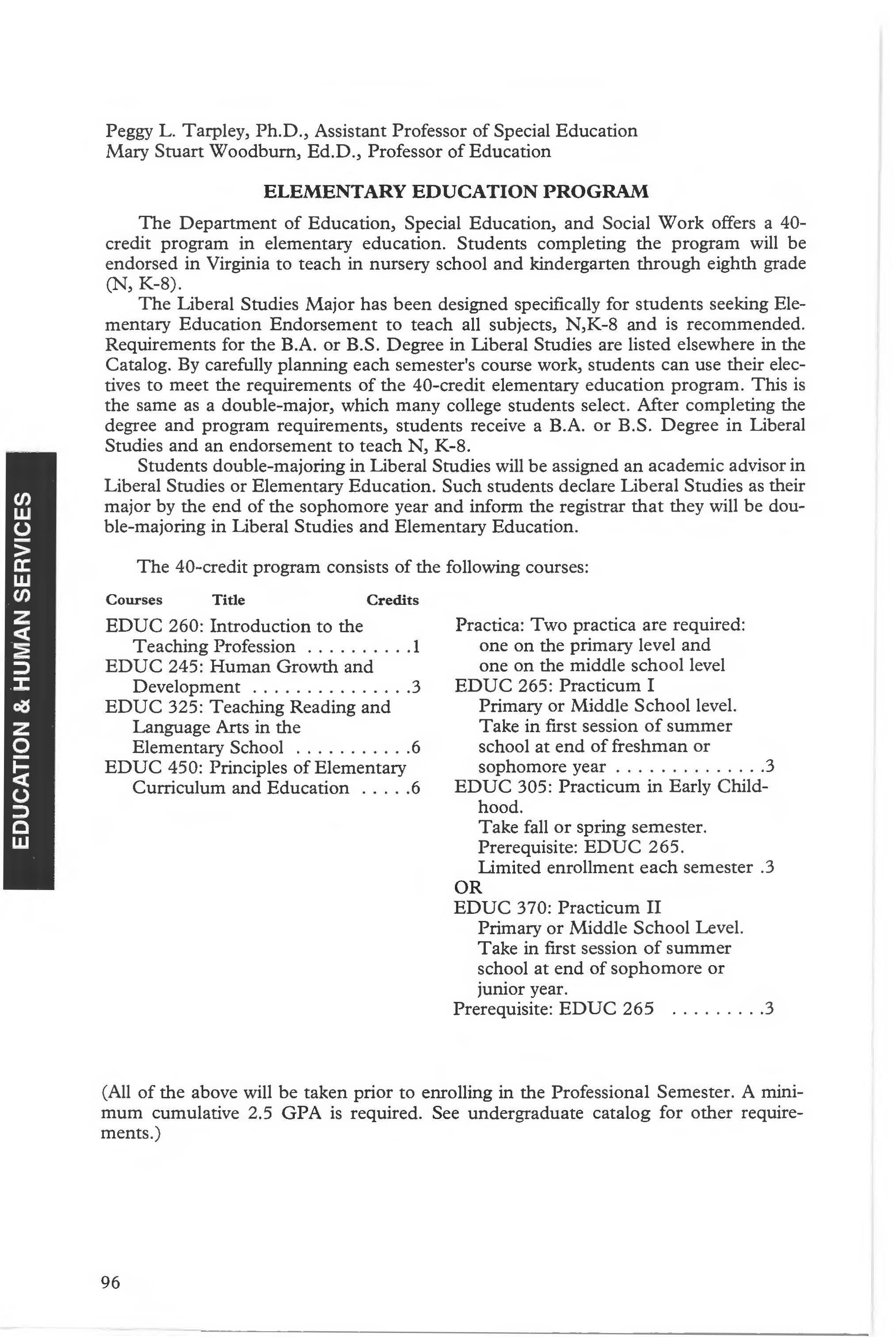
Practica: Two practica are required: one on the primary level and one on the middle school level EDUC 265: Practicum I Primary or Middle School level. Take in first session of summer school at end of freshman or sophomore year . .. . . . .... .. .. 3 EDUC 305: Practicum in Early Childhood. Take fall or spring semester Prerequisite: EDUC 265. Limited enrollment each semester . 3 OR EDUC 370: Practicum II Primary or Middle School Level. Take in first session of summer school at end of sophomore or junior year. Prerequisite : EDUC 265 3
(All of the above will be taken prior to enrolling in the Professional Semester. A minimum cumulative 2.5 GPA is required. See undergraduate catalog for other requirements.)
Professional Semester:
EDUC 400: Directed Teaching in the Elementary School 10 Five weeks primary level and six weeks middle school level
EDUC 480: Measurement and Evaluation . . . . . . . . . . . . . . . . . . . . . . . . . . . . . 1
EDUC 484: Media and Computer Technology . . . . . . . . . . . . . . . . . . . . . . . . . . 2
EDUC 488: Education Seminar . . . . . . . . . . . . . . . . . . . . . . . . . . . . . . . . . . . . . 1
EDUC 490: Classroom Management 2
EDUC 491: Survey of Exceptional Children 2
Total Credits .................................................. 40
Students desiring to teach special education on the N, K-12 level will need to complete the five-year Liberal Studies/Special Education degree programs. A BA or BS degree in Liberal Studies will be awarded upon completion of the fourth year and a M.S. degree in Special Education will be awarded upon completion of the fifth year. Students will not be endorsed to teach special education until the completion of the fifth year. Please read the undergraduate and graduate catalogs concerning the requirements relating to these two degrees.
English Modern Languages: French, German,Spanish Computer Science
Mathematics History Political Science
8-12
Biology, Chemistry, Physics Theatre Arts
To teach on the secondary level, a student must have an advisor in one of the departments listed above. A form in the Registrar's Office must be completed indicating which major has been selected and that the secondary education program has also been selected. Each student will then be assigned a major advisor as well as a professional advisor in the EDUC Department. With careful scheduling, a student can complete all degree and program requirements in four years.
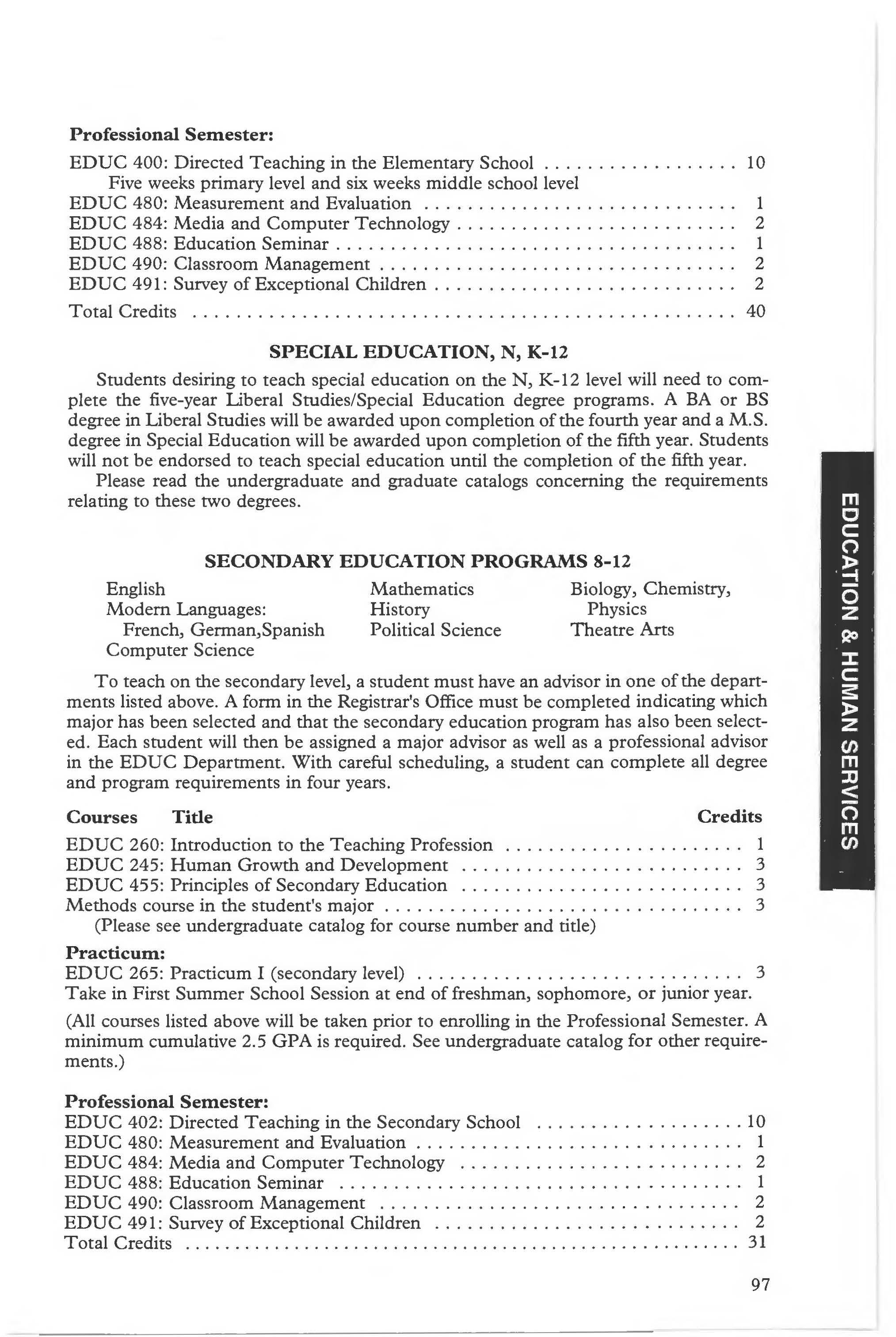
EDUC 260: Introduction to the Teaching Profession . . . . . . . . . . . . . . . . . . . . . . 1
EDUC 245: Human Growth and Development .......................... 3
EDUC 455: Principles of Secondary Education . . . . . . . . . . . . . . . . . . . . . . . . . . 3 Methods course in the student's major . . . . . . . . . . . . . . . . . . . . . . . . . . . . . . . . . 3 (Please see undergraduate catalog for course number and title)
Practicum: EDUC 265: Practicum I (secondary level) . . . . . . . . . . . . . . . . . . . . . . . . . . . . . . 3 Take in First Summer School Session at end of freshman, sophomore, or junior year. (All courses listed above will be taken prior to enrolling in the Professional Semester. A minimum cumulative 2.5 GPA is required. See undergraduate catalog for other requirements.)
Professional Semester:
EDUC 402: Directed Teaching in the Secondary School 10
EDUC 480: Measurement and Evaluation 1
EDUC 484: Media and Computer Technology 2
EDUC 488: Education Seminar 1
EDUC 490: Classroom Management 2
EDUC 491: Survey of Exceptional Children 2 Total Credits 31
For students who want to teach art, music, or physical education on the N, K-12 level, please see the undergraduate catalog for the courses that need to be taken. Each program has different requirements. An academic/professional advisor will be assigned by that department A professional advisor in the EDUC Department will not be assigned, but professional advisors in EDUC will be glad to help at any time. With careful scheduling, a student can complete all degree and program requirements in four years.
It may be possible for some teacher education students to add a second endorsement to a teaching license while completing degree and teacher education requirements. To receive an add-on endorsement, a student must minor in one of the disciplines listed below. Students must have the written permission of the chair of that department prior to declaring a minor. With careful scheduling, it may be possible for a student to complete degree requirements, teacher education program requirements, and an add-on endorsement, in four years.

Add-On Endorsements for Grades 8-12:
SPEECH: for secondary education majors
THEATRE ARTS: for secondary education majors
DRIVER EDUCATION: for physical education majors only
COMPUTER SCIENCE: for math majors only
GENERAL MATHEMATICS: for secondary majors
BIOLOGY: for science majors only
CHEMISTRY: for science majors only
EARTH AND SPACE SCIENCE: for science majors only PHYSICS: for science majors only ECONOMICS: for secondary majors GEOGRAPHY: for secondary majors HISTORY: for secondary majors POLITICAL SCIENCE: for secondary majors JOURNALISM: for secondary majors
Add-On Endorsement for Grades N, K-12: DEVELOPMENTAL READING: for Liberal Studies majors and elementary education students only HEALTH EDUCATION: for physical education majors only MATHEMATICS For Computer Science majors.
EDUCATION
t A special fee is charged for all practicum and student teaching courses.
** Writing Intensive Courses
Education 205. LIFE AND CAREER PREPARATION. This course is the design and management of the Longwood educational experience to establish vision, direction, and strategies for gaining knowledge, skills, and attitudes for life and career preparation. It is designed to challenge and support Sophomore Participants who are working with Senior Men-
tors in the Project Success Program . 1 credit.
Education 245. HUMAN GROWTH AND DEVELOPMENT. A survey of physical, cognitive, and social-emotional development of human beings. Heredity and environmental influences will be stressed in the life-span study with specific emphasis upon prenatal through adolescent development. 3 credits.
Education 260. INTRODUCTION TO THE TEACHING PROFESSION. An
overview of teaching: brief philosophy and history of education; organization and management of schools, motivation, learning, behavior management and lesson planning. 1 credit.
tEducation 265. EDUCATION PRACTICUM I. An in-depth observation and participation practicum. Placed in public school settings for at least 60 hours under supervision of college. In addition, instruction and follow-up will occur. 3 credits.
Education 275. EDUCATIONAL LEADERSHIP I. Course is for Orientation Leaders who assist with the Longwood Seminar. Designed to prepare these leaders to work with professors and their firstyear students in the Seminar. Prerequisite: Open to Student Orientation Leaders only and permission of instructor. 1 credit.
Education 295/495: SPECIAL TOPICS. Selected topics in Education. The topics will vary from semester to semester. Descriptions will be available from academic advisors. May be repeated for credit when topics change. 1-3 credits.
Education 305. PRACTICUM IN EARLY CHILDHOOD. Study of the development of the preschool child and associated guidance, observation, teaching techniques and curriculum considerations. Laboratory work will take place in the Longwood Nursery School and other locations. 1 single and 2 double periods a week. Prerequisite: EDUC 265. 3 credits.
**Education 325. TEACHING READING AND LANGUAGE ARTS IN THE ELEMENTARY SCHOOL. Readiness, word recognition, vocabulary, comprehension, skills for content fields, study skills and adaptive rates of reading are emphasized. Prerequisites: EDUC 245, 260, 265. 6 credits.
tEducation 3 70. PRACTICUM II. Additional participation and micro-teaching processes in public school settings for at least 60 hours under college supervision. In addition, instruction and follow-upwill occur. Prerequisites: EDUC 265. 3 credits.
Education 415/Economic 415. EDUCATOR ORINTED COURSE. Applying economics to environmental issues such as resource scarcity, pollution, property rights, garbage and recycling, oil spills, and endangered species. Students will learn how markets and prices can be used to help solve environmental problems. Course cannot be used toward credit towards economics major or minor in economics. Students cannot receive credit for both Educ 415/Econ 415 and Econ 500 or both Econ 415/Educ 415 and Econ 314. 3 credits.
Education 450. PRINCIPLES OF ELEMENTARY CURRICULUM AND INSTRUCTION. Principles and methods of curriculum and instruction in elementary school (N,K-8) with emphasis on mathematics, science, and social studies. 6 credits. Prerequisites: EDUC 260, 325, and 245.
Education 455. PRINCIPLES OF SECONDARY EDUCATION. Principles and methods of curriculum and instruction in the secondary school. Required of all majors seeking certification at the secondary level. Prerequisites: EDUC 245 and 260. 3 credits.
Education 465. TEACHING STUDENTS THROUGH THEIR INDIVIDUAL LEARNING STYLES. Includes an introduction to various learning style models and diagnostic instruments. Stresses the critical analysis and creative development and use of learning strategies to meet the needs of all students, including those with special needs. 3 credits.
Education 475. EDUCATIONAL LEADERSHIP II. Course is for Orientation Leaders who assist with the Longwood Seminar for the second time. Designed to provide additional experiences for Orientation Leaders who work with professors and their first-year students. Prerequisite: EDUC 275 and permission of instructor. 1 credit.
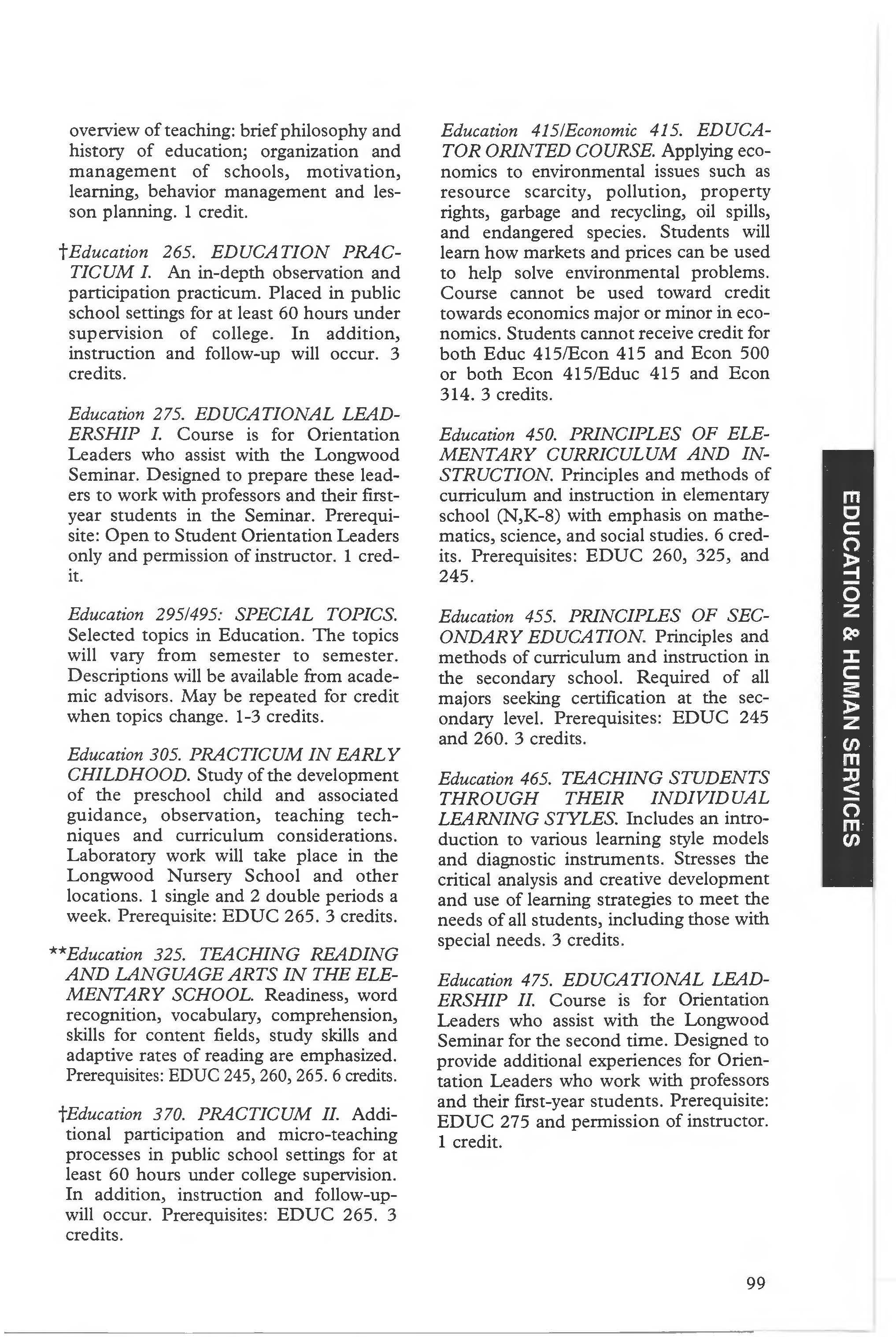
All students in teacher education programs will participate in a professional semester in their senior year during the semester in which they engage in the student teaching practicum . The semester is divided into the ten-week practicum and a six-week flexible modular professional program. The semester offers a total of 18 semester hours credit.
t Education 400. DIRECTED TEACHING IN THE ELEMENTARY SCHOOL. Required of all students in elementary education, N, K-8. See prerequisites for student teaching. (5 weeks N, K-4 and 5 weeks 5-8). 10 credits.
t Education 402. DIRECTED TEACHING IN THE SECONDARY SCHOOL. Required of all students in the secondary education curricula. See prerequisites for student teaching. 10 credits.
t Education 403. DIRECTED ELEMENTARY TEACHING FOR ART, MUSIC, AND PHYSICAL EDUCATION. See prerequisites for student teaching. 5 credits
t Education 404. DIRECTED SECONDARY TEACHING FOR ART, MUSIC, AND PHYSICAL EDUCATION. See prerequisites for student teaching. 5 credits.
t Education 406. DIRECTED TEACHING IN MILD TO MODERATE SPECIAL EDUCATION. Required of all students preparing to teach in Special Education . Directed teaching of students with mild to moderate disabilities (LD/ED/MR). See prerequisites for student teaching. 10 credits.
Education 480. MEASUREMENT AND EVALUATION MODULE. Theory and practice in construction of teacher-made evaluation instruments. Includes an introduction to standardized tests and the Virginia assessment program . See prerequisites for student teaching. 1 credit.
Education 484. MEDIA AND COMPUTER TECHNOLOGY MODULE. A laboratory module concerned with the utilization of basic media and computer technology in the learning process. See prerequisites for student teaching. 2 credits.
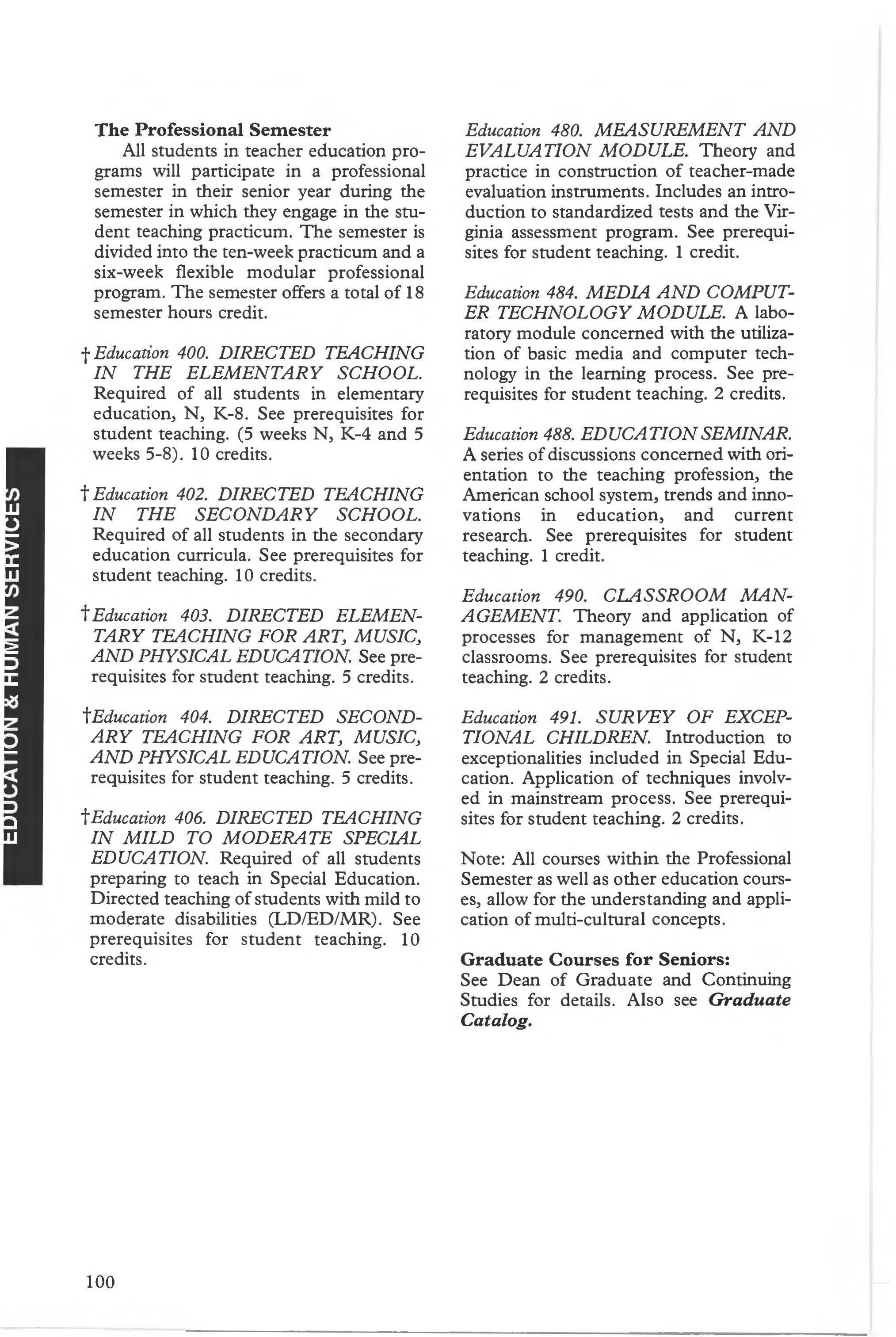
Education 488. EDUCATION SEMINAR. A series of discussions concerned with orientation to the teaching profession, the American school system, trends and innovations in education, and current research. See prerequisites for student teaching. 1 credit.
Education 490 CLASSROOM MANAGEMENT Theory and application of processes for management of N, K-12 classrooms. See prerequisites for student teaching 2 credits.
Education 491. SURVEY OF EXCEPTIONAL CHILDREN. Introduction to exceptionalities included in Special Education. Application of techniques involved in mainstream process. See prerequisites for student teaching. 2 credits.
Note: All courses within the Professional Semester as well as other education courses, allow for the understanding and application of multi-cultural concepts
Graduate Courses for Seniors: See Dean of Graduate and Continuing Studies for details. Also see Graduate Catalog.
Rachel Mathews, Ed.D., Assistant Professor of Special Education Ruth L. Meese, Ph.D., Associate Professor of Special Education, and Area Coordinator Peggy L. Tarpley, Ph.D., Assistant Professor of Special Education Patricia Whitfield, Ph.D., Assistant Professor of Special Education
Longwood offers a five-year Liberal Studies-Special Education Program leading to a Bachelor's Degree in Liberal Studies in 4 years and a Master's Degree in Special Education in 5 years. This program is designed for students who want to become Special Education teachers. (See the Liberal Studies section of this Catalog.) A professional portfolio is developed during the five year period. Students may choose to terminate their course work at the end of the fourth year (with 126 credit hours) with a Bachelor's Degree in Liberal Studies and not pursue the Master's Degree. However, students must complete the fifth year to become endorsed to teach in Special Education.
YEARl
SPED 202 Intro to Special Education/3 credits
SPED 204 Intro to Curriculum and Methodology Adaptations in Special Education/2 credits
SPED 310 Behavior Management, Part 1/2 credits
SPED 312 Behavior Management, Part 11/2 credits
SPED 320 Practicum 1/3 credits
SPED 30 I Reading and Language Arts For Students with Mild to Moderate Disabilities/3 credits
SPED 302 Math, Science, and Social Studies Adaptations for Students with Mild to Moderate Disabilities/3 credits
SPED 327 Practicum 2/3 credits
SPED 375 Language and Language Disorders/3 credits
SPED 435 Psycho-educational Assessment for Exceptional Leamers/3 credits
Professional Semester
EDUC 406 Directed Teaching in Mild to Moderate Special Education/IO credits
EDUC 484 Media and Computer Technology/2 credits
EDUC 488 Education Seminar/I credit
SPED 480 IEP and Seminar in Special Education/I credit
EDUC 502 Research Design/3 credits
EDUC 521 Human Growth and Development/3 credits
EDUC 524 Foundations of Reading and Language Development for Emergent Literacy/3 credits
EDUC 525 Foundations of Reading and Language Development in Grades 3-8/3 credits
EDUC 571 Foundations of Instruction and Leaming Theory/3 credits

SPED 516 Medical and Neurological Problems of Exceptional Students/3 credits
SPED 530 Characteristics and Needs of Students With Mild to Moderate Disabilities/3 credits
SPED 575 Career and Life Planning for Individuals With Disabilities/3 credits
SPED 682
SPED 689
SPED 690
SPED 691
Collaboration in the School, Home, and Community/3 credits Seminar of Current Issues in Special Education/3 credits Intemship/3 credits
Thesis/3 credits or Non-Thesis Option
Students selecting the non-thesis option must complete a three credit class in lieu of SPED 691 and also complete a three hour comprehensive exam (See Graduate Catalog).
Suggested three credit classes for the non-thesis option include: EDUC 5 3 0, EDUC 549, EDUC 620, PSYC 523, PSYC 551, PSYC 660, ART 543, MATH 623, MUSC 543, MUSC 546, or SCI 562. The course selected must not have been taken during the undergraduate years.
A special education minor may be pursued by students in any other major. Students who wish to minor take the following sequence of courses: 18 credits
SPED 202 Intro to Special Education/3 credits
SPED 204 Intro to Curriculum and Methodology Adaptations in Special Education/2 credits
SPED 310 Behavior Management, Part I/2 credits
SPED 312 Behavior Management, Part II/2 credits
SPED 375 Language and Language Disorders/3 credits
SPED 435 Psychoeducational Assessment for Exceptional Leamers/3 credits
.3. Credits from the following:
PSYC 131 Intro to Psychology as a Social Science/3 credits
PSYC 132 Intro to Psychology as a Natural Science/3 credits
PSYC 356 Abnormal Psychology/3 credits
PSYC 357 Psychopathology of Childhood/3 credits
t A special fee is charged for all practicum and student teaching courses.
** Writing Intensive Courses
Special Education 202. INTRODUCTION TO SPECIAL EDUCATION. Introduction to all exceptionalities included in special education; the psychology of exceptional learners and legislation pertaining to the education of students with disabilities. Observation in special education. 3 credits.
Special Education 204. INTRODUCTION TO CURRICULUM AND METHODOLOGY ADAPTATIONS IN SPECIAL EDUCATION. An overview of curriculum in the regular classroom, K-12; guidelines for selection and adaptations of commercial materials and educational software, emphasis on the IEP, task analysis, and the mainstream. 2 credits.

Special Education 295-495 : SPECIAL TOPICS. Selected topics in Special Education. The topics will vary from semester to semester. Descriptions will be available from academic advisors. May be repeated for credit when topics change. 1-3 credits.
Special Education 301. READING AND LANGUAGE ARTS FOR STUDENTS WITH MILD TO MODERATE DISABILITIES. Emphasis on teacher directed instruction and cognitive strategy instruction for students with mild to moderate deficits in reading and language arts. Prerequisites: SPED 202 and 204. 3 credits.
Special Education 302. MATH, SCIENCE, AND SOCIAL STUDIES ADAPTATIONS FOR STUDENTS WITH MILD TO MODERATE DISABILITIES. Emphasis on teacher directed instruction
and cognitive strategy instruction for students with mild to moderate deficits in mathematics; adaptations for students in science and social studies. Prerequisites SPED 301. 3 credits.
**Special Education 310. BEHAVIOR MANAGEMENT PART I. A survey of applied behavior analysis techniques used in the management of behavior of students. 2 credits.
Special Education 312. BERA VIOR MANAGEMENT PART II. A study of behavioral, ecological, biophysical, psychoeducational, and psychodynamic theories and approaches to classroom management of children with social and/or emotional conflicts. 2 credits.
t Special Education 320. PRACTICUM I. Introductory teaching experience with students having mild/moderate learning and behavioral problems. Prerequisites: 202, 204. 3 credits.
t Special Education 327. PRACTICUM II. Advanced teaching experience with students having mild/moderate learning and behavioral problems. Prerequisite: SPED 320. 3 credits.
Special Education 375. LANGUAGE AND I.ANGUAGE DISORDERS. A study of normal development of language and delayed language acquisition resulting from environmental and organic causes. 3 credits.
**Special Education 435. PSYCHOEDUCATIONAL ASSESSMENT FOR EXCEPTIONAL LEARNERS. Principles and procedures of educational assessment with emphasis on the selection, preparation, diagnosis and evaluation of children with learning and/or behavioral problems. Prerequisites: 202, 204, 301, 302, 310, 312. 3 credits.
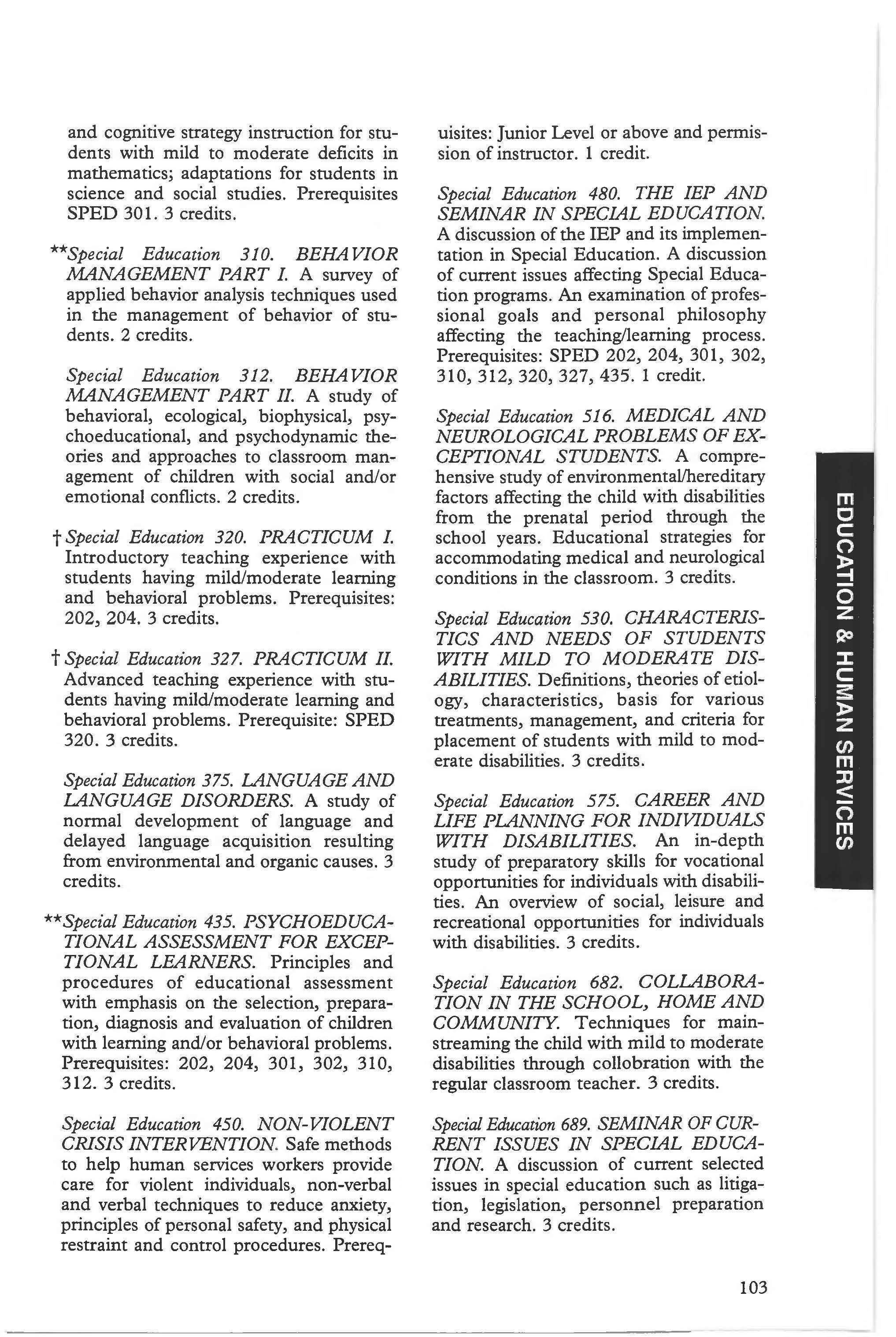
Special Education 450. NON-VIOLENT CRISIS INTERVENTION. Safe methods to help human services workers provide care for violent individuals, non-verbal and verbal techniques to reduce anxiety, principles of personal safety, and physical restraint and control procedures. Prereq-
uisites: Junior Level or above and permission of instructor. 1 credit.
Special Education 480. THE IBP AND SEMINAR IN SPECIAL EDUCATION. A discussion of the IEP and its implementation in Special Education. A discussion of current issues affecting Special Education programs. An examination of professional goals and personal philosophy affecting the teaching/learning process. Prerequisites: SPED 202, 204, 301, 302, 310,312,320,327,435. 1 credit.
Special Education 516. MEDICAL AND NEUROLOGICAL PROBLEMS OF EXCEPTIONAL STUDENTS. A comprehensive study of environmental/hereditary factors affecting the child with disabilities from the prenatal period through the school years. Educational strategies for accommodating medical and neurological conditions in the classroom. 3 credits.
Special Education 530. CHARACTERISTICS AND NEEDS OF STUDENTS WITH MILD TO MODERATE DISABILITIES. Definitions, theories of etiology, characteristics, basis for various treatments, management, and criteria for placement of students with mild to moderate disabilities. 3 credits.
Special Education 575. CAREER AND LIFE PLANNING FOR INDIVIDUALS WITH DISABILITIES. An in-depth study of preparatory skills for vocational opportunities for individuals with disabilities. An overview of social, leisure and recreational opportunities for individuals with disabilities. 3 credits.
Special Education 682. COLI.ABORATION IN THE SCHOOL, HOME AND COMMUNITY. Techniques for mainstreaming the child with mild to moderate disabilities through collobration with the regular classroom teacher. 3 credits.
Special Education 689. SEMINAR OF CURRENT ISSUES IN SPECIAL EDUCATION. A discussion of current selected issues in special education such as litigation, legislation, personnel preparation and research. 3 credits.
t Special Education 690. GRADUATE INTERNSHIP. A minimum of 200 clock hours in a public or private agency supervised by a faculty advisor in diagnosis, consultation, or research. Prerequisite: Professional semester. 3 credits.
t SPECIAL EDUCATION 691: THESIS
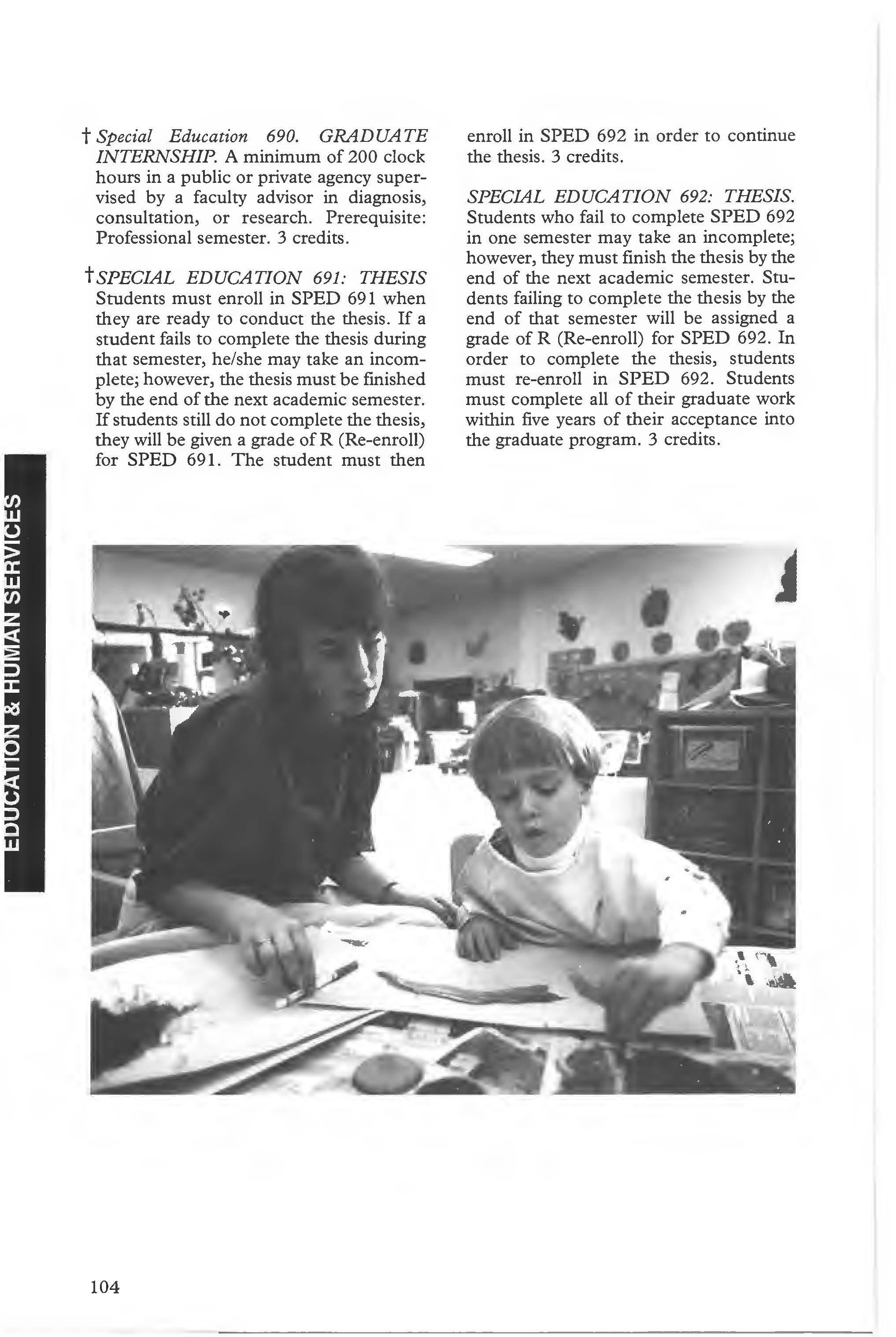
Students must enroll in SPED 691 when they are ready to conduct the thesis. If a student fails to complete the thesis during that semester, he/she may take an incomplete; however, the thesis must be finished by the end of the next academic semester. If students still do not complete the thesis, they will be given a grade of R (Re-enroll) for SPED 691. The student must then
enroll in SPED 692 in order to continue the thesis. 3 credits.
SPECIAL EDUCATION 692: THESIS. Students who fail to complete SPED 692 in one semester may take an incomplete; however, they must finish the thesis by the end of the next academic semester. Students failing to complete the thesis by the end of that semester will be assigned a grade of R (Re-enroll) for SPED 692. In order to complete the thesis, students must re-enroll in SPED 692. Students must complete all of their graduate work within five years of their acceptance into the graduate program. 3 credits.
Stephen C. Keith, Ed.D., Assistant Professor of Education Rita Purcell-Robertson, M.S., CCC, Instructor of Speech, Language Pathology and Audiology, and Area Coordinator
Terri H. Ramsey, M.Ed., CCC, Instructor of Speech, Language Pathology and Audiology
The four-year undergraduate major in Speech-Language Pathology and Audiology is a pre-professional degree which prepares the student for entry into a Master's degree program in Speech-Language Pathology, Communicative Disorders, or Audiology .
A. General Education Reguirement 33 credits. See General Education Requirements listed on pages 61-63.
B. Additional Degree Reguirements, B.A. 9 credits. Additional Degree Reguirements. B.S. 10 credits. See Degree Requirements listed on pages 57-59.
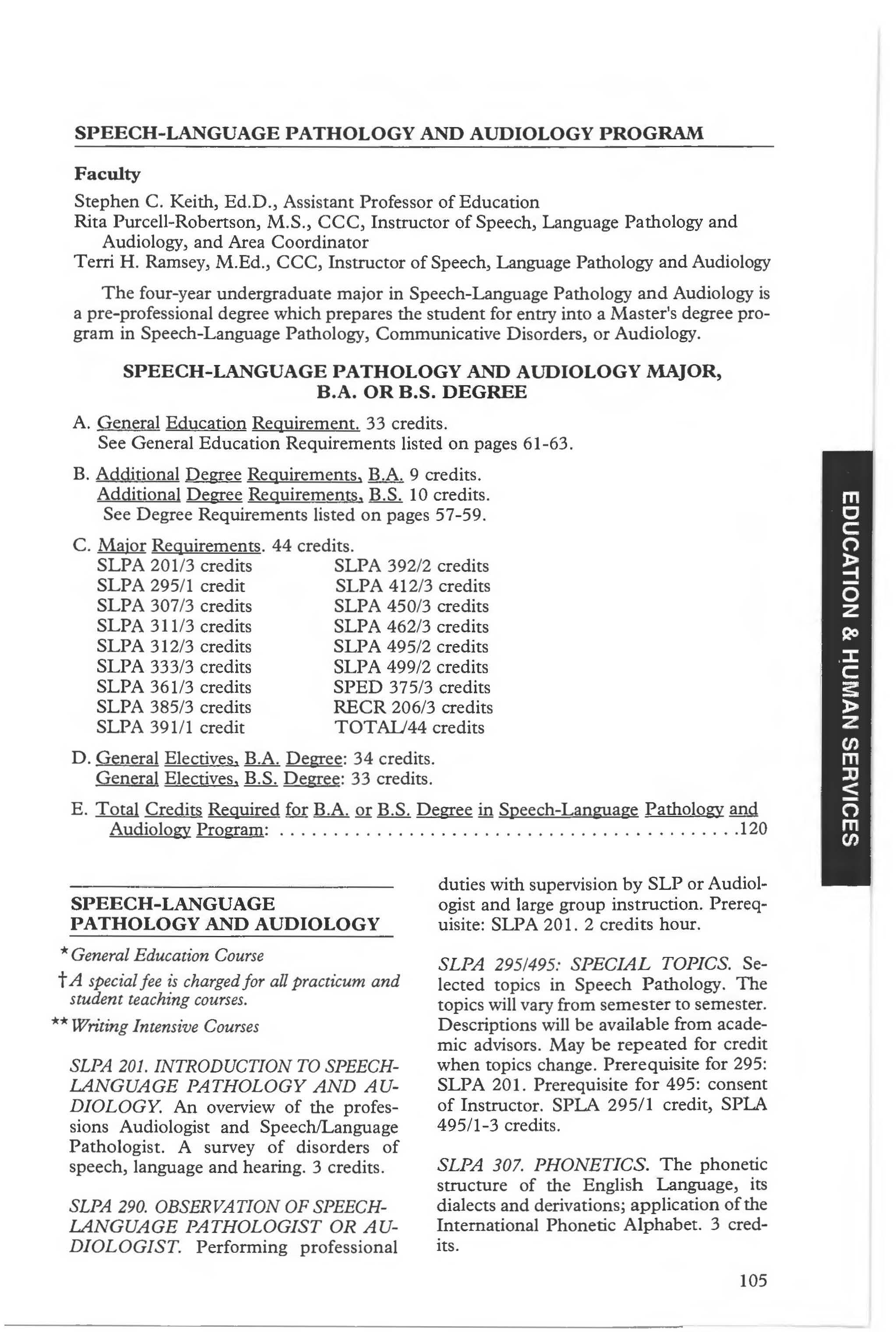
C. Major Reguirements. 44 credits.
SLPA 201/3 credits SLPA 392/2 credits
SLPA 295/1 credit SLPA 412/3 credits
SLPA 307 /3 credits SLPA 450/3 credits
SLPA 311/3 credits SLPA 462/3 credits
SLPA 312/3 credits SLPA 495/2 credits
SLPA 333/3 credits SLPA 499/2 credits
SLPA 361/3 credits SPED 375/3 credits SLPA 385/3 credits RECR 206/3 credits SLPA 391/1 credit TOTAI.J44 credits
D. General Electives, B.A. Degree: 34 credits. General Electives, B.S. Degree: 33 credits.
E. Tota! Credits Reguired fur B.A. or B.S. Degree in Speech-Language Pathology and Audiology Program: ... .. . .. .... ...... ................ . ........ 120
* General Education Course
t A special fee is charged for all practicum and student teaching courses.
** Writing Intensive Courses
SLPA 201. INTRODUCTION TO SPEECHLANGUAGE PATHOLOGY AND AUDIOLOGY. An overview of the professions Audiologist and Speech/Language Pathologist. A survey of disorders of speech, language and hearing. 3 credits
SLPA 290. OBSERVATION OF SPEECHLANGUAGE PATHOLOGIST OR AUDIOLOGIST. Performing professional
duties with supervision by SLP or Audiologist and large group instruction. Prerequisite: SLPA 201. 2 credits hour.
SLPA 295/495 : SPECIAL TOPICS. Selected topics in Speech Pathology The topics will vary from semester to semester. Descriptions will be available from academic advisors . May be repeated for credit when topics change Prerequisite for 295: SLPA 201. Prerequisite for 495: consent of Instructor. SPLA 295/1 credit, SPLA 495/1-3 credits.
SLPA 307. PHONETICS. The phonetic structure of the English Language, its dialects and derivations; application of the International Phonetic Alphabet. 3 credits.
SLPA 311. ANATOMY AND PHYSIOLOGY OF SPEECH AND HEARING MECHANISMS. Anatomical structures and neurology of the human communication system and the physiology of interrelated movements. 3 credits.
SLPA 312. ARTICULATION AND PHONOLOGY. Articulation differences versus disorders; phonological processes; etiologies of functional and organic disorders; indications for referral. Emphasis on therapy for school-age children. Prerequisites: SLPA 201 and 307 or consent of instructor. 3 credits.
** SLPA 333. FLUENCY AND VOICE DISORDERS. Fluency and voice theories, evaluation, and therapy methods. Prerequisite: SLPA 201 and SLPA 311 or consent of instructor. 3 credits.
SLPA 361. INTRODUCTION TO AUDIOLOGY. Physics of sound; physiology of hearing; types and amounts of hearing loss; hearing evaluation: audiometry. Prerequisite: SLPA 311 or consent of instructor. 3 credits.
SPED 375. LANGUAGE AND LANGUAGE DISORDERS. Normal language development; factors affecting language acquisition and delayed language; language tests and testing. 3 credits.
** SLPA 385. ORGANIC AND NEUROGENIC DISORDERS OF SPEECH AND LANGUAGE. An overview of cleft palate, cerebral palsy, aphasia, dysarthria, traumatic brain injury, dysphagia, right hemisphere disorder and dyspraxia. Prerequisite: SLPA 311 and SPED 375 or consent of instructor. 3 credits.
* SLPA 391. CLINICAL OBSERVATION Introduction to the clinical setting; ethical issues in speech pathology and audiology;
interviewing; multicultural issues, assessment components. Prerequisite: SLPA 201 or consent of instructor. 1 credit.
* SLPA 392. CLINICAL PROCEDURES. Administration and scoring of speech and language tests; development of individual and group therapy plans. Prerequisite: SLPA 391 or consent of instructor. 2 credits.
SLPA 412. ADMINISTRATION METHODS IN SPEECH/LANGUAGE PATHOLOGY. Organization and administration of speech/language pathology programs in schools and related settings; professional issues in each setting. Prerequisite: SLPA 392 or consent of instructor. 3 credits.
SLPA 450. AUGMENTATIVE COMMUN/CATION. Alternatives to speaking and hearing: manual, electronic and computer devices, including speech and language synthesizers. 3 credits.
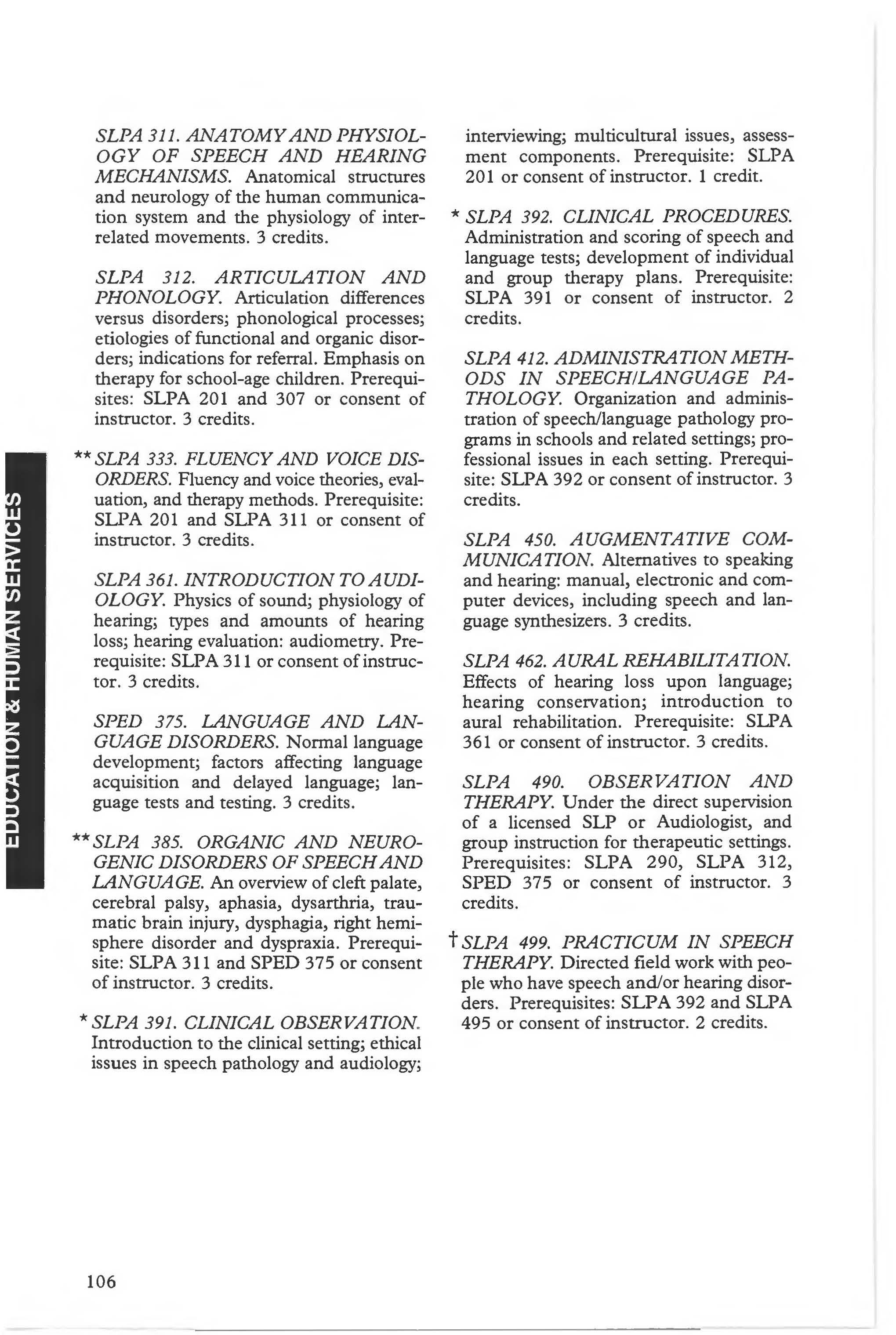
SLPA 462. AURAL REHABILITATION. Effects of hearing loss upon language; hearing conservation; introduction to aural rehabilitation. Prerequisite: SLPA 361 or consent of instructor. 3 credits.
SLPA 490. OBSERVATION AND THERAPY. Under the direct supervision of a licensed SLP or Audiologist, and group instruction for therapeutic settings. Prerequisites: SLPA 290, SLPA 312, SPED 375 or consent of instructor. 3 credits.
t SLPA 499. PRACTICUM IN SPEECH THERAPY. Directed field work with people who have speech and/or hearing disorders. Prerequisites: SLPA 392 and SLPA 495 or consent of instructor. 2 credits.

George C. Stonikinis, Jr., Area Coordinator
Darlene Smith, SecretaryThe specific aims of the Social Work Program are: (1) to provide students with opportunities to obtain knowledge, attitudes and skills appropriate for social work practice at the baccalaureate level, and (2) to offer a background preparation for students intending to enter a graduate professional school of social work, law school, or related graduate program of study.
Courses are designed to help students become directly familiar with diverse social problems and to participate in the delivery of human services to individuals, small groups, families, organizations and/or communities by developing a knowledge and skillbase in the following:
Administration Casework Community Development Community Organization Community Relations Consultation Education
SOCIAL WORK PROGRAM Faculty
Fund-Raising Group Work Personnel Planning Program Development Psychotherapy Rehabilitative Counseling
Research Social Action Staff Development Supervision Teaching Writing
Edna V. Allen-Bledsoe, Ph.D., Associate Professor of Social Work Theresa A. Clark, M.S., Instructor of Social Work George C. Stonikinis, Jr., M.S.W., Associate Professor and Area Coordinator Sarah V Young, Ph.D., Associate Professor of Social Work
The Program in Social Work provides an undergraduate course of study of unique and personalized instruction accredited by the Council on Social Work Education, leading to the Bachelor of Science or Bachelor of Arts in Social Work. The curriculum prepares individuals for admission into accelerated one-year M.S.W. degree programs or entry into the expanding opportunities of first level professional practice according to the standards of the National Association of Social Workers.
The Social Work Program at Longwood College is designed around the concept of the "generalist worker," one who is prepared to practice in a wide variety of social services settings. The faculty of the Social Work Program reflect this orientation. Additionally, the staff individualizes much of the students' education and growth as they develop a professional knowledge, skill and attitude base through periodic personalized evaluations and discussions with the entire faculty.
Junior Field Instruction consists of an agency placement concurrent with integrative course work and involves 180 hours of instruction in a field setting. A grade point average of 2.25 in the major and overall is required for placement in a field instruction setting. Students transferring into the program later in their academic pursuits are provided with the accelerated 9 1/2-week summer program. Senior Field Instruction usually occurs during the last semester and consists of 600 hours (15 weeks, 40 hours per week) of field instruction in an agency setting. These placements are readily available throughout the state, and many students choose to live at home during this experience, thus saving money and preparing for graduation and the transition to career pursuits.
A. General Education Core Requirement. 33 credits. See General Education Requirements listed on pages 61-63.
B. Additional Requirements for B.A. Degree. 9 credits. Additional Requirements for B.S. Degree. 10 credits. See Degree Requirements listed on pages 57-59.
C. Major Requirements. 69 credits.
Social Work 101/3 credits
Social Work 102/3 credits
Social Work 240/3 credits
Social Work 280, 281/6 credits
Social Work 310/3 credits
Social Work 320/3 credits Social Work 335/1 credit
Social Work 336/3 credits
Social Work 339/5 credits Social Work 340/1 credit
Social Work 400/12 credits
Social Work 401/2 credits
Social Work 404/1 credit
Social Work 405/3 credits Social Work 407/1 credit Social Work 408/2 credits Social Work 415/3 credits Social Work 427/3 credits Social Work Electives/I I credits TOTAL: 69 credits
D. General Electives for B.A. Degree. 9 credits General Electives for B.S. Degree. 8 credits
E. Total Credits Required for .B..,A,_ or B.S. in Social Work: 120 credits
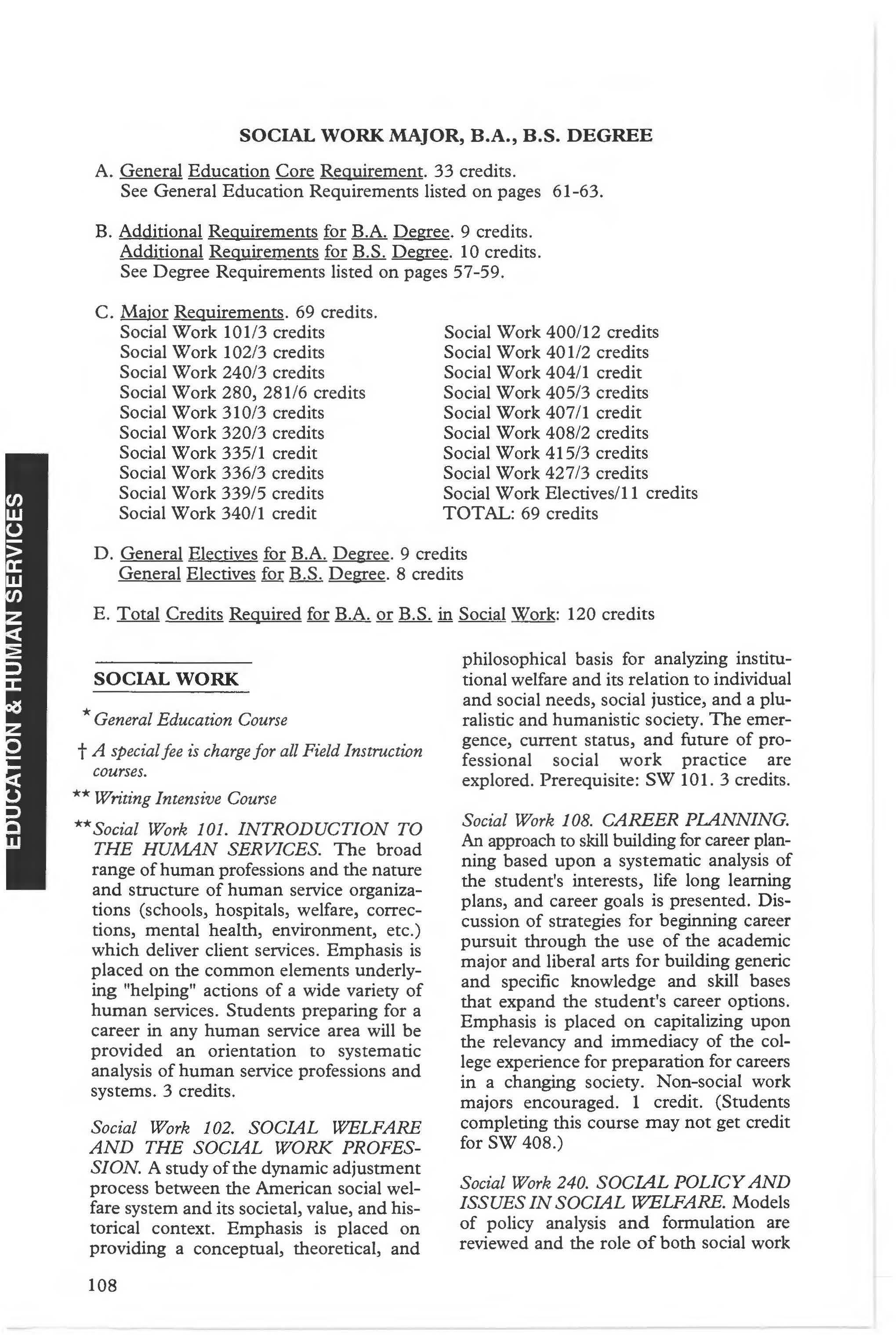
* General Education Course
t A special fee is charge for all Field Instruction courses.
** Writing Intensive Course
**Social Work 101. INTRODUCTION TO THE HUMAN SERVICES. The broad range of human professions and the nature and structure of human service organizations (schools, hospitals, welfare, corrections, mental health, environment, etc.) which deliver client services. Emphasis is placed on the common elements underlying "helping" actions of a wide variety of human services. Students preparing for a career in any human service area will be provided an orientation to systematic analysis of human service professions and systems. 3 credits.
Social Work 102. SOCIAL WELFARE AND THE SOCIAL WORK PROFESSION. A study of the dynamic adjustment process between the American social welfare system and its societal, value, and historical context. Emphasis is placed on providing a conceptual, theoretical, and
philosophical basis for analyzing institutional welfare and its relation to individual and social needs, social justice, and a pluralistic and humanistic society. The emergence, current status, and future of professional social work practice are explored. Prerequisite: SW 101 3 credits.
Social Work 108. CAREER PLANNING. An approach to skill building for career planning based upon a systematic analysis of the student's interests, life long learning plans, and career goals is presented. Discussion of strategies for beginning career pursuit through the use of the academic major and liberal arts for building generic and specific knowledge and skill bases that expand the student's career options. Emphasis is placed on capitalizing upon the relevancy and immediacy of the college experience for preparation for careers in a changing society. Non-social work majors encouraged. 1 credit. (Students completing this course may not get credit for SW 408.)
Social Work 240. SOCIAL POLICY AND ISSUES IN SOCIAL WELFARE. Models of policy analysis and formulation are reviewed and the role of both social work
and government are investigated. The characteristics of poverty, racism, sexism, power, and community are studied in relation to social welfare policy, social work practice, social planning, and programs and services Prerequisite: SW I 02. 3 credits.
Social Work 280. HUMAN BEHAVIOR AND THE SOCIAL ENVIRONMENT I. Utilizing a general systems approach, the student will develop a multi-level perspective of human behavior in the areas of personality development, self-concept formation, community and organizational systems, group processes, personal change dynamics, family systems, and life cycles. Concurrent focus is placed on practice relevancy of the theory base. Prerequisite: Sociology 101. 3 credits.
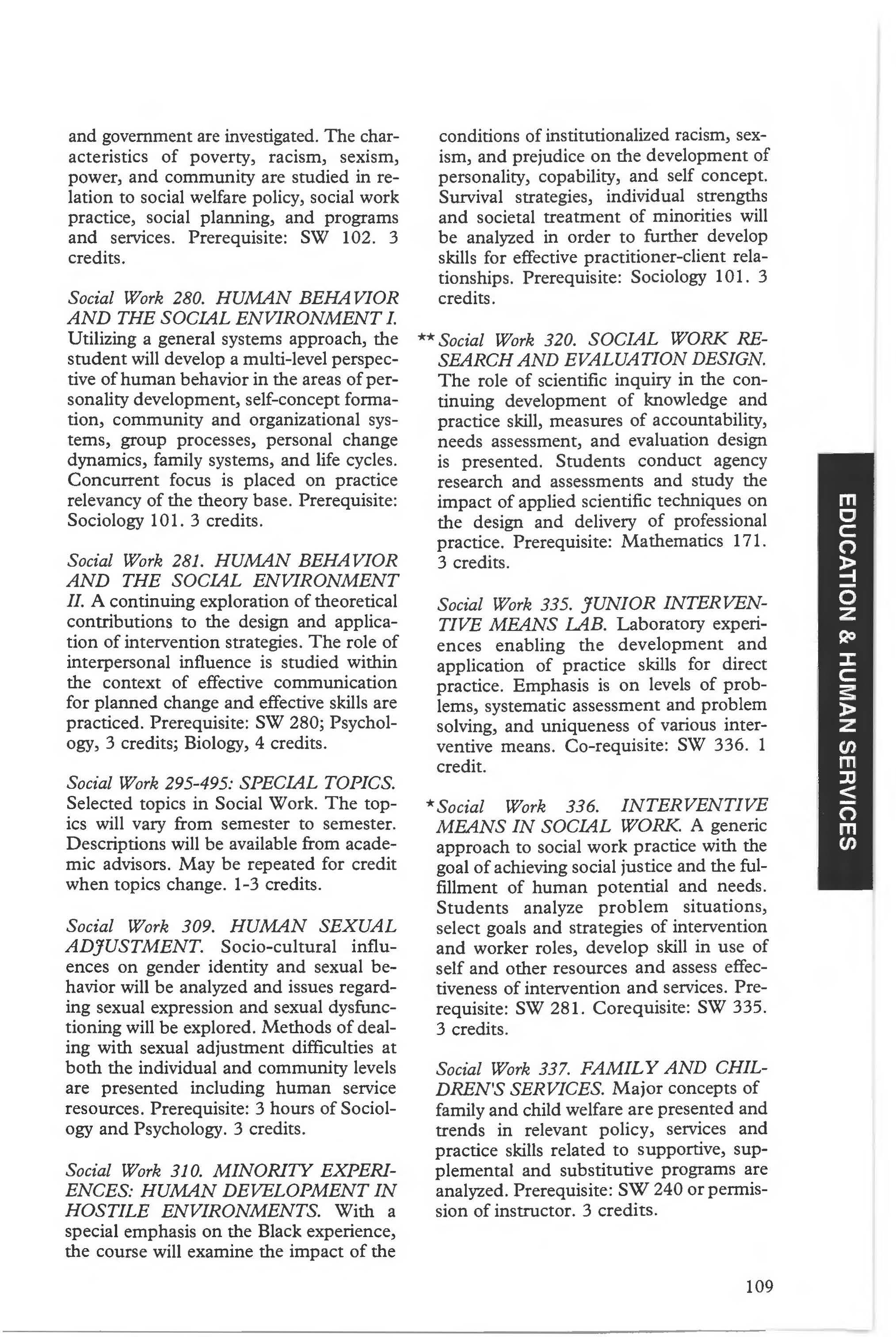
Soci'al Work 281. HUMAN BEHAVIOR AND THE SOCIAL ENVIRONMENT II. A continuing exploration of theoretical contributions to the design and application of intervention strategies. The role of interpersonal influence is studied within the context of effective communication for planned change and effective skills are practiced. Prerequisite: SW 280; Psychology, 3 credits; Biology, 4 credits.
Social Work 295-495: SPECIAL TOPICS. Selected topics in Social Work. The topics will vary from semester to semester. Descriptions will be available from academic advisors. May be repeated for credit when topics change 1-3 credits.
Social Work 309. HUMAN SEXUAL ADJUSTMENT. Socio-cultural influences on gender identity and sexual behavior will be analyzed and issues regarding sexual expression and sexual dysfunctioning will be explored. Methods of dealing with sexual adjustment difficulties at both the individual and community levels are presented including human service resources. Prerequisite: 3 hours of Sociology and Psychology. 3 credits.
Social Work 310. MINORITY EXPERIENCES: HUMAN DEVELOPMENT IN HOSTILE ENVIRONMENTS. With a special emphasis on the Black experience, the course will examine the impact of the
conditions of institutionalized racism, sexism, and prejudice on the development of personality, copability, and self concept. Survival strategies, individual strengths and societal treatment of minorities will be analyzed in order to further develop skills for effective practitioner-client relationships. Prerequisite: Sociology IO 1. 3 credits.
** Social Work 320. SOCIAL WORK RESEARCH AND EVALUATION DESIGN. The role of scientific inquiry in the continuing development of knowledge and practice skill, measures of accountability, needs assessment, and evaluation design is presented. Students conduct agency research and assessments and study the impact of applied scientific techniques on the design and delivery of professional practice. Prerequisite: Mathematics 171. 3 credits
Social Work 335. JUNIOR INTERVENTIVE MEANS LAB. Laboratory experiences enabling the development and application of practice skills for direct practice. Emphasis is on levels of problems, systematic assessment and problem solving, and uniqueness of various interventive means. Co-requisite: SW 336. 1 credit.
* Social Work 336. INTERVENTIVE MEANS IN SOCIAL WORK. A generic approach to social work practice with the goal of achieving social justice and the fulfillment of human potential and needs. Students analyze problem situations, select goals and strategies of intervention and worker roles, develop skill in use of self and other resources and assess effectiveness of intervention and services. Prerequisite: SW 281. Corequisite: SW 335. 3 credits .
Social Work 337. FAMILY AND CHILDREN'S SERVICES. Major concepts of family and child welfare are presented and trends in relevant policy, services and practice skills related to supportive, supplemental and substitutive programs are analyzed. Prerequisite: SW 240 or permission of instructor. 3 credits.
t Social Work 339. JUNIOR FIELD INSTRUCTION IN SOCIAL WORK. Throughout the semester, a direct practice experience under the supervision of a field instructor. Application and continued growth of knowledge base, social work practice skills, and values are assessed. Termination of the field instruction will include a formal "Junior Evaluation" involving staff and student in an assessment of the student's candidacy for admission into the Social Work Program. Prerequisite: SW 336 and 2.25 GPA average overall and in major courses. 5 credits.
Social Work 340. JUNIOR INTEGRATIVE SEMINAR. Seminar format provides a supplementary opportunity for generalizing principles and intervention approaches beyond the individual field instruction experience. Focus is on the systematic application of generalist practice principles, both traditional and innovative, in the formation of an integrated professional practice approach. Co-requisite: SW 339. 1 credit.
t Social Work 400. FIELD INSTRUCTION. Educationally directed student learning in selected settings. Students learn by participating in the delivery of social services to individuals, small groups, families, organizations, and/or communities. At least 40 hours per week in an agency for 15 weeks. Prerequisite: SW 427 and 2.25 GPA average overall and in major courses. Co-requisites: SW 401, 404 and 407. 12 credits.
Social Work 401. INTEGRATIVE SEMINAR. A concurrent seminar providing an opportunity for generalizing intervention skills and experience beyond the student's particular field instruction experience. 3 sessions (30 hours) at regional lcoations. Co-requisites: SW 400, 404, 407. 2 credits.
Social Work 404. SOCIAL WELFARE ADMINISTRATION. An analysis of skills and understanding essentials for the translation of human service program goals into organizational structures. Emphasis is on organizational concepts and theories, administrative philosophies and
actual analyses of structural change and operation of field experience agencies. Co-requisites: SW 400, 401, 407. 1 credit.
Social Work 405. WORKING WITH SPECIAL POPULATIONS. A presentation of the principles of majority-minority relationships within the context of diverse "special populations". The problems of minority status due to factors of race, sex, age, sexual preference, and cultural heritage are studied. Prerequisite: 3 hours of Sociology. 3 credits.
Social Work 406. AGING AND SOCIETY. An introduction to the psychological, social and economic realities of aging with an emphasis on perceiving the elderly as a minority group. Theories of the aging process will be analyzed in conjunction with intervention techniques 1 credit.
Social Work 407. LAW AND THE SOCIAL WORKER. Seminar on law as a resource in social work practice, with emphasis on areas where the two professions meet such as public welfare, juvenile court, family law, adoptions, etc. Examines attitudes of law and social work toward each other. Co-requisites: SW 400, 401, 404. 1 credit
Social Work 408. JOBS, WORK, AND CAREER PLANNING. The changing nature of work and securing a job are investigated regarding societal changes, the individual's stage in life, and public policy. Strategies for maintaining one's career goals throughout life are presented along with adaptive techniques for career planning. Each student will identify career goals, and explore specific opportunities and approaches to his career. Non-social work majors are encouraged. Prerequisite: 6 hours of social sciences. 2 credits.
Social Work 415. INTER-PROFESSIONAL COMMUN/CATION: TECHNIQUES FOR THE SURVIVAL OF INTERVENTIVE STRATEGIES. Study of effective professional role performance through the systematic integration and application of knowledge and theory in the design of inter-professional transac-
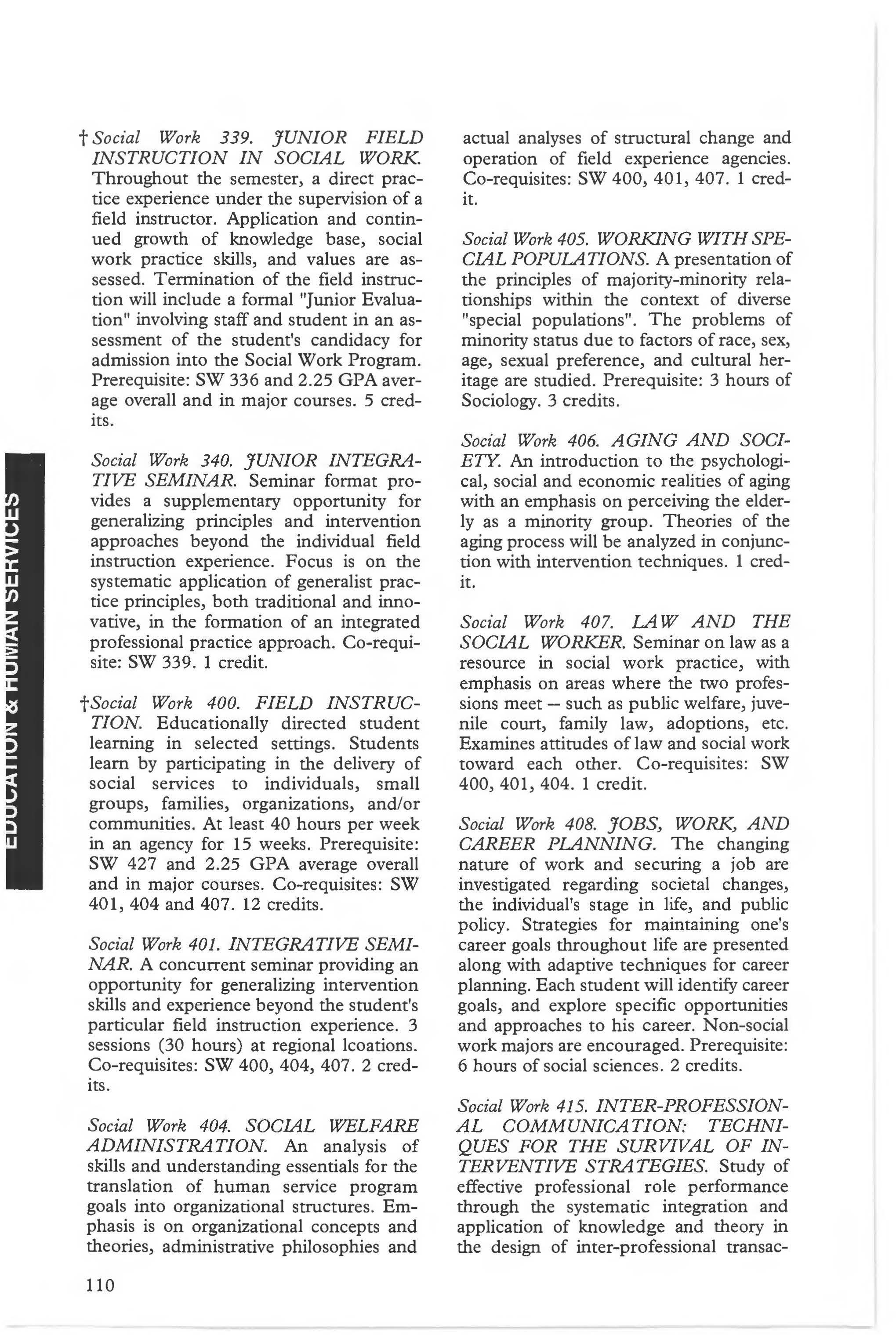
tions and helping patterns; special attention to use of a scientific practice base for determining effective professional action. Prerequisite: SW 336. 3 credits.
** Social Work 427. ADVANCED INTERVENTIVE MEANS. Continued development of generic skills and values at the advanced level for professional practice. Emphasis is placed on integration of knowledge into techniques and strategies for human service delivery. Prerequisite: SW 339. 3 credits.
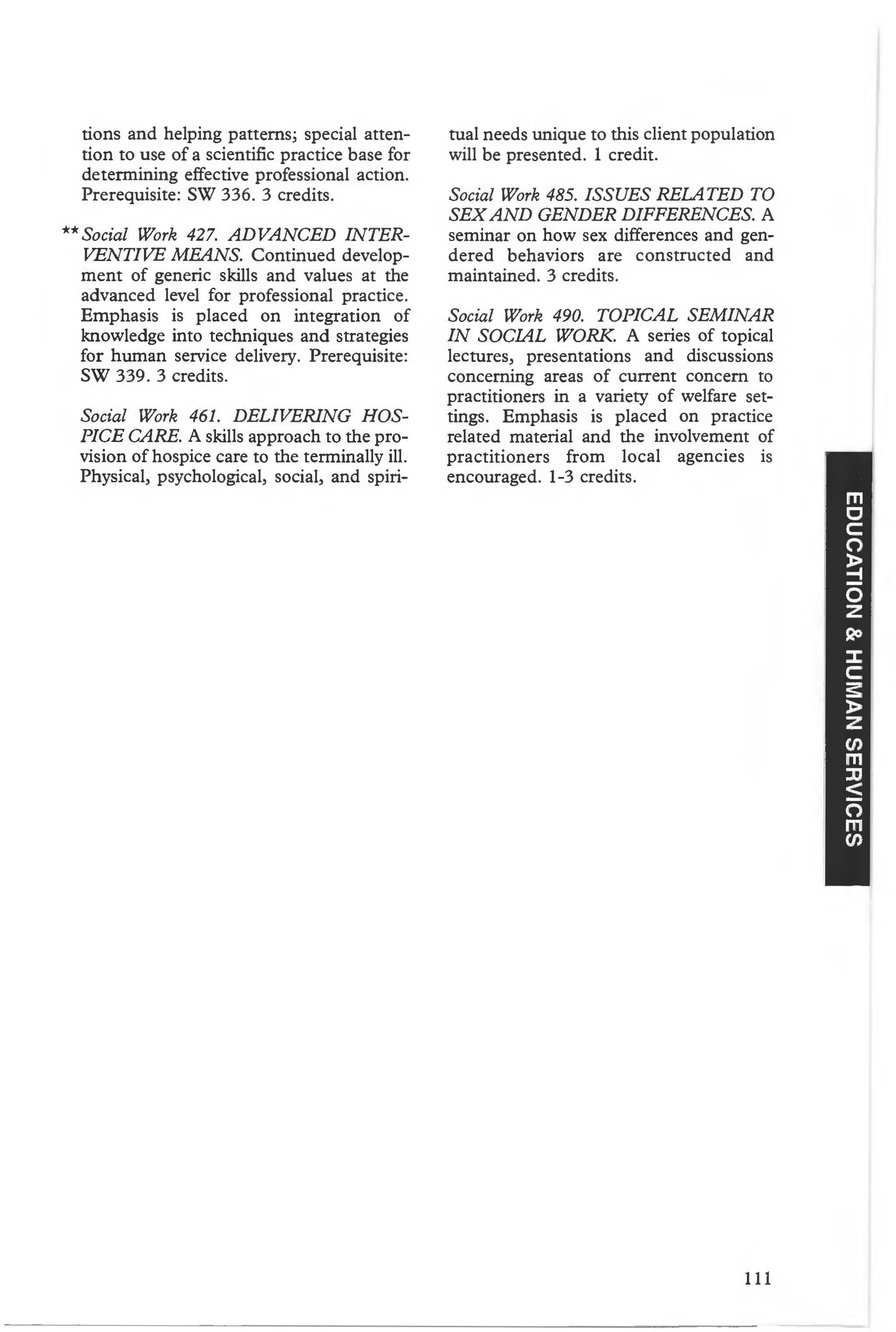
Social Work 461. DELIVERING HOSPICE CARE. A skills approach to the provision of hospice care to the terminally ill. Physical, psychological, social, and spiri-
tual needs unique to this client population will be presented. 1 credit.
Social Work 485. ISSUES RELATED TO SEX AND GENDER DIFFERENCES. A seminar on how sex differences and gendered behaviors are constructed and maintained. 3 credits.
Social Work 490. TOPICAL SEMINAR IN SOCIAL WORK. A series of topical lectures, presentations and discussions concerning areas of current concern to practitioners in a variety of welfare settings. Emphasis is placed on practice related material and the involvement of practitioners from local agencies is encouraged. 1-3 credits.
The Department offers two B.S. degree programs, one in therapeutic recreation and one in physical education with options in pedagogy, exercise science, and athletic training . The department also offers teaching endorsements in health and driver education, and minor programs in dance and coaching. A variety of activity classes , whose goal is to develop fitness and skills in life-time sports, are offered to all students. Health and activity classes are structured to provide students with knowledge about current health problems and to help them develop behaviors and attitudes that will aid in maintaining a state of optimal health and fitness throughout the life-span.
Nancy A. Andrews, Ed D., Professor of Health and Physical Education
Robert J. Beaudet, Jr ., M.S., Instructor of Sports Pedagogy
Sarah M. Bingham, Ph.D . , Associate Professor of Health and Physical Education J . Charles Blauvelt, Ph .D., Associate Professor of Health and Physical Education
Bette L. Harris, Ed .D., Professor of Health and Physical Education
Judith R. Johnson, Ph.D ., Associate Professor of Health and Physical Education
Chrystyna Kosarchyn, Ph D., Associate Professor of Health
Sharon M. Menegoni, M.S., Assistant Professor of Sports Medicine
Nelson D. Neal, Ed.D., Professor of Health and Physical Education Catherine G. Stivers, Ph.D ., Associate Professor of Health and Physical Education M. Kent Todd, Ph.D., Associate Professor of Health and Physical Education Rodney Williams, B.A., Instructor of Dance
Athletic and Recreation Staff Holding Appointment to the Department
Charles B. Bolding, M.S., Baseball Coach and Instructor of Physical Education William G. Carlton, Jr., B.S., Athletic Trainer and Instructor of Physical Education Ronald S. Carr, M.Ed , Men's Basketball Coach and Instructor of Physical Education Loretta E. Coughlin, M.S ., Assistant Women's Basketball Coach and Instructor of Physical Education
Shirley G. Duncan, M.S., Women's Basketball Coach and Instructor of Physical Education B . Todd Dyer, B.S., Soccer Coach
Janet Grubbs, M.S., Field Hockey/La Crosse Coach and Instructor of Physical Education Cindy Ho, M.S., Golf Coach and Instructor of Physical Education Jack E. Williams, M A., Director of Athletics
All physical education majors must make a minimum grade of "C" on each course taken as a part of the activity core and the physical education activities required under the general education requirement. Prior to student teaching and internship experiences, a 2.5 and 2.0 are required respectively. Additional policies and standards for physical education majors are in the Physical Education Major Student Handbook and in the Athletic Training/Sports Medicine Curriculum Handbook
The Physical Education curriculum has three instructional programs leading to a Bachelor of Science degree with a major in physical education One program culminates in being endorsed to teach physical education, and two in professionally related fields All physical education majors must take a core of physical education theory and skill classes; then, depending upon interest and career goals, students will take course work in one of the following program options:
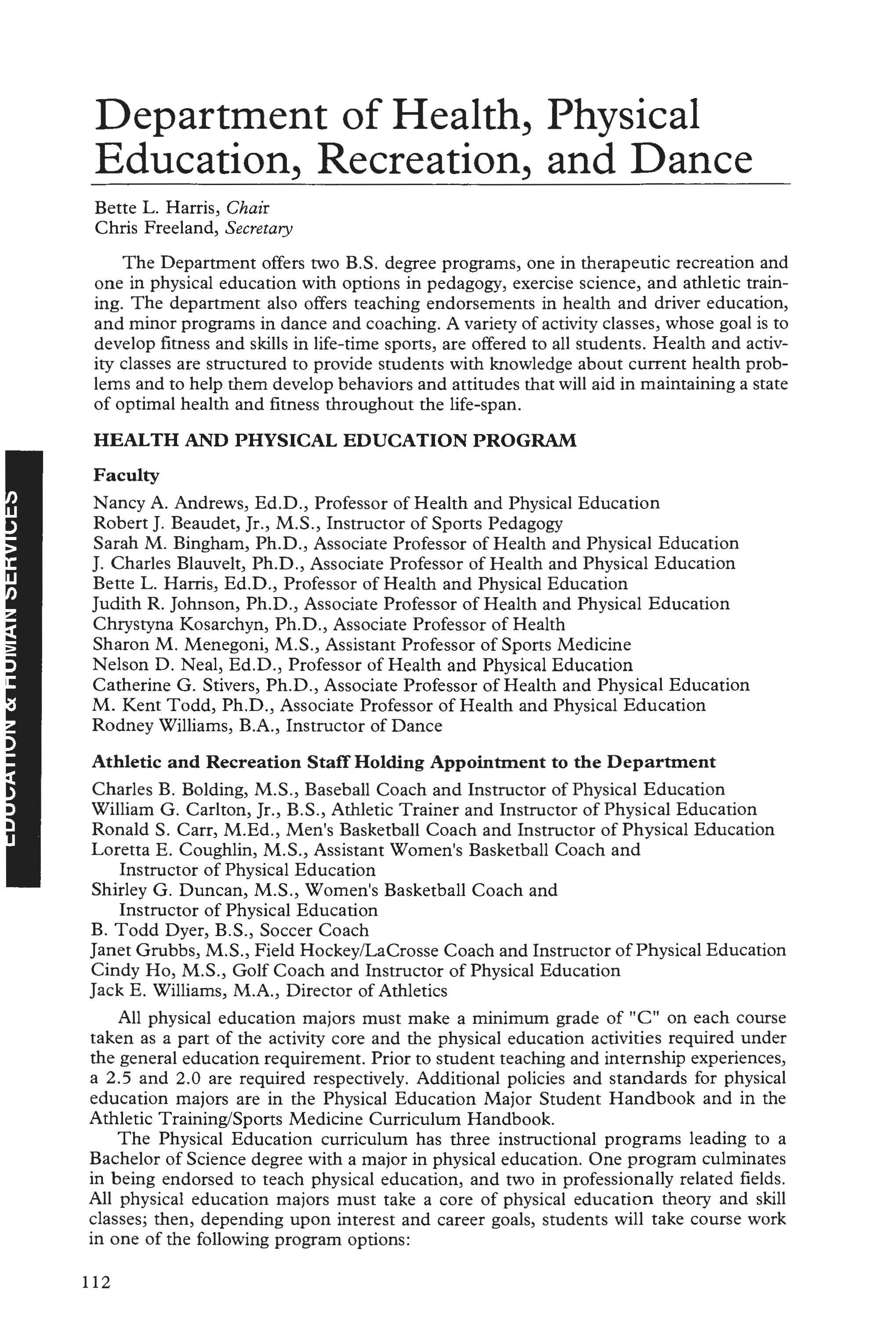
Students electing this program will be endorsed to teach physical education at the elementary and secondary levels. The program provides the scientific background courses for teaching health and physical education and activity skills as well as a scientific, analytical approach to movement
Students electing the teacher education option may elect concentrations in the following areas: adapted physical education, coaching, or to become endorsed to teach health, and driver education.
The program in athletic training/sports medicine is designed to prepare students for a career in the field of athletic training, or may serve as the pre-professional course of study for physical therapy and sports medicine. Students are required to accumulate a minimum of 1000 hours of supervised clinical experience with the Longwood College inter collegiate athletic program or an affiliated site. Students will also complete an off campus clinical internship at a site of their choice during the final semester of the program.
The Exercise Science Option is designed to provide students with a foundation in the sciences with emphasis in exercise, health, and sport sciences. Students enrolled in this option are prepared for entrance into health-related fitness and sport science professions. Graduates of this program are eligible to sit for certification examinations offered by the American College of Sports Medicine and the National Strength and Conditioning Association, and to apply for advanced study in a variety of applied science and allied health programs.
A coaching minor is open to all students matriculating at Longwood College. Students interested in the coaching minor must enroll in 18 hours of specialized professional courses in physical education.
Students interested in a dance minor must audition to enter the program and are expected to be active members of the Longwood College Company of Dancers for a minimum of two years. Students must also successfully complete eighteen hours of required courses in dance.
Elementary and Secondary Endorsement Option N, K-12
A. General Education Core Reguirement . 33 credits.
See General Education Requirements listed on pages 61-63.
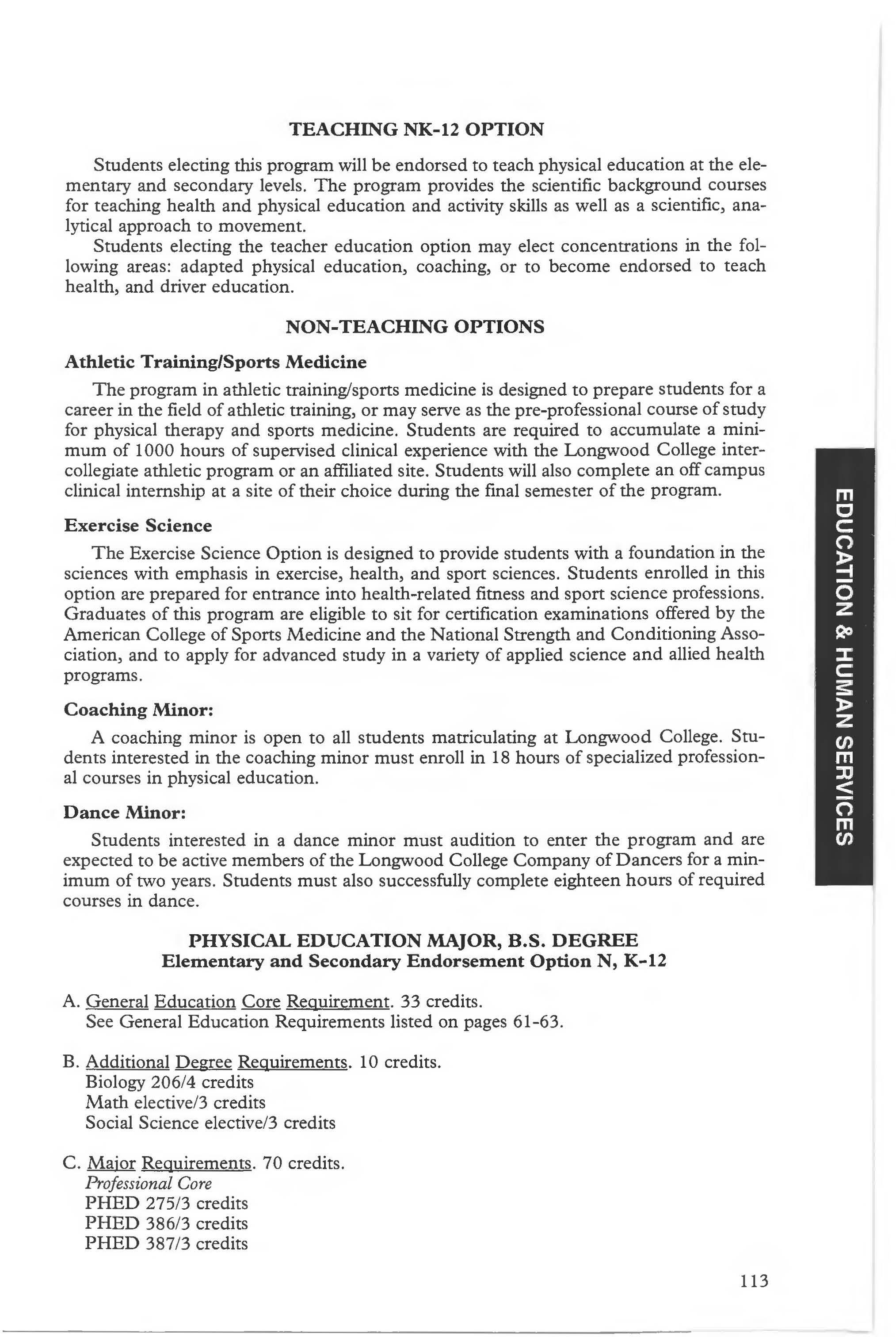
B Additional Degree Reguirements. 10 credits.
Biology 206/4 credits
Math elective / 3 credits
Social Science elective/ 3 credits
C. Major Requirements. 70 credits.
Professional Core
PHED 275/3 credits
PHED 386 / 3 credits
PHED 387/ 3 credits
PHED 462/3 credits
PHED 485/3 credits
Total/15 credits
PHED 103/1 credit
PHED 104/1 credit
PHED 105/1 credit
PHED 108/1 credit
PHED 109/1 credit PHEl. · 115/1 credit PHED 116 or PHED 141/1 credit

PHED 122/1 credit PHED 128/1 credit PHED 131/1 credit PHED 134/1 credit PHED 135/1 credit PHED 211/1 credit
TOTALJ13 credits
Choose One :
PHED 117 /1 credit
PHED 124/1 credit PHED 137/1 credit PHED 140/1 credit PHED 217 /1 credit PHED 224/2 credits REC 237/3 credits RECR 350/2 credits REC 3 7 5/3 credits
TOTAL 1-3 credits
D. General Electives. 8-10 credits
E. Areas of Concentration
BIO 207 /4 credits
PHED 203/1 credit
HLTH 205/3 credits
HLTH 260/3 credits
PHED 280/3 credits
PHED 364/3 credits
PHED 380/3 credits
PHED 381/3 credits
PHED 382/3 credits
PHED 463/3 credits
PHED 482/10 credits
PHED 483/2 credits
TOTALJ41 credits
A physical education major in the elementary-secondary option may elect any of the following concentrations, and/or the health endorsement or driver education endorsement .
**Courses required of Physical Education majors.
Adapted Physical Education*
PHED 200/3 credits
**PHED 381/3 credits
RECR 302/3 credits
RECR 301 or 303/3 credits
TOTALJ12 credits
*Must take Sociology 222
**HLTH 260/3 credits
PHED 200/3 credits
PHED 385/3 credits
**PHED 462/3 credits
** PHED 485/3 credits
PHED 490/1-6 credits
TOTALJ16-21 credits
Any student may elect to take the following sequence of courses and become endorsed to teach driver education in secondary schools.
**HLTH 260 / 3 credits
HLTH 301/3 credits
HLTH 302/3 credits
TOTAL/9 credits
HEALTH EDUCATION ENDORSEMENT NK-12
**HLTH 205/3 credits
HLTH 211/3 credits
HLTH 212/3 credits
HLTH 235/3 credits
HLTH 465/3 credits TOTAL/15 credits
F. Total Credits Required for B.S. Degree in Physical Education with Elementary/ Secondary Endorsement N,_ K-12 123
Total Credits Required for B.S. Degree in Physical Education with Elementary/Secondary Endorsement N,_ K-12 with Concentration in Adapted Physical Education . .... ........ .. ... ....... 132
Total Credits Required for B.S. Degree in Physical Education with Elementary/ Secondary Endorsement N,_ K-12 with Concentration in Driver Education 129

Total Credits Required for B.S. Degree in Physical Education with Elementary/Secondary Endorsement N,_ K-12 with Concentration in Coaching 135
Total Credits Required for B.S. Degree in Physical Education with Elementary and Secondary Endorsement N,_ K-12 and Health 135
A. General Education Core Requirement . 33 credits.
See General Education Requirements listed on pages 61-63.
*Goal 5. Both CHEM 101 and PHYS 101 required as part of Fitness Option Requirements.
B. Additional Degree Requirements. 10 credits
Biology 206/4 credits
Math 171 or Math 271/3 credits
*PSYC 132 or 221/3 credits
C . Major Requirements.
Professional Core
PHED 275/3 credits
**PHED 386 / 3 credits
**PHED 387 / 3 credits
PHED 462/3 credits
**PHED 485/3 credits
TOTAL/15 credits
PHED 103, 131, 134 / 1 credit
PHED 104, 108 or 120/1 credit
PHED 112 or 127/1 credit
PHED 116/ 1 credit
PHED 110, 111, 211, 212 or 312 (Swimming) / 1 or 2 credits
TOTAL 5 or 6 credits
*BIOL 207/4 credit
*CHEM 101/4 credit
*PHYS 101/4 credit
**PHED 385/3 credit
PHED 364/3 credits
PHED 388/8 credits
PHED 488/3 credits
PHED 490/2 credits
PHED 491/2 credits
PHED 499/3 credits
HLTH 205/3 credits
HLTH 235/3 credits
HLTH 260/3 credits
HLTH 410/3 credits
MGMT 360 or MKTG 380/3 credits
SPCH 101/3 credits
TOTALJ54 credits D. General Electives/ 6- 7 credits E. Total Credits Reguired for B.S. Degree with Exercise Science Option 120
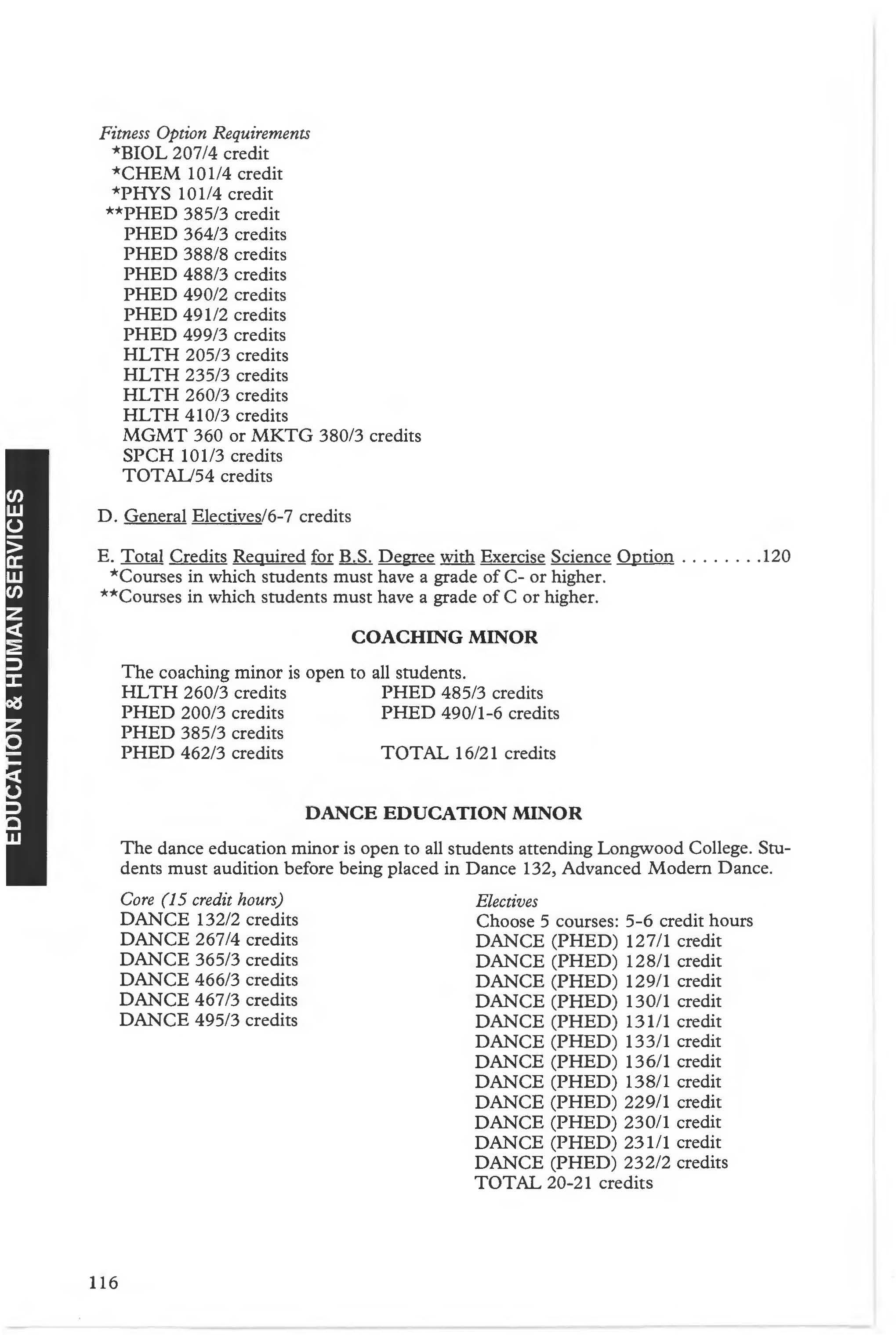
*Courses in which students must have a grade of C- or higher . **Courses in which students must have a grade of C or higher.
The coaching minor is open to all students.
HLTH 260/3 credits PHED 485/3 credits
PHED 200/3 credits PHED 490/1-6 credits
PHED 385/3 credits PHED 462/3 credits
TOTAL 16/21 credits
The dance education minor is open to all students attending Longwood College. Students must audition before being placed in Dance 132, Advanced Modem Dance.
Core (15 credit hours)
DANCE 132/2 credits
DANCE 267 /4 credits
DANCE 365/3 credits
DANCE 466/3 credits
DANCE 467/3 credits
DANCE 495/3 credits
Choose 5 courses: 5-6 credit hours
DANCE (PHED) 127/1 credit
DANCE (PHED) 128/1 credit DANCE (PHED) 129/1 credit DANCE (PHED) 130/1 credit DANCE (PHED) 131/1 credit DANCE (PHED) 133/1 credit
DANCE (PHED) 136/1 credit DANCE (PHED) 138/1 credit DANCE (PHED) 229/1 credit DANCE (PHED) 230/1 credit DANCE (PHED) 231/1 credit DANCE (PHED) 232/2 credits
TOTAL 20-21 credits
A. General Education~ Requirements. 33 credits
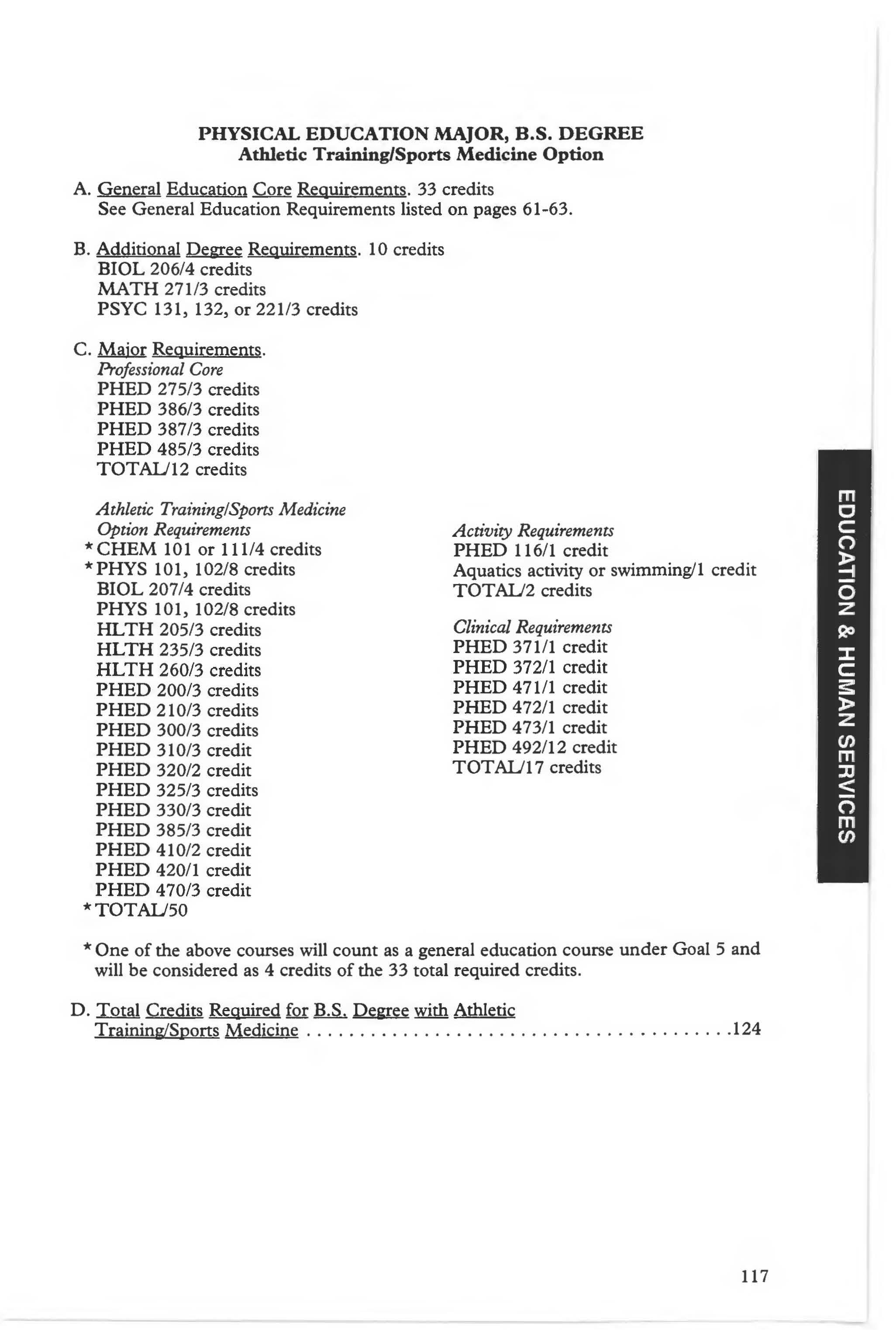
See General Education Requirements listed on pages 61-63.
B. Additional Degree Reguirements. 10 credits
BIOL 206/4 credits
MATH 271/3 credits
PSYC 131, 132, or 221/3 credits
C .Mrum: Requirements. Professional Core
PHED 275/3 credits
PHED 386/3 credits
PHED 387/3 credits
PHED 485/3 credits
TOTAIJ 12 credits
Athletic Training/Sports Medicine Option Requirements
* CHEM 101 or 111/4 credits
* PHYS 101, 102/8 credits
BIOL 207/4 credits
PHYS 101, 102/8 credits
HLTH 205/3 credits
HLTH 235/3 credits
HLTH 260/3 credits
PHED 200/3 credits
PHED 210/3 credits
PHED 300/3 credits
PHED 310/3 credit
PHED 320/2 credit
PHED 325/3 credits
PHED 330/3 credit
PHED 385/3 credit
PHED 410/2 credit
PHED 420/1 credit
PHED 4 70/3 credit
*TOTAIJ50
Activity Requirements
PHED 116/1 credit
Aquatics activity or swimming/I credit TOTAIJ2 credits
Clinical Requirements
PHED 371/1 credit
PHED 372/1 credit PHED 471/1 credit PHED 472/1 credit PHED 4 73/1 credit PHED 492/12 credit TOTAIJI 7 credits
* One of the above courses will count as a general education course under Goal 5 and will be considered as 4 credits of the 33 total required credits.
D. Iru.ru Credits Reguired fQr 1t£.. Degree with Athletic Training/Sports Medicine ........................................ 124
Nelson D. Neal, Ed.D., Professor and Area Coordinator of Dance Program Rodney Williams, B.A., Instructor of Dance
*General Education Course Courses cross listed with PHED may be taken as a general education course for Goal 9 if registered under the PHED discipline.
*Dance 267. HISTORICAL PERSPECTIVES OF DANCE. The growth and development of dance from its primitive beginnings to dance as a performing art (eg. ballet, modem dance). Study of the influence of society on modern dance, ballet, Broadway musicals, dance in the cinema, and dance for television. 4 credits (3 lecture hours, I lab hour)
Dance 127. AEROBIC DANCING. An aerobic activity which combines different styles of music with vigorous jazz and modern dance movements to increase cardiorespiratory fitness In addition to performing choreographed routines, students receive instruction in monitoring heart rate, injury prevention and a variety of other topics relevant to body/mind wellness. A student who has completed Total Fitness through Aerobic Dancing may not take PHED 127. I credit .
Dance 128. BEGINNING SOCIAL AND RECREATION DANCE. Beginning instruction in the fundamental skills of square dance, folk dance, novelty and contemporary rhythms and in the social dance steps. I credit.
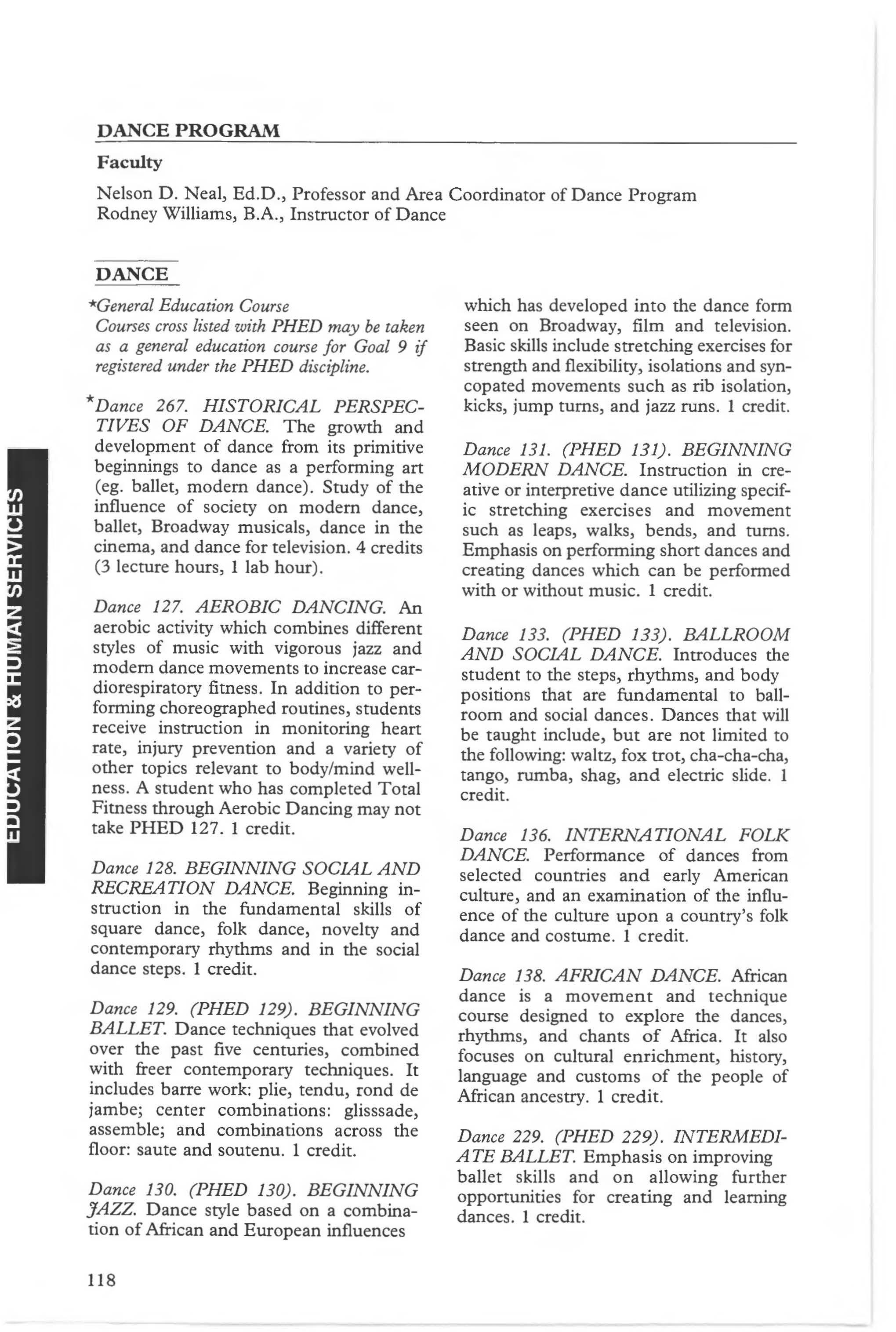
Dance 129. (PHED 129). BEGINNING BALLET. Dance techniques that evolved over the past five centuries, combined with freer contemporary techniques It includes barre work: plie, tendu, rond de jambe; center combinations: glisssade, assemble; and combinations across the floor: saute and soutenu. I credit.
Dance 130. (PHED 130). BEGINNING JAZZ. Dance style based on a combination of African and European influences
which has developed into the dance form seen on Broadway, film and television. Basic skills include stretching exercises for strength and flexibility, isolations and syncopated movements such as rib isolation, kicks, jump turns, and jazz runs. I credit .
Dance 131. (PHED 131). BEGINNING MODERN DANCE. Instruction in creative or interpretive dance utilizing specific stretching exercises and movement such as leaps, walks, bends, and turns. Emphasis on performing short dances and creating dances which can be performed with or without music. I credit.
Dance 133. (PHED 133). BALLROOM AND SOCIAL DANCE. Introduces the student to the steps, rhythms, and body positions that are fundamental to ballroom and social dances. Dances that will be taught include, but are not limited to the following: waltz, fox trot, cha-cha-cha, tango, rumba, shag, and electric slide. I credit.
Dance 136. INTERNATIONAL FOLK DANCE. Performance of dances from selected countries and early American culture, and an examination of the influence of the culture upon a country's folk dance and costume. I credit .
Dance 138. AFRICAN DANCE. African dance is a movement and technique course designed to explore the dances, rhythms, and chants of Africa. It also focuses on cultural enrichment, history, language and customs of the people of African ancestry. I credit.
Dance 229. (PHED 229). INTERMEDIATE BALLET. Emphasis on improving ballet skills and on allowing further opportunities for creating and learning dances. I credit.
Dance 230. (PHED 230). INTERMEDIATE JAZZ. Emphasis on improving jazz dance skills and on allowing further opportunities for creating and learning dances. 1 credit.
Dance 231. (PHED 231). INTERMEDIATE MODERN DANCE. Emphasis on improving modem dance skills and on allowing further opportunities for creating and learning dances. 1 credit .
Dance 132 . ADVANCED MODERN DANCE. High level of skill required in any one of three dance forms : ballet, jazz, or modem dance. Prerequisite: audition 2 credits.
Dance 232. ADVANCED MODERN DANCE. High level of skill required in any one of three dance forms: ballet, jazz, or modem dance. Prerequisite: audition. 2 credits.
Dance 332. ADVANCED MODERN DANCE. High level of skill required in any one of the three dance forms: ballet, jazz or modem dance . Prerequisite: Audition. 2 credits.
Dance 365. DANCE COMPOSITION Theory and practice in composition of solo and small group dances An introductory course designed for those students interested in choreography. 3 credits.
Dance 432. ADVANCED MODERN DANCE High level of skill required in any one of the three dance forms: ballet, jazz or modem dance. Prerequisite: Audition: 2 credits.
Dance 466 TEACHING OF DANCE Theory and practice in methods of teaching dance activities. 3 credits.
PHED 200. INTRODUCTION TO ATHLETIC TRAINING: A survey of the area of Athletic Training and Sports Medicine and their professional applications. The course is designed as an initial experience for students considering a career in athletic training or physical therapy. Open to non-majors. 3 credits.
PHED 210. CLINICAL METHODS IN ATHLETIC TRAINING : Practical study of procedures for the evaluation and treatment of injuries within the athletic environment which includes classroom instruction in selected basic skills. The course also involves a directed observation experience requirement and participation in the student athletic trainer mentor program. 3 credits. Prerequisite or corequisite PHED 200 .
PHED 300. INJURY MECHANISM AND ASSESSMENT I (LOWER EXTREMITY): An examination of the mechanism and pathology of injuries to the lower extremities. Detailed anatomy,
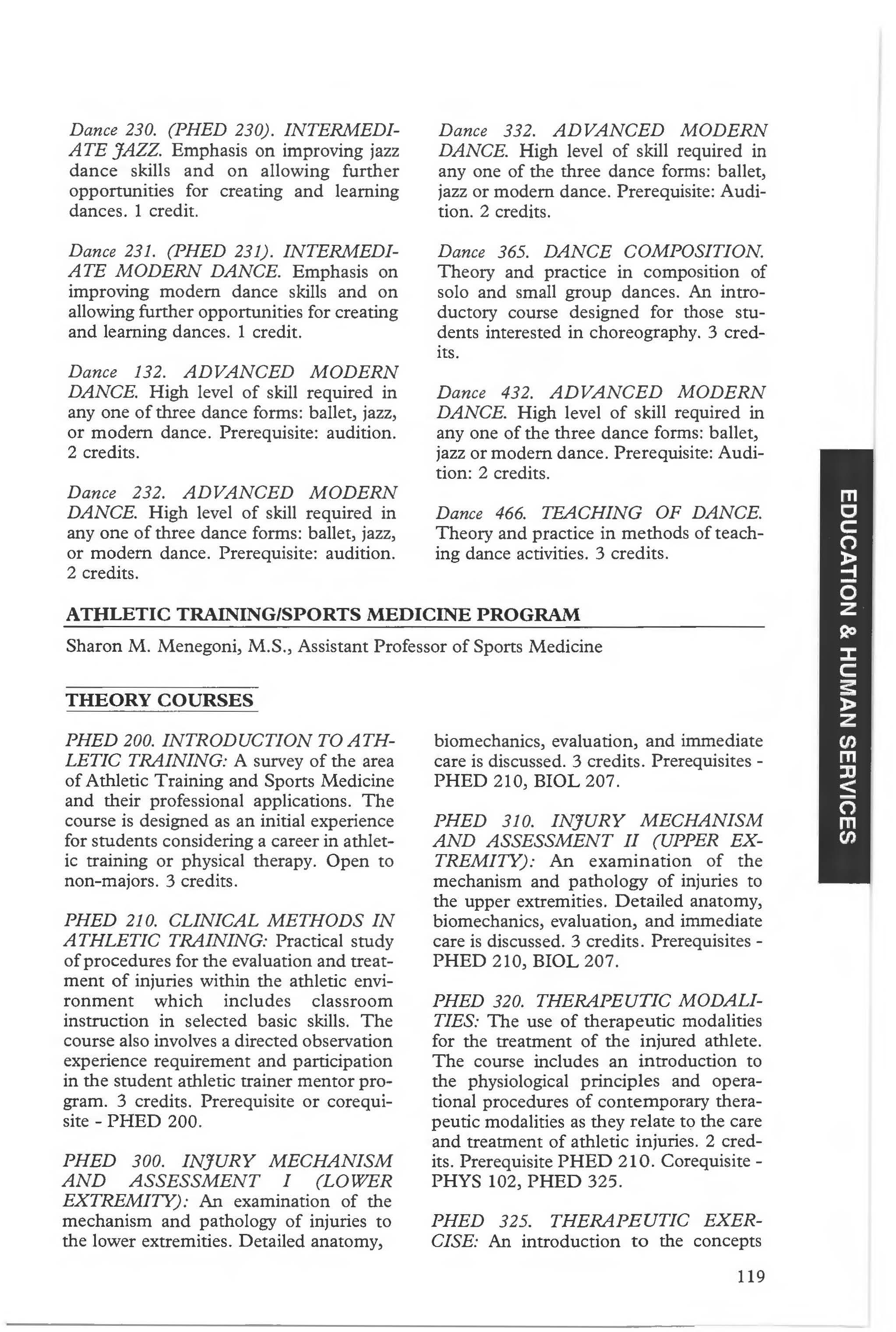
biomechanics, evaluation, and immediate care is discussed. 3 credits. Prerequisites PHED 210, BIOL 207
PHED 310. INJURY MECHANISM AND ASSESSMENT II (UPPER EXTREMITY): An examination of the mechanism and pathology of injuries to the upper extremities. Detailed anatomy, biomechanics, evaluation, and immediate care is discussed. 3 credits. Prerequisites PHED 210, BIOL 207.
PHED 320. THERAPEUTIC MODALITIES: The use of therapeutic modalities for the treatment of the injured athlete The course includes an introduction to the physiological principles and operational procedures of contemporary therapeutic modalities as they relate to the care and treatment of athletic injuries. 2 credits. Prerequisite PHED 210. Corequisite PHYS 102, PHED 325 .
PHED 325. THERAPEUTIC EXERCISE: An introduction to the concepts
and principles of comprehensive rehabilitation programs including determination of therapeutic goals and objectives, selection of therapeutic exercises, methods of evaluating and recording rehabilitation progress, development of criteria for return to competition, and the physiological effects of tissue trauma/wound healing and inactivity/immobilization. 3 credits. Prerequisites PHED 210, 386, PHYS 101. Corequisite PHED 320.

PHED 330. INJURY MECHANISM AND ASSESSMENT III (HEAD, NECK, AND SPINE): An examination of the mechanism and pathology of injuries to the head, neck, and trunk. Detailed anatomy, biomechanics, evaluation, and immediate care is discussed. 3 credits. Prerequisites PHED 210, BIOL 207.
PHED 410. ATHLETIC TRAINING ADMINISTRATION: A practical approach to examination of the administration of athletic training programs including professional communications, the use of records and forms, budgeting, and facility design. 2 credits. Prerequisite or corequisite PHED 330.
PHED 420. CURRENT TOPICS IN ATHLETIC TRAINING: A survey of special topics in athletic training not included in regular course work (pharmacology, special populations, skin disorders, common illnesses, et~.). Additional emphasis on current trends utilized in the profession. 1 credit. Prerequisite or corequisite Upper division standing in the athletic training education program.
PHED 371. PRACTICUM IN ATHLETIC TRAINING I: Supervised study and implementation of procedures for the evaluation and treatment of injuries as a student athletic trainer within the athletic environment. 1 credit. Prerequisite Admission to the athletic training program or permission of the program director.
PHED 372. PRACTICUM IN ATHLETIC TRAINING II: A continuation of PHED 371 which includes supervised study and implementation of procedures for the evaluation and treatment of injuries as a student athletic trainer within the athletic environment. 1 credit. Prerequisite Admission to the athletic training education program or permission of the program director.
PHED 471. PRACTICUM IN ATHLETIC TRAINING III: Supervised clinical experience of procedures for the evaluation and treatment of athletic injuries as a student athletic trainer working with intercollegiate athletic teams. 1 credit. Prerequisite Admission to the athletic training education program or permission of the program director.
PHED 472. PRACTICUM IN ATHLETIC TRAINING IV: A continuation of PHED 4 71 which includes supervised clinical experience of procedures for the evaluation and treatment of athletic injuries as a student athletic trainer working with intercollegiate athletic teams. 1 credit. Prerequisite Admission to the athletic training education program or permission of the program director.
PHED 473. PRACTICUM IN ATHLETIC TRAINING V.· Concentrated ~linical experience in athletic training. Provides practical clinical experience in the care and treatment of athletic injuries as well as management and administration of the athletic training room. 1 credit. Prerequisites PHED 320, 325.
PHED 492. CLINICAL INTERNSHIP IN ATHLETIC TRAINING: Supervised off-campus on-the-job learning experience designed to give students an opportunity to gain practical experience in a private clinic, educational setting, or sports organization which is involved in athletic health care. 12 credits. Prerequisites Completed all required courses.
Chrystyna Kosarchyn, Ph.D., Associate Professor of Health Catherine G. Stivers, Ph.D., Associate Professor of Health
*General Education Course
* Health Education 210. WORLD HEALTH ISSUES. Study of current health problems ~nd issues in the world community. Exammes the cultural, geographic, environmental, social, economic and political influences on health status and health care systems of representative nations especially those of the non-western w~rld. 3 credits.
Health Education 205. PERSONAL HEALTH. The application of scientific facts and principles to current health issues that affect one's personal health. Designed to foster intelligent decision making in the areas of health needs and health behavior, both present and future. 3 credits.
Health Education 211. DRUGS AND HUMAN BEHAVIOR. An examination of drug use and abuse in today's society. ~mp?asis is placed upon enabling the md1v1dual to make intelligent choices concerning these substances based upon scientific research and evidence. 3 credits.
Health Education 212. HUMAN SEXUALITY. The biological, psychological, cultural and behavioral aspects of sexuali~- ~~phasis_ is place~ upon providing the ~nd1v1dual with practical and meaningful mformation pertaining to human sexuality and family life while encouraging the development of responsible sexual behaviors and attitudes. 3 credits.
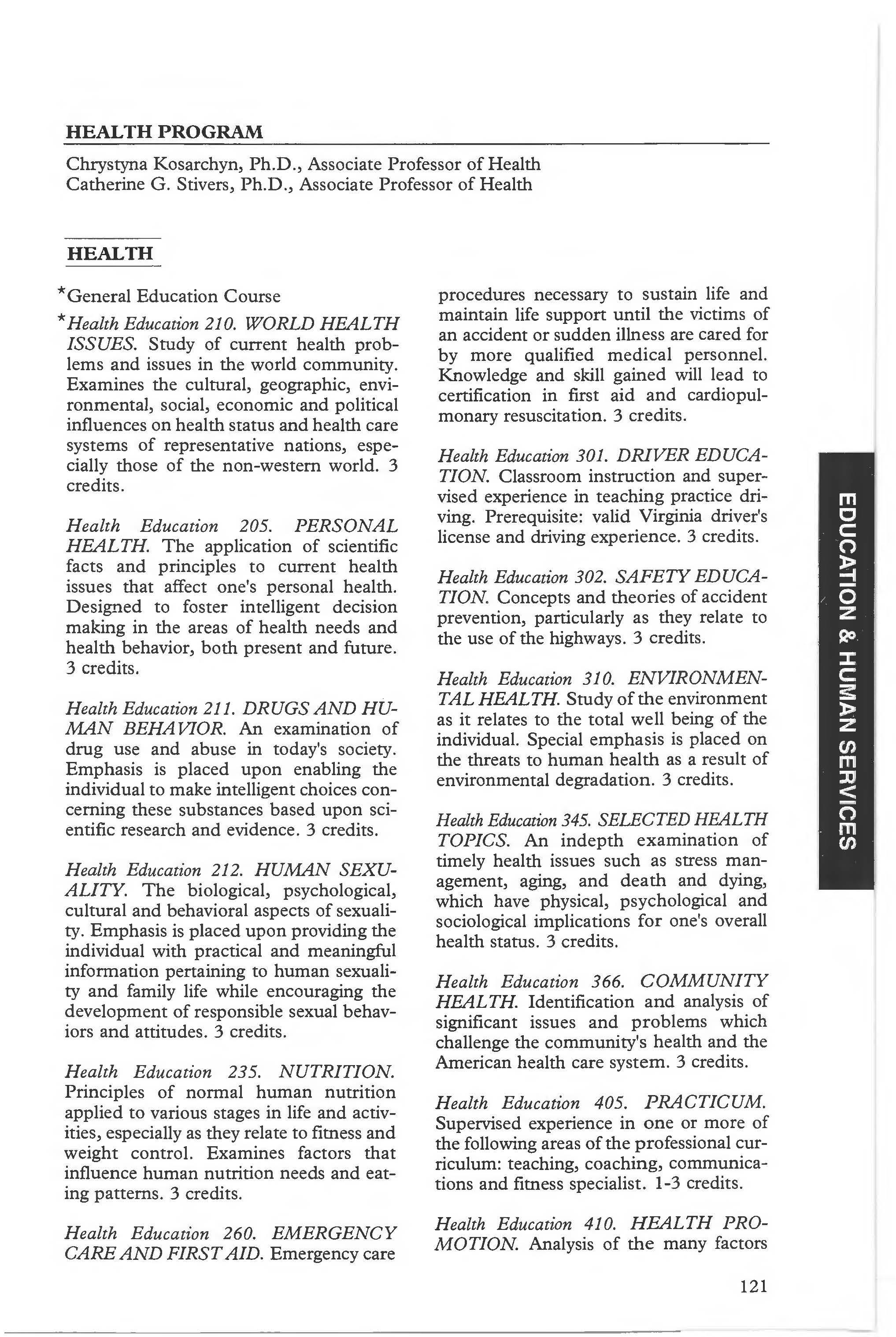
Health Education 235. NUTRITION. Principles of normal human nutrition applied to various stages in life and activities, especially as they relate to fitness and weight control. Examines factors that influence human nutrition needs and eating patterns. 3 credits.
Health Education 260. EMERGENCY CARE AND FIRST AID. Emergency care
procedures necessary to sustain life and maintain life support until the victims of an accident or sudden illness are cared for by more qualified medical personnel. Knowledge and skill gained will lead to certification in first aid and cardiopulmonary resuscitation. 3 credits.
Health Education 301. DRIVER EDUCAT_ION. Classroom instruction and supervised experience in teaching practice driving. Prerequisite: valid Virginia driver's license and driving experience. 3 credits.
Health Education 302. SAFETY EDUCATION Concepts and theories of accident prevention, particularly as they relate to the use of the highways. 3 credits.
Health Education 310. ENVIRONMENTAL HEALTH. Study of the environment as it relates to the total well being of the individual. Special emphasis is placed on the threats to human health as a result of environmental degradation. 3 credits.
Health Education 345. SELECTED HEALTH TOPICS. An indepth examination of timely health issues such as stress manage_ment, aging, and death and dying, which have physical, psychological and sociological implications for one's overall health status. 3 credits.
Health Education 366. COMMUNITY HEALTH. Identification and analysis of significant issues and problems which challenge the community's health and the American health care system. 3 credits.
Health Education 405. PRACTICUM. Supervised experience in one or more of the following areas of the professional curriculum: teaching, coaching, communications and fitness specialist. 1-3 credits.
Health Education 410. HEALTH PROMOTION. Analysis of the many factors
that influence personal health behavior and of the various models developed to explain it. Involves techniques of influencing and/or changing health behavior appropriate to various settings. Prerequisites: Health 205, 212, and 211 or 235 or consent of instructor. 3 credits.
Health Education 430. WOMEN'S HEALTH AND HEALTH CARE ISSUES. An examination of the history and politics of women's health and health care. Investigates contemporary health problems, prevention, self-care; as well as medical alternatives so that consumers can make informed health care choices. 3 credits.
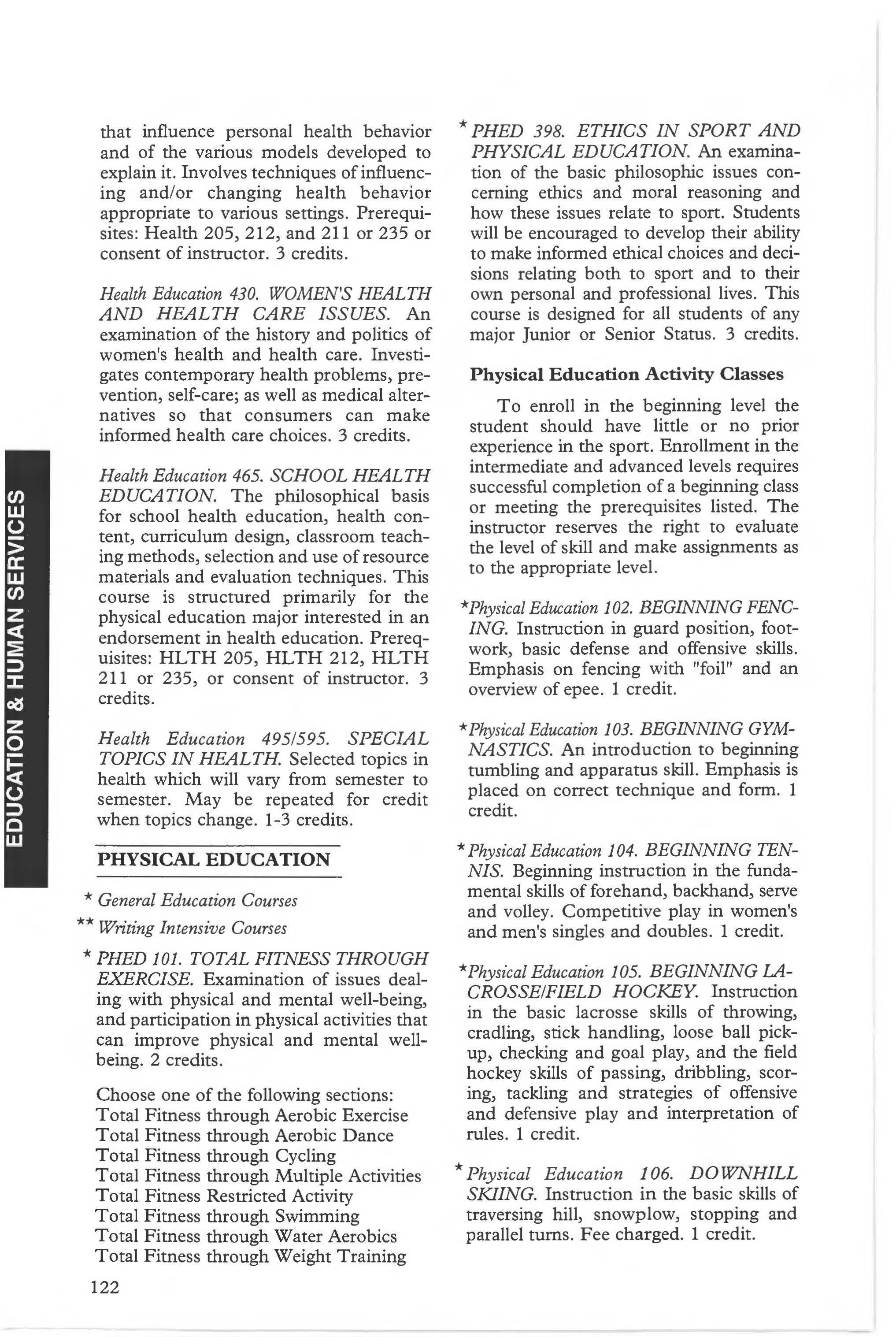
Health Education 465. SCHOOL HEALTH EDUCATION. The philosophical basis for school health education, health content, curriculum design, classroom teaching methods, selection and use of resource materials and evaluation techniques. This course is structured primarily for the physical education major interested in an endorsement in health education. Prerequisites: HLTH 205, HLTH 212, HLTH 211 or 235, or consent of instructor. 3 credits.
Health Education 495/595. SPECIAL TOPICS IN HEALTH. Selected topics in health which will vary from semester to semester. May be repeated for credit when topics change. 1-3 credits.
* General Education Courses
** Writing Intensive Courses
* PHED 101. TOTAL FITNESS THROUGH EXERCISE. Examination of issues dealing with physical and mental well-being, and participation in physical activities that can improve physical and mental wellbeing. 2 credits.
Choose one of the following sections:
Total Fitness through Aerobic Exercise
Total Fitness through Aerobic Dance
Total Fitness through Cycling
Total Fitness through Multiple Activities
Total Fitness Restricted Activity
Total Fitness through Swimming
Total Fitness through Water Aerobics
Total Fitness through Weight Training
* PHED 398. ETHICS IN SPORT AND PHYSICAL EDUCATION. An examination of the basic philosophic issues concerning ethics and moral reasoning and how these issues relate to sport. Students will be encouraged to develop their ability to make informed ethical choices and decisions relating both to sport and to their own personal and professional lives. This course is designed for all students of any major Junior or Senior Status. 3 credits.
To enroll in the beginning level the student should have little or no prior experience in the sport. Enrollment in the intermediate and advanced levels requires successful completion of a beginning class or meeting the prerequisites listed. The instructor reserves the right to evaluate the level of skill and make assignments as to the appropriate level.
*Physical Education 102. BEGINNING FENCING. Instruction in guard position, footwork, basic defense and offensive skills. Emphasis on fencing with "foil" and an overview of epee. 1 credit.
*Physical Education 103. BEGINNING GYMNASTICS. An introduction to beginning tumbling and apparatus skill. Emphasis is placed on correct technique and form. 1 credit.
* Physical Education 104. BEGINNING TENNIS. Beginning instruction in the fundamental skills of forehand, backhand, serve and volley. Competitive play in women's and men's singles and doubles. 1 credit.
*Physical Education 105. BEGINNING LACROSSE/FIELD HOCKEY. Instruction in the basic lacrosse skills of throwing, cradling, stick handling, loose ball pickup, checking and goal play, and the field hockey skills of passing, dribbling, scoring, tackling and strategies of offensive and defensive play and interpretation of rules. 1 credit.
* Physical Education 106. DOWNHILL SKIING. Instruction in the basic skills of traversing hill, snowplow, stopping and parallel turns. Fee charged. 1 credit.
* Physical Education 107. BEGINNING BOWLING. Beginning instruction in the fundamentals of approach, release, arm swing, picking up spares, methods in scoring, rules, and etiquette on the lanes. Interclass competition with handicaps. 1 credit.
* Physical Education 108. BEGINNING GOLF. Beginning instruction in techniques in putting, short approach shots, and the full swing with irons and woods. Course includes rules and etiquette of golf. Students play at the Longwood Golf Course. 1 credit.
* Physical Education 109. BEGINNING VOLLEYBALL. Instruction in the basic skills of serving, bump, dig, set and spike. Team defensive and offensive strategies and rules are included. 1 credit.
* Physical Education 110. NON-SWIMMING. Emphasis on physical and mental adjustment to the water through basic swimming and rescue skills. Prerequisites: uncomfortable in water and unable to swim one width of the pool. 1 credit.
* Physical Education 111. BEGINNING SWIMMING. Development of the five (5) basic strokes and basic rescue skills. Prerequisites: able to swim a width of the pool on the front and back, but uncomfortable in deep water. 1 credit.
* Physical Education 113. BEGINNING SYNCHRONIZED SWIMMING. Instruction in rhythmic swimming, figures and sculling techniques. Performance of basic routine to music. 1 credit.
* Physical Education 114. BEGINNING SCUBA DIVING. Instruction to scuba diving skills in preparation for open water dives and certification. (Fee charge.) 1 credit.
* Physical Education 117. BEGINNING CANOEING. Basic river paddling skills in canoeing culminating in river trip(s) in class I and class II white water. 1 credit.
* Physical Education 120. BEGINNING RACQUETBALL. Basic skills and rules of the sport applied to the games of sin
gles, doubles, and 3 player racquetball. 1 credit.
*Physical Education 121. BEGINNING ARCHERY. Instruction in the basic skills of bracing and embracing the bow, stance, grip, bow arm, nocking, drawing and anchoring, and aiming. Emphasis on fundamental skills and shooting form. 1 credit.
* Physical Education 122. BASKETBALL. Instruction in the fundamentals of individual and team offensive and defensive skills and their applications to the game of basketball. The rules and basic officiating techniques are incorporated. 1 credit.
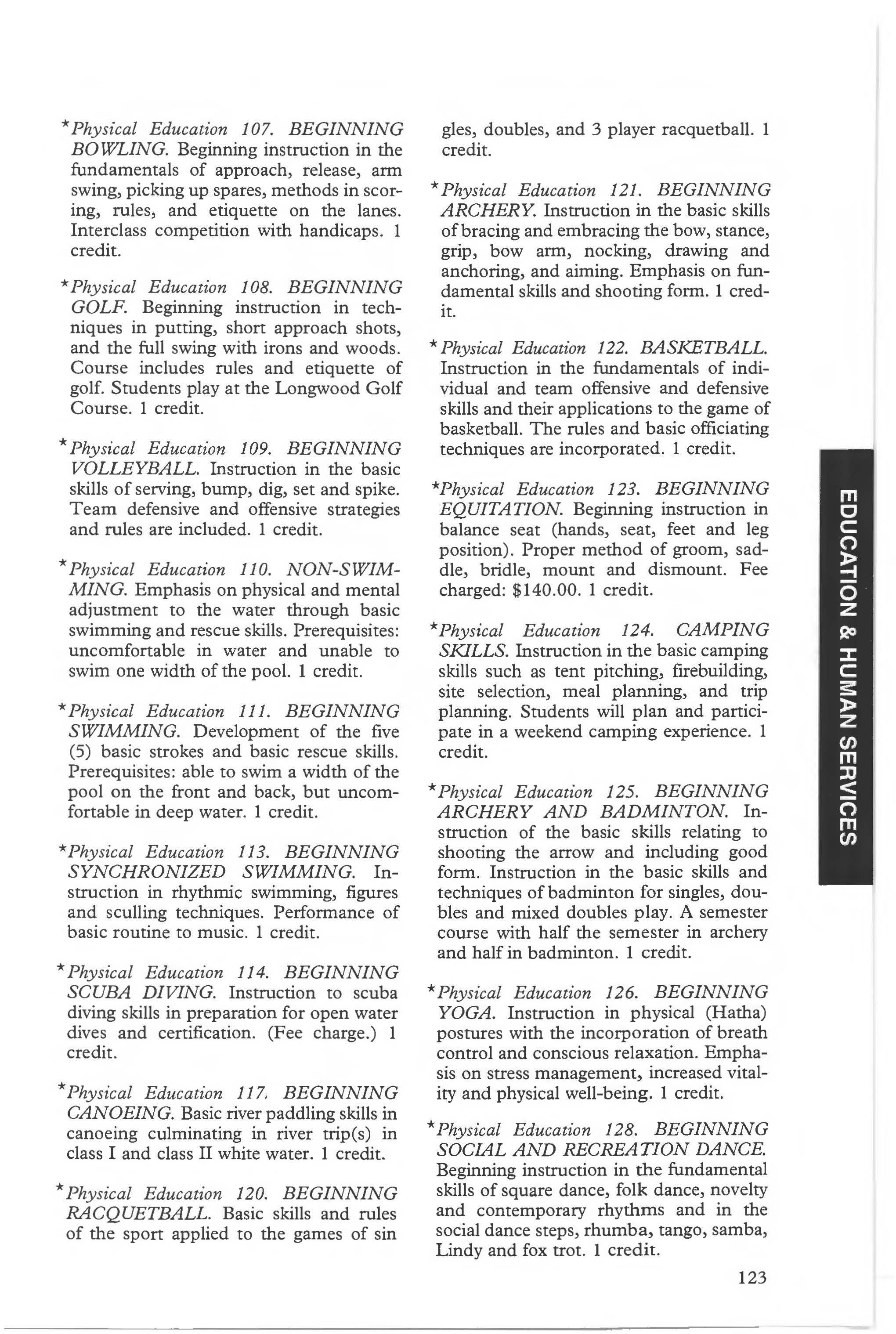
*Physical Education 123. BEGINNING EQUITATION. Beginning instruction in balance seat (hands, seat, feet and leg position). Proper method of groom, saddle, bridle, mount and dismount. Fee charged: $140.00. 1 credit.
*Physical Education 124. CAMPING SKILLS. Instruction in the basic camping skills such as tent pitching, firebuilding, site selection, meal planning, and trip planning. Students will plan and participate in a weekend camping experience. 1 credit.
* Physical Education 125. BEGINNING ARCHERY AND BADMINTON. Instruction of the basic skills relating to shooting the arrow and including good form. Instruction in the basic skills and techniques of badminton for singles, doubles and mixed doubles play. A semester course with half the semester in archery and half in badminton. 1 credit.
* Physical Education 126. BEGINNING YOGA. Instruction in physical (Hatha) postures with the incorporation of breath control and conscious relaxation. Emphasis on stress management, increased vitality and physical well-being. 1 credit.
*Physical Education 128. BEGINNING SOCIAL AND RECREATION DANCE. Beginning instruction in the fundamental skills of square dance, folk dance, novelty and contemporary rhythms and in the social dance steps, rhumba, tango, samba, Lindy and fox trot 1 credit.
* Physical Education 129. (Dance 129). BEGINNING BALLET. Dance techniques that evolved over the past five centuries, combined with freer contemporary techniques. It includes barre work: plie, tendu, rood de jambe; center combinations: glissade, assemble; and combinations across the floor: saute and soutenu. 1 credit.
*Physical Education 130. (Dance 130). BEGINNING JAZZ. Dance style based on a combination of African and European influences which has developed into the dance form seen on Broadway, film and television. Basic skills include stretching exercises for strength and flexibility, isolations and syncopated movements such as rib isolation, kicks, jump turns, and jazz runs. 1 credit.
*Physical Education 131. (Dance 131). BEGINNING MODERN DANCE. Instruction in creative or interpretive dance utilizing specific stretching exercises and movement such as leaps, walks, bends, and turns. Emphasis on performing short dances and creating dances which can be performed with or without music. 1 credit.
Physical Education 133. (Dance 133). BALLROOM AND SOCIAL DANCE. Introduces the student to the steps, rhythms, and body positions that are fundamental to ballroom and social dances. Dances that will be taught include, but are not limited to the following: waltz, fox trot, cha-cha-cha, tango, rumba, shag, and electric slide. 1 credit.
* Physical Education 136. INTERNA TIONAL FOLK DANCE. Performance of dances from selected countries and early American culture, and an examination of the influence of the culture upon a country's folk dance and costume. 1 credit.
* Physical Education 137. ORIENTEERING. Fundamental skills for traveling outdoors by map, compass, and observation, and an introduction to orienteering as a competitive cross country sport. 1 credit.
*Physical Education 140. WINDSURFING. Introduction to windsurfing, including how to select equipment, rig and care for the board, points of sail, nomenclature and safety. Practical experience will include basic sailing skills--tacking, jibing, beating, reaching and running--and manipulating the rig in and out of water. Prerequisite: able to swim 100 yards. 1 credit.
* Physical Education 202. INTERMEDIATE FENCING. Review of the basic skills. Emphasis on competitive fencing. 1 credit.
*Physical Education 204. INTERMEDIATE TENNIS. Instruction in spin serve, lob and advanced drive placement. Emphasis on singles and doubles playing strategies. 1 credit.
*Physical Education 207. INTERMEDIATE BOWLING. Emphasis on improving the basic skills and introduction of the hook delivery. Prerequisites: women--bowl an average of 120; men--bowl an average of 135. 1 credit.
*Physical Education 208. INTERMEDIATE GOLF. Review of the use of irons, woods and putting. Emphasis on special golf shots, including: sand shots, shots from the rough, uneven lies, and playing from hazards. Prerequisites: score 90 or lower for 18 holes. 1 credit.
* Physical Education 209. INTERMEDIATE VOLLEYBALL. Review of the basic skills, offenses and defenses, strategies and rules. Instruction in intermediate to advance play and skills. 1 credit.

* Physical Education 211. INTERMEDIATE SWIMMING. Instruction designed to improve skill in mastery of five basic strokes, water safety skills and diving. Prerequisites: able to swim the length of the pool using three (3) different strokes. 1 credit.
* Physical Education 213. INTERMEDIATE SYNCHRONIZED SWIMMING. Junior level synchronized 'swimming. Figures and choreography of a routine. Prerequisite: pass screening test. 1 credit.
*Physical Education 214. ADVANCED OPEN SCUBA AND CORAL REEF ECOLOGY. Held on Atlantic coral reefs leading to certification in Advanced Open Water (PADI) and Reef Ecology (YMCA). Prerequisite : ten (10) logged dives. (Fee charge.) 2 credits.
* Physical Education 217. INTERMEDIATE CANOEING. Development of river paddling skills such as peel out, surfing, ferring, and eddy turns on class II and class III white water. 1 credit.
* Physical Education 223. INTERMEDIATE EQUITATION Instruction in the fundamentals of position and control with emphasis on security with the walk, trot, and canter. Basic hunter exercises of circles, turns, transition and cross-country riding. (Fee charge.) 1 credit.
*Physical Education 224. OUTDOOR SKILLS Develop the technical skills and knowledge necessary for participation in back country trips, backpacking, rappelling, rock climbing, orienteering, equipment, clothing and first aid. Prerequisite: Beginning Camping or permission of instructor . 2 credits.
* Physical Education 228. INTERMEDIATE SOCIAL AND RECREATION DANCE Advanced instruction in square dance, folk dance, novelty and contemporary rhythms and in the social dance steps. Prerequisite: permission of the instructor. 1 credit.
*Physical Education 229. (Dance 229). INTERMEDIATE BALLET Emphasis on improving ballet skills and on allowing further opportunities for creating and learning dances. 1 credit.
*Phys i cal Education 230. (Dance 230). INTERMEDIATE JAZZ. Emphasis on improving jazz dance skills and on allowing further opportunities for creating and learning dances. 1 credit.
*Physical Education 231. (Dance 231). INTERMEDIATE MODERN DANCE. Emphasis on improving modem dance skills and on allowing further opportunities for creating and learning dances. 1 credit.
The following activity courses do not satisfy general education, but may be taken as electives.
Physical Education 112. WATER AEROBICS. Exercising in the water to music for the purpose of improving muscular strength, flexibility, slimness and especially aerobic fitness as well as overall swimming ability 1 credit. A student who has completed Total Fitness through Water Aerobics may not take PHED 112.
Physical Education 116. BEGINNING WEIGHT TRAINING. An introductory course with emphasis on current issues dealing with weight training. The student will learn and workout with various weight training programs and apply the principles to his/her individual workouts. The course employs basic techniques in proper lifting with safety procedures involved. 1 credit A student who has completed Total Fitness through Weight Training may not take PHED 116.
Physical Education 118. CYCLING. An introductory activity course with emphasis upon the history and development of the modem bicycle, selection and properly fitting the bicycle to the rider, development of good riding skills, maintenance of the bicycle and knowledge and adherence to correct safety procedures. The class emphasizes the fitness and leisure application of cycling. 1 credit. A student who has completed Total Fitness through Cycling may not take PHED 118.
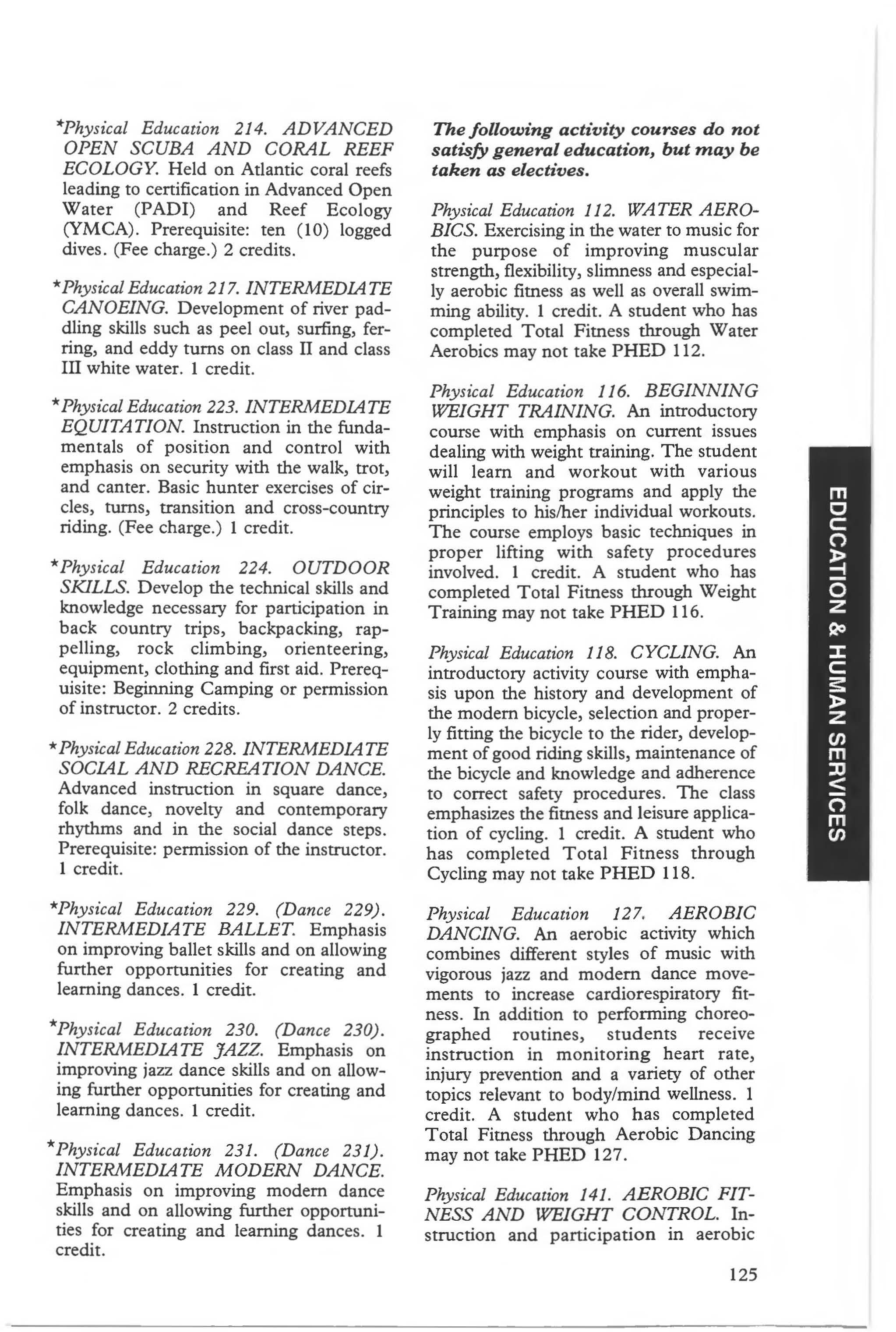
Physical Education 12 7. AEROBIC DANCING. An aerobic activity which combines different styles of music with vigorous jazz and modern dance movements to increase cardiorespiratory fitness. In addition to performing choreographed routines, students receive instruction in monitoring heart rate, injury prevention and a variety of other topics relevant to body/mind wellness. 1 credit. A student who has completed Total Fitness through Aerobic Dancing may not take PHED 127.
Physical Education 141. AEROBIC FITNESS AND WEIGHT CONTROL. Instruction and participation in aerobic
exercises and their relationship to personal health, physical fitness and weight control. 1 credit. A student who has completed Total Fitness through Aerobic Exercise may not take PHED 141.
Physical Education 212. LIFEGUARDING AND EMERGENCY WATER SAFETY. Instruction in lifesaving, first aid, CPR and lifeguard techniques leading to certification by the American Red Cross. Prerequisite: pass screening test. 2 credits.
Physical Education 216. ADVANCED WEIGHT TRAINING. Knowledge of the basic fundamentals and further training in athletic preparation, power lifting, body building and fitness/figure control. 1 credit.
Physical Education 241. ADVANCED AEROBICS. Instruction and participation in aerobic activities for students with good cardiovascular endurance. The emphasis is on long distance training and its effect on the body systems. 1 credit.
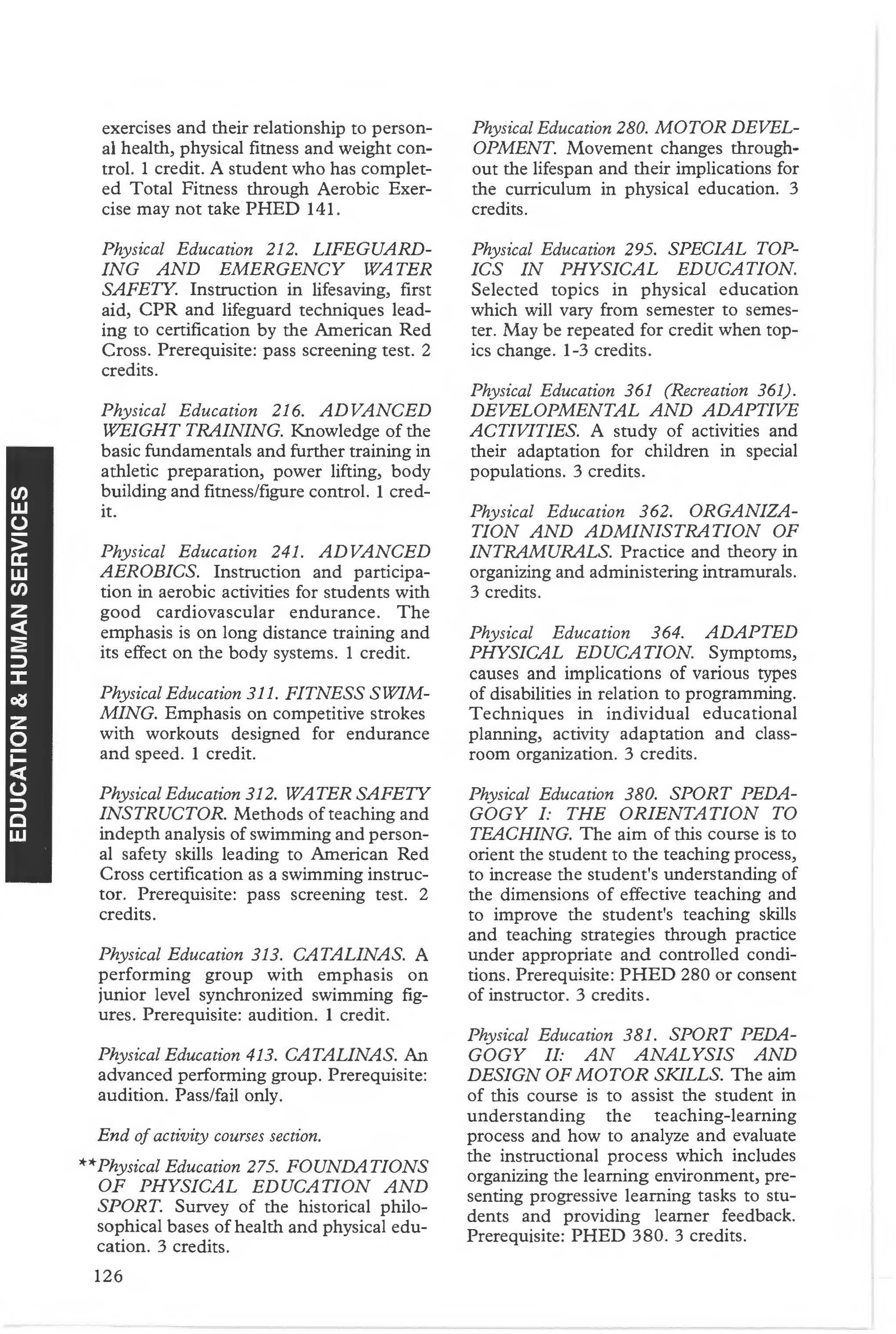
Physical Education 311. FITNESS SWIMMING. Emphasis on competitive strokes with workouts designed for endurance and speed. 1 credit.
Physical Education 312. WATER SAFETY INSTRUCTOR. Methods of teaching and indepth analysis of swimming and personal safety skills leading to American Red Cross certification as a swimming instructor. Prerequisite: pass screening test. 2 credits.
Physical Education 313. CATALINAS. A performing group with emphasis on junior level synchronized swimming figures. Prerequisite: audition. I credit.
Physical Education 413. CATALINAS. An advanced performing group. Prerequisite: audition. Pass/fail only.
End of activity courses section.
**Physical Education 275. FOUNDATIONS OF PHYSICAL EDUCATION AND SPORT. Survey of the historical philosophical bases of health and physical education. 3 credits.
Physical Education 280. MOTOR DEVELOPMENT. Movement changes throughout the lifespan and their implications for the curriculum in physical education. 3 credits.
Physical Education 295. SPECIAL TOPICS IN PHYSICAL EDUCATION. Selected topics in physical education which will vary from semester to semester. May be repeated for credit when topics change. 1-3 credits.
Physical Education 361 (Recreation 361). DEVELOPMENTAL AND ADAPTIVE ACTIVITIES. A study of activities and their adaptation for children in special populations. 3 credits.
Physical Education 362. ORGANIZATION AND ADMINISTRATION OF INTRAMURALS. Practice and theory in organizing and administering intramurals. 3 credits.
Physical Education 364. ADAPTED PHYSICAL EDUCATION. Symptoms, causes and implications of various types of disabilities in relation to programming. Techniques in individual educational planning, activity adaptation and classroom organization. 3 credits.
Physical Education 380. SPORT PEDAGOGY I: THE ORIENTATION TO TEACHING. The aim of this course is to orient the student to the teaching process, to increase the student's understanding of the dimensions of effective teaching and to improve the student's teaching skills and teaching strategies through practice under appropriate and controlled conditions. Prerequisite: PHED 280 or consent of instructor. 3 credits.
Physical Education 381. SPORT PEDAGOGY II: AN ANALYSIS AND DESIGN OF MOTOR SKILLS. The aim of this course is to assist the student in understanding the teaching-learning process and how to analyze and evaluate the instructional process which includes organizing the learning environment, presenting progressive learning tasks to students and providing learner feedback. Prerequisite: PHED 380. 3 credits.
Physical Education 382. SPORT PEDAGOGY III: CURRICULUM DEVELOPMENT AND APPLICATION IN PHYSICAL EDUCATION. This course is designed to orient the student in the process of curriculum construction in physical education for both the elementary and secondary school programs; to provide the student with experiences in teaching and in systematic observation and analysis of teaching. Prerequisites: PHED 380, 381. 3 credits.
Physical Education 385. SPORT PSYCHOLOGY. An examination of the psychological dimensions which influence an athlete's skill acquisition and performance in the competitive environment. 3 credits.
**Physt'cal Education 386. KINESIOLOGY. Study of human motion, including structural and mechanical kinesiology with emphasis on anatomic and biomechanical principles, application of these principles in the analysis of human motion--basic neuromuscular skills, sports, dance and all physical education activities. Practical application of biomechanics for teaching, coaching and physical medicine. Prerequisite: Biology 207. 3 credits.
Physical Education 387. PHYSIOLOGY OF EXERCISE. Lecture and laboratory experiences in the physiological responses of the body to the physical activity in everyday life and in sports. Prerequisites: Biology 206 and Biology 207. 3 credits.
Physical Education 388. FITNESS INTERNSHIP An 8-10 week supervised field experience (minimum of 320 clock hours). The internship will take place during the summer between the junior and senior years. To be eligible for participation the student must be of junior standing, enrolled in the fitness specialist option and have an overall GPA of 2.0. Prerequisite: PHED 387, 490. 8 credits.
Physical Education 390. ELEMENTARY SCHOOL HEALTH AND PHYSICAL EDUCATION. Health and physical education principles and activities for the elementary school. For elementary majors. 3 credits.
Physical Education 392. MECHANICAL AND PHYSIOLOGICAL PRINCIPLES OF SPORT AND EXERCISE. The physiological responses of the body to exercise and the mechanical principles of human movement. Designed for students other than physical education majors; physical education majors may not take this course. 3 credits.
Physical Education 393, 394, 395, 396. PRINCIPLES AND TECHNIQUES OF OFFICIATING. The study of current roles and practices in the techniques of officiating. (393-Field Hockey; 394-Gymnastics; 395-Volleyball; 396-Basketball) 1 credit.
** Physical Education 462. ORGANIZATION AND ADMINISTRATION OF HEALTH AND PHYSICAL EDUCATION PROGRAMS. Administrative theory applicable to a variety of settings including education, industry, health clubs, Y's. 3 credits.
Physical Education 463. EVALUATION IN HEALTH AND PHYSICAL EDUCATION. Practice and theory in evaluation of performance in health and physical education activities including physical fitness; skills and motor performance tests, grading procedures; body measurements; written tests; and classification of students. 3 credits.
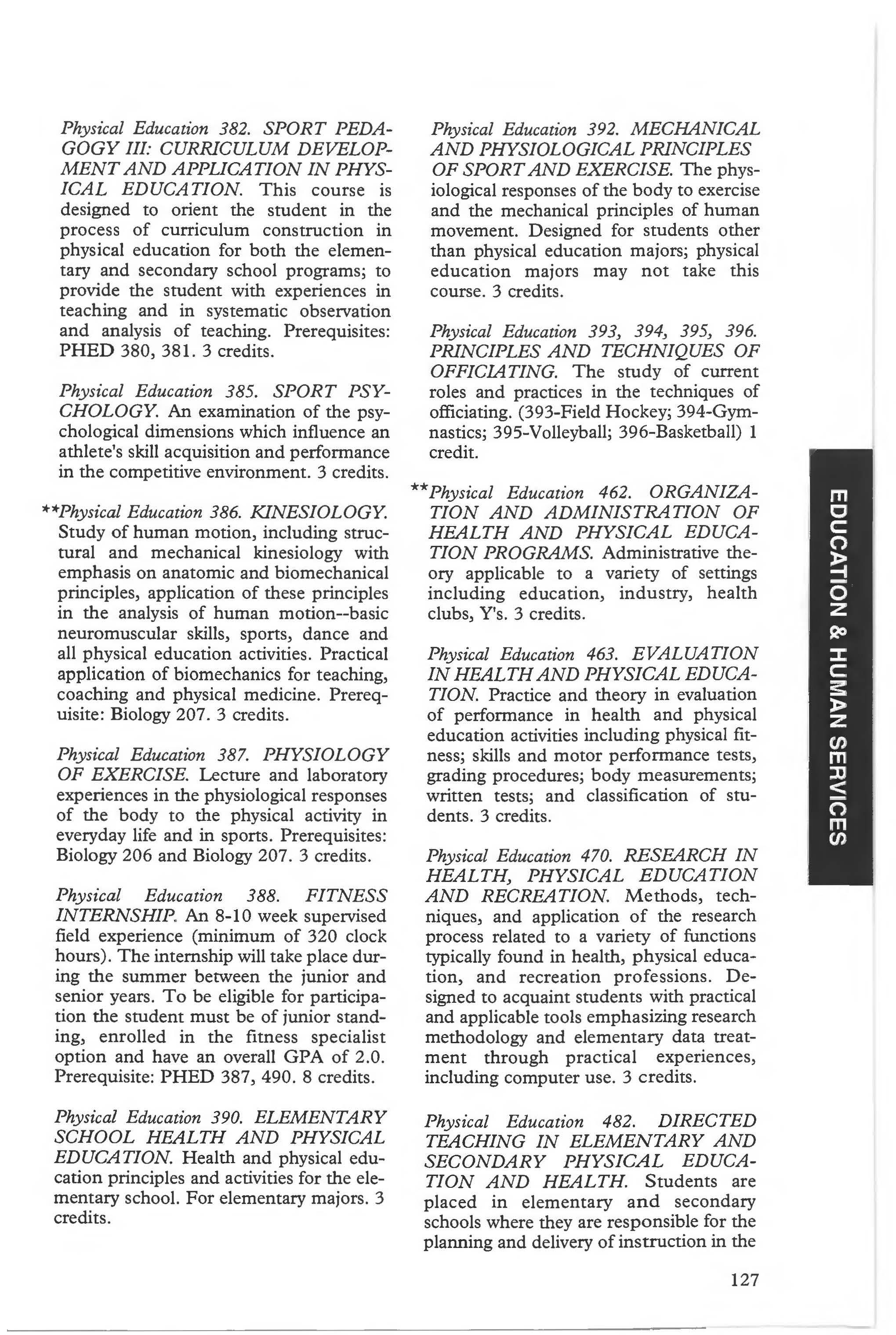
Physical Education 470. RESEARCH IN HEALTH, PHYSICAL EDUCATION AND RECREATION. Methods, techniques, and application of the research process related to a variety of functions typically found in health, physical education, and recreation professions. Designed to acquaint students with practical and applicable tools emphasizing research methodology and elementary data treatment through practical experiences, including computer use. 3 credits.
Physical Education 482. DIRECTED TEACHING IN ELEMENTARY AND SECONDARY PHYSICAL EDUCATION AND HEALTH. Students are placed in elementary and secondary schools where they are responsible for the planning and delivery of instruction in the
areas of health and physical education. 50% of the experience is spent at the elementary level (k-8) and 50% at the secondary level (8-12). The experience is directed by a cooperating teacher(s) and a Longwood College supervisor. Students are required to complete a minimum of 300 hours in the schools. Prerequisite: PHED 382; PHED 485. 10 credits.
Physical Education 483. SEMINAR IN TEACHING. A seminar to prepare students for student teaching and to evaluate ~e st_udent teaching experience. Emphasis will be placed on strengthening the teaching skills of the student as well as on relating teaching to societal and cultural factors. 2 credits.
** Physical Education 485. MOTOR LEARNING AND CONTROL. Processes and conditions influencing the acquisition and performance of motor skills. 3 credits.
Physical Education 488. AD VAN CED FITNESS CONCEPTS. An indepth, a?vanced study of selected topics in exercise and physical fitness. Emphasis is placed on a review of current literature and the development of various techniques for the evaluation of physical fitness. Prerequisites: PHED 386, 387 or permission of instructor. 3 credits.

Physical Education 490, 491. PRACTICUM. Supervised experience in one or n_iore of the following areas of the profess10nal curriculum: teaching, coaching, communication and fitness specialist. Credit & hours to be arranged. 6 credits maximum.
Physical Education 495/595. SPECIAL TOPICS IN PHYSICAL EDUCATION. Selected topics in physical education which will vary from semester to semester. May be repeated for credit when topics change. 1-3 credits.
Physical Education 496. COACHING INTERSCHOLASTIC AND INTERCOLLEGIATE ATHLETICS. A seminar course to include the following topics: the role of a~leti~s in the education setting, the organization and administration of athletics on the interscholastic and inter-
collegiate levels, the role of the teacher/coach, and special issues in athletics. 3 credits.
Physical Education 497J 498J 499. SPECIAL PROJECTS IN PHYSICAL EDUCATION. Independent study and research projects for qualified students. 1, 2, or 3 credits.
Physical Education 103-M. BEGINNING GYMNASTICS. An introduction to beginning tumbling and apparatus skill. Emphasis is placed on correct technique and form. 1 credit.
Physical Education 104-M. TENNIS. Instruction in the fundamental skills of forehand, backhand, serve and volley. Competitive play in women's and men's singles and doubles. 1 credit .
Physical Education I 05-M. LACROSSE/ FIELD HOCKEY. Instruction in the b~sic lacrosse skills of throwing, cradling, ~tick handling, loose ball pick-up, checkmg and goal play, and the field hockey skills of passing, dribbling, scoring, tackling and strategies of offensive and defensive play and interpretation of rules. 1 credit.
Physical Education 108-M. GOLF. Instruction in the techniques of putting, short approach shots and the full swing with irons and woods. Course includes rules and etiquette of golf. Students play at the Longwood Golf course. 1 credit.
Physical Education 109-M. VOLLEYBALL. Instruction in the basic skills of serving, ov~rhand and forearm passes, digs, and spikes and blocks. Team defensive and offensive strategies and testing are included. 1 credit.
Physical Education 115-M. FIELD SPORTS. An introductory course designed to understand the basics of soccer, speedball, and flag football. The basic individual technical skills, along with gaining an understanding of the rules are stressed. Individual and small group tactics are introduced. 1 credit.
Physical Education 116-M. WEIGHT TRAINING. An introductory course with emphasis on current issues dealing with weight training. The student will learn and workout with various weight training programs and apply the principles to his/her individual workouts. The course employs basic techniques in proper lifting with correct safety procedures involved. 1 credit.
Physical Education 122-M. BASKETBALL. Instruction in the fundamentals of individual and team offensive and defensive skills and their applications to the game of basketball. The rules and basic officiating techniques are incorporated. 1 credit.
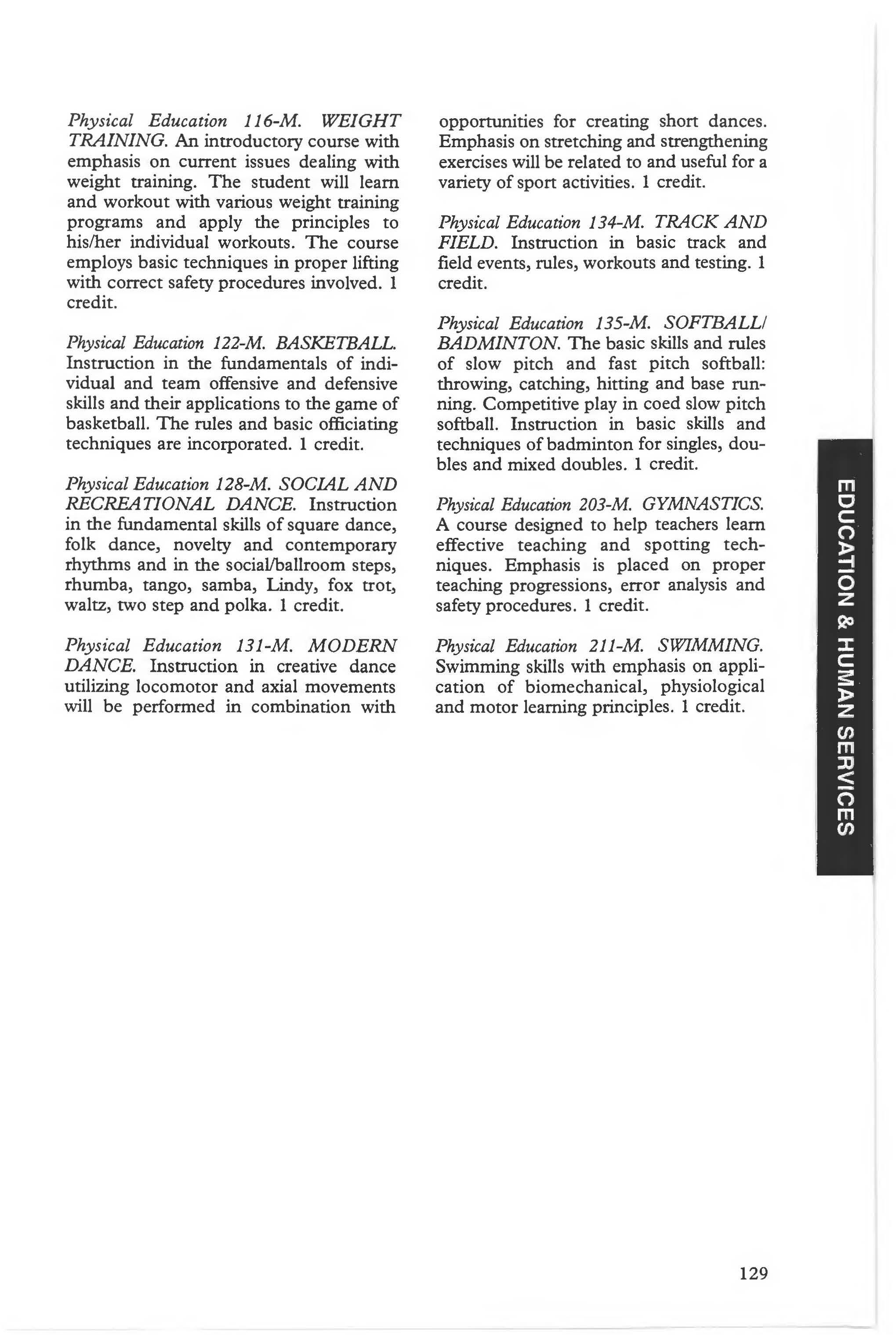
Physical Education 128-M. SOCIAL AND RECREATIONAL DANCE. Instruction in the fundamental skills of square dance, folk dance, novelty and contemporary rhythms and in the social/ballroom steps, rhumba, tango, samba, Lindy, fox trot, waltz, two step and polka. 1 credit.
Physical Education 131-M. MODERN DANCE. Instruction in creative dance utilizing locomotor and axial movements will be performed in combination with
opportumtles for creating short dances. Emphasis on stretching and strengthening exercises will be related to and useful for a variety of sport activities. 1 credit.
Physical Education 134-M. TRACK AND FIELD. Instruction in basic track and field events, rules, workouts and testing. 1 credit.
Physical Education 135-M. SOFTBALL/ BADMINTON The basic skills and rules of slow pitch and fast pitch softball: throwing, catching, hitting and base running. Competitive play in coed slow pitch softball. Instruction in basic skills and techniques of badminton for singles, doubles and mixed doubles. 1 credit.
Physical Education 203-M. GYMNASTICS. A course designed to help teachers learn effective teaching and spotting techniques. Emphasis is placed on proper teaching progressions, error analysis and safety procedures. 1 credit.
Physical Education 211-M. SWIMMING. Swimming skills with emphasis on application of biomechanical, physiological and motor learning principles. 1 credit.
Patricia A. Shank, Ph.D., Associate Professor of Therapeutic Recreation and Area Coordinator Rena A. Koesler, Ph.D., Associate Professor Therapeutic Recreation and Program Coordinator
Susan E. Lynch, Ph.D., Assistant Professor Therapeutic Recreation
Therapeutic Recreation is an allied-health profession that utilizes recreation and leisure experiences to assist people with various disabilities in developing and maintaining a personally meaningful leisure lifestyle which encompasses functional independence, health and well-being. Through specific therapy, leisure education, and recreation participation, therapeutic recreation is practiced in a variety of clinical and community settings such as: rehabilitation and general medical facilities; mental health and psychiatric facilities for children and adults; substance treatment programs; corrections; specialized and outdoor programs for adjudicated youth; long-term and day-care facilities and nursing homes; residences for individuals with developmental disabilities, and in community recreation and park agencies.
Longwood's nationally accredited and recognized Therapeutic Recreation Program provides students with a comprehensive foundation in leisure theory and an in-depth concentration in disability studies and therapeutic recreation principles and practices. Students graduate with a Bachelor of Science degree in Therapeutic Recreation which prepares them for many entry-level positions.
Academic course work is complemented with 120 hours of preliminary fieldwork and two professionally supervised internship experiences which may be completed in a variety of agencies and locations. Students must maintain a minimal GPA of 2.0 overall and a 2.25 in the major in order to be eligible for pre-professional practice.
Upon graduation, students become eligible to sit for the national certification exam through the National Council for Therapeutic Recreation Certification (NCTRC).
A. General Education Core Requirement. 33 credits. See General Education Requirements listed on pages 61-63
B. Additional Degree Requirements. 10 credits.
BIOLOGY 206/4 credits
CMSC 156/3 credits
PSYCHOLOGY 221/3 credits
C. Major Requirements.
RECR 110/3 credits
RECR 111/3 credits
RECR 205/3 credits
RECR 300/1 credit
RECR 301/3 credits
RECR 303/3 credits
RECR 304/3 credits
RECR 305/3 credits
RECR 308/3 credits
RECR 370/3 credits
RECR 380**/8 credits
RECR 410/3 credits
RECR 437/3 credits
RECR 470/3 credits
RECR 490**/14 credits
HLTH 260/3
BIOLOGY 207 /4 credits
PSYCH 356/3 credits
TOTAIJ69 credits
**Must have a 2.0 overall and 2.25 in major courses
D. Professional Electives: 11 credits
E. Total Credits Required for~ Degree in Therapeutic Recreation
123
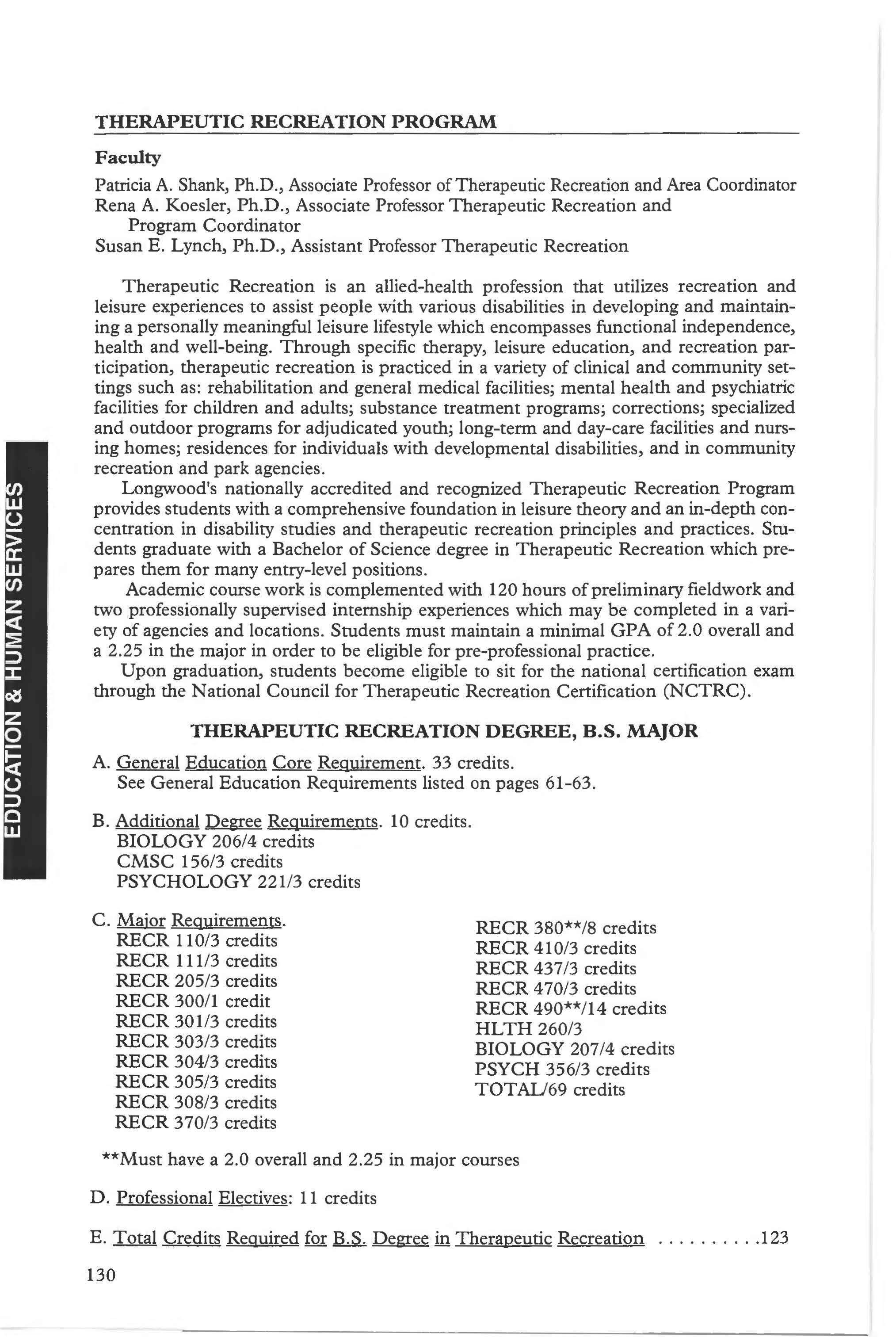
*General Education Course
** Writing Intensive Courses
*Recreation 425 ETHICS IN HEALTH AND HUMAN SERVICES. An introduction to ~thical theo~es, principles, concepts and issu 7s that rmpact and/or guide human service professions . Particular emphasis is placed on analyses of ethical issues and r~solution of dilemmas, and interpretat~on and implications of various professional codes of ethics. 1 credit.
Recreation 110. INTRODUCTION TO THERAPEUTIC RECREATION. History, philosophy, rationale for service and overvie~ of the profession of therapeutic recre~uon ; survey of disabilities, and overview of therapeutic recreation settings and employment opportunities. 3 credits.
Recreation 111. INTRODUCTION TO LEISURE SERVICE DELIVERY. The history and development of the recreation profession, concepts of leisure, definitions of recreation, theories of play, and the role of r~creation and leisure in society. Provid_ers of leisure services and general ~peratlonal aspects of various organizations and agencies are investigated. 3 credits .
Recreation 205. RECREATION LEADERSHIP AND ACTIVITY. The development of creative leadership skills, methods_, and techniques that can be applied in vanous recreational settings through the use of social and informal recreational activities. 3 credits.
Recreation 206 INTRODUCTION TO ~MERICAN SIGN LANGUAGE. A pracu~al study of the history, origin and techmqu~s of American Sign Language (ASL) and its application in a variety of settings providing services to members of the deaf community. 3 credits.
Recreation 207. INTERMEDIATE AMERICAN SIGN LANGUAGE. Provide students with additional American Sign Language structure, and sign language vocabulary Emphasizes linguistic aspects of ASL, including classifiers, syntax, loca-
tives, placement, and various sentence ~es. Develops skill in expressive/receptive use of language. Prerequisite RECR 206. 3 credits.
Recreation 237. EXPERIENTIAL AND OUTDOOR EDUCATION PROGRAMMIN(!. Planning, organizing, and implementing outdoor recreation, outdoor education, and camping programs. The responsibilities and characteristics of a leader in various camp/outdoor settings are investigated 3 credits

Recreation 295. SPECIAL TOPICS IN RECREATION Selected topics in recreation which will vary from semester to semester. May be repeated for credit when topics change. 1-3 credits.
Recreation 300. PRE-INTERNSHIP SEMINAR. Designed to prepare students for internship experiences . Includes emphasis on professional behavior, self-assessment strategies, identification of potential internship sites, goal setting, resume preparation, interview processes and internship site selection. 1 credit.
Recreation 301. THERAPEUTIC RECREATION IN MENTAL HEALTH SETTINGS An exploration of sociocultural and psycho dynamic dimensions of mental health and mental illness and the preventative and restorative functions of therapeutic recreation and leisure education processes. Primary focus includes characteristics of mental health; recognition and amelioration of symptom and illness expressions; TR assessment and intervention strategies, and setting-related issues and terminology. 3 credits .
Recreation 302. THERAPEUTIC RECREATION AND DEVELOPMENTAL DISABILITIES. An overview of the nature and etiology of selected developmental disabilities with specific focus on mental retardation. The role of recreation and leisure experiences is explored particularly as these relate to the development and acquisition of play and social behaviors. The application of assessment, task analysis, and behavior modification principles and techniques are expected course outcomes . Course is open to non-majors. 3 credits.
Recreation 303. THERAPEUTIC RECREATION AND PERSONS WITH PHYSICAL DISABILITIES. In-depth study of predominant physical disabilities and implications for therapeutic recreation intervention. Includes focus on specific rehabilitation and habilitation services, activities and technologies; overview of competitive and recreational sport adaptations; legislation and safety issues; and recreation and support organizations for people who are physically challenged. 3 credits.
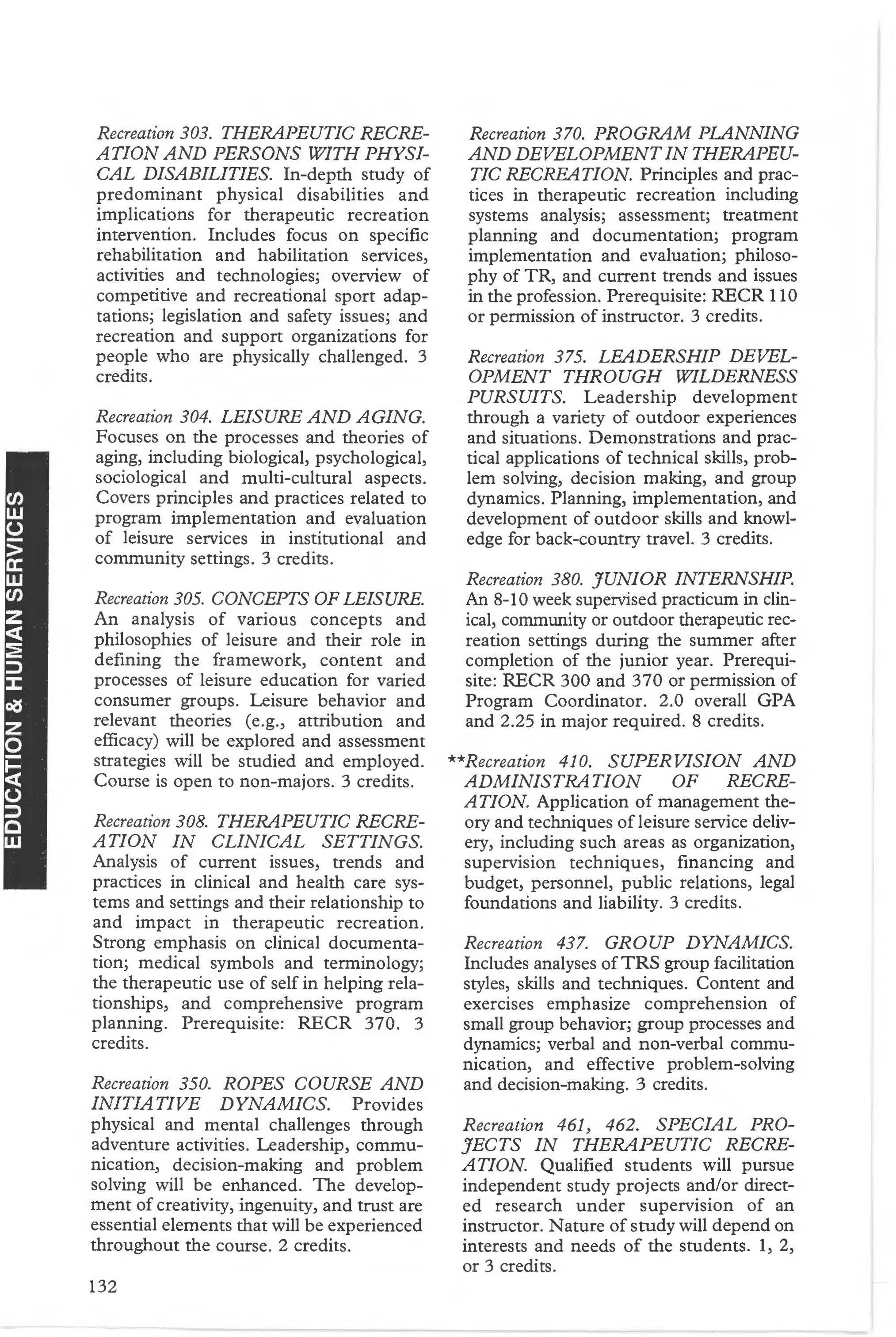
Recreation 304. LEISURE AND AGING. Focuses on the processes and theories of aging, including biological, psychological, sociological and multi-cultural aspects. Covers principles and practices related to program implementation and evaluation of leisure services in institutional and community settings. 3 credits.
Recreation 305 CONCEPTS OF LEISURE. An analysis of various concepts and philosophies of leisure and their role in defining the framework, content and processes of leisure education for varied consumer groups. Leisure behavior and relevant theories (e.g., attribution and efficacy) will be explored and assessment strategies will be studied and employed. Course is open to non-majors. 3 credits.
Recreation 308. THERAPEUTIC RECREATION IN CLINICAL SETTINGS. Analysis of current issues, trends and practices in clinical and health care systems and settings and their relationship to and impact in therapeutic recreation. Strong emphasis on clinical documentation; medical symbols and terminology; the therapeutic use of self in helping relationships, and comprehensive program planning. Prerequisite: RECR 370. 3 credits.
Recreation 350. ROPES COURSE AND INITIATIVE DYNAMICS. Provides physical and mental challenges through adventure activities. Leadership, communication, decision-making and problem solving will be enhanced. The development of creativity, ingenuity, and trust are essential elements that will be experienced throughout the course. 2 credits.
Recreation 370. PROGRAM PLANNING AND DEVELOPMENT IN THERAPEUTIC RECREATION. Principles and practices in therapeutic recreation including systems analysis; assessment; treatment planning and documentation; program implementation and evaluation; philosophy of TR, and current trends and issues in the profession. Prerequisite: RECR 110 or permission of instructor. 3 credits.
Recreation 375. LEADERSHIP DEVELOPMENT THROUGH WILDERNESS PURSUITS. Leadership development through a variety of outdoor experiences and situations. Demonstrations and practical applications of technical skills, problem solving, decision making, and group dynamics. Planning, implementation, and development of outdoor skills and knowledge for back-country travel. 3 credits.
Recreation 380 JUNIOR INTERNSHIP. An 8-10 week supervised practicum in clinical, community or outdoor therape\ltic recreation settings during the summer after completion of the junior year. Prerequisite: RECR 300 and 370 or permission of Program Coordinator. 2.0 overall GPA and 2.25 in major required. 8 credits.
**Recreation 410. SUPERVISION AND ADMINISTRATION OF RECREA TJON. Application of management theory and techniques of leisure service delivery, including such areas as organization, supervision techniques, financing and budget, personnel, public relations, legal foundations and liability. 3 credits.
Recreation 437. GROUP DYNAMICS. Includes analyses ofTRS group facilitation styles, skills and techniques. Content and exercises emphasize comprehension of small group behavior; group processes and dynamics; verbal and non-verbal communication, and effective problem-solving and decision-making. 3 credits.
Recreation 461, 462. SPECIAL PROJECTS IN THERAPEUTIC RECREATION. Qualified students will pursue independent study projects and/or directed research under supervision of an instructor. Nature of study will depend on interests and needs of the students. 1, 2, or 3 credits.
** Recreation 470. RESEARCH IN HEALTH, PHYSICAL EDUCATION AND RECREATION. Methods, techniques, and application of the research process related to a variety of functions typically found in health, physical education, and recreation professions. Designed to acquaint students with practical and applicable tools emphasizing research methodology and elementary data treatment through practical experiences, including computer use. 3 credits.
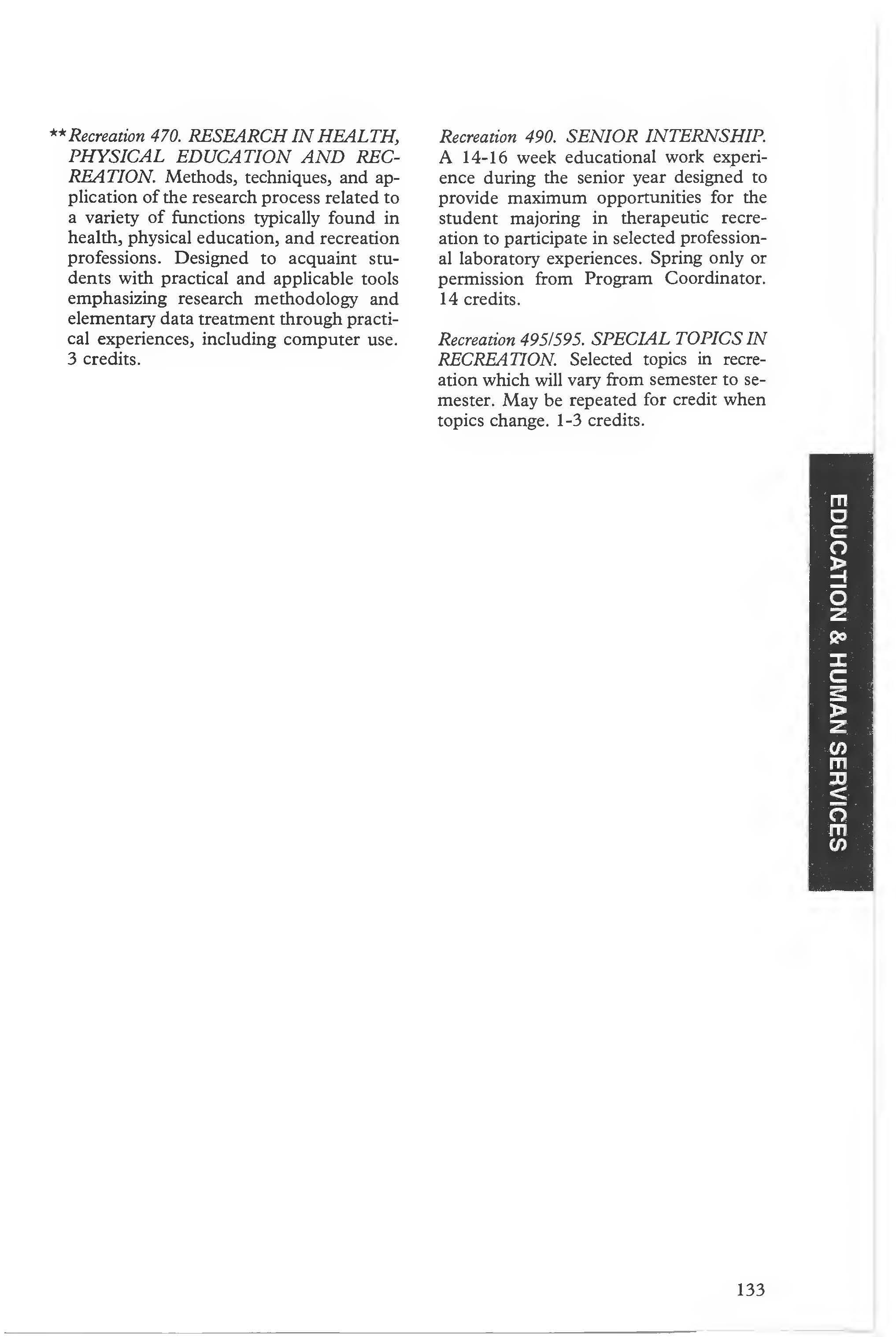
Recreation 490. SENIOR INTERNSHIP. A 14-16 week educational work experience during the senior year designed to provide maximum opportunities for the student majoring in therapeutic recreation to participate in selected professional laboratory experiences. Spring only or permission from Program Coordinator. 14 credits.
Recreation 495/595. SPECIAL TOPICS IN RECREATION. Selected topics in recreation which will vary from semester to semester. May be repeated for credit when topics change. 1-3 credits.
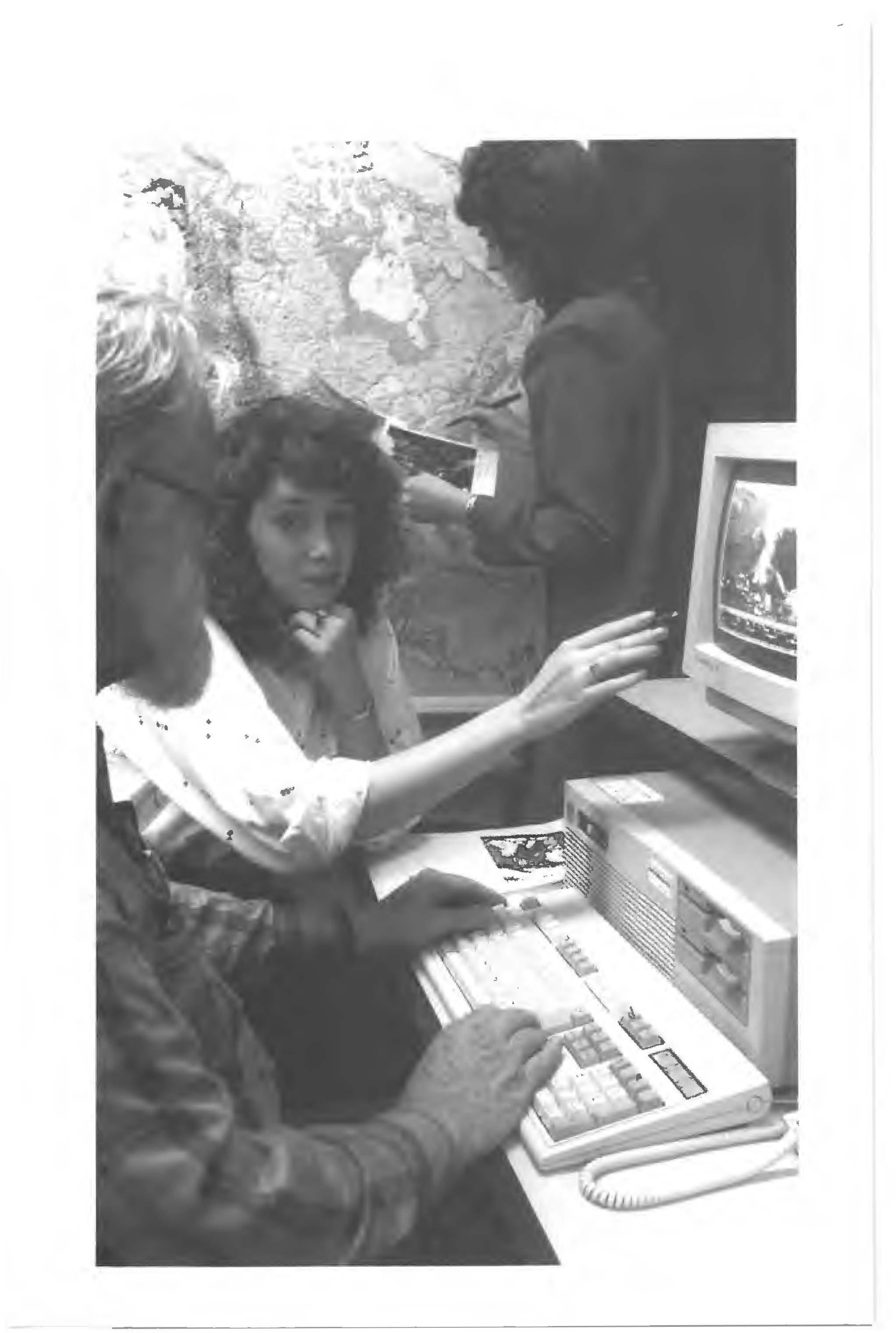
Jennifer M Apperson, Ph.D. , Interim Dean Room 153, Ruffner Hall
Cynthia Thompson, Executive Secretary
General Studies
International Studies Liberal Studies Women's Studies

Departments
Department of Art Department of English, Philosophy and Modem Languages
Department of History and Political Science Department of Mathematics and Computer Science Department of Music Department of Natural Sciences Department of Psychology
Department of Sociology and Anthropology Department of Speech and Theatre
The major in general studies is administered through the School of Liberal Arts and Sciences. Any adult students who are interested in this degree should consult the General Studies coordinator in the office of the Dean of Liberal Arts and Sciences.
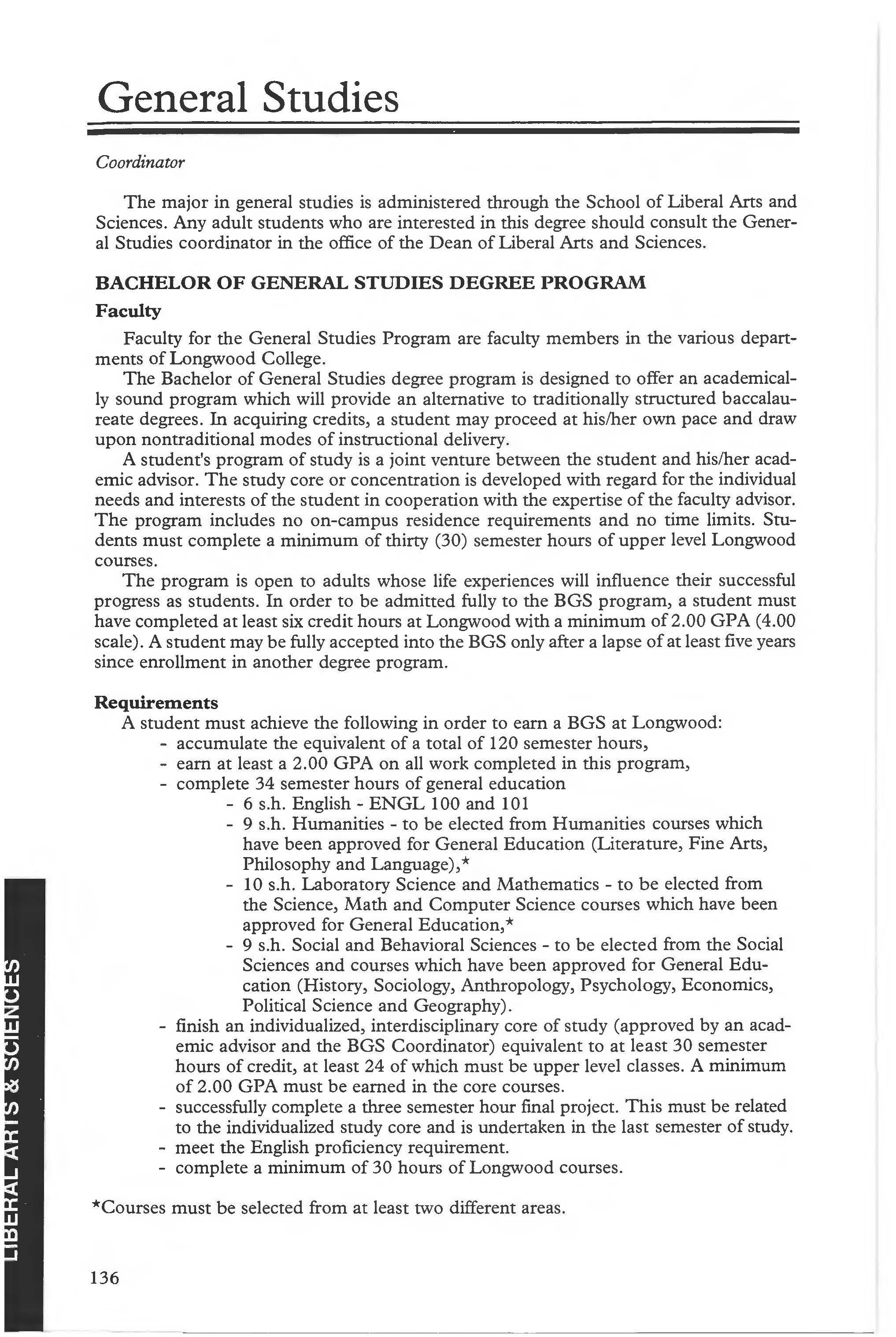
Faculty for the General Studies Program are faculty members in the various departments of Longwood College.
The Bachelor of General Studies degree program is designed to offer an academically sound program which will provide an alternative to traditionally structured baccalaureate degrees. In acquiring credits, a student may proceed at his/her own pace and draw upon nontraditional modes of instructional delivery.
A student's program of study is a joint venture between the student and his/her academic advisor. The study core or concentration is developed with regard for the individual needs and interests of the student in cooperation with the expertise of the faculty advisor. The program includes no on-campus residence requirements and no time limits. Students must complete a minimum of thirty (30) semester hours of upper level Longwood courses.
The program is open to adults whose life experiences will influence their successful progress as students. In order to be admitted fully to the BGS program, a student must have completed at least six credit hours at Longwood with a minimum of2.00 GPA (4.00 scale). A student may be fully accepted into the BGS only after a lapse of at least five years since enrollment in another degree program.
A student must achieve the following in order to earn a BGS at Longwood: accumulate the equivalent of a total of 120 semester hours, earn at least a 2.00 GPA on all work completed in this program, complete 34 semester hours of general education
6 s.h. English ENGL 100 and 101
9 s.h. Humanities to be elected from Humanities courses which have been approved for General Education (Literature, Fine Arts, Philosophy and Language),*
10 s.h. Laboratory Science and Mathematics to be elected from the Science, Math and Computer Science courses which have been approved for General Education,* 9 s.h. Social and Behavioral Sciences to be elected from the Social Sciences and courses which have been approved for General Education (History, Sociology, Anthropology, Psychology, Economics, Political Science and Geography). finish an individualized, interdisciplinary core of study (approved by an academic advisor and the BGS Coordinator) equivalent to at least 30 semester hours of credit, at least 24 of which must be upper level classes. A minimum of 2.00 GPA must be earned in the core courses. successfully complete a three semester hour final project. This must be related to the individualized study core and is undertaken in the last semester of study. meet the English proficiency requirement. complete a minimum of 30 hours of Longwood courses.
*Courses must be selected from at least two different areas.
John F. Reynolds, Ph.D., Director
Cindy Franklin, SecretaryLongwood offers an International Studies Program for those who wish to devote a part of their education to learning about societies other than their own; it aims to give the interested student an opportunity to supplement his/her academic major with a concentration of studies which will enhance an understanding of the larger world in which we must live and work.
Students wishing to participate in the program should sign up in the International Studies Office (G202).
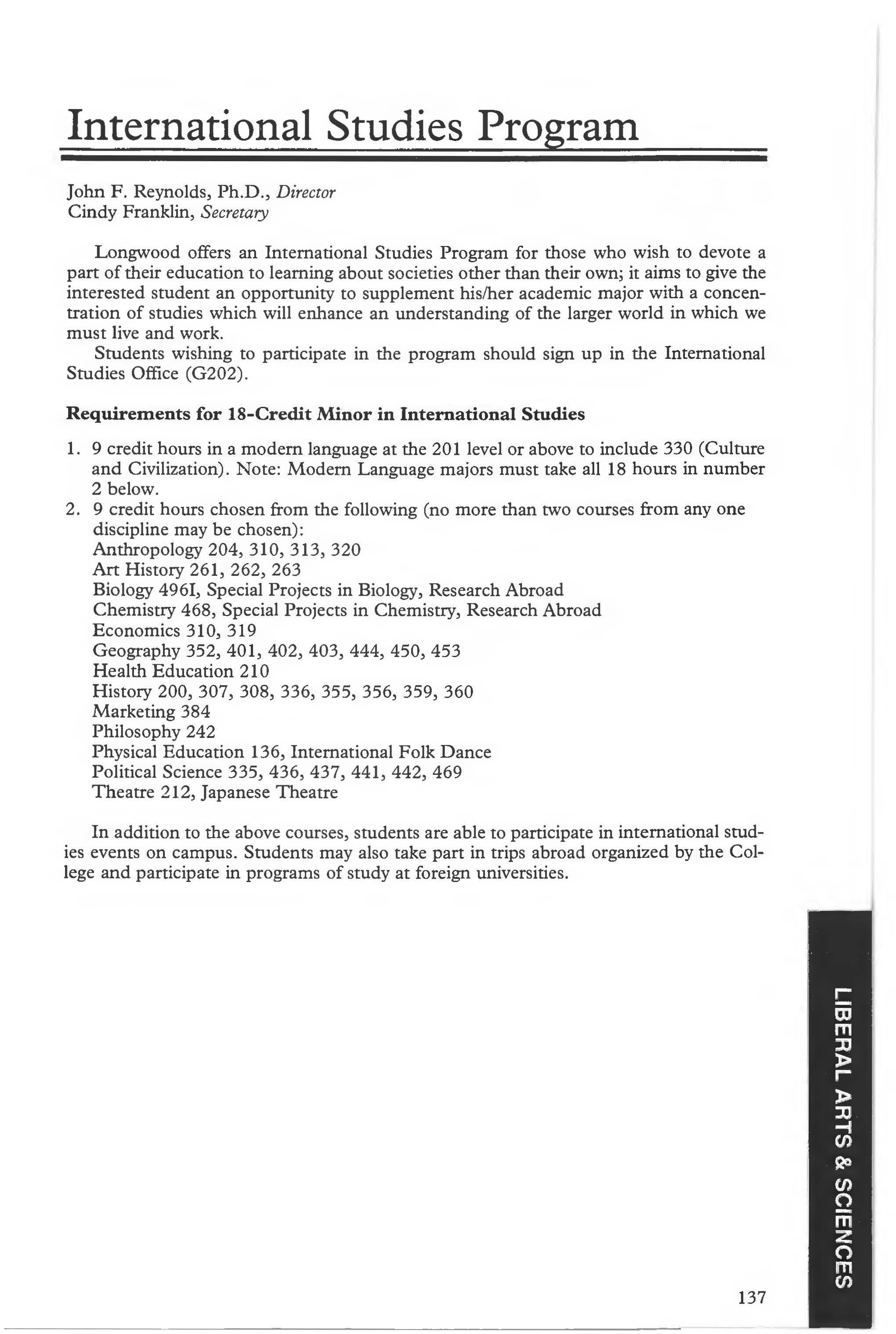
1. 9 credit hours in a modern language at the 201 level or above to include 330 (Culture and Civilization). Note: Modem Language majors must take all 18 hours in number 2 below.
2. 9 credit hours chosen from the following (no more than two courses from any one discipline may be chosen):
Anthropology 204, 310, 313, 320
Art History 261, 262, 263 Biology 4961, Special Projects in Biology, Research Abroad Chemistry 468, Special Projects in Chemistry, Research Abroad Economics 310, 319 Geography 352, 401, 402, 403, 444, 450, 453
Health Education 210 History 200, 307, 308, 336, 355, 356, 359, 360 Marketing 384 Philosophy 242
Physical Education 136, International Folk Dance Political Science 335, 436, 437, 441, 442, 469 Theatre 212, Japanese Theatre
In addition to the above courses, students are able to participate in international studies events on campus. Students may also take part in trips abroad organized by the College and participate in programs of study at foreign universities.
Advisory Committee: Dr. Ellery Sedgwick, Chair, Mr. James Curley, Dr. Douglas M. Dalton, Dr. James Gussett, Mr. Marshall Hall, Dr. Frank Howe, Dr. John Peale, Dr. Sue Shaw, Dr. Betty Jo Simmons, Dr. Patricia Whitfield
The Liberal Studies program has been developed primarily to prepare students to teach in the elementary and middle grades (N, K-8) or in Special Education. The major in Liberal Studies provides a solid background in the main areas taught in Elementary and Middle Schools: the social sciences, language arts, mathematics, and the sciences. Faculty from a variety of Arts and Sciences disciplines have worked with faculty from the School of Education to design the program and coordinate it with the sequence of education courses leading to N, K-8 and Special Education endorsement. The program is also intended to develop broadly informed individuals who understand contemporary issues, and will provide civic and professional leadership. Students not wishing to seek a teaching endorsement can complete the major by adding a minor in any Arts or Sciences discipline or in Economics.
While the Liberal Studies Major has been designed specifically for students seeking endorsement to teach all subjects, N, K-8 and is strongly recommended as the desirable route to obtain endorsement and an appropriately broad background, a major in one of the liberal arts is allowed also. Requirements for the B.A. or B.S. degrees, including Liberal Studies, are listed elsewhere in the Catalog. By carefully planning each semester's course work, students can use their electives to meet the requirements of the 40-credit elementary education program. This is the same as a double-major, which many college students select. After completing the degree and program requirements, students receive a B.A. or B.S. Degree and an endorsement to teach N, K-8.
The major in Liberal Studies is administered through the Office of the Dean of Liberal Arts and Sciences. Students interested in discussing or enrolling in the program should consult with the program coordinator, a member of the program advisory committee, or the Chair of the Education Department.
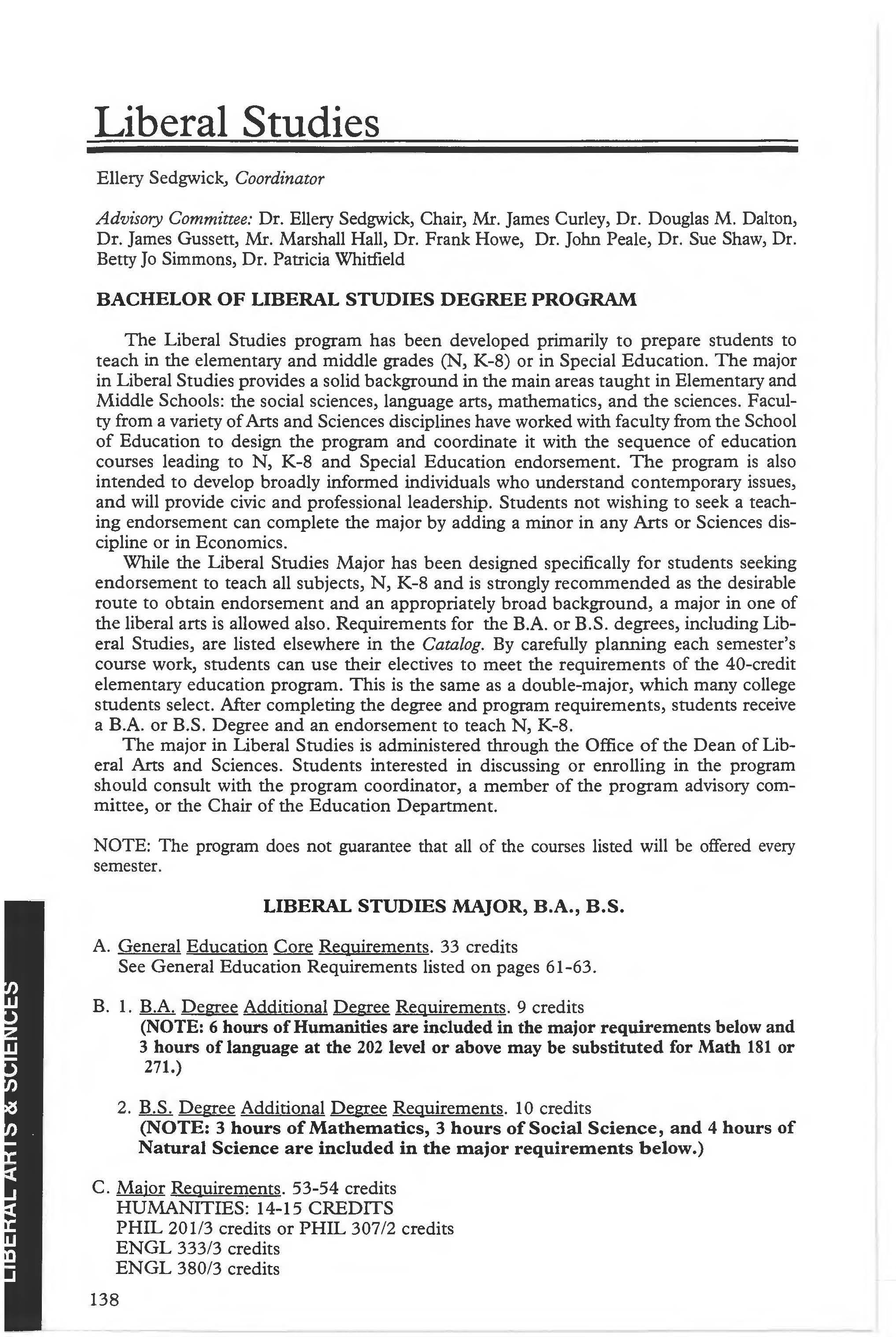
ENGL 382/3 credits
ENGL 483/3 credits
* Students not seeking an elementary school or special education endorsement will be required to take another 3 credit Humanities elective at the 300/400 level.
MATHEMATICS 12 CREDITS
* MATH 181/3 credits
* MATH 271 (or approved substitution)/3 credits MATH 313/3 credits
MATH 321/3 credits
*(Language 202: for B.A. students a modem language at the 202 level or above will be substituted for either MATH 181 or MATH 271)
NATURAL SCIENCES: 15 CREDITS
BIOL 112/4 credits
BIOL 113/4 credits
EASC 101/4 credits
EASC 364/3 credits
(CHEM 101 OR EASC 102 recommended for GOAL 5 of General Education)
SOCIAL SCIENCES: 12 CREDITS
POSC 150/3 credits
GEOG 241 or GEOG 352/3 credits
HIST 222 or 305 or 306/3 credits
SOCL: 320/3* credits
* Students not seeking an elementary school or special education endorsement will be required to take a Sociology elective at the 300/400 level.
D. Elementary Teaching Endorsement (for teaching all subjects), Grades N, K-8 40 credits. See professional education requirements listed on page 96-97.
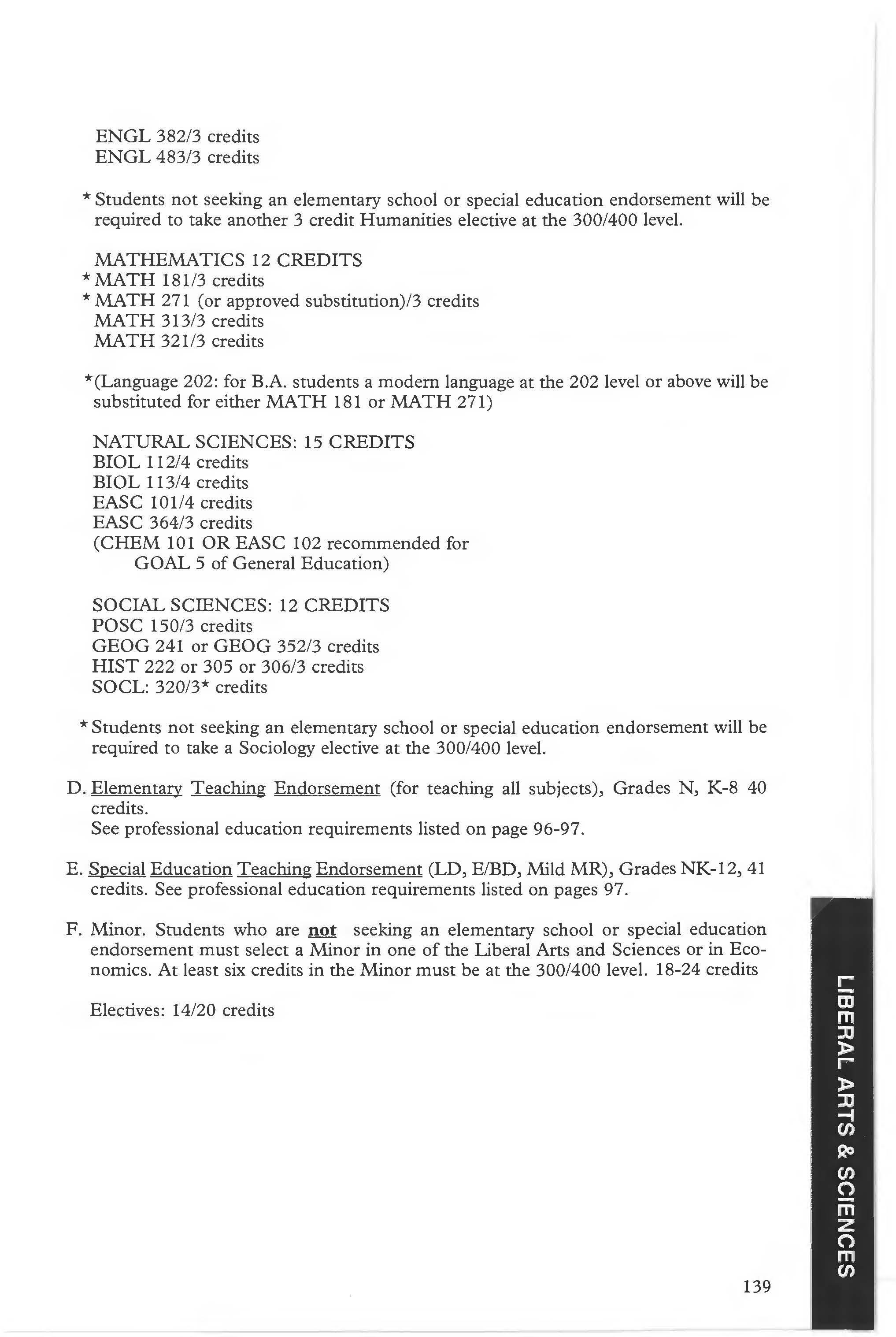
E. Special Education Teaching Endorsement (LD, E/BD, Mild MR), Grades NK-12, 41 credits. See professional education requirements listed on pages 97.
F. Minor. Students who are not seeking an elementary school or special education endorsement must select a Minor in one of the Liberal Arts and Sciences or in Economics. At least six credits in the Minor must be at the 300/400 level. 18-24 credits
Electives: 14/20 credits
Longwood offers a minor in Women's Studies for those students who wish to enhance their understanding of gender perspectives in the world in which we live and work. While reflecting the diversity of women's lives, the program will also examine the dynamics and interrelatedness of race, class, and gender categories.
Students wishing to minor in Women's Studies should sign up in the Hull Building, Room 227.
In order to complete a minor in Women's Studies, students must:
1. file a form of intention to pursue the minor with the Director of Women's Studies prior to registering for their sixth semester, 2. earn a grade point average of 2.0 in those courses chosen to meet the minor requirements, and 3. complete eighteen hours of course work as designated below:
Required Courses (6 credit hours): Anthropology 106 English 432
Elective in health, ethical, or equity issues (3 credit hours): Health Education 430 Philosophy 201
Electives, two of which must be taken at the 300 or 400 level (9 credit hours): Art 360 Social Work 405 Women's Studies 295 English 258 Social Work 485 Women's Studies 491 History 311 Sociology 325 Women's Studies 492 Psychology 350 Sociology 185 Women's Studies 495
(and other courses to be approved by the Women's Studies Committee) NOTE: A student may not count a course as fulfilling a requirement for both a major and a mmor.
In addition to the above courses, students are encouraged to participate in women's studies events on campus.
Women's Studies 295. SELECTED TOPICS. Selected topics in Women's Studies. The topics will vary from semester to semester. May be repeated for credit when topics change. 1-3 credits.
Women's Studies 491. SYMPOSIUM IN WOMEN'S STUDIES. Symposium programs sponsored by the Washington Center. Forty to 60 hours of lectures, panel discussions, workshops, site visits, and bi-weekly discussion groups over a 2 to 3 week period in Washington, D.C. Prerequisites: two courses in women's studies, 2.5 GPA, and approval of Director of Women's Studies. The work done in the Symposium will be evaluated by a faculty member designated by the Program Director, and cannot be "double-counted" at Longwood to meet requirements of other disciplines. 2-3 credits.
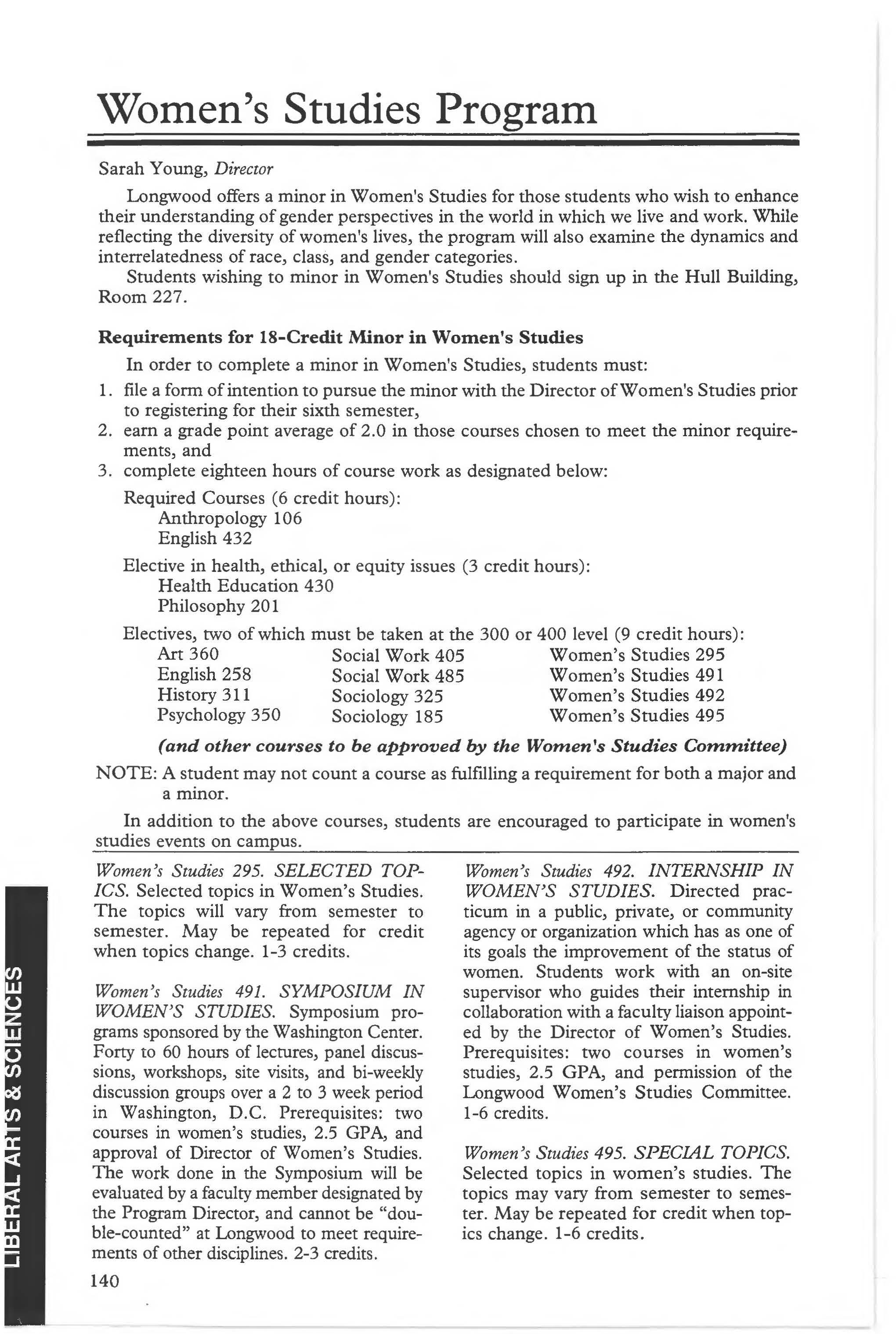
Women's Studies 492. INTERNSHIP IN WOMEN'S STUDIES. Directed practicum in a public, private, or community agency or organization which has as one of its goals the improvement of the status of women. Students work with an on-site supervisor who guides their internship in collaboration with a faculty liaison appointed by the Director of Women's Studies . Prerequisites: two courses in women's studies, 2.5 GPA, and permission of the Longwood Women's Studies Committee 1-6 credits.
Women's Studies 495. SPECIAL TOPICS. Selected topics in women's studies. The topics may vary from semester to semester. May be repeated for credit when topics change . 1-6 credits.
The Department of Art at Longwood College occupies the Bedford Art Building, one building in the Fine Arts Complex . The building contains eight multi-purpose studios; an outdoor work area, two exhibition galleries and an auditorium seating 176.
The Department of Art also provides aesthetic and cultural enrichment opportunities for the academic community through lectures, workshops and demonstrations by wellknown artists and art educators, presents exhibits of student and professional work in two galleries and offers opportunities for members of the community to take courses in studio art, art education and art history. The faculty also supports and encourages aesthetic and cultural opportunities, as well as programs sponsored by the Central Virginia Arts area affiliate of the Virginia Museum and Longwood Center for the Visual Arts.
*Mark S. Baldridge, M.F.A., Professor of Art John S. J. Burke, Ed.D., Associate Professor of Interior Architecture Randall W. Edmonson, M.F.A., Professor of Art Grace Norman, M.F .A., Associate Professor of Art Amie Oliver, M .F.A., Associate Professor of Art Homer L. Springer, Jr., M.Ed., Professor of Art
* On leave Spring Semester 1998
The primary educational objective of the Department of Art is to provide quality baccalaureate degree programs in art education, graphic design, interior architecture and the fine ans, with concentrations in art history or studio; to offer a variety of courses that fulfill general education requirements
While a foundation in art techniques, theory and art history is essential, creative expression and development of concepts, values and critical judgment are expected and encouraged. Students choose a field of specialization or concentation, form their own concepts and develop individual methods and directions. The Department of Art emphasizes the humanities and aesthetic judgment, the development of personal expression and the relationship of an in the nature of learning and human development essential for a liberal arts education.
The Department encourages students to be creative with ideas, techniques and materials in every aspect of their daily lives . We want our students to be knowledgeable about an history, current an activities, techniques, media, design, the value of an and its role in society and their own personal anistic direction. We expect our students to be productive, self-motivated and to develop discipline and responsibility concerning professional obligations and expectations in the workplace . Finally, we expect our students to be enlightened people, to be appreciative of life, to contribute to the well-being of others and society in general.
The Department also offers tailored programs of study for students who wish to minor in studio art or art history. Students interested in a minor in general art or art history should contact the chair for advising.
Every attempt has been made to state the major and minor requirements as clearly as possible However, it is strongly recommended that every student majoring or minoring maintain close communication with the academic advisor assigned in order to plan their program in a fashion best suited to the student's individual goals and needs. The faculty stands ready to assist any student in this regard.
Graduation requirements from the Art Depanment include passing two faculty/student assessment interviews (normally in the freshmen and sophomore years), participa-
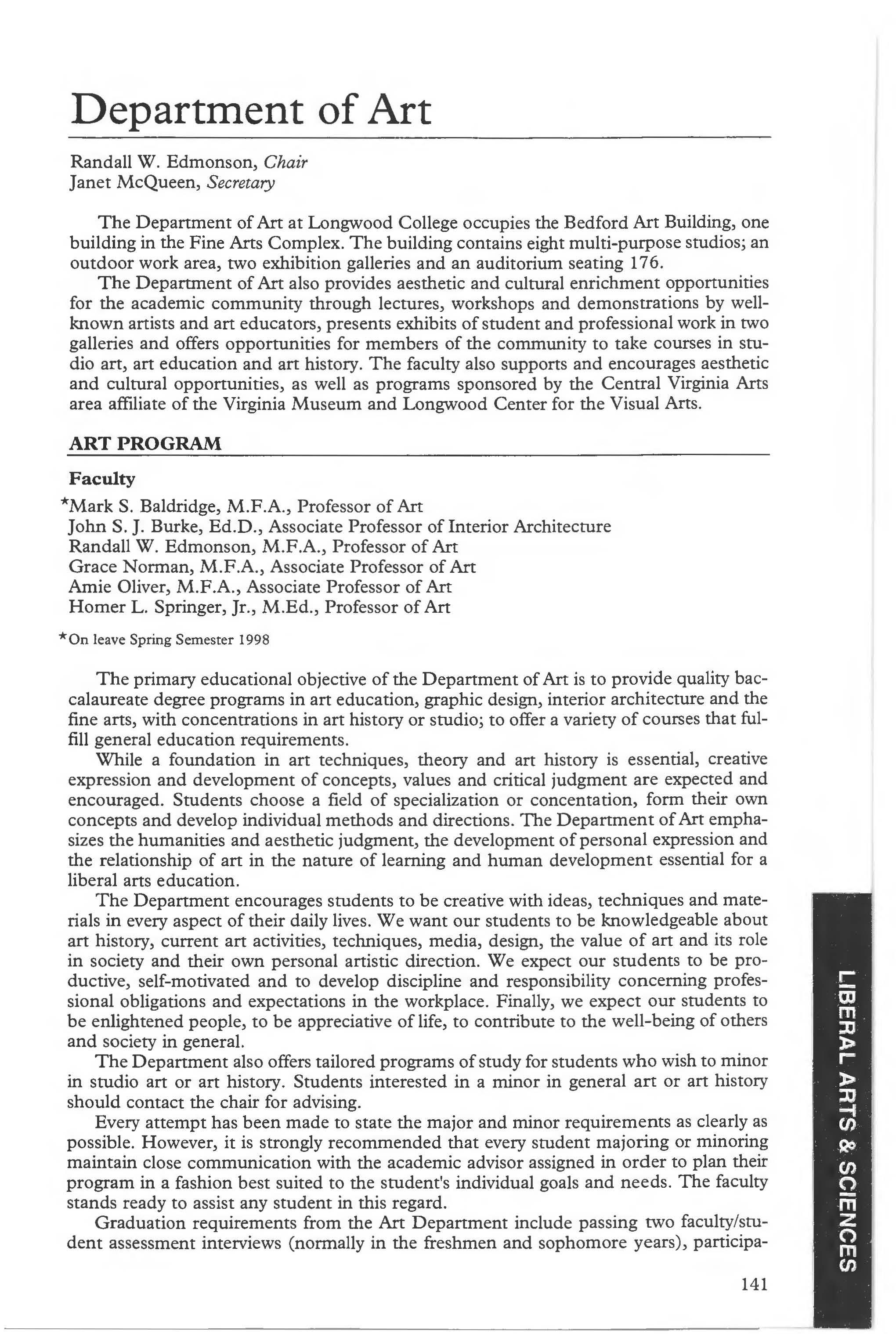
tion in the annual junior exhibit and a senior exhibition in the Showcase Gallery or a senior art history lecture. Any exception to these graduation requirements must be referred to the Department Chair. The student bears full responsibility for meeting all graduation requirements.
In addition, freshman majors are required to take a test registering their knowledge of art which will be repeated in their senior year. These requirements help to assess the effectiveness of the program and insure a quality and relevant education for our majors.
Field trips in some lecture and studio classes may involve a nominal cost for the students. Students are required to furnish all necessary supplies and some tools, however, many items are purchased with a studio fee which allows students to benefit from bulk purchases and also have the convenience of the materials being readily available. Fees range from $10 to $60, depending on the class and the materials supplied. A list of these fees is available from the Dean's Office and the Department of Art Office. Any student enrolled in an art class after the end of the "add period" must pay this fee. To avoid the fee, it is imperative that the student be officially withdrawn from the class prior to this deadline. This rule will be strictly enforced and no exceptions made since these funds must be spent early in the semester to insure the availability of student supplies for the classes. Students who withdraw after the deadline will have the option of obtaining their share of the purchased materials.
All art majors will receive a Bachelor of Fine Arts Degree. The General Education Requirements will be identical for each concentration. Art Department Requirements will vary slightly.
Art Education Concentration (Leading to Teacher Endorsement)
A. General Education Core Requirement. 33 credits. See General Education Requirements listed on pages 61-63.
B. Additional Degree Requirements. 9 credits. See Degree Requirements listed on pages 57-59.
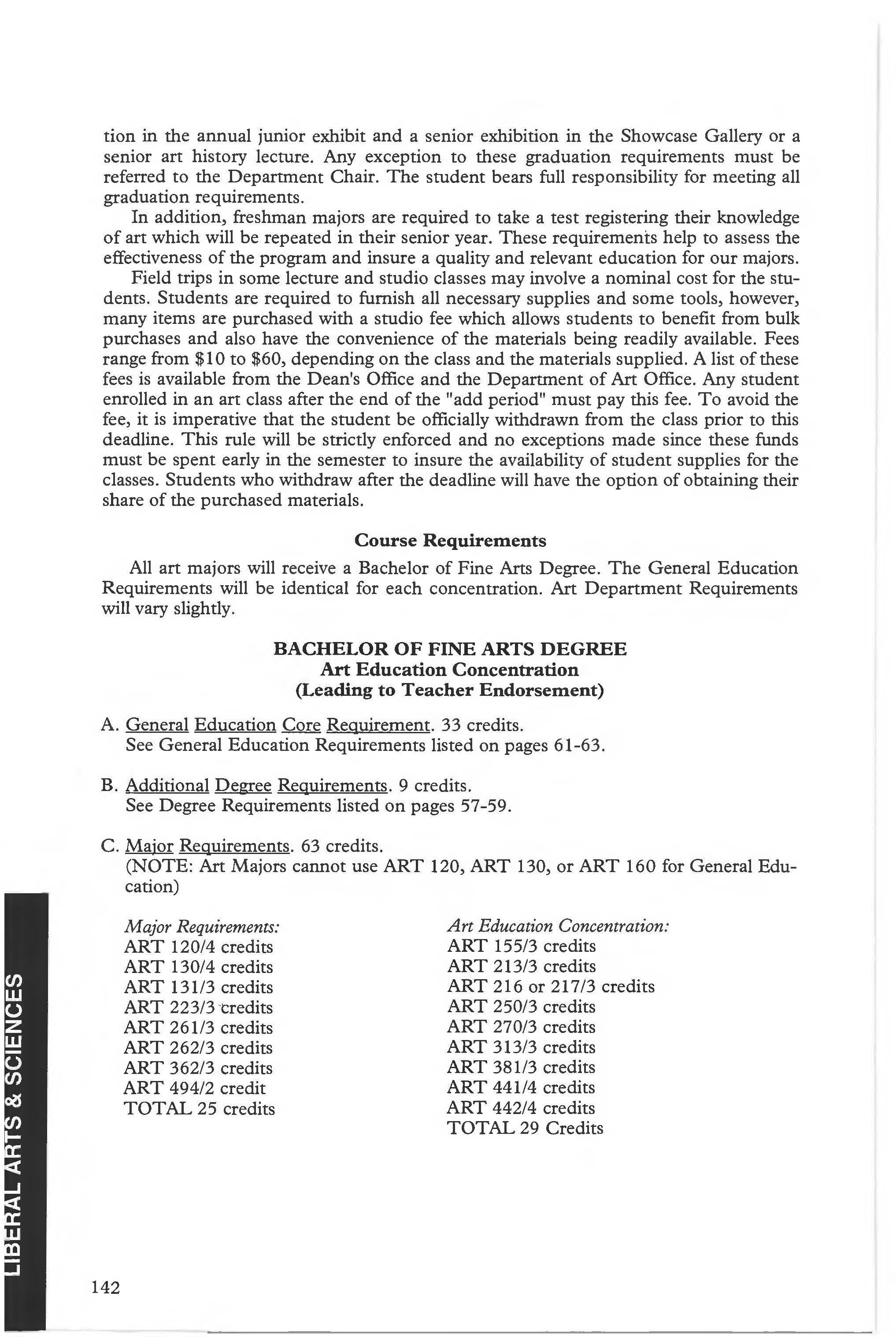
C. Major Requirements. 63 credits.
(NOTE: Art Majors cannot use ART 120, ART 130, or ART 160 for General Education)
Major Requirements:
ART 120/4 credits
ART 130/4 credits
ART 131/3 credits
ART 223/3 tredits
ART 261/3 credits
ART 262/3 credits
ART 362/3 credits
ART 494/2 credit
TOTAL 25 credits
Art Education Concentration:
ART 155/3 credits
ART 213/3 credits
ART 216 or 217/3 credits
ART 250/3 credits
ART 270/3 credits
ART 313/3 credits
ART 381/3 credits
ART 441/4 credits
ART 442/4 credits
TOTAL 29 Credits
Mini-concentration/9 credits: Choose 9 credit hours from any one category. All 9 credits must be from the same category.
ART HISTORY
ART 301 ART 302
ART 360
ART 361 ART 363 ART 364 ART 367 ART 369 ART 450
PAINTING
ART 271 ART 371 ART 471
CRAFTS
ART 110
ART 121 ART 214
ART 218
ART 224
ART 311 ART 324 ART 325 ART 406
ART 411 ART 412 ART 413 ART 414 ART 416 ART 419 ART 422
GRAPHIC DESIGN
ART 221 ART 225 ART 230 ART 322 ART 326 ART 327 ART 330 ART 355 ART 455
DRAWING& PRINTMAKING
ART 230 ART 251 ART 330 ART 351 ART430 ART 450
D. Teacher Endorsement Requirements. 12 credits.
EDUC 260 Intro to Teaching Profession. 1 credit
EDUC 245 Human Growth and Development. 3 credits
EDUC 480 Measurement and Evaluation Module. 1 credit
INTERIOR ARCHITECTURE
ART 101
ART 121 ART 230 ART 304 ART 306 ART404 ART 405
PHOTOGRAPHY
ART 155
ART 221 ART 251 ART 324 ART 330 ART 355 ART 455 ART 456
EDUC 484 Media and Computer Technology Module. 2 credits
EDUC 488 Educational Seminar. 1 credit
EDUC 490 Classroom Management. 2 credits
EDUC 491 Survey of Exceptional Children. 2 credits
*ART 441 Teaching Art in Secondary School. 3 credits
*ART 442 Teaching Art in Elementary School. 3 credits
E. Practicum Requirements. 10 credits.
*ART 441 Teaching Art in Secondary School. 1 credit
*ART 442 Teaching Art in Elementary School. 1 credit
EDUC 403 Student Teaching. 5 credits
EDUC 404 Student Teaching. 5 credits
*(Included in major requirements.)
F. General Electives: 1
G. Total credits required for B.F.A. with .!I. concentration in Art Education (Leading to Teacher Endorsement) ........................................ 128
A. General Education Core Requirements. 33 credits
See General Education Requirements listed on page 61-63.
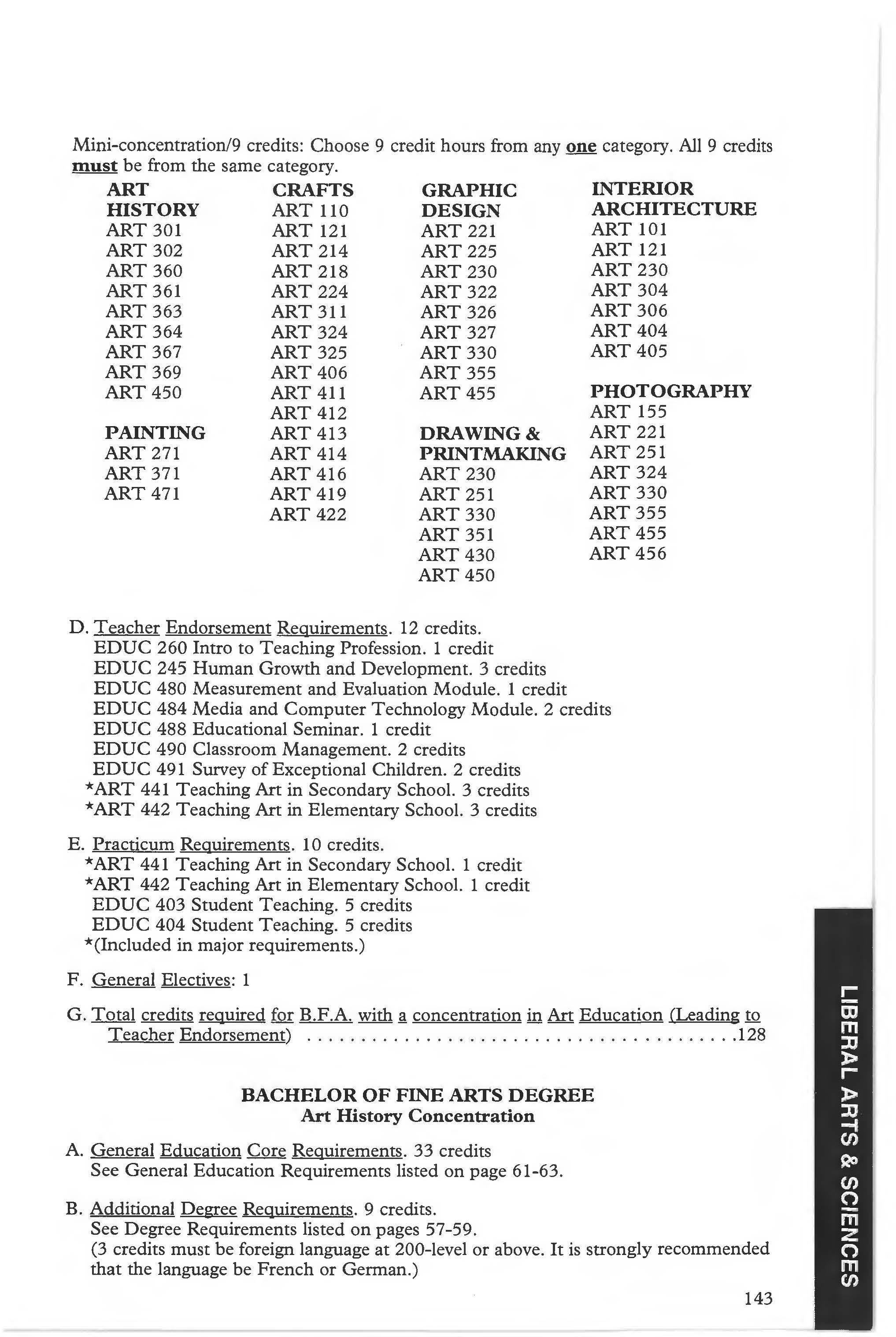
B. Additional Degree Requirements. 9 credits.
See Degree Requirements listed on pages 57-59. (3 credits must be foreign language at 200-level or above. It is strongly recommended that the language be French or German.)
C. Major Reguirements. 50 credits.
Major Requirements:
ART 120/4 credits
ART 130/4 credits
ART 131/3 credits
ART 155/3 credits
ART 223/3 credits
ART 270/3 credits
ART 261, 262/6 credits
Seven ART HISTORY courses at the 300 or 400 level/21 credits
ART 461/3 credits
TOTAL 50 credits
(NOTE: Art Majors cannot use ART 120, ART 130, or ART 160 for General Education.
D. General electives/34 credits
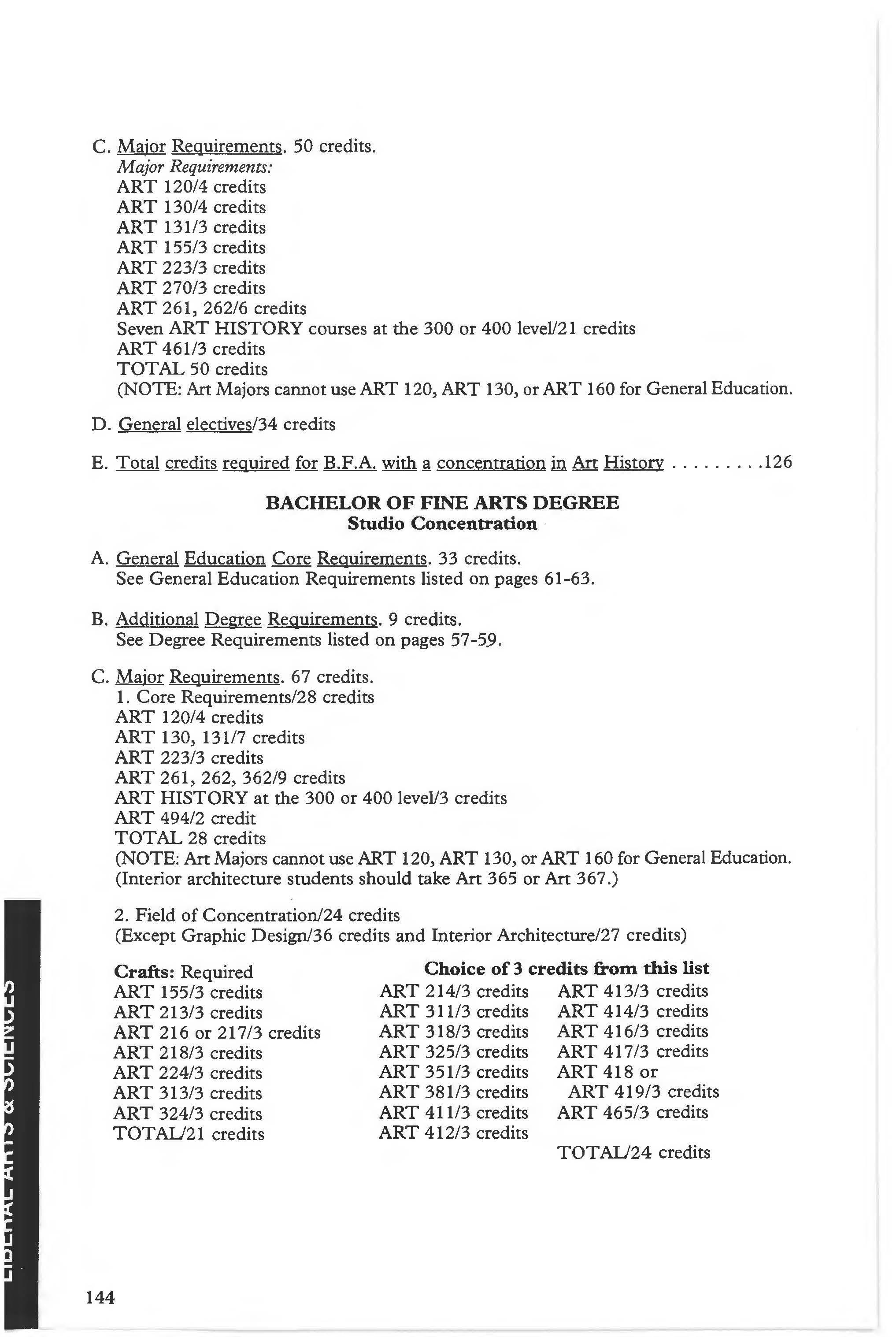
E. Total credits reguired for B.F.A. with.!! concentration in Art History ......... 126
Studio Concentration ·
A. General Education Core Reguirements. 33 credits. See General Education Requirements listed on pages 61-63.
B. Additional Degree Requirements. 9 credits. See Degree Requirements listed on pages 57-59.
C. Major Reguirements. 67 credits.
1. Core Requirements/28 credits
ART 120/4 credits
ART 130, 131/7 credits
ART 223/3 credits
ART 261, 262, 362/9 credits
ART HISTORY at the 300 or 400 level/3 credits
ART 494/2 credit
TOTAL 28 credits
(NOTE: Art Majors cannot use ART 120, ART 130, or ART 160 for General Education. (Interior architecture students should take Art 365 or Art 367 .)
2. Field of Concentration/24 credits (Except Graphic Design/36 credits and Interior Architecture/27 credits)
Crafts: Required
ART 155/3 credits
ART 213/3 credits
ART 216 or 217/3 credits
ART 218/3 credits
ART 224/3 credits
ART 313/3 credits
ART 324/3 credits
TOTALJ21 credits
ART 214/3 credits ART 413/3 credits
ART 311/3 credits ART 414/3 credits
ART 318/3 credits ART 416/3 credits
ART 325/3 credits ART 417/3 credits
ART 351/3 credits ART 418 or ART 381/3 credits ART 419/3 credits
ART 411/3 credits ART 465/3 credits
ART 412/3 credits
TOTALJ24 credits
ART 221/3 credits
ART 230/3 credits
ART 250/3 credits
ART 251/3 credits
ART 270/3 credits
ART 330/3 credits
ART 351/3 credits
ART 355/3 credits
TOTAll24 credits
Interior Architecture
ART IO 1/3 credits
ART 121/4 credits
ART 155/3 credits
ART 230/3 credits
ART 304/3 credits
ART 306/3 credits
ART 367/3 credits
ART 404/3 credits
ART 405/3 credits
TOTAIJ28 credits
ART 1551'3\credits
ART 22 l/~ credits
ART 22j/3 credits
ART 230/3 credits
ART 250/3 credits
ART 270/3 credits
ART 322/3 credits
ART 326/3 credits
ART 327 /3 credits
ART 330/3 credits
ART 351/3 credits
ART 355/3 credits
TOTAll36 credits
ART 155/3 credits
ART 250/3 credits
ART 270/3 credits
ART 271/3 credits
ART 31 1/3 credits
ART 330/3 credits
ART 351/3 credits ART 371/3 credits
TOTAll24 credits
ART 155/3 credits
ART 221/3 credits
ART 251/3 credits
ART 324/3 credits
ART 330/3 credits
ART 355/3 credits
ART 455/3 credits
ART 456/3 credits
TOTAll24 credits
3. Electives Art Studio/15 credits
(Electives in Graphic Design/3 credits) (Electives in Interior Architecture/I I credits)
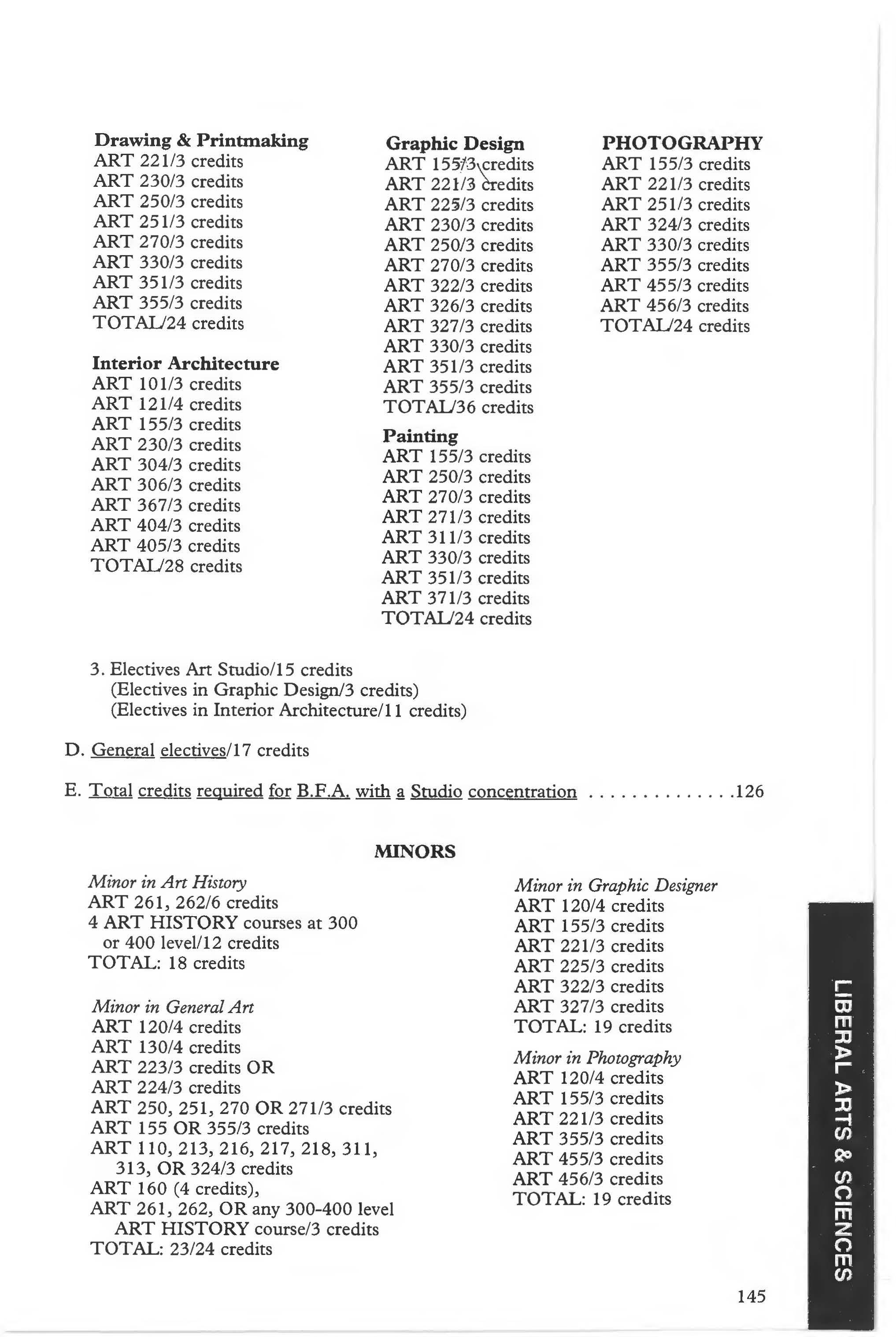
D. General electives/I 7 credits
E. Total credits reguired for B.F.A. with .a Studio concentration .............. 126
Minor in Art History
ART 261, 262/6 credits
4 ART HISTORY courses at 300 or 400 level/12 credits
TOTAL: 18 credits
Minor in General Art
ART 120/4 credits
ART 130/4 credits
ART 223/3 credits OR ART 224/3 credits
ART 250, 251, 270 OR 271/3 credits
ART 155 OR 355/3 credits
ART 110,213,216, 217, 218, 311, 313, OR 324/3 credits
ART 160 (4 credits), ART 261, 262, OR any 300-400 level
ART HISTORY course/3 credits
TOTAL: 23/24 credits
Minor in Graphic Designer
ART 120/4 credits
ART 155/3 credits
ART 221/3 credits
ART 225/3 credits
ART 322/3 credits
ART 327 /3 credits
TOTAL: 19 credits
Minor in Photography
ART 120/4 credits
ART 155/3 credits
ART 221/3 credits
ART 355/3 credits
ART 455/3 credits
ART 456/3 credits
TOTAL: 19 credits
ART t A special fee is charged for all studio courses.
*General Education Courses
**Writing Intensive Courses
NOTE: We do not guarantee that all courses listed will be offered every year. Many classes are offered every third or fourth semester. For a five-year list of offerings, contact the Art Department.
*Art 120. FOUNDATIONS OF CONTEMPORARY DESIGN. Understanding the basic principles, vocabulary and visual elements of two-dimensional design through inquiry into the historical sources and terms of creative expression of art in the 20th Century. 4 credits.
*Art 121. INTRODUCTION TO ENVIRONMENTAL DESIGN ISSUES. The course will examine variables in built-environmental problems and solutions in our society and the effect that the built environment has upon the quality and meaning of life. Built-environmental issues will be illustrated with industrial design, interior design, architecture, landscape architecture and urban design/planning. 4 credits.
*Art 130. DRAWING I. An introduction to the history, appreciation and fundamentals of drawing as an expressive vehicle. 4 credits.
*Art 160. INTRODUCTION TO THE VISUAL ARTS (ART APPRECIATION). An introduction to the basic elements of painting, sculpture, architecture and crafts and their respective roles and contributions to our civilization. 4 credits.
Art 101. INTRODUCTION TO INTERIOR DESIGN. Emphasis is placed on the evaluation and design of residential dwellings. Students acquire the graphic skills needed to illustrate residential designs using basic architectural drawing techniques. 3 credits.
Art 110. CRAFTS. An understanding of the basic principles and techniques of functional and decorative hand crafts in various cultures and their humanistic relationship to society. Exploration of a variety of techniques, materials and tools utilized in the production of craft objects. 3 credits.
Art 131. LIFE DRAWING. Development of concepts, skills and drawing techniques utilizing the human figure. Spring only. 3 credits.
Art 155. BASIC PROCESSES AND PRINCIPLES OF PHOTOGRAPHY. An introduction to the basic processes, principles and history of black and white still photography. Students must furnish their own adjustable 35mm cameras. Every semester. 3 credits.
Art 213. CERAMICS. Forming, decorating, glazing and firing pottery. 3 credits.
Art 214. CERAMICS II. Opportunities for deeper involvement with, and exploration of, wheel throwing techniques, hand building processes, as well as glazing and firing of creative ceramic work. Prerequisite: Art 213 and permission of instruction. 3 credits.
Art 216. FIBERS: WEAVING. Study and use of natural, man-made and synthetic fibers in the design and use of on-and offthe-loom weaving processes. Exploration of a variety of basic techniques including carding and spinning of wool, dyeing of fibers, construction and dressing of looms, and the knotting, braiding and twisting of fibers. 3 credits.
Art 217. FABRICS: SURFACE DESIGN. Exploration and investigation of traditional and contemporary fabric surface design techniques, including tie-dye, batik, block printing, stencil and stitchery. 3 credits.
Art 218. DESIGN IN STAINED GLASS. Construction of functional and non-functional objects with emphasis on original design and basic forming techniques utilizing stained glass. 3 credits.
Art 221. GRAPHIC DESIGN I. Introduction to the elements of graphic design explored through the advertising media of newspapers, magazines, outdoor display systems, and direct mail literature. Emphasis is on format and the dynamics of composition and layout of visual images and typography in page and display advertising. Prerequisite: Art 120. 3 credits.

Art 223. THREE-DIMENSIONAL DESIGN. Investigation and construction of three-dimensional forms in such media as paper, wire, wood, metal, plastics, rope, and twine. Understanding and designing of forms as they relate to architecture, sculpture and industrial design. Spring only. 3 credits.
Art 224. DESIGN IN WOOD. Construction of functional and non-functional wood objects with emphasis on original design and basic working techniques, including use of power tools. 3 credits.
Art 225. GRAPHIC ART PRODUCTION I. Introduction to the technical production of printing visual matter. Emphasis is placed on development of dexterity in mechanical layout and reproduction processes through theoretical problem solving. The tools and materials of the graphic design trade are used and explored. Prerequisite: Art 221. 3 credits.
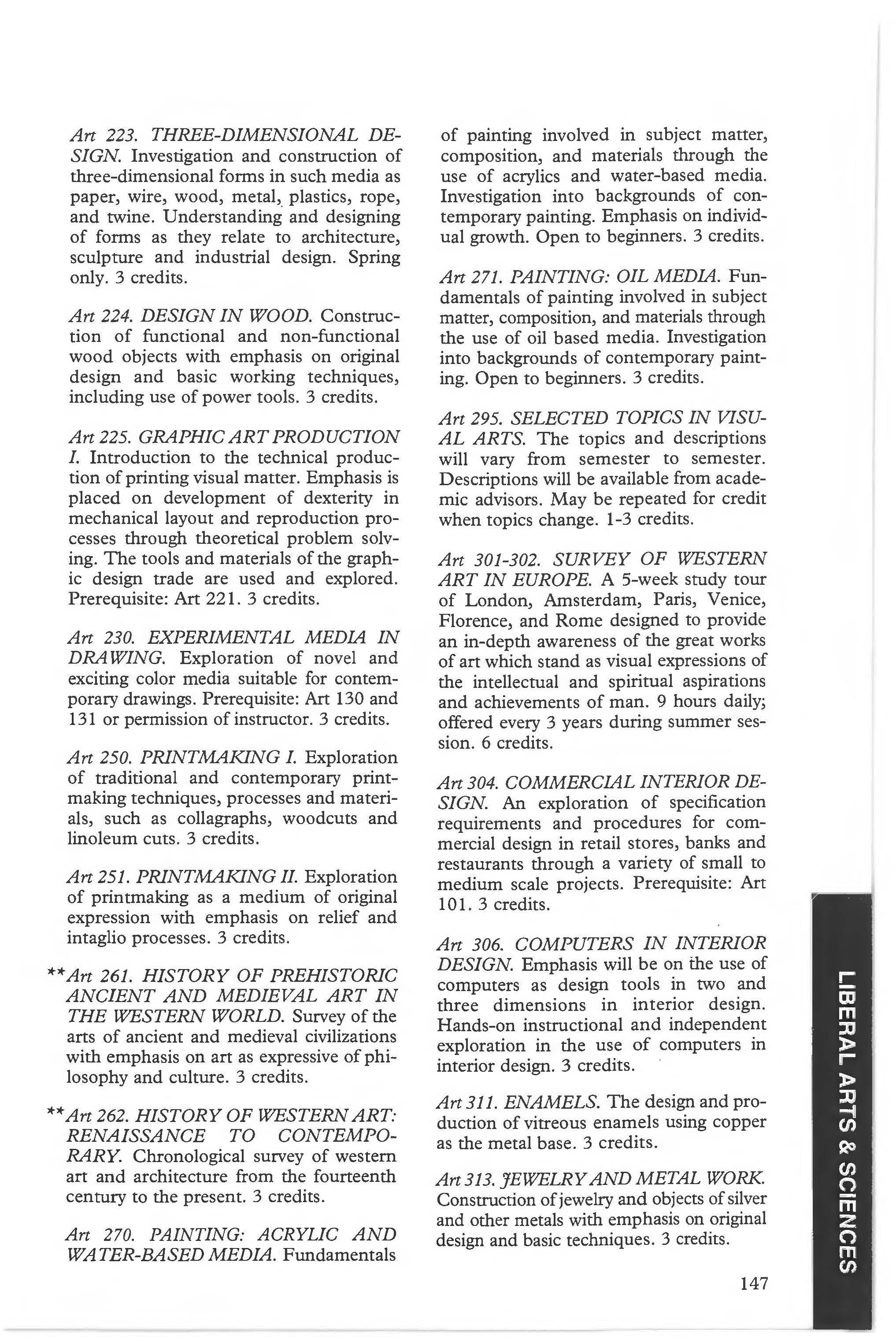
Art 230. EXPERIMENTAL MEDIA IN DRAWING. Exploration of novel and exciting color media suitable for contemporary drawings. Prerequisite: Art 130 and 131 or permission of instructor. 3 credits.
Art 250. PRINTMAKING I. Exploration of traditional and contemporary printmaking techniques, processes and materials, such as collagraphs, woodcuts and linoleum cuts. 3 credits.
Art 251. PRINTMAKING II. Exploration of printmaking as a medium of original expression with emphasis on relief and intaglio processes. 3 credits.
**Art 261. HISTORY OF PREHISTORIC ANCIENT AND MEDIEVAL ART IN THE WESTERN WORLD. Survey of the arts of ancient and medieval civilizations with emphasis on art as expressive of philosophy and culture. 3 credits.
**
Art 262. HISTORY OF WESTERN ART: RENAISSANCE TO CONTEMPORARY. Chronological survey of western art and architecture from the fourteenth century to the present. 3 credits.
Art 270. PAINTING: ACRYLIC AND WATER-BASED MEDIA. Fundamentals
of painting involved in subject matter, composition, and materials through the use of acrylics and water-based media. Investigation into backgrounds of contemporary painting. Emphasis on individual growth. Open to beginners. 3 credits.
Art 271. PAINTING: OIL MEDIA. Fundamentals of painting involved in subject matter, composition, and materials through the use of oil based media. Investigation into backgrounds of contemporary painting. Open to beginners. 3 credits.
Art 295. SELECTED TOPICS IN VISUAL ARTS. The topics and descriptions will vary from semester to semester. Descriptions will be available from academic advisors. May be repeated for credit when topics change. 1-3 credits.
Art 301-302. SURVEY OF WESTERN ART IN EUROPE. A 5-week study tour of London, Amsterdam, Paris, Venice, Florence, and Rome designed to provide an in-depth awareness of the great works of art which stand as visual expressions of the intellectual and spiritual aspirations and achievements of man. 9 hours daily; offered every 3 years during summer session. 6 credits.
Art 304. COMMERCIAL INTERIOR DESIGN. An exploration of specification requirements and procedures for commercial design in retail stores, banks and restaurants through a variety of small to medium scale projects. Prerequisite: Art 101. 3 credits.
Art 306. COMPUTERS IN INTERIOR DESIGN. Emphasis will be on the use of computers as design tools in two and three dimensions in interior design. Hands-on instructional and independent exploration in the use of computers in interior design. 3 credits.
Art 311. ENAMELS. The design and production of vitreous enamels using copper as the metal base. 3 credits.
Art 313. JEWELRY AND METAL WORK. Construction of jewelry and objects of silver and other metals with emphasis on original design and basic techniques. 3 credits.
Art 318, 319, 320. ADVANCED STAIN GLASS I, II, III. Continued exploration of functional and non-functional stained glass objects with strong emphasis on original designs and independant study. Unique and creative combinations of other media and techniques are encouraged. Each course builds on preceding one depending on individual needs and progress. Prerequisite: Art 218 and permission of instructor. 3 credits
Art 322. GRAPHIC DESIGN II. Introduction to typography and the mechanics ofreproduction art required for printed materials. Emphasis is on the development of ideas, concepts, graphic impact and creativity. Prerequisite: Art 221. 3 credits.
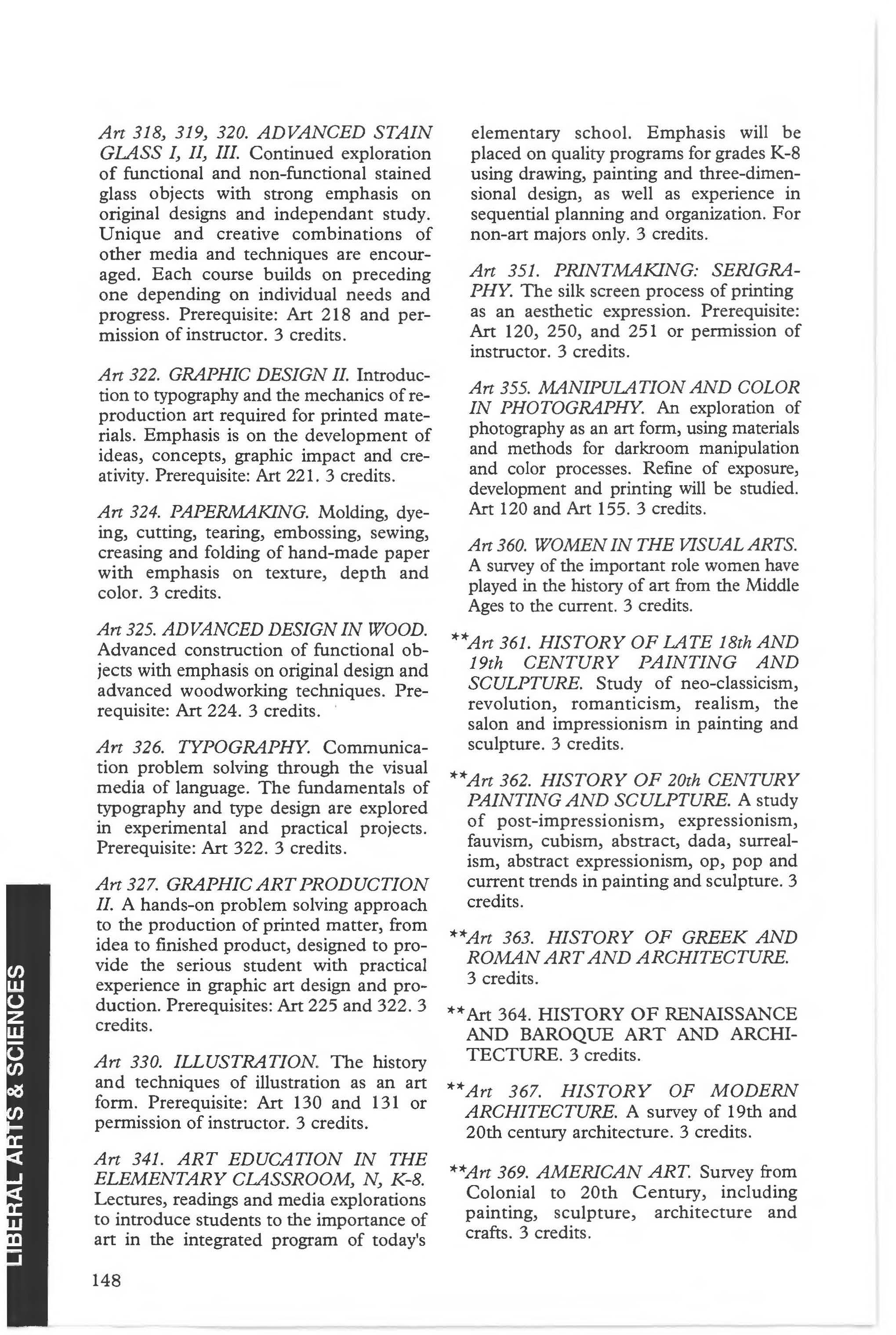
Art 324. PAPERMAKING. Molding, dyeing, cutting, tearing, embossing, sewing, creasing and folding of hand-made paper with emphasis on texture, depth and color. 3 credits.
Art 325. ADVANCED DESIGN IN WOOD. Advanced construction of functional objects with emphasis on original design and advanced woodworking techniques. Prerequisite: Art 224. 3 credits. ·
Art 326. TYPOGRAPHY. Communication problem solving through the visual media of language. The fundamentals of typography and type design are explored in experimental and practical projects. Prerequisite: Art 322. 3 credits.
Art 327. GRAPHIC ART PRODUCTION II. A hands-on problem solving approach to the production of printed matter, from idea to finished product, designed to provide the serious student with practical experience in graphic art design and production. Prerequisites: Art 225 and 322. 3 credits
Art 330. ILLUSTRATION. The history and techniques of illustration as an art form. Prerequisite: Art 130 and 131 or permission of instructor. 3 credits.
Art 341. ART EDUCATION IN THE ELEMENTARY CLASSROOM, N, K-8. Lectures, readings and media explorations to introduce students to the importance of art in the integrated program of today's
elementary school. Emphasis will be placed on quality programs for grades K-8 using drawing, painting and three-dimensional design, as well as experience in sequential planning and organization. For non-art majors only. 3 credits.
Art 351. PRINTMAKING: SERIGRAPHY. The silk screen process of printing as an aesthetic expression. Prerequisite: Art 120, 250, and 251 or permission of instructor. 3 credits.
Art 355. MANIPULATION AND COLOR IN PHOTOGRAPHY. An exploration of photography as an art form, using materials and methods for darkroom manipulation and color processes. Refine of exposure, development and printing will be studied. Art 120 and Art 155. 3 credits.
Art 360. WOMEN IN THE VISUAL ARTS. A survey of the important role women have played in the history of art from the Middle Ages to the current. 3 credits.
**Art 361. HISTORY OF LATE 18th AND 19th CENTURY PAINTING AND SCULPTURE. Study of neo-classicism, revolution, romanticism, realism, the salon and impressionism in painting and sculpture. 3 credits.
**Art 362 HISTORY OF 20th CENTURY PAINTING AND SCULPTURE. A study of post-impressionism, expressionism, fauvism, cubism, abstract, dada, surrealism, abstract expressionism, op, pop and current trends in painting and sculpture . 3 credits.
**Art 363. HISTORY OF GREEK AND ROMAN ART AND ARCHITECTURE. 3 credits.
** Art 364. HISTORY OF RENAISSANCE AND BAROQUE ART AND ARCHITECTURE. 3 credits.
**Art 367. HISTORY OF MODERN ARCHITECTURE. A survey of 19th and 20th century architecture. 3 credits.
**Art 369. AMERICAN ART. Survey from Colonial to 20th Century, including painting, sculpture, architecture and crafts. 3 credits.
Art 371. ADVANCED PAINTING. Advanced painting with emphasis on the exploration of individual style using oils, acrylics, watercolor and mixed media. Prerequisite: Art 270 and 271 and permission of instructor. 3 credits.
Art 381. SCULPTURE I. Study of fundamental sculpture principles. Work with a variety of materials. 3 credits.
Art 382. SCULPTURE II. Continuation of various sculpture techniques in a variety of materials. Prerequisite Art 381. 3 credits.
Art 396. ART AND ARTIFACTS OF SCOTLAND. This course is designed to provide an appreciation and understanding of Scottish art, history and culture through the experience of creating art in Scotland using resources available through the Glasgow Schol of Art. Emphasis will be on maintaining a sketchbook, developing a body of artwork and attending lectures on specialized topics during three weeks of study in Scotland. Topics that will be covered include: ancient and contemporary interpretations of the Scottish landscape Pictish artifact and themes, the art and architecture of Charles Rennie Macintosh and contemporary design at the Glasgow School of Art. Summer term only, 6 credits.
Art 401. SPECIALIZED TOPICS IN THE VISUAL ARTS. Offered on demand. 1 credit.
Art 402. SPECIALIZED TOPICS IN THE VISUAL ARTS. Offered on demand. 2 credits.
Art 403. SPECIALIZED TOPICS IN THE VISUAL ARTS. Offered on demand. 3 credits.
Art 404. PUBLIC INTERIOR SPACE. Advanced interior design problems; experimental and innovative concepts; responses to public interior spaces in museums, schools, hospitals, health care centers and offices. Prerequisites: Art 101, 304. 3 credits.
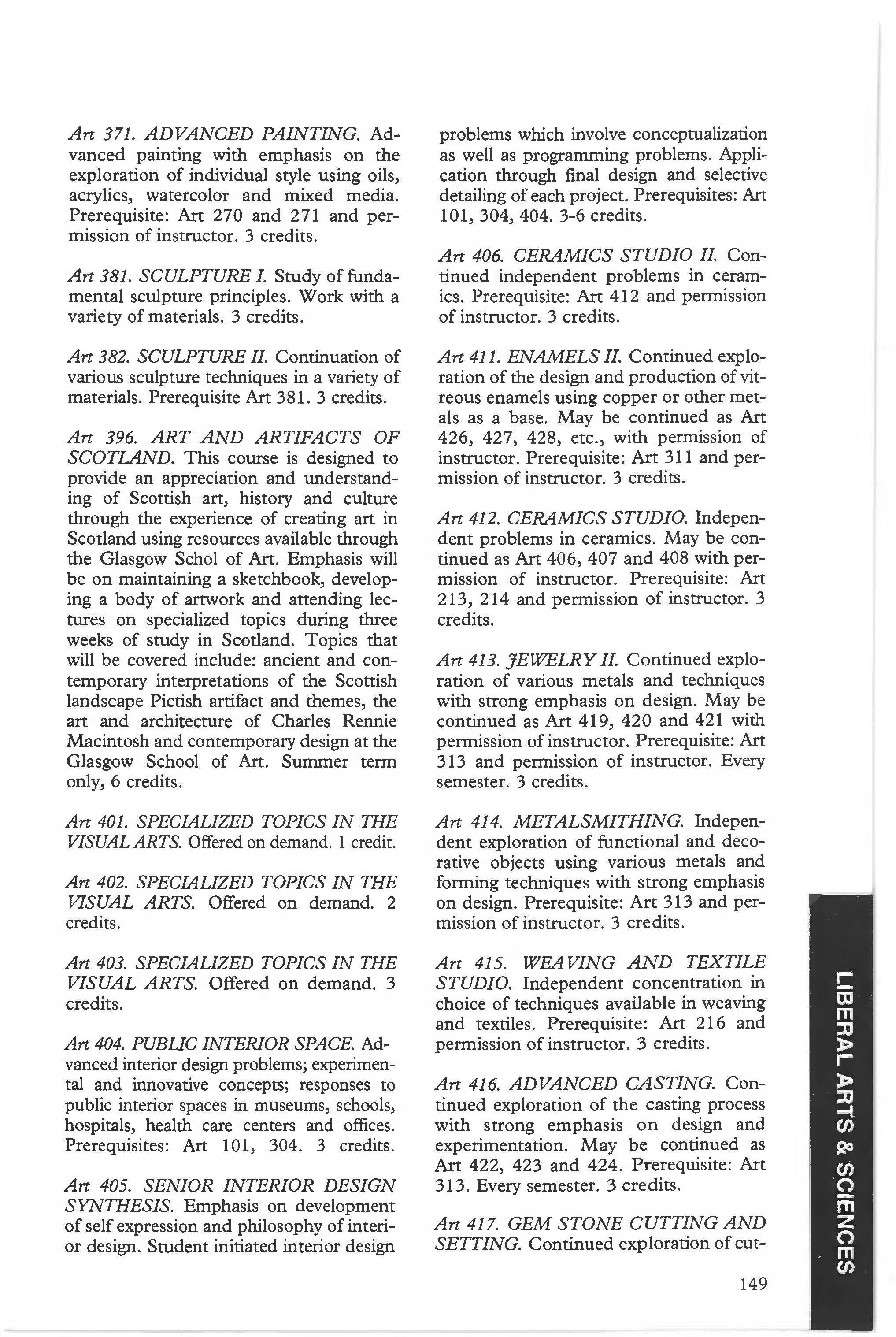
Art 405. SENIOR INTERIOR DESIGN SYNTHESIS. Emphasis on development of self expression and philosophy of interior design. Student initiated interior design
problems which involve conceptualization as well as programming problems. Application through final design and selective detailing of each project. Prerequisites: Art 101, 304, 404. 3-6 credits.
Art 406. CERAMICS STUDIO II. Continued independent problems in ceramics. Prerequisite: Art 412 and permission of instructor. 3 credits.
Art 411. ENAMELS II. Continued exploration of the design and production of vitreous enamels using copper or other metals as a base. May be continued as Art 426, 427, 428, etc., with permission of instructor. Prerequisite: Art 311 and permission of instructor. 3 credits.
Art 412. CERAMICS STUDIO. Independent problems in ceramics. May be continued as Art 406, 407 and 408 with permission of instructor. Prerequisite: Art 213, 214 and permission of instructor. 3 credits.
Art 413. JEWELRY II. Continued exploration of various metals and techniques with strong emphasis on design. May be continued as Art 419, 420 and 421 with permission of instructor. Prerequisite: Art 313 and permission of instructor. Every semester. 3 credits.
Art 414. METALSMITH/NG. Independent exploration of functional and decorative objects using various metals and forming techniques with strong emphasis on design. Prerequisite: Art 313 and permission of instructor. 3 credits.
Art 415. WEAVING AND TEXTILE STUDIO. Independent concentration in choice of techniques available in weaving and textiles. Prerequisite: Art 216 and permission of instructor. 3 credits.
Art 416. ADVANCED CASTING. Continued exploration of the casting process with strong emphasis on design and experimentation. May be continued as Art 422, 423 and 424. Prerequisite: Art 313. Every semester. 3 credits.
Art 417. GEM STONE CUTTING AND SETTING. Continued exploration of cut-
ting, polishing, and setting stones with strong emphasis on design. Prerequisite : Art 313 . 3 credits .
Art 418. METAL ELECTROFORMING. Exploration of functional and decorative application of electroforming in lieu of, or in combination with, additional metal forming techniques. Strong emphasis will be given to design. Prerequisite: Art 313 or permission of instructor 3 credits
Art 419. ADVANCED JEWELRY III . Continued exploration of various metals and techniques with strong emphasis on design. Prerequisite : Art 413 and permission of instructor . 3 credits .
Art 422. ADVANCED CASTING II. Continued exploration of the casting process with strong emphasis on design and experimentation. Prerequisite: Art 416 and permission of instructor 3 credits Offered on demand.
Art 430. DRAWING STUDIO . Open to students who have completed Art 130, 131 , 230 and 330. The student will select an area of concentration and problems of specialization in media and technique. Permission of instructor required for enrollment . May be continued as 431, 432, 433 , with permission of instructor. 3 credits.
Art 441 THE TEACHING OF ART IN THE SECONDARY SCHOOLS. A concentrated study of contemporary practices, theory, and materials necessary for the formulation of a meaningful art program in the secondary school. Supervised experience working with secondary school age students in a creative setting. 4 credits .
Art 442. THE TEACHING OF ART IN THE ELEMENTARY SCHOOLS. A concentrated study of theory, methods, and materials necessary for the formulation of a meaningful , creative art program in the elementary schools Supervised experience working with elementary age children in a creative setting. 4 credits .
Art 443 . PROBLEMS IN ART EDUCATION. The student will select an area of art education for concentrated study through readings, research, experimenta-

tion and / or internship. Permission of instructor required for enrollment . Hours to be arranged . 3 credits.
Art 450. PRINTMAKING STUDIO. Open to students who have completed Art 120, 130, and 250, and if studying serigraphy or relief and intaglio, must have completed courses in these areas. The student will select an area of concentration and problems of specialization in media and technique. Ma y be continued as Art 451, 452 , and 453. Permission of instructor required for enrollment 3 credits.
Art 455. ELECTRONIC PHOTOGRAPHY. An exploration of electronic still photography as an art form. Image sources, conventional photographic sources and electronic still cameras are studied. Prerequisite: Art 120, Art 155, and Art 355, or permission of instructor 3 credits
Art 456. PHOTOGRAPHY STUDIO. A continued exploration of photography as an art form, including non-silver processes. Students encouraged to pursue a personal position in relation to the medium. Prerequisites : Art 155 and Art 355. 3 credits.
**Art 461 . STUDIES IN ART HISTORY. Independent s tud y. May be continued as Art 462, 463, and 464. Prerequisite : 9 credits of History of Western Art and permission of instructor. 3 credits.
Art 465, 466, 46 7. ADVANCED CRAFTS I, II, III. Continued exploration of functional and non-functional craft objects with strong emphasis on original designs and independant study. Students will focus on a specific media or combine unique and creative solutions of a variety of media Each course builds on the preceding course depending on the student's needs and progress. Prerequisite : Art 110, Art 120 and permission of instructor. 3 credits .
Art 471. PAINTING STUDIO. Open to students who have completed 270 or equivalent. May be continued as 472 , 473, etc. Permission of instructor required for enrollment. 3 credits.
Art 480 SCULPTURE STUDIO. Open to students who have completed Art 381 and
382 The student will select media and techniques and set up individual problems Permission of instructor required for enrollment. May be repeated as 481, 482, etc. 3 credits.

Art. 494. SENIOR SEMINAR. Designed specifically for and required of all art major seniors, this course is intended to review, assess and bring into focus the past art experiences and instruction 2 credits
Art 495 /595. SPECIAL TOPICS. Selected topics in Art. The topics may vary from semester to semester. Descriptions are available for academic advisors. May be repeated for credit when topics change. 1-3 credits
Art 496 ART/CRAFT APPRENTICESHIP PROGRAM. An individuallly tailored program smiliar to student teaching that allows a student to gain valuable onthe-job experience in any non-teaching art environment . Student must have an art faculty sponsor, approval of department head and apply one semester in advance. Prerequisite: 75 credit hours and a 2.5 GPA. 3 , 6, or 9 credits .
Art 499 /599 SELECTED TOPICS AND WORKSHOPS. A selected workshop or program on a specialized topic, offered on demand. 3 credits
The English program of the Department of English, Philosophy, and Modem Languages offers courses leading to the B.A. and M.A. degrees.
Every attempt has been made to state the major and minor requirements as clearly as possible. However, we recommend that every student majoring or minoring in the program maintain close communication with the academic advisor assigned by the department in order to plan a program suited to the student's needs. The faculty of the department are happy to assist each student in this and in defining individual career goals and expectations.

NOTE: The department does not guarantee that all of the courses listed will be offered every year.
Assessment
The Department requires student outcomes assessment testing prior to graduation.
Faculty
Susan Anderson, Ph.D., Assistant Professor of English Jena A. Burges, Ph.D., Assistant Professor of English
* Craig A. Challender, Ph.D, Professor of English
Martha E. Cook, Ph.D., Professor of English James G. Cope, Ed.D., Associate Professor of English Carolyn M. Craft, Ph.D., Professor of English Otis W. Douglas, III, M.F.A., Assistant Professor of English Kathleen T. Flanagan, Ph.D., Associate Professor of English Candis A. LaPrade, Ph.D., Assistant Professor of English Michael C. Lund, Ph.D., Professor of English Robert L. Lynch, Jr., Ph.D., Assistant Professor of English Ellery Sedgwick, Ph.D., Professor of English Massie C. Stinson, Ph.D., Associate Professor of English Camilla C. Tinnell, M.S., Instructor of English Arthur Gordon Van Ness, III, Ph.D., Associate Professor of English William C. Woods, M.A., Assistant Professor of English and Journalism
* On leave Fall Semester 1997
Craig A. Challender, Ph.D., Professor of English
Otis W. Douglas, III, M.F.A., Assistant Professor of English Kathleen T. Flanagan, Ph.D., Associate Professor of English William C. Woods, M.A., Assistant Professor of English and Journalism
Otis W. Douglas, III, M.F.A., Assistant Professor of English Kathleen T. Flanagan, Ph.D., Associate Professor of English William C. Woods, M.A., Assistant Professor of Journalism
The major in English requires a minimum of 33 hours of coursework in the discipline. Graduates from the program enter a variety of careers requiring skill in communication,
research, and the analysis or production of texts, including teaching, journalism, law, publishing, technical writing, and business management. The relatively low number of required hours for the major gives students flexibility either to develop their background in writing and literature further or to add expertise in a related field. Faculty advisors will be glad to review options and career paths with students.
Majors seeking licensure for teaching secondary English should add to the major requirements English 381,382,480, and 483. These courses, as well as the required Education courses, should be completed before student teaching. Students licensed to teach secondary English can also gain endorsements to teach Economics, Geography, History, Journalism , Political Science, Speech, or Theater by adding a minor in those fields (See "Add On Endorsements" under Education .)
In addition to the English major and licensure, the department also offers minors in Communications or Journalism. These minors are interdisciplinary and include courses from several fields including Art, Computer Science, Speech, Theater, Business Management, Marketing, and Information Systems. The minors in both Journalism and Communications require 18 credit hours of course work as listed below and both encourage additional work in supervised practicum environments.
A. General Education Core Requirements. 33 credits.
See General Education Requirements listed on pages 61-63
The Department requires Philosophy 306 for the satisfaction of Goal 10.)
B. Additional Degree Requirements. 9 credits.
See Degree Requirements listed on pages 57-59.
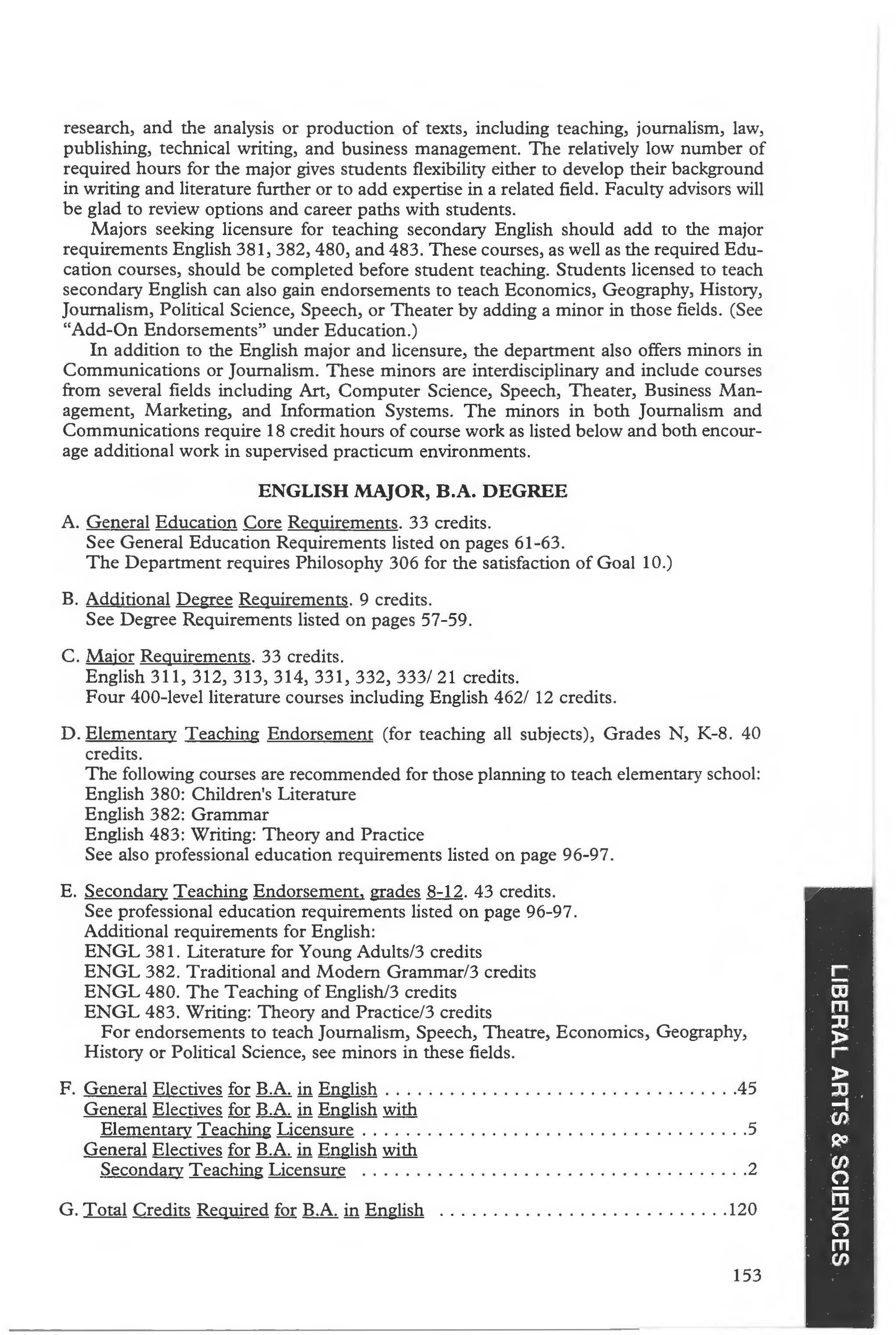
C. Major Requirements. 33 credits
English 311, 312,313,314,331,332, 333/ 21 credits. Four 400-level literature courses including English 462/ 12 credits.
D. Elementary Teaching Endorsement (for teaching all subjects), Grades N, K-8. 40 credits.
The following courses are recommended for those planning to teach elementary school:
English 380: Children's Literature
English 382: Grammar
English 483: Writing: Theory and Practice
See also professional education requirements listed on page 96-97
E. Secondary Teaching Endorsement, grades 8-12. 43 credits.
See professional education requirements listed on page 96-97 .
Additional requirements for English:
ENGL 381. Literature for Young Adults/3 credits
ENGL 382. Traditional and Modem Grammar/3 credits
ENGL 480 . The Teaching of English/3 credits
ENGL 483 Writing : Theory and Practice/3 credits
For endorsements to teach Journalism, Speech, Theatre, Economics, Geography, History or Political Science, see minors in these fields.
F. General Electives for B.A. in English . ... . ......... ..... ... . ..... ... . .45
General Electives for B.A. in English with Elementary Teaching Licensure .5
General Electives for B.A. in English with Secondary Teaching Licensure 2
G. Total Credits Required for B.A. in English 120
Minor in English
English 311, 312, 331/3 credits
English 313, 314, 332, 333 / 3 credits
One 400-level course / 3 credits English electives, 200-level* and above / 9 credits TOTAIJ18 credits
Minor in Communications Speech 310 or 311/3 credits
Two courses from English 210, 213, 222 / 6 credits
Communications electives / 12 credits must be selected from the following: Art 120, 155,160,221 Computer Sciene 121 Education 54 7 English 210,211,212,213,214, 221, 222, 256, 257 Marketing 380, 480 MISY 291
Speech 101,200,310, 311 TOTAIJ2 l credits
Minor in Journalism
English 210, 213, 222/9 credits Journalism electives / 9 credits TOTAU 18 credits
Journalism electives must be selected from the following: Art 155 Art 221 Speech 200, 310, 311 Philosophy 320 History 310 Political Science 201, 441 Sociology 101 Psychology 131
*Note: English 201,202, and 203 are designed to fulfill General Education Goal 3. These courses may not be used as English electives for the English minor or to fulfill degree requirements for Humanities courses.
Note: English 100 and 101, which satisfy Goal One of the General Education requirements, are prerequisite to all other English courses.
* General Education Courses
**Writing Intensive Course
* English I 00. RHETORIC AND RESEARCH. Reading and writing expository prose including the research paper. Oral presentation required. Prerequisite to English 101. 3 credits .
*English 101. COMPOSITION AND LITERARY ANALYSIS. Expository writing including research, and an introduction to literary analysis. Close reading of and frequent writing on literature, primarily fiction and poetry, with extended study of one major work read serially. English 100 and 101 are prerequisite to all other English courses. 3 credits.
* English 201. WESTERN LITERATURE. A study of significant movements and traditions in fiction and poetry by major western writers such as the authors of the Old Testament, Homer, Sophocles, Dante, Cervantes, Goethe, Chekhov, Camus, Garcia Marquez, and Anna Akhmatova. May not be used to satisfy the Humanities requirement for the B.A., B.M., or B.F.A. Degree. 3 credits. Prerequisite: English 101.
* English 202. BRITISH LITERATURE. A study of significant movements and traditions in fiction and poetry by major British authors such as the author of BEOWULF, Chaucer, Shakespeare, Milton, Wordsworth, Keats, George Eliot, Tennyson, and Yeats. May not be used to satisfy the Humanities requirement for the B.A., B.M., or B.F.A. Degree . 3 credits. Prerequisite : English 10 l.
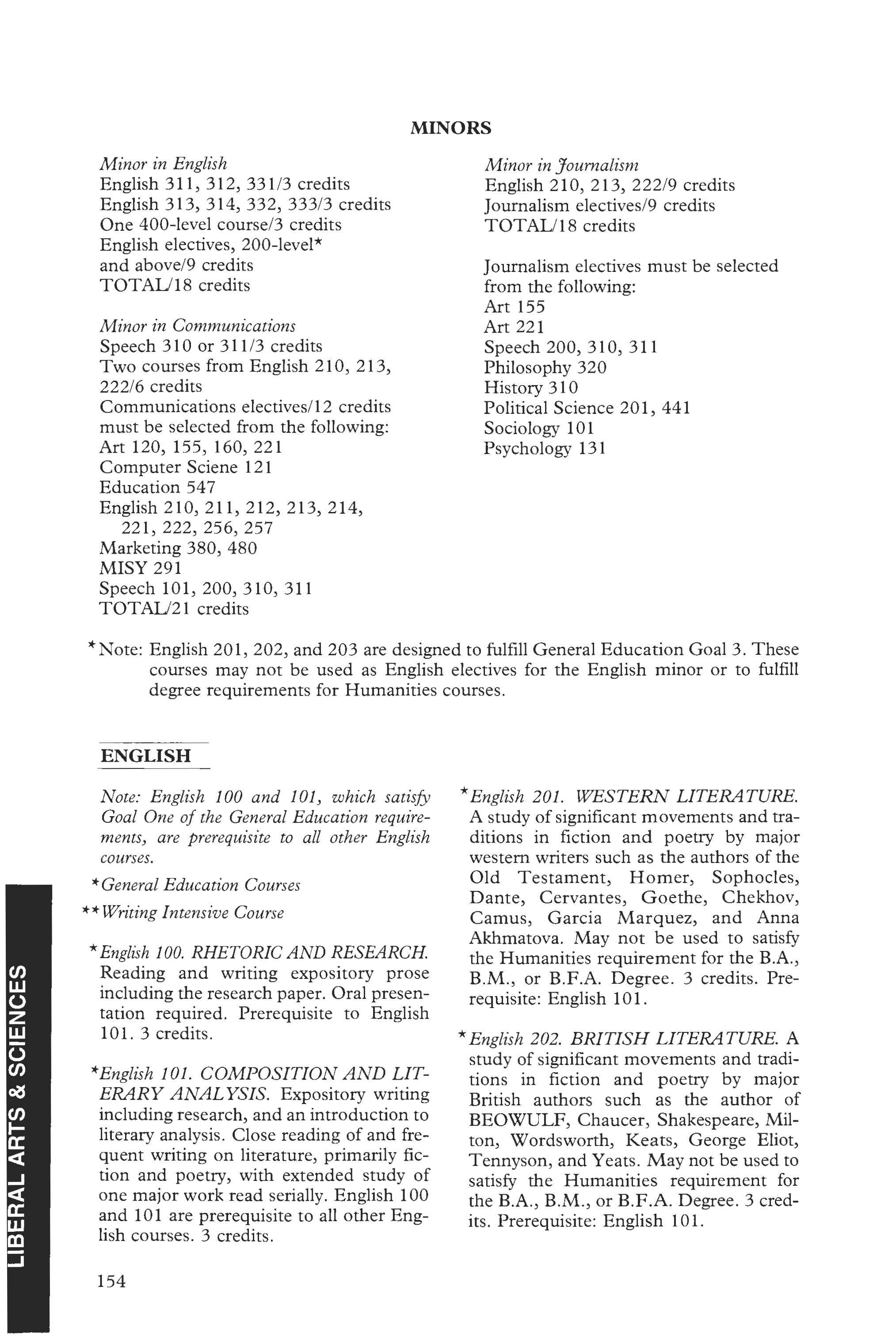
* English 203. AMERICAN LITERATURE. A study of significant movements and traditions in fiction and poetry by major American authors such as Bradstreet, Emerson, Melville, Dickinson, Hemingway, Faulkner, Hughes, and Eliot. May not be used to satisfy the Humanities requirement for the B.A., B.M., or B.F.A. Degree. 3 credits. Prerequisite: English 101.
Developmental courses Note: The following courses do not count toward graduation
English 051. BASIC WRITING SKILLS. Sentence, paragraph, and essay structure, with attention to standard English usage, punctuation, critical reading and summarizing, and writing short expository papers. Students will be assigned to this course on the basis of diagnostic tests or may enroll themselves . This course does not fulfill general education requirements and credit does not count toward graduation. Successful completion is required before students can enroll in other English courses. 3 credits
English 061. ENGLISH PROFICIENCY. Instruction in written composition and standard English usage for students placed on communication condition. Students placed on communication condition must enroll in this course before retaking the English proficiency test. The course grade, P(ass) or R(etake) is based on satisfactory performance on the English Proficiency Exam. Credit does not count toward graduation. 3 credits.
Other 200-level courses
** English 210. INTRODUCTION TO JOURNALISM. Fundamentals of newswriting and reporting for the student press. 3 credits.
English 211. WRITING FICTION. The short story and other forms of fiction. 3 credits.
English 212. WRITING POETRY. Traditional and contemporary techniques in poetry. 3 credits.
** English 213. WRITING NON-FICTION. Narrative nonfiction, article and feature writing, and other forms of literary journalism. 3 credits.
**English 214. TECHNICAL WRITING. A study and application of writing techniques for the dissemination of scientific and technical information. 3 credits

English 221. POPULAR LITERATURE. A study of contemporary nonfiction, genre fiction, and other forms of literature of proven mass appeal. 3 credits.
English 222. POPULAR CULTURE AND THE MASS MEDIA. Contemporary print and electronic media, with emphasis on film, television, pop music, and the press. 3 credits.
English 256. THE ART OF FILM I. Introduction to theory and techniques of the motion picture through screenings of classic and contemporary feature films. 3 credits.
English 257. THE ART OF FILM II. A study of major directors of film genres. 3 credits.
English 258. WOMEN AND FILM. A study of women directors and the history and conventions of portraying women in film. Prerequisite: English 100 and 101. 3 credits .
English 260. MYTHOLOGY. A study of classical and Germanic mythologies, with emphasis upon their influences in various literary traditions. Some consideration may be given to other myths. 3 credits.
English 263. THE BIBLE AS LITERATURE. The Old and New Testaments as works of literature. 3 credits.
English 295. SPECIAL TOPICS. Selected topics in English. The topics will vary from semester to semester. Descriptions will be available from academic advisors. May be repeated for credit when topics change. Prerequisite English 101. 1-3 credits.
Courses in the Major Literary Periods Note: These courses are designed primarily for English majors and minors.
English 311. BRITISH LITERATURE I. From the beginnings through the sixteenth century. Emphasis on such major works and writers as Beowulf, Chaucer, Spenser, Marlowe and Shakespeare. 3 credits.
English 312. BRITISH LITERATURE II. The late Renaissance through the age of Johnson, with emphasis on such major writers as Donne, Milton, Dryden, Swift, Pope, and Johnson. 3 credits.
English 313. BRITISH LITERATURE Ill. The Romantic and Victorian ages, with emphasis on such poets as Wordsworth, Coleridge, Keats, Tennyson, and Browning and such prose writers as Carlyle, Dickens, and Eliot. 3 credits.
English 314. BRITISH LITERATURE IV. The twentieth century. Emphasis on such major writers as Hardy, Yeats, Joyce, Lawrence, Woolf, and Lessing. 3 credits.
English 331. AMERICAN LITERATURE TO 1865. The beginnings through the period of the Civil War, with emphasis on such writers as Bradstreet, Franklin, Emerson, Hawthorne, Melville, Stowe, Douglass, and Whitman 3 credits.
English 332. AMERICAN LITERATURE 1865-1920. The age ofrealism and naturalism with emphasis on such major writers as Dickinson, Twain, James, Dreiser, Crane, Chopin, Chesnutt, and Wharton. 3 credits.
English 333. AMERICAN LITERATURE SINCE 1920. The modem age with emphasis on such major writers as Eliot, Frost, Cather, Hemingway, Hughes, Faulkner, Wright, Rich, and Morrison. 3 credits .

Other 300-level courses
English 367 (Theatre 367). SURVEY OF WESTERN DRAMA TO THE 17th CENTURY. Play analysis, dramatic style, and stage settings from the Greek classical period to the advent of the French neoclassical drama. 3 credits.
English 368 (Theatre 368). SURVEY OF WESTERN DRAMA FROM THE 17th TO THE 20th CENTURY. Play analysis,
dramatic style, and stage settings from the French neoclassical period through Ibsen and the advent of realism. 3 credits.
English 369 (Theatre 369). SURVEY OF WESTERN DRAMA IN THE 20th CENTURY. Explores traditional and avantgarde plays of the modem period with an emphasis on analysis and fluctuating styles of presentation . Offered alternate semesters . 3 credits.
English 380. CHILDREN'S LITERATURE. A survey of poetry, prose, and other media appropriate for elementary students. Primarily for those preparing for careers in elementary education and library science. 3 credits.
English 381 . LITERATURE FOR YOUNG ADULTS. A survey of young adult literature from 1967 to the present. Selection and evaluation of books, poetry, short stories, and other media. Instruction in and practice with response theory using written assignments and oral presentations . 3 credits.
English 382. TRADITIONAL AND MODERN ENGLISH GRAMMAR. A brief consideration of the history of the English language and a detailed study of English sentence structure, using the perspectives of traditional, structural, and transformational-generative grammar. 3 credits
Genre Courses
** Prerequisite: completion of Goal Three of the General Education requirements, and either one 300-level course in a major or literary period, or permission of the instructor
** English 411. EPIC. Study in the tradition and qualities of the epic as a unique genre with emphasis on one or more forms or a period in which the genre flourishes . 3 credits.
**English 412. POETRY. Study in the tradition and qualities of poetry as a unique genre with emphasis on one or more specific forms or a period in which the genre flourishes. May be repeated for credit when topic changes. 3 credits .
** English 413. THE NOVEL. Study in the tradition and qualities of the novel as a unique genre with emphasis on one or more forms or a period in which the genre flourishes. May be repeated for credit when topic changes. 3 credits.
**English 414. SHORT STORY. Study in the tradition and qualities of the short story as a unique genre with emphasis on one or more forms or a period in which the genre flourishes. May be repeated for credit when topic changes. 3 credits.
** English 415. DRAMA. Study in the tradition and qualities of drama as a unique genre with emphasis on one or more forms or a period in which the genre flourishes. May be repeated for credit when topic changes. 3 crdits.
** English 421, 422. MAJOR FIGURES IN FICTION. Extended study in the work of from one to three major English or American writers. May be repeated for credit when topic changes. 3 credits.
** English 423, 424. MAJOR FIGURES IN POETRY. Extended study in the work of from one to three major English or American writers. May be repeated for credit when topic changes. 3 credits.
** English 425. SHAKESPEARE. Extended study in the works of William Shakespeare. 3 credits.
Other 400-level courses
Prerequisites: Completion of Goal Three of the General Education requirements, and either one 300-level course in a literary period, or permission of the instructor.
**English 431. ARTHURIAN LITERATURE. Comparative study of Arthurian material of various countries from the medieval through the modern periods 3 credits.
** English 432. WOMEN AND LITERATURE. Study of the tradition of literature by and about women. 3 credits.
**English 441. ETHNIC LITERATURE. Study of the literary tradition of an ethnic group such as Afro-American, Jewish,
Chicano, or Native American peoples. 3 credits.
** English 442. REGIONAL LITERATURE. Study of the literary tradition of a region, such as the American South, or Ireland. 3 credits.
** English 443. POSTCOLONIAL LITERATURE. Study of literature written in English from countries during and after colonial contact with Britain, excluding the United States. 3 credits.
**English 451. CONTINENTAL LITERATURE I. Study of ancient, medieval, and Renaissance European classics in translation . 3 credits.
**English 452. CONTINENTAL LITERATURE II. Study of European literature of the neo-classical, romantic, and modem periods in translation. 3 credits.
** English 462. LITERARY CRITICISM. Study of the history and aims of literary criticism from Plato and Aristotle to the present, including oral and written criticism of literary works. Capstone course for English majors. Enrollment limited to seniors and those with permission of instructor. 3 credits.
** English 470. PROFESSIONAL WRITING SKILLS. Intensive reading and writing workshop focused on developing professional expository prose within the student's field of endeavor. The last half of the course will be devoted to writing workshops critiquing "works" in progress of some "real world" writing project. 3 credits.
**English 480. THE TEACHING OF ENGLISH A study of current practices with emphasis on specific techniques and materials. 3 credits.
English 482. DIRECTED TEACHING IN THE SECONDARY CLASSROOM. Required of all students seeking Secondary Teaching Licensure in English. Each student is assigned to work with a qualified cooperating teacher in a selected school setting off campus. The student teacher goes to the school setting and follows the schedule of the cooperating teach-
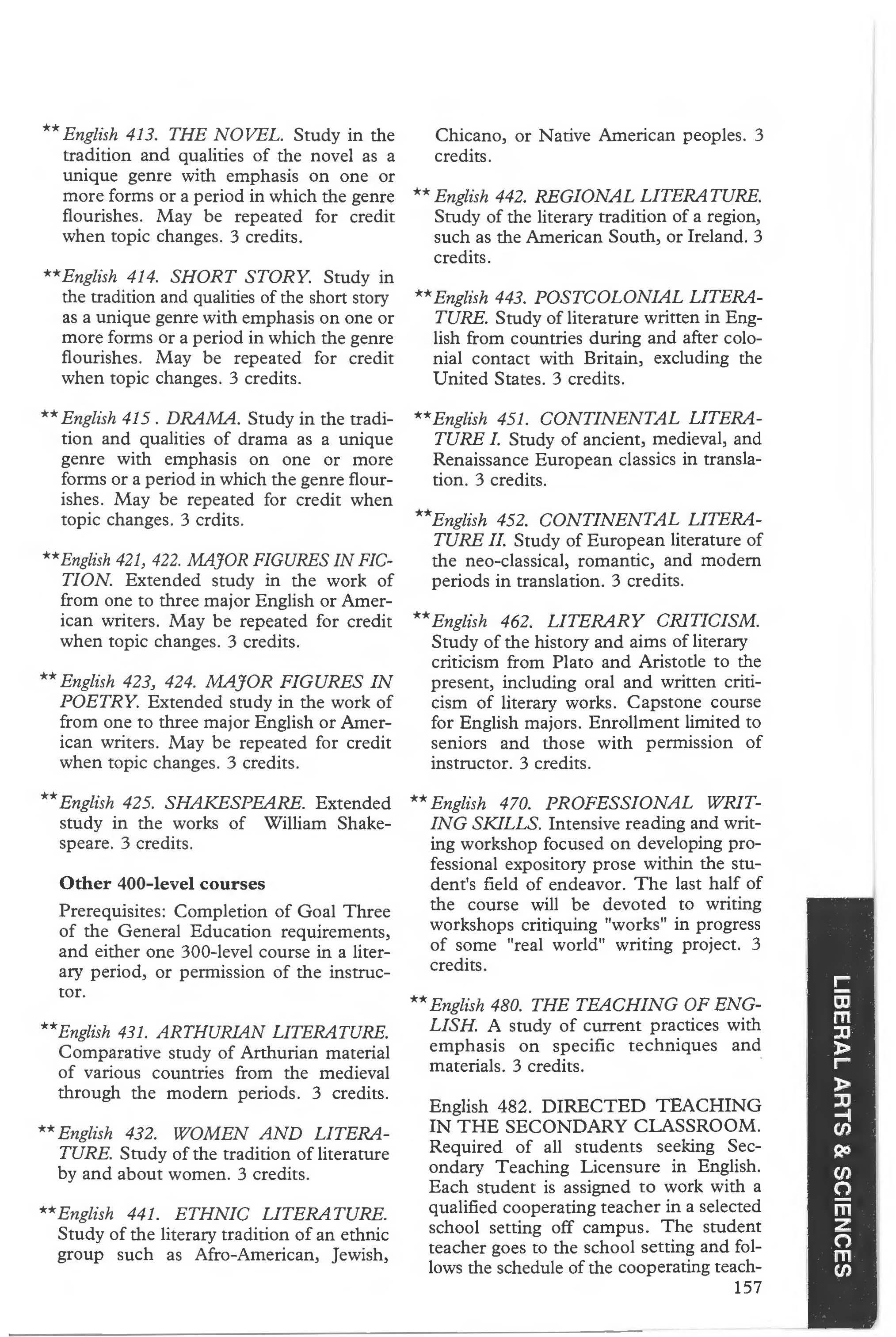
er(s) for a ten to eleven week period. This schedule involves a minimum teaching day of six hours for five days each week for ten/eleven weeks (300 hours total). Prerequisite: Completion of all methods courses with English 480 and 483 having been taken within two years of student teaching. Minimum cumulative GPA of 2.5. 10 credits.
English 483. WRITING: THEORY AND PRACTICE. A study of strategies for improving writing. Includes discussion of analyzing subject matter, determining purpose and audience, drafting, revising, editing (including using correct mechanics), and evaluating the elements of effective writing. 3 credits.
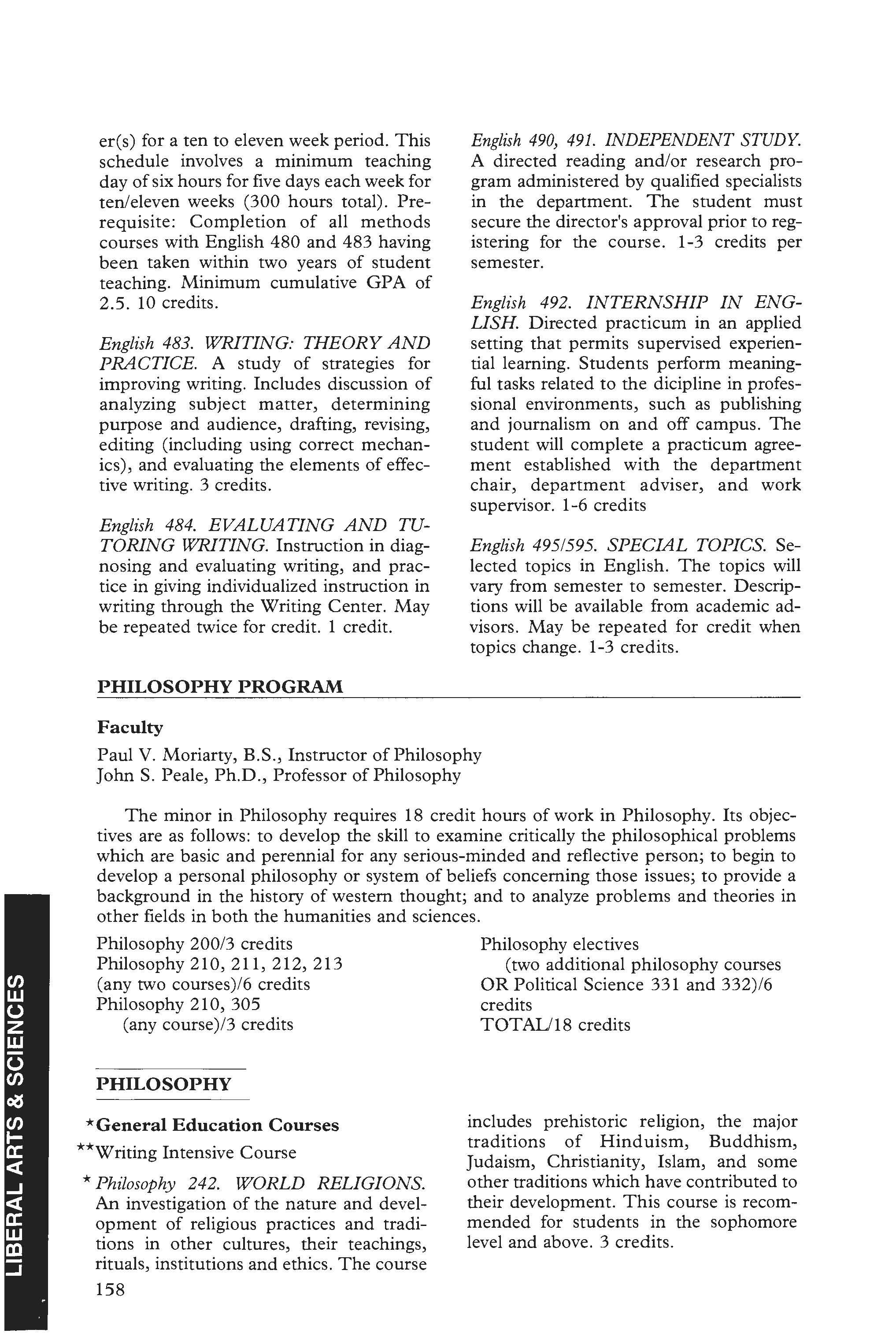
English 484. EVALUATING AND TUTORING WRITING. Instruction in diagnosing and evaluating writing, and practice in giving individualized instruction in writing through the Writing Center. May be repeated twice for credit. 1 credit.
English 490, 491. INDEPENDENT STUDY. A directed reading and/or research program administered by qualified specialists in the department. The student must secure the director's approval prior to registering for the course. 1-3 credits per semester.
English 492. INTERNSHIP IN ENGLISH. Directed practicum in an applied setting that permits supervised experiential learning. Students perform meaningful tasks related to the dicipline in professional environments, such as publishing and journalism on and off campus. The student will complete a practicum agreement established with the department chair, department adviser, and work supervisor. 1-6 credits
English 495/595. SPECIAL TOPICS. Selected topics in English. The topics will vary from semester to semester. Descriptions will be available from academic advisors. May be repeated for credit when topics change. 1-3 credits.
PROGRAM FacultyThe minor in Philosophy requires 18 credit hours of work in Philosophy. Its objectives are as follows: to develop the skill to examine critically the philosophical problems which are basic and perennial for any serious-minded and reflective person; to begin to develop a personal philosophy or system of beliefs concerning those issues; to provide a background in the history of western thought; and to analyze problems and theories in other fields in both the humanities and sciences.
Philosophy 200/3 credits
Philosophy 210, 211, 212, 213 (any two courses)/6 credits
Philosophy 210, 305 (any course)/3 credits
* General Education Courses
**Writing Intensive Course
* Philosophy 242. WORLD RELIGIONS. An investigation of the nature and development of religious practices and traditions in other cultures, their teachings, rituals, institutions and ethics. The course
Philosophy electives (two additional philosophy courses OR Political Science 331 and 332)/6 credits
TOTAIJ18 credits includes prehistoric religion, the major traditions of Hinduism, Buddhism, Judaism, Christianity, Islam, and some other traditions which have contributed to their development. This course is recommended for students in the sophomore level and above. 3 credits.
**Philosophy 200. INTRODUCTION TO PHILOSOPHY. Critical examination of basic problems of philosophy in various fields, e.g. ethics, religion, psychology. Attention to both critical analysis and systematic thinking. An introduction to ideas considered in most of the remaining courses in philosophy. Attention to the development of a system of beliefs in the student. Modem and contemporary readings. 3 credits.
Philosophy 201. INTRODUCTION TO CONTEMPORARY MORAL ISSUES. An introduction to the philosophical analysis of today's moral problems. Emphasis on the detection of moral problems, moral reasoning, and resolution of moral dilemmas posed by contemporary issues such as capital punishment, suicide, war, famine relief, euthanasia, abortion, affirmative action, and environmental and sexual ethics. Discussion of case studies emphasized. 3 credits.
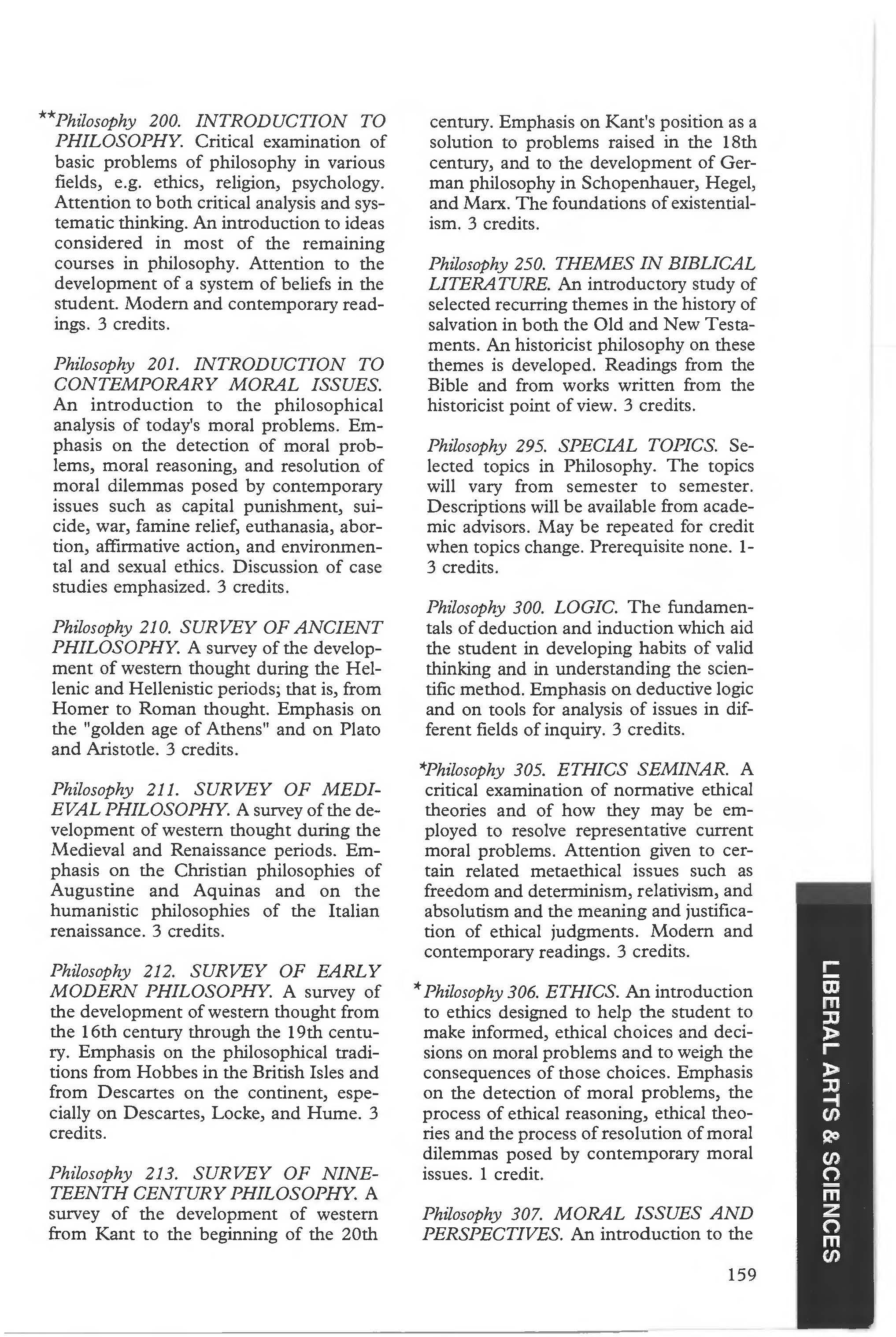
Philosophy 210. SURVEY OF ANCIENT PHILOSOPHY. A survey of the development of western thought during the Hellenic and Hellenistic periods; that is, from Homer to Roman thought. Emphasis on the "golden age of Athens" and on Plato and Aristotle. 3 credits.
Philosophy 211. SURVEY OF MEDIEVAL PHILOSOPHY. A survey of the development of western thought during the Medieval and Renaissance periods. Emphasis on the Christian philosophies of Augustine and Aquinas and on the humanistic philosophies of the Italian renaissance. 3 credits.
Philosophy 212. SURVEY OF EARLY MODERN PHILOSOPHY. A survey of the development of western thought from the 16th century through the 19th century. Emphasis on the philosophical traditions from Hobbes in the British Isles and from Descartes on the continent, especially on Descartes, Locke, and Hume. 3 credits.
Philosophy 213. SURVEY OF NINETEENTH CENTURY PHILOSOPHY. A survey of the development of western from Kant to the beginning of the 20th
century. Emphasis on Kant's position as a solution to problems raised in the 18th century, and to the development of German philosophy in Schopenhauer, Hegel, and Marx. The foundations of existentialism. 3 credits.
Philosophy 250. THEMES IN BIBLICAL LITERATURE. An introductory study of selected recurring themes in the history of salvation in both the Old and New Testaments. An historicist philosophy on these themes is developed. Readings from the Bible and from works written from the historicist point of view. 3 credits.
Philosophy 295. SPECIAL TOPICS. Selected topics in Philosophy. The topics will vary from semester to semester. Descriptions will be available from academic advisors. May be repeated for credit when topics change. Prerequisite none. 13 credits.
Philosophy 300. LOGIC. The fundamentals of deduction and induction which aid the student in developing habits of valid thinking and in understanding the scientific method. Emphasis on deductive logic and on tools for analysis of issues in different fields of inquiry. 3 credits.
*Philosophy 305. ETHICS SEMINAR. A critical examination of normative ethical theories and of how they may be employed to resolve representative current moral problems. Attention given to certain related metaethical issues such as freedom and determinism, relativism, and absolutism and the meaning and justification of ethical judgments. Modem and contemporary readings. 3 credits.
* Philosophy 306. ETHICS. An introduction to ethics designed to help the student to make informed, ethical choices and decisions on moral problems and to weigh the consequences of those choices. Emphasis on the detection of moral problems, the process of ethical reasoning, ethical theories and the process of resolution of moral dilemmas posed by contemporary moral issues. I credit.
Philosophy 307. MORAL ISSUES AND PERSPECTIVES. An introduction to the
philosophical analysis of today's moral problems and the "care and justice" perspectives in which such problems may be resolved. (Students may not receive credit for both Philosophy 201 and 307). Prerequisite: Philosophy 306. 2 credits.
Philosophy 310. BUSINESS ETHICS. A study of ethical theory and an application of its principles and concepts to the analysis and solution of cases of moral problems in business. Emphasis will be on detection of moral problems in business, on normative ethical theories, on such fundamental concepts as autonomy, responsibility and justice, and on the process of ethical reasoning required to resolve a variety of moral problems actually encountered in the business world. 3 credits.
Philosophy 315. BIOMEDICAL ETHICS. Ethical inquiry into the concepts of person, autonomy, rights, responsibility, and justice relevant to biomedicine and their application to issues of euthanasia, abortion, genetic control, the definition of death, allocation of scarce medical resources, experimentation with human beings, and intentional deception in biomedicine. 3 credits.
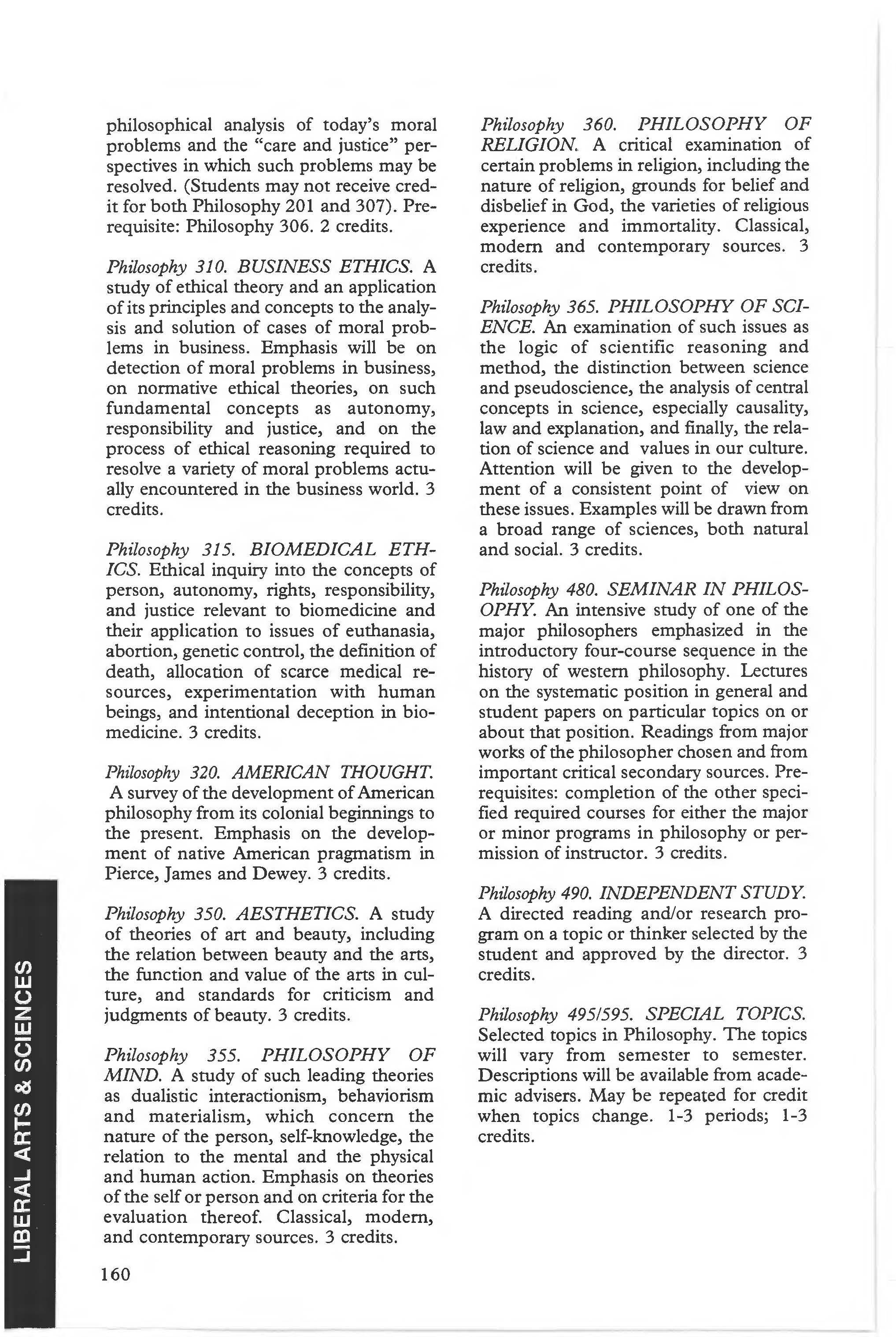
Philosophy 320. AMERICAN THOUGHT. A survey of the development of American philosophy from its colonial beginnings to the present. Emphasis on the development of native American pragmatism in Pierce, James and Dewey. 3 credits.
Philosophy 350. AESTHETICS. A study of theories of art and beauty, including the relation between beauty and the arts, the function and value of the arts in culture, and standards for criticism and judgments of beauty. 3 credits.
Philosophy 355. PHILOSOPHY OF MIND. A study of such leading theories as dualistic interactionism, behaviorism and materialism, which concern the nature of the person, self-knowledge, the relation to the mental and the physical and human action. Emphasis on theories of the self or person and on criteria for the evaluation thereof. Classical, modern, and contemporary sources. 3 credits.
Philosophy 360. PHILOSOPHY OF RELIGION A critical examination of certain problems in religion, including the nature of religion, grounds for belief and disbelief in God, the varieties of religious experience and immortality. Classical, modern and contemporary sources. 3 credits.
Philosophy 365. PHILOSOPHY OF SCIENCE. An examination of such issues as the logic of scientific reasoning and method, the distinction between science and pseudoscience, the analysis of central concepts in science, especially causality, law and explanation, and finally, the relation of science and values in our culture. Attention will be given to the development of a consistent point of view on these issues. Examples will be drawn from a broad range of sciences, both natural and social. 3 credits.
Philosophy 480. SEMINAR IN PHILOSOPHY. An intensive study of one of the major philosophers emphasized in the introductory four-course sequence in the history of western philosophy. Lectures on the systematic position in general and student papers on particular topics on or about that position. Readings from major works of the philosopher chosen and from important critical secondary sources. Prerequisites: completion of the other specified required courses for either the major or minor programs in philosophy or permission of instructor. 3 credits.
Philosophy 490. INDEPENDENT STUDY. A directed reading and/or research program on a topic or thinker selected by the student and approved by the director. 3 credits.
Philosophy 495/595. SPECIAL TOPICS. Selected topics in Philosophy. The topics will vary from semester to semester. Descriptions will be available from academic advisers. May be repeated for credit when topics change. 1-3 periods; 1-3 credits.
The Modem Languages program offers courses in French, German, and Spanish. The major in Modem Languages requires a concentration in one of these three languages (33 hours beyond 202) and a second modem language (3 hours at the 202-level or above) No grade below "C" in the language of the concentration is accepted for graduation requirements for the major or minor in that language.
Students preparing to teach must take 36 semester hours of modem foreign language, including courses in advanced grammar and composition, conversation, culture and civilization, literature, applied linguistics, and methods. Second language endorsement requires 24 semester hours (at least 12 of which must be beyond intermediate level). Advanced placement reduces proportionately the number of hours required by the Commonwealth of Virginia for endorsement.
Modem Language majors are required to complete at least one regular semester in a college-approved study abroad program. Students must have a cumulative grade point average of at least 2.5 to be eligible for study abroad Longwood sponsors regular semester study abroad programs with the University of Salzburg in Austria, with Heidelberg College at the University of Heidelberg in Germany, with the VENUSA program at the University of the Andes in Merida, Venezuela, and with the Institute of Spanish Studies in Valencia, Spain. The college also offers regular semester abroad programs sponsored by the Council on International Educational Exchange at various universities in France. Summer programs are available in France, Spain, Venezuela, and with the University of the Antilles in Martinique.
Supporting courses are recommended in the other humanities. Greek, Latin, and Russian may be taken at Hampden-Sydney College.
The Department requires student outcomes assessment testing prior to graduation.
B. McRae Amoss, Ph.D., Associate Professor of French Francis X. Moore, III, Ph.D., Associate Professor of French John F. Reynolds, Ph .D., Professor of Modem Languages
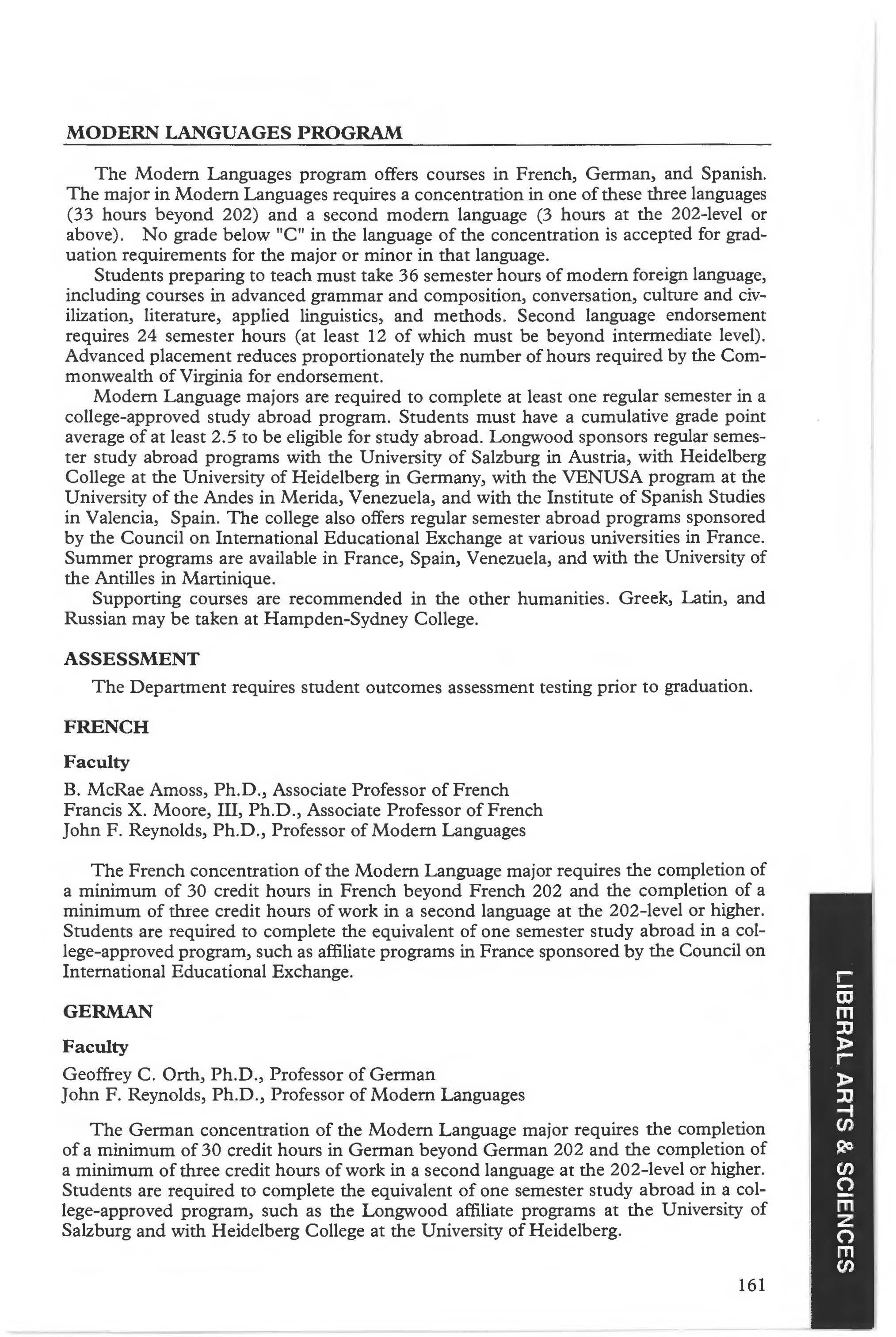
The French concentration of the Modem Language major requires the completion of a minimum of 30 credit hours in French beyond French 202 and the completion of a minimum of three credit hours of work in a second language at the 202-level or higher. Students are required to complete the equivalent of one semester study abroad in a college-approved program, such as affiliate programs in France sponsored by the Council on International Educational Exchange.
Geoffrey C. Orth, Ph.D., Professor of German John F. Reynolds, Ph.D., Professor of Modem Languages
The German concentration of the Modem Language major requires the completion of a minimum of 30 credit hours in German beyond German 202 and the completion of a minimum of three credit hours of work in a second language at the 202-level or higher. Students are required to complete the equivalent of one semester study abroad in a college-approved program, such as the Longwood affiliate programs at the University of Salzburg and with Heidelberg College at the University of Heidelberg.
Ruth Budd, Ph.D., Assistant Professor of Spanish Isabel Dulfano, Ph.D., Assistant Professor of Spanish Lily Anne Goetz, Ph.D., Associate Professor of Spanish
The Spanish concentration of the Modem Language major requires the completion of a minimum of 33 credit hours of work beyond Spanish 202 and the completion of three credit hours of work in a second language beyond at the 202-level or higher. Students are required to complete the equivalent of one semester study abroad in a college-approved program, such as the affiliate program in Valencia, Spain at the Institute of Spanish Studies or with the VENUSA program in Merida, Venezuela.
A. General Education Core Requirements. 33 credits. See General Education Requirements listed on pages 61-63. The Department requires Philosophy 306 for satisfaction of Goal 10.)
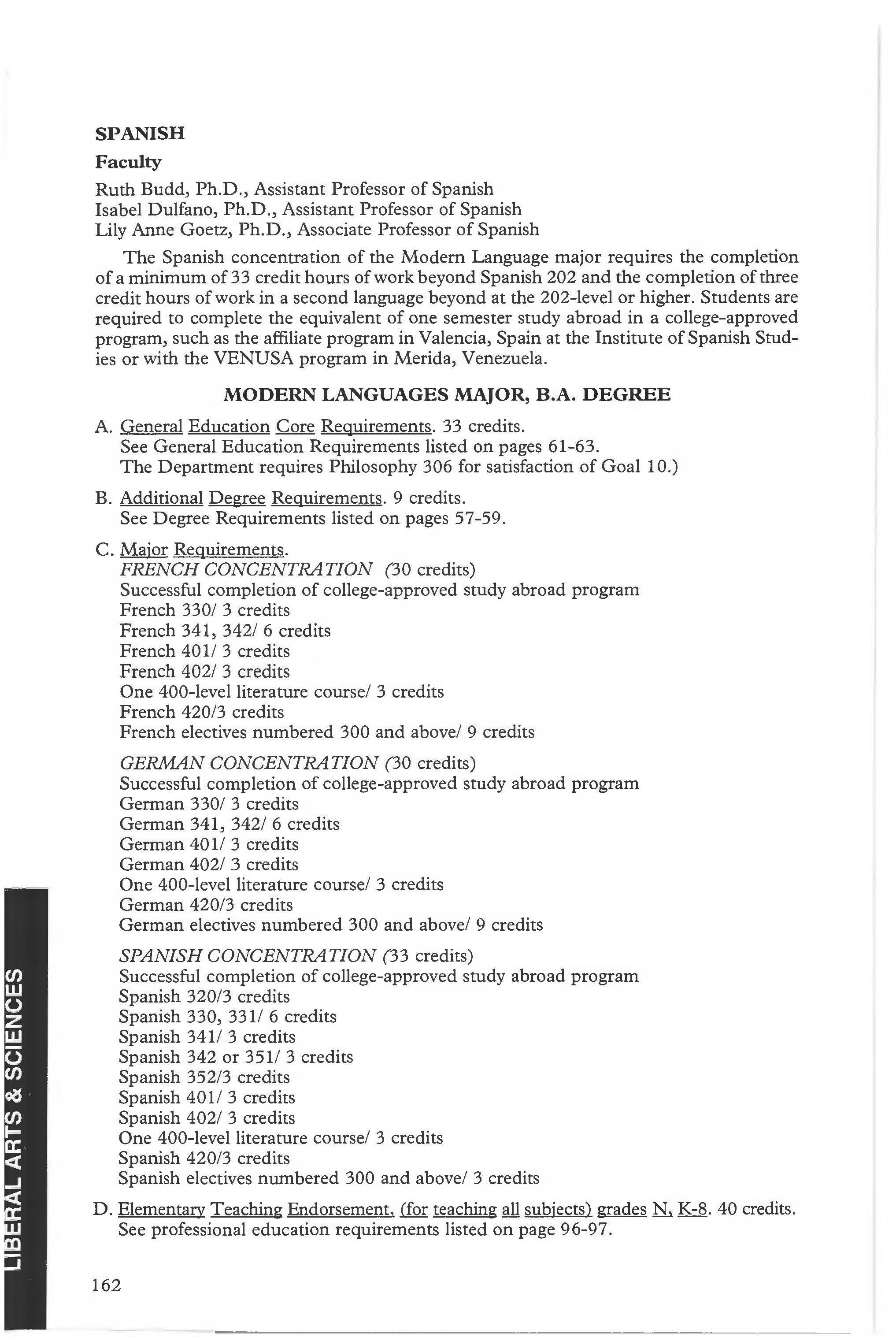
B. Additional Degree Requirements. 9 credits. See Degree Requirements listed on pages 57-59.
C. Major Requirements.
FRENCH CONCENTRATION (30 credits)
Successful completion of college-approved study abroad program
French 330/ 3 credits
French 341, 342/ 6 credits
French 401/ 3 credits
French 402/ 3 credits
One 400-level literature course/ 3 credits
French 420/3 credits
French electives numbered 300 and above/ 9 credits
GERMAN CONCENTRATION (30 credits)
Successful completion of college-approved study abroad program
German 330/ 3 credits
German 341, 342/ 6 credits
German 401/ 3 credits
German 402/ 3 credits
One 400-level literature course/ 3 credits German 420/3 credits
German electives numbered 300 and above/ 9 credits
SPANISH CONCENTRATION (33 credits)
Successful completion of college-approved study abroad program
Spanish 320/3 credits
Spanish 330, 331/ 6 credits
Spanish 341/ 3 credits
Spanish 342 or 351/ 3 credits
Spanish 352/3 credits
Spanish 401/ 3 credits
Spanish 402/ 3 credits
One 400-level literature course/ 3 credits
Spanish 420/3 credits
Spanish electives numbered 300 and above/ 3 credits
D. Elementary Teaching Endorsement, .(fur teaching all subjects) grades~ K-8. 40 credits. See professional education requirements listed on page 96-97.
E. Secondary Teaching Endorsement, grades 8-12 . 34 credits. See professional education requirements listed on page 97.
Additional endorsement requirement:
FREN 400. Approaches to Teaching French/3 credits or
GERM 400 Approaches to Teaching German/3 credits or SPAN 400 Approaches to Teaching Spanish/3 credits
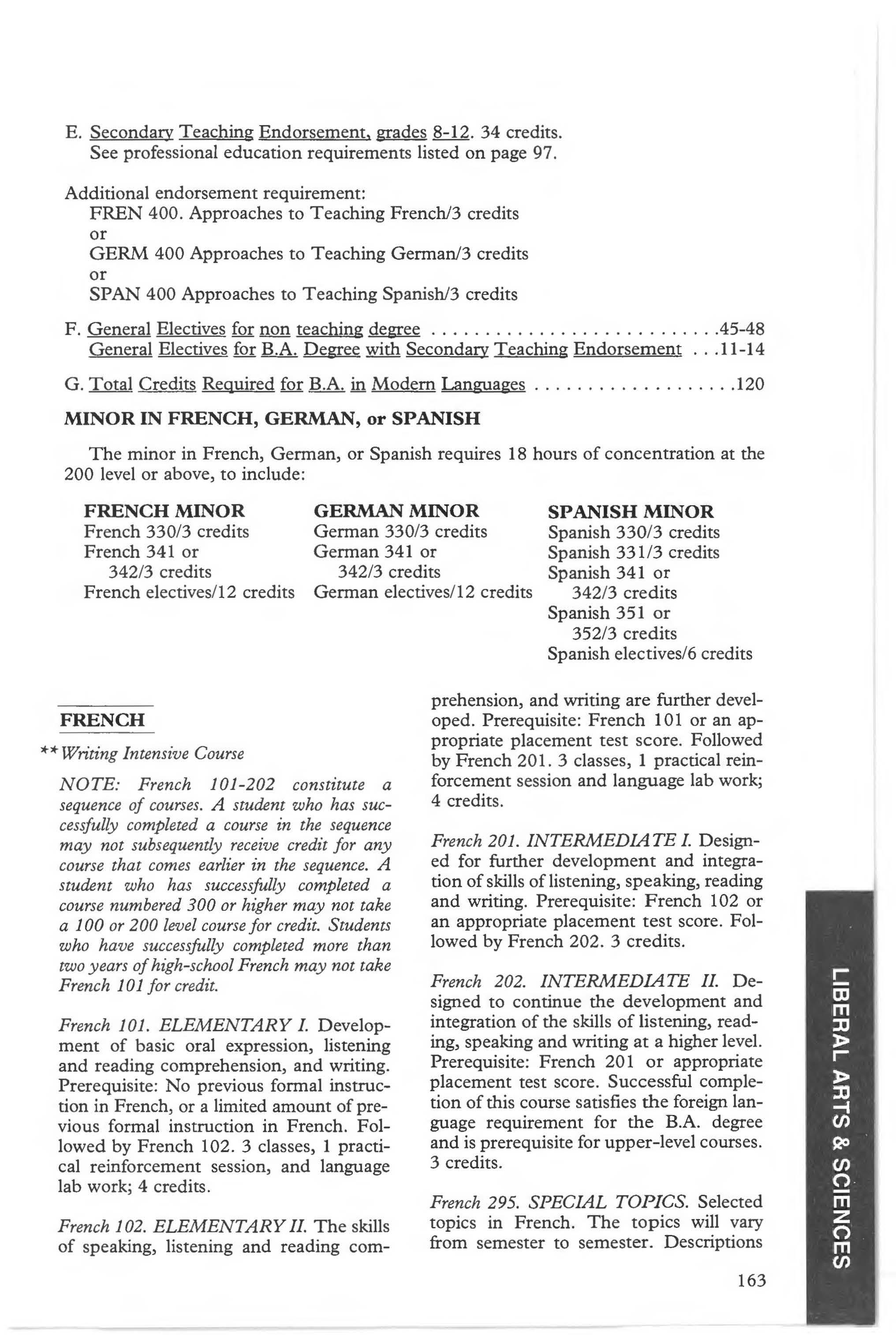
F. General Electives for non teaching degree ....... . ............ .. . .. .. 45-48 General Electives for B.A. Degree with Secondary Teaching Endorsement .. . 11-14
G. Total Credits Required for B.A. in Modem Languages 120
The minor in French, German, or Spanish requires 18 hours of concentration at the 200 level or above, to include:
FRENCH MINOR
French 330/3 credits
French 341 or
GERMAN MINOR
SPANISH MINOR
Spanish 330/3 credits Spanish 331/3 credits Spanish 341 or 342/3 credits 342/3 credits
German 330/3 credits German 341 or
French electives/ 12 credits German electives/12 credits 342/3 credits Spanish 351 or 352/3 credits
Spanish electives/6 credits
NOTE: French 101-202 constitute a sequence of courses. A student who has successfully completed a course in the sequence may not subsequently receive credit for any course that comes earlier in the sequence. A student who has successfully completed a course numbered 300 or higher may not take a 100 or 200 level course for credit. Students who have successfully completed more than two years of high-school French may not take French 101 for credit.
French 101. ELEMENTARY I. Development of basic oral expression, listening and reading comprehension, and writing. Prerequisite: No previous formal instruction in French, or a limited amount of previous formal instruction in French. Followed by French 102. 3 classes, 1 practical reinforcement session, and language lab work; 4 credits.
French 102. ELEMENTARY II. The skills of speaking, listening and reading com-
prehension, and writing are further developed. Prerequisite: French 101 or an appropriate placement test score Followed by French 201 3 classes, 1 practical reinforcement session and language lab work; 4 credits.
French 201. INTERMEDIATE I. Designed for further development and integration of skills of listening, speaking, reading and writing. Prerequisite: French 102 or an appropriate placement test score. Followed by French 202. 3 credits.
French 202. INTERMEDIATE II. Designed to continue the development and integration of the skills of listening, reading, speaking and writing at a higher level. Prerequisite: French 201 or appropriate placement test score. Successful completion of this course satisfies the foreign language requirement for the B.A. degree and is prerequisite for upper-level courses. 3 credits.
French 295. SPECIAL TOPICS. Selected topics in French. The topics will vary from semester to semester. Descriptions
will be available from academic advisors. May be repeated for credit when topics change. Prerequisite French 202. 1-3 credits.
French 311, 312. FRENCH STUDIES ABROAD. Primarily intended for transfer of credit earned abroad in courses on French language, civilization, or culture. 1-16 credits per semester.
French 320. ADVANCED READING SKILLS. Reading strategies for better comprehension of written texts; students will learn to read for a purpose, utilize background knowledge, and recover inferential meaning. Readings will include articles and texts about current social environmental, scientific, leisure, or educational issues, as well as literary texts (short story, drama, poetry). 3 credits.
French 330. CIVILIZATION AND CULTURE. A study of French civilization and culture with emphasis on social institutions of the current century. Prerequisite: French 202. 3 credits
French 341. A SURVEY OF FRENCH LITERATURE I. THE MIDDLE AGES THROUGH THE ENLIGHTENMENT. A study of representative works and literary movements in French literature from the Middle Ages through the Enlightenment. Students will learn to use the methods and language of literary analysis. Prerequisite: French 202 or equivalent. 3 credits.
French 342. SURVEY OF FRENCH LITERATURE II: ROMANTICISM THROUGH THE NEW NOVEL. A study of representative works and literary movements in French literature of the nineteenth and twentieth centuries. Students will learn to use the methods and language of literary analysis. Prerequisite: French 202 or equivalent . 3 credits.
French 400. APPROACHES TO TEACHING FRENCH. Theory and practice. Recommended to be taken in the semester prior to student teaching. 3 credits.
**French 401. ADVANCED GRAMMAR AND COMPOSITION. Syntax and
grammar through written work. Prerequisite: French 202 or equivalent. 3 credits.
French 402. ADVANCED CONVERSATION AND PHONETICS. Theory and practice in the spoken language. Current techniques and their uses in attaining mastery of oral French. Prerequisite: French 202 or equivalent. 3 credits.
**French 411, 412. STUDIES IN LITERARY GENRE. Study of a particular genre in French literature, such as the Nouveau Roman, short story, romantic theater, symbolist poetry. Prerequisite: French 341 and 342. 3 credits.
**French 413, 414. FRENCH LITERARY MOVEMENTS. Study of a particular movement or period in French literature, such as Realism, Neo-classicism, Naturalism, Surrealism, Existentialism. Prerequisite: French 341 and 342. 3 credits.
**French 415, 416. MAJOR FRENCH AUTHORS. Study of a particular author of French literature, such as Montaigne, Sartre, Hugo, Voltaire, Valery. Prerequisite: French 341 and 342. 3 credits.
**French 420. SENIOR SEMINAR: LITERATURE IN CULTURAL/HISTORICAL CONTEXT. A seminar for senior modem language majors concentrating in French, designed to integrate knowledge of French and Francophone history and culture as a background for literary analysis. Prerequisite: French 341 and 342. 3 credits.
French 482. DIRECTED TEACHING IN THE SECONDARY FRENCH CLASSROOM. Required of all students seeking Secondary Teaching Licensure in French. Each student is assigned to work with a qualified cooperating teacher(s) in a selected school setting off campus. The student teacher goes to the school setting and follows the schedule of the cooperating teacher(s) for a ten to eleven week period. This schedule involves a minimum teaching day of five to six hours for five days each week for ten to eleven weeks (300 hours total). Prerequisite: Completion of the Modern Language major (French concentration), Study Abroad requirement, and a minimum GPA of 2.5. 10 credits.
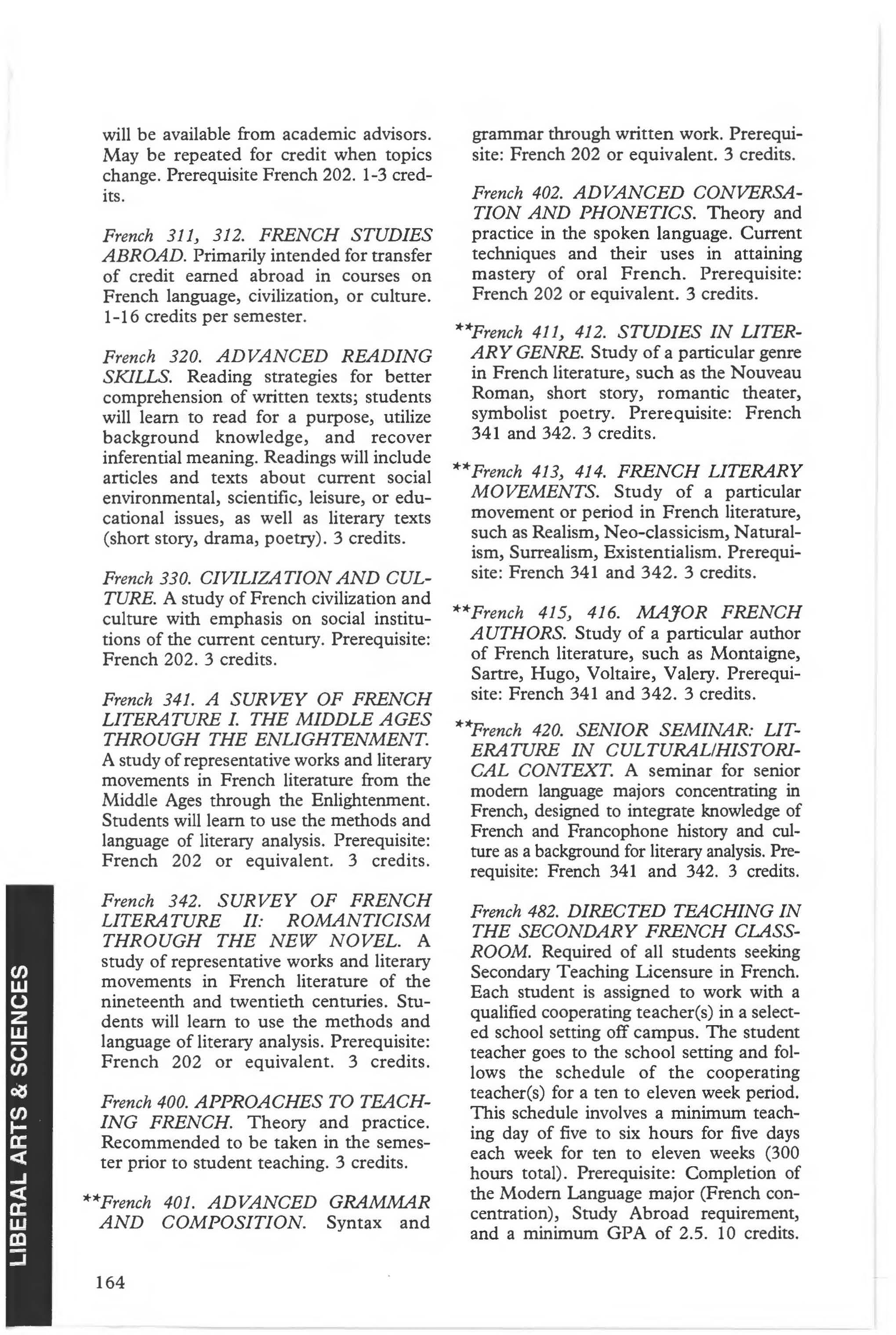
French 490, 491. DIRECTED STUDY. Individualized study; recommended only when material cannot be covered m scheduled courses. By permission of department head. 6 credits maximum.
French 492. INTERNSHIP IN FRENCH. Directed practicum in an applied setting that permits experiential learning. Students learn through performance in meaningful tasks in a variety of professional environments, such as foreign trade missions, government agencies, or the travel industry. It is intended for seniors not seeking teacher certification. Prerequisite: Permission of the instructor. 1-16 credits.
French 495-595. SPECIAL TOPICS. Selected topics in French. The topics will vary from semester to semester. Descriptions will be available from academic advisors. May be repeated for credit when topics change. 1-3 credits.
NOTE: German 101-202 constitute a sequence of courses. A student who has successfully completed a course in the sequence may not subsequently receive credit for any course that comes earlier in the sequence. A student who has successfully completed a course numbered 300 or higher may not take a 100 or 200 level course for credit. Students who have successfully completed more than two years of high-school German may not take German 101 for credit.
German 101. ELEMENTARY I. Development of basic oral expression, listening and reading comprehension, and writing. Prerequisite: No previous formal instruction in German, or a limited amount of previous formal instruction in German. Followed by German 102. 3 classes, 1 practical reinforcement session, and language lab work; 4 credits.
German 102. ELEMENTARY JI. The skills of speaking, listening and reading comprehension, and writing are further developed. Prerequisite: German 101 or one or two years of previous formal instruction in German and an appropriate placement test score. Followed by German 201. 3 classes, 1 practical reinforce-
ment session, and language lab work; 4 credits.
German 201. INTERMEDIATE I. Designed for further development and integration of the skills of listening, speaking, reading and writing. Prerequisite: German 102 or one to four years of formal instruction in German and an appropriate placement test score. Followed by German 202. 3 credits.
German 202. INTERMEDJA TE JI. Designed to continue the development and integration of the skills of listening, reading, speaking and writing at a higher level. Prerequisite: German 201 or an appropriate placement test score. Successful completion of this course satisfies the foreign language requirement for the B.A. degree and is prerequisite for upperlevel courses. 3 credits.
German 295. SPECIAL TOPICS. Selected topics in German. The topics will vary from semester to semester. Descriptions will be available from academic advisors. May be repeated for credit when topics change. Prerequisite German 202. 1-3 credits.
German 311, 312. GERMAN STUDIES ABROAD. Primarily intended for transfer of credit earned abroad in courses on German language, civilization, or culture. 316 credits per semester.
German 320. ADVANCED READING SKILLS. Reading strategies for better comprehension of written texts; students will learn to read for a purpose, utilize background knowledge, and recover inferential meaning. Readings will include articles and texts about current social environmental, scientific, leisure, or educational issues, as well as literary texts (short story, drama, poetry). 3 credits.

German 330. CIVILIZATION AND CULTURE. A study of German civilization and culture with emphasis on social institutions of the current century. Prerequisite: German 202. 3 credits.
**German 341. SURVEY OF GERMAN LITERATURE I: THE AGE OF
GOETHE. A study of representative works and literary movements in German literature from the Enlightenment through Romanticism. Students will learn to use the methods and language of literary analysis. Prerequisite: German 202 or equivalent. 3 credits.
** German 342. SURVEY OF GERMAN LITERATURE II: REALISM TO THE PRESENT. A survey of 19th and 20th century German literature from Realism to the present with emphasis on dramatic and prose forms. Students will learn to use the methods and language of literary analysis. Prerequisite: German 202 or equivalent. 3 credits.
German 400. APPROACHES TO TEACHING GERMAN. Theory and practice. Recommended to be taken in the semester prior to student teaching. 3 credits.
*>lCJerman 401. ADVANCED GRAMMAR AND COMPOSITION. Syntax and grammar through written work. Writing Intensive course. Prerequisite: German 202 or equivalent. 3 credits.
German 402. ADVANCED CONVERSATION AND PHONETICS. Theory and practice in the spoken language, Current techniques and their uses in attaining mastery of oral German. Prerequisite: German 202 or equivalent. 3 credits.
**German 411, 412. STUDIES IN LITERARY GENRE. Study of a particular genre in German literature, such as the Novelle, lyric poetry, the German novel, modern drama, short story. Prerequisite: German 341 and 342. 3 credits.
**German 413, 414. GERMAN LITERARY MOVEMENTS. Study of a particular movement or period in German literature, such as Romanticism, the Age of Goethe, Sturm und Drang, Realism, Naturalism. Prerequisite: German 341 and 342. 3 credits.
**German 415, 416. MAJOR GERMAN AUTHORS. Study of a particular German author such as Goethe, Schiller, Kleist, Kafka, Thomas Mann. Prerequisite: German 341 and 342. 3 credits.
*>lCJerman 420. SENIOR SEMINAR: LITERATURE IN CULTURAL/HISTORICAL CONTEXT. A seminar for senior modern language majors concentrating in German designed to integrate knowledge of German history and culture as a background for literary analysis. Prerequisites: German 341 and 342. 3 credits.
German 482. DIRECTED TEACHING IN THE SECONDARY GERMAN CLASSROOM. Required of all students seeking Secondary Teaching Licensure in German. Each student is assigned to work with a qualified cooperating teacher(s) in a selected school setting off campus. The student teacher goes to the school setting and follows the schedule of the cooperating teacher(s) for a ten to eleven week period. This schedule involves a minimum teaching day of five to six hours for five days each week for ten to eleven weeks (300 hours total). Prerequisite: Completion of the Modern Languages major (German concentration) the Study Abroad requirement, and a minimum GPA of2.5. 10 credits.
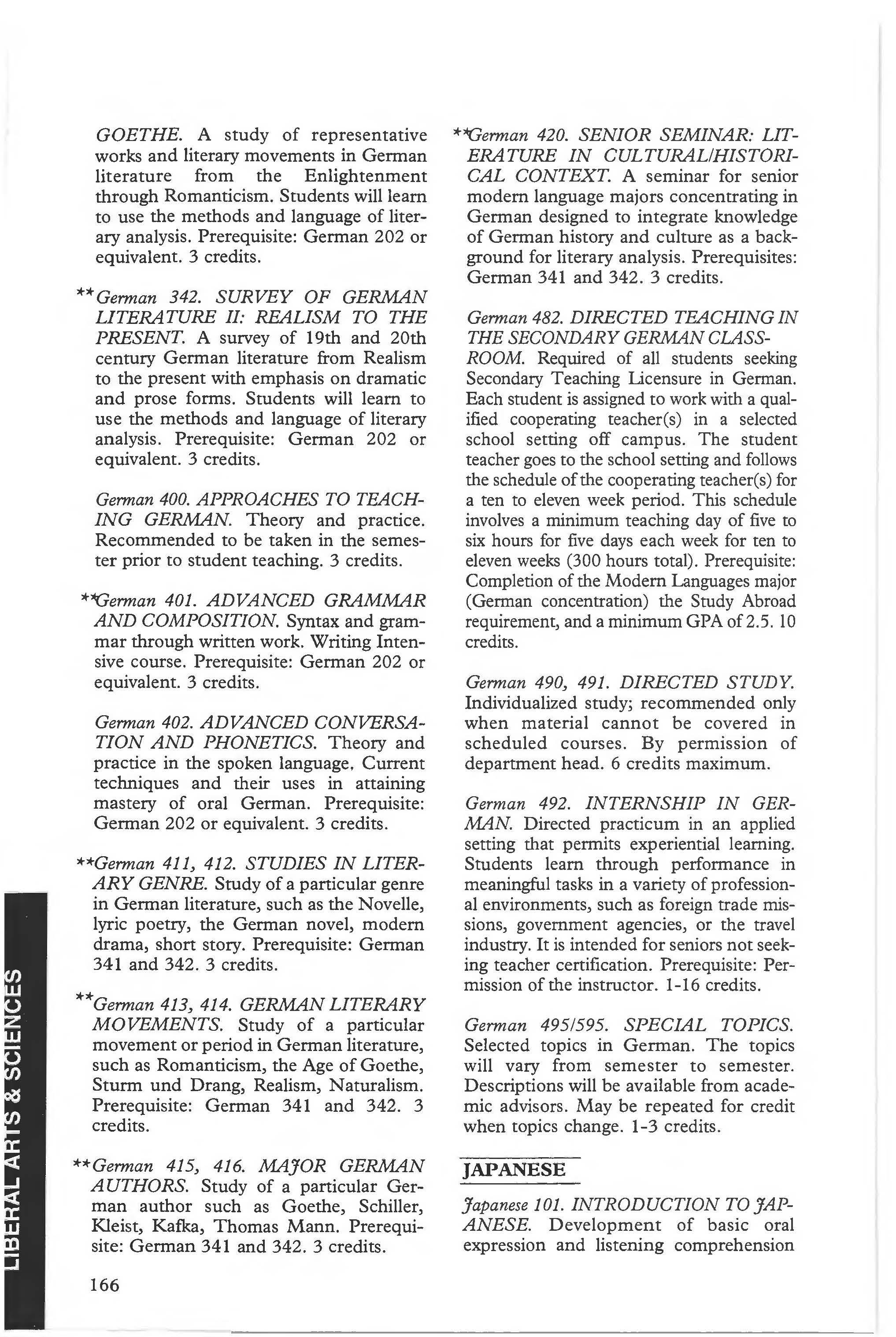
German 490, 491. DIRECTED STUDY. Individualized study; recommended only when material cannot be covered m scheduled courses. By permission of department head. 6 credits maximum.
German 492. INTERNSHIP IN GERMAN. Directed practicum in an applied setting that permits experiential learning. Students learn through performance in meaningful tasks in a variety of professional environments, such as foreign trade missions, government agencies, or the travel industry. It is intended for seniors not seeking teacher certification. Prerequisite: Permission of the instructor. 1-16 credits.
German 495/595. SPECIAL TOPICS. Selected topics in German. The topics will vary from semester to semester. Descriptions will be available from academic advisors. May be repeated for credit when topics change. 1-3 credits.
Japanese 101. INTRODUCTION TO JAPANESE. Development of basic oral expression and listening comprehension
of the Japanese language. Introduction to basic socio-cultural aspects of modem Japan. No previous study of Japanese required or expected. Three lecture hours and 1 practical reinforcement period per week, and required language lab work. 4 credits.
Japanese 102. ELEMENTARY JAPANESE II. The skills of basic oral expression and listening comprehension are further developed . Prerequisite: Japanese 101. 3 lecture and 1 practical reinforcement periods, and language lab work. 4 credits.
(Available at Hampden-Sydney College)
Russian 101-102. (3-3) INTRODUCTORY RUSSIAN. Basic writing and reading skills are taught. Grammatical concepts are explained and drilled through dictations, translations, and elementary conversation. A reasonable amount of narrative prose is read. Prerequisite for 101: none. Prerequisite for 102: 101 or equivalent. Offered: on sufficient demand.
Russian 201-202. (3-3) INTERMEDIATE RUSSIAN. Advanced grammar to be taught while translating more difficult reading material coupled with advanced conversation. Vocabulary building and active participation are encouraged. Basic composition skills are taught. Songs and poetry used to introduce students to Russian culture and art. Prerequisite for 201: 101-102 or equivalent.
NOTE: Spanish 101-202 constitute a sequence of courses . A student who has successfully completed a course in the sequence may not subsequently receive credit for any course that comes earlier in the sequence. A student who has successfully completed a course numbered 300 or higher may not take a 100 or 200 level course for credit. Students who have successfully completed more than two years of high-school Spanish may not take Spanish 101 for credit.
Spanish 101. ELEMENTARY I. Development of basic oral expression, listening and reading comprehension, and writing. Prerequisite: No previous formal instruction or a limited amount of previous formal instruction in Spanish. Followed by Spanish 102. 3 classes, 1 practical reinforcement session, and language lab work; 4 credits.
Spanish 102 . ELEMENTARY II. The skills of speaking, of listening and reading comprehension, and writing are further developed. Prerequisite: Spanish 101 or an appropriate placement test score. Followed by Spanish 201. 3 classes, 1 practical reinforcement session, and language lab work; 4 credits.
Spanish 105. INTENSIVE ELEMENTARY I-II. Development of basic oral expression, listening and reading comprehension, and writing, for students with a limited amount of previous formal instruction in Spanish. Prerequisite: one or two years of high school Spanish or other formal instruction not to exceed three years. Followed by Spanish 201. 5 classes and language lab work. 5 credits.
Spanish 201. INTERMEDIATE I. Designed for further development and integration of the skills of listening, reading, speaking and writing. Prerequisite: Spanish 102 or an appropriate placement test score. Followed by 202. 3 credits.
Spanish 202. INTERMEDIATE II. Designed to continue the development and integration of the skills of listening, reading, speaking and writing at a higher level. Prerequisite: Spanish 201 or appropriate placement test score. Successful completion of this course satisfies the foreign language requirement for the B.A. degree and is prerequisite for upper-level courses. 3 credits.
Spanish 295. SPECIAL TOPICS. Selected topics in Spanish The topics will vary from semester to semester. Descriptions will be available from academic advisors. May be repeated for credit when topics change Prerequisite Spanish 202. 1-3 credits.
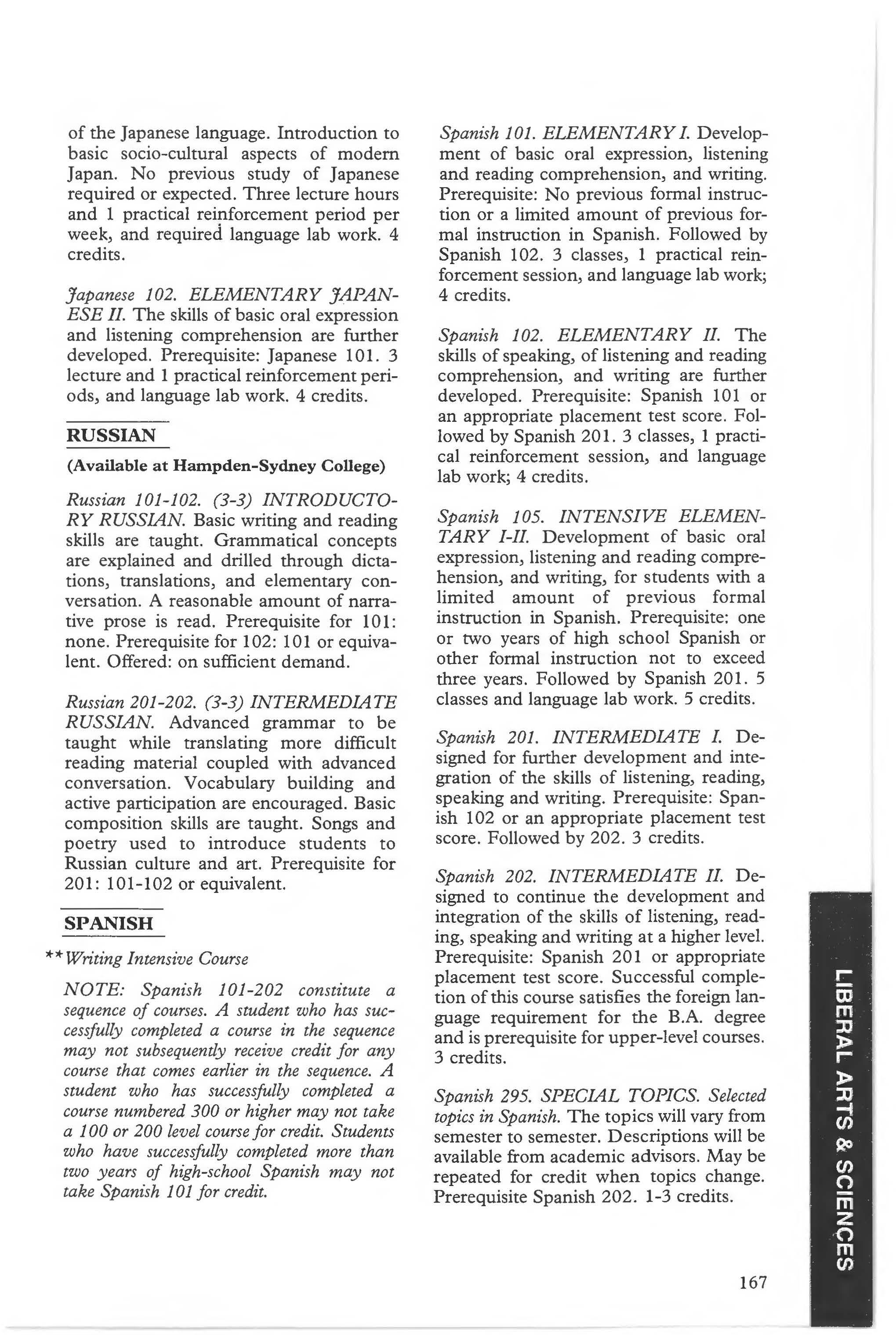
Spanish 302. CONVERSATION. Practice in oral communication skills, including expansion of vocabulary and improvement of pronunciation and listening comprehension. A functional approach, em-phasizing strategies for circumlocution, initiating and closing conversation, requesting and providing information, narrating, expressing wishes, complaints, and emotions, giving and receiving advice, and supporting opinions. Prerequisite: Spanish 202 or equivalent . 3 credits.
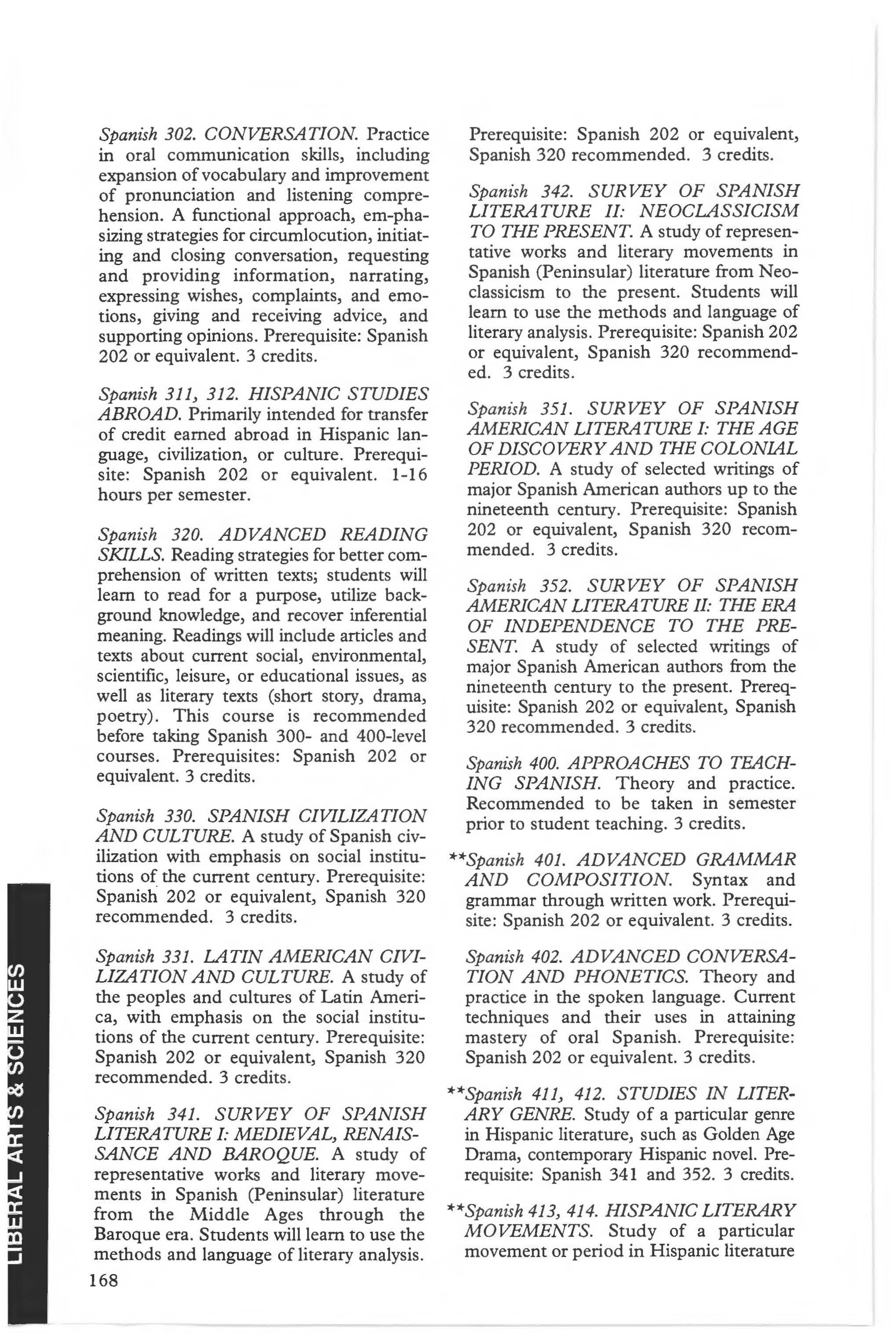
Spanish 311, 312. HISPANIC STUDIES ABROAD. Primarily intended for transfer of credit earned abroad in Hispanic language, civilization, or culture. Prerequisite: Spanish 202 or equivalent. 1-16 hours per semester
Spanish 320 ADVANCED READING SKILLS. Reading strategies for better comprehension of written texts; students will learn to read for a purpose, utilize background knowledge, and recover inferential meaning. Readings will include articles and texts about current social, environmental, scientific, leisure, or educational issues, as well as literary texts (short story, drama, poetry) . This course is recommended before taking Spanish 300- and 400-level courses. Prerequisites: Spanish 202 or equivalent 3 credits.
Spanish 330. SPANISH CIVILIZATION AND CULTURE. A study of Spanish civilization with emphasis on social institutions of the current century. Prerequisite: Spanish 202 or equivalent, Spanish 320 recommended. 3 credits.
Spanish 331 LATIN AMERICAN CIVILIZATION AND CULTURE. A study of the peoples and cultures of Latin America, with emphasis on the social institutions of the current century. Prerequisite: Spanish 202 or equivalent, Spanish 320 recommended. 3 credit s.
Spanish 341. SURVEY OF SPANISH LITERATURE I: MEDIEVAL, RENAISSANCE AND BAROQUE. A study of representative works and literary movements in Spanish (Peninsular) literature from the Middle Ages through the Baroque era. Students will learn to use the methods and language of literary analysis.
Prerequisite: Spanish 202 or equivalent, Spanish 320 recommended . 3 credits.
Spanish 342. SURVEY OF SPANISH LITERATURE II: NEOCLASSICISM TO THE PRESENT. A study of representative works and literary movements in Spanish (Peninsular) literature from Neoclassicism to the present. Students will learn to use the methods and language of literary analysis Prerequisite : Spanish 202 or equivalent, Spanish 320 recommended. 3 credits
Sp a nish 351. SURVEY OF SPANISH AMERICAN LITERATURE I : THE AGE OF DISCOVERY AND THE COLONIAL PERIOD. A study of selected writings of major Spanish American authors up to the nineteenth century Prerequisite : Spanish 202 or equivalent, Spanish 320 recommended. 3 credits.
Span ish 352 SURVEY OF SPANISH AMERICAN LITERATURE II: THE ERA OF INDEPENDENCE TO THE PRESENT. A study of selected writings of major Spanish American authors from the nineteenth century to the present . Prerequisite : Spanish 202 or equivalent, Spanish 320 recommended 3 credits
Spanish 400 APPROACHES TO TEACHING SPANISH. Theory and practice. Recommended to be taken in semester prior to student teaching . 3 credits.
**Sp a nish 401. ADVANCED GRAMMAR AND COMPOSITION. Syntax and grammar through written work Prerequisite: Spanish 202 or equivalent. 3 credits.
Spanish 402. ADVANCED CONVERSATION AND PHONETICS. Theory and practice in the spoken language. Current techniques and their uses in attaining mastery of oral Spanish Prerequisite: Spanish 202 or equivalent. 3 credits .
**Spanish 411, 412. STUDIES IN LITERARY GENRE. Study of a particular genre in Hispanic literature, such as Golden Age Drama, contemporary Hispanic novel. Prerequisite: Spanish 341 and 352. 3 credits.
**Spanish 413,414 HISPANIC LITERARY MOVEMENTS. Study of a particular movement or period in Hispanic literature
such as Romanticism, Realism, Naturalism, Modernism, and the Generation of '98. Prerequisite: Spanish 341 and 352. 3 credits.
*Spanish 415, 416. HISPANIC AUTHORS. Study of a particular Hispanic author. Prerequisite: Spanish 341 and 352. 3 credits.
** Spanish 420. SENIOR SEMINAR: LITERATURE IN CULTURAL/HISTORICAL CONTEXT. A seminar for senior modern language majors concentrating in Spanish, designed to integrate knowledge of Spanish and Spanish American history and culture as a background for literary analysis. Prerequisite: Spanish 341 and 352. 3 credits.
**Spanish 442. LATIN AMERICAN NOVEL. A survey of the main innovative trends in the Latin American novel especially after 1945. Prerequisite: Spanish 341 and 352. 3 credits.
Spanish 482. DIRECTED TEACHING IN THE SECONDARY SPANISH CLASSROOM. Required of all students seeking Secondary Teaching Licensure in Spanish. Each student is assigned to work with a qualified cooperating teacher(s) in a selected school setting off campus. The student teacher goes to the school setting and follows the schedule of the cooperating teacher(s) for a ten to eleven week period. This schedule involves a minimum teaching day of five to six hours for five days each week for ten to eleven weeks (300 hours total). Prerequisite: Completion of the Modem Languages major
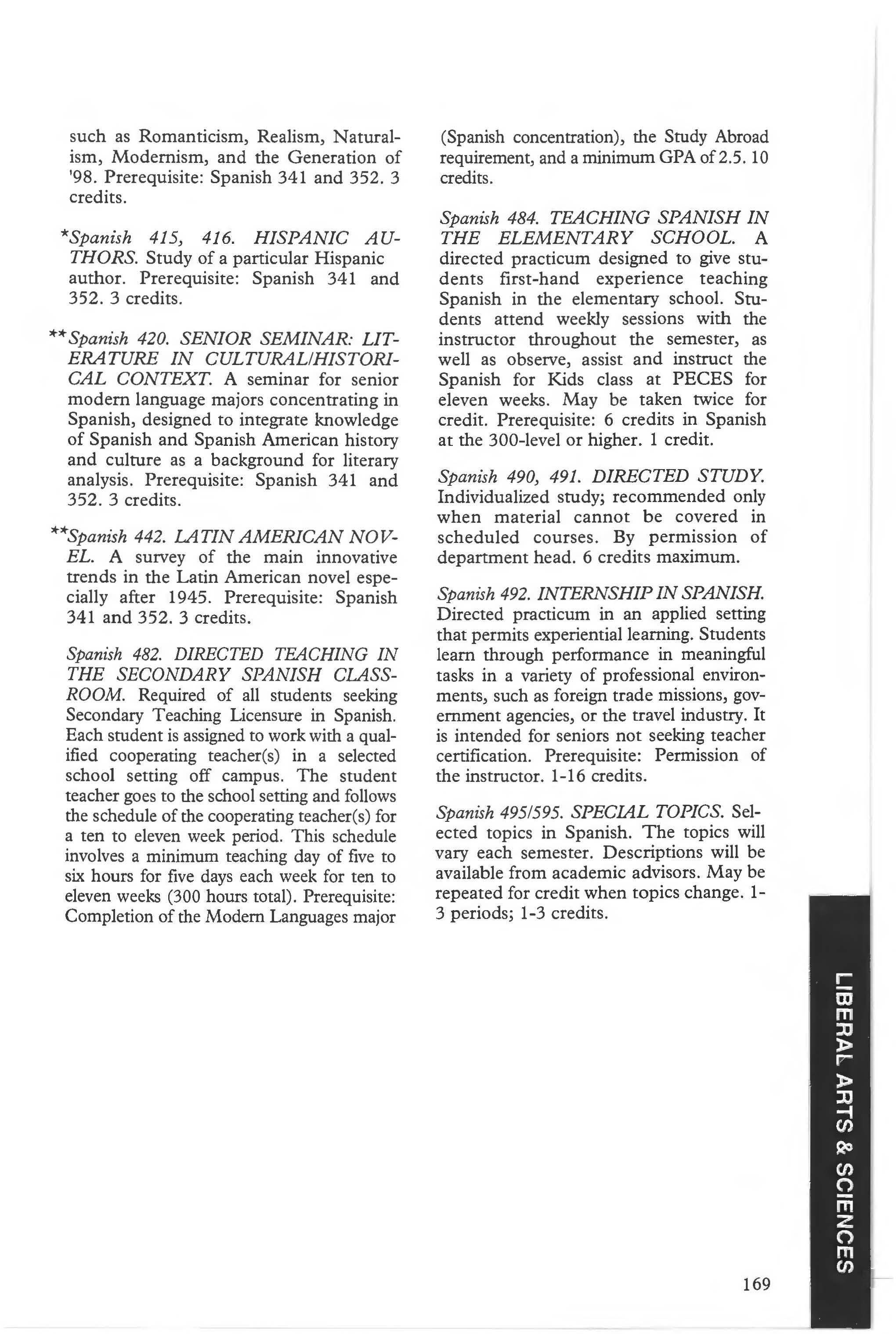
(Spanish concentration), the Study Abroad requirement, and a minimum GPA of2.5. 10 credits.
Spanish 484. TEACHING SPANISH IN THE ELEMENTARY SCHOOL. A directed practicum designed to give students first-hand experience teaching Spanish in the elementary school. Students attend weekly sessions with the instructor throughout the semester, as well as observe, assist and instruct the Spanish for Kids class at PECES for eleven weeks. May be taken twice for credit. Prerequisite: 6 credits in Spanish at the 300-level or higher. 1 credit.
Spanish 490, 491. DIRECTED STUDY. Individualized study; recommended only when material cannot be covered in scheduled courses. By permission of department head. 6 credits maximum.
Spanish 492. INTERNSHIP IN SPANISH. Directed practicum in an applied setting that permits experiential learning. Students learn through performance in meaningful tasks in a variety of professional environments, such as foreign trade missions, government agencies, or the travel industry. It is intended for seniors not seeking teacher certification. Prerequisite: Permission of the instructor. 1-16 credits.
Spanish 495/595. SPECIAL TOPICS. Selected topics in Spanish. The topics will vary each semester. Descriptions will be available from academic advisors. May be repeated for credit when topics change. 13 periods; 1-3 credits.
The Department of History and Political Science offers major programs culminating in the Bachelor of Arts for History majors and either the Bachelor of Arts or the Bachelor of Science for Political Science majors. History majors may elect the optional concentration in historic preservation, and majors in both fields who are interested in careers in the law may elect the optional pre-law concentrations. Qualified political science majors may also avail themselves of the Political Science Semester Internship with the Virginia General Assembly in Richmond, or the Washington Center Internship in Washington, DC. Minor programs in both history and political science are open to all students .
The major programs in history and political science meet the Collegiate Professional certification requirements for teaching in Virginia. History and political science majors may be required to complete a comprehensive departmental examination demonstrating academic proficiency in major subjects. Additional requirements for admission to the Teacher Education Program are cited elsewhere in this catalog .
The Department is committed to full participation in the college program for the assessment of student outcomes. Accordingly, majors in both history and political science are required to complete all standardized and/or department tests used in the program.
Richard T. Couture, M.A., Associate Professor of History and Coordinator of the Historic Preservation Program James W. Crowl, Ph.D., Associate Professor of History William F. Dorrill, Ph.D., President Emeritus and Board of Visitors Distinguished Professor of History and Political Science L. Marshall Hall, Jr., M.A.T., Associate Professor of History Gilbert J. Millar, Ph.D., Professor of History James R. Munson, Ph.D., Assistant Professor of History Robert F. Pace, Ph.D., Assistant Professor of History Maurice P. Sneller, Ph.D., Professor of History
The major in history requires completion of History 100 or 110 (whichever is not selected for General Education) and History 221 and 222, and 28 credits in additional history courses selected in consultation with a departmental advisor. Students must take History 480 (Senior Seminar), and, of the remaining 27 credits required, a minimum of six credits each in American and Non-American history .
Majors in history seeking an endorsement for secondary teaching in Virginia should be thoroughly familiar with the professional education requirements listed elsewhere in this catalog. Those interested in a secondary endorsement must include History 300 in their professional program. To qualify for the secondary student-teaching practicum, majors must complete History 100 or 110 and History 222 with no less than a grade of 'C' in each course.
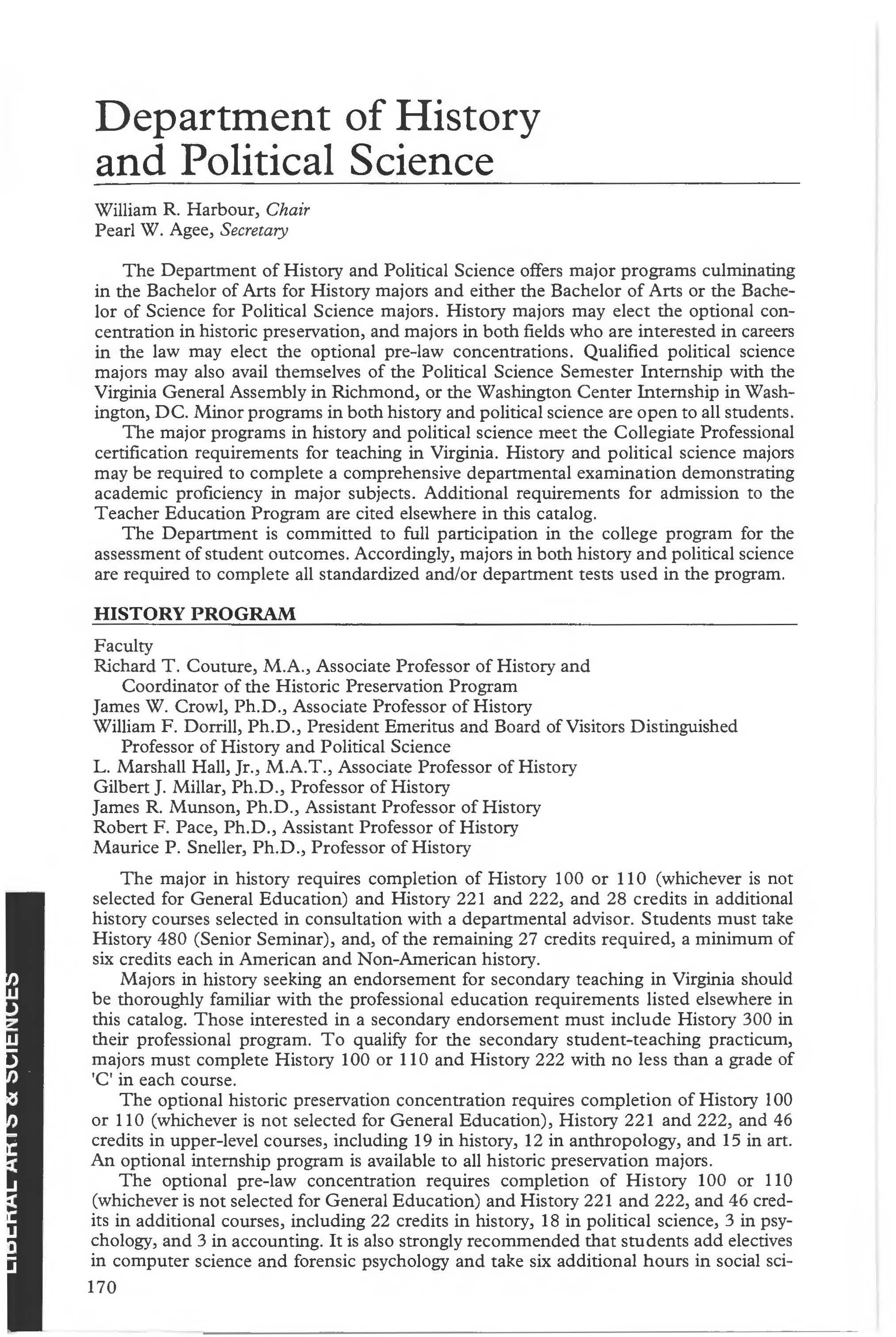
The optional historic preservation concentration requires completion of History 100 or 110 (whichever is not selected for General Education), History 221 and 222, and 46 credits in upper-level courses, including 19 in history, 12 in anthropology, and 15 in art. An optional internship program is available to all historic preservation majors.
The optional pre-law concentration requires completion of History 100 or 110 (whichever is not selected for General Education) and History 221 and 222, and 46 credits in additional courses, including 22 credits in history, 18 in political science, 3 in psychology, and 3 in accounting. It is also strongly recommended that students add electives in computer science and forensic psychology and take six additional hours in social sci-
ence courses selected in consultation with their advisor.
Major programs in history require completion of a modem foreign language at the 202 level or higher. For those seeking Secondary Education certification, History 300 (Political Science 300) must be taken in addition to the 37 credits in History stipulated below (in C. Major Requirements).
Specific course listings for history programs are given below.
Senior course 480/1 credit required of all students.
Majors are encouraged to take Political Science 331 OR 332 to fulfill General Education Goal 10, but may take any approved Ethics course listed under Goal 10. No grade below "C" in major course work is accepted for graduation.
Majors seeking teacher history endorsement are required to have a cumulative grade point average and departmental major average of at least 2,,2 before student teaching.
Students seeking a minor in history are required to complete 18 credits of work, including History 100 or 110 (whichever is not selected for General Education), History 221 and 222, and 9 elective credits in upper-level courses chosen in consultation with a departmental advisor.
A. General Education Core Reguirements. 33 credits. See General Education Requirements section pages 61-63 .
B. Additional Degree Reguirements. 9 credits. See Degree Requirements section pages 57-59.
C. Major Reguirements. 37 credits .
History 100 or 110/3 credits History 221, 222/6 credits
American History Electives / 6 credits. Non-American History Electives/ 6 credits. Additional History Electives/15 credits History 480 / 1 credit .
D. Secondary Education Endorsement. Grades 8-12. 34 credits. See also Professional Education requirements listed on page 97. Additional certification requirement: History 300/3 credits
E General Electives: Non-teaching major/41 credits Secondary teaching endorsement/? credits.
F. Total credits reguired for B.A. in History 120 Total credits reguired for B.A. in History with Secondary Education Endorsement . . .. . . ...... . . .. . . . . .. ..... . . .. 120
Historic Preservation Concentration
A. General Education Core Reguirements. 33 credits. See General Education Requirements listed on pages 61-63.
B. Additional Degree Reguirements . 9 credits. See Degree Requirements listed on pages 57-59.
C . Major Reguirements. 58 credits. (Does not include optional internship in Historic Preservation.)
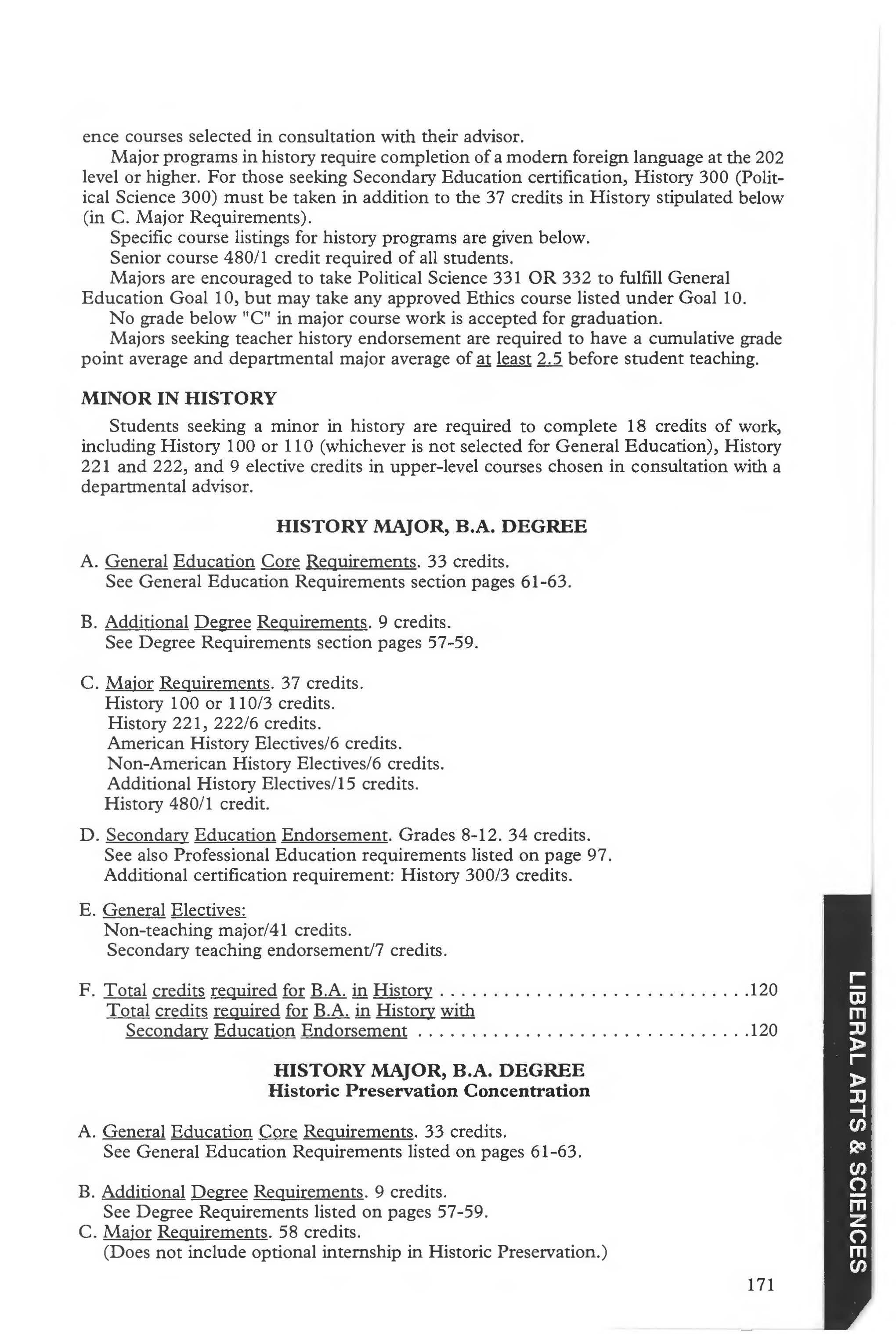
History 100 OR 110/3 credits.
History 221, 222/6 credits.
History 301/3 credits.
History 31 7 /3 credits. History 402/3 credits.
History 404, 405/6 credits. History 480 / 1 credit .
History Elective/3 credits.
Anthropology 296/6 credits. Anthropology 320/3 credits.
Anthropology 410/3 credits.
Art 101/3 credits.
Art 150/3 credits. Art 155/3 credits. Art 261, 262/6 credits. Art 369/3 credits.
D. General Electives: 20 credits.
E. Total credits reguired for B.A. in History with concentration in Historic Preservation 120
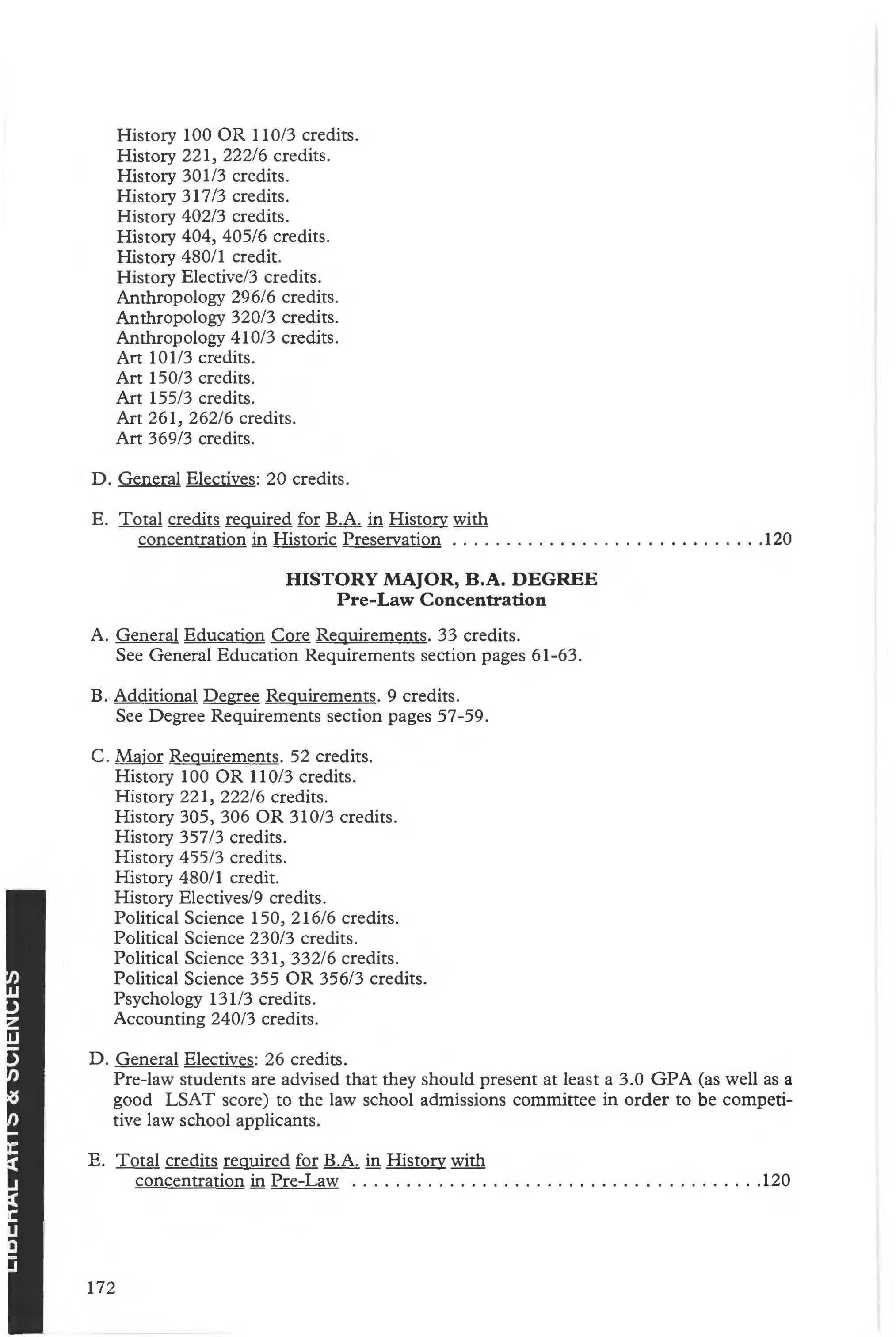
A. General Education Core Reguirements. 33 credits. See General Education Requirements section pages 61-63.
B. Additional Degree Reguirements. 9 credits . See Degree Requirements section pages 57-59.
C Major Reguirements. 52 credits.
History 100 OR 110/3 credits. History 221, 222 / 6 credits . History 305, 306 OR 310/3 credits. History 357/3 credits. History 455 / 3 credits. History 480/1 credit. History Electives/9 credits.
Political Science 150, 216/6 credits. Political Science 230/3 credits
Political Science 331, 332 / 6 credits
Political Science 355 OR 356/3 credits. Psychology 131/3 credits. Accounting 240/3 credits.
D General Electives: 26 credits. Pre-law students are advised that they should present at least a 3.0 GPA (as well as a good LSAT score) to the law school admissions comminee in order to be competitive law school applicants .
E. credits reguired for B.A. in History with concentration in Pre-Law . . ...... . .... . .. . ....... .. ...
* General Education Courses
** Writing Intensive
*History 100. FOUNDATIONS OF WESTERN CIVILIZATION. An introduction to the foundations of Western Civilization from the Dawn of Man through the Reformation, with an emphasis on the political, economic, social, intellectual, and cultural attributes that made this civilization unique. 3 credits.
*History 110. MODERN WESTERN CIVILIZATION. A survey of the development of Modern Western Civilization from the Age of Absolutism to the present, with emphasis upon the political, economic, social, cultural, and intellectual attributes that have marked its rise to world-wide influence in the twentieth century. 3 credits.
*History 120. THE AMERICAN EXPERIENCE. A survey of American life from the Colonial Era to Modern Times, with emphasis upon the major forces which have shaped its development. Credit in this course cannot be applied toward the major in history and no declared history major may take this course to satisfy g General Education goal. 3 credits.
*History 200. HISTORY OF CHINA. Chinese political, social, and cultural history from earliest times to the present, with an emphasis on the modern period. 3 credits.
History 221,222. UNITED STATES HISTORY. An introductory course in United States history. (History 221: Colonial Foundations to the Civil War Era; History 222: Civil War Era to Modern Times.) 3 credits.
History 295. SPECIAL TOPICS. Offered on demand. 3 credits.
History 300 (Political Science 300). TEACHING HISTORY AND THE SOCIAL SCIENCES IN THE SECONDARY SCHOOL. A study of the nature of the disciplines from which content in the social sciences is drawn for instruction at
the secondary level and of the relationship between the nature of these disciplines and the planning of instruction. Observation and participation in the work of selected secondary school classrooms is required. This course does not count toward the completion of the 37 credits stipulated under History Major, B.A. Degree (C. Major Requirements), page 156. Prerequisites: Education 245 and 260. 3 credits.
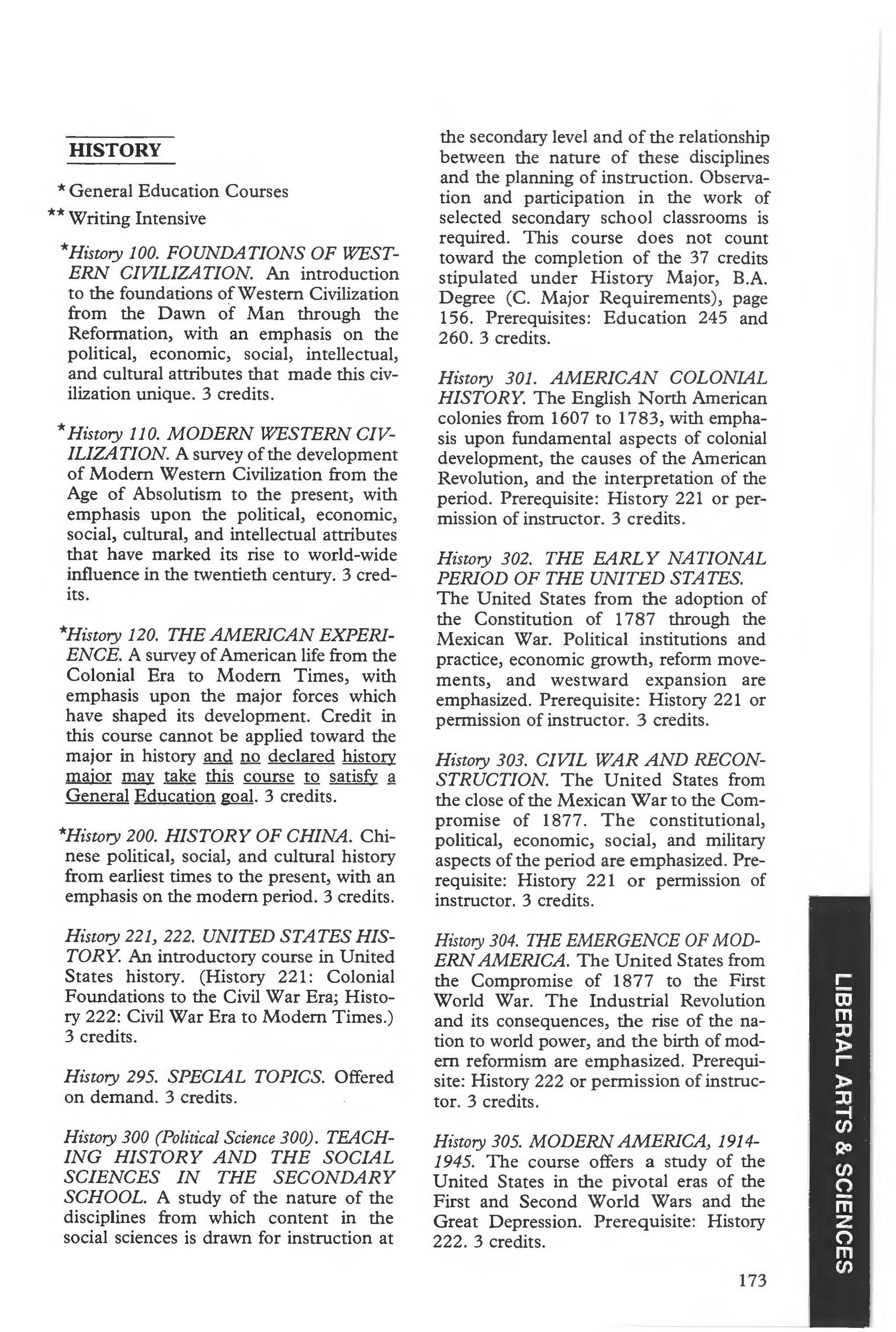
History 301. AMERICAN COLONIAL HISTORY. The English North American colonies from 1607 to 1783, with emphasis upon fundamental aspects of colonial development, the causes of the American Revolution, and the interpretation of the period. Prerequisite: History 221 or permission of instructor. 3 credits.
History 302. THE EARLY NATIONAL PERIOD OF THE UNITED STATES. The United States from the adoption of the Constitution of 1787 through the Mexican War. Political institutions and practice, economic growth, reform movements, and westward expansion are emphasized. Prerequisite: History 221 or permission of instructor. 3 credits .
History 303. CIVIL WAR AND RECONSTRUCTION. The United States from the close of the Mexican War to the Compromise of 1877. The constitutional, political, economic, social, and military aspects of the period are emphasized. Prerequisite: History 221 or permission of instructor. 3 credits.
History 304. THE EMERGENCE OF MODERN AMERICA. The United States from the Compromise of 1877 to the First World War. The Industrial Revolution and its consequences, the rise of the nation to world power, and the birth of modern reformism are emphasized Prerequisite: History 222 or permission of instructor. 3 credits.
History 305. MODERN AMERICA, 19141945. The course offers a study of the United States in the pivotal eras of the First and Second World Wars and the Great Depression. Prerequisite: History 222. 3 credits.
History 306. MODERN AMERICA, 1945PRE.SENT. The course offers a study of the United States from the end of World War II to the present. The main emphasis is on domestic affairs, such as the economy, social conditions, religion, politics, and intellectual life. Prerequisite: History 222. 3 credits.
History 307. UNITED STATES DIPLOMATIC HISTORY TO 1898. American foreign relations from the Revolutionary era to the Spanish-American War. Prerequisite: History 221 or permission of instructor. 3 credits.
History 308. UNITED STATES DIPLOMATIC HISTORY FROM 1898. American foreign relations and diplomatic activities from the Spanish-American War to the present. Prerequisite: History 222 or permission of instructor. 3 credits.

** History 309. AMERICAN SOCIAL AND INTELLECTUAL HISTORY. The major developments in American thought and culture from the Colonial era through the Civil War. Puritanism, the Enlightenment, and the Romantic Movement are emphasized. Prerequisite: History 221 or permission of instructor. 3 credits.
** History 310. AMERICAN SOCIAL AND INTELLECTUAL HISTORY. The major developments in American thought and culture since the Civil War. Social Darwinism, liberal reform and conservative reaction, the affluent society, and the counter-culture are emphasized. Prerequisite: History 221 or permission of instructor. 3 credits.
History 311. THE HISTORY OF WOMEN IN AMERICA. The changing role of women in American life from the Colonial era to the present, contrasting the ideology of women's place in society with the reality of their lives. The Victorians, the fight for women's suffrage, and the 20th-century liberation movement are emphasized. Prerequisite: History 222 or permission of instructor. 3 credits.
History 312. THE AMERICAN WEST. The trans-Mississippi west, with emphasis on 19th-century exploration and set-
tlement, including the Indian barrier, and the mining, cattle, and farming frontiers . Prerequisite: History 222 or permission of instructor. 3 credits.
History 313. HISTORY THROUGH FILM. A viewing of some fourteen films that contain historical interpretation. Reviews and discussions with historians as to interpretation will follow. The class will meet once a week 3 credits •
** History 314. (Political Science 314). POLITICAL HISTORY OF AFRICA. A survey of the political landscape of African history. A major portion of the course examines the significance of precolonial kingdoms, assesses the growth of the "slave trade", analyzes African intellectual history, and explores the "eve of colonialism" in Africa. 3 credits.
History 317. INTRODUCTION TO HISTORIC PRESERVATION. The evolution of architectural styles in the United States from the Colonial Era to the early 20th century, with emphasis upon the principal periods of architectural development, the major styles and furnishings, and the basic techniques and terminology of historic preservation. Prerequisite: History 221 and 222 3 credits
** History 318. INTRODUCTION TO MUSEUM STUDIES. An introduction to the field of museology, covering the history, philosophy, and ethics of the profession; various types of museums and different aspects of museum work; the museum's role in the community; and the effects of philanthropy and government on museums. Designed primarily for those concentrating in historic preservation Prerequisite: Permission of the instructor 3 credits .
**History 320. AFRICAN-AMERICAN HISTORY. A survey of the black experience in America from the Colonial Era to the present. Prerequisite: History 221 or permission of instructor 3 credits.
** History 325. HISTORY OF LATIN AMERICA. A survey of Latin American history from its pre-Columbian roots to the present. 3 credits.
** History 336. HISTORY OF JAPAN. Japanese political and cultural history, with emphasis upon the modern period The opening of Japan, the Meiji Restoration, modernization, the rise of militarism, the American occupation, and current issues are stressed. 3 credits.
**History 351. MEDIEVAL EUROPE. A study of the political, economic, and social institutions, and the religious and intellectual developments in Medieval Europe. 3 credits
**History 352 RENAISSANCE AND REFORMATION. The social, cultural, religious, economic, and political forces that shaped Western Civilization from the High Middle Ages through the era of the religious wars (ca. 1300-1648). 3 credits.
** History 354. THE FRENCH REVOLUTION AND NAPOLEON. A study of the origins and course of the French revolutionary era, with emphasis upon its profound political, economic, social , institutional, and intellectual significance. 3 credits .
** History 355. EUROPE IN THE NINETEENTH CENTURY, 1815-1914. The political, economic, social, and cultural development of Europe from the Congress of Vienna to the eve of World War I. 3 credits.
**History 356. EUROPE IN THE TWENTIETH CENTURY, 1900 TO THE PRESENT. The political, economic, social, and intellectual development of Europe in its world setting since the turn of the century. 3 credits.
** History 357. ENGLAND BEFORE THE TUDORS, 55 B.C. TO 1485. A study of the political, economic, and social factors that shaped England prior to the Reformation. 3 credits.
** History 358. FRANCE SINCE 1815. The history of major developments in French politics, culture, and society in the modern era. 3 credits.
**History 359. RUSSIAN HISTORY TO 1894. Russia from the Kievan period to
Alexander III, with emphasis upon the modernization efforts of Peter the Great and Catherine the Great, the reforms of Alexander II, and the nineteenth-century revolutionary movement. 3 credits
** History 360. RUSSIAN HISTORY SINCE 1894. Russia from the reign of Nicholas II to the present, with emphasis upon the factors leading to the collapse of the monarchy and the revolutions of 1905 and 191 7, and upon the subsequent construction and evolution of the Soviet system. Little emphasis upon diplomacy or foreign policy . 3 credits.
H istory 361. HOW GREAT GENERALS WIN. An examination of how great commanders from Hannibal to Douglas MacArthur have applied fundamental principles of strategy to achieve victory in war, and how these principles have remained constant despite changing historical circumstances. 3 credits .
History 362. WARFARE IN THE TWENTIETH CENTURY. An examination of how conventional warfare, with emphasis on massive armies, great destruction, and total victory, has led to long wars of attrition and stalemate. The course emphasizes the replacement of conventional warfare with guerilla, unconventional, or limited warfare as means of achieving national aims. 3 credits.
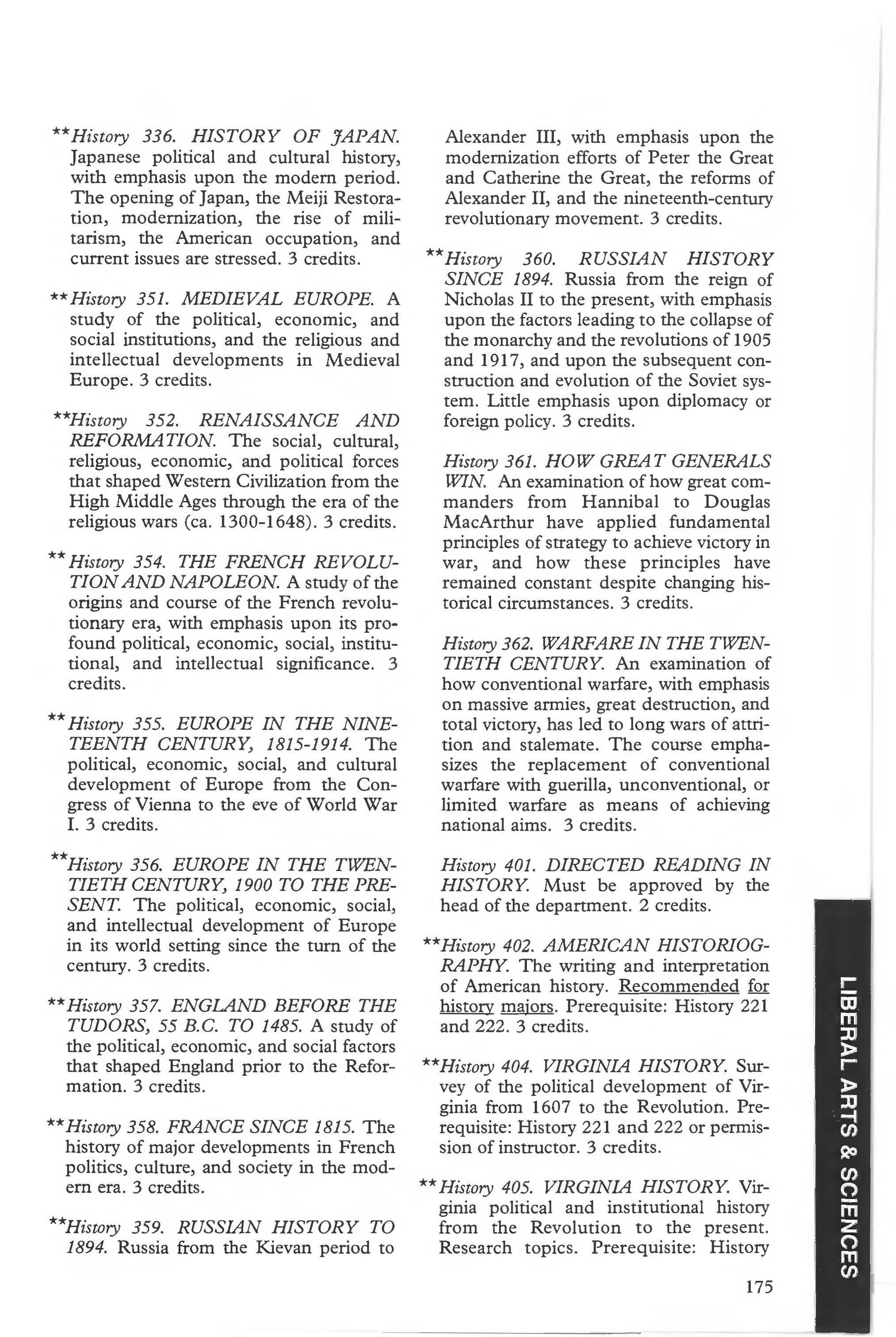
History 401 . DIRECTED READING IN HISTORY. Must be approved by the head of the department. 2 credits.
** History 402. AMERICAN HISTORIOGRAPHY. The writing and interpretation of American history Recommended for history majors. Prerequisite: History 221 and 222. 3 credits.
** History 404. VIRGINIA HISTORY. Survey of the political development of Virginia from 1607 to the Revolution. Prerequisite: History 221 and 222 or permission of instructor. 3 credits .
** History 405. VIRGINIA HISTORY. Virginia political and institutional history from the Revolution to the present. Research topics. Prerequisite : History
221 and 222 or permission of instructor. 3 credits.
** History 406. THE OLD SOUTH. The basic political, economic, social, and intellectual institutions, forces, and problems that collectively shaped the antebellum South . Prerequisite: History 221 or permission of instructor . 3 credits .
History 455 (Political Science 455). CONSTITUTIONAL HISTORY OF THE UNITED STATES. Intensive case-study examination of the continuing development of the Constitution. Emphasis on judiciary, presidency, federalism, commerce, and due process problems. 3 credits
History 460,461. HISTORY SEMINAR. Offered on demand; open to junior and senior history majors 1 credit
** History 463. EUROPEAN HISTORIOGRAPHY. The writing and interpretation of history in Europe since the Renaissance Prerequisite: History 110, or permission of instructor. 3 credits .
**History 465 TUDOR-STUART ENGLAND, 1485-1714. The social, political, economic, and religious forces of one of England's most dynamic periods examined in the context of the sixteenth-century Renaissance and Reformation and the seventeenth-century Intellectual Revolution Research paper or critical book analyses required. Background in Western Civilization recommended . 3 credits .
** History 466 GEORGIAN ENGLAND, 1714-1815. England in the 18th century, with emphasis upon political, social, and cultural trends . Topical reports by students. 3 credits.
** History 468. · EUROPEAN INTELLECTUAL HISTORY FROM THE ENLIGHTENMENT. A survey of the major trends in European thought after the Enlightenment, and the relationship of these trends to their social, cultural, and political context. Prerequisite: History 110 or permission of instructor 3 credits
History 469. (Political Science 469). SOVIET DIPLOMACY. An analysis of the diplomacy and foreign policy of Soviet Russia, 1917 to 1991, with emphasis upon the political machinery and motivating forces that determine foreign policy. 3 credits.
History 475, 476, 477, 478, 4 7 9. INTERNSHIPS IN HISTORIC PRESERVATION Open to qualified seniors in Historic Preservation Concentration. 475/3 credits; 476/6 credits; 477/9 credits; 478/12 credits; 479/15 credits.
** History 480. SENIOR SEMINAR. Capstone course in history. Research, writing, and assessment of student outcomes. Required of majors in history. 1 credit .
History 490, 491. HISTORY SEMINAR. Offered on demand; open to junior and senior history majors. 3 credits.
History 495. SPECIAL TOPICS IN HISTORY. Offered on demand. 3 credits.
William F. Dorrill, Ph .D., President Emeritus and Board of Visitors Distinguished Professor of History and Political Science
William R. Harbour, Ph.D., Associate Professor of Political Science
Lehlohonolo Tlou, Ph.D., Assistant Professor of Political Science
The major in political science requires completion of History 100 or 110 (whichever is not selected for General Education), History 222, and Political Science 150 and 216, and 31 credits in additional work in political science. Qualified majors may apply for admission to the political science internship programs with the Virginia General Assembly in Richmond, or the Washington Center in Washington, D.C. Majors in political science seeking an endorsement for secondary teaching in Virginia
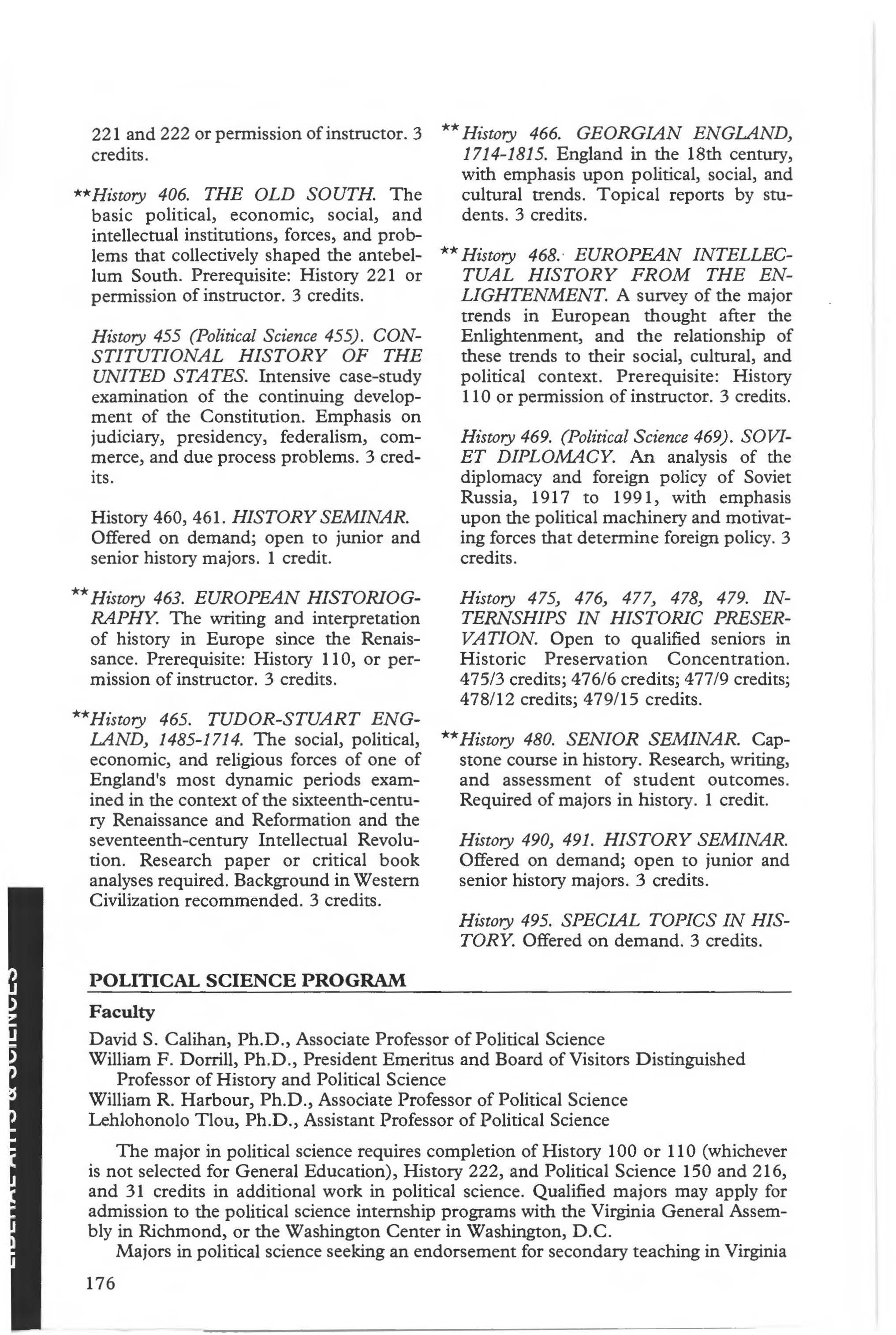 David S . Calihan, Ph.D ., Associate Professor of Political Science
David S . Calihan, Ph.D ., Associate Professor of Political Science
should be thoroughly familiar with the professional education requirements listed elsewhere in this catalog. Those interested in a secondary endorsement must include Political Science 300 in their professional program. To qualify for the secondary student-teaching practicum, majors must complete Political Science 150 and 216 with no less than a grade of 'B' in 150 and 'C' in 216. Majors seeking teacher endorsement are required to have a cumulative grade point average and a departmental major average of .!U least 2.5 before student teaching .
The optional pre-law concentration requires completion of History 100 or 110 (whichever is not taken for General Education credit), History 222, and Political Science 150 and 216, and 34 credits in additional courses, including 25 credits in political science, 3 in history, 3 in psychology, and 3 in accounting. It is also strongly recommended that students add electives in forensic psychology (Psychology 430) and writing skills (English 382) and take six additional hours of work in social science courses selected in consultation with a departmental advisor.
Political Science majors seeking the Bachelor of Arts degree must complete a modem foreign language at the 202 level or higher.
Specific course listings for political science programs are given below.
The minor in Political Science requires completion of Political Science 150 and 216 and of 12 credits of additional courses in political science chosen in consultation with a departmental advisor. ·
A. General Education Core Requirements. 33 credits.
See General Education Requirements section pages 61-63.
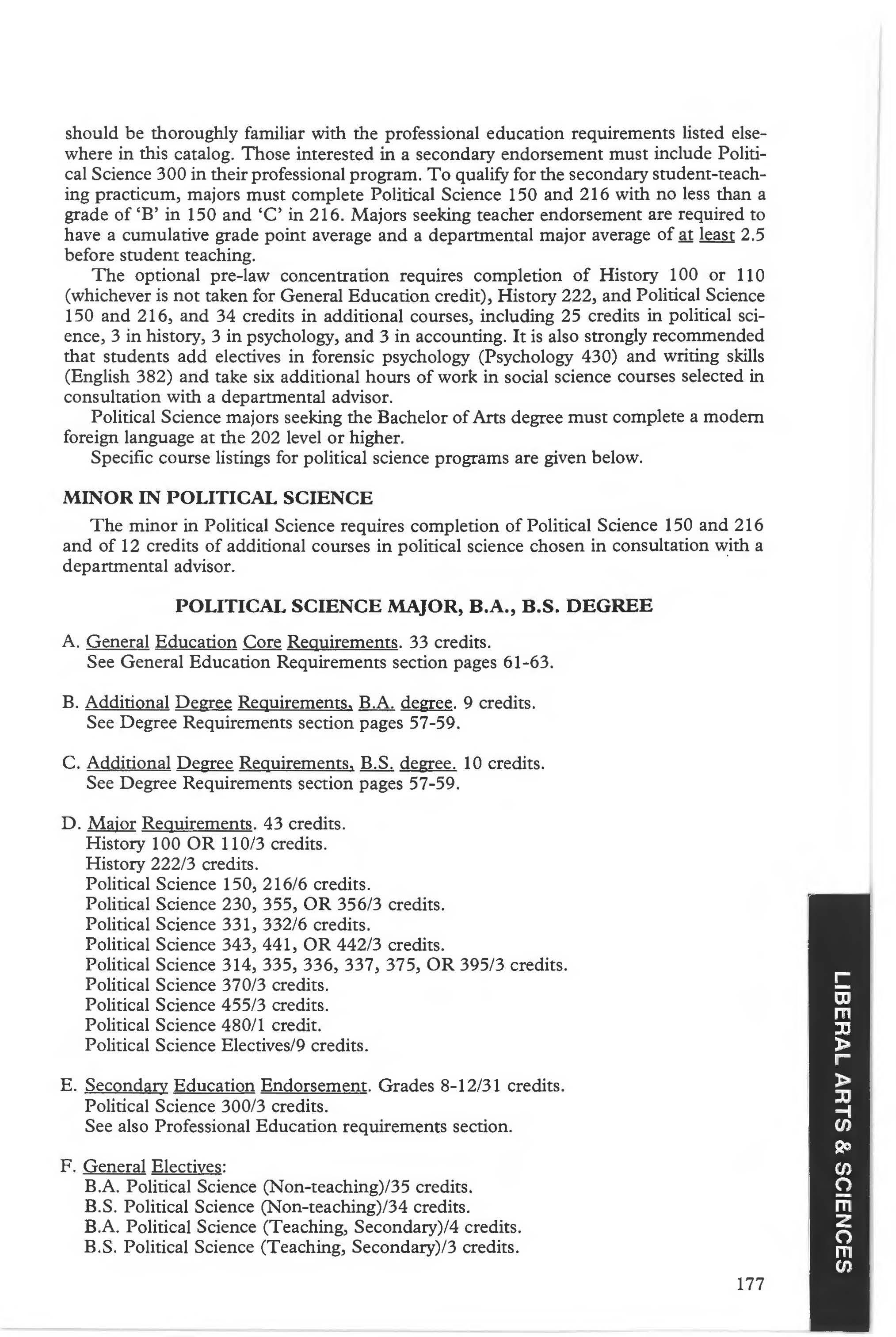
B Additional Degree Requirements, B.A. degree. 9 credits. See Degree Requirements section pages 57-59.
C. Additional Degree Requirements, B.S. degree. 10 credits. See Degree Requirements section pages 57-59.
D. Major Requirements. 43 credits.
History 100 OR 110/3 credits.
History 222/3 credits.
Political Science 150, 216/6 credits.
Political Science 230, 355, OR 356/3 credits.
Political Science 331, 332/6 credits.
Political Science 343, 441, OR 442/3 credits.
Political Science 314,335,336, 337, 375, OR 395/3 credits.
Political Science 370/3 credits.
Political Science 455/3 credits.
Political Science 480/1 credit.
Political Science Electives/9 credits.
E. Secondary Education Endorsement. Grades 8-12/31 credits.
Political Science 300/3 credits.
See also Professional Education requirements section.
F. General Electives:
B.A. Political Science (Non-teaching)/35 credits.
B.S Political Science (Non-teaching)/34 credits.
B.A. Political Science (Teaching, Secondary)/4 credits.
B.S. Political Science (Teaching, Secondary)/3 credits.
G. Total credits required for B.A., B.S. in Political Science . .......... . .... . . 120
Total credits required for B.A., B.S. in Political Science with Secondary Education Licensure 120
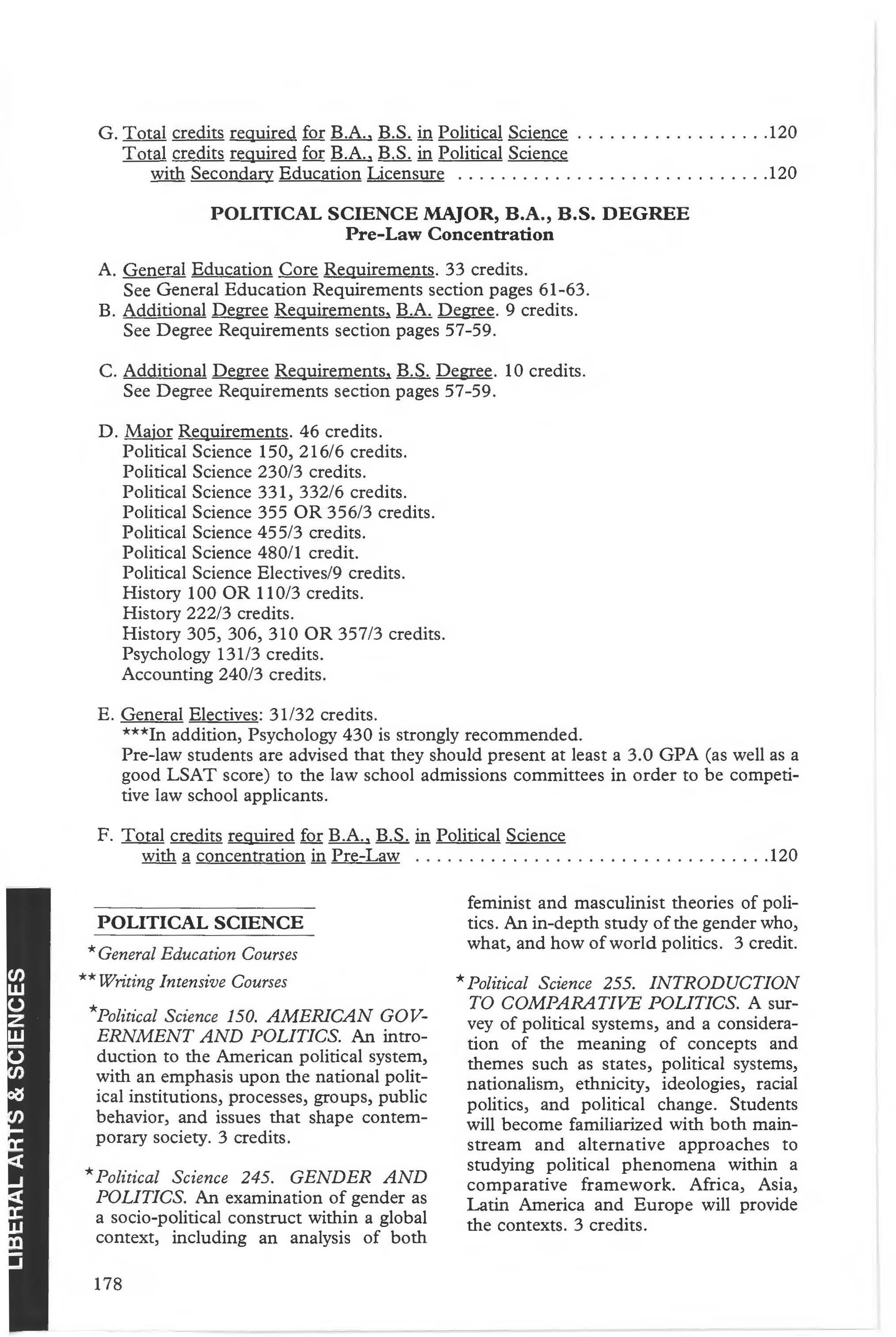
A. General Education Core Requirements. 33 credits
See General Education Requirements section pages 61-63
B. Additional Degree Requirements, B.A. Degree. 9 credits. See Degree Requirements section pages 57-59 .
C. Additional Degree Requirements, B.S. Degree. 10 credits. See Degree Requirements section pages 57-59.
D. Major Requirements. 46 credits
Political Science 150, 216/6 credits.
Political Science 230/3 credits.
Political Science 331, 332/6 credits. Political Science 355 OR 356/3 credits.
Political Science 455 / 3 credits.
Political Science 480/1 credit.
Political Science Electives/9 credits. History 100 OR 110/3 credits. History 222/3 credits. History 305,306,310 OR 357 / 3 credits. Psychology 131/3 credits. Accounting 240/3 credits.
E. General Electives: 31/32 credits
***In addition, Psychology 430 is strongly recommended. Pre-law students are advised that they should present at least a 3.0 GPA (as well as a good LSAT score) to the law school admissions committees in order to be competitive law school applicants.
F. Total credits required for B.A., B.S. in Political Science with g concentration in Pre-Law .... ..... . ... . . . ..... . .. . . . .... . . 120
feminist and masculinist theories of politics. An in-depth study of the gender who, what, and how of world politics. 3 credit.
*Political Science 150. AMERICAN GOVERNMENT AND POLITICS. An introduction to the American political system, with an emphasis upon the national political institutions, processes, groups, public behavior, and issues that shape contemporary society 3 credits.
* Politi cal Science 245. GENDER AND POLITICS. An examination of gender as a socio-political construct within a global context, including an analysis of both
* Political Science 255. INTRODUCTION TO COMPARATIVE POLITICS. A survey of political systems, and a consideration of the meaning of concepts and themes such as states, political systems, nationalism, ethnicity, ideologies, racial politics, and political change . Students will become familiarized with both mainstream and alternative approaches to studying political phenomena within a comparative framework. Africa, Asia, Latin America and Europe will provide the contexts. 3 credits.
*Political Science 331. POLITICAL PHILOSOPHY. Survey of the principal political theories and philosophies from ancient Greece through the Middle Ages, including the contributions of Plato, Aristotle, Cicero, St. Augustine, and St. Thomas Aquinas. 3 credits.
*Political Science 332. POLITICAL PHILOSOPHY. Survey of modem political theories and philosophies, including the contributions of Machiavelli, Hobbes, Locke, Rousseau, Burke, and Marx. 3 credits.
**Political Science 216. AMERICAN STATE AND LOCAL GOVERNMENT. A study of American state and local political institutions and processes, and of related current issues and problems. 3 credits.
Political Science 230. ADMINISTRATION OF CRIMINAL JUSTICE. Survey of the operations of institutions that compose our system for administering criminal justice, including police administration, premises and politics of court procedures and management, and corrections. 3 credits
Political Science 295. SPECIAL TOPICS. Offered on demand. 3 credits.
Political Science 300 (History 300). TEACHING HISTORY AND THE SOCIAL SCIENCES IN THE SECONDARY SCHOOL. A study of the nature of the disciplines from which content in the social sciences is drawn for instruction at the secondary level and of the relationship between the nature of these disciplines and the planning of instruction. Observation and participation in the work of selected secondary school classrooms is required. This course does not count toward the completion of the 43 credits stipulated under Section D, Political Science Major, B.A. Degree, or of the credits designated as major requirements for the B.A./B.S. Pre-Law concentrations, (page 174.) Prerequisites: Education 245 and 260. 3 credits.

** Political Science 314 (History 314). POLITICAL HISTORY OF AFRICA. A survey of the political landscape of African
history. A major portion of the course examines the significance of precolonial kingdoms, assesses the growth of the "slave trade", analyzes African intellectual history, and explores the "eve of colonialism" in Africa. 3 credits.
** Political Science 335. WESTERN EUROPEAN POLITICS AND GOVERNMENT. An examination of the political systems of Western Europe, with in-depth analyses of Great Britain, France, and Germany. Issues like social democracy, gendered politics, right-wing extremism, and the European Union are explored as causes of political change and continuity in Europe. 3 credits.
**Political Science 336. RUSSIAN AND EASTERN EUROPEAN GOVERNMENT AND POLITICS. Study of the governments and politics of Russia and Eastern Europe. Special attention is given to the rise and fall of Communism and to the challenges of building democratic institutions and market oriented economic systems. 3 credits.
** Political Science 337. ASIAN GOVERNMENTS AND POLITICS. A study of the political systems and foreign policies of the major Asian powers, with emphasis on China and Japan. 3 credits .
**Political Science 341, 342. AMERICAN POLITICAL THOUGHT. (Political Science 341 to the Civil War; Political Science 342 1860 to the Present). An introduction to the principal thinkers and the central themes in American political thought. 3 credits.
** Political Science 343. AMERICAN FOREIGN POLICY. A study of U .S . foreign policy with special attention to the policymaking process, current problems in foreign affairs, and the development of longrange foreign policy. 3 credits.
** Political Science 350. THE AMERICAN PRESIDENCY. The modem presidency and its role in contemporary politics, emphasizing the constitutional background of the office, the evolution of presidential powers, relationships between the presidency and the Congress and bureaucracy,
the presidential election process, and the role of the presidency in policy making. 3 credits.
Political Science 355. CONSTITUTIONAL RIGHTS AND LIBERTIES (I). Study of prominent Constitutional principles, issues, and practices pertaining to persons accused or convicted of crime. Particular focus on the ideas of the Fourth, Fifth, Sixth, and Eighth Amendments. Extensive use of Supreme Court decisions. 3 credits.
Political Science 356. CONSTITUTIONAL RIGHTS AND LIBERTIES (II). Study of prominent Constitutional principles, issues, and practices concerning government-private individual relations, with particular emphasis upon freedoms of speech, press, religion; privacy; and social and economic discrimination. Extensive use of Supreme Court decisions. 3 credits.
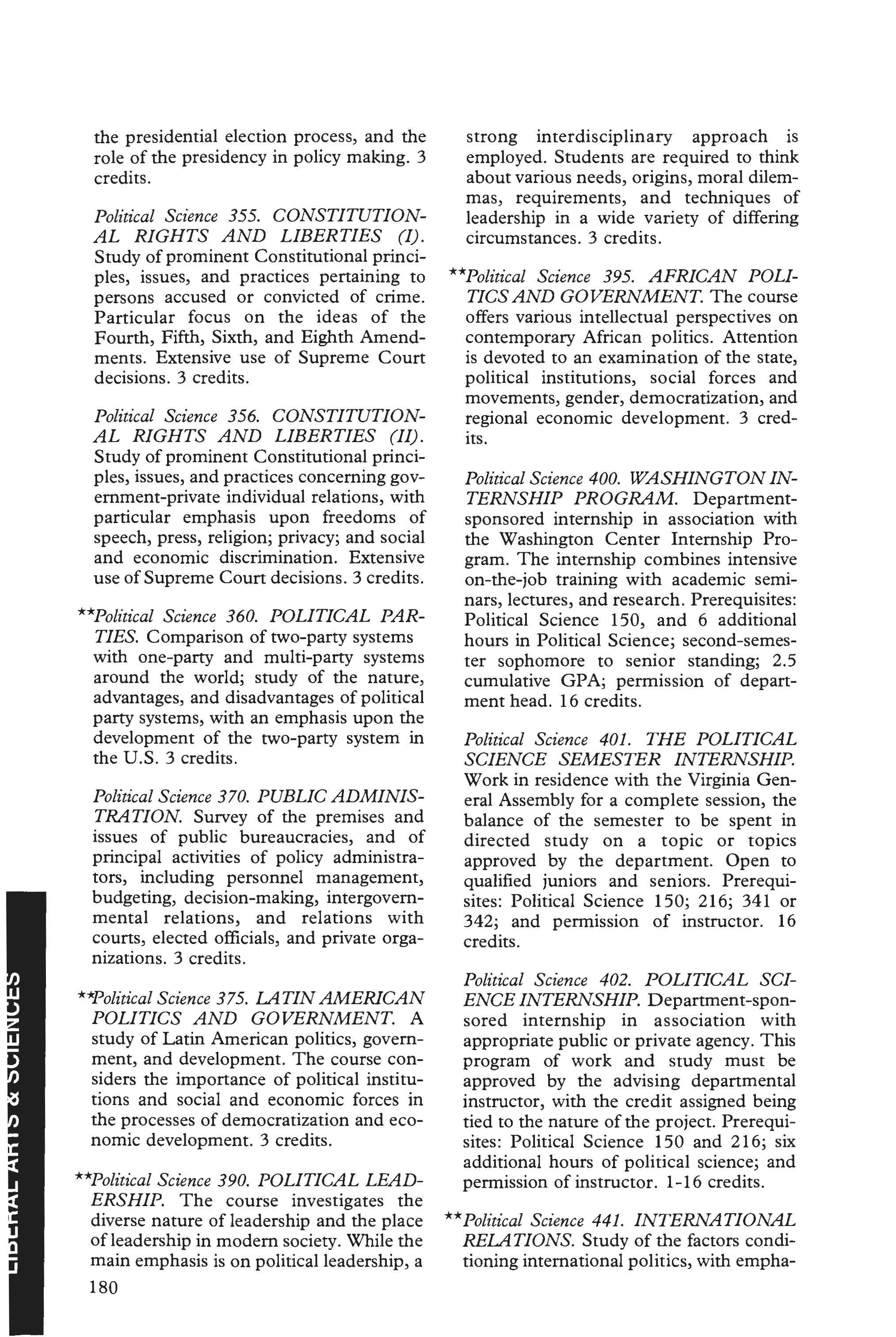
**Political Science 360. POLITICAL PARTIES. Comparison of two-party systems with one-party and multi-party systems around the world; study of the nature, advantages, and disadvantages of political party systems, with an emphasis upon the development of the two-party system in the U.S. 3 credits.
Political Science 370. PUBLIC ADMINISTRATION. Survey of the premises and issues of public bureaucracies, and of principal activities of policy administrators, including personnel management, budgeting, decision-making, intergovernmental relations, and relations with courts, elected officials, and private organizations. 3 credits.
**Political Science 375. LATIN AMERICAN POLITICS AND GOVERNMENT. A study of Latin American politics, government, and development. The course considers the importance of political institutions and social and economic forces in the processes of democratization and economic development. 3 credits.
**Political Science 390. POLITICAL LEADERSHIP. The course investigates the diverse nature of leadership and the place of leadership in modem society. While the main emphasis is on political leadership, a
strong interdisciplinary approach is employed. Students are required to think about various needs, origins, moral dilemmas, requirements, and techniques of leadership in a wide variety of differing circumstances. 3 credits.
**Political Science 395. AFRICAN POLITICS AND GOVERNMENT. The course offers various intellectual perspectives on contemporary African politics. Attention is devoted to an examination of the state, political institutions, social forces and movements, gender, democratization, and regional economic development. 3 credits.
Political Science 400. WASHINGTON INTERNSHIP PROGRAM. Departmentsponsored internship in association with the Washington Center Internship Program. The internship combines intensive on-the-job training with academic seminars, lectures, and research Prerequisites: Political Science 150, and 6 additional hours in Political Science; second-semester sophomore to senior standing; 2.5 cumulative GPA; permission of department head. 16 credits.
Political Science 401. THE POLITICAL SCIENCE SEMESTER INTERNSHIP. Work in residence with the Virginia General Assembly for a complete session, the balance of the semester to be spent in directed study on a topic or topics approved by the department. Open to qualified juniors and seniors. Prerequisites: Political Science 150; 216; 341 or 342; and permission of instructor. 16 credits.
Political Science 402. POLITICAL SCIENCE INTERNSHIP. Department-sponsored internship in association with appropriate public or private agency. This program of work and study must be approved by the advising departmental instructor, with the credit assigned being tied to the nature of the project. Prerequisites: Political Science 150 and 216; six additional hours of political science; and permission of instructor. 1-16 credits.
**Political Science 441. INTERNATIONAL RELATIONS. Study of the factors conditioning international politics, with empha-
sis upon the foreign policies of major powers. 3 credits.
Political Science 442. INTERNATIONAL LAW AND ORGANIZATIONS. A study of international law and organizations, with emphasis upon the principles of international law. Additional consideration of the policies of the United Nations. 3 credits.
Political Science 443. UNITED STATES FOREIGN POLICY AND NATIONAL SECURITY: 1990-2000. This course represents an endeavor to identify and analyze major US foreign policy and national security issues and threats likely facing the United States both externally and internally in the closing decade of the twentieth century. Major attention is devoted to the continuing dynamics in Russo-American relations and to problems of a politico-economic nature posed by nations of the developing or Third World. Additionally, discussions focus on various response options potentially applicable to the resolution of current issues. 3 credits.
Political Science 455 (History 455). CONSTITUTIONAL HISTORY OF THE UNITED STATES. Intensive case-study examination of the continuing development of the Constitution. Emphasis on judiciary, presidency, federalism, commerce, and due process problems. 3 credits.
Political Science 460, 461, 462. POLITICAL SCIENCE SEMINAR. Open to juniors and seniors. Offered on demand; 1 credit.
Political Science 463, 464. WASHINGTON SYMPOSIA. Symposium programs sponsored by the Washington Center. 40 to 60 hours of lectures, panel discussions, workshops, site visits, and bi-weekly discussion groups over a 2 to 3 week period in Washington, D.C. Prerequisites: Political Science 150, 2. 5 cumulative GPA, approval of department head . 2 or 3 credits.
Political Science 465. THE ROLE OF US NATIONAL INTELLIGENCE IN FOREIGN POLICY This course provides a basic overview of the history, current organization, and missions of the US Foreign intelligence establishment ("the Intelligence Community") and its various programs and activities in support of US foreign policy and national security objectives in the closing years of the 20th century. 3 credits.
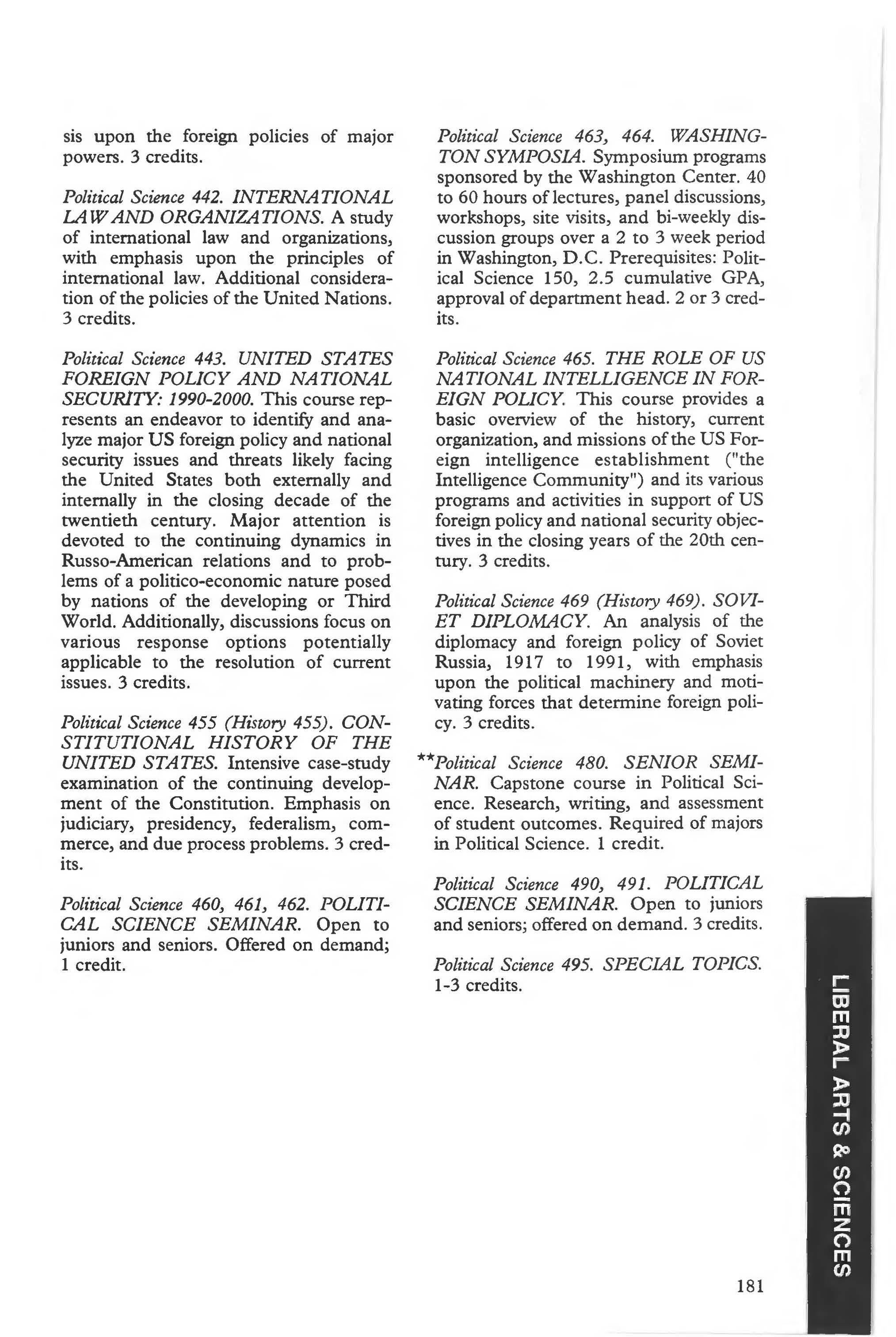
Political Science 469 (History 469). SOVIET DIPLOMACY. An analysis of the diplomacy and foreign policy of Soviet Russia, 191 7 to 1991, with emphasis upon the political machinery and motivating forces that determine foreign policy. 3 credits.
**Political Science 480. SENIOR SEMINAR. Capstone course in Political Science. Research, writing, and assessment of student outcomes. Required of majors in Political Science. 1 credit.
Political Science 490, 491. POLITICAL SCIENCE SEMINAR. Open to juniors and seniors; offered on demand. 3 credits.
Political Science 495. SPECIAL TOPICS. 1-3 credits.
The Department of Mathematics and Computer Science offers courses leading to a major in mathematics and computer science, and minors in mathematics and computer science. It also offers courses which fulfill general education and Bachelor of Science degree requirements. Students are required to obtain a satisfactory score on a mathematics placement test prior to enrolling in a mathematics course.
ASSESSMENT: The Department of Mathematics and Computer Science requires all majors to participate in any required assessment activities, including, as seniors, taking a comprehensive mathematics test and the senior seminar course The purpose of the test is to assess the progress of the majors and the effectiveness of the program.
Students who are preparing to teach and who are majoring in fields other than mathematics may be endorsed to teach computer science or general mathematics by minoring in computer science or mathematics, respectively An endorsement in general mathematics enables one to teach general mathematics (including general, consumer, basic, career and shop mathematics) wherever it is offered in grades 8-12
William P. Abrams, Ph D , Assistant Professor of Mathematics John E. Arehart, Ed.D., Associate Professor of Computer Science and Mathematics Sandra A. Bollinger, M.A., Assistant Professor of Mathematics James C. Gussett, Ed.D., Professor of Mathematics Jacqueline A. Hall, Ph.D., Assistant Professor of Mathematics Robert D. May, Ph.D., Assistant Professor of Mathematics E. T. Noone, Jr., Ed .D., Professor of Mathematics Jeffery H. Peden, Ph.D., Assistant Professor of Computer Science Billie F. Risacher, Ph.D., Assistant Professor of Mathematics Sharon Emerson-Stonnell, Ph.D., Assistant Professor of Mathematics Robert P. Webber, Ph.D., Professor of Computer Science and Mathematics Robert S. Wu, Ph.D., Associate Professor of Mathematics
All mathematics majors are required to take a core of mathematics courses (Mathematics 261, 262, 300, 343, 361, 371 and 488). The remaining courses will be selected from one of two concentrations pure mathematics, or applied mathematics/computer science. Mathematics majors who have completed Mathematics 262 may not enroll in a 100-level mathematics course.
While every attempt is made to state the requirements and concentrations available in the department as succinctly as possible, it is recommended that every student majoring or minoring in the department continue in close communication with the academic advisor assigned by the department in order to plan the program best suited to individual needs and goals.
Students desiring a minor in mathematics or computer science must successfully complete the appropriate program described below, and must see the Chair of the Department of Mathematics and Computer Science to declare officially a minor in either field.
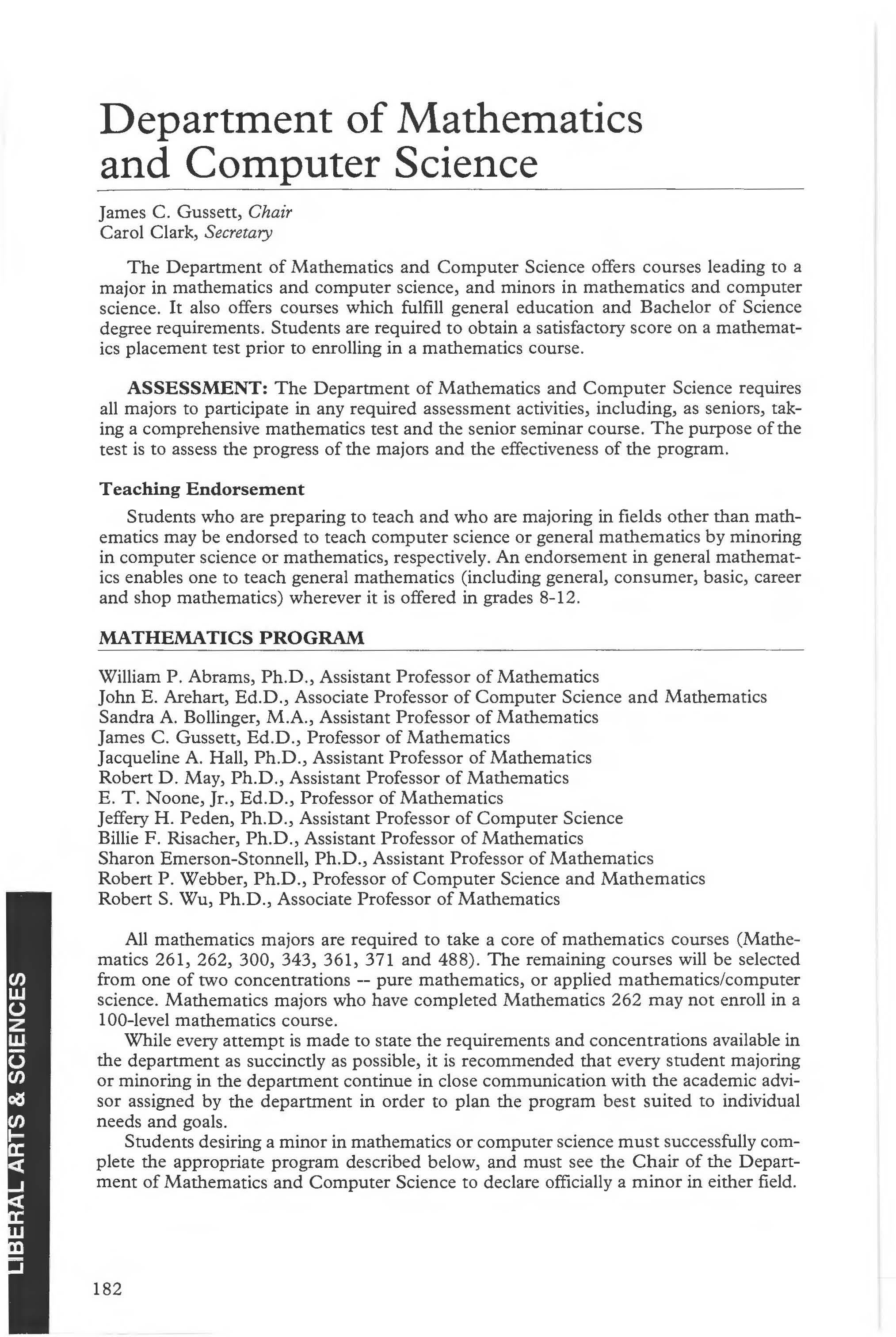
A. General Education Core Requirements. 33 credits. See General Education Requirements listed on pages 61-63.
B B.S. Degree Additional Degree Requirements. 10 credits. See Degree Requirements listed on pages 57-59.
B.A. Degree Additional Degree Requirements. 9 credits. See Degree Requirements listed on pages 57-59.
C Major Requirements. 46 credits.
All Majors
Mathematics 261, 262, 361/13 credits
Mathematics 300/3 credits
Mathematics 343/3 credits Mathematics 371/3 credits Mathematics 488/3 credits
Concentration I (Pure Mathematics)
Mathematics 342/3 credits
Mathematics 335 or 336/3 credits
Mathematics 461/3 credits
Computer Science 121 or 204/3 credits
*Elective 300-400 level Mathematics/6 credits
*Elective 300-400 level Mathematics or Computer Science/3 credits Total 21 credits
Concentration II (Applied Mathematics)
Mathematices 405, 460, 4 72/9 credits
Computer Science 204, 206/6 credits
*Elective 300-400 level Mathematics/3 credits
*Elective 300-400 level Mathematics or Computer Science/3 credits Total 21 credits
*Electives may not include Mathematics 313, 321, 330, or 451. CMSC 300 may be substituted for Math 300. It is recommended that Concentration One Majors take Math 300. Both may be taken for credit.
D. Secondary Teaching Endorsement, grades 8-12. 34 credits. See professional education requirements listed on page 97 . Additional endorsement requirement: Mathematics 451. The Teaching of High School Mathematics . 3 credits.
E. General Electives (non-teaching majors) ............................ 31/32
F. Total Credits Required for B.A., B.S. in Mathematics .................... 120 Total Credits Required for B.S. in Mathematics with Secondary Teaching Endorsement 123
For additional Endorsement to teach Computer Science Minor in Computer Science/18 hours. See page 188.
For additional Endorsement to teach General Mathematics (Grades 8-12). with a major other than mathematics Minor in Mathematics/19 or 22 hours. See below.
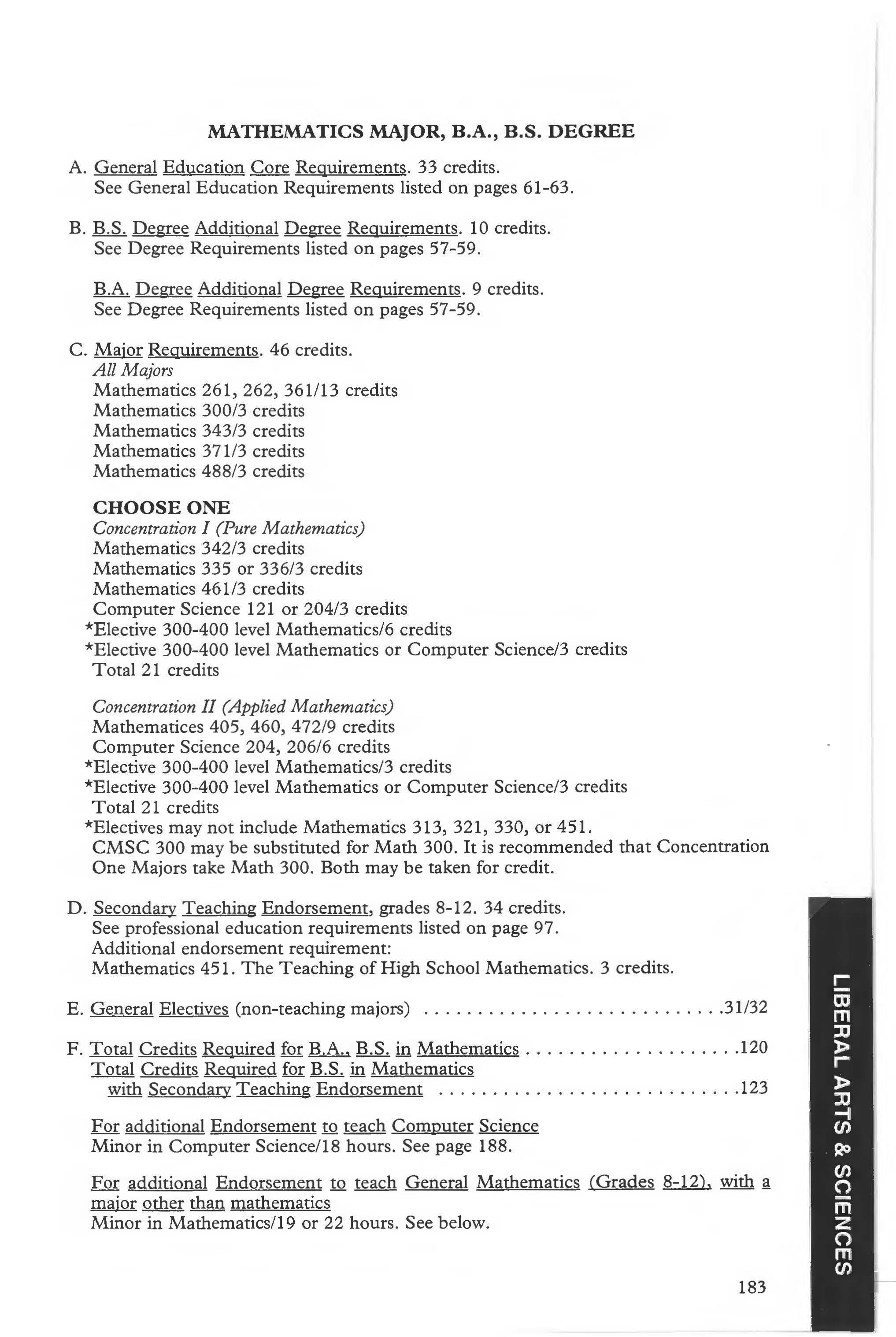
Students seeking 1;he B.A. degree must take 3 semester hours of one modem language at the 20_2 _level or higher and choose the humanities elective from Literature, Philosophy or Rehg1on.
Mathematics 261, 262/10 credits
**Electives: 300-400 level mathematics/3 credits 200-400 level computer science or mathematics/6 credits TOTAL/ 19 credits
**Electives may not include Mathematics 267, 271, 313, 321, and 451.
* Gen eral Education Courses
**Writing Intensive Course
*Mathematics 121. FUNCTIONS AND GRAPHS. A study of polynomial, rational, exponential, logarithmic and trigonometric functions with emphasis on graphing techniques, algebraic and numerical properties and applications. Prerequisite: Two years of high school algebra or by placement. 3 credits.
*Mathematics 171. STATISTICAL DECISION MAKING. An elementary statistics course designed to show the student how statistics is used in problem solving and decision making. Topics include measures of central tendency and variability; elementary probability concepts; the binomial, normal and Chi-square distributions, correlation and regression; and hypothesis testing. Special emphasis is placed upon the proper use of statistics in real life situations. 3 credits.
* Mathematics 267. APPL/CA TIO NS OF CALCULUS. A course designed for students in Business, Economics, and the Social and Life Sciences. The techniques of calculus are presented in an informal approach. Emphasis is on applications of the mathematical concepts of calculus, e.g., break-even analysis, optimization, spread of epidemics, population growth models. Credit will not be given in this course toward the mathematics major. Prerequisite: Mathematics 164 or equivalent. 4 credits.
Mathematics 114. MATHEMATICS FOR THE CONSUMER. An introductory course designed to acquaint the student
with the application of mathematics in the life of the consumer. Special attention will be given to the algebraic derivation of formulas, the reduction of real life situations to mathematical models, and the mathematics employed in banking, budgeting, credit, taxes, insurance, installment buying, annuities, stocks, bonds, and mortgages. 3 credits.
Mathemati cs 164. PRECALCULUS. A study of functions with an emphasis on exponential, logarithmic, and trigonometric functions in order to prepare the student for calculus. 3 credits.
Mathematics 181. FINITE MATHEMATICS. A study of discrete mathematical structures with applications primarily to business and economics. Topics will be selected from a review of sets; linear and quadratic functions; solving systems of linear equations using Gauss-Jordan elimination; matrix algebra; solutions of inequalities; linear programming, including the graphical methods and introduction to the simplex method; introductory probability; introduction to calculus; and mathematics of finance. 3 credits
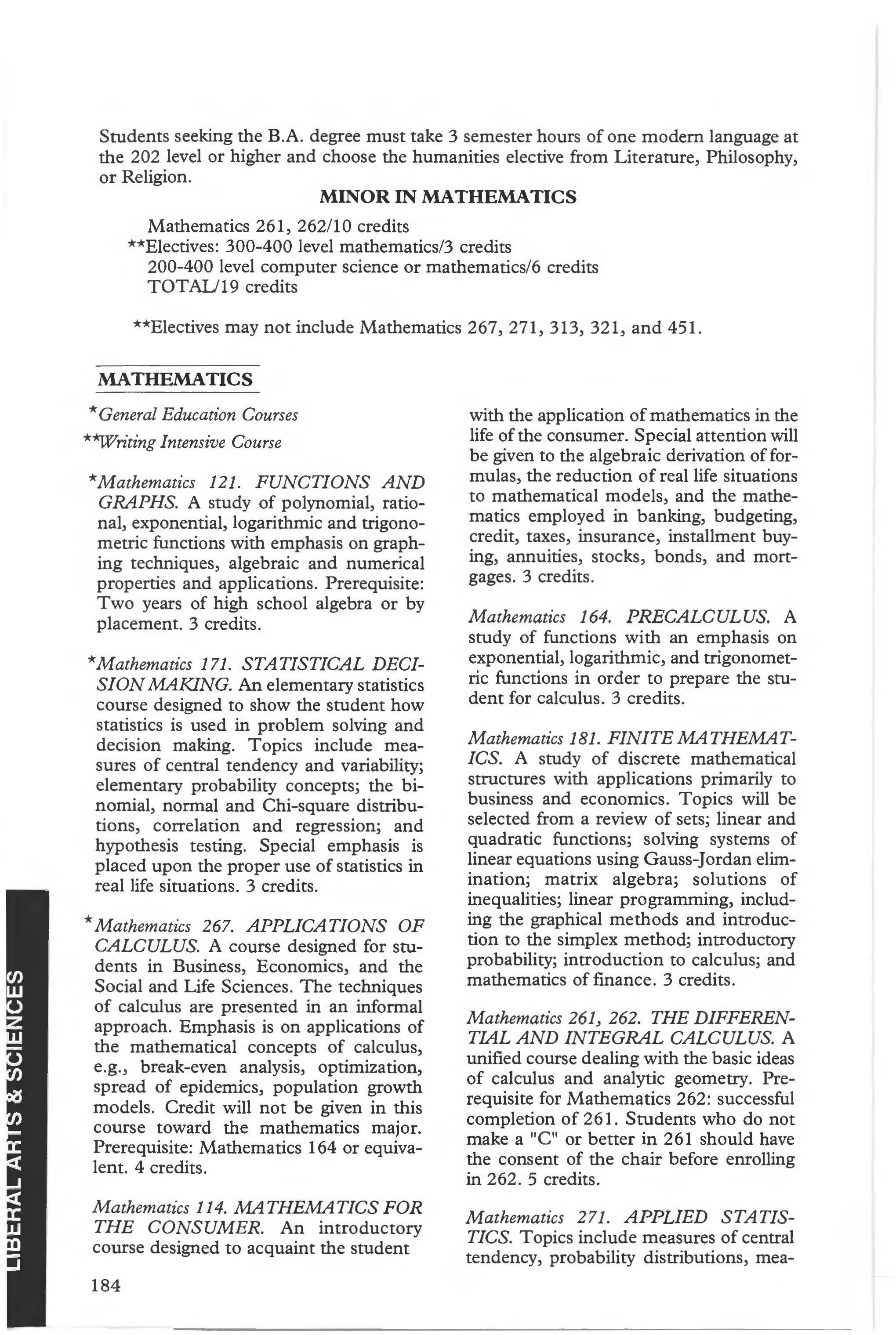
Mathematics 261, 262. THE DIFFERENTIAL AND INTEGRAL CALCULUS. A unified course dealing with the basic ideas of calculus and analytic geometry. Prerequisite for Mathematics 262: successful completion of 261. Students who do not make a "C" or better in 261 should have the consent of the chair before enrolling in 262. 5 credits.
Mathematics 271. APPLIED STATISTICS. Topics include measures of central tendency, probability distributions, mea-
'
sures of dispersion, correlation and linear regression, analysis of variance and covariance. The emphasis will be on linear modeling techniques to conduct hypothesis tests. Computer applications will be an integral part of the course. Knowledge of calculus will not be required. Credit will not be given toward the mathematics majors. 3 credits.
Mathematics 295. SPECIAL TOPICS. ~elected topics in mathematics. The topics may vary from semester to semester. May be repeated for credit when topics change. 1-3 credits.
** Mathematics 300. A TRANSITION TO ADVANCED MATHEMATICS. An introduction to rigorous mathematical proof with focus on the properties of the real number system. Topics include elementary symbolic logic, mathematical induction, algebra of sets, relations, countability, algebraic and completeness properties of the reals. 3 credits.
Mathematics 313. GEOMETRY, PROBABILITY AND STATISTICS. A basic study of polygons, polyhedra, measurement, transformational geometry, coordinate geometry, descriptive statistics, graphical methods and empirical and theoretical probabilities and their uses. 3 credits.
Mathematics 321. NUMERATION SYSTEMS. A study of different numeration systems. The development and characteristics of ancient numeration systems, base numeration systems and the real number system will be studied. Problem solving is emphasized. 3 credits.
Mathematics 330, Science 330. INTEGRATION OF MATHEMATICS AND SCIENCE PRINCIPLES. An inquiry into basic principles involved in the study of mathematics and science. Emphasis on measurement, use of manipulatives, inference, prediction, data analysis, and hypothesizing. For Liberal Studies Majors only. 3 credits.
Mathematics 335. ADVANCED EUCLIDEAN GEOMETRY. A study of Euclidean geometry from a more advanced view-
point. The methods and techniques of synthetic axiomatic geometry will be stressed through a study of logic and formal proof, constructions, higher Euclidean geometry, finite geometries, and nonEuclidean geometries. Prerequisite/corequisite: Mathematics 261. 3 credits.
Mathematics 336. SURVEY OF MODERN GEOMETRIES. A study designed to widen and enlarge the horizons of the students through an examination of some of the geometric developments since the time of Euclid. The characteristics and interrelatedness of various geometries-topological, projective, affine, similarity, Euclidean, non-Euclidean and inversion-will be briefly examined through transformations. Prerequisite: Mathematics 300. 3 credits.

Mathematics 342. INTRODUCTION TO MODERN ALGEBRA. Sets and mappings, integers, general algebraic systems, groups, rings, and fields. Prerequisite: Mathematics 300. 3 credits.
Mathematics 343. LINEAR ALGEBRA. A basic study of vector spaces, linear transformations, and their relationships to matrix algebra. Also included are determinants, isomorphism theorems, linear functionals, and dual spaces. Prerequisite: Mathematics 262 or consent of department chair. 3 credits.
Mathematics 345. NUMBER THEORY. An introductory course in additive and multiplicative number theory. Included are topics such as: divisibility, prime numbers, congruences, residue systems, linear and quadratic congruences, Diophantine equations, quadratic residues, and number theoretic functions. Prerequisite/corequisite: Mathematics 342 or consent of instructor. 3 credits.
* Mathematics 350 (Computer Science 350). ETHICAL ISSUES IN MATHEMATICS AND COMPUTER SCIENCE. Consideration of ethical implications of mathematics and computer science in society. Overview of ethical theory; case studies of situations illustrating ethical dilemmas. A knowledge of calculus and algorithms will be assumed. 1 credit.
Mathematics 351. INTRODUCTION TO TOPOLOGY. Topological spaces, continuous mappings, homeomorphisms, compactness, connectedness, metric spaces, and other selected topics in point set topology. Prerequisite: Mathematics 361. 3 credits.
Mathematics 361. CALCULUS III. Advanced topics in calculus not considered in Mathematics 261, 262. Prerequisite: Mathematics 262. Students who do not make "C" or better in 262 should have consent of the chair before enrolling. 3 credits.
Mathematics 371. INTRODUCTION TO PROBABILITY AND STATISTICS. Theory of probability; expected values of random variables; tests of hypotheses; sampling; the central limit theorem; regression analysis. Prerequisite: Mathematics 361. 3 credits.
Mathematics 405. NUMERICAL ANALYSIS. An investigation of numerical techniques of approximation, matrix computations, integration, and differentiation with emphasis on the solution of non-linear equations, linear systems and differential equations. The course will require use of the computer. Attention will be given to the problems of rounding error, conditioning, and stability. Prerequisite: Mathematics 343, 361 and Computer Science 204 or equivalent. 3 credits.

Mathematics 435. QUEUEING THEORY AND SIMULATION. A course covering the basic mathematics of queueing systems and the principles of the computer simulation of queueing systems. Topics include MIMI, M/G/1, and G/M/1 queues, Laplace and z-transforms, priority queueing, and basic computer simulation techniques. Also taught as Computer Science 435. Prerequisite: Computer Science 204 or equivalent, Mathematics 371. 3 credits.
Mathematics 451. THE TEACHING OF HIGH SCHOOL MATHEMATICS. A study of current practices in high school mathematics teaching with emphasis on principles, techniques, and materials. Required for those planning to teach high school mathematics. 3 credits.
Mathematics 460. DIFFERENTIAL EQUATIONS. Primarily a study of ordinary differential equations of the first and second order with application to elementary work in mechanics and physics Prerequisite: Mathematics 361. 3 credits.
Mathematics 461. ADVANCED CALCULUS. A theoretical approach to the study of limits, continuity, differentials, derivatives, and integrals. Development of the real number system, elementary point set theory, functions of several variables, infinite series, and power series. Prerequisite: Mathematics 300, 361. 3 credits.
Mathematics 472 INTRODUCTION TO MATHEMATICAL STATISTICS. Distribution of functions of random variables; moments and moment generating functions; T, F and Chi-square distributions; limiting distributions; interval estimation. Prerequisite: Mathematics 361 and 371. 3 credits.
Mathematics 481. COMPLEX ANALYSIS. An introduction to the fundamental concepts of complex analysis, including the complex plane, holomorphic functions, the exponential function, Cauchy integral formula, Taylor series, Laurent series, conformal maps, the notion of residues and some applications in physics. Prerequisite: Mathematics 361. 3 credits.
**
Mathematics 488. SENIOR SEMINAR. A capstone course for the mathematics major. Students will learn problem solving skills which will be useful in the academic/industrial community . Computer packages such as Mathematica, Maple, Tex and Internet will be introduced. Prerequisite: Mathematics Major and Senior Status 3 credits.
Mathematics 490. DIRECTED STUDY IN MATHEMATICS. Individualized study; recommended only when material cannot be studied through existing course offerings. Must have permission of department chair. 1-3 credits . May be repeated as 491, etc.; no more than 6 credits.
Mathematics 495. SPECIAL TOPICS. Selected topics in mathematics. The topics may vary from semester to semester.
May be repeated for credit when topics change. 1-3 credits.
For Graduates and Advanced Undergraduates
Math ematics 513. THE TEACHING OF PROBABILITY AND STATISTICS. This course is designed especially for teachers and will use an experiential, informal, activity-based approach . There will be hands-on activities and experiCOMPUTER SCIENCE PROGRAM
ments relating empirical and theoretical probabilities. Quick descriptive statistics and new graphical methods will be presented. These techniques are useful in describing, comparing, exploring and interpreting sets of data. There will also be intuitive ideas from inferential statistics. 3 credits.
Mathematics 595. WORKSHOPS IN MATHEMATICS. 1-3 credits.
John E Arehart, Ed.D., Associate Professor of Computer Science and Mathematics
Jeffery H . Peden, Ph.D., Assistant Professor of Computer Science Robert P Webber, Ph.D., Professor of Mathematics and Computer Science
While every attempt is made to state the requirements and concentrations available in the department as succinctly as possible, it is recommended that every student majoring or minoring in the department continue in close communication with the academic advisor assigned by the department in order to plan the program best suited to individual needs and goals
Students desiring a minor in computer science must successfully complete the appropriate program described below, and must see the Chair of the Department of Mathematics and Computer Science to declare officially a minor in this field.

COMPUTER SCIENCE MAJOR, B.A.,
A. General Education Core Requirements. 33 credits.
See General Education Requirements listed on pages 61-63
B. B A. Degree Additional Degree Requirements. 9 credits
See Degree Requirements listed on pages 57-59.
B.S . Degree Additional Degree Requirements. 10 credits.
See Degree Requirements listed on pages 57-59.
C. Major Requirements. 36 credits.
Computer Science 204, 206/6 credits
Computer Science 301, 306 / 6 credits
Computer Science 308, 311, 316/ 9 credits
Computer Science 360, 362 / 6 credits
Computer Science 488/3 credits
English 214/3 credits
MISY 370 / 3 credits
D . Options. (Choose one)
Con ce ntration I (Scientificffheoretical)
Computer Science 215/3 credits
Computer Science 300/3 credits
Computer Science 408/3 credits
Mathematics 261, 262 / 10 credits
Mathematics 343 / 3 credits
Mathematics 361/3 credits
Mathematics 371/3 credits
TOTAL 28 credits
**
Concentration II (Government/Industry)
Computer Science 201/3 credits
MISY 371/3 credits
Mathematics 267 /4 credits
Mathematics 271/3 credits Management 363/3 credits Economics 21 7, 218/6 credits
Psychology 259/3 credits
TOTAL 25 credits
Concentration III (Education)
Computer Science 452 / 3 credits
MISY 3 71/3 credits
Mathematics 267/4 credits Mathematics 271/3 credits
TOTAL 13 credits Math 300 may be substituted for Computer Science 300. It is recommended that Concentration One Majors take Computer Science 300. Both may be taken for credit.
E . Secondary Teaching Endorsement, Grades 8-12, 34 credits. See professional education requirements listed on page 93 Additional endorsement requirement: Mathematics 451, The Teaching of High School Mathematics, 3 credits.
F. General Electives Non-Teaching Majors: B.A./B.S. degree with Concentration I ............................. 13/14 B.A./B.S. degree with Concentration II ............................. 16/17
G. Total Credits Required for B.A. or B.S. degree 120 Total Credits Required for B.A. or B.S. degree with Secondary Teaching Endorsement 125/126
A minor in computer science shall consist of 18 credit hours of computer science courses, at least 12 hours of which must be at the 300 or 400 level.
* General Education
** Wn"ting Intensive Course
*Computer Science 121. INTRODUCTION TO COMPUTER SCIENCE. An introductory course in computer science with emphasis on techniques of structured programming, algorithms, problem solving and applications. A writing intensive course. 3 credits. Every semester.
Computer Science 156. INTRODUCTION TO COMPUTER BASED SYSTEMS. Introduction to the computer as a production tool. Topics include the relation of hardware and software, the operating system, the use of application software,
specifically word-processors, spread sheets, databases, and an introduction to programming. 3 credits.
Computer Science 201 (MISY 270). BEGINNING COBOL. An introduction to programming in a business oriented language (COBOL) with emphasis on commercial applications and elementary concepts of file processing. Prerequisite: Computer Science 156 or credit for another Computer Science course. 3 credits.
Computer Science 204. INTRODUCTION TO PROGRAMMING. An introductory course in computer science emphasizing
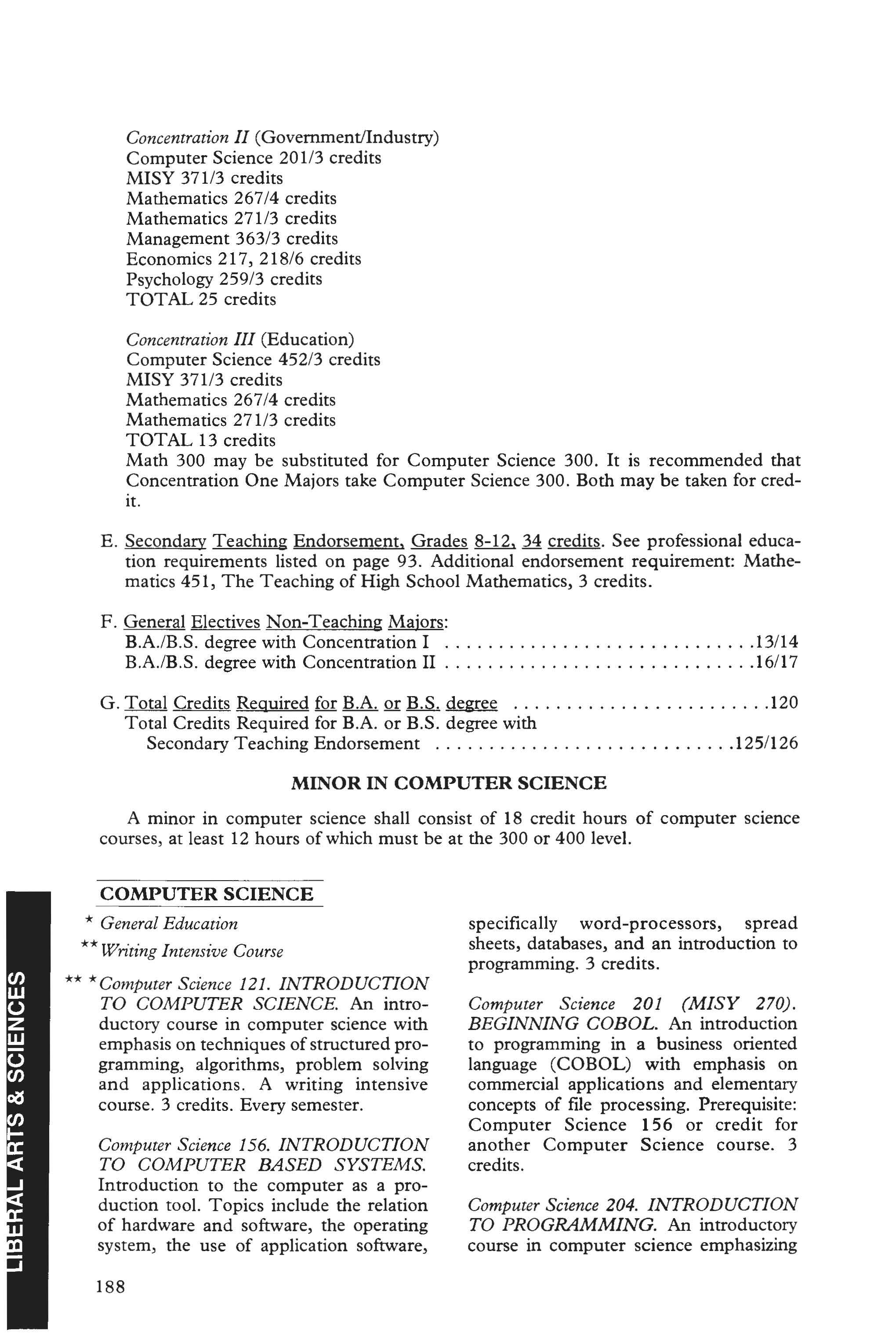
programming and algorithm development. Topics will include basic language structures, assignment, iteration, control flow, language and programmer defined variable types, and basic data manipulation models. 3 credits.
Computer Science 206. DATA STRUCTURES IN ADVANCED PROGRAMMING. A one semester course in advanced programming utilizing data structures and models. The course emphasizes advanced programming techniques in the manipulation of data structures. Prerequisite: Computer Science 204. 3 credits.
Computer Science 215. INTRODUCTION TO FORTRAN. An overview of the FOR TRAN programming language, with emphasis on applications to mathematics and science. Prerequisites: knowledge of another computer language. 3 credits.
Computer Science 272. FORTRAN FOR BUSINESS. An introduction to the FORTRAN programming language, with emphasis on applications in business. Prerequisities: Computer Science 121 or 201. 3 credits.
Computer Science 290. SELF STUDY IN PROGRAMMING. Independent study of a specific programming language, its syntax and applications, based on prior study of programming languages in general. May not duplicate other language courses. Must be arranged with an instructor and approved by department chair before registering. May be repeated for credit with different languages. Prerequisite: Computer Science 206. 1 credit.
Computer Science 295. SPECIAL TOPICS. Selected topics in computer science. The topics may vary from semester to semester. May be repeated for credit when topics change. 1-3 credits.
Computer Science 300. DISCRETE MA THEMA TICS FOR COMPUTER SCIENCE. Topics in discrete mathematics used in computer science, including methods of proof, graphs, computability, and formal grammars. Prerequisites: Computer Science 204 or 206. 3 credits.
Computer Science 301. COMPUTER ORGANIZATION AND ASSEMBLER LANGUAGE PROGRAMMING. Assembler language programming; addressing techniques; internal storage structure; machine-level representation of instructions and data; sub-routines. Prerequisites: Computer Science 206 or consent of instructor Fall only; 3 credits.
Computer Science 302. DATA ABSTRACTION PROGRAMMING. A one semester course in advanced programming utilizing the data abstraction programming paradigm. The course emphasizes advanced programming techniques used in the design, definition, and manipulation of abstract data types. Prerequisites: Computer Science 206 (or equivalent) using a language of instruction other than C++ and Computer Science 315 (or equivalent). Note: This course may not be taken for credit if credit has been received for Computer Science 206 (or equivalent) using C++ as the language of instruction. 3 credits.
Computer Science 306. COMPUTER ORGANIZATION. The organization and structuring of the major hardware components of computers; the mechanics of information transfer and control within a computer system; standard computer architectures; the fundamentals of logic design. Prerequisite: Computer Science 301. 3 credits.
**Computer Science 308. ORGANIZATION OF PROGRAMMING LANGUAGES. Topics include language and definition structure, data types and structures, control structures and data flow, run-time characteristics and lexical analysis and parsing. Programming assignments will involve the use of several different languages. Prerequisite: Computer Science 206 or permission of instructor. 3 credits.
Computer Science 311. INTRODUCTION TO OPERATING SYSTEMS AND COMPUTER ARCHITECTURE. Emphasis will be placed on concepts rather than case studies and on the interdependence of operating systems and architecture. Topics include instruction sets, 1/0 and interrupt structure, addressing schemes, microprogramming, memory management and recovery proce-
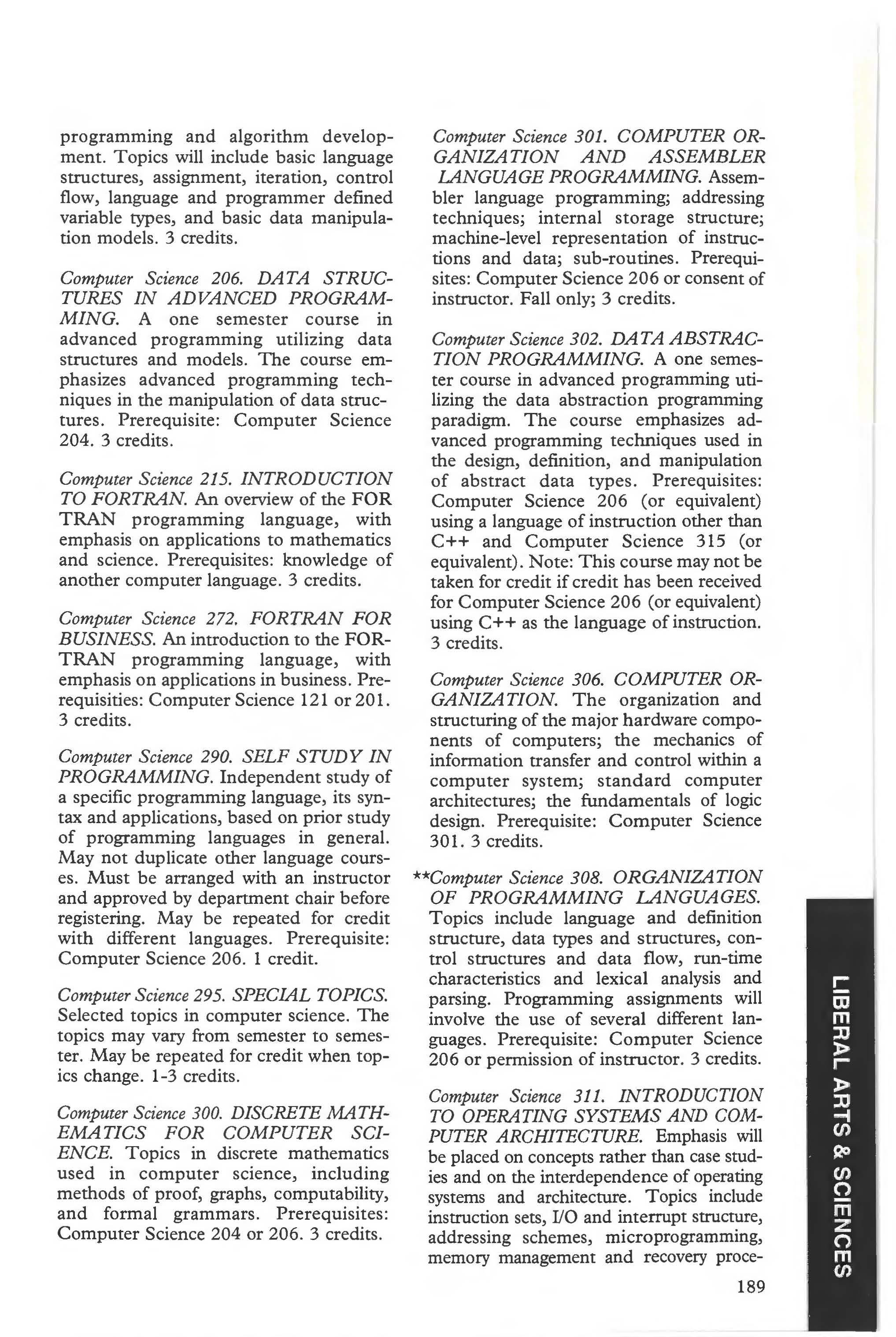
dures. Prerequisite: Computer Science 301. 3 credits.
Computer Science 315. THE C PROGRAMMING LANGUAGE. An advanced programming course utilizing the C programming language, with emphasis on control structures, the manipulation of data structures, and modular programming techniques. A programming intensive course. Prerequisites: Computer Science 204 or Computer Science 206. 3 credits.
Computer Science 316. OBJECT-ORIENTED PROGRAMMING. A course in the techniques of object-oriented programming in an object-oriented programming language. Topics covered include inheritance, function and operator overloading, object construction, visibility, information hiding, and multiple inheritance. Prerequisite: Computer Science 206. 3 credits.
Computer Science 323. NON-PROCEDURAL PROGRAMMING TOOLS. A study of non-procedural fourth generation languages and CASE tools. Prerequisite: Computer Science 206. 3 credits.
*Computer Science 350. (Mathematics 350). ETHICAL ISSUES IN MA THEMATICS AND COMPUTER SCIENCE. Consideration of ethical implications of mathematics and computer science in society. Overview of ethical theory; case studies of situations illustrating ethical dilemmas. A knowledge of calculus and algorithms will be assumed. 1 credit.
Computer Science 360. COMPUTER NETWORK THEORY. A course covering the theory and design of modem computer networks. Topics include local and wide area networks, the OSI network model, basic network performance analysis, and real time networks. Prerequisite: Computer Science 206. 3 credits.
**Computer Science 362. THEORY OF DATABASES. A course covering the theory and practice of modem databases design and implementation. Topics include relational and hierarchical database design, database query languages,
update consistency, and distributed databases. Prerequisite: Computer Science 206. 3 credits.
Computer Science 390. ARTIFICIAL INTELLIGENCE. An advanced theory and programming course covering the theory and techniques of artificial intelligence. Topics covered include computer vision, game playing, min-max algorithms, and an introduction to the LISP programming language. Prerequisite: Computer Science 206. 3 credits.
Computer Science 408. ADA AND SOFTWARE ENGINEERING. Syntax and semantics of the Ada programming language. Principles of Software Engineering. Prerequisites: Computer Science 204 or 206. 3 credits.
Computer Science 415. THEORY OF COMPUTATION. The basic theories underlying computer science, such as language and automata theory, and the computability of functions. Emphasis is placed on the development of theoretical machine and language descriptions. Prerequisite: Computer Science 300. 3 credits.
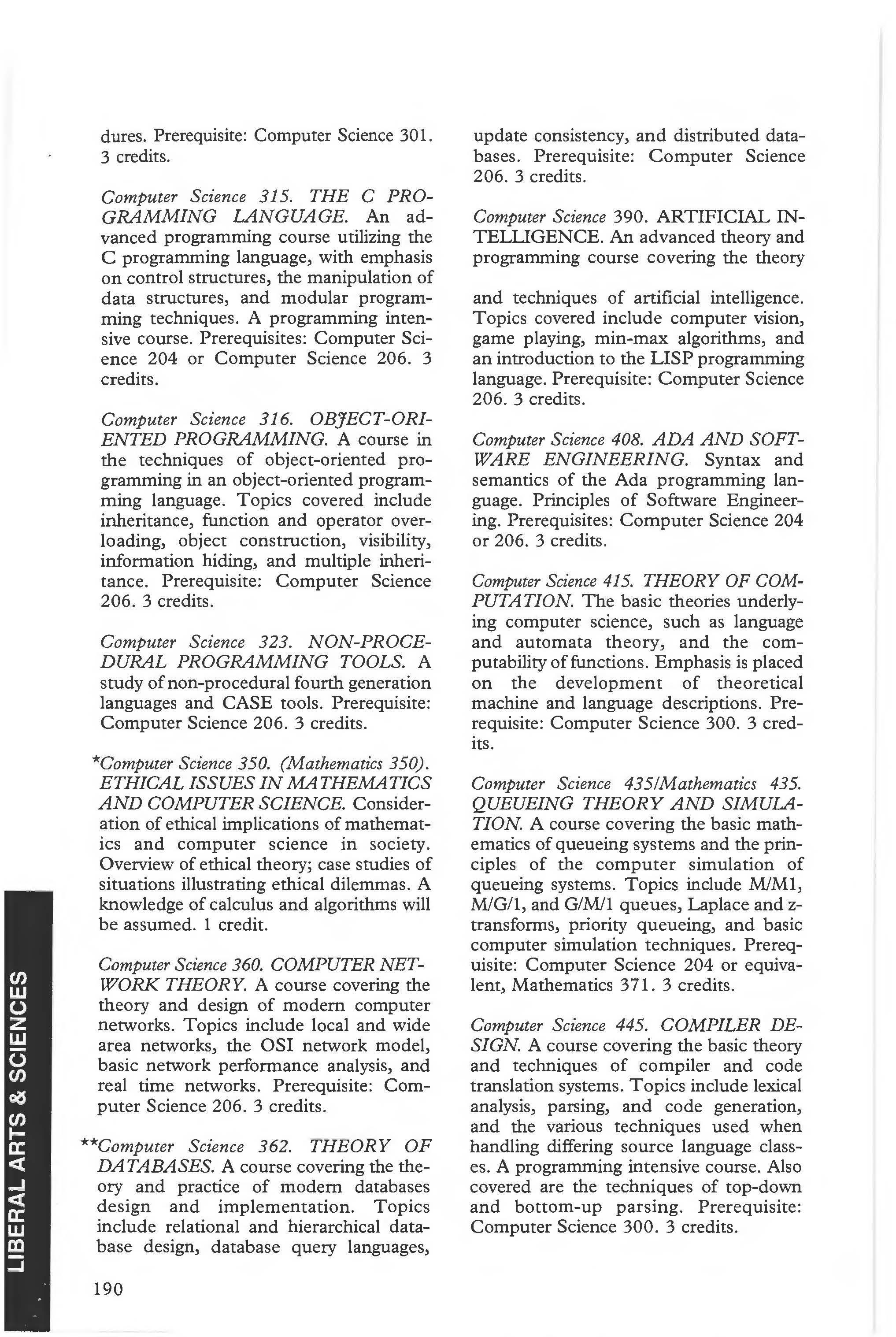
Computer Science 435/Mathematics 435. QUEUEING THEORY AND SIMULATION. A course covering the basic mathematics of queueing systems and the principles of the computer simulation of queueing systems. Topics include M/Ml, M/G/1, and G/M/1 queues, Laplace and ztransforms, priority queueing, and basic computer simulation techniques. Prerequisite: Computer Science 204 or equivalent, Mathematics 371. 3 credits.
Computer Science 445. COMPILER DESIGN. A course covering the basic theory and techniques of compiler and code translation systems. Topics include lexical analysis, parsing, and code generation, and the various techniques used when handling differing source language classes. A programming intensive course. Also covered are the techniques of top-down and bottom-up parsing. Prerequisite: Computer Science 300. 3 credits.
Computer Science 452. COMPUTERS IN EDUCATION. A survey of programming languages, software, and hardware commonly found in an educational setting. Prerequisite: Computer Science 206. 3 credits.
Computer Science 488. SEMINAR IN COMPUTER SCIENCE. Students will work individually and in terms on the development, implementation, and maintenance of a large software project This course is the capstone experience in the computer science major. A segment on assessment will be included. Corequisite: Satisfaction of all other requirements for the computer science major or consent of instructor. 3 credits.
Computer Science 490. DIRECTED STUDY IN COMPUTER SCIENCE. Individualized study; recommended only when material cannot be studied through existing course offerings. Must have permission of department chair. 1-3 credits May be repeated as Computer Science 491, etc.; no more than 6 credits.
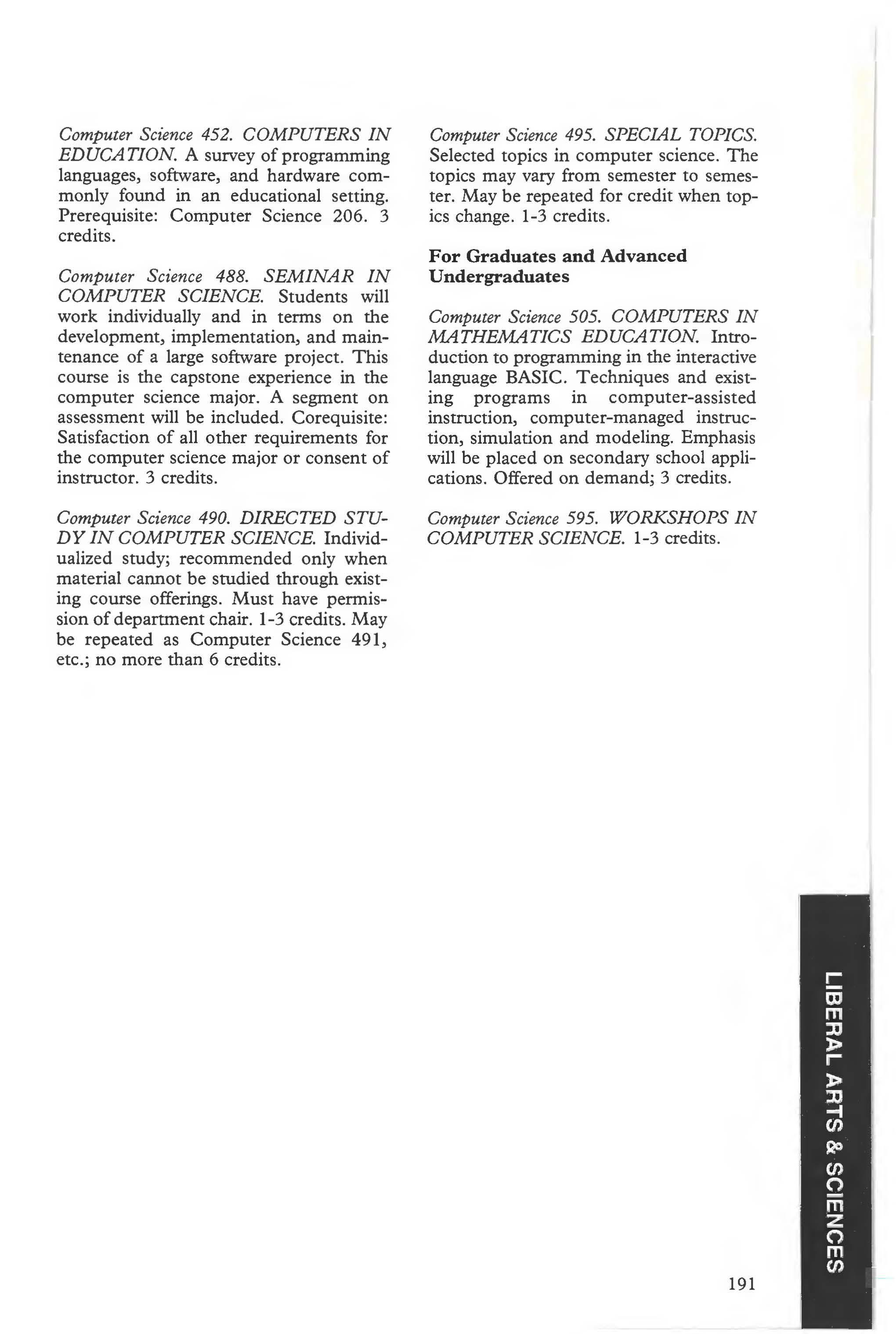
Computer Science 495. SPECIAL TOPICS . Selected topics in computer science. The topics may vary from semester to semester. May be repeated for credit when topics change. 1-3 credits.
Computer Science 505 COMPUTERS IN MATHEMATICS EDUCATION. Introduction to programming in the interactive language BASIC . Techniques and existing programs in computer-assisted instruction, computer-managed instruction, simulation and modeling. Emphasis will be placed on secondary school applications. Offered on demand; 3 credits.
Computer Science 595. WORKSHOPS IN COMPUTER SCIENCE. 1-3 credits
The purpose of the department is to educate students and the college community in music of all eras, styles, and types. Specifically, the department offers a curriculum designed for the training of music majors and for informing them of career opportunities in music; the curriculum offers the opportunities for majors to increase their musical literacy and sensitivity. The department makes available a general education in music for the non-music major and gives opportunities for members of the community to increase their music appreciation.
The Department of Music offers two degrees: the Bachelor of Arts degree with concentration in music, and the Bachelor of Music degree with concentration in Education, in Performance (voice, piano, organ, harpsichord, brass, woodwinds, strings, and percussion) or in Composition. Common to each degree is a basic music core outlined in the specific degree plans that follow .
The following additional requirements must be met by all music majors:
1. Each incoming Freshman music major or transfer student must audition and interview with the music faculty. Early in the first semester, a non-keyboard major must take a keyboard placement examination in order to determine the student's level of piano proficiency.
2. Every music major is required to enroll in an ensemble for credit each semester. For vocal majors that ensemble will be Concert Choir or Camerata Singers and for instrumental majors that ensemble will be Concert Band. Keyboard majors may choose from the three, depending upon abilities and professional track.
3. Students pursuing the B.M. degree in performance are required to present a half Junior recital and a full Senior recital. Students pursuing the B.A. in Music or the B.M. in the education concentration are required to present a minimum of a half Senior recital. Students pursuing the BM in Composition are required to present a half recital of original works and a half recital in the applied area.
4. All music majors must complete a piano proficiency examination prior to graduation . Students pursuing education degrees must complete the proficiency prior to student teaching.
The amount of credit in applied music that may be transferred from other institutions will be determined through evaluation of the student's ability by the Music faculty.
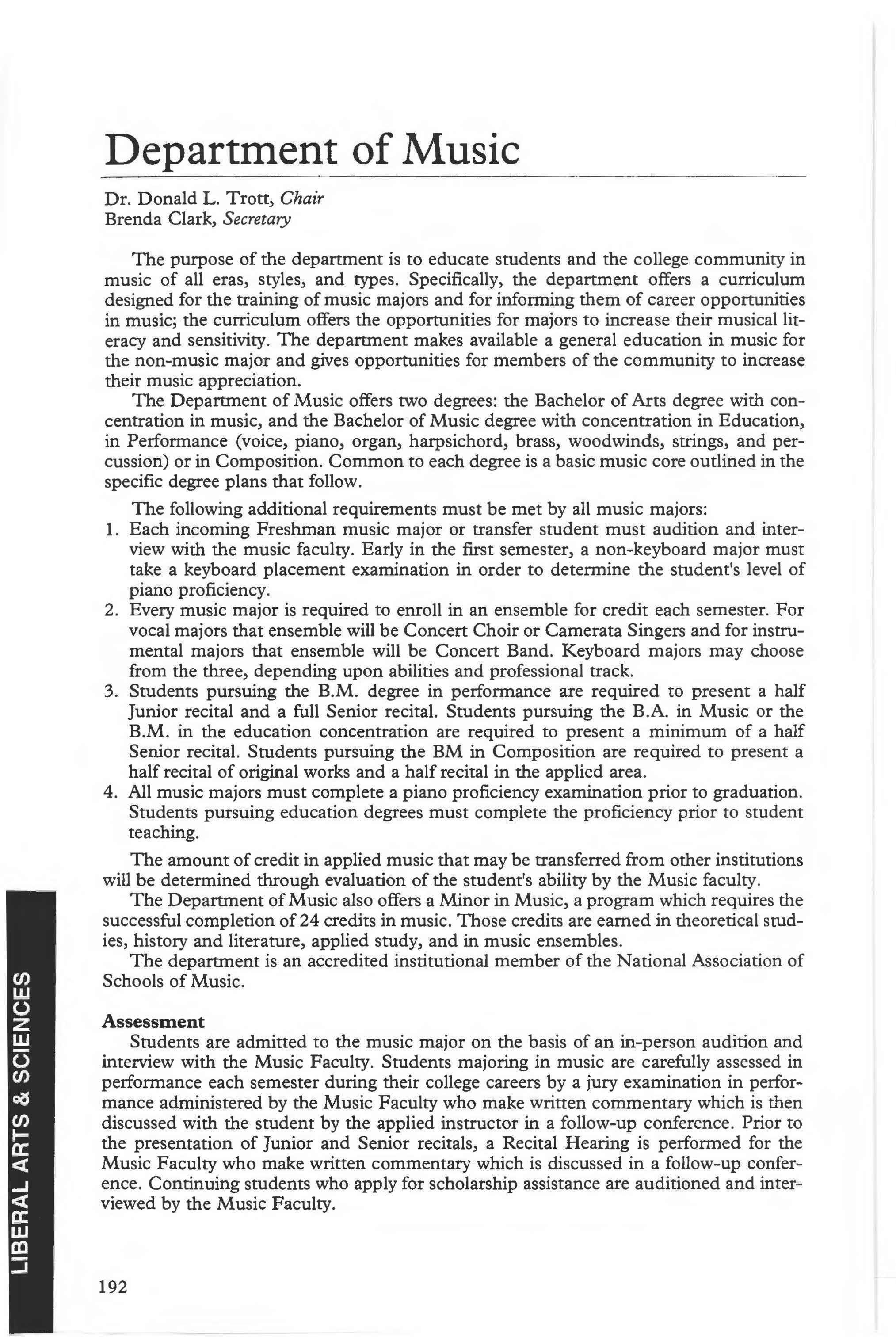
The Department of Music also offers a Minor in Music, a program which requires the successful completion of 24 credits in music. Those credits are earned in theoretical studies, history and literature, applied study, and in music ensembles.
The department is an accredited institutional member of the National Association of Schools of Music.
Students are admitted to the music major on the basis of an in-person audition and interview with the Music Faculty. Students majoring in music are carefully assessed in performance each semester during their college careers by a jury examination in performance administered by the Music Faculty who make written commentary which is then discussed with the student by the applied instructor in a follow-up conference. Prior to the presentation of Junior and Senior recitals, a Recital Hearing is performed for the Music Faculty who make written commentary which is discussed in a follow-up conference. Continuing students who apply for scholarship assistance are auditioned and interviewed by the Music Faculty.
All music faculty teach in each of the music degree programs listed below. Caroline Hong, D.M ., Assistant Professor of Music Charles E. Kinzer, Ph.D., Assistant Professor of Music Lisa B. Kinzer, M.M., Instructor of Music
*Patricia D. Lust, D.M., Professor of Music W. Bruce Montgomery, Ph.D., Professor of Music
**Gordon L. Ring, D.Mus.A., Associate Professor of Music Donald L. Trott, D.Mus.A., Associate Professor of Music Thomas A. Williams, M.M., Associate Professor of Music
* On leave Fall Semester 1997
** On leave Spring Semester 1998
(Applied Areas: Voice, Piano, Organ, Harpsichord, Brass, Woodwinds, Strings, Percussion)
The degree Bachelor of Arts with a Concentration in Music is a program of study in which the student is encouraged to develop skills as a practicing musician and which prepares the student with the necessary skills to pursue graduate studies in music literature or history. The degree program requiries a modem language in either German or French.
A. General Education Core Reguirements. 33 credits. See General Education Requirements listed on pages 61-63.
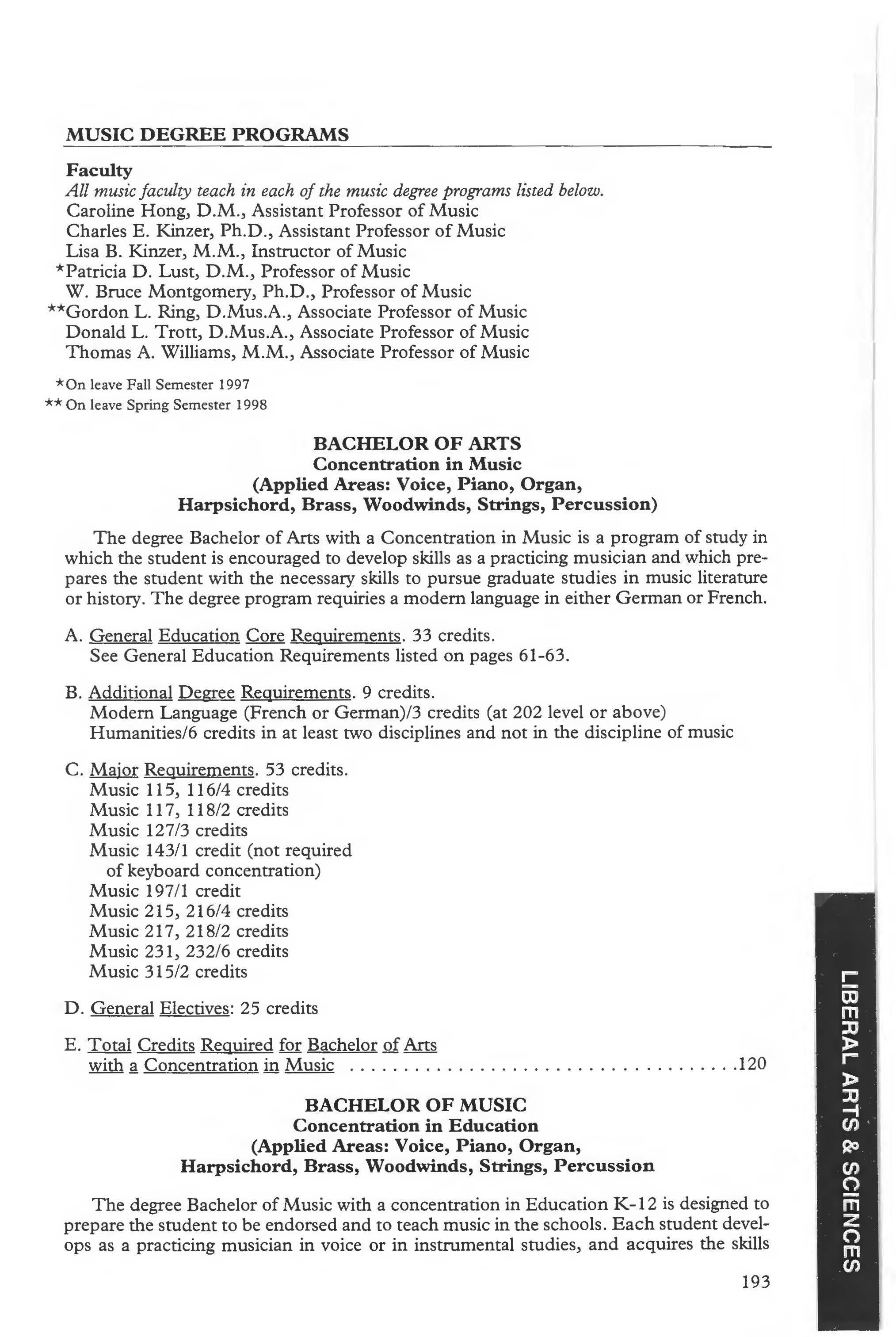
B. Additional Degree Reguirements. 9 credits. Modem Language (French or German)/3 credits (at 202 level or above) Humanities/6 credits in at least two disciplines and not in the discipline of music
C. Major Reguirements. 53 credits.
Music 115, 116/4 credits
Music 117, 118/2 credits
Music 127/3 credits
Music 143/1 credit (not required of keyboard concentration)
Music 197/1 credit
Music 215, 216/4 credits
Music 217, 218/2 credits
Music 231, 232/6 credits
Music 315/2 credits
D. General Electives: 25 credits
E. Total Credits Required for Bachelor of Arts with .!l Concentration in Music 120
(Applied Areas: Voice, Piano, Organ, Harpsichord, Brass, Woodwinds, Strings, Percussion
The degree Bachelor of Music with a concentration in Education K-12 is designed to prepare the student to be endorsed and to teach music in the schools. Each student develops as a practicing musician in voice or in instrumental studies, and acquires the skills
necessary to comunicate musical concepts and skills. Opportunities to observe and to teach in the classroom situation prepare the student for an intensive professional semester at the end of the program of study.
A. General Education Core Requirement. 33 credits. See General Education Requirements listed on pages 61-63.
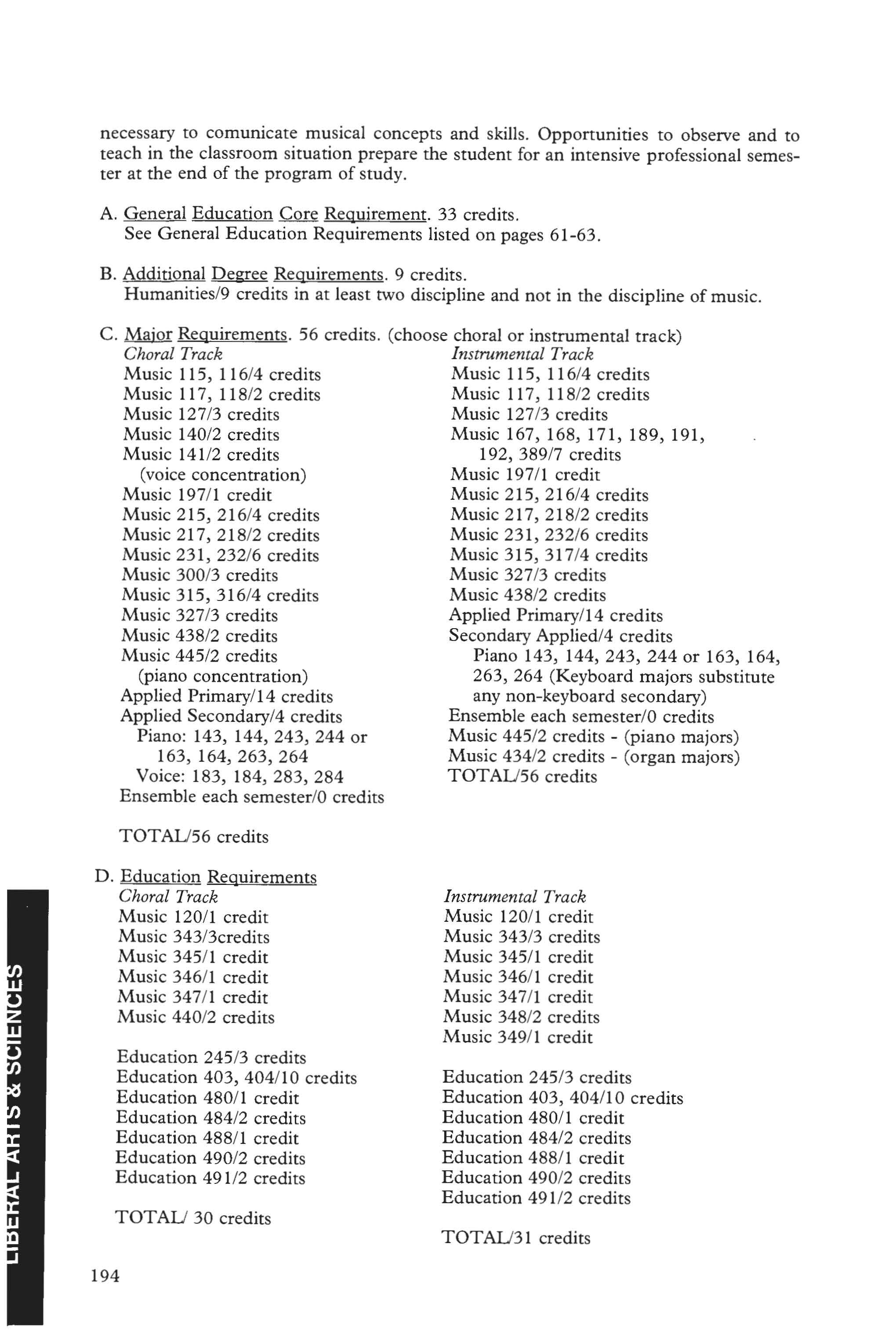
B. Additional Degree Requirements . 9 credits. Humanities/9 credits in at least two discipline and not in the discipline of music.
C. Major Requirements . 56 credits . (choose choral or instrumental track)
Choral Track Instrumental Track Music 115, 116/ 4 credits Music 115, 116/ 4 credits Music 117, 118 / 2 credits Music 117, 118/ 2 credits Music 127 / 3 credits Music 127 / 3 credits Music 140 / 2 credits Music 167,168, 171,189,191, Music 141/2 credits 192, 389/7 credits (voice concentration) Music 197 / 1 credit Music 197/ 1 credit Music 215, 216/ 4 credits Music 215, 216 / 4 credits Music 217, 218 / 2 credits Music 217, 218 / 2 credits Music 231, 232 / 6 credits Music 231, 232 / 6 credits Music 315, 317 / 4 credits Music 300 / 3 credits Music 327 /3 credits Music 315, 316 / 4 credits Music 438 / 2 credits Music 327 / 3 credits Applied Primary/ 14 credits Music 438 / 2 credits Secondary Applied / 4 credits Music 445 /2 credits Piano 143, 144, 243, 244 or 163, 164, (piano concentration) 263, 264 (Keyboard majors substitute Applied Primary/ 14 credits any non-keyboard secondary) Applied Secondary/ 4 credits Ensemble each semester/ 0 credits Piano: 143, 144, 243, 244 or Music 445 / 2 credits (piano majors) 163, 164, 263, 264 Music 434/ 2 credits (organ majors) Voice: 183, 184, 283, 284
TOTAU56 credits Ensemble each semester/ 0 credits
TOTAU56 credits
Choral Track
Music 120/1 credit Music 343 / 3credits Music 345 / 1 credit Music 346 / 1 credit Music 347 / 1 credit Music 440/ 2 credits
Education 245 / 3 credits
Education 403, 404 / 10 credits Education 480 / 1 credit Education 484 / 2 credits Education 488/1 credit Education 490/2 credits Education 491/2 credits
TOTAU 30 credits
Instrumental Track Music 120/ 1 credit Music 343 / 3 credits Music 345 / 1 credit Music 346/ 1 credit Music 34 7/ 1 credit Music 348/ 2 credits Music 349/ 1 credit
Education 245 / 3 credits
Education 403, 404 / 10 credits Education 480 / 1 credit Education 484 / 2 credits Education 488 / 1 credit Education 490 / 2 credits Education 491/2 credits
TOTAU31 credits
E. Total Credits Required for Bachelor of Music with .!l Concentration in Education 128 or 129
BACHELOR OF MUSIC Concentration in Performance (Applied Areas: Voice, Piano, Organ Harpsichord, Brass, Woodwinds, Strings, Percussion)
The degree Bachelor of Music is a performance degree in music. Areas of concentration include instrumental or vocal. In addition to developing the understanding of musical concepts and a knowledge of the historical musical styles, emphasis in the program is weighted to high achievement in musical performance .
A. General Education Core Requirements . 33 credits .
See General Education Requirements listed on pages 61-63.
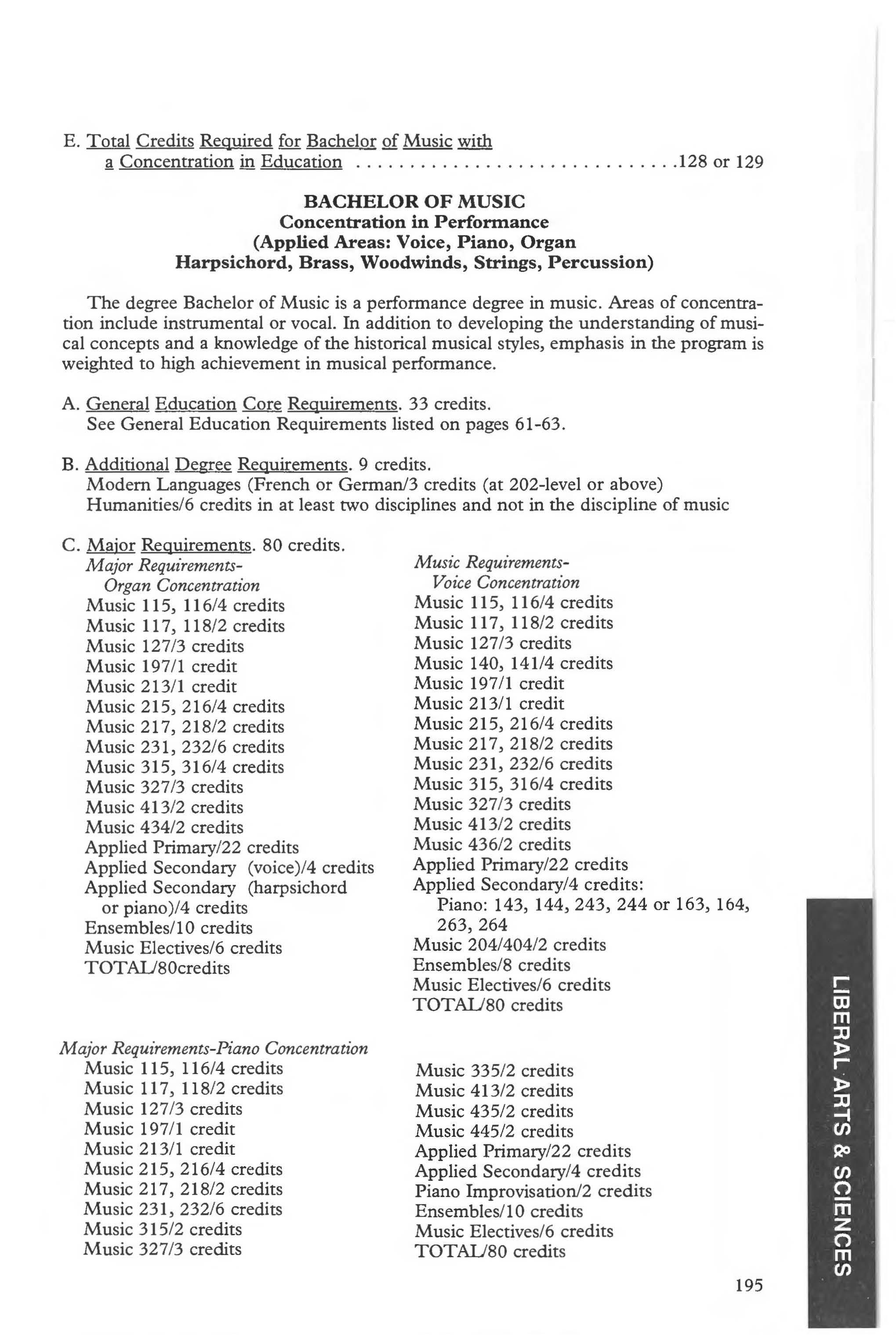
B Additional Degree Requirements. 9 credits.
Modem Languages (French or German/3 credits (at 202-level or above) Humanities/ 6 credits in at least two disciplines and not in the discipline of music
C. Major Requirements . 80 credits .
Major Requirem entsOrgan Conc entration
Music 115, 116/ 4 credits
Music 117, 118/ 2 credits
Music 127/ 3 credits
Music 197/1 credit
Music 213 / 1 credit
Music 215, 216 / 4 credits
Music 217, 218 / 2 credits
Music 231, 232 / 6 credits
Music 315, 316/4 credits
Music 327/3 credits
Music 413 / 2 credits
Music 434 / 2 credits
Applied Primary/ 22 credits
Applied Secondary (vo ice) / 4 credits
Applied Secondary (harpsichord or piano) / 4 credits
Ensembles / IO credits
Music Electives/6 credits
TOTAIJ80credits
Major R equ irem ents-Piano Conc entration
Music 115, 116/4 credits
Mu sic 11 7 , 118/2 credits
Music 127 / 3 credits
Music 197/ 1 credit
Music 213 / 1 credit
Music 215, 216/4 credits
Music 217, 218 / 2 credits
Music 231 , 232/ 6 credits
Music 315/2 credits
Music 327 / 3 credits
Mu sic Requirem ents
Voic e Conc entrati on
Music 115, 116/4 credits
Music 117, 118/ 2 credits
Music 127/3 credits
Music 140, 141/4 credits
Music 197 /1 credit Music 213 / 1 credit Music 215, 216 / 4 credits
Music 217, 218/2 credits
Music 231, 232 / 6 credits
Music 315, 316/4 credits
Music 327 / 3 credits
Music 413/2 credits Music 436/ 2 credits
Applied Primary/22 credits
Applied Secondary/ 4 credits:
Piano: 143, 144,243, 244 or 163, 164, 263,264
Music 204/ 404 / 2 credits
Ensembles/8 credits
Music Electives / 6 credits
TOTAIJ80 credits
Music 335/2 credits
Music 413 / 2 credits
Music 435 / 2 credits
Music 445/2 credits
Applied Primary/ 22 credits
Applied Secondary/4 credits
Piano Improvisation/2 credits
Ensembles/ 10 credits
Music Electives/6 credits
TOTAIJ80 credits
Major Requirements-Instrumental Concentration
Music 115, 116/4 credits
Music 11 7, 118/2 credits
Music 127/3 credits
Music 197/1 credit Music 215, 216/4 credits
Music 21 7, 218/2 credits
Music 231, 232/6 credits
Music 297/1 credit Music 315/2 credits
Music 31 7/2 credits Music 327 / 3 credits
D. Electives {fill concentrations)/4 credits
Music 413/2 credits
Music 433/2 credits Music 438/2 credits
Applied Primary/22 credits
Applied Secondary/4 credits: Piano: 143, 144, 243; 244 or 163, 164, 263, 264
Applied Secondary (voice)/2 credits
Ensembles/IO credits
Music Electives/6 credits
TOTAIJ80 credits
E. Total Credits Required fur Bachelor of Music with .a Concentration in Performance . . . ... .... .. .... ....... .... .... . . 126
The degree Bachelor of Music with a concentration in composition is designed both to prepare students for graduate study in composition and equip them with the knowledge and technical experience needed by composers today. Emphasis is also placed on twentieth century theoretical study and computer/MIDI experience.
A. General Education Core Requirements. 33 credits. See General Education Requirements listed on pages 61-63.
B. Additional Degree Requirements. 9 credits.
Computer Science 204/3 credits Humanities/6 credits in at least two disciplines and not in the discipline of music
C. Major Requirements. 80 credits.
Music 115, 116/4 credits
Music 11 7, 118/2 credits
Music 127/3 credits
Music 143/1 credit
Music 197 /1 credit
Music 215, 216/4 credits
Music 21 7, 218/2 credits
Music 231, 232/6 credits
Music 233/3 credits
Music 297(1 credit/semester)/4 credits
Music 315/2 credits
Music 316 or 31 7/2 credits
Music 327 /3 credits
Music 369, 370/4 credits
Music 413/2 credits
D. Electives (all concentrations) / 4 credits
Music 438/2 credits
Music 439/2 credits
Music 469, 470/4 credits
Music 497/(1 credit/semester)/4 credits
Applied Secondary/8 credits
Applied Secondary (Piano, unless applied area above is a keyboard instrument. All credits in the same applied area )/3 credits
Ensembles/8 credits
Music Electives/6 credits
TOTAIJ80 credits
E Total Credits Required for Bachelor of Music with .a Concentration in Composition 126

The Minor in music is a program which requires the successful completion of 24 credits in music. Those credits are earned in theoretical studies, history and literature, applied study, and in music ensembles. Music 115 and Music 116 must be taken prior to or during the first year of applied study.
Music 115, 116/4 credits
Music 117, 118/2 credits
Music 127/3 credits
Music electives/3 credits
Music Ensembles/2 credits
Applied Primary/8 credits
Applied Secondary/2 credits
TOTAIJ24 credits
MUSIC
A special fee is charged for all individual applied music courses.
*General Education Courses
** Wn"ting Intensive Course
* Music 169. GROUP PIANO. Piano for non-majors. Study of piano composition techniques, sightreading, and theory. Class taught in electronic piano lab. 1 credit.
* Music 181. VOICE CLASS. Voice class for non-majors. Study of vocal techniques, literature, sightreading, and diction. One small class instruction each week. 1 credit.
* Music 201-212. PERFORMING ENSEMBLES. (See page 198 or description.) 1 credit.
* Music 223. INTRODUCTION TO MUSIC. An introduction to the content and structure of music. A practical application through, performance and composition, of the fundamental theories of music. Not open to music majors. 4 credits.
* Music 224. THE APPRECIATION OF MUSIC. Study of Musical arts with regard to the composers and compositions of major style eras. Laboratory/concerts will emphasize critical analysis of live concerts, rehearsals and recitals. 4 credits.
* Music 236. MUSIC AND THE ARTS. A study of the elements of music and their relationship to literature and the visual arts. 3 credits.
Music 237. JAZZ, FOLK, ROCK, AND BROADWAY MUSICALS. Survey and
comparison of the styles, characteristics, composers, and performers of folk, jazz, rock, and Broadway music. 3 credits.
* PRIVATE APPLIED STUDY. By special permission of the Chair of the Music Department. A special fee is charged for private study. 1 credit.
Music 115. THEORY OF MUSIC. Introduction to fundamentals of music including notation, scales, intervals, triads and rhythm. 2 credits. Must be taken concurrently with MUSC 11 7.
Music 116. THEORY OF MUSIC. Continuation of 115 including voice leading, modulation and secondary chords. Prerequisite: MUSC 115. 2 credits. Must be taken concurrently with MUSC 118.
Music 117. SIGHTSINGING AND DICTATION. Ear training through sightsinging and dictation. 2 periods; 1 credit each semester. Must be taken concurrently with MUSC 115.
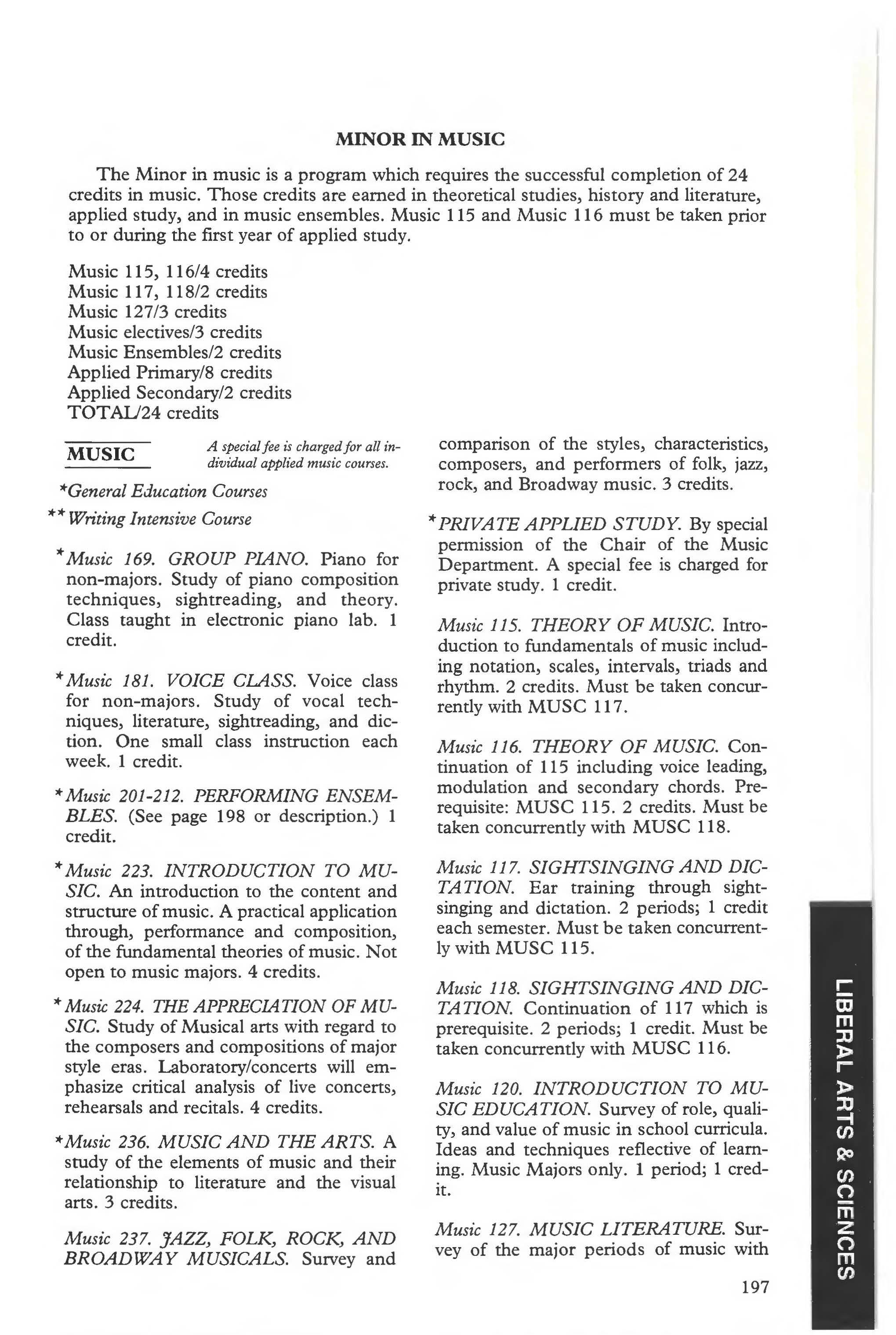
Music 118. SIGHTSINGING AND DICTATION. Continuation of 117 which is prerequisite. 2 periods; 1 credit. Must be taken concurrently with MUSC 116.
Music 120. INTRODUCTION TO MUSIC EDUCATION. Survey of role, quality, and value of music in school curricula. Ideas and techniques reflective of learning. Music Majors only. 1 period; 1 credit.
Music 127. MUSIC LITERATURE. Survey of the major periods of music with
examples of the works of principal composers in each period; the relation of music to other aspects of history and culture. 3 credits.
Music 140. DICTION FOR SINGERS I. Study of phonetics and the International Phonetic Alphabet . Accurate pronunciation in English, Latin and Italian. 2 periods; 2 credits.
Music 141. DICTION FOR SINGERS II. Study of phonetics and the International Phonetic Alphabet. Accurate pronunciation in German and French. Prerequisite: Music 140. 2 periods; 2 credits.
Music 143. BEGINNING PIANO I. Study and practice in basic keyboard techniques, sightreading, memorization, scales, arpeggios and chord progressions. Introduction to the piano literature. Open only to music majors and others by permission of the instructor. 1 credit.
Music 144. BEGINNING PIANO II. Continuation of Music 143 with individually assigned repertoire. Prerequisite: Music 143. 1 credit.
Music 197. INTRODUCTION TO COMPUTER APPLICATIONS IN MUSIC. An introduction to Musical Instrument Digital Interface (MIDI) and computer music applications including music notation, sequencing, and other software. One period; 1 credit.
Music 213. PIANO ACCOMPANYING. Study and practical application of accompanying for other students. Recommended for keyboard majors. 2 periods; 1 credit.
Music 215. THEORY OF MUSIC. Continuation of 116 including chromaticism and altered chords. Prerequisite: MUSC 116. 2 credits. Must be taken concurrently with MUSC 217.
Music 216. THEORY OF MUSIC. Continuation of 215, including late 19th and 20th century topics such as 12 tone and other contemporary compositional techniques Prerequisite: MUSC 215. 2 credits. Must be taken concurrently with MUSC 218.
MUSIC 217, 218. SIGHTSINGING AND DICTATION. Continuation of 117, 118 which are prerequisites. 2 periods; 1 credit each semester. Must be taken concurrently with MUSC 215 and MUSC 216.
Music 234 MUSIC OF THE THEATRE. Study of opera, operetta , incidental music . 3 credits.
Music 235. MUSIC OF THE CHURCH. Study of the development of music in the church from Gregorian chant to the present. 3 credits.
Music 238 MUSIC OF THE EIGHTEENTH CENTURY. Study of the forms, styles, and trends of the music of the eighteenth century; biography. 3 credits.
Music 239. MUSIC OF THE NINETEENTH CENTURY. Study of the forms, styles, and trends of the music of the nineteenth century; biography. 3 credits.
Music 243. INTERMEDIATE PIANO I. Continuation of Music 144 with the addition of improvisation. Prerequisite: Music 144. 1 credit.
Music 244. INTERMEDIATE PIANO II. Continuation of Music 243. Prerequisite: Music 243. 1 credit .
Music 295, 495. SPECIAL TOPICS. Music 297, 497. COMPOSITION. Instruction in techniques of composing music Prerequisite: Music 115, 117 or consent of instructor. May be repeated for credit. l class and 1 private lesson; 1 credit.

Music 300. INSTRUMENTAL SURVEY. Survey of string, percussion, brass, and woodwind families. Study of history, members of each family, range, timbre, and transposition. Required of music education voice and keyboard majors.3 credits.
Music 315. CONDUCTING. Technique of the baton; score reading; rehearsal procedures; vocal and instrumental conducting. 2 credits.
Music 316. ADVANCED CHORAL CONDUCT/NG. Continuation of Music 315 which is prerequisite. 2 periods; 2 credits.
Music 317. ADVANCED INSTRUMENTAL CONDUCTING. Continuation of Music 315 which is prerequisite. 2 credits.
Music 321. JAZZ IMPROVISATION. A theory/performance class designed to acquaint the student with improvisation in the jazz idiom. Technical competence on an instrument or in voice required. Prerequisite: permission of the instructor. 1 credit.
Music 322. KEYBOARD IMPROVISATION. Fundamentals of jazz and commercial music for keyboard. Open to keyboard majors in the Bachelor of Music (performance) degree program and others with consent of the instructor. Co-requisite: Music 321. 1 credit.
Music 327. FORM AND ANALYSIS. Harmonic and formal analysis of compositions of each period. Prerequisite: Music 215, 216. 3 credits.
Music 331, 332. HISTORY OF MUSIC. History of music of western civilization with examples. Open to non-music majors only with permission of instructor. 3 credits each semester.
Music 335. PIANO DUET AND DUOPIANO LITERATURE. Study and performance of piano ensemble music. Includes both piano duet literature and duo-piano literature. Required of B.M. piano concentrators; open to others with permission of instructor. 2 periods; 2 credits.
Music 343. MUSIC AND SUPERVISION IN THE ELEMENTARY SCHOOL. Study of music appropriate for early childhood through primary and upper elementary school levels. Emphasis given to the behaviors of singing, playing, moving, listening, reading, and creating. Music major status with MUSC 120 completed or non-major with MUSC 223 completed. 3 credits.

Music 345. PRACTICUM IN ELEMENTARY SCHOOL. Students, through observation and participation, are introduced to the daily routine and music curriculum in the elementary school. 1 credit.
Music 346. PRACTICUM IN JUNIOR HIGH OR MIDDLE SCHOOL. Students, through observation and participation, are introduced to the daily routine and music curriculum (instrumental or choral) in the junior high or middle school. 1 credit.
Music 347. PRACTICUM IN HIGH SCHOOL. Students, through observation and participation, are introduced to the daily routine and music curriculum (instrumental or choral) in the high school. 1 credit.
Music 348. INSTRUMENTAL MUSIC IN THE SCHOOLS. Study of all the band and orchestral instruments. Embouchure and technical development; rehearsal techniques; fundamentals of marching, materials. 2 credits.
Music 349. MARCHING BAND FUNDAMENTALS. Marching band fundamentals class for instrumental majors who plan to teach on secondary music level. Involves classwork, observation at neighboring high schools during pre-game and half-time shows, and writing marching shows to be appropriately coordinated with music. Taken concurrently with Music 348. 1 credit.
Music 389. VOCAL TECHNIQUES. Voice class for instrumental majors. Study of vocal techniques, literature and diction. One small-class instruction per week. Prerequisites: Music 117 and 118. 1 credit.
Music 413. COUNTERPOINT. Strict and free counterpoint; motivic development; invertable counterpoint. Prerequisite: Music 127, 215, 216. Offered on demand. 2 credits.
Music 431. MUSIC OF THE TWENTIETH CENTURY. Study of the forms, styles, and trends of the music of the twentieth century; biography. Prerequi-
sites: MUSC 331, 332 or pernuss10n of the instructor. 3 credits.
Music 433. INSTRUMENT LITERATURE. Study of composers and major compositions of wind instruments. Baroque to the present. May be combined with band and instrumental literature. 2 periods; 2 credits .
Music 434. ORGAN LITERATURE. Study of the literature of the organ through performance and listening. Required of organ concentrators. 2 periods; 2 credits.
Music 435. PIANO LITERATURE. Study of the literature of the piano through performance and listening. Required of piano 2 periods; 2 credits.
Music 436. VOCAL LITERATURE. Study of the literature of the voice through performance and listening . 2 periods; 2 credits.
Music 437. VOCAL PEDAGOGY. Study of the principles of voice production and voice teaching. Laboratory with beginning voice students. 2 periods; 2 credits.
Music 438. ARRANGING. Study and practice of arranging in different voice and instrument combinations with attention to style, range, form, and difficulty. Prerequisite: Music 216. 2 periods; 2 credits.
Music 439. ADVANCED ANALYSIS. Continuation of Music 327, which is prerequisite. 2 periods; 2 credits.
Music 440. CHORAL METHODS AND MATERIALS. Study of methods and materials appropriate for secondary school choral music with emphasis on organization, festivals, curriculum, and vocal / choral techniques. Prerequisites: 315, 316. 2 periods; 2 credits.
Music 445. TEACHING PIANO. Techniques and materials of teaching piano individually and in groups. Observation and teaching of demonstration groups. 2 periods; 2 credits.
Opportunity is offered most areas: Voice, Piano, Organ, Harpsichord, Brass,
Woodwinds, Strings, and Percussion
Incoming Music majors must audition in their areas of concentration. The following is a list of areas of applied study Music majors take "concentration" for their main instrument, "secondary" for their minor instrument. Non-majors normally enroll in elective/ general education classes (See General Education listing on page 61-63.)
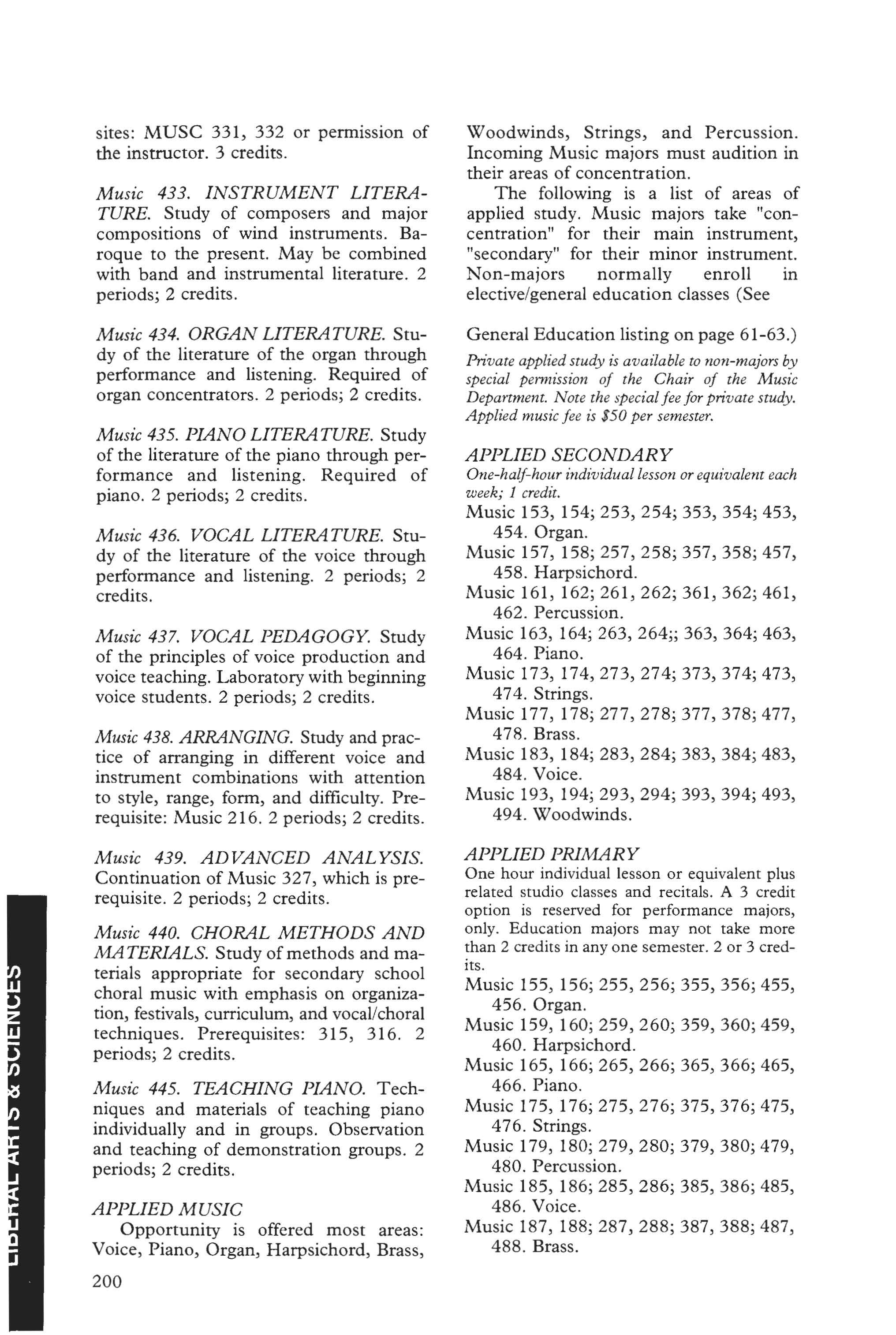
Private applied study is available to non-majors by special p em1ission of the Chair of the Musi c Department. Not e th e special fee for private study. Applied music f ee is $50 per semester.
One-half-hour individual lesson or equivalent each week; 1 credit. Music 153, 154; 2 53, 2 54; 353, 354; 453, 454. Organ. Music 157, 158; 257,258; 357,358; 457, 458. Harpsichord. Music 161, 162; 261,262; 361,362; 461, 462 . Percussion. Music 163, 164; 263, 264;; 363, 364; 463, 464 Piano. Music 173,174,273,274; 373,374; 473, 474. Strings. Music 177, 178; 277, 278; 377, 378; 477, 478. Brass. Music 183, 184; 283, 284; 383, 384; 483, 484 . Voice . Music 193, 194; 293, 294; 393, 394; 493, 494. Woodwinds.
One hour individual lesson or equivalent plus related studio classes and recitals. A 3 credit option is reserved for performance majors, only. Education majors may not take more than 2 credits in any one semester. 2 or 3 credits . Music 155, 156; 255,256; 355,356; 455, 456. Organ. Music 159, 160; 259, 260; 359, 360; 459, 460. Harpsichord. Music 165, 166; 265, 266; 365, 366; 465, 466 . Piano. Music 175, 176; 275, 276; 375, 376; 475, 476. Strings. Music 179, 180; 279,280; 379,380; 479, 480. Percussion. Music 185, 186; 285, 286; 385, 386; 485, 486. Voice. Music 187, 188; 287, 288; 387, 388; 487, 488 . Brass.
Music 195, 196; 295, 296; 395, 396; 495, 496. Woodwinds.
INSTRUMENTAL TECHNIQUES AND METHODS. An examination of the pedagogical materials and techniques appropriate to the instruction of students in instrumental music. Achieving a grade 34 technique in performance will be required.
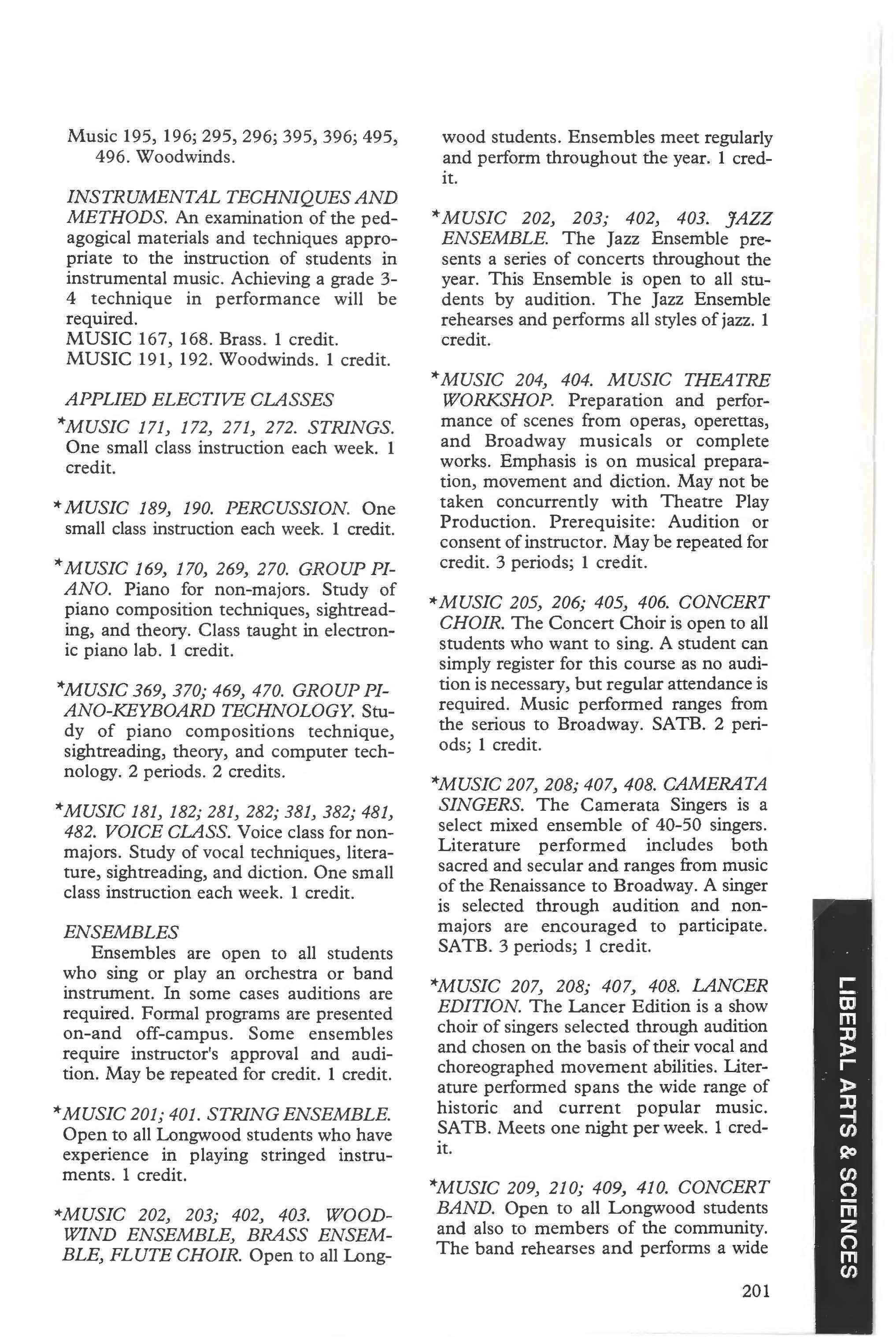
MUSIC 167, 168. Brass. 1 credit. MUSIC 191, 192. Woodwinds . 1 credit.
*MUSIC 171, 172, 271, 272. STRINGS. One small class instruction each week. 1 credit.
* MUSIC 189, 190. PERCUSSION. One small class instruction each week. 1 credit.
*MUSIC 169, 170, 269, 270. GROUP PIANO. Piano for non-majors. Study of piano composition techniques, sightreading, and theory. Class taught in electronic piano lab. 1 credit.
*MUSIC 369, 370; 469, 470. GROUP PIANO-KEYBOARD TECHNOLOGY. Study of piano compositions technique, sightreading, theory, and computer technology. 2 periods. 2 credits.
*MUSIC 181, 182; 281, 282; 381, 382; 481, 482. VOICE CLASS. Voice class for nonmajors Study of vocal techniques, literature, sightreading, and diction. One small class instruction each week. 1 credit.
Ensembles are open to all students who sing or play an orchestra or band instrument. In some cases auditions are required. Formal programs are presented on-and off-campus. Some ensembles require instructor's approval and audition. May be repeated for credit. 1 credit.
*MUSIC 201; 401. STRING ENSEMBLE. Open to all Longwood students who have experience in playing stringed instruments. 1 credit.
*MUSIC 202, 203; 402, 403. WOODWIND ENSEMBLE, BRASS ENSEMBLE, FLUTE CHOIR. Open to all Long-
wood students. Ensembles meet regularly and perform throughout the year. 1 credit .
* MUSIC 202, 203; 402, 403. JAZZ ENSEMBLE. The Jazz Ensemble presents a series of concerts throughout the year. This Ensemble is open to all students by audition. The Jazz Ensemble rehearses and performs all styles of jazz. 1 credit.
*MUSIC 204, 404. MUSIC THEATRE WORKSHOP. Preparation and performance of scenes from operas, operettas, and Broadway musicals or complete works. Emphasis is on musical preparation, movement and diction. May not be taken concurrently with Theatre Play Production. Prerequisite: Audition or consent of instructor. May be repeated for credit. 3 periods; 1 credit.
* MUSIC 205, 206; 405, 406. CONCERT CHOIR. The Concert Choir is open to all students who want to sing . A student can simply register for this course as no audition is necessary, but regular attendance is required. Music performed ranges from the serious to Broadway. SATB. 2 periods; 1 credit.
*MUSIC 207,208; 407,408. CAMERATA SINGERS. The Camerata Singers is a select mixed ensemble of 40-50 singers. Literature performed includes both sacred and secular and ranges from music of the Renaissance to Broadway. A singer is selected through audition and nonmajors are encouraged to participate. SATB. 3 periods; 1 credit.
*MUSIC 207, 208; 407, 408. LANCER EDITION. The Lancer Edition is a show choir of singers selected through audition and chosen on the basis of their vocal and choreographed movement abilities. Literature performed spans the wide range of historic and current popular music. SATB. Meets one night per week. 1 credit.
*MUSIC 209, 210; 409, 410. CONCERT BAND. Open to all Longwood students and also to members of the community. The band rehearses and performs a wide
range and variety of concert band literature. 2 periods; 1 credit
* MUSIC 211, 212; 411, 412. HANDBELL ENSEMBLE. Instruction and participation in the art of ringing English handbells resulting in a performing handbell ensemble This ensemble is open to all students by audition. 2 periods. I credit.
MUSIC 542. MUSIC IN THE ELEMENTARY SCHOOL.
MUSIC 544. MUSIC IN THE INTEGRATED CURRICULUM
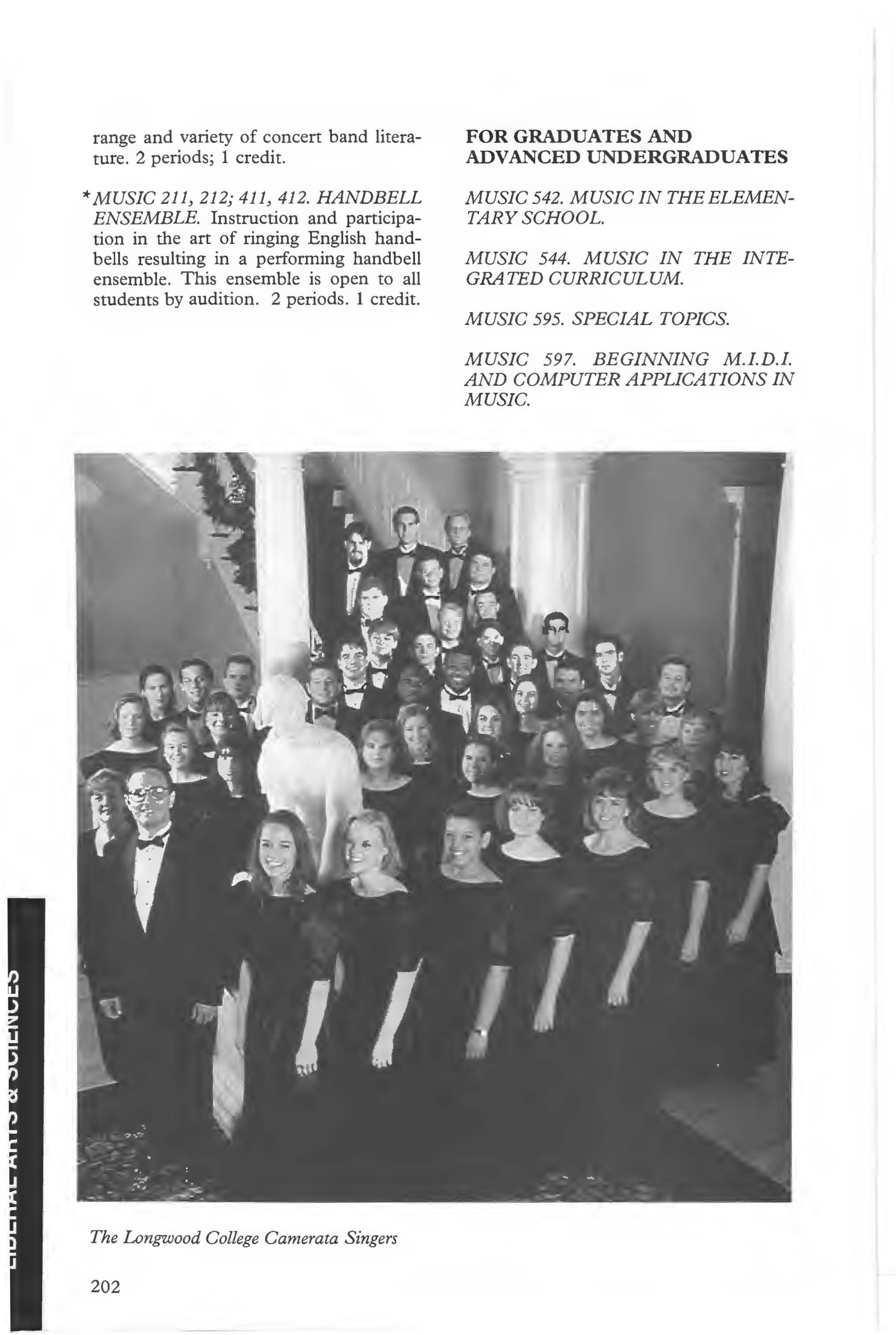
MUSIC 595. SPECIAL TOPICS.
MUSIC 597. BEGINNING M.I.D.I. AND COMPUTER APPLICATIONS IN MUSIC
Carolyn Wells, Chair
Janette A. Nielsen, Secretary
Betty J. Woodie, Fiscal Manager
Francis D. Twombley, Director of Laboratory Services and Hazardous Waste Manager
The Department offers majors in biology, chemistry, and physics; minors are available in biology, chemistry, earth science, environmental studies, geography, and physics. A student may major or minor in more than one area with the appropriate selection of courses The Department also offers degrees in cooperation with other institutions in the fields of pre-engineering and medical technology. Pre-professional medical programs prepare students to transfer to professional schools in a number of health oriented professions. The Department of Natural Sciences offers courses which satisfy the science requirements for general education in all degree programs of the College.
The aim of study in this department is to develop an interest in the natural world and to acquire the scientific habits of problem-solving through experimentation, accurate observation, exact statements, and independent thought.
ASSESSMENT: The Department of Natural Sciences requires senior majors to take a comprehensive achievement test. The purpose of the test is to assess the progress of the majors and the effectiveness of the program.
Billy S. Batts, Ph.D., Associate Professor of Biology and Area Coordinator
Sandra J. Brei!, Ph.D., Associate Professor of Biology
Thelma H. Dalmas, M.S., Instructor in Biology
*Lynn M. Ferguson, Ph.D., Professor of Biology and Earth Science
Dana P Johnson, M.S., Adjunct Instructor in Biology
Donald A. Merkle, Ph.D., Associate Professor of Biology and Director of Health Pre-Professional Programs Gary D. Oxford, Ph.D., Assistant Professor of Biology Marvin W. Scott, Ph.D., Professor of Biology C. Michael Stinson, Ph.D., Instructor in Biology Wayne H. Tinnell, Ph.D., Professor of Biology Carolyn Wells, Ph.D., Professor of Biology and Chair of Department of Natural Sciences
* On leave Fall Semester 1997
The biology major at Longwood provides fundamental training in many areas of the biological sciences so that graduates may pursue graduate study or careers in research, industry, teaching, medicine, dentistry, or allied health fields. To provide a broad background in the biological program, each student must take biological concepts, general botany, general zoology, evolution, genetics, unifying biological principles, biological seminar, and a course from each of the areas of morphology, physiology, and ecology. A minimum of 38 credit hours in biology (including 7 elective hours) is required for all majors. A student who is in another major may obtain a biology minor. The minor program requires 8 semester hours at the introductory level, 8 hours at the 200 level or above, 4 hours at the 300 level or above, and 4 hours of electives for a total of 24 semester hours. Students are encouraged to enroll in a program of honors study or in a research project in biology.
A student may seek secondary teaching endorsement in biology. This program consists of all courses required of a biology major and Education 245, 260, 265, 455, Science
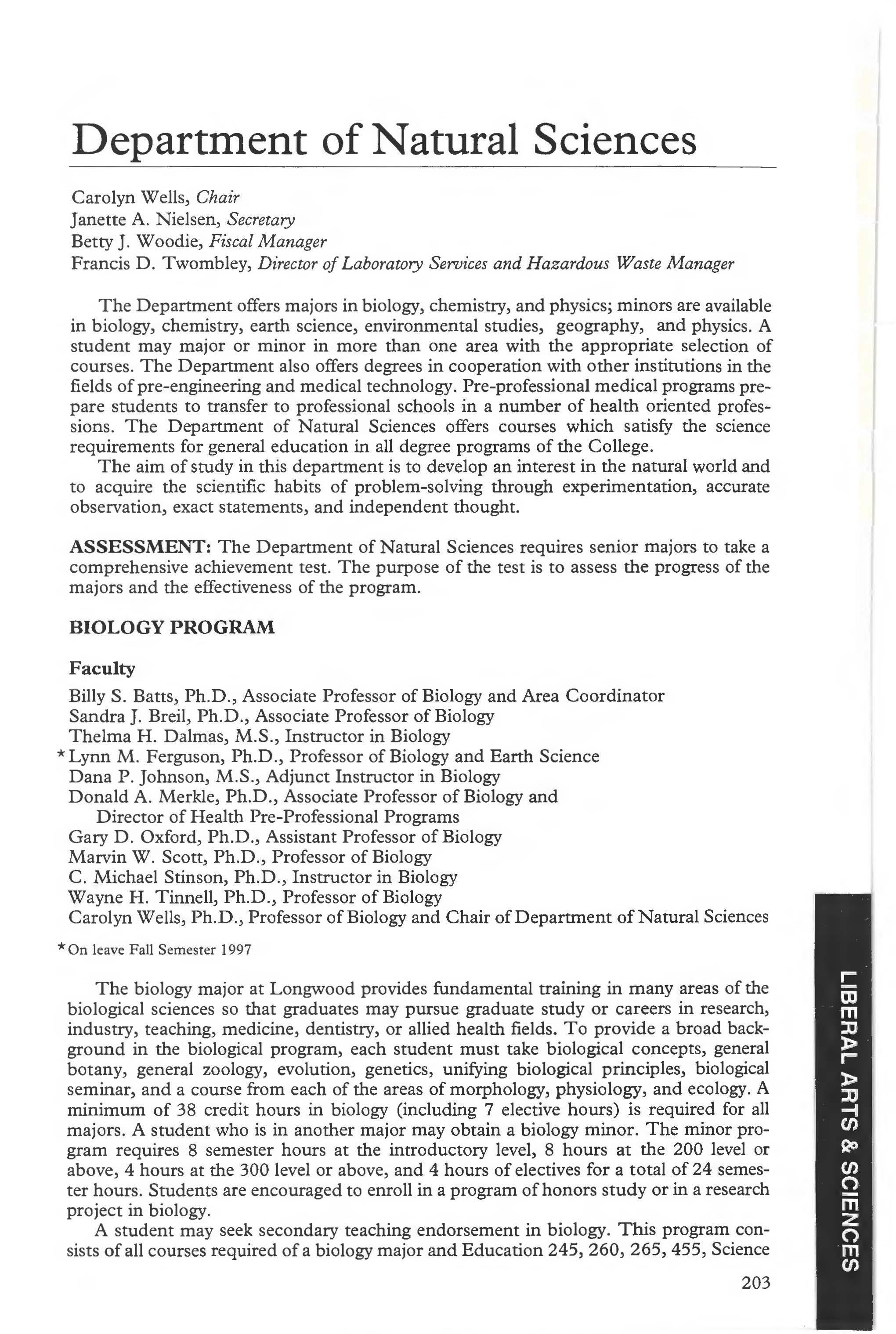
352, and the professional semester consisting of 18 hours including student teaching in the senior year. If an additional endorsement in chemistry, earth science, or physics is desired, the student must minor in that discipline and meet all state mandated core requirements for that endorsement.
A. General Education Core Requirement. 33 credits. See General Education Requirements listed on pages 61-63.
B. Additional Degree Requirements for B. S. Degree.
Biology 102/4 credits; Mathematics/Computer Science/3 credits; Social Science/3 credits.
*Additional Degree Requirements for B. A. Degree Foreign Language/3 credits; Humanities/6 credits.
C. Major Requirements. 56-59 credits.
Biology 101/4 credits
Biology 103/4 credits Biology 399/3 credits or Earth Science 311/4 credits Biology 400/3 credits Biology 424/4 credits Biology 490/1 credits Biology electives/7 credits Biology electives**/12 credits
Chemistry 111/4 credits Chemistry 231/2 credits or Chemistry 121/4 credits Chemistry 305, 306/8 credits Physics 102/4 credits
**Must include a course in Biology 201, 202, or 321 Biology 341,342, 361, 541, or 543 Biology 304, 305, or 306
*B.A. degree biology majors must also take Biology 102 (4 credits). No grade below "C-" in biology courses is accepted for a major or minor in biology.
D. General Electives B.A. Degree (non-teaching majors) ......... ... ............... 15/18 credits General Electives B.S. Degree (non-teaching majors) 18/21 credits
E. Secondary Teaching Endorsement, Grades 8-12. 34 credits
Must take SCED 352/3 credits in addition to Professional educational requirements listed on pages 97.
*For additional endorsement to teach Chemistry Minor in Chemistry/24 hours. See page 212.
*For additional endorsement to teach Earth Science Minor in Earth Science/24 hours. See page 215 .
*For additional endorsement to teach Physics Minor in Physics/24 hours. See page 223.
*Students seeking endorsement in these areas must meet criteria established by the State Department of Education.
F. Total Credits Required for B.A. or B.S. in Biology 120 Total Credits Required for B.A. in Biology with Secondary Teaching Endorsement
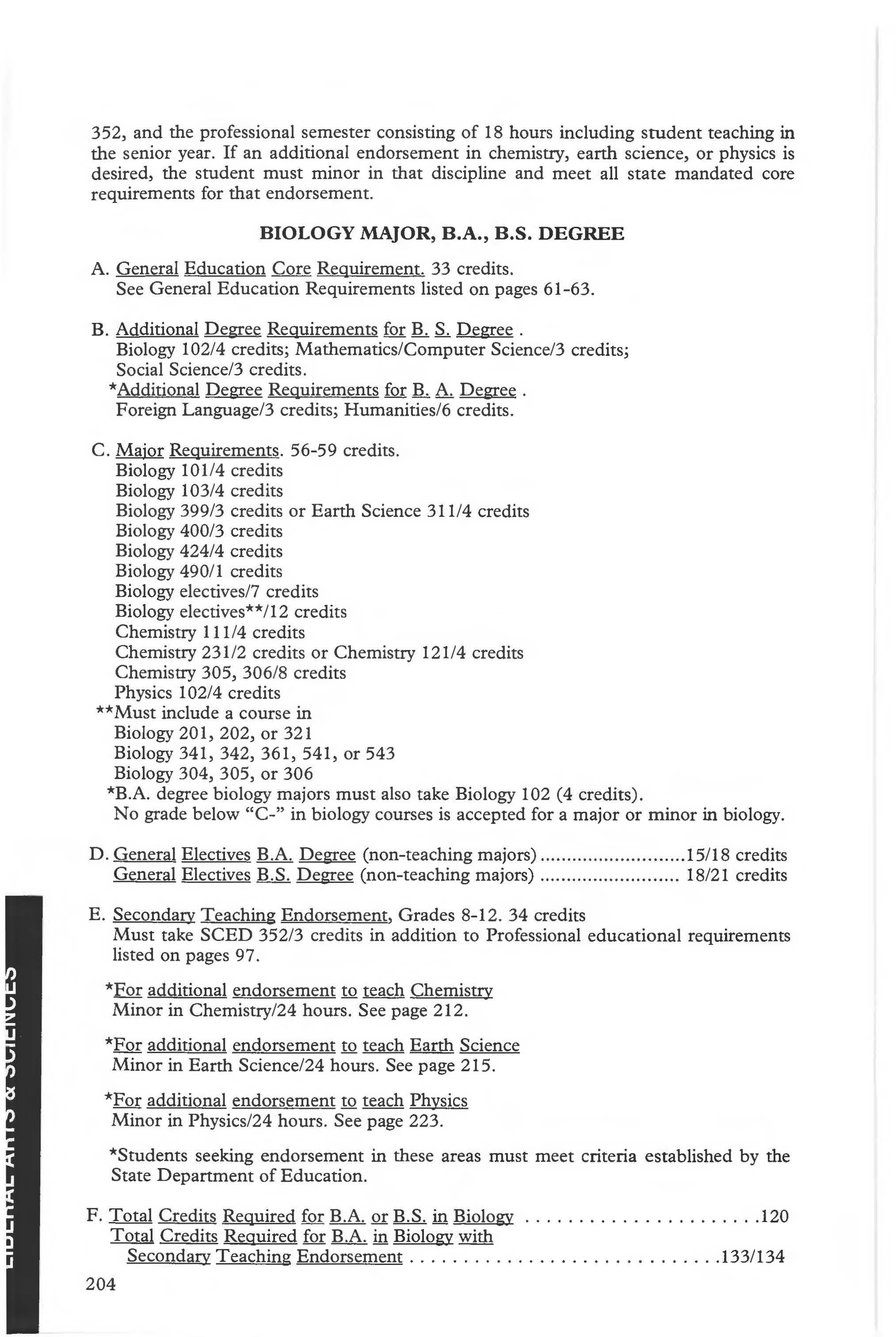
Total Credits Reguired fur B.S. in Biology with Secondary Teaching Endorsement 130/131
Total Credits Reguired fur B.A. or B.S. in Biology with Secondary Teaching Endorsement and an endorsement in either Chemistry, Earth Science or Physics
.............. . ...... ..... . 138/158
Students who are interested in pursuing a biology minor should contact the area coordinator. The minor must include:
Biology 102, 103/8 credits
8 semester hours of biology at the 200 level or above.
4 semester hours of biology at the 300 level or above.
4 semester hours of biology elective TOTAIJ24 credits
No grade below "C-" is accepted in fulfilling the Biology minor requirement.
This interdisciplinary minor serves those students majoring in any subject who are interested in beginning an understanding of environmental issues . Grades below "C-" will not apply toward the fulfillment of minor requirements. Students choosing this minor must make appropriate selections from each of the following groups:
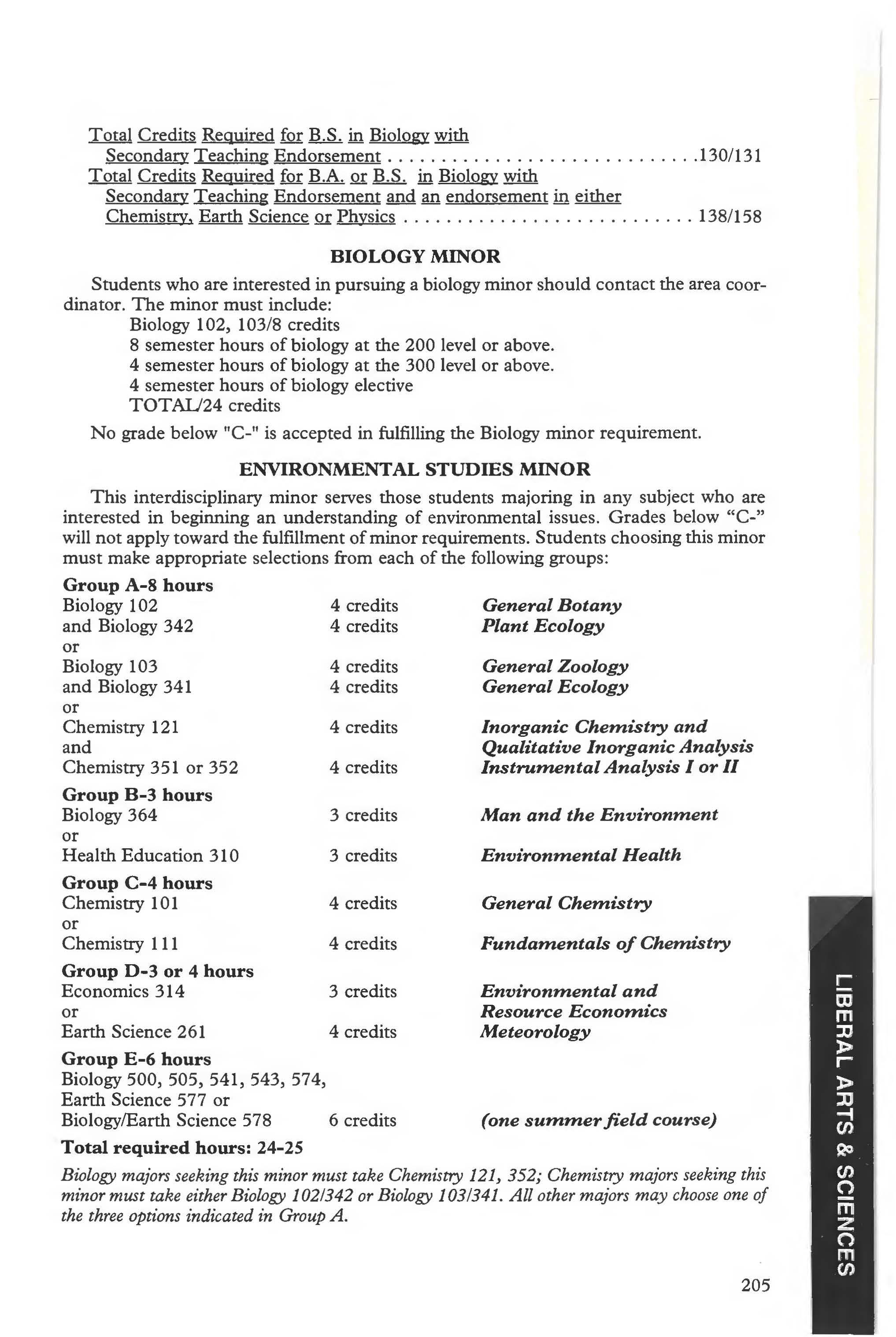
Group A-8 hours Biology 102 and Biology 342 or Biology 103 and Biology 341 or Chemistry 121 and Chemistry 351 or 352
Group B-3 hours Biology 364 or Health Education 310
Group C-4 hours Chemistry 101 or Chemistry 111
Group D-3 or 4 hours Economics 314 or
Earth Science 261
Group E-6 hours Biology 500, 505, 541, 543, 574, Earth Science 577 or
4 credits 4 credits 4 credits 4 credits 4 credits 4 credits 3 credits 3 credits 4 credits 4 credits 3 credits 4 credits
General Botany Plant Ecology
General Zoology General Ecology
Inorganic Chemistry and Qualitative Inorganic Analysis Instrumental Analysis I or II
Man and the Environment Environmental Health
General Chemistry
Fundamentals of Chemistry
Biology/Earth Science 578 6 credits
Total required hours: 24-25
Environmental and Resource Economics Meteorology (one summer field course)
Biology majors seeking this minor must take Chemistry 121, 352; Chemistry majors seeking this minor must take either Biology 1021342 or Biology 103/341. All other majors may choose one of the three options indicated in Group A.
A special fee is charged for all courses with laboratories
* General Education Course
*'1-17riting Intensive Course
*Biology 101. BIOLOGICAL CONCEPTS. An inquiry into the common features of life at the molecular, cellular and organismic levels including: osmosis, mitosis, meiosis, photosynthesis, respiration, cytology, classical and molecular genetics, development, evolution, and ecology. Biology majors must make at least a C- in this course before taking advanced biology courses. 3 lecture hours and one 2hour lab periods; 4 credits.
Biology 102. GENERAL BOTANY. The structure and function of plants with emphasis on the angiosperms. A broad survey of the plant kingdom including the biology, life cycles, economics and ecology ofrepresentatives of the plant divisions. Biology majors must make at least a C- in this course before taking advanced biology courses. 3 lecture and one 2-hour lab periods; 4 credits.
Biology 103. GENERAL ZOOLOGY. A broad survey of the animal kingdom with emphasis on the biology, comparative anatomy, life cycles, economics and ecology of representatives from the various phyla. Biology majors must make at least a C- in this course before taking advanced biology courses. 3 lecture and one 2-hour lab periods; 4 credits.
**Biology 110. BIOLOGICAL CONCEPTS
II. An examination of evolutionary, ecological, and behavioral considerations leading to an understanding of the diversity of life forms living on earth, the interrelationships of those life forms with the environment, and the strategies employed by living organisms to acquire resources and to reproduce. Special emphasis is given to environmental issues facing man today. This course does not meet the requirements of a biology major. 3 lecture periods and one 2-hour lab period; 4 credits. Prerequisites: Biology 101 or equivalent.
Biology 112. FUNDAMENTALS OF BOTANY. An inquiry into the common features of life at the molecular, cellular, and
organismic levels in plants. Emphasis on classification, metabolic processes, ecology, evolution, cell biology, and importance to society. For Liberal Studies majors or students seeking endorsement. Does not meet the requirements for a biology major or minor. 3 lecture and one 2-hour lab periods. 4 credits.
Biology 113. FUNDAMENTALS OF ZOOLOGY. An inquiry into the common features of life at the molecular, cellular, and organismic levels in animals. Emphasis on life cycles, genetics, ecology, evolution, and economics of the various phyla. For Liberal Studies majors or students seeking teaching endorsement. Does not meet the requirements for a biology major or minor. 3 lecture and one 2-hour lab periods. 4 credits.
Biology 201. PLANT MORPHOLOGY. A comparative study of embryonic development, anatomy, structure and evolution in representative vascular plant divisions. Prerequisite: Biology 102 3 lecture and one 3-hour lab periods; 4 credits.
**Biology 202. ANIMAL MORPHOLOGY. A comparative study of embryonic development, anatomy and evolution in representative vertebrate groups. Prerequisite: Biology 103. 2 lecture and two 2-hour lab periods; 4 credits.
Biology 206, 207. HUMAN ANATOMY AND PHYSIOLOGY. Basic physiological principles and integrated anatomy and physiology of the integumentary, digestive, respiratory, cardiovascular and lymphatic systems (Biology 206) and the skeletal, muscular, nervous, endocrine, excretory and reproductive systems (Biology 207). Biology 206 is recommended as a prerequisite for 207. 3 lecture and one 2-hour laboratory periods. 4 credits each semester.

Biology 295. SPECIAL TOPICS IN BIOLOGY. Specialized courses on a variety of topics that may be offered periodically. 1-4 credits.
Biology 304. MICROBIOLOGY. A study of the structure, physiology and activities of micro-organisms as related to their role in nature, disease, immunological interac-
tions> industrial processes and human affairs. Basic concepts and fundamental techniques for isolation, growth, identification and immunological reactions are stressed. 3 lecture and two 2-hour lab periods; 4 credits.
Biology 305. PLANT PHYSIOLOGY. The principal physiological processes in vascular plants at the molecular, cellular and tissue level including respiration, photosynthesis, water relations and factors associated with plant morphogenesis. Prerequisite: Biology 102. 3 lecture and one 2-hour lab periods; 4 credits.
** Biology 306. VERTEBRA TE PHYSIOLOGY. The principal functional processes in vertebrate organs and organ systems including respiration, circulation, hormonal coordination, water balance, thermoregulation, nervous coordination, and responses to special environments. Prerequisites: Chemistry 111 and Biology 103. 3 lecture and one 3-hour lab periods; 4 credits.
Biology 321. PLANT TAXONOMY. The morphology, classification and systematics of the vascular plants with emphasis on family characteristics. The laboratory stresses the identification and herbarium preparation of local plants collected during weekly field trips. Prerequisite: Biology 102. 2 lecture and two 2-hour lab periods; 4 credits.
Biology 323. GENETICS AND SOCIETY. A detailed study of the structure and functioning of the genetic apparatus. Basic genetic facts will be related to important aspects of everyday life, including key issues of social and ethical responsibilities raised by advancing genetic knowledge. Does not normally meet requirements for a biology major. 3 lecture and one 2-hour lab periods; 4 credits.
Biology 341. GENERAL ECOLOGY. The principles underlying the interrelations of groups of organisms with their environments, including the population, community and ecosystem levels of organization. The lab normally includes local field trips with an extended field trip to the coast. Prerequisites: Biology 102 and 103 rec-
ommended. 3 lecture and one 2-hour lab periods; 4 credits.
**Biology 342. PLANT ECOLOGY. The relationships of plants to their physical and biological environment with a consideration of plants in populations, communities, ecosystems and plant associations within Virginia. The lab emphasizes local field investigations and includes extended field trips to the coast and the mountains. Prerequisite: Biology 102. 3 lecture and one 3-hour lab periods; 4 credits.
Biology 352 (Science 352) METHODS IN BIOLOGY FOR SECONDARY TEACHERS. A study of the appropriate methods and materials for teaching high school biology courses. 3 lecture periods; 3 credits.

Biology 361. AQUATIC ECOLOGY. A study of lakes, ponds and streams including their origin, development, morphometry, geochemistry, energy balance, productivity, and the dynamics of plant and animal communities. Laboratory includes a field trip within Virginia. Prerequisites: Biology 102 or 103 and a semester of Chemistry is recommended. 2 lecture and two 3-hour lab periods; 4 credits.
Biology 362 (Earth Science 362). BIOLOGICAL OCEANOGRAPHY. An introduction to the taxonomy, habitats, adaptations and unique biological processes of marine flora and fauna. Laboratory normally includes an extended field trip to the coast. Prerequisite: Biology 102 or 103. 3 lecture and one 2-hour lab periods; 4 credits.
Biology 363. FIELD BIOLOGY. Collection, identification and life histories of local fauna. One lecture and one 2-hour lab periods; 2 credits.
**Biology 364. MAN AND THE ENVIRONMENT. A consideration of local, national and international environmental problems. Three lecture periods; 3 credits.
Biology 399. EVOLUTION. A study of the basic processes of organic evolution including the historical development of evolutionary theory, sources of variation,
adaptation, natural selection, speciat1on, the fossil record, biogeography and major steps in evolution. 3 lecture periods; 3 credits.
**Biology 400. UNIFYING BIOLOGICAL PRINCIPLES. An integrative study of phenomena common to all living creatures: metabolism, homeostasis, reproduction, development, inheritance, life's interactions and the environment through time and space. Themes are studied from the perspective of both cellular and organismic levels of complexity. Open only to junior and senior biology majors and minors. Prerequisite: 16 hours of 200, 300, and/or 400 level biology. 3 lecture periods; 3 credits.
Biology 412 (Chemistry 412) BIOCHEMISTRY A study of the chemistry of proteins, carbohydrates, lipids and nucleic acids in biological systems . Prerequisite: Chemistry 305 or permission of instructor. 3 lecture periods; 3 credits. (Or 4 credits with one 2-hour lab period .)
**Biology 424. GENETICS. A study of classical and modern genetics, including the mechanisms for the replication, continuation, variation of regulation and expression of genetic information 3 lecture and one 2-hour lab periods; 4 credits
Biology 425. MODERN GENETICS. A study of the structure and function of hereditary material at the molecular level. Topics include DNA-RNA structure and replication, protein synthesis, and homeostasis. Prerequisite: Biology 424. 3 lecture and one 2-hour lab periods; 4 credits.
**Biology 426. CELL BIOLOGY. A study of the structure and function of prokaryotic and eukaryotic cells, including plant and animal cell types Emphasis on the structure and function of membranes, mitochondria, ribosomes, endoplasmic reticula, plastids, nuclei and nucleoli. Prerequisites: Biology 102 and 103. 3 lecture and one 2-hour lab periods; 4 credits .
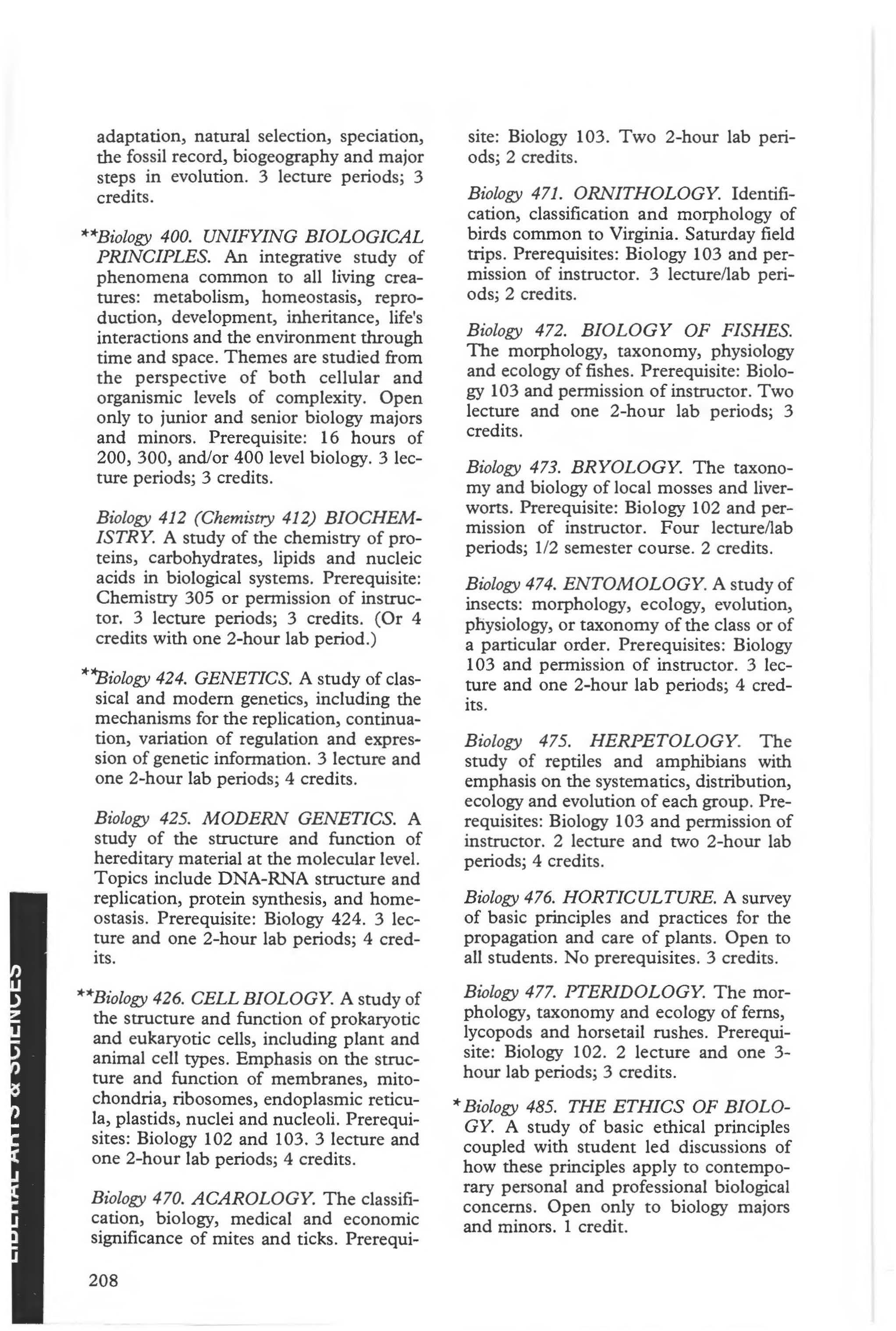
Biology 470. ACAROLOGY. The classification, biology, medical and economic significance of mites and ticks. Prerequi-
site : Biology 103. Two 2-hour lab periods; 2 credits
Biology 471. ORNITHOLOGY Identification, classification and morphology of birds common to Virginia. Saturday field trips. Prerequisites : Biology 103 and permission of instructor. 3 lecture/lab periods; 2 credits.
Biology 472. BIOLOGY OF FISHES. The morphology, taxonomy, physiology and ecology of fishes. Prerequisite: Biology 103 and permission of instructor. Two lecture and one 2-hour lab periods; 3 credits.
Biology 473. BRYOLOGY. The taxonomy and biology of local mosses and liverworts. Prerequisite: Biology 102 and permission of instructor. Four lecture/lab periods; 1/2 semester course. 2 credits.
Biology 474 ENTOMOLOGY A study of insects: morphology, ecology, evolution, physiology, or taxonomy of the class or of a particular order. Prerequisites : Biology 103 and permission of instructor. 3 lecture and one 2-hour lab periods; 4 credits
Biology 475. HERPETOLOGY The study of reptiles and amphibians with emphasis on the systematics, distribution, ecology and evolution of each group Prerequisites: Biology 103 and permission of instructor. 2 lecture and two 2-hour lab periods; 4 credits.
Biology 476. HORTICULTURE. A survey of basic principles and practices for the propagation and care of plants. Open to all students. No prerequisites 3 credits.
Biology 477. PTERIDOLOGY. The morphology, taxonomy and ecology of ferns, lycopods and horsetail rushes. Prerequisite: Biology 102. 2 lecture and one 3hour lab periods; 3 credits.
* Biology 485. THE ETHICS OF BIOLOGY. A study of basic ethical principles coupled with student led discussions of how these principles apply to contemporary personal and professional biological concerns. Open only to biology majors and minors. 1 credit .
Biology 490. BIOLOGICAL SEMINAR. Short oral presentations by students on selected, researched biological topics . May be repeated as 491 or 492 . Open to junior and senior biology majors and minors. 1 lecture period; 1 credit.
Biology 495. SPECIAL TOPICS IN BIOLOGY Specialized courses on a variety of topics that may be offered periodically 1-4 credits .
Biology 496. RESEARCH
IN BIOLOGY. With the approval of a faculty member and the department chair, a student may carry out an individual research project. The nature of the project must be determined between the student and faculty member and approved by the department chair before the student may register for the course. May be repeated as 497 2, 3, or 4 credits.
Biology 4961. RESEARCH PROJECTS
IN BIOLOGY. With the approval of a faculty member and the department head, a student may carry out an individual research project in a foreign country. The nature of the project must be determined between the student and the faculty member and approved by the department chair before the student may register for the course. May be repeated as 4971. 2, 3, or 4 credits .
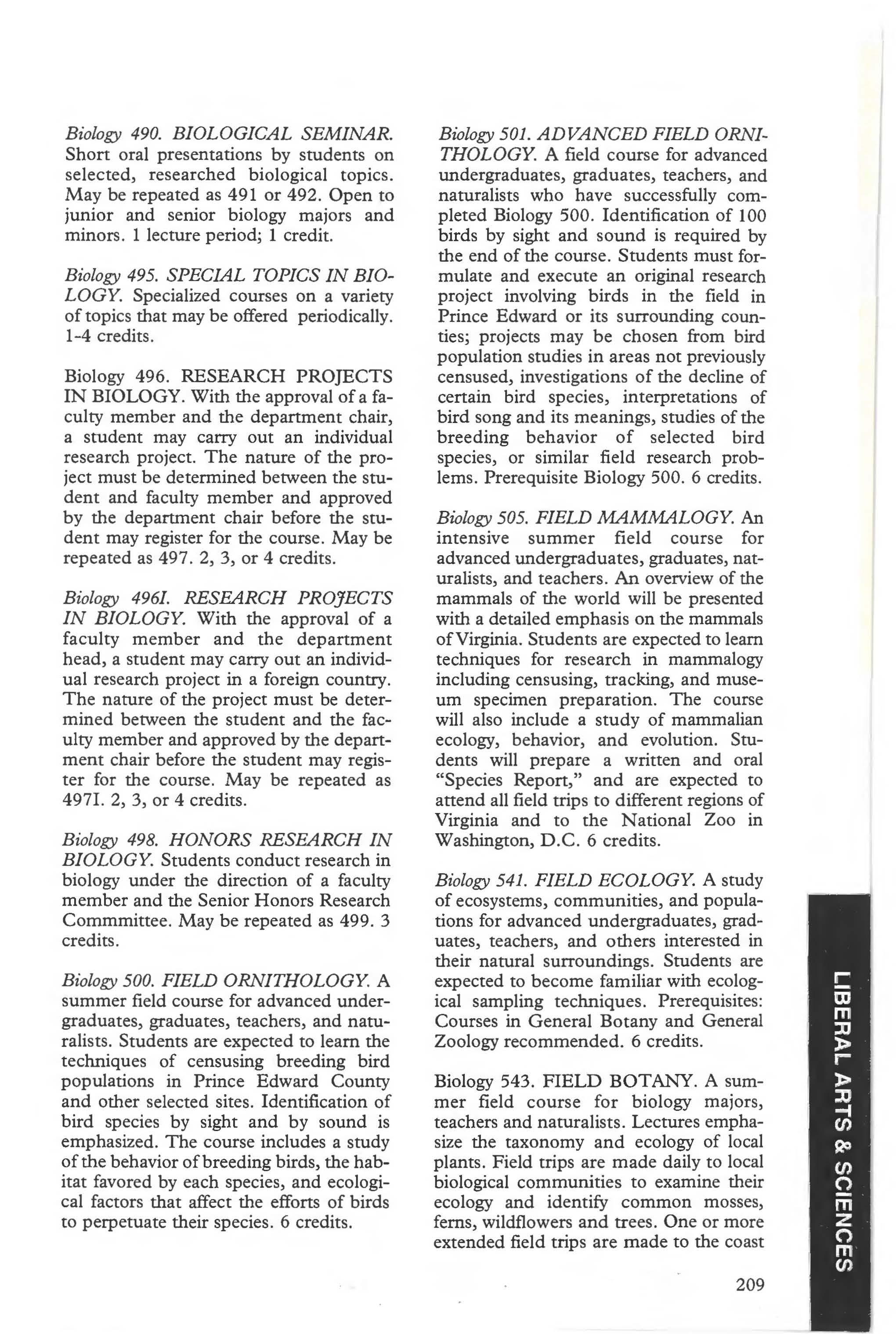
B iology 498. HONORS RESEARCH IN BIOLOGY. Students conduct research in biology under the direction of a faculty member and the Senior Honors Research Commmittee May be repeated as 499. 3 credits
B iology 500. FIELD ORNITHOLOGY A summer field course for advanced undergraduates, graduates, teachers, and naturalists . Students are expected to learn the techniques of censusing breeding bird populations in Prince Edward County and other selected sites Identification of bird species by sight and by sound is emphasized. The course includes a study of the behavior of breeding birds, the habitat favored by each species, and ecological factors that affect the efforts of birds to perpetuate their species 6 credits
Biology 501. ADVANCED FIELD ORNITHOLOGY. A field course for advanced undergraduates, graduates, teachers, and naturalists who have successfully completed Biology 500 . Identification of 100 birds by sight and sound is required by the end of the course. Students must formulate and execute an original research project involving birds in the field in Prince Edward or its surrounding counties; projects may be chosen from bird population studies in areas not previously censused, investigations of the decline of certain bird species, interpretations of bird song and its meanings, studies of the breeding behavior of selected bird species, or similar field research problems. Prerequisite Biology 500 . 6 credits.
Biology 505 FIELD M"AM.MALOGY. An intensive summer field course for advanced undergraduates, graduates, naturalists, and teachers. An overview of the mammals of the world will be presented with a detailed emphasis on the mammals of Virginia. Students are expected to learn techniques for research in mammalogy including censusing, tracking, and museum specimen preparation. The course will also include a study of mammalian ecology, behavior, and evolution. Students will prepare a written and oral "Species Report," and are expected to attend all field trips to different regions of Virginia and to the National Zoo in Washington, D.C . 6 credits.
Biology 541. FIELD ECOLOGY. A study of ecosystems, communities, and populations for advanced undergraduates, graduates, teachers , and others interested in their natural surroundings. Students are expected to become familiar with ecological sampling techniques. Prerequisites : Courses in General Botany and General Zoology recommended. 6 credits.
Biology 543. FIELD BOTANY . A summer field course for biology majors, teachers and naturalists Lectures emphasize the taxonomy and ecology of local plants. Field trips are made daily to local biological communities to examine their ecology and identify common mosses, fems, wildflowers and trees. One or more extended field trips are made to the coast
or mountains to observe complementary biological communities. 6 credits.
Biology 574. SYSTEMATIC ENTOMOLOGY. An introduction to the study of insects, their morphology, evolution, life histories, physiology, ecology, and taxonomy. An extensive insect collection is required. For advanced undergraduates and graduates. 6 credits.
Environmental Studies 500. CHEMISTRY OF THE ENVIRONMENT. This course reviews chemical concepts used in environmental chemistry for both polluted and non-polluted environmental settings. The consequences of industrial activities, as well as methods and processes dictated by regulatory requirements are included. It also reviews chemical concepts and applications as they relate to the natural and man-made environment and will serve as a basis for more specialized study of the atmospheric, lithospheric, and hydrospheric processes. Hands-on work with field problems and problem solving, requiring literature searches and individual experimentation, will be a major part of the course. 2 lecture and one 3-hour lab periods; 3 credits. 3 credits. Prerequisites: Chem. 111, 121, and Chem 351 or Chem. 352.
Biology 578 (Earth Science 578). BIOLOGICAL SPELEOLOGY. Study of the cave environment and the life forms found there, with emphasis on the diversity, dispersal, ecology and evolution of cave fauna. The course involves field trips to cavernous regions of Virginia and West Virginia. Permission of instructor required. Prerequisite: Biology 103 recommended. 6 credits. Environmental Studies 564. ENVIRONMENTAL ISSUES. An in-depth study of the major environmental issues challenging modern society, including a close examination of the causes of these issues and an analysis of corrective measures that could be applied to each. Major topics addressed are population, deforestation, biodiversity loss, and climate alteration. The relationship of economics and politics to environmental issues is critically examined. The establishment of ecocentric ethical viewpoints and the development of Earth sustainable systems are emphasized. For graduates and advanced undergraduates. 3 lecture periods. 3 credits.
Patrick G. Barber, Ph.D., Professor of Chemistry Maurice H. Maxwell, Jr., Ph.D., Professor of Chemistry Eike Reich, Ph.D., Associate Professor of ChemistryThe chemistry major at Longwood provides graduates with the necessary background to pursue either graduate studies or a career in industry, government, medicine, and other health-related fields. Students interested in chemical engineering at UVA Graduate Department of Chemical Engineering must have a 3.0 GPA or better and must have completed chemistry 400 and 401, calculus and differential equations. Chemistry majors graduating from Longwood have been accepted at graduate schools in Virginia and other states. They also have been able to step into jobs in state and federal laboratories and industrial facilities. The requirements for the chemistry major include courses in general chemistry, organic chemistry, analytical chemistry, physical chemistry, instrumental analysis, and special interest electives. Students are encouraged to enroll in Special Projects Courses in Chemistry in order to increase their competence in working in a laboratory. Superior students are encouraged to complete a chemistry Honors Project or a Research Project. The program in chemistry is rigorous, but it is flexible enough for stu-

dents to take a second major
Students majoring in other areas may elect to minor in chemistry. The chemistry minor requires 24 semester hours : general chemistry (8 hours), organic chemistry (8 hours), analytical chemistry (4 hours), and physical chemistry (4 hours)
No grade below "C-" on chemistry courses is accepted for the graduation requirements for the major or minor in chemistry.
Those students interested in obtaining an endorsement to teach chemistry in high school in Virginia must meet the requirements of the chemistry major . Those planning to teach in elementary and middle schools in Virginia are encouraged to complete a B.S . degree in chemistry with an appropriate selection of education courses. See the teacher preparation section of this catalog for further details .
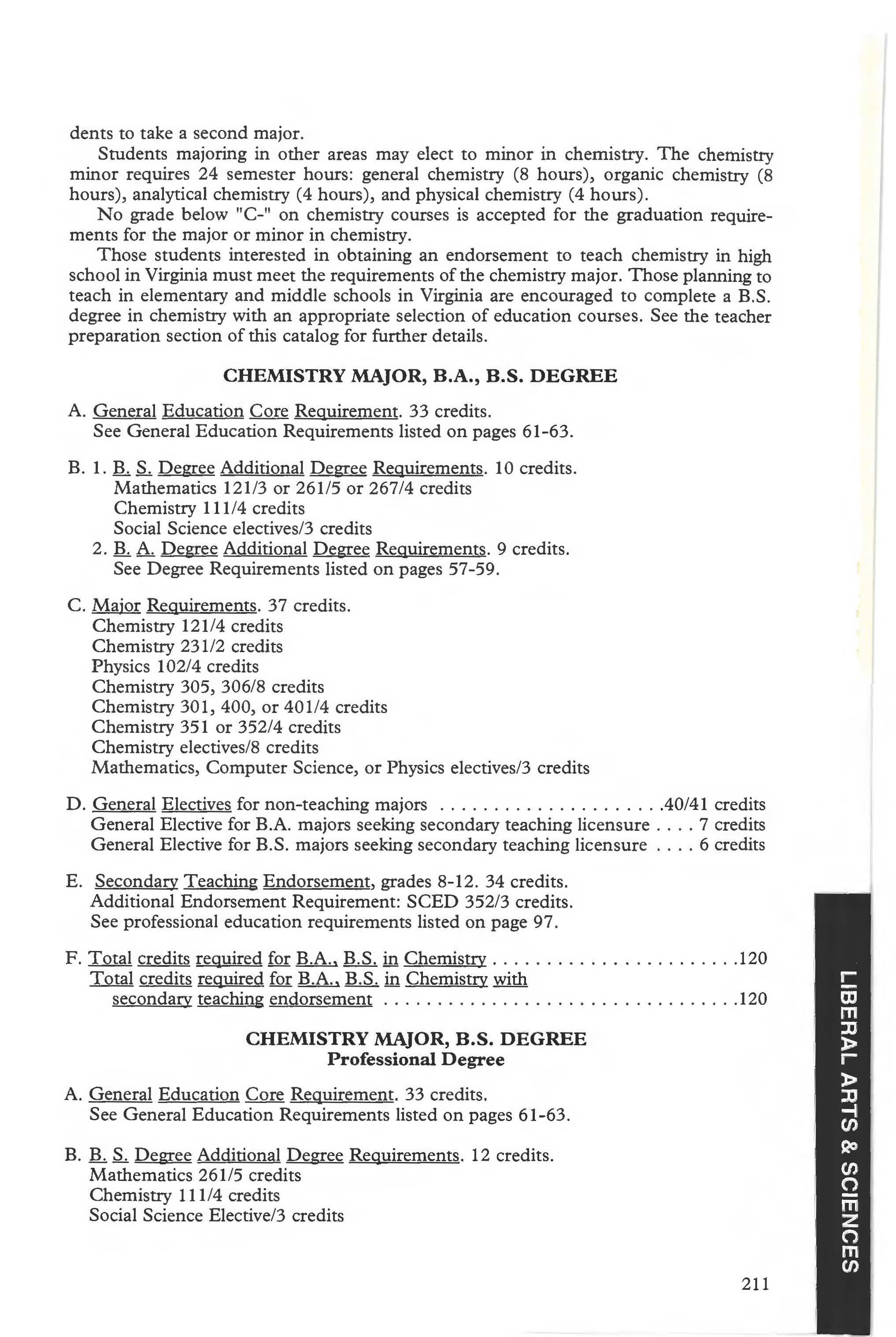
A. General Education Core Requirement. 33 credits. See General Education Requirements listed on pages 61-63
B. I. B . S. Degree Additional Degree Requirements. 10 credits. Mathematics 121/3 or 261/5 or 267/4 credits Chemistry 111/4 credits Social Science electives/3 credits
2. B. A. Degree Additional Degree Requirements. 9 credits. See Degree Requirements listed on pages 57-59
C. Major Requirements. 37 credits.
Chemistry 121/4 credits Chemistry 231/2 credits Physics 102/ 4 credits Chemistry 305, 306/8 credits Chemistry 301, 400, or 401/4 credits
Chemistry 351 or 352/4 credits Chemistry electives/8 credits Mathematics, Computer Science, or Physics electives/3 credits
D. General Electives for non-teaching majors 40/41 credits General Elective for B.A. majors seeking secondary teaching licensure 7 credits General Elective for B.S. majors seeking secondary teaching licensure ... . 6 credits
E. Secondary Teaching Endorsement, grades 8-12. 34 credits. Additional Endorsement Requirement: SCED 352/3 credits. See professional education requirements listed on page 97
F. Total credits required for B.A., B.S. in Chemistry .. . .... . ... ... . ........ 120 Total credits required for B.A., B.S. in Chemistry with secondary teaching endorsement . . . . . . . . . . . . . . . . . . . . . . . ... .. . ... . 120
A. General Education Core Requirement. 33 credits.
See General Education Requirements listed on pages 61-63.
B. B . S. Degree Additional Degree Requirements. 12 credits. Mathematics 261/5 credits Chemistry 111/4 credits Social Science Elective/3 credits
**
C. Major Reguirements. 49 credits
Chemistry 121/4 credits
Chemistry 231/2 credits
Physics 102/4 credits
Chemistry 305, 306/8 credits
Chemistry 351, 352/8 credits
Chemistry 371-375/3 credits
Chemistry 400, 401/8 credits
Chemistry 420/1 credit Chemistry 461-466, 468, 498, 499/3 credits
Chemistry electives/3 credits Mathematics 262/5 credits
D General Electives for professional chemistry majors : 26 credits
Courses from the following list are approved electives for chemistry if taken at or above the 300 level: Mathematics, Physics, Biology, Computer Science, Modern Languages and English. Other courses at the 300 level or above may be approved by the academic advisor or major's department chair.
E. Total credits reguired for Professional B.S. in Chemistry 120
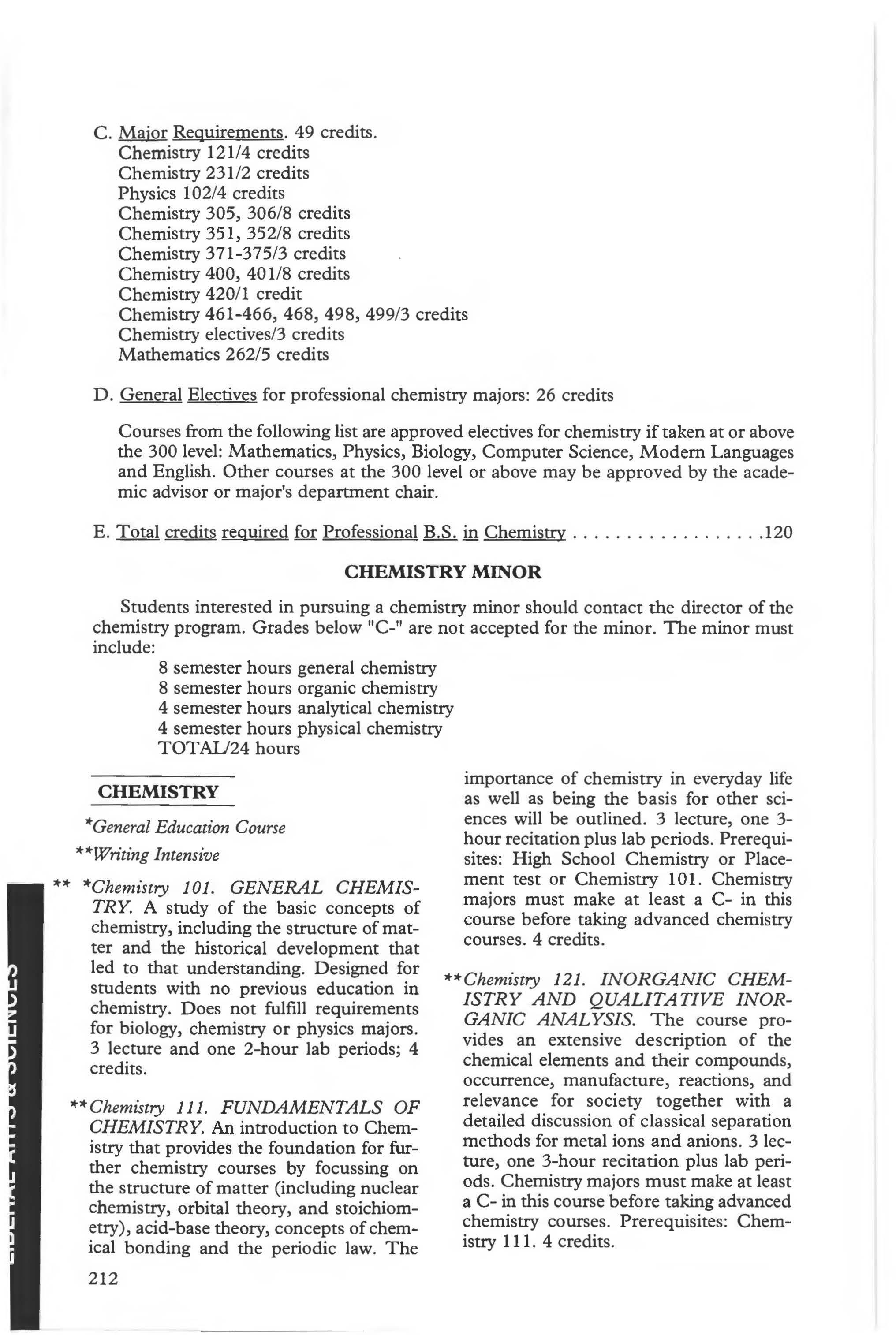
Students interested in pursuing a chemistry minor should contact the director of the chemistry program. Grades below "C-" are not accepted for the minor. The minor must include:
8 semester hours general chemistry
8 semester hours organic chemistry
4 semester hours analytical chemistry
4 semester hours physical chemistry
TOTAU24 hours
*General Education Course **Writing Intensive
*Chemistry 101. GENERAL CHEMISTRY. A study of the basic concepts of chemistry, including the structure of matter and the historical development that led to that understanding. Designed for students with no previous education in chemistry. Does not fulfill requirements for biology, chemistry or physics majors. 3 lecture and one 2-hour lab periods; 4 credits.
** Chemistry 111. FUNDAMENTALS OF CHEMISTRY. An introduction to Chemistry that provides the foundation for further chemistry courses by focussing on the structure of matter (including nuclear chemistry, orbital theory, and stoichiometry), acid-base theory, concepts of chemical bonding and the periodic law. The
importance of chemistry in everyday life as well as being the basis for other sciences will be outlined. 3 lecture, one 3hour recitation plus lab periods. Prerequisites: High School Chemistry or Placement test or Chemistry 101. Chemistry majors must make at least a C- in this course before taking advanced chemistry courses. 4 credits.
**Chemistry 121. INORGANIC CHEMISTRY AND QUALITATIVE INORGANIC ANALYSIS. The course provides an extensive description of the chemical elements and their compounds, occurrence, manufacture, reactions, and relevance for society together with a detailed discussion of classical separation methods for metal ions and anions. 3 lecture, one 3-hour recitation plus lab periods. Chemistry majors must make at least a C- in this course before taking advanced chemistry courses. Prerequisites: Chemistry 111. 4 credits.
Chemistry 231. GRAVIMETRIC AND VOLUMETRIC LABORATORY ANALYSES. A laboratory practicum on the use of gravimetric and volumetric methods of chemical analyses. Encourages the development of good laboratory skills and techniques. 1 lecture and one 4-hour laboratory. Prerequisites: Chemistry 111. 2 credits
Chemistry 295. SPECIAL TOPICS IN CHEMISTRY. Specialized courses on a variety of topics that may be offered periodically 1-4 credits.
*"Chemistry 301. INTRODUCTORY PHYSICAL CHEMISTRY. Fundamental principles and problems associated with structure and interaction of matter. Introduction to thermodynamics, kinetics, equilibrium, electrochemistry, solid state structure, and quantum mechanics. Prerequisites: Chemistry 111 and Mathematics 121 or equivalent. Mathematics 261 or 267 recommended. 3 lecture and one 3hour lab periods; 4 credits.
Chemistry 305. ORGANIC CHEMISTRY I. Fundamental principles and reactions of organic chemistry. Prerequisite: Chemistry 111. 3 lecture and one 3-hour lab period; 4 credits.
Chemistry 306. ORGANIC CHEMISTRY II. A continuation of Chemistry 305. 3 lecture and one 3-hour lab periods; 4 credits.
Chemistry 351. INSTRUMENTAL ANALYSIS I. The theory and practice of instrumental techniques in analytical chemistry. Includes optical and electrochemical methods of analysis. Develops familiarity and practice in the use of laboratory instrumentation. Prerequisite: Chemistry 111 and 231. Corequisite : Chemistry 305, 306. 3 lecture and one 3-hour lab periods; 4 credits.
Chemistry 352. INSTRUMENTAL ANALYSIS II. The theory and practice of instrumental techniques in analytical chemistry. Includes chromatographic methods of separation and analysis. Develops familiarity and practice in the use of laboratory instruments. Prerequisite: Chemistry 111 and 231 Corequisite:
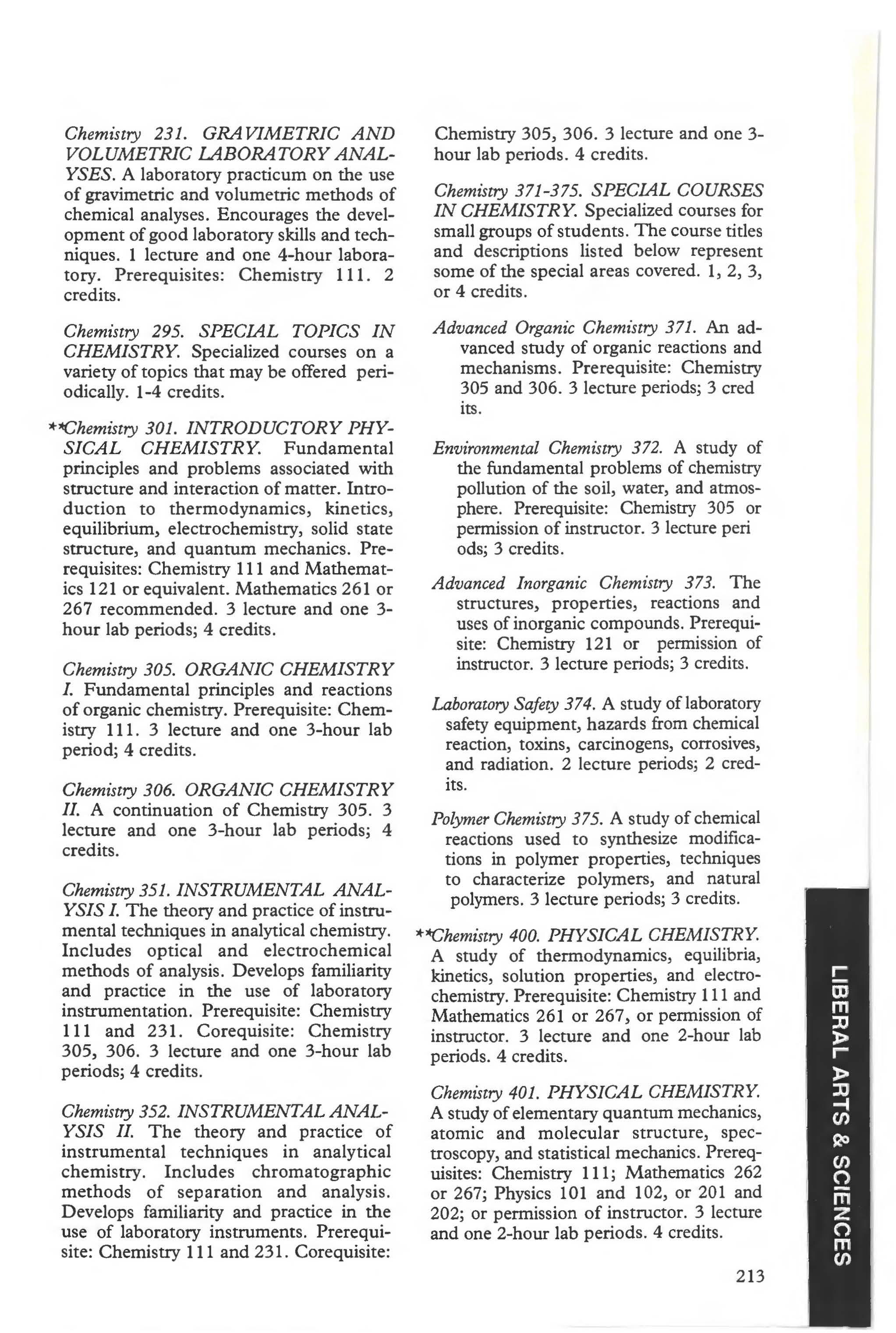
Chemistry 305, 306. 3 lecture and one 3hour lab periods. 4 credits
Chemistry 371-375. SPECIAL COURSES IN CHEMISTRY. Specialized courses for small groups of students The course titles and descriptions listed below represent some of the special areas covered 1, 2, 3, or 4 credits.
Advanced Organic Chemistry 371 An advanced study of organic reactions and mechanisms. Prerequisite: Chemistry 305 and 306. 3 lecture periods; 3 cred its.
Environmental Chemistry 372. A study of the fundamental problems of chemistry pollution of the soil, water, and atmosphere. Prerequisite: Chemistry 305 or permission of instructor. 3 lecture peri ods; 3 credits.
Advanced Inorganic Chemistry 373 . The structures, properties, reactions and uses of inorganic compounds. Prerequisite: Chemistry 121 or permission of instructor. 3 lecture periods; 3 credits.
Laboratory Safety 374. A study of laboratory safety equipment, hazards from chemical reaction, toxins, carcinogens, corrosives, and radiation. 2 lecture periods; 2 credits
Polymer Chemistry 375. A study of chemical reactions used to synthesize modifications in polymer properties, techniques to characterize polymers, and natural polymers. 3 lecture periods; 3 credits.
*"'Chemistry 400. PHYSICAL CHEMISTRY. A study of thermodynamics, equilibria, kinetics, solution properties, and electrochemistry. Prerequisite: Chemistry 111 and Mathematics 261 or 267, or permission of instructor. 3 lecture and one 2-hour lab periods. 4 credits
Chemistry 401. PHYSICAL CHEMISTRY. A study of elementary quantum mechanics, atomic and molecular structure, spectroscopy, and statistical mechanics. Prerequisites: Chemistry 111; Mathematics 262 or 267; Physics 101 and 102, or 201 and 202; or permission of instructor. 3 lecture and one 2-hour lab periods . 4 credits.
Chemistry 412 (Biology 412). BIOCHEMISTRY. A study of the chemistry of proteins, carbohydrates, lipids, and nucleic acids in biological systems. Prerequisite : Chemistry 305 or permission of instructor. 3 lecture periods; 3 credits. (Or 4 credits with one 2-hour lab period.)
Chemistry 420. CHEMISTRY SEMINAR. Reports and discussions of topics of current interest in the field of chemistry. Open to qualified students. Introduction to chemical literature. May be repeated for credit, in which event the number will be 421, 422, etc.; 1 credit.
Chemistry 461. RESEARCH IN CHEMISTRY. Students will carry out research projects under individual supervision of an instructor. The nature of the project will depend on the interest and needs of the student. Consent of the instructor and approval of the department head are prerequisites for enrollment. May be repeated as Chemistry 462, 463, 464. 3 lab periods per credit. 1, 2, 3, or 4 credits. ·
Chemistry 465 and 466. Research in chemistry during the summer at Longwood College or off-campus in the United States. 1, 2, 3 or 4 credits .
Faculty
Chemistry 467 SCIENTIFIC INSTRUMENT DESIGN AND FABRICATION. Design and actual fabrication of scientific instruments including glass , metal, wood, plastic, and electronic instruments Course involves one or more of the following: glass working techniques, precision milling machine and lathe operations, machine shop techniques, electronic testing of circuits, and breadboard and hardwiring electronic circuits. Each semester course will emphasize different projects . May be repeated for credit . 3 lab periods per credit. 1, 2, 3, or 4 credits
Chemistry 468. RESEARCH ABROAD. Research on special projects in chemistry (outside the United States) 1, 2, 3, or 4 credits.
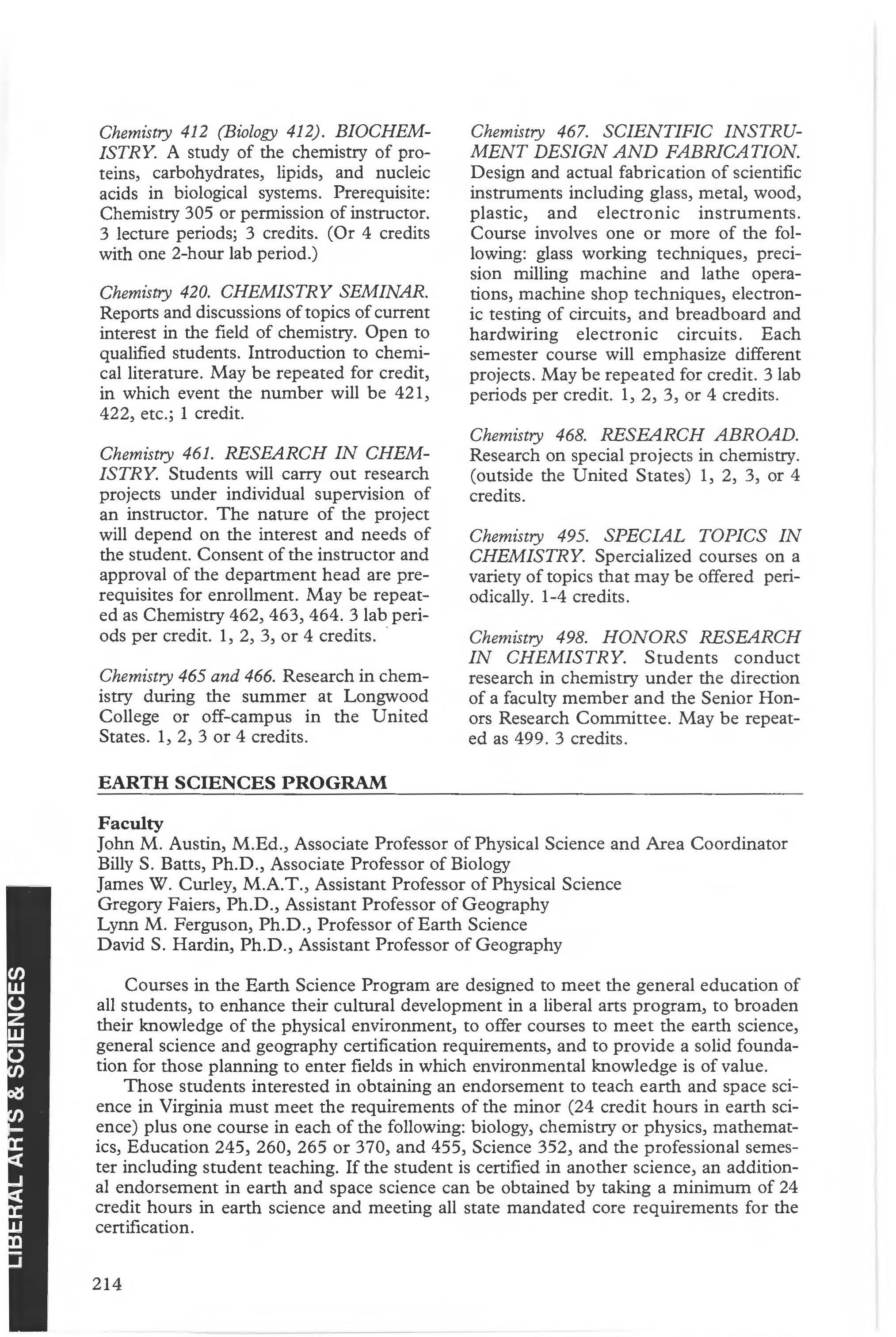
Chemistry 495 SPECIAL TOPICS IN CHEMISTRY. Spercialized courses on a variety of topics that may be offered periodically. 1-4 credits.
Chemistry 498. HONORS RESEARCH IN CHEMISTRY. Students conduct research in chemistry under the direction of a faculty member and the Senior Honors Research Committee. May be repeated as 499. 3 credits .
John M. Austin, M.Ed., Associate Professor of Physical Science and Area Coordinator Billy S. Batts, Ph.D., Associate Professor of Biology James W. Curley, M.A.T., Assistant Professor of Physical Science Gregory Faiers, Ph.D., Assistant Professor of Geography Lynn M. Ferguson, Ph.D., Professor of Earth Science David S Hardin, Ph.D., Assistant Professor of Geography
Courses in the Earth Science Program are designed to meet the general education of all students, to enhance their cultural development in a liberal arts program, to broaden their knowledge of the physical environment, to offer courses to meet the earth science, general science and geography certification requirements, and to provide a solid foundation for those planning to enter fields in which environmental knowledge is of value
Those students interested in obtaining an endorsement to teach earth and space science in Virginia must meet the requirements of the minor (24 credit hours in earth science) plus one course in each of the following: biology, chemistry or physics, mathematics, Education 245, 260, 265 or 370, and 455, Science 352, and the professional semester including student teaching. If the student is certified in another science, an additional endorsement in earth and space science can be obtained by taking a minimum of 24 credit hours in earth science and meeting all state mandated core requirements for the certification.
Students interested in pursuing an earth science minor should contact the area coordinator. The minor must include the following courses. Grades below "C-" are not accepted for the minor.
Earth Science 220/4 credits
Earth Science 210, 311/8 credits
Earth Science 261/4 credits
*General Education Course
Earth Science 101. PHYSICAL SCIENCE. A survey of basic physics needed for a cross-disciplinary major. 3 lecture and one 2-hour lab periods; for Liberal Studies majors and other students seeking teaching endorsement. 4 credits.
*Earth Science 102. EARTH SCIENCE. A survey of the earth sciences including geology, oceanography, meteorology, and astronomy. The application of the methods of science to the acquisition of knowledge will be stressed throughout the course. The interrelationships among the earth sciences will be emphasized. 3 lecture and one 2-hour lab periods; 4 credits.
Earth Science 220. ASTRONOMY. Descriptive study of the solar system, stars, galaxies, and cosmology. 3 lecture and one 2hour lab periods; 4 credits.
Earth Science 210. PHYSICAL GEOLOGY. An introduction to the natural physical environment, the materials and processes which shape the earth's crust. Specific topics include minerals, rocks, earthquakes, volcanoes, and plate tectonics. Also the effects of streams, waves, ground water, ice, wind, and gravity on the surface of the earth. 3 lecture and one 2-hour lab periods; 4 credits.
Earth Science 252 (Geography 252). PHYSICAL GEOGRAPHY. A study of the earth's physical landscape, the dynamics of the natural systems which form it and the interrelationships between the systems. Included are investigations of human impacts on the earth's system. 3 credits.
Earth Science 362 or 363/4 credits Earth Science elective/4 credits TOTA1l24 credits

Earth Science 261 (Geography 261). METEOROLOGY. A study of the basic weather phenomena and processes including the elements for modem weather forecasting. 3 lecture and one 2-hour lab periods; 4 credits.
Earth Science 311. HISTORICAL GEOLOGY. An introduction to the methods, assumptions, and current interpretations of the evidence concerning the origin and evolution of the earth and its life forms. Emphasis on the geologic history of the United States. 3 lecture and one 2-hour lab periods; 4 credits.
Earth Science 341 (Biology 341). GENERAL ECOLOGY. The principles underlying the interrelations of groups of organisms with their environments, including the population, community, and ecosystem levels of organization. The lab normally includes local field trips with an extended field trip to the coast. 3 lecture and one 2-hour lab periods; 4 credits.
Earth Science 353 (Geography 353). GEOGRAPHY OF VIRGINIA. Geographical appraisal of Virginia, including the geology, landforms, soils, climate, economic minerals, original vegetation, and human geography of Virginia, emphasizing settlement of population, agriculture, industries and transportation. Prerequisite: Geography 201 and permission of instructor. 3 credits.
Earth Science 355 (Geography 355). CLIMATOLOGY. A study of the dynamics of the atmosphere as an energy system, its interactions with other parts of the Earth's physical system, and the effects of these interactions on human life and activity. Climate variations on global, regional,
and local scales are investigated including methods of climate classification and techniques used to model future climatic conditions. Prerequisite: Geography 201 or Earth Science Geography 261 or permission of instructor. 3 credits.
Earth Science 358 (Geography 358). CARTOGRAPHY. Emphasis is focused on construction of thematic maps at the preprofessional level and their incorporation in presentations of research. Modern techniques and processes are discussed along with conventional pen and ink methods. Prerequisites: permission of instructor. 3 lecture and one 2-hour lab period; 4 credits.
Earth Science 362 (Biology 362). BIOLOGICAL OCEANOGRAPHY. An introduction to the taxonomy, habitats, adaptations, and unique biological processes of marine flora and fauna . Laboratory normally includes an extended field trip to the coast. Prerequisite: Biology 102 or 103. 3 lecture and one 2-hour lab periods; 4 credits.
Earth Science 363. PHYSICAL OCEANOGRAPHY. An introduction to the historical, geological, chemical and physical aspects of the oceans. 3 lecture and one 2-hour lab periods; 4 credits.
Earth Science 410 (Geography 410). REGIONAL PHYSIOGRAPHY OF THE UNITED STATES. Treatment of the processes that have shaped the varied surface features within the United States. Theories and concepts relating to geomorphic evolution in the major and minor physiographic divisions will be emphasized. Prerequisite: Geography 201 or Earth Science 252 or Earth Science 210 3 credits.
Earth Science 462. SPECIAL PROJECTS IN EARTH SCIENCE. Students will carry out study or research projects under individual supervision of instructor. The nature of the projects will depend on the interest and needs of the students. Consent of the instructor and approval of the department head is prerequisite for enrollment in this course. May be repeated as Earth Science 463 and 464 . 1-4 credits.
Earth Science 577. PHYSICAL SPELEOLOGY. The physical study of caves, karst hydrology, and related features. The course involves field trips to cavernous regions of Virginia and West Virginia. Permission of instructor required. Prerequisite: Course in Physical Geology recommended. 6 credits .
Earth Science 578 (Biology 578). BIOLOGICAL SPELEOLOGY. Study of the cave environment and the life forms found there, with emphasis on the diversity, dispersal, ecology, and evolution of cave fauna. The course involves field trips to cavernous regions of Virginia and West Virginia. Permission of instructor required. Prerequisite: Course in General Zoology recommended. 6 credits.
SCIENCE Science 330. (Mathematics 330). INTEGRATION OF MATHEMATICS AND SCIENCE PRINCIPLES. An inquiry into basic principles involved in the study of mathematics and science. Emphasis on measurement, use of manipulatives, inference, prediction, data analysis, and hypothesizing. For Liberal Studies Majors only. 3 credits.
Science 352. SCIENCE FOR SECONDARY TEACHERS. A study of materials and methods for teaching the physical and/or biological sciences at the junior and senior high school level. Course content will be designed to meet the individual needs of each student. Recommended prior to student teaching. 3 credits
Science 362. SCIENCE FOR ELEMENTARY TEACHERS. A study of materials and methods of teaching science in the primary and upper elementary grades with emphasis on student use of laboratory materials and techniques. Prerequisites: Biology 102 and 103 and Earth Science 102. 1 single and 2 double periods; 3 credits.
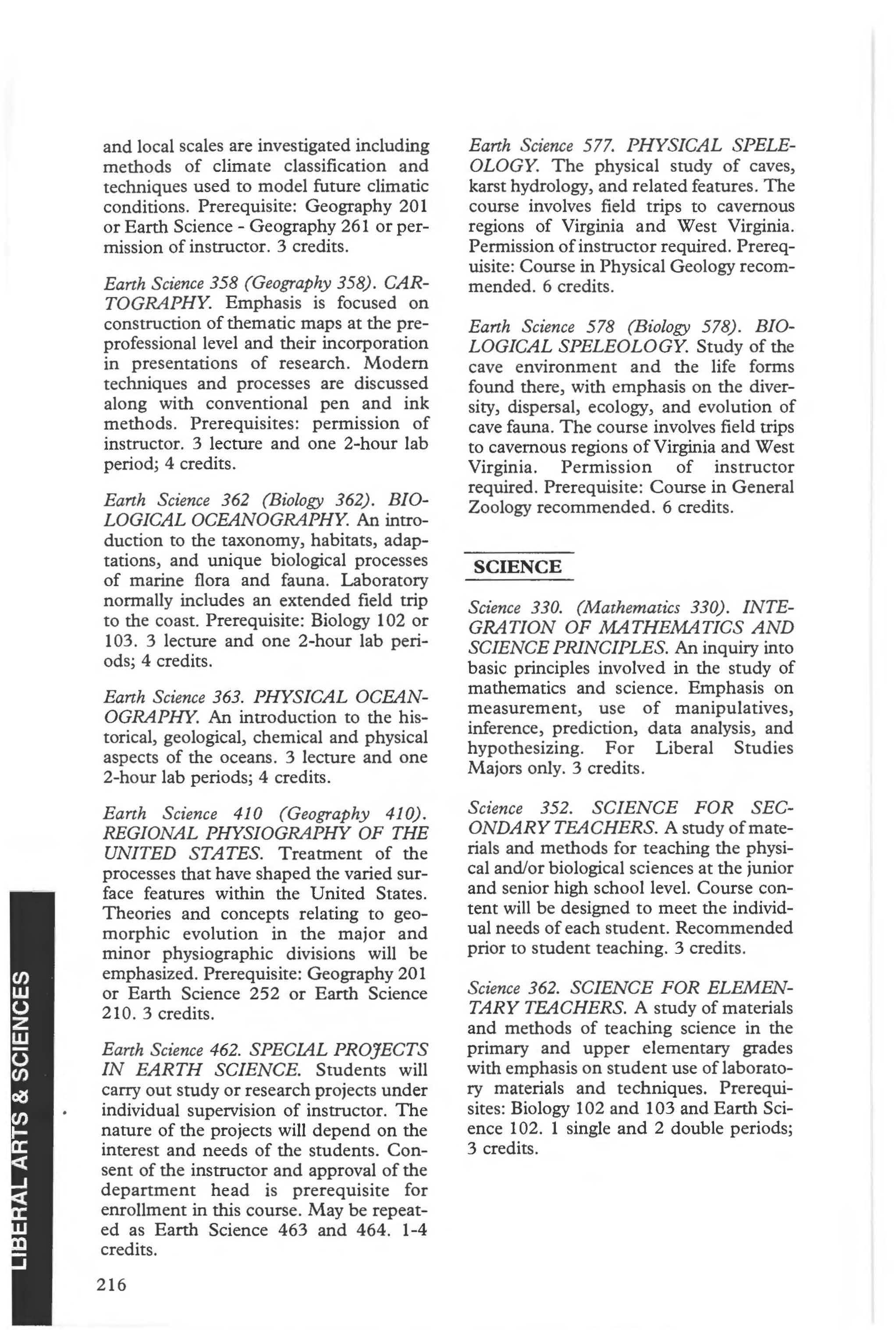
Gre~ory Faiers? Ph.D., Assistant Professor of Geography David S. Hardm, Ph.D. Assistant Professor of Geography
Students _interested in pursuing a geography minor should contact Dr. Hardin. The m~nor must mclude the following courses. Grades below "C-" are not accepted for the mmor.
Geography 201/3 credits
Geography 358/4 credits
Geography 241,242,252,261,355,410, 444 or 450/3 credits
Geography 352, 353, 401, 402, 403, 404, 405, or 453/3 credits
Geography elective/6 credits
TOTAIJ19 credits
*General Education Course
*Geography 201. BASIC ELEMENTS OF GEOGRAPHY. The scope and nature of geographic inquiry are treated. Special emphasis is placed on the significance of man, environment, and cultural processes in the organization of space on the earth's surface. 3 credits.
Geography 241. CULTURAL GEOGRAPHY. A study of the interaction between man and the land. Spatial and time elements are interwoven with selected topics such as man's religions, settlement patterns, political organization, economics, and population characteristics. 3 credits.
Geography 242. ECONOMIC GEOGRAPHY. Relation of geographic factors to economic conditions in determining the nature and location of the several productive occupations and the distribution of the output of these occupations, including their transportation and marketing. Prerequisite: Geography 201 and permission of instructor. 3 credits.
Geography 252 (Earth Science 252.) PHYSICAL GEOGRAPHY. A study of the earth's physical landscape, the dynamics of the natural systems which form it and the interrelationships between the systems. Included are investigations of human impacts on the earth's systems. 3 credits.
Geography 261 (Earth Science 261). METEOROLOGY. A study of the basic weath\
er phenomena and processes including the elements for modem weather forecasting. 3 lecture and one 2-hour lab periods; 4 credits.
Geography 295. SPECIAL TOPICS IN GEOGRAPHY. Specialized courses on a variety of topics that may be offered periodically. 1-3 credits.
Geography 352. WORLD REGIONAL GEOGRAPHY. Analysis of the geography of major world regions, emphasizing the physical, cultural, and economic factors affecting life in each. Special consideration is given to current problems involving natural hazards, political developments, and cultural attributes of countries around the world. Prerequisite Geography 201 recommended. 3 credits.
Geography 353 (Earth Science 353). GEOGRAPHY OF VIRGINIA. Geographical appraisal of Virginia, including the geology, landforms, soils, climate, economic minerals, original vegetation, and the human geography of Virginia, emphasizing settlement and population, agriculture, industries and transportation. Prerequisite: Geography 201 or permission of instructor. 3 credits.
Geography 355 (Earth Science 355). CLIMATOLOGY. A study of the dynamics of the atmosphere as an energy system, its interactions with other parts of the Earth's physical system, and the effects of
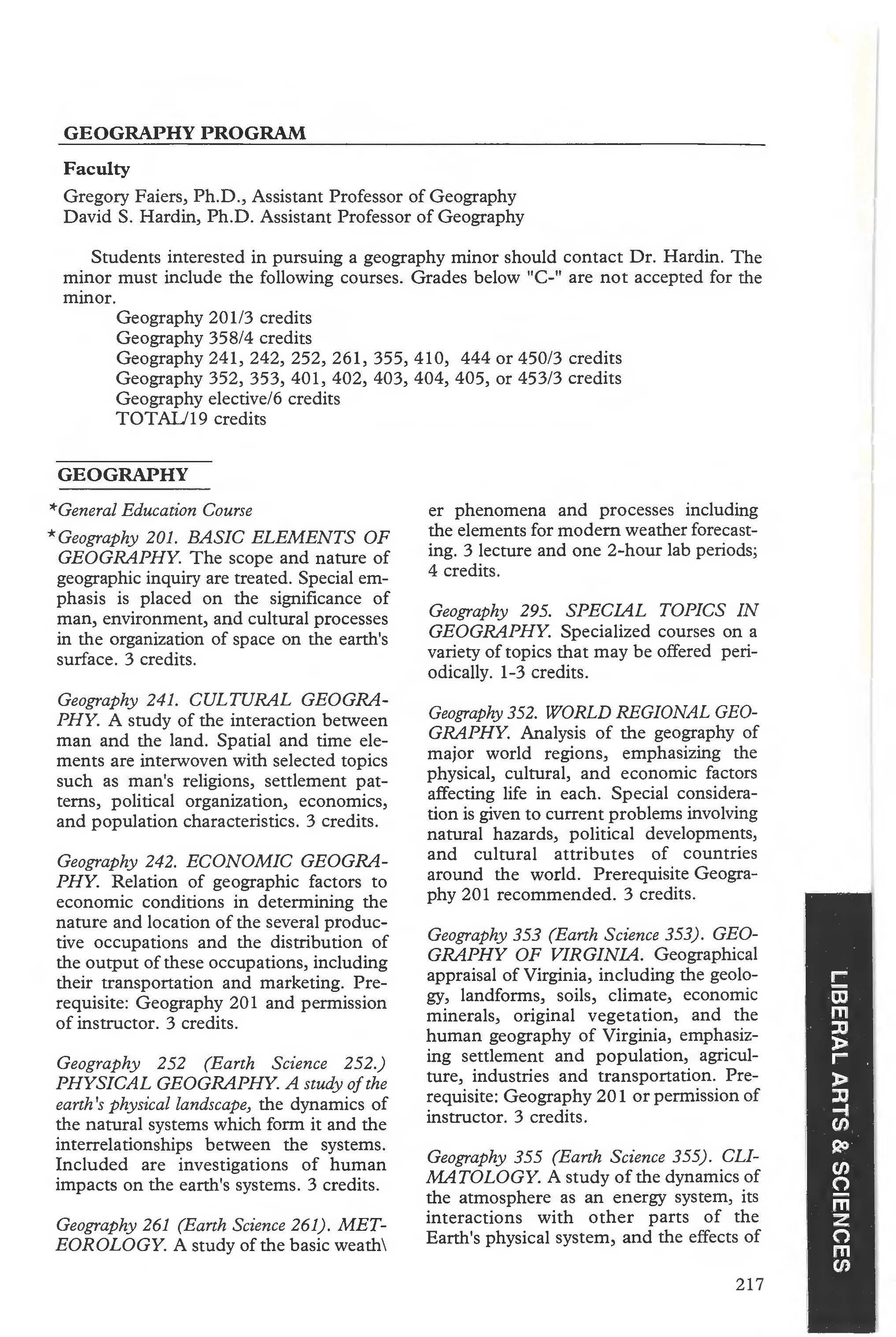
these interactions on human life and activity. Climate variations on global, regional, and local scales are investigated including methods of climate classification and techniques used to model future climatic conditions. Prerequisite: Geography 201 or Earth Science Geography 261 or permission of instructor. 3 credits.
Geography 358 (Earth Science 358). CARTOGRAPHY. Emphasis is focused on the construction of thematic maps at the preprofessional level and their incorporation in presentations of research. Computerbased techniques and processes are discussed along with conventional pen and ink methods. Prerequisites: permission of instructor. 4 credits.
Geography 401. GEOGRAPHY OF SOUTH AND EAST ASIA. Regional analysis of the physical geography and problems in the economic and political geography of Southeast Asia. Emphasis on China, Japan, and India. Prerequisite: Geography 201 or permission of instructor. 3 credits.
Geography 402. GEOGRAPHY OF LATIN AMERICA. Regional and systematic analysis of the geography of Latin America, including treatment of physical, cultural and economic characteristics of the several regions and countries within Latin America. Prerequisite: Geography 201 or permission of instructor. 3 credits.
Geography 403. GEOGRAPHY OF EUROPE. Regional analysis of peninsular, western and central Europe and the Mediterranean Basin. Prerequisite: Geography 201 or permission of instructor. 3 credits.
Geography 404. GEOGRAPHY OF ANGLO-AMERICA. Regional analysis of the United States and Canada, emphasizing the physical, cultural, and economic factors affecting the utilization of the several regions. Prerequisite: Geography 201 or permission of instructor. 3 credits.
Geography 405. GEOGRAPHY OF AFRICA. A regional analysis of the geographical factors influencing the culture and economics of the African continent. Special emphasis will be placed on the present
state of economic development. Prerequisite: Geography 201 or permission of instructor. 3 credits.
Geography 410 (Earth Science 410). REGIONAL PHYSIOGRAPHY OF THE UNITED STATES. Treatment of the processes that have shaped the varied surface features within the United States. Theories and concepts relating to geomorphic evolution in the major and minor physiographic divisions will be emphasized. Prerequisite: Geography 201 or Earth Science 252 or Earth Science 210. 3 credits.
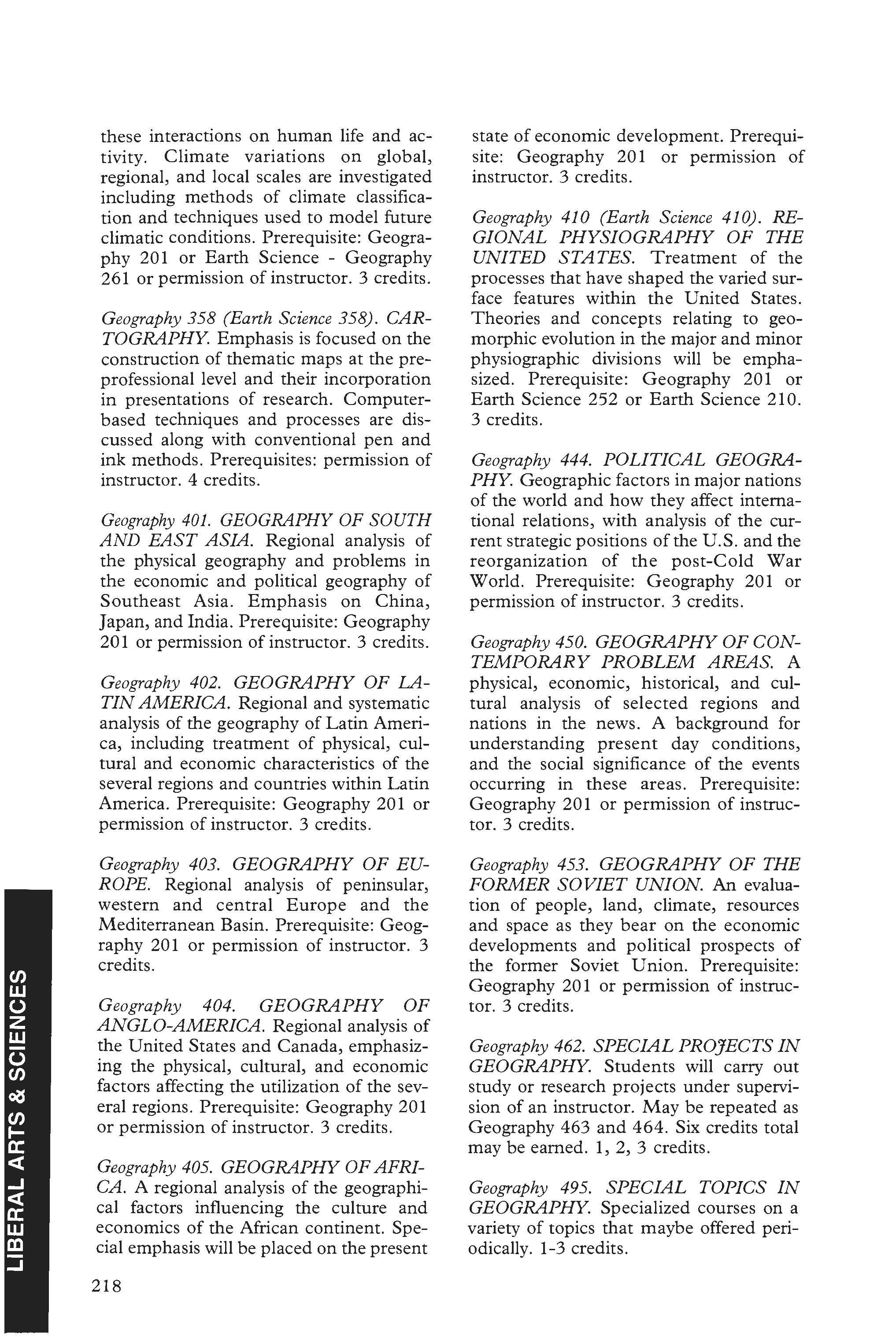
Geography 444. POLITICAL GEOGRAPHY. Geographic factors in major nations of the world and how they affect international relations, with analysis of the current strategic positions of the U.S. and the reorganization of the post-Cold War World. Prerequisite: Geography 201 or permission of instructor. 3 credits.
Geography 450. GEOGRAPHY OF CONTEMPORARY PROBLEM AREAS. A physical, economic, historical, and cultural analysis of selected regions and nations in the news. A background for understanding present day conditions, and the social significance of the events occurring in these areas. Prerequisite: Geography 201 or permission of instructor. 3 credits.
Geography 453. GEOGRAPHY OF THE FORMER SOVIET UNION. An evaluation of people, land, climate, resources and space as they bear on the economic developments and political prospects of the former Soviet Union. Prerequisite: Geography 201 or permission of instructor. 3 credits.
Geography 462. SPECIAL PROJECTS IN GEOGRAPHY. Students will carry out study or research projects under supervision of an instructor. May be repeated as Geography 463 and 464. Six credits total may be earned. 1, 2, 3 credits.
Geography 495. SPECIAL TOPICS IN GEOGRAPHY. Specialized courses on a variety of topics that maybe offered periodically. 1- 3 credits.
Alan Bentley, M.A., Instructor in Physics Wayne K. Meshejian, M.S., Assistant Professor of Physics and Area Coordinator of Physics Charles D. Ross, Ph.D., Assistant Professor of Physics and Program Director of Pre-Engineering
The physics major at Longwood provides fundamental training in several areas of physics so that graduates may pursue graduate study or careers in research, industry, teaching, or engineering. Those who wish to major in physics may choose from the following options:
1. traditional physics major for students interested in preparation for graduate work or careers in research or industry.
2. pre-medical/biophysics concentration for students interested in preparation for medical school or graduate work in biophysics.
3. pre-engineering for students interested in cooperative engineering programs.
A minimum of 32 semester hours credit in physics is required for all physics majors. Many physics majors elect to double major in both physics and some other discipline. Also, a student majoring in another field may choose to minor in physics. The minor program requires 24 semester hours in physics. No grade below "C-" in physics courses is accepted for the major or minor in physics.
A. General Education Core Requirement. 33 credits. See General Education Requirements listed on pages 61-63.
B. B. S. Degree Additional Degree Requirements. 12 credits.
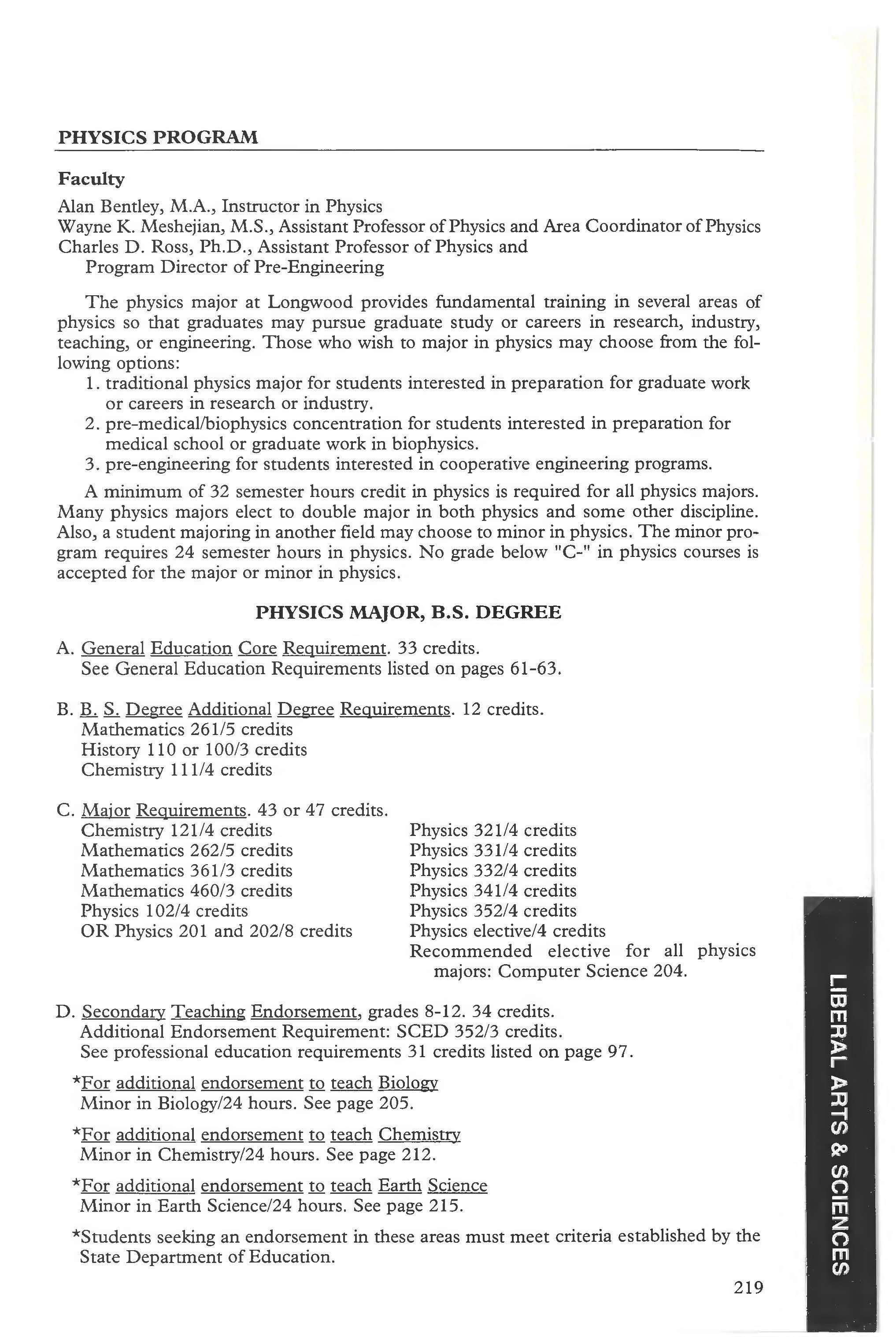
Mathematics 261/5 credits History 110 or 100/3 credits Chemistry 111/4 credits
C. Major Requirements. 43 or 47 credits.
Chemistry 121/4 credits
Mathematics 262/5 credits Mathematics 361/3 credits Mathematics 460/3 credits Physics 102/4 credits
OR Physics 201 and 202/8 credits
Physics 321/4 credits
Physics 331/4 credits
Physics 332/4 credits Physics 341/4 credits Physics 352/4 credits Physics elective/4 credits
Recommended elective for all physics majors: Computer Science 204.
D. Secondary Teaching Endorsement, grades 8-12. 34 credits. Additional Endorsement Requirement: SCED 352/3 credits.
See professional education requirements 31 credits listed on page 97.
*For additional endorsement to teach Biology Minor in Biology/24 hours. See page 205.
*For additional endorsement to teach Chemistry Minor in Chemistry/24 hours. See page 212.
*For additional endorsement to teach Earth Science Minor in Earth Science/24 hours. See page 215.
*Students seeking an endorsement in these areas must meet criteria established by the State Department of Education.
E Total credits reguired for B.S. in Physics ...... .... . . . .. .. .. . . . .. ...... 120
Total credits reguired for B.S. in Physics with Secondary Teaching Endorsement ............. .. ...... . .. .. ... 122/126
Total credits reguired for B.S. in Physics with Secondary Teaching Endorsement in either Biology, Chemistry or Earth Science ..... ... ..... . .. . ... ... ..... 146/156
B.A.
A. General Education Core Requirement. 33 credits
See General Education Requirements listed on pages 61-63.
B. B. S. Degree Additional Degree Requirements. 12 credits.
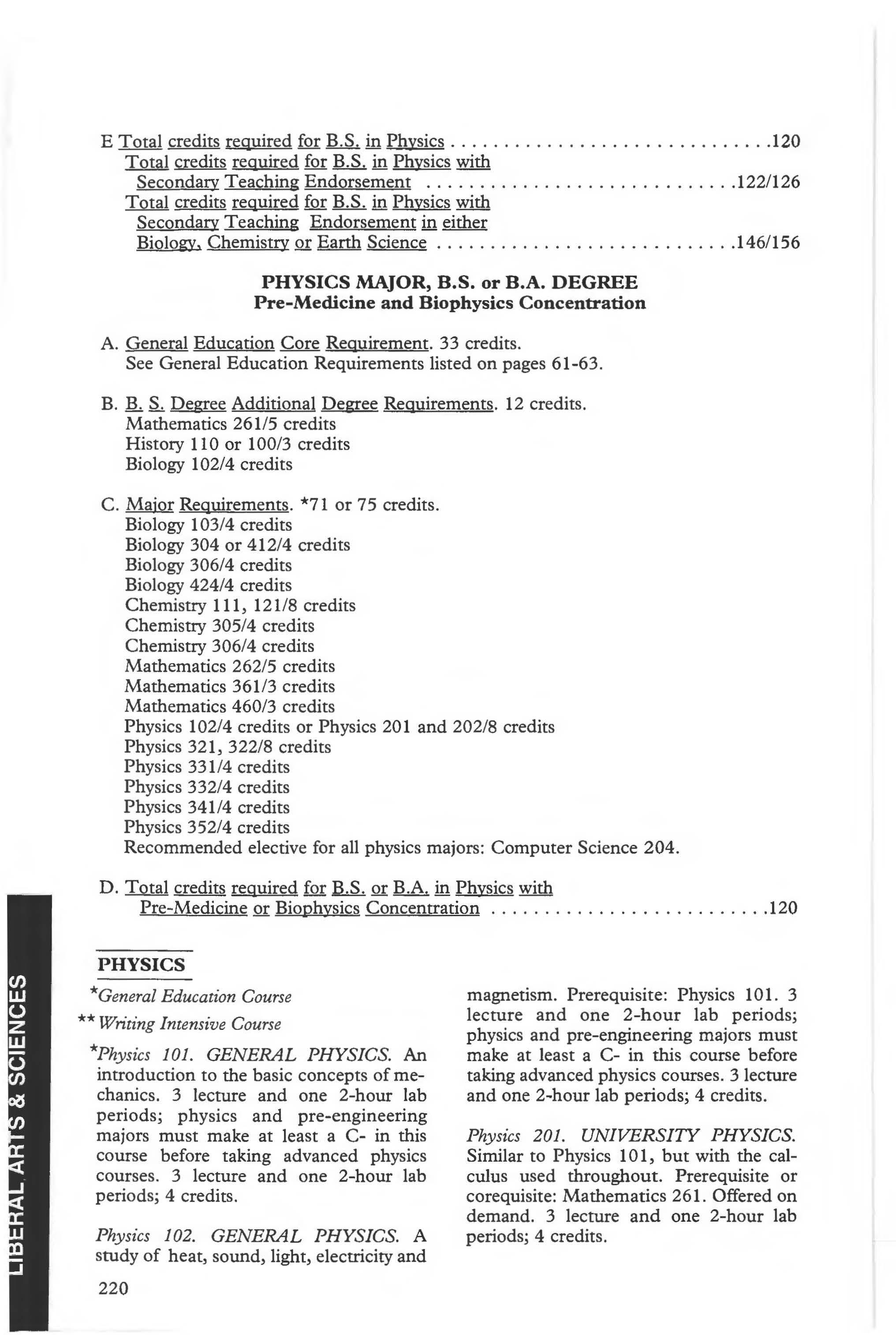
Mathematics 261/5 credits History 110 or 100/3 credits Biology 102/4 credits
C . Major Requirements . *71 or 75 credits.
Biology 103/4 credits Biology 304 or 412/4 credits
Biology 306/4 credits Biology 424/4 credits Chemistry 111, 121/8 credits Chemistry 305 / 4 credits
Chemistry 306/4 credits
Mathematics 262/5 credits Mathematics 361/3 credits Mathematics 460/3 credits
Physics 102/4 credits or Physics 201 and 202/8 credits
Physics 321, 322/8 credits
Physics 331/4 credits Physics 332 / 4 credits Physics 341/4 credits Physics 352 / 4 credits
Recommended elective for all physics majors: Computer Science 204.
D. Total credits required for B...S... or B.A. in Physics with Pre Medicine or Biophysics Concentration .. . .. . . .... .... .... .. . .. . . 120
*G eneral Edu cation Cours e
** Writ ing Int ensive Cours e
*Physics 101. GENERAL PHYSICS. An introduction to the basic concepts of mechanics 3 lecture and one 2-hour lab periods; physics and pre-engineering majors must make at least a C- in this course before taking advanced physics courses 3 lecture and one 2-hour lab periods; 4 credits .
Phy sics 102. GENERAL PHYSICS. A study of heat, sound, light, electricity and
magnetism. Prerequisite: Physics 101. 3 lecture and one 2-hour lab periods; physics and pre-engineering majors must make at least a C- in this course before taking advanced physics courses . 3 lecture and one 2-hour lab periods; 4 credits .
Physics 201. UNIVERSITY PHYSICS. Similar to Physics 101, but with the calculus used throughout. Prerequisite or corequisite: Mathematics 261. Offered on demand. 3 lecture and one 2-hour lab periods; 4 credits.
Physics 202. UNIVERSITY PHYSICS. Similar to Physics 102, but with the calculus used throughout. Prerequisite: Physics 201. Offered on demand. 3 lecture and one 2-hour lab periods; 4 credits.
**Phys£cs 321. ATOMIC AND NUCLEAR PHYSICS I. A survey of modem developments in electron, atomic, and nuclear physics. Prerequisite: Physics 101, 102 or 201, 202. Prerequisite or corequisite: Mathematics 261. 3 lecture and one 2hour lab periods; 4 credits.
Physics 322. ATOMIC AND NUCLEAR PHYSICS II. A continuation of Physics 321. Prerequisite: Physics 101, 102 or 201, 202. Prerequisite or corequisite : Mathematics 262. 3 lecture and one 2hour lab periods; 4 credits .
Phys£cs 324. THERMODYNAMICS. A study of thermal properties of matter; phenomena involved in flow of heat and performance of work. Kinetic theory and statistical mechanics are included. Prerequisite : Physics 101, 102 or 201, 202. Prerequisite or corequisite: Mathematics 262. Offered on demand. 3 credits.
Physics 326. LIGHT. A study of the nature and behavior of light and other electromagnetic radiation. Prerequisite: Physics 101, 102 or 201, 202, Mathematics 261. 3 lecture and one 2-hour lab periods; 4 credits.
Physics 331. A.G. AND D.C. CIRCUITS. A . C. and D . C. circuits, loop, mesh and nodal analysis, network theorems, dependent sources, RLC circuits, transients, resonance, and electrical measurements. Prerequisite: Physics 101, 102 or 201, 202. Prerequisite or corequisite: Mathematics 261. 3 lecture and one 2-hour lab periods; 4 credits.
Physics 332. CLASSICAL ELECTRICITY AND MAGNETISM. Electric and magnetic fields, potentials, resistance, inductance, and capacitance, polarization, magnetic materials, Maxwell's equations. Prerequisite: Mathematics 361. 4 periods; 4 credits.
** Physics 341. ELECTRONICS. An introduction to electronics including A.C. and D.C. analysis and synthesis of transistor amplifier circuits, operational amplifiers and elementary logic circuits. Prerequisite: Physics 331. 3 lecture and one 2hour lab periods; 4 credits.
Physics 352. MECHANICS. A mathematical study of motion using Newtonian and Lagrangian techniques. Prerequisite: Physics 101, 102 or 201, 202. Prerequisite or corequisite: Mathematics 460. 4 periods; 4 credits.
Physics 462. SPECIAL PROJECTS IN PHYSICS. Students will carry out research projects under individual supervision of an instructor. The nature of the project will depend on the interest and needs of the student. Consent of instructor and approval of department head is prerequisite for enrollment. May be repeated as Physics 463, 464. 2, 3, or 4 credits.

** Physics 492. INTERNSHIP IN PHYSICS
A semester long on-the-job learning experience designed to apply the principles of physics. Enrollment in the course is based on permission of the Director of Physics and Pre-engineering Programs and the coordinator at the internship location, and is subject to availability. Prerequisites: Restricted to physics and pre-engineering majors who have earned a minimum of 60 credits. 15 credits.
B.S. in Physics Granted by Longwood and a second degree:
M.S. Degree in Engineering Granted by University of Virginia or Old Dominion University or
M.S. Degree in Applied Physics Granted by Christopher Newport University or
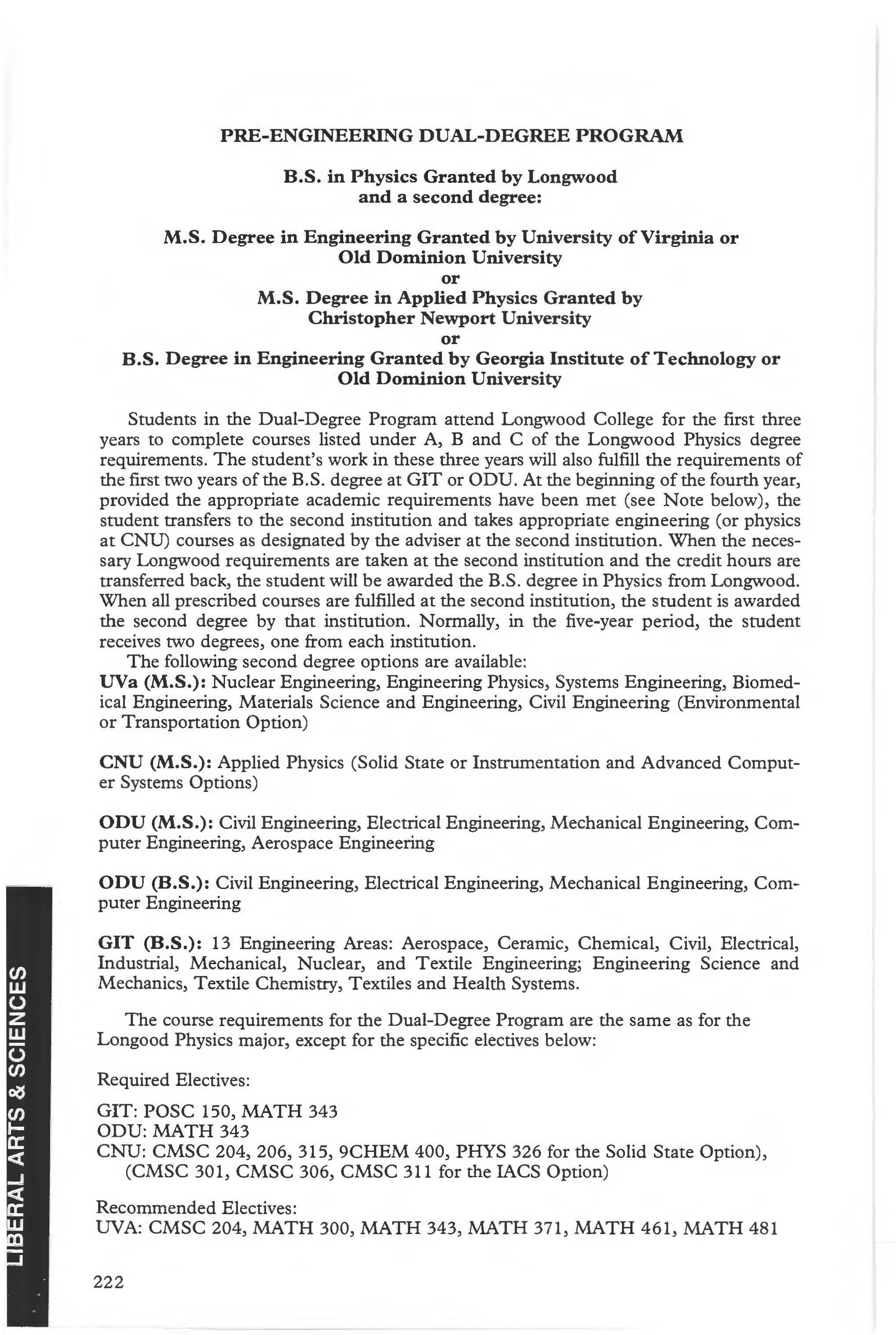
B.S. Degree in Engineering Granted by Georgia Institute of Technology or Old Dominion University
Students in the Dual-Degree Program attend Longwood College for the first three years to complete courses listed under A, B and C of the Longwood Physics degree requirements. The student's work in these three years will also fulfill the requirements of the first two years of the B.S. degree at GIT or ODU. At the beginning of the fourth year, provided the appropriate academic requirements have been met (see Note below), the student transfers to the second institution and takes appropriate engineering (or physics at CNU) courses as designated by the adviser at the second institution When the necessary Longwood requirements are taken at the second institution and the credit hours are transferred back, the student will be awarded the B.S degree in Physics from Longwood When all prescribed courses are fulfilled at the second institution, the student is awarded the second degree by that institution. Normally, in the five-year period, the student receives two degrees, one from each institution.
The following second degree options are available:
UVa (M.S.): Nuclear Engineering, Engineering Physics, Systems Engineering, Biomedical Engineering, Materials Science and Engineering, Civil Engineering (Environmental or Transportation Option)
CNU (M.S.): Applied Physics (Solid State or Instrumentation and Advanced Computer Systems Options)
ODU (M.S.): Civil Engineering, Electrical Engineering, Mechanical Engineering, Computer Engineering, Aerospace Engineering
ODU (B.S.): Civil Engineering, Electrical Engineering, Mechanical Engineering, Computer Engineering
GIT (B.S.): 13 Engineering Areas: Aerospace, Ceramic, Chemical, Civil, Electrical, Industrial, Mechanical, Nuclear, and Textile Engineering; Engineering Science and Mechanics, Textile Chemistry, Textiles and Health Systems.
The course requirements for the Dual-Degree Program are the same as for the Longood Physics major, except for the specific electives below:
Required Electives:
GIT: POSC 150, MATH 343
ODU: MATH 343
CNV: CMSC 204,206,315, 9CHEM 400, PHYS 326 for the Solid State Option), (CMSC 301, CMSC 306, CMSC 311 for the IACS Option)
Recommended Electives:
UVA: CMSC 204, MATH 300, MATH 343, MATH 371, MATH 461 , MATH 481
NOTES: 120 hours are required for graduation from Longwood with a cumulative average of 2.0 and with no grade below C- in a physics course. General elective hours in D of the Longwood physics requirements which are not fulfilled at the time of transfer will be taken at the second institution. Longwood will award transfer credit for courses passed with grades of "C" or above at the second institution.
Students transferring to UVA or CNU may elect to remain at Longwood for seven semesters before transferring.
The ODU B.S. program will only accept cenain Longwood General Education courses for transfer. Students electing this option should see the Pre-engineering Program Director for details
For the M.S. programs, the student's Longwood academic average must be "B" or better, both overall and in mathematics and physics, to be eligible for transfer. The student applies to the second institution for admission as a conditional graduate student. At the second institution, the student completes a sufficient number of appropriate undergraduate courses to fulfill Longwood's 120 hour degree requirement. Providing that the average in this course work is "B" or better and that a satisfactory score has been obtained on the Graduate Record Examination (which may be taken at any time prior to the awarding of the Longwood physics degree), the student is admitted unconditionally into the graduate program at the second institution.
For the GIT B.S. program, a student must have a 3.0 academic average at Longwood (both overall and in mathematics and physics) to be eligible for transfer.
For transfer to UVa, all coursework listed under A, B, and C of the Longwood physics degree requirements must be completed at Longwood before transfer. At the other institutions, some of this coursework may be taken at the second institution with prior permission of authorities at both institutions.
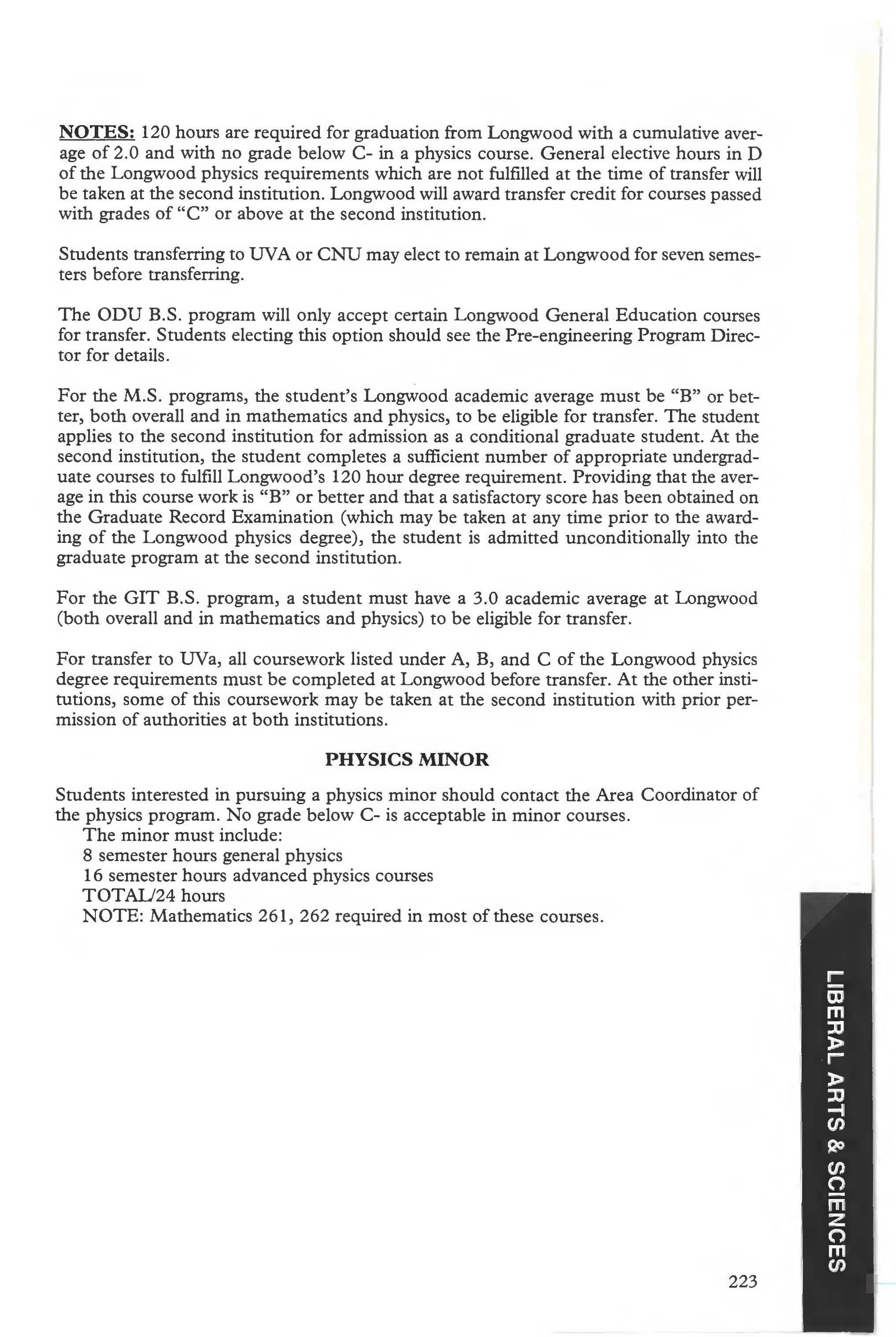
Students interested in pursuing a physics minor should contact the Area Coordinator of the physics program. No grade below C- is acceptable in minor courses. The minor must include:
8 semester hours general physics
16 semester hours advanced physics courses
TOTALJ24 hours
NOTE: Mathematics 261, 262 required in most of these courses.
Donald
A. Merkle, Program Director for Pre-ProfessionalsRepresentatives of our Affiliated Institutions
C. Barrie Cook, M.D., Medical Director, School of Medical Technology, The Fairfax Hospital, Falls Church
Janet T. Hiler, MT(ASCP), Program Director, Roanoke Memorial Hospital, Roanoke Amy Shoemaker, M.T. (ASCP) MBA, Program Director, Fairfax Hospital, Falls Church
Samuel F. Vance, M.D., Medical Director, School of Medical Technology, Roanoke Memorial Hospital, Roanoke
The Department of Natural Sciences is successful in preparing students for careers in medical technology, dental hygiene, occupational therapy, physical therapy, nursing, pharmacy, medicine, dentistry, and other health related professions. Students spend two-three years at Longwood taking the required coursework for transfer into the professional program at another institution. By working closely with an academic advisor, students can prepare for transfer into programs at any professional institution. Completion ofLongwood's pre-professional program, however, does not guarantee admission to the professional program. Admission to these programs is competitive and is based on the student's academic performance during the pre-professional period as well as personal recommendations and related experiences. A minimum GPA of 3.0 is usually required for transfer.
ODU)
Requirements:
*Biology 101/4 credits
*Biology 206/207 /8 credits
*Biology 304/4 credits
*Chemistry 101 or 111/4 credits
*English 100, 101/6 credits
Mathematics 171/3 credits
*Psychology 101, 131 or 132/3 credits
*Sociology 101/3 credits
*Speech 101/3 credits
Electives/22 credits
TOTAIJ60 credits
Requirements:
Biology 101/4 credits
*Required by ODU. In addition, 6 credit hours of selected humanities electives are required.
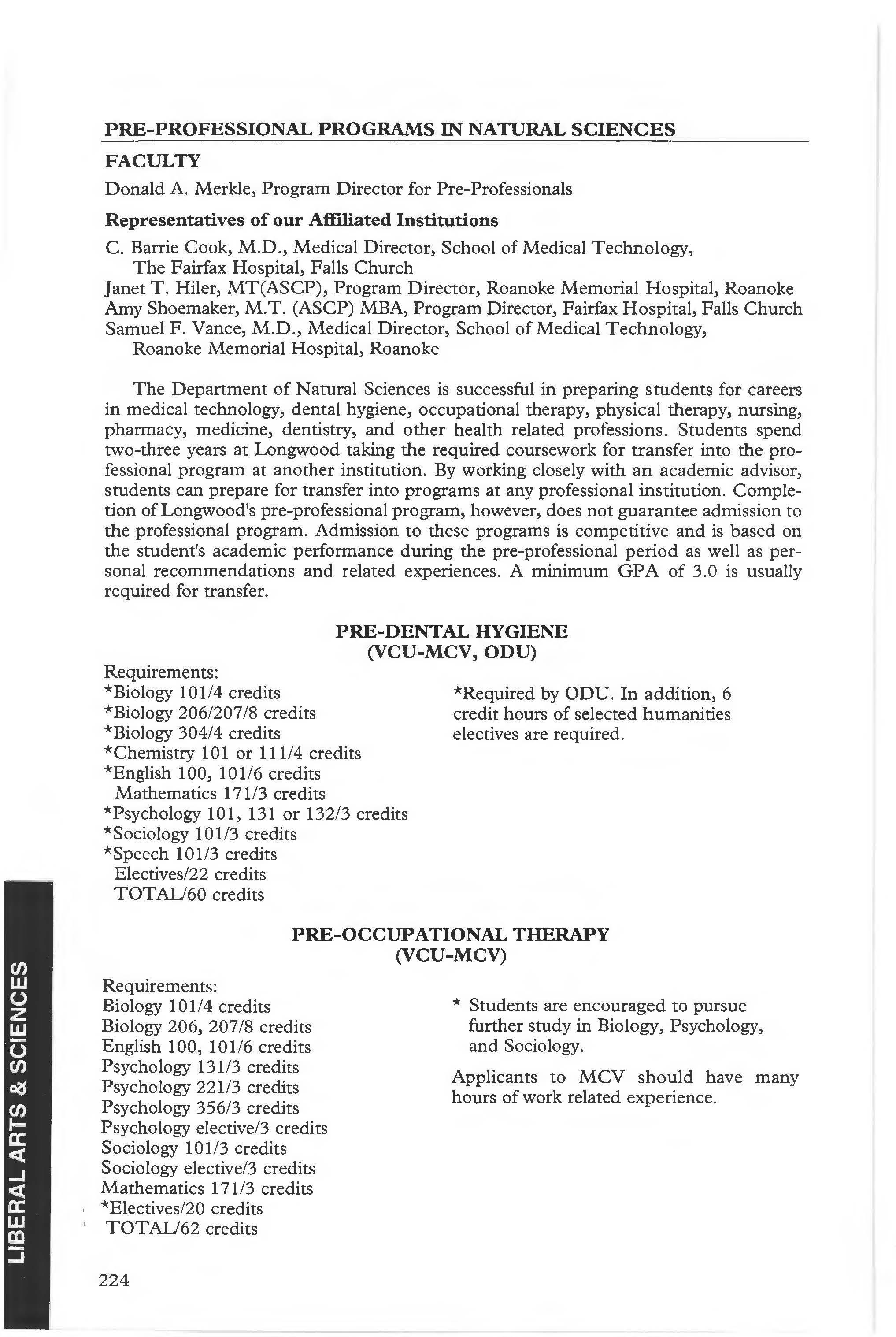
Biology 206, 207 /8 credits
English 100, 101/6 credits
Psychology 131/3 credits
Psychology 221/3 credits
Psychology 356/3 credits
Psychology elective/3 credits
Sociology 101/3 credits
Sociology elective/3 credits
Mathematics 171/3 credits
*Electives/20 credits
TOTAIJ62 credits
* Students are encouraged to pursue further study in Biology, Psychology, and Sociology.
Applicants to MCV should have many hours of work related experience.
BIOLOGY MAJOR, B.S. DEGREE Medical Technology Concentration (Roanoke Memorial Hospital, Fairfax Hospital)
A. General Education Core Requirement. 33 credits.
See General Education Requirements listed on pages 61-63.
B. B. S. Degree Additional Degree Requirements. 10 credits. Biology 102/4 credits, Mathematics/3 credits, Social Science/3 credits
C. Major Requirements. 47 credits.
Biology 101/4 credits
Biology 103/4 credits
Biology 206/4 credits
Biology 207 /4 credits
Biology 304/4 credits
Chemistry 111 and 121/8 credits
Chemistry 305, 306/ 8 credits
Physics 102/4 credits
Electives/7 credits
Major Requirements (affilated schools)
Fairfax Hospital/36 credits
Roanoke Memorial Hospital/42.5 credits
University of Virginia/38 credits
D. Total Credits Required for B.S. in Biology with Medical Technology Concentration affiliated with Fairfax Hospital 126

Total Credits Required for B.S. in Biology with Medical Technology Concentration affiliated with Roanoke Memorial Hospital 132.5
Information concerning curriculum at the hospitals, expenses, financial aid, etc. is available.
BIOLOGY MAJOR, B.S. DEGREE
Concentration in Pre-Dentistry, Pre-Medical, Pre-Physical Therapy, or Pre-Veterinary Medicine
A. General Education Core Requirement. 33 credits.
See General Education Requirements listed on pages 61-63.
B. B. S. Degree Additional Degree Requirements. 10 (12) credits. Chemistry 111/4 credits, Mathematics 171 (or 261/3 (5) credits, Social Science/3 credits.
C. Major Requirements. 47 credits.
Biology 101/4 credits
Biology 102 /4 credits
Biology 103/4 credits
Biology 206, 207 /8 credits
Biology 424/ 4 credits (must be taken at Longwood)
Biology elective at 300-400 level/4 credits (must be taken at Longwood)
Chemistry 121/4 credits
Chemistry 305, 306/8 credits (must be taken at Longwood)
Physics 102/4 credits
Biology elective/3 credits
Major Requirements from Professional Schools
30 semester hours credit of 300-400 level courses taken at the professional school (with grades of "C" or better) will be accepted as transfer credit by Longwood. These hours will count towards the requirement of 30 advanced hours normally taken at Longwood.
Note: 120 hours are required for graduation from Longwood College with a cumulative average of 2.0, a 2.0 average in all major courses, and no grade below "C-" in biology courses required for the major. Candidates for this degree must also arrange to take the departmental comprehensive achievement test for assessment purposes.
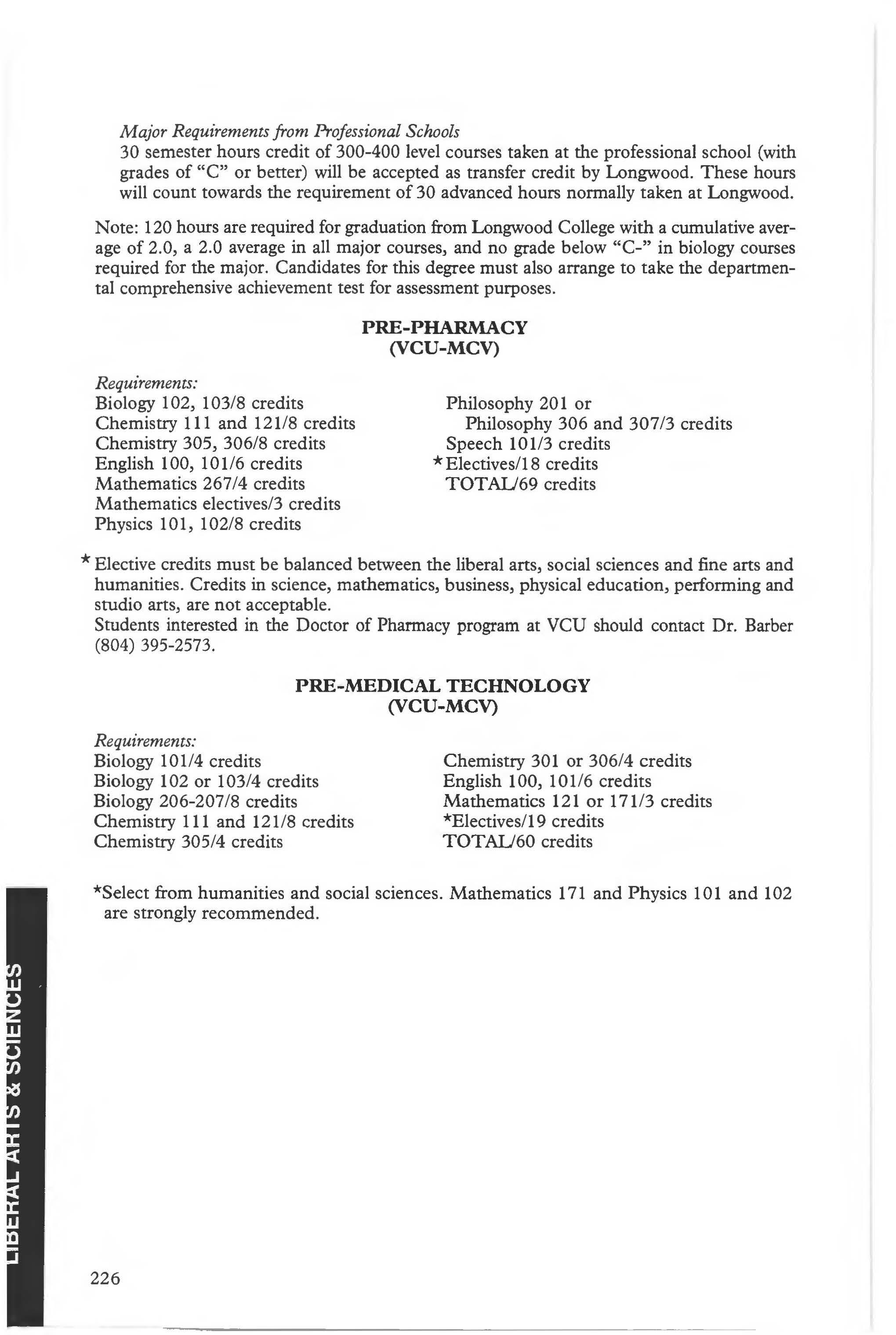
Requirements:
Biology 102, 103/8 credits
Chemistry 111 and 121/8 credits
Chemistry 305, 306/8 credits
English 100, 101/6 credits
Mathematics 267/4 credits
Mathematics electives/3 credits Physics 101, 102/8 credits
Philosophy 201 or Philosophy 306 and 307 /3 credits Speech 101/3 credits
* Electives/18 credits TOTAI.J69 credits
* Elective credits must be balanced between the liberal arts, social sciences and fine arts and humanities. Credits in science, mathematics, business, physical education, performing and studio arts, are not acceptable.
Students interested in the Doctor of Pharmacy program at VCU should contact Dr. Barber (804) 395-2573.
Requirements:
Biology 101/4 credits
Biology 102 or 103/4 credits
Biology 206-207 /8 credits
Chemistry 111 and 121/8 credits Chemistry 305/4 credits
Chemistry 301 or 306/4 credits
English 100, 101/6 credits Mathematics 121 or 171/3 credits
*Electives/19 credits TOTAI.J60 credits
*Select from humanities and social sciences. Mathematics 171 and Physics 101 and 102 are strongly recommended.
Requirements:
Biology 101 or 103/4 credits
Biology 206, 207 /8 credits
Chemistry 111 and 121/8 credits
English 100, 101/6 credits
Humanities elective/3 credits
Literature/3 credits Mathematics 171 /3 credits
Mathematics electives/3 credits
*Social Science electives/6 credits
Physics 101, 102/8 credits
Psychology 101, 131 or 132/6 credits
** Electives/32 credits
TOT AU90 credits
* Select from Anthropology, Economics, History, Psychology or Sociology.
** Recommended electives: Physical Education 386 (required by ODU); Mathematics 171, or any Computer Science course; Calculus; Modem Languages.
The Physical Therapy program at Old Dominion University requires a B.S. degree for admission. ODU requires the same prerequisite courses for MCV with the addition of PHED 386 and a Computer Science course . The Physical Therapy program at Shenandoah University requires Chemistry 305.
CURRICULUM (VCU-MCV, U.Va., Eastern Virginia Medical School)
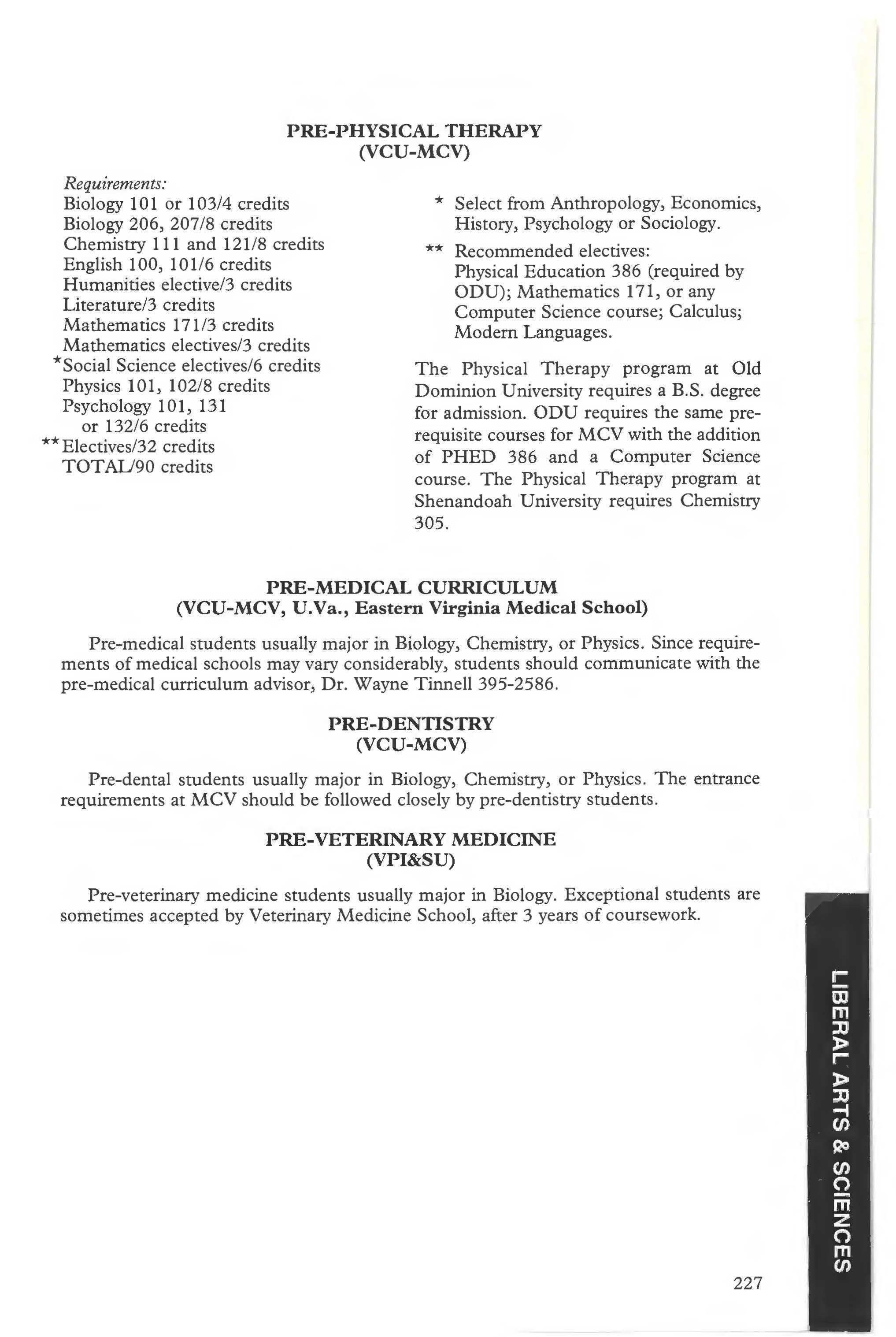
Pre-medical students usually major in Biology, Chemistry, or Physics. Since requirements of medical schools may vary considerably, students should communicate with the pre-medical curriculum advisor, Dr Wayne Tinnell 395-2586.
Pre-dental students usually major in Biology, Chemistry, or Physics. The entrance requirements at MCV should be followed closely by pre-dentistry students.
Pre-veterinary medicine students usually major in Biology. Exceptional students are sometimes accepted by Veterinary Medicine School, after 3 years of coursework.
Linda R. Tennison, Ph.D., Acting Chair
Joyce M. Trent, Secretary
The Department of Psychology offers both an undergraduate major and a minor, as well as basic introductory and service courses to numerous other college majors. Psychology courses required for other majors and minors are clearly identified under those disciplines.
Jennifer M. Apperson, Ph.D., Associate Professor of Psychology
Christopher A. Bjornsen, Ph.D., Assistant Professor of Psychology
David M. Carkenord, Ph.D., Associate Professor of Psychology
James A. Scepansky, M.A., Instructor of Psychology
Edward D. Smith, Ph.D., Professor of Psychology
David B. Stein, Ph.D., Associate Professor of Psychology
Linda R. Tennison, Ph.D., Assistant Professor of Psychology
Registration for internship and independent research opportunities in psychology requires a 2.50 GPA.
To satisfy major requirements for graduation, students majoring in psychology must earn a grade ofno less than C- in all psychology courses (44 credits).
The Department of Psychology offers five concentrations. All psychology majors are required to take the 26 credits of core requirements and 18 credits of psychology electives. We recommend, but we do not require, that majors choose a concentration.
The Department of Psychology requires senior majors to take and pass a comprehensive psychology test. The purpose of the test is to assess the progress of our majors, and the effectiveness of our program.
A. General Education Core Reguirement. 33 credits.
See General Education Requirements listed on pages 61-63. Psychology Majors are required to take PHIL-306 to fulfill Goal 10.
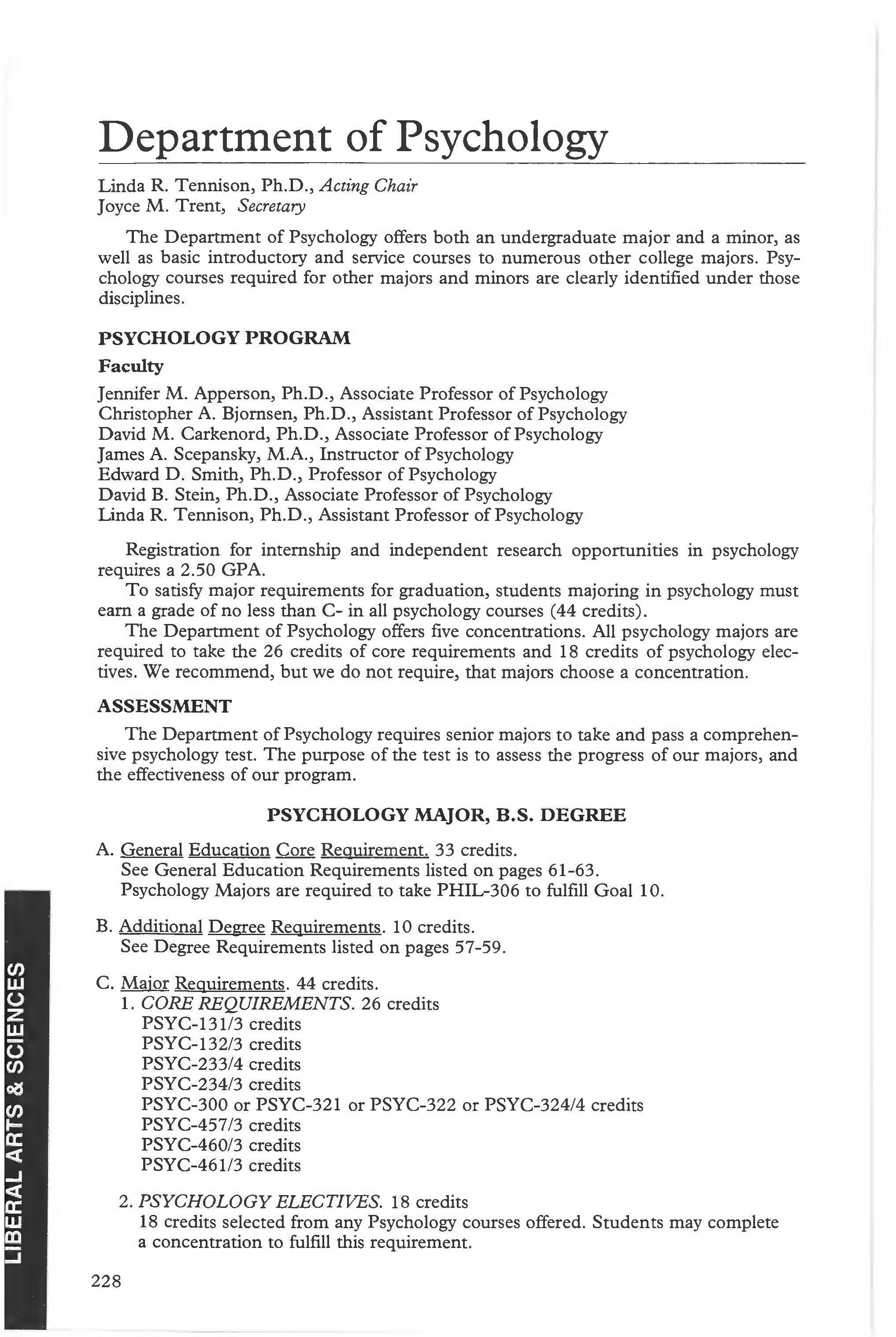
B. Additional Degree Reguirements. 10 credits. See Degree Requirements listed on pages 57-59.
C. Major Requirements. 44 credits.
1. CORE REQUIREMENTS. 26 credits
PSYC-131/3 credits
PSYC-132/3 credits
PSYC-233/4 credits
PSYC-234/3 credits
PSYC-300 or PSYC-321 or PSYC-322 or PSYC-324/4 credits
PSYC-457 /3 credits
PSYC-460/3 credits
PSYC-461/3 credits
2. PSYCHOLOGY ELECTIVES. 18 credits
18 credits selected from any Psychology courses offered. Students may complete a concentration to fulfill this requirement.
DEVELOPMENTAL CONCENTRATION. 18 credits.
PSYC 221/3 credits
PSYC 350/3 credits
PSYC 371/3 credits
PSYC 373/3 credits
PSYC 375/3 credits
PSYC 420/3 credits or PSYC 357/ 3 credits
GENERAL/EXPERIMENTAL CONCENTRATION. 19 credits
PSYC 300 / 4 credits
PSYC 321/4 credits
PSYC 324 /4 credits
PSYC 370/3 credits
PSYC 322/4 credits PSYC 450/3 credits
INDUSTRIAL/ORGANIZATIONAL CONCENTRATION. 18 credits
PSYC 259/3 credits
PSYC 260/3 credits
PSYC 365 / 3 credits
PSYC 400/3 credits
PSYC 410/3 credits
PSYC 425 / 3 credits
PRE-CLINICAL/COUNSELING CONCENTRATION. 18 credits.
PSYC 356/3 credits
PSYC 420/3 credits
PSYC 357/3 credits PSYC 423 / 3 credits
PSYC 410/3 credits PSYC 440/3 credits
SOCIAL PSYCHOLOGY CONCENTRATION. 18 credits
PSYC 231/3 credits
PSYC 260 / 3 credits
PSYC 356/3 credits
PSYC 375/3 credits
PSYC 350/3 credits PSYC 430/3 credits
D. General Electives: 33 credits
E. Total credits required for B S. in Psychology 120
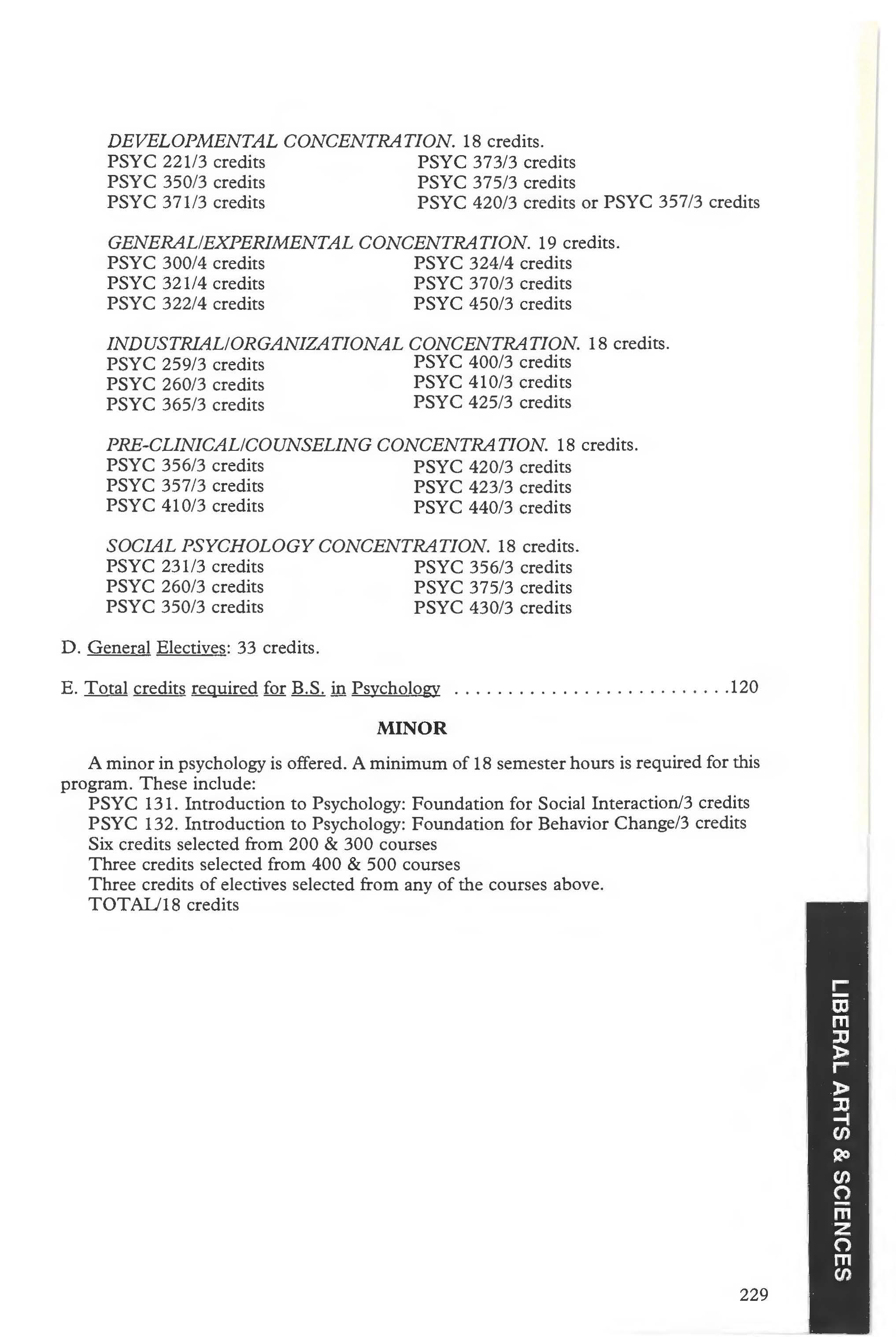
A minor in psychology is offered. A minimum of 18 semester hours is required for this program. These include :
PSYC 131. Introduction to Psychology : Foundation for Social Interaction/3 credits
PSYC 132. Introduction to Psychology : Foundation for Behavior Change/3 credits
Six credits selected from 200 & 300 courses
Three credits selected from 400 & 500 courses
Three credits of electives selected from any of the courses above. TOTAIJ18 credits
* General Education Course
** Writing Intensive Course
* Psychology 131. INTRODUCTION TO PSYCHOLOGY: FOUNDATIONS FOR SOCIAL INTERACTION. Overview of the scientific study of behavior and mental processes, focusing on child, adolescent, and adult development; personality; stress and health; psychological disorders and treatment; social psychology; psychology applied to the workplace. Interconnections with other disciplines and the relevance of psychology to individuals and society are emphasized. 3 credits .
* Psychology 132. INTRODUCTION TO PSYCHOLOGY: FOUNDATIONS FOR BEHAVIOR CHANGE. Overview of the scientific study of behavior and mental processes; physiological psychology; perceptual processes and states of consciousness; learning and memory; cognition and intelligence; motivation and emotion; psychology applied to the workplace. Interconnections with other disciplines and the relevance of psychology to individuals and society are emphasized. 3 credits
Psychology 221. LIFE-SPAN DEVELOPMENTAL PSYCHOLOGY. Principles and research covering the life-span development of human abilities and behavior. Topics include developmental research methodologies, variables influencing development, basic processes in development; and physical, motor, perceptual, cognitive, linguistic, motivational, emotional, social, and personality development. 3 credits.
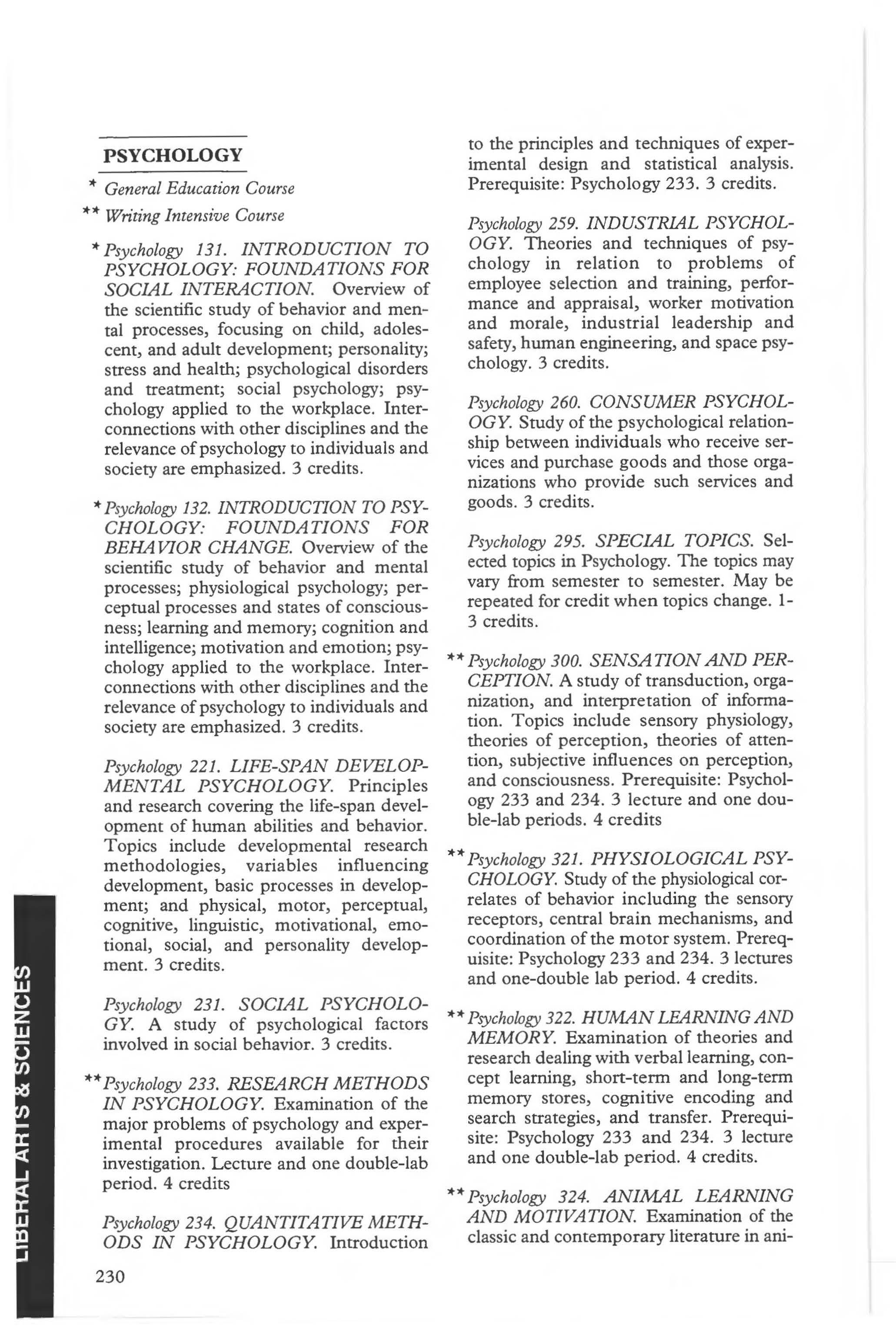
Psychology 231. SOCIAL PSYCHOLOGY. A study of psychological factors involved in social behavior. 3 credits.
** Psychology 233. RESEARCH METHODS IN PSYCHOLOGY. Examination of the major problems of psychology and experimental procedures available for their investigation. Lecture and one double-lab period. 4 credits
Psychology 234. QUANTITATIVE METHODS IN PSYCHOLOGY. Introduction
to the principles and techniques of experimental design and statistical analysis. Prerequisite: Psychology 233. 3 credits.
Psychology 259. INDUSTRIAL PSYCHOLOGY Theories and techniques of psychology in relation to problems of employee selection and training, performance and appraisal, worker motivation and morale, industrial leadership and safety, human engineering, and space psychology. 3 credits.
Psychology 260. CONSUMER PSYCHOLOGY. Study of the psychological relationship between individuals who receive services and purchase goods and those organizations who provide such services and goods 3 credits.
Psychology 295. SPECIAL TOPICS. Selected topics in Psychology. The topics may vary from semester to semester. May be repeated for credit when topics change. 13 credits.
** Psychology 300. SENSATION AND PERCEPTION. A study of transduction, organization, and interpretation of information. Topics include sensory physiology, theories of perception, theories of attention, subjective influences on perception, and consciousness. Prerequisite: Psychology 233 and 234. 3 lecture and one double-lab periods. 4 credits
** Psychology 321. PHYSIOLOGICAL PSYCHOLOGY. Study of the physiological correlates of behavior including the sensory receptors, central brain mechanisms, and coordination of the motor system. Prerequisite: Psychology 233 and 234. 3 lectures and one-double lab period. 4 credits.
** Psychology 322 . HUMAN LEARNING AND MEMORY. Examination of theories and research dealing with verbal learning, concept learning, short-term and long-term memory stores, cognitive encoding and search strategies, and transfer. Prerequisite: Psychology 233 and 234. 3 lecture and one double-lab period. 4 credits.
** Psychology 324. ANIMAL LEARNING AND MOTIVATION. Examination of the classic and contemporary literature in ani-
mal learning and motivation. Prerequisite : Psychology 233 and 234. 3 lecture and one double-lab period. 4 credits.
Psychology 350. PSYCHOLOGY OF SEX AND GENDER. An examination of the differences between the male and female experience from the psychologist's point of view. The course will include factors which have affected the male and female experience, current research on actual and perceived gender differences, and how social changes have contributed to changing roles. 3 credits.
Psychology 356. ABNORMAL PSYCHOLOGY. Description and explanation of the psychological aspects of behavior disorders . 3 credits.
Psychology 357. PSYCHOPATHOLOGY OF CHILDHOOD. Diagnostic classifications and models of deviant childhood behavior. Comparisons of child and adult patterns of psychopathology. Attention will be given to physical, learned and social bases of deviant behavior 3 credits
Psychology 365. PSYCHOLOGY OF ORGANIZATIONAL BEHAVIOR Introduction to the nature and consequences of human behavior in organization with an emphasis on individual characteristics and group phenomena. 3 credits .
Psychology 370 COGNITIVE DEVELOPMENT. An examination of cognitive changes that take place in humans across the lifespan . Theories of cognitive development, including those of Piaget, Bruner, Vygotsky, and Gardner will be studied in depth Specific areas of development studied include intelligence, memory processes and meta-cognition. 3 credits.
Psychology 371. INFANT AND CHILD DEVELOPMENT. An examination of the biological, cognitive, social, emotional, and behavioral changes that take place during prenatal development, infancy, and childhood including genetic influences, transformations in attachment, autonomy, family relations, sibling relations, peer relations, moral thinking and behavior, intelligence, language, and
achievement. Brief examination of childhood psychopathology. 3 credits.
Psychology 373. ADOLESCENT DEVELOPMENT. An examination of the biological, cognitive, social, emotional, and behavioral changes that take place during early, middle, and late adolescence including transformations in identity, intimacy, autonomy, sexuality, achievement, and attachment. Brief examination of adolescent psychopathology . 3 credits.
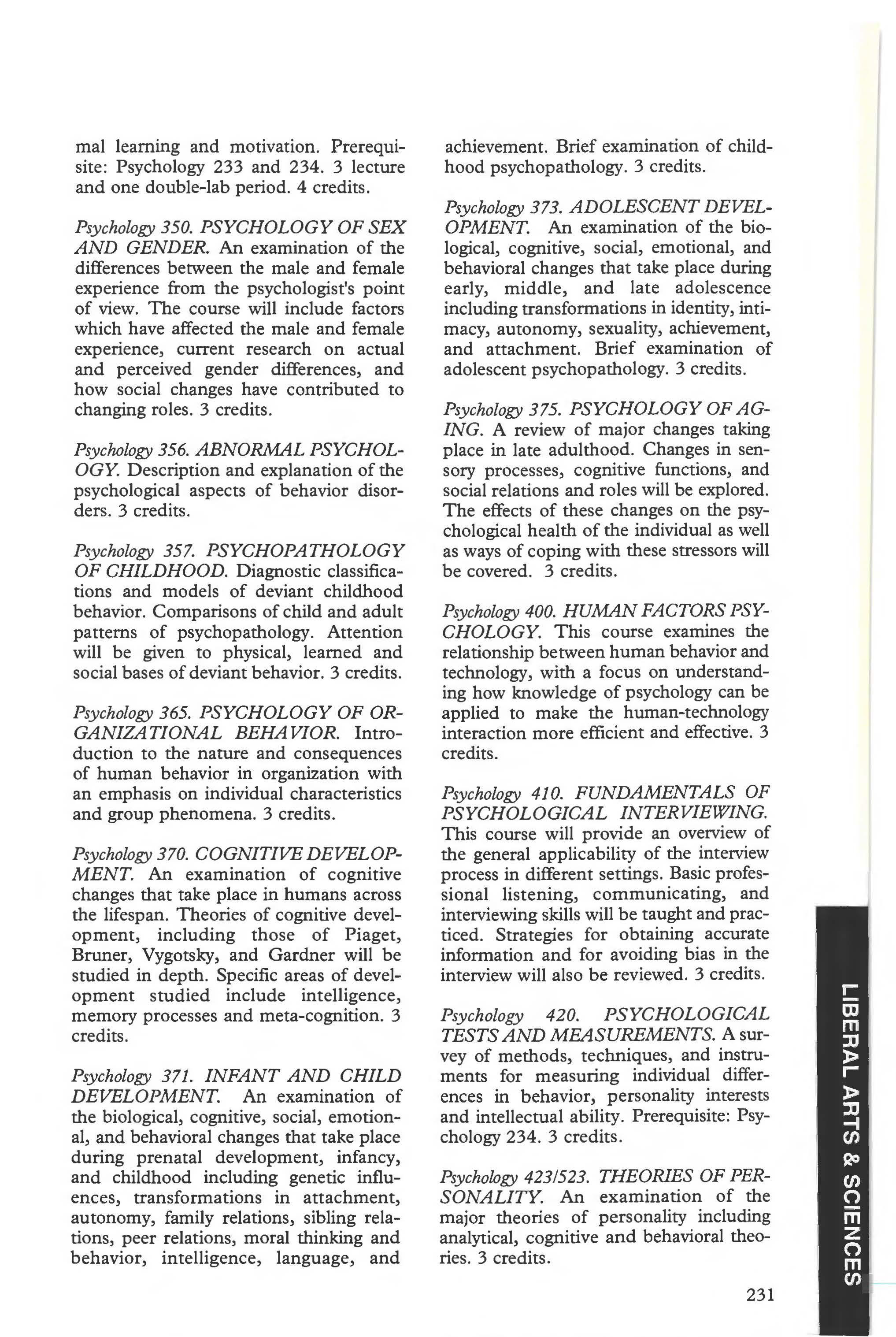
Psychology 375. PSYCHOLOGY OF AGING . A review of major changes taking place in late adulthood. Changes in sensory processes, cognitive functions, and social relations and roles will be explored The effects of these changes on the psychological health of the individual as well as ways of coping with these stressors will be covered . 3 credits.
Psychology 400. HUMAN FACTORS PSYCHOLOGY. This course examines the relationship between human behavior and technology, with a focus on understanding how knowledge of psychology can be applied to make the human-technology interaction more efficient and effective. 3 credits.
Psychology 410. FUNDAMENTALS OF PSYCHOLOGICAL INTERVIEWING. This course will provide an overview of the general applicability of the interview process in different settings. Basic professional listening, communicating, and interviewing skills will be taught and practiced Strategies for obtaining accurate information and for avoiding bias in the interview will also be reviewed. 3 credits .
Psychology 420 . PSYCHOLOGICAL TESTS AND MEASUREMENTS. A survey of methods, techniques, and instruments for measuring individual differences in behavior, personality interests and intellectual ability. Prerequisite: Psychology 234 3 credits.
Psychology 4231523. THEORIES OF PERSONALITY. An examination of the major theories of personality including analytical, cognitive and behavioral theories . 3 credits.
Psychology 425. PERSONNEL PSYCHOLOGY. An investigation of the principles and concepts of psychology as applied to personnel problems in organizational settings. Emphasis on psychological issues, theoretical development and methodology in the areas of criterion development, validation, classification, job analysis and training. 3 credits.
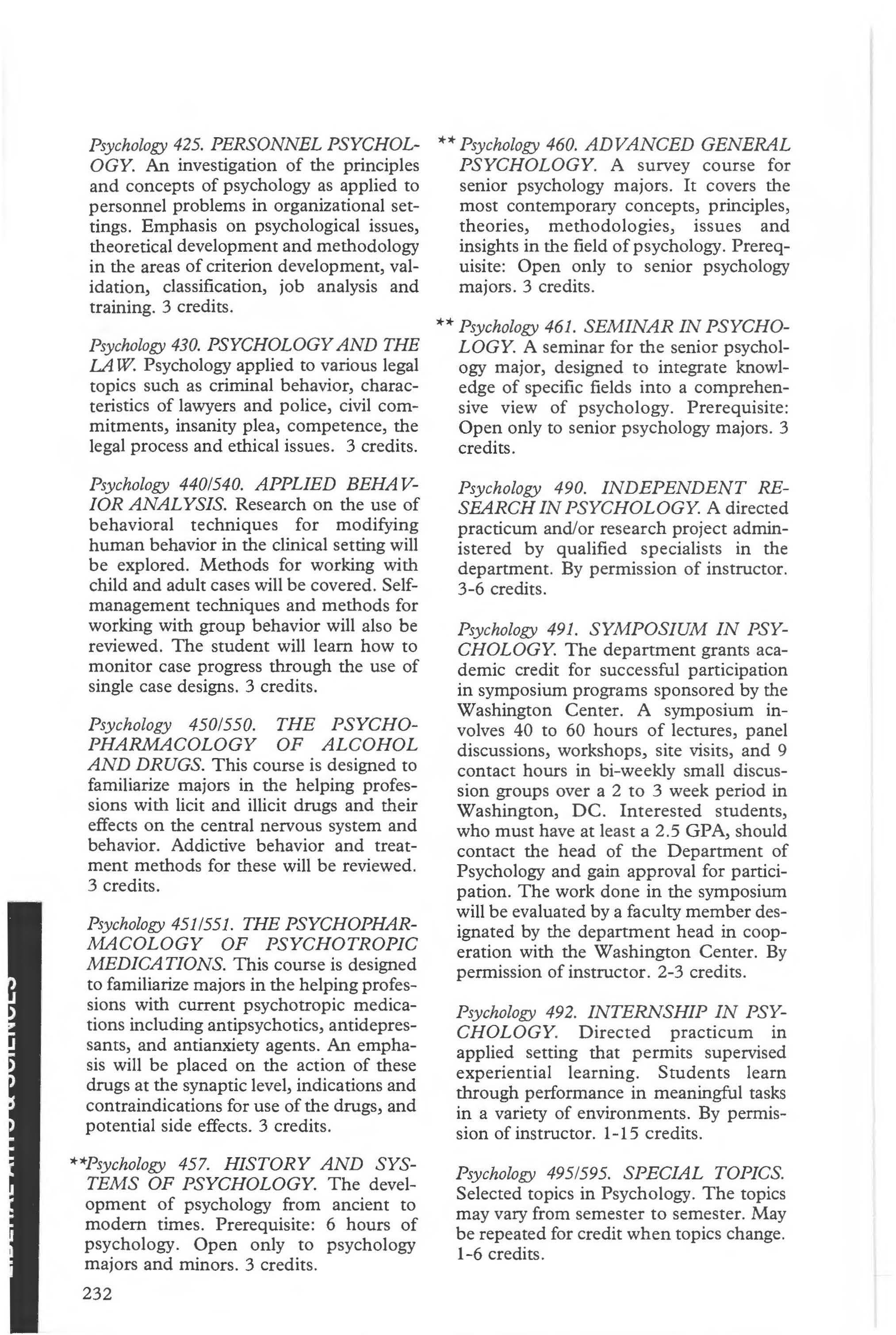
Psychology 430. PSYCHOLOGY AND THE LAW. Psychology applied to various legal topics such as criminal behavior, characteristics of lawyers and police, civil commitments, insanity plea, competence, the legal process and ethical issues. 3 credits.
Psychology 440/540. APPLIED BEHA VIOR ANALYSIS. Research on the use of behavioral techniques for modifying human behavior in the clinical setting will be explored. Methods for working with child and adult cases will be covered. Selfmanagement techniques and methods for working with group behavior will also be reviewed. The student will learn how to monitor case progress through the use of single case designs. 3 credits.
Psychology 450/550. THE PSYCHOPHARMACOLOGY OF ALCOHOL AND DRUGS. This course is designed to familiarize majors in the helping professions with licit and illicit drugs and their effects on the central nervous system and behavior. Addictive behavior and treatment methods for these will be reviewed. 3 credits.
Psychology 451/551. THE PSYCHOPHARMACOLOGY OF PSYCHOTROPIC MEDICATIONS. This course is designed to familiarize majors in the helping professions with current psychotropic medications including antipsychotics, antidepressants, and antianxiety agents. An emphasis will be placed on the action of these drugs at the synaptic level, indications and contraindications for use of the drugs, and potential side effects. 3 credits.
**Psychology 457. HISTORY AND SYSTEMS OF PSYCHOLOGY. The development of psychology from ancient to modern times. Prerequisite: 6 hours of psychology. Open only to psychology majors and minors. 3 credits.
** Psychology 460. ADVANCED GENERAL PSYCHOLOGY. A survey course for senior psychology majors. It covers the most contemporary concepts, principles, theories, methodologies, issues and insights in the field of psychology. Prerequisite: Open only to senior psychology majors. 3 credits.
** Psychology 461. SEMINAR IN PSYCHOLOGY. A seminar for the senior psychology major, designed to integrate knowledge of specific fields into a comprehensive view of psychology. Prerequisite: Open only to senior psychology majors. 3 credits.
Psychology 490. INDEPENDENT RESEARCH IN PSYCHOLOGY. A directed practicum and/or research project administered by qualified specialists in the department. By permission of instructor. 3-6 credits.
Psychology 491. SYMPOSIUM IN PSYCHOLOGY. The department grants academic credit for successful participation in symposium programs sponsored by the Washington Center. A symposium involves 40 to 60 hours of lectures, panel discussions, workshops, site visits, and 9 contact hours in bi-weekly small discussion groups over a 2 to 3 week period in Washington, DC. Interested students, who must have at least a 2.5 GPA, should contact the head of the Department of Psychology and gain approval for participation. The work done in the symposium will be evaluated by a faculty member designated by the department head in cooperation with the Washington Center. By permission of instructor. 2-3 credits.
Psychology 492. INTERNSHIP IN PSYCHOLOGY Directed practicum in applied setting that permits supervised experiential learning. Students learn through performance in meaningful tasks in a variety of environments. By permission of instructor. 1-15 credits.
Psychology 495/595. SPECIAL TOPICS. Selected topics in Psychology. The topics may vary from semester to semester. May be repeated for credit when topics change. 1-6 credits.
Advanced juniors and seniors may enroll in any of the following courses for undergraduate credit.
Psychology 523. THEORIES OF PERSONALITY. An examination of the major theories of personality including analytical, cognitive and behavioral theories. 3 credits.
Psychology 540. APPLIED BERA VIOR ANALYSIS. Research on the use of behavioral techniques for modifying human behavior in the clinical setting will be explored. Methods for working with child and adult cases will be covered. Self-management techniques and methods for working with group behavior will also be reviewed. The student will learn how to monitor case progress through the use of single case designs. 3 credits.
Psychology 550. THE PSYCHOPHARMACOLOGY OF ALCOHOL AND DRUGS. This course is designed to famil iarize majors in the helping professions with licit and illicit drugs and their effects on the central nervous system and behavior. Addictive behavior and treatment methods for these will be reviewed. 3 credits.
Psychology 551. THE PSYCHOPHARMACOLOGY OF PSYCHOTROPIC MED/CATIONS. This course is designed to familiarize majors in the helping professions with current psychotropic medications including antipsychotics, antidepressants, and antianxiety agents. An emphasis will be placed on the action of these drugs at the synaptic level, indications and contraindications for use of the drugs, and potential side effects. 3 credits.
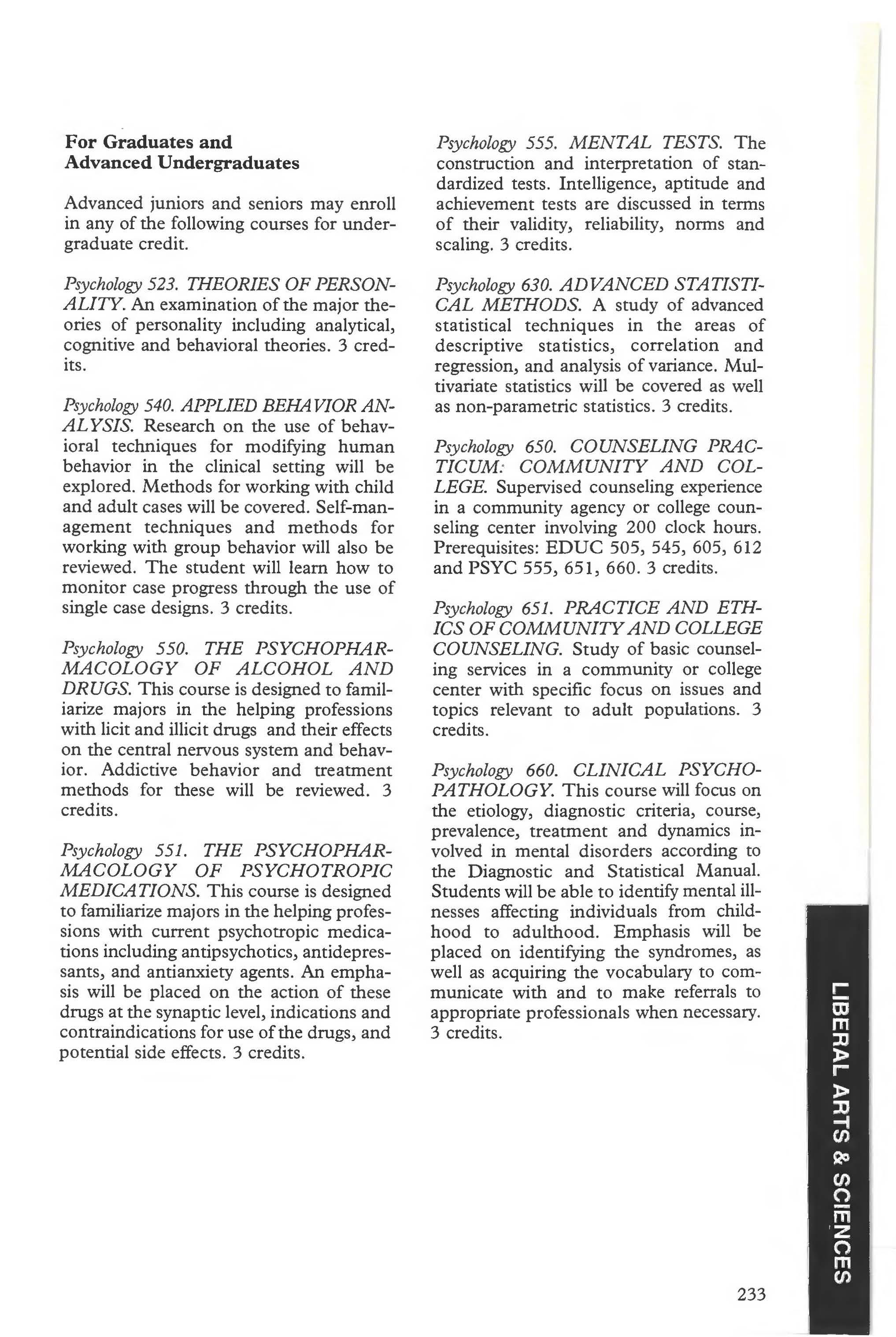
Psychology 555. MENTAL TESTS. The construction and interpretation of standardized tests. Intelligence, aptitude and achievement tests are discussed in terms of their validity, reliability, norms and scaling. 3 credits.
Psychology 630. ADVANCED STATISTICAL METHODS. A study of advanced statistical techniques in the areas of descriptive statistics, correlation and regression, and analysis of variance. Multivariate statistics will be covered as well as non-parametric statistics. 3 credits .
Psychology 650. COUNSELING PRACTICUM : COMMUNITY AND COLLEGE. Supervised counseling experience in a community agency or college counseling center involving 200 clock hours. Prerequisites: EDUC 505, 545, 605, 612 and PSYC 555, 651, 660. 3 credits.
Psychology 651. PRACTICE AND ETHICS OF COMMUNITY AND COLLEGE COUNSELING. Study of basic counseling services in a community or college center with specific focus on issues and topics relevant to adult populations. 3 credits.
Psychology 660. CLINICAL PSYCHOPATHOLOGY. This course will focus on the etiology, diagnostic criteria, course, prevalence, treatment and dynamics involved in mental disorders according to the Diagnostic and Statistical Manual. Students will be able to identify mental illnesses affecting individuals from childhood to adulthood. Emphasis will be placed on identifying the syndromes, as well as acquiring the vocabulary to communicate with and to make referrals to appropriate professionals when necessary. 3 credits.
The Department of Sociology and Anthropology offers an undergraduate major in sociology and anthropology, and minors in both disciplines. Students majoring in sociology or in anthropology may earn either the B.A. or B.S. degree.
Students with a GPA below 2.25 will not be accepted as majors. Students may reapply after their GPA has increased to 2.25.
The departmental curriculum is designed to provide opportunity for knowledge, skills and abilities to students who plan to (1) seek employment in business, industry, human service, or related fields, (2) pursue advanced studies in law, public policy, urban planning, or related fields, (3) engage in graduate work in sociology or anthropology, or (4) pursue undergraduate studies of the organization and functioning of human societies.
The sociology major can specialize in concentrations in Criminal Justice, Pre-Law, or Social Gerontology. Additionally, internships are often available. In the past, students have interned in probation and parole offices, community colleges, local government branches, planning and research agencies, physical and mental health care facilities, etc.
A popular offering in the department is the Archaeology Field School. Students learn about historic and prehistoric civilizations through supervised excavations of actual settlements. The Field School is offered in Summer Sessions. For more information, see Mr. Brian D. Bates.
Through a variety of activities, the department attempts to provide students with a program of breadth and depth characteristic of the Longwood educational experience. The department sponsors an active Sociology and Anthropology Club, an American Criminal Justice Association Lambda Alpha Epsilon Club, and a chapter of Alpha Kappa Delta, the international sociology honor society. In addition, each academic year the departmental faculty chooses outstanding students to receive the Kathleen Goodwin Cover Sociology Scholarship, the Diane M. Sheffield Memorial Scholarship, and the Outstanding Senior in the Department of Sociology and Anthropology Award.
General education requirements for the student majoring in sociology or anthropology can be found under "General Education Requirements" in this catalog. It is the responsibility of all students to consult with their academic advisor prior to each registration to ensure the proper fulfillment of general education and departmental requirements for graduation. Students minoring in sociology or anthropology must satisfy the general education requirements of the department of their major subject. Majors and minors are required to participate in yearly curriculum assessment, which may consist of comprehensive examinations.
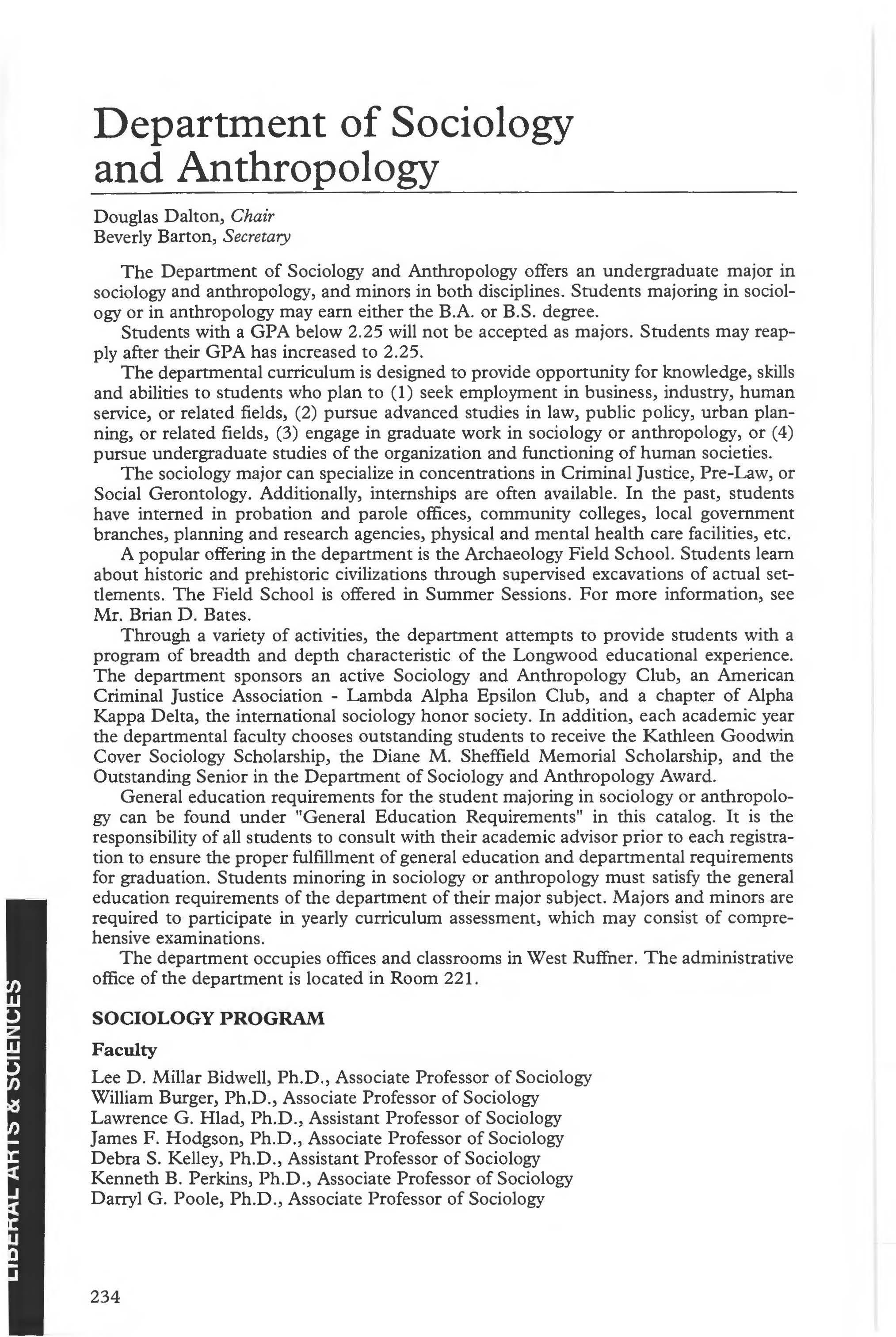
The department occupies offices and classrooms in West Ruffner. The administrative office of the department is located in Room 221.
Lee D. Millar Bidwell, Ph.D., Associate Professor of Sociology
William Burger, Ph.D., Associate Professor of Sociology
Lawrence G. Hlad, Ph.D., Assistant Professor of Sociology
James F. Hodgson, Ph.D., Associate Professor of Sociology
Debra S. Kelley, Ph.D., Assistant Professor of Sociology
Kenneth B. Perkins, Ph.D., Associate Professor of Sociology
Darryl G. Poole, Ph.D., Associate Professor of Sociology
The objective of the sociology major is to prepare students for occupations in business, industry, government, and human service. The major is appropriate preparation for graduate study in the social sciences and law. The focus of sociology is on social forces, institutions, organizations, and how individuals interface with society. The student's personal growth can be achieved through understanding of the rich diversity of the modern world. Skills can be developed in oral and written communication, critical thinking, scientific research methods, statistics and computerized data analysis. Opportunities for internships in research or in regional agencies are often available.
The objective of the minor in sociology is to acquaint the student with the discipline and to allow for personal growth and skill building. Additionally, the minor is intended to enhance career possibilities. Research methods, statistics, computerized data analysis , oral and written communication, and critical thinking are emphasized.
A. General Education Core Requirement . 33 credits.
See General Education Requirements listed on pages 61-63 .
NOTE: Goal 10 (Ethics, 1 credit) may be satisfied through Sociology 456, Senior Seminar in Sociology. Goal 8 is not satisfied by Sociology 101 and Sociology 102 .
B. Additional Degree Requirements, B.A. 9 credits .
Additional Degree Requirements, B.S . 10 credits .
See Degree Requirements listed on pages 57-59.
C . Major Requirements. 42 credits.
Sociology 101/3 credits
Sociology 102/3 credits
Sociology 345/3 credits
Sociology 346 / 3 credits
Sociology 390/3 credits
Sociology 456/3 credits
Anthropology 101/3 credits
Sociology electives/ 21 credits TOTAIJ42 credits
NOTE : A student minoring in anthropology may not use Anthropology 101 or a required elective to satisfy the general education requirement in social science .
D No grade below "C" is. accepted for graduation in major course work.
E . General Electives B.A. Degree: 36 credits
General Electives B.S . Degree: 35 credits
F. Total Credits Required for B.A. or B.S. in Sociology . ..... ...... . .. . . .. . 120
A. General Education Core Requirement. 33 credits.
See General Education Requirements listed on pages 61-63.

NOTE: Goal 10 (Ethics, 1 credit) may be satisfied through Sociology 456, Senior Seminar in Sociology. Goal 8 is not satisfied by Sociology 101 and 102 .
B. Additional Degree Requirements. B .A. 9 credits.
Additional Degree Requirements . B .S. 10 credits .
See Degree Requirements listed on pages 57-59.
C. Major Requirements. 42 credits.
Sociology 101/3 credits
Sociology 102/3 credits
Sociology 310 or 342/3 credits
Sociology 335/3 credits
Sociology 345/3 credits
Sociology 346/3 credits
Sociology 375/3 credits
Sociology 376 / 3 credits
Sociology 390/3 credits
Sociology 456/3 credits Anthropology 101/3 credits Sociology electives/9 credits TOTAIJ42 credits
Courses Highly Recommended For Criminal Justice Concentration
Political Science 230, 355, 356, 370
Psychology 365 Social Work 101, 280
D. No grade below "C" is. accepted for graduation in major course work.
E. General Electives B.A. Degree: 36 credits
General Electives B.S. Degree: 35 credits
F. Total Credits Required for B.A or B.S. in Sociology with Concentration in Criminal Justice 120
SOCIOLOGY MAJOR, B.A., B.S. DEGREE Pre-Law Concentration
A General Education Core Requirement. 33 credits. See General Education Requirements listed on pages 61-63. NOTE: Goal 10 (Ethics, 1 credit) may be satisfied through Sociology 456, Senior Seminar in Sociology. Goal 8 is not satisfied by Sociology 101 and 102.
B. Additional Degree Requirements, B.A. 9 credits
Additional Degree Requirements, B.S. 10 credits. See Degree Requirements listed on pages 57-59.
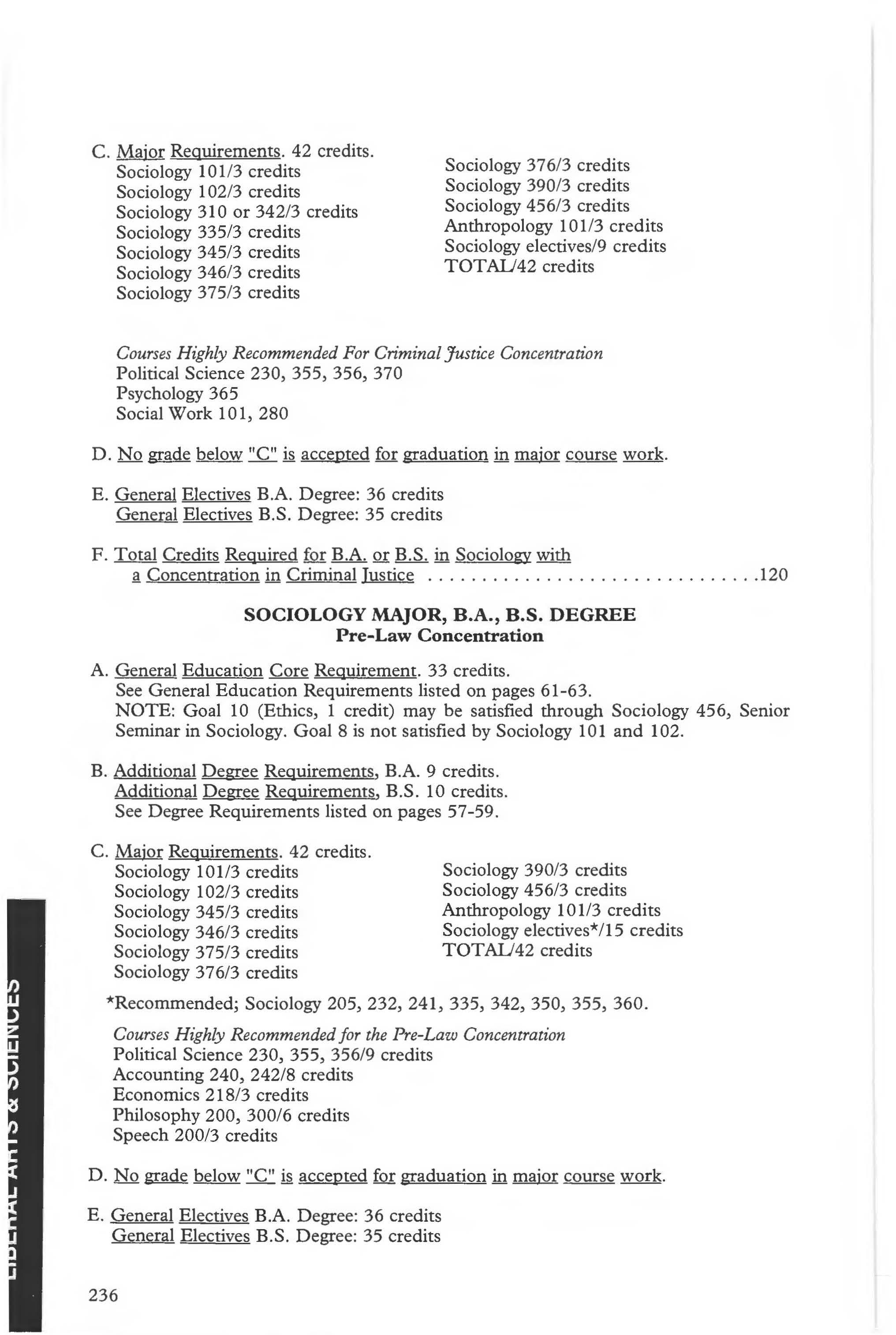
C. Major Requirements . 42 credits.
Sociology 101/3 credits
Sociology 102/3 credits
Sociology 345/3 credits Sociology 346/3 credits
Sociology 375/3 credits Sociology 376/3 credits
Sociology 390/3 credits Sociology 456/3 credits Anthropology 101/3 credits Sociology electives*/15 credits
TOTAIJ42 credits
*Recommended; Sociology 205, 232, 241, 335, 342, 350, 355, 360.
Courses Highly Recommended for the Pre-Law Concentration
Political Science 230, 355, 356/9 credits
Accounting 240, 242/8 credits
Economics 218/3 credits Philosophy 200, 300/6 credits Speech 200/3 credits
D. NQ below "C" is_ accepted fur graduation in major course work.
E. General Electives B.A. Degree: 36 credits
General Electives B.S. Degree: 35 credits
F. Total Credits Reguired for B.A. or B.S. in Sociology with g Concentration in Pre-Law 120
A. General Education Core Reguirement. 33 credits.
See General Education Requirements listed on pages 61-63. NOTE: Goal 10 (Ethics, 1 credit) may be satisfied through Sociology 456, Senior Seminar in Sociology. Goal 8 is not satisfied by Sociology 101 and 102.
B. Additional Degree Reguirements. B.A. 9 credits. Additional Degree Requirements. B.S. 10 credits. See Degree Requirements listed on pages 57-59.
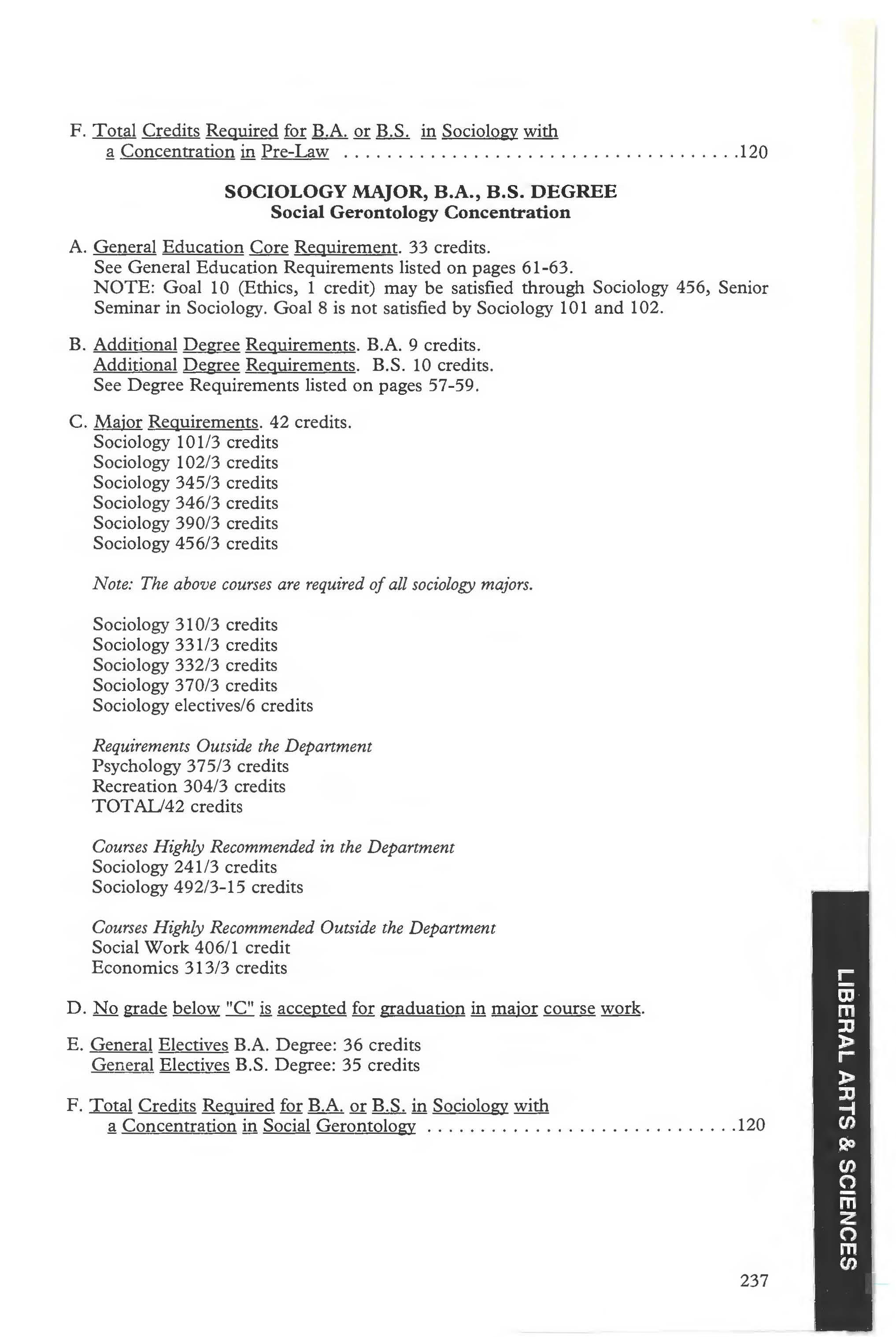
C. Major Requirements. 42 credits.
Sociology 101/3 credits
Sociology 102/3 credits
Sociology 345/3 credits Sociology 346/3 credits Sociology 390/3 credits Sociology 456/3 credits
Note: The above courses are required of all sociology majors.
Sociology 310/3 credits Sociology 331/3 credits Sociology 332/3 credits Sociology 370/3 credits Sociology electives/6 credits
Requirements Outside the Department
Psychology 375/3 credits Recreation 304/3 credits TOT AIJ42 credits
Courses Highly Recommended in the Department
Sociology 241/3 credits Sociology 492/3-15 credits
Courses Highly Recommended Outside the Department
Social Work 406/1 credit Economics 313/3 credits
D. No grade below "C" lli accepted for graduation in major course work.
E. General Electives B.A. Degree: 36 credits
General Electives B.S. Degree: 35 credits
F. Total Credits Required for B.A. or B.S. in Sociology with g Concentration in Social Gerontology
See appropriate listing of requirements for the department in which the major is taken.
*General Education Courses
**Writing Intensive Courses
*Sociology 101. PRINCIPLES OF SOCIOLOGY. Principles of Sociology seeks to impart an analytical framework with which the student can better understand the relationship between individual and social structure. Theories of functionalism, conflict, symbolic interactionism, and socialization will be discussed. The concepts of normative culture, technology, demography, ethnocentrism, values, norms, institutions, status, role, bureaucracy, and stratification will be developed and applied to social institutions. These institutions will include: the formal organization, courtship, marriage and family, religion, health care service delivery, media, politics, military, and criminal justice. 3 credits.
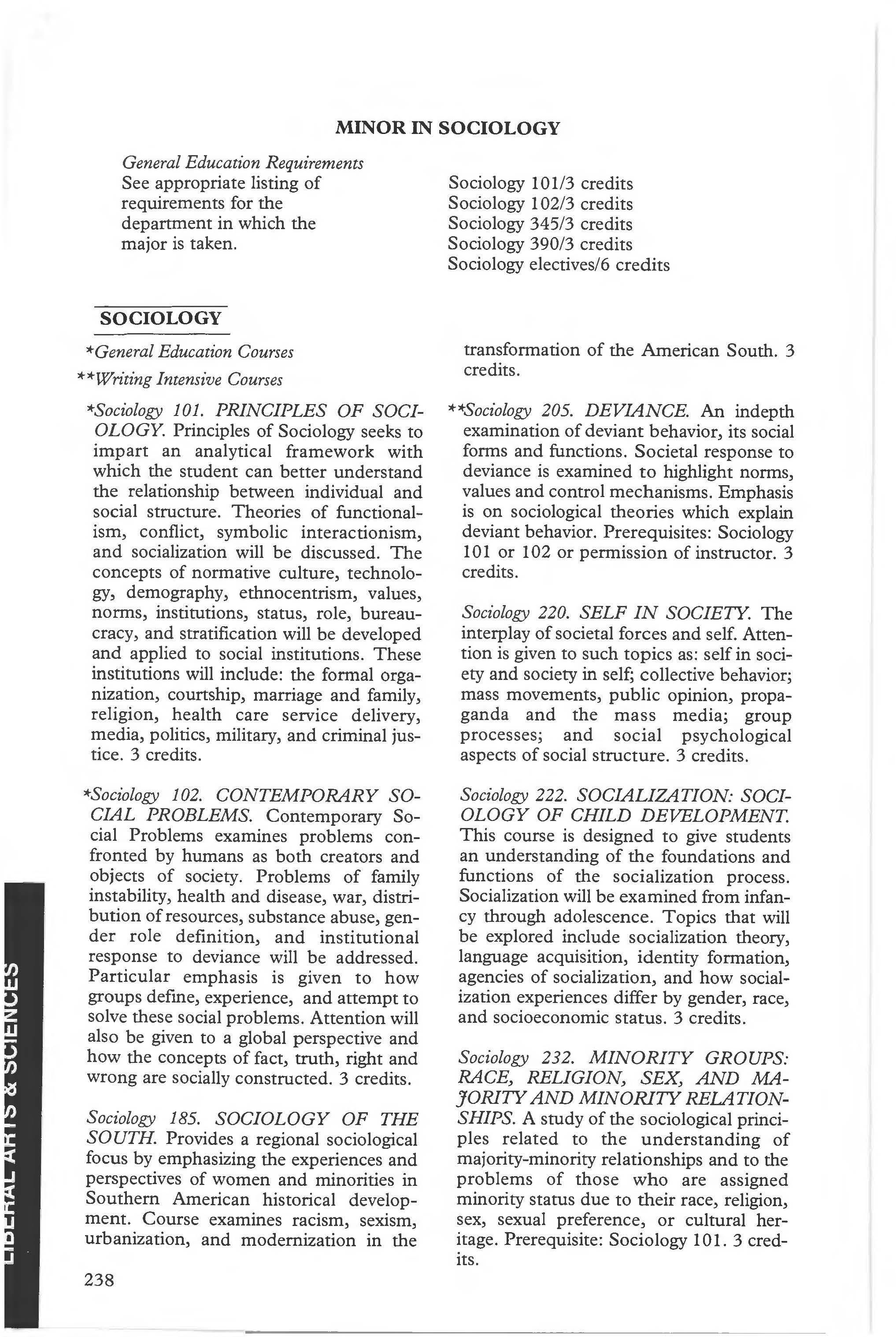
*Sociology 102. CONTEMPORARY SOCIAL PROBLEMS. Contemporary Social Problems examines problems confronted by humans as both creators and objects of society. Problems of family instability, health and disease, war, distribution of resources, substance abuse, gender role definition, and institutional response to deviance will be addressed. Particular emphasis is given to how groups define, experience, and attempt to solve these social problems. Attention will also be given to a global perspective and how the concepts of fact, truth, right and wrong are socially constructed. 3 credits.
Sociology 185. SOCIOLOGY OF THE SOUTH. Provides a regional sociological focus by emphasizing the experiences and perspectives of women and minorities in Southern American historical development. Course examines racism, sexism, urbanization, and modernization in the
Sociology 101/3 credits
Sociology 102/3 credits
Sociology 345/3 credits
Sociology 390/3 credits Sociology electives/6 credits transformation of the American South. 3 credits.
**Sociology 205. DEVIANCE. An indepth examination of deviant behavior, its social forms and functions. Societal response to deviance is examined to highlight norms, values and control mechanisms. Emphasis is on sociological theories which explain deviant behavior. Prerequisites: Sociology 101 or 102 or permission of instructor. 3 credits.
Sociology 220. SELF IN SOCIETY. The interplay of societal forces and self. Attention is given to such topics as: self in society and society in self; collective behavior; mass movements, public opinion, propaganda and the mass media; group processes; and social psychological aspects of social structure. 3 credits.
Sociology 222. SOCIALIZATION: SOCIOLOGY OF CHILD DEVELOPMENT. This course is designed to give students an understanding of the foundations and functions of the socialization process. Socialization will be examined from infancy through adolescence. Topics that will be explored include socialization theory, language acquisition, identity formation, agencies of socialization, and how socialization experiences differ by gender, race, and socioeconomic status. 3 credits.
Sociology 232. MINORITY GROUPS: RACE, RELIGION, SEX, AND MAJORITY AND MINORITY RELATIONSHIPS. A study of the sociological principles related to the understanding of majority-minority relationships and to the problems of those who are assigned minority status due to their race, religion, sex, sexual preference, or cultural heritage. Prerequisite: Sociology 101. 3 credits.
**Sociology 241. MARRIAGE AND THE FAMILY. The history of American families and contemporary family issues will be analyzed using sociological theory and research. Topics that will be covered include marriage, cohabitation, divorce, single parent families, blended families, and the impact of race and socioeconomic status on family structure. 3 credits.
Sociology 295 /495. SPECIAL TOPICS. Recommended when the student desires to pursue a specialized topic in depth. Must have permission of department chair and instructor directing the course. Students' cumulative GPA must be 2.50 or higher to be eligible. 3 credits.
Sociology 301 . ISSUES IN CRIMINAL JUSTICE . This course is designed to provide students with an opportunity to conduct a critical analysis of the institutions of criminal justice and the actors therein. Topics that will be covered include: sociological notions of criminal justice; social research and criminal justice institutions; historical developments and evolution of criminal justice institutions; role and function of criminal justice institutions; criminal justice occupational subculture; and the nature of criminal justice authority as a social and legal construct. 3 credits.
**Sociology 310 COMPLEX ORGANIZATIONS. Study of complex organizations such as private enterprises, voluntary associations, and governmental bureaucracies in terms of political-economic environment, formal and informal structure, technology, management ideologies, control and commitment of personnel, and impact on lives of individuals. Classical and recent theory and research will be examined Prerequisite : Sociology 101 or permission of instructor. 3 credits .
So ciology 320. SOCIOLOGY OF EDUCATION The school system and classroom are analyzed with the emphasis on basic sociological concepts. Social class differences, the status of teachers, education as a socializing agent and education as a vehicle of mobility are among the topics taken into consideration. Prerequisite:

Sociology 101 or 102, or permission of instructor. 3 credits
Sociology 321 (Anthropology 321). SUPERNATURAL BELIEF SYSTEMS. An investigation of the social aspects of religion, its forms of organization, and its relationships to other institutions. 3 credits.
Sociology 325 (Anthropology 325). WOMEN AND SOCIETY. An introduction to the study of women's roles, contributions, and perception of society through readings in anthropology and sociology. The focus will be on the effects of gender, race and ethnicity in the lives of women. Prerequisite: Sociology 101 or 102. 3 credits.
Sociology 326. THE SOCIOLOGY OF THE CIVIL RIGHTS MOVEMENT. This course will examine the social and intellectual presuppositions that led to the Civil Rights Movement. Included in the course will be an examination of the different approaches to equality that have developed by noted black and white intellectuals including Booker T. Washington, W. E. B. Du Bois, Marcus Garvey, Martin Luther King, Jr., and Malcolm X. The impact of technological changes and the consequences of various Supreme Court decisions on the Civil Rights Movement will also be discussed. Prerequisite: 6 hours of sociology including Sociology 101 or permission of instructor. 3 credits.
Sociology 331. SOCIAL GERONTOLOGY. A comprehensive examination of social gerontology, with particular emphasis on the historical changes in the role of the elderly in society, future social and demographic trends, the contribution of sociological theories to understanding this group, and public policy implications. Also addressed will be specific social problems associated with aging (poverty, loneliness, suicide). Prerequisite: Sociology 101. 3 credits.
Sociology 332. SOCIOLOGY OF DYING AND DEA TH The course explores social processes attendant to dying and death, including those that define the role processes of dying and the status of being dead. The effects of disruption in dyads,
families, and larger social organizations will be studied. The thesis that emotions are socially and culturally mediated will be examined. Other topics include crosscultural causes of death, demography of death, care systems which attend dying, the concept and treatment of pain, funeral and body dispositions, and medical and legal ethics. Prerequisite: Sociology 101 or 102. 3 credits.
Sociology 335. JUVENILE DELINQUENCY. The exploration of the diversity of delinquent behavior, the process of becoming delinquent, the importance of legislation, the law enforcement apparatus, the courts and juvenile correctional facilities in the development of delinquent identities. 3 credits.
Sociology 342. PENOLOGY. The theory and practice of prison management and criminal rehabilitation. The overarching concepts of this course are: the functions of punishment and rehabilitation; historical and cross-cultural approaches to punishment, deterrence, and rehabilitation; current theories and practices; and future possibilities. The course is intended for those interested in the general study of sociology and criminal justice, prison administration, and complex organizations. Prerequisite: Sociology 101 or 102 or permission of instructor. 3 credits.
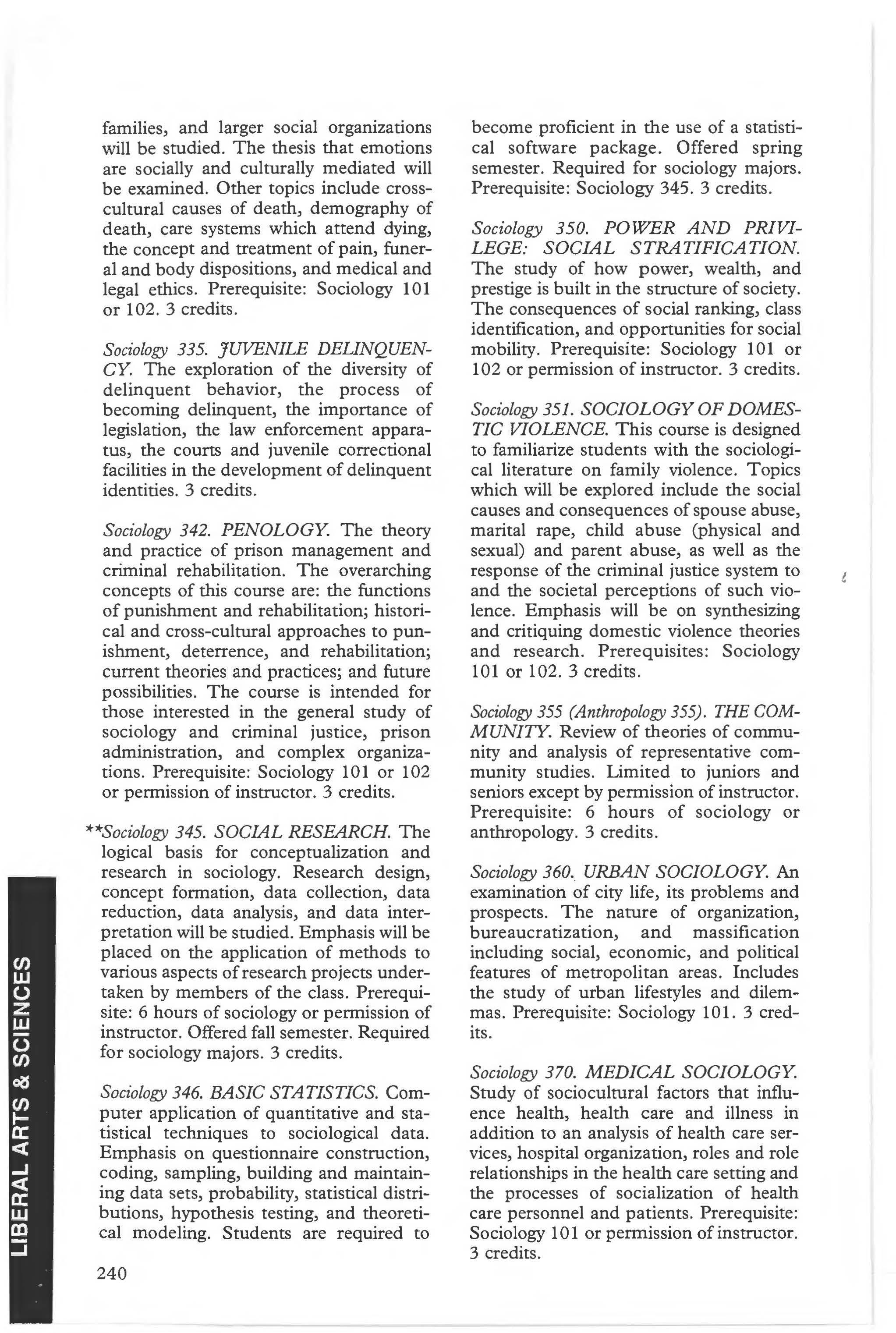
**Sociology 345. SOCIAL RESEARCH. The logical basis for conceptualization and research in sociology. Research design, concept formation, data collection, data reduction, data analysis, and data interpretation will be studied. Emphasis will be placed on the application of methods to various aspects of research projects undertaken by members of the class. Prerequisite: 6 hours of sociology or permission of instructor. Offered fall semester. Required for sociology majors. 3 credits.
Sociology 346. BASIC STATISTICS. Computer application of quantitative and statistical techniques to sociological data. Emphasis on questionnaire construction, coding, sampling, building and maintaining data sets, probability, statistical distributions, hypothesis testing, and theoretical modeling. Students are required to
become proficient in the use of a statistical software package. Offered spring semester. Required for sociology majors. Prerequisite: Sociology 345. 3 credits.
Sociology 350. POWER AND PRIVILEGE: SOCIAL STRATIFICATION. The study of how power, wealth, and prestige is built in the structure of society. The consequences of social ranking, class identification, and opportunities for social mobility. Prerequisite: Sociology 101 or 102 or permission of instructor. 3 credits.
Sociology 351. SOCIOLOGY OF DOMESTIC VIOLENCE. This course is designed to familiarize students with the sociological literature on family violence. Topics which will be explored include the social causes and consequences of spouse abuse, marital rape, child abuse (physical and sexual) and parent abuse, as well as the response of the criminal justice system to and the societal perceptions of such violence. Emphasis will be on synthesizing and critiquing domestic violence theories and research. Prerequisites: Sociology 101 or 102. 3 credits.
Sociology 355 (Anthropology 355). THE COMMUNITY. Review of theories of community and analysis of representative community studies. Limited to juniors and seniors except by permission of instructor. Prerequisite: 6 hours of sociology or anthropology. 3 credits.
Sociology 360. URBAN SOCIOLOGY. An examination of city life, its problems and prospects. The nature of organization, bureaucratization, and massification including social, economic, and political features of metropolitan areas. Includes the study of urban lifestyles and dilemmas. Prerequisite: Sociology 101. 3 credits
Sociology 370. MEDICAL SOCIOLOGY. Study of sociocultural factors that influence health, health care and illness in addition to an analysis of health care services, hospital organization, roles and role relationships in the health care setting and the processes of socialization of health care personnel and patients. Prerequisite: Sociology 101 or permission of instructor. 3 credits.
Sociology 375. CRIMINOLOGY. Analysis of the nature, extent and distribution of crime, emphasizing theories of and research on causation, prevention, treatment, and other public policy efforts. Prerequisite: Sociology 101 or 102 or permission of instructor. 3 credits.
Sociology 376. SOCIOLOGY OF LAW. Relationship between law and social structure; study of processes of law creation, interpretation, enforcement and modification, including police, judicial and jury behavior as well as an analysis of the legal profession itself. 3 credits.
Sociology 381, 382. TOPICAL SEMINARS. Advanced seminars for sociology majors and non-majors interested in sociology. These seminars are designed to permit small groups of qualified students to pursue specialized topics in sociology, as listed below . Prerequisite : 6 hours of sociology, including Sociology 101 or permission of instructor. 3 credits.
Collective Behavior and Social Movements. Study of social behavior that is guided by nontraditional norms and is less structured than more traditional behaviors : crowds, cults, riots, rebellions, social change movements, and revolutions.
Small Groups. Sociological appreciation of units composed of two or more members engaged in meaningful contact such as families, work groups, therapeutic associations, athletic teams, and peer groupings.
Sociology of Mass Communicat ion. Exploration of the structure of media industries (press, radio, television, and advertising), their impact on audiences, mass culture, and specific public issues such as violence and politics.
Sociology of Sport and Leisure. Analysis of sport and leisure as changing social institutions emphasizing sex and ethnic status, collegiate sport, professionalization, law and shifting social values.
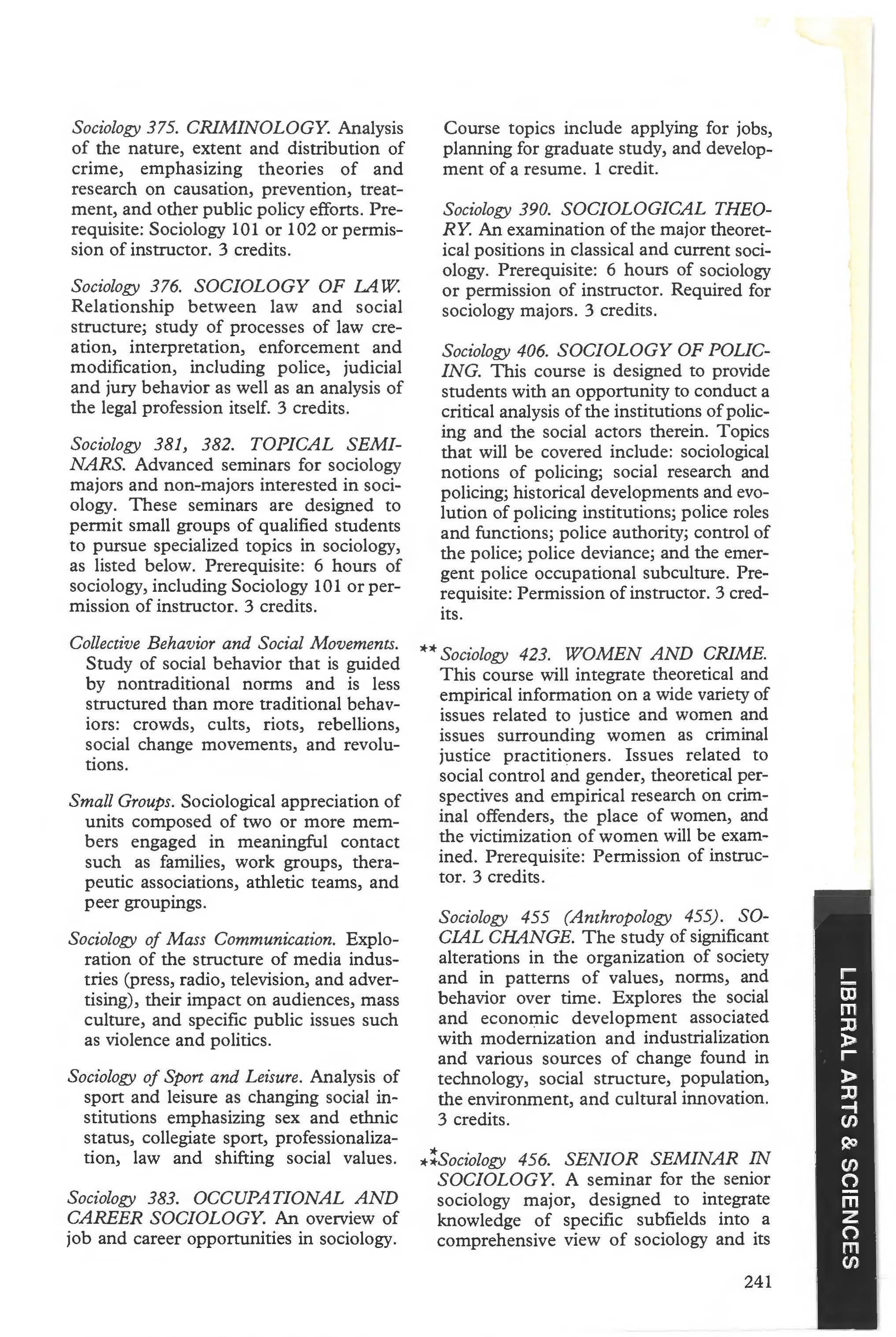
Sociology 383. OCCUPATIONAL AND CAREER SOCIOLOGY. An overview of job and career opportunities in sociology.
Course topics include applying for jobs, planning for graduate study, and development of a resume . 1 credit .
Sociology 390. SOCIOLOGICAL THEORY. An examination of the major theoretical positions in classical and current sociology. Prerequisite : 6 hours of sociology or permission of instructor . Required for sociology majors. 3 credits.
Sociology 406 SOCIOLOGY OF POLICING. This course is designed to provide students with an opportunity to conduct a critical analysis of the institutions of policing and the social actors therein. Topics that will be covered include: sociological notions of policing; social research and policing; historical developments and evolution of policing institutions; police roles and functions; police authority; control of the police; police deviance; and the emergent police occupational subculture. Prerequisite: Permission of instructor. 3 credits.
** Sociology 423. WOMEN AND CRIME. This course will integrate theoretical and empirical information on a wide variety of issues related to justice and women and issues surrounding women as criminal justice practitioners. Issues related to social control and gender, theoretical perspectives and empirical research on criminal offenders, the place of women, and the victimization of women will be examined Prerequisite: Permission of instructor. 3 credits.
Sociology 455 (Anthropology 455) SOCIAL CHANGE. The study of significant alterations in the organization of society and in patterns of values, norms, and behavior over time. Explores the social and economic development associated with modernization and industrialization and various sources of change found in technology , social structure, population, the environment, and cultural innovation. 3 credits .
*!Sociology 456. SENIOR SEMINAR IN SOCIOLOGY. A seminar for the senior sociology major, designed to integrate knowledge of specific subfields into a comprehensive view of sociology and its
role in relation to other sciences. Open only to senior sociology majors. 3 credits.
Sociology 492. INTERNSHIP IN SOCIO LOGY. Direct student learning in applied settings that permits a practiced supervised experience. Students learn through performance in meaningful tasks in a variety of social environments. Prerequisite: 18 hours of sociology . Students' cumulative GPA must be 2 . 50 or above to be eligible for internship Must be arranged at least one semester in advance with chair of department. May be repeated in subsequent semesters Variable credit; no more than 15 total credits may be earned. 3-15 credits.
Sociology 494. PROFESSIONAL STUDY IN CRIMINAL JUSTICE. This course provides students with the opportunity to apply rigorous theoretical and methodological considerations and analysis to the practical training and experience gained in acquiring professional accreditation within the criminal justice profession. Accumulated GPA 2.50 or above and permission of the department chair, arranged at least one semester in advance. Prerequisites: 18 hours of sociology courses. Sociology seniors only. 3-15 credits.
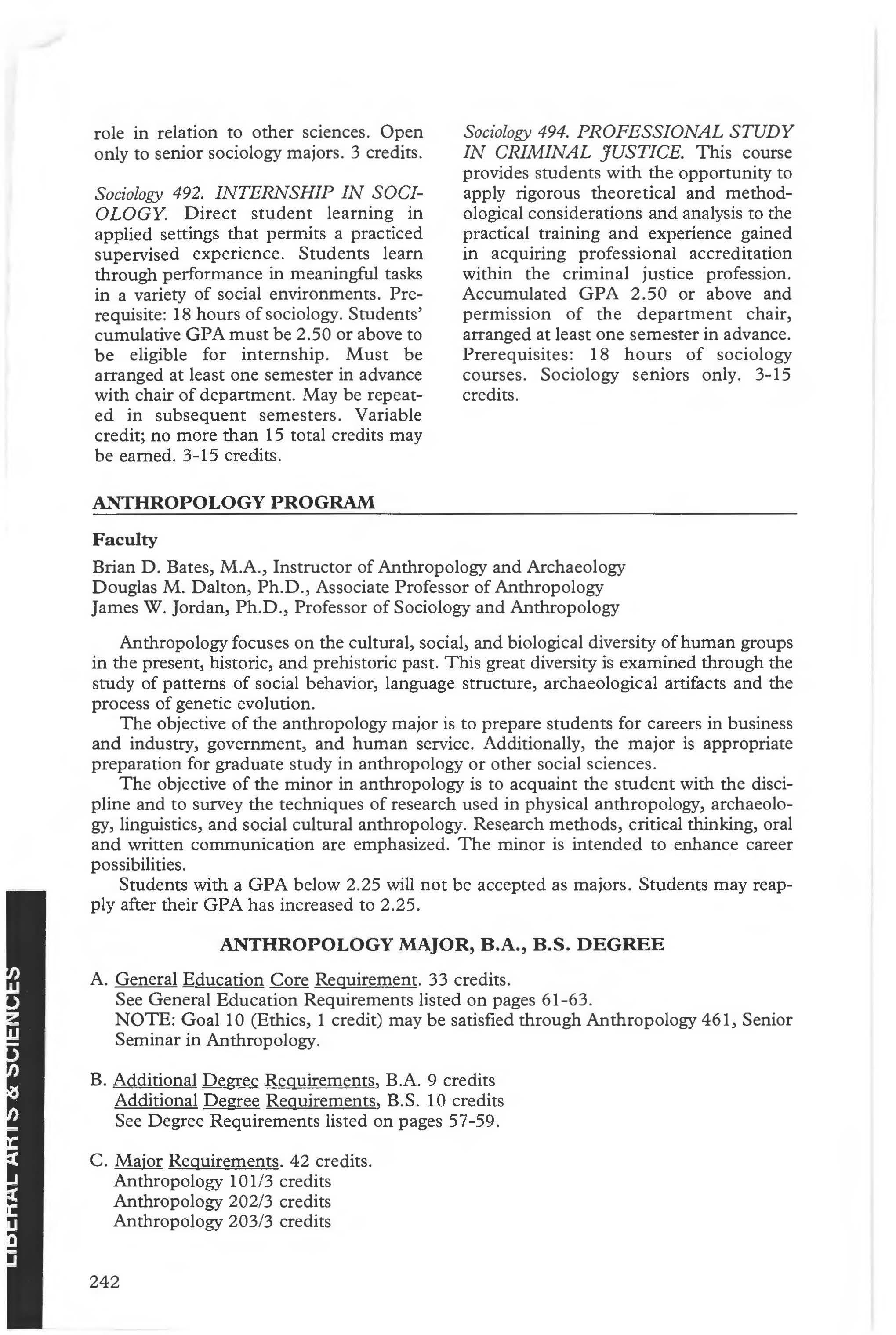
Brian D Bates, M A., Instructor of Anthropology and Archaeology
Douglas M. Dalton, Ph.D., Associate Professor of Anthropology James W. Jordan, Ph.D., Professor of Sociology and Anthropology
Anthropology focuses on the cultural, social, and biological diversity of human groups in the present, historic, and prehistoric past. This great diversity is examined through the study of patterns of social behavior, language structure, archaeological artifacts and the process of genetic evolution .
The objective of the anthropology major is to prepare students for careers in business and industry, government, and human service. Additionally, the major is appropriate preparation for graduate study in anthropology or other social sciences.
The objective of the minor in anthropology is to acquaint the student with the discipline and to survey the techniques of research used in physical anthropology, archaeology, linguistics, and social cultural anthropology. Research methods, critical thinking, oral and written communication are emphasized. The minor is intended to enhance career possibilities.
Students with a GPA below 2.25 will not be accepted as majors. Students may reapply after their GPA has increased to 2.25.
A. General Education Core Requirement. 33 credits.
See General Education Requirements listed on pages 61-63.
NOTE: Goal 10 (Ethics, 1 credit) may be satisfied through Anthropology 461, Senior Seminar in Anthropology.
B. Additional Degree Requirements, B.A. 9 credits
Additional Degree Requirements, B.S. 10 credits
See Degree Requirements listed on pages 57-59.
C. Major Requirements. 42 credits.
Anthropology 101/3 credits
Anthropology 202/3 credits
Anthropology 203/3 credits
Anthropology 204/3 credits
Anthropology 310 or 311 or 312 or 313/6 credits
Anthropology 320 or 321 or 325 or 355/6 credits
Anthropology 410/3 credits
Anthropology 460/3 credits
Anthropology 461/3 credits
Anthropology electives/9 credits TOTAIJ42 credits
D. No grade below "C" ili accepted for graduation in major course work.
E. General Electives B.A. Degree: 36 credits
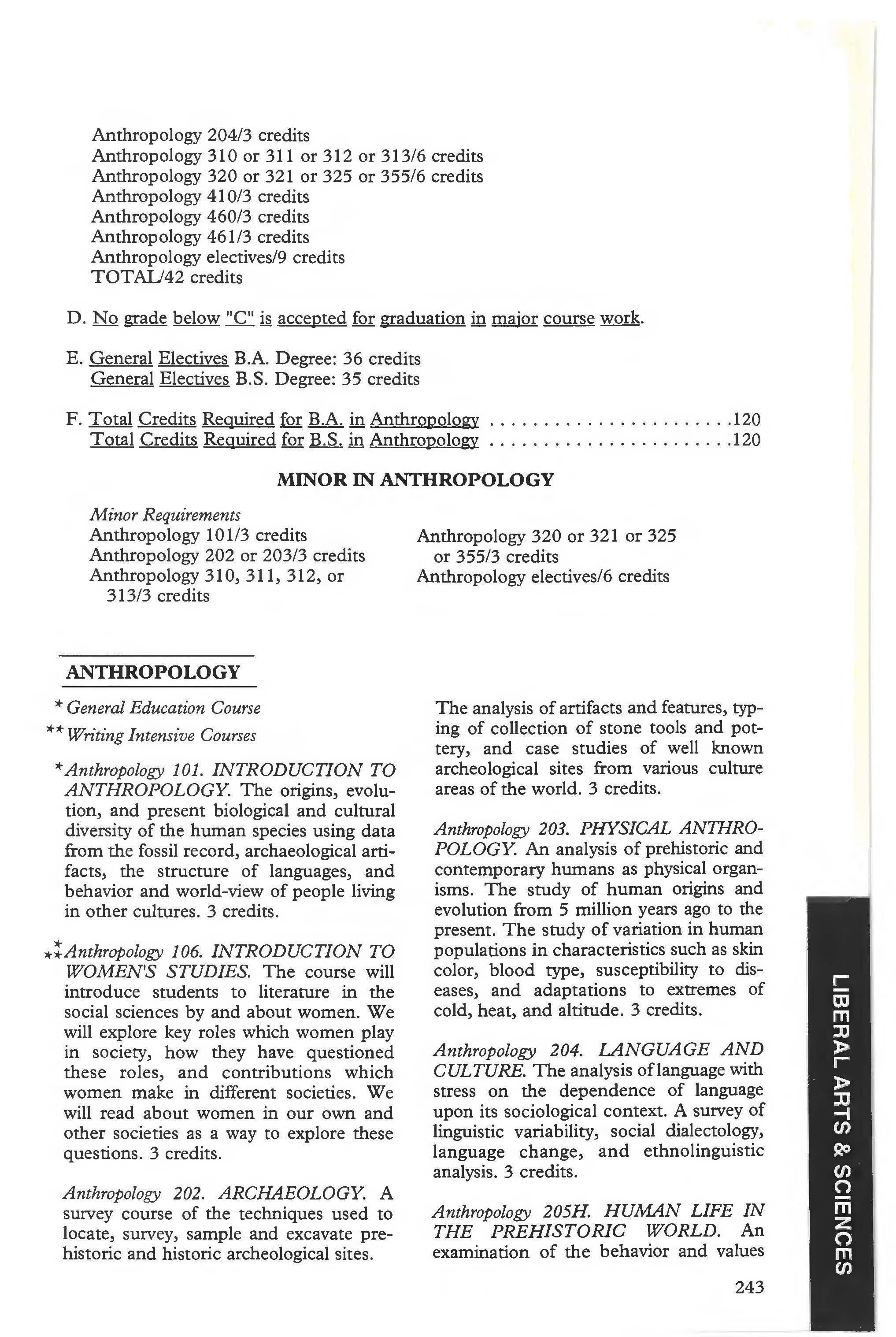
General Electives B.S. Degree: 35 credits
F. Total Credits Reguired for B.A. in Anthropology 120
Total Credits Reguired for B.S. in Anthropology ....................... 120
Minor Requirements
Anthropology 101/3 credits
Anthropology 202 or 203/3 credits
Anthropology 310,311, 312, or 313/3 credits
* General Education Course
** Writing Intensive Courses
*Anthropology 101. INTRODUCTION TO ANTHROPOLOGY. The origins, evolution, and present biological and cultural diversity of the human species using data from the fossil record, archaeological artifacts, the structure of languages, and behavior and world-view of people living in other cultures. 3 credits.
Anthropology 320 or 321 or 325 or 355/3 credits
Anthropology electives/6 credits
The analysis of artifacts and features, typing of collection of stone tools and pottery, and case studies of well known archeological sites from various culture areas of the world. 3 credits.
*
**Anthropology 106. INTRODUCTION TO WOMEN'S STUDIES. The course will introduce students to literature in the social sciences by and about women. We will explore key roles which women play in society, how they have questioned these roles, and contributions which women make in different societies. We will read about women in our own and other societies as a way to explore these questions. 3 credits.
Anthropology 202. ARCHAEOLOGY. A survey course of the techniques used to locate, survey, sample and excavate prehistoric and historic archeological sites.
Anthropology 203. PHYSICAL ANTHROPOLOGY. An analysis of prehistoric and contemporary humans as physical organisms. The study of human origins and evolution from 5 million years ago to the present. The study of variation in human populations in characteristics such as skin color, blood type, susceptibility to diseases, and adaptations to extremes of cold, heat, and altitude. 3 credits.
Anthropology 204. LANGUAGE AND CULTURE. The analysis oflanguage with stress on the dependence of language upon its sociological context. A survey of linguistic variability, social dialectology, language change, and ethnolinguistic analysis. 3 credits.
Anthropology 205H. HUMAN LIFE IN THE PREHISTORIC WORLD. An examination of the behavior and values
likely to have been central to human groups in prehistoric times. The seminar approach will be employed with continual student dialog based on readings. Collections of stone tools and pottery sherds will be analyzed in class. 3 credits.
Anthropology 295/495. SPECIAL TOPICS. Recommended when the student desires to pursue a specialized topic in depth. Must have permission of department chair and instructor directing the course. Cumulative GPA must be 2.50 or higher to be eligible. 3 credits.
Anthropology 296. FIELD METHODS IN ARCHAEOLOGY. The skills necessary to excavate historic and prehistoric sites and to ~ecognize and recover archaeological artifacts. The site work consists of learning the techniques of excavation . ' mapl?mg, soil analysis, the recovery, washmg and analysis of prehistoric stone tools and historic artifacts, and the interpretation of stratigraphy. Offered during summer session. 6 credits.
**A nthropology 310. PEOPLES OF AFRICA. a~alysis of the human cultures of preh1stonc and contemporary Africa. Archaeological and linguistic data will be used to trace the biological and cultural relationships among contemporary African societies. 3 credits.
**Anthropology 311. INDIANS OF NORTH AMERICA. Descriptions, comparisons and analysis of past and present India~ cultures. Possible origins of the various North American Indian tribes will also be discussed and will be supported by the use of archaeological and linguistic data. 3 credits.
Anthropology 312. SOUTH AMERICAN !ND JANS. A survey course of archaeological and ethnographic focusing on huntergatherer and horticulturalist Indian groups. The effects of social-cultural change in contemporary Indian life will be a major component of the course. 3 credits.
**Anthropology 313. PEOPLES OF THE PAC/FI(! . . Historical and contemporary descnpt1ons of the varieties of peoples and
cultures in Polynesia, Micronesia, and Melanesia. 3 credits.
Anthropology 320. FOLKLORE. The oral techniques used in literate and non-literate cultures to pass traditions from generation to generation. The forms and functions of folktales, proverbs, curses, folksongs, riddles, ceremonies, folk art and ' games m Western and non-Western culture. 3 credits.
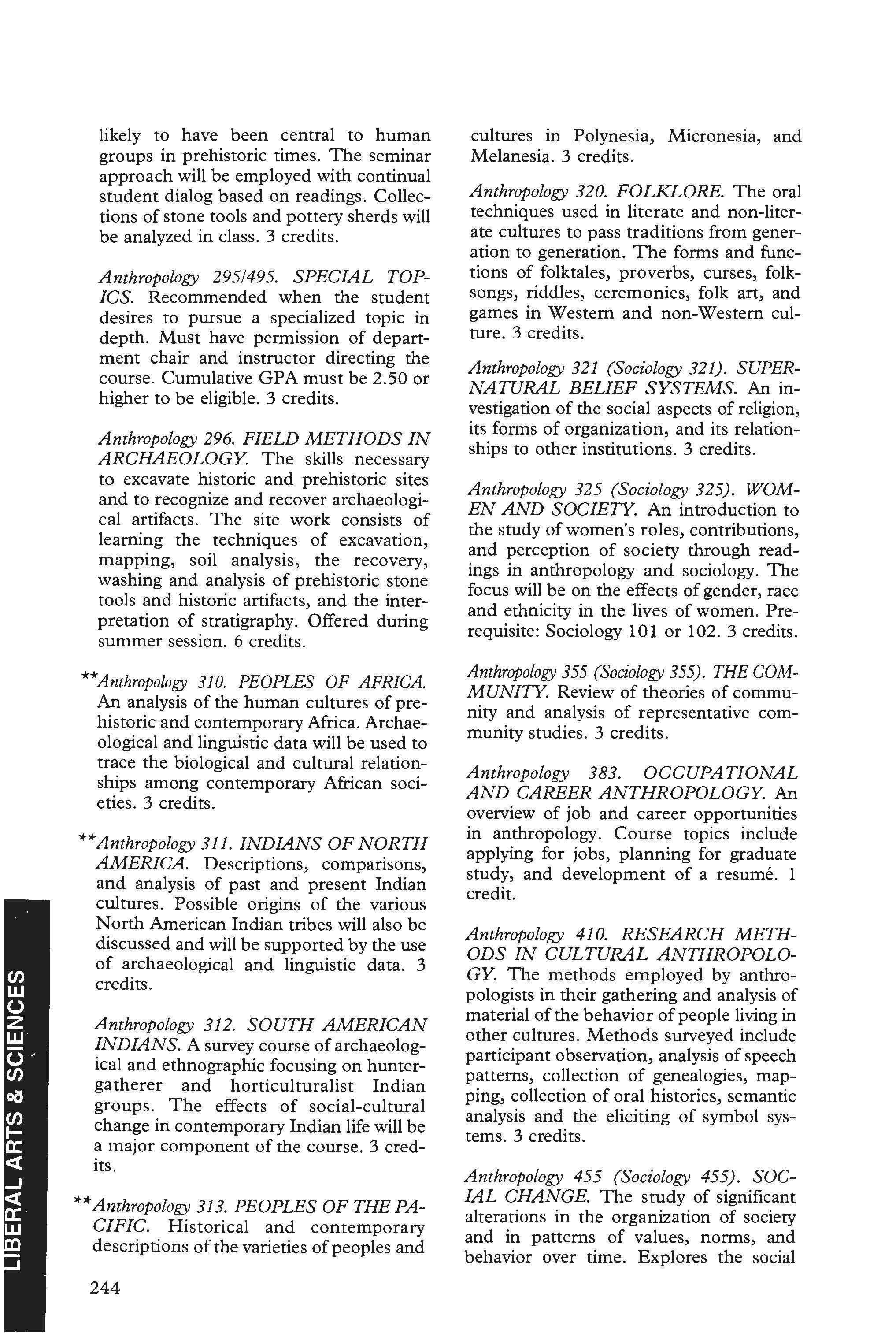
Anthropology 321 (Sociology 321). SUPERNATURAL BELIEF SYSTEMS. An in~estigation of the social aspects of religion, Its forms of organization, and its relationships to other institutions. 3 credits.
Anthropology 325 (Sociology 325). WOMEN AND SOCIETY. An introduction to the study of women's roles, contributions, and perception of society through readings in anthropology and sociology. The focus will be on the effects of gender, race and ethnicity in the lives of women. Prerequisite: Sociology 101 or 102. 3 credits.
Anthropology 355 (Sociology 355). THE COMMUNITY. Review of theories of community and analysis of representative community studies. 3 credits.
Anthropology 383. OCCUPATIONAL AND CAREER ANTHROPOLOGY. An ?verview of job and career opportunities m anthropology. Course topics include applying for jobs, planning for graduate study, and development of a resume. 1 credit.
Anthropology 410. RESEARCH METHODS IN CULTURAL ANTHROPOLOGY. The methods employed by anthropolog~sts in their gathering and analysis of matenal of the behavior of people living in other cultures. Methods surveyed include participant observation, analysis of speech patterns, collection of genealogies, mapping, collection of oral histories, semantic analysis and the eliciting of symbol systems. 3 credits.
Anthropology 455 (Sociology 455). SOCIAL CHANGE. The study of significant alterations in the organization of society and in patterns of values, norms, and behavior over time. Explores the social
and economic development associated with modernization and industrialization and various sources of change found in technology, social structure, population, the environment, and cultural innovation. 3 credits.
**Anthropology 460. ANTHROPOLOGICAL THEORY. The history of theory and models in anthropology. An overview of the intellectual "schools" which have affected research in the past and a survey of present models in anthropological thinking. 3 credits.
must be 2.50 or above to be eligible for internship. Must be arranged in advance with program director or department chair. No more than 15 total credits may be earned. Variable credit: 3-15 hours per semester.
*
*;Anthropology 461. SENIOR SEMINAR IN ANTHROPOLOGY. A seminar for senior anthropology majors, designed to integrate knowledge of specific subfields into a comprehensive view of anthropology and its role in relation to other sciences. Open only to senior anthropology majors. 3 credits.
Anthropology 492. INTERNSHIP IN ANTHROPOLOGY. Directed student learning in applied settings, that permits a practiced, supervised experience. Students learn through performance in meaningful tasks in a variety of social environments. May be repeated. Prerequisite: 18 hours of anthropology. Student's cumulative GPA
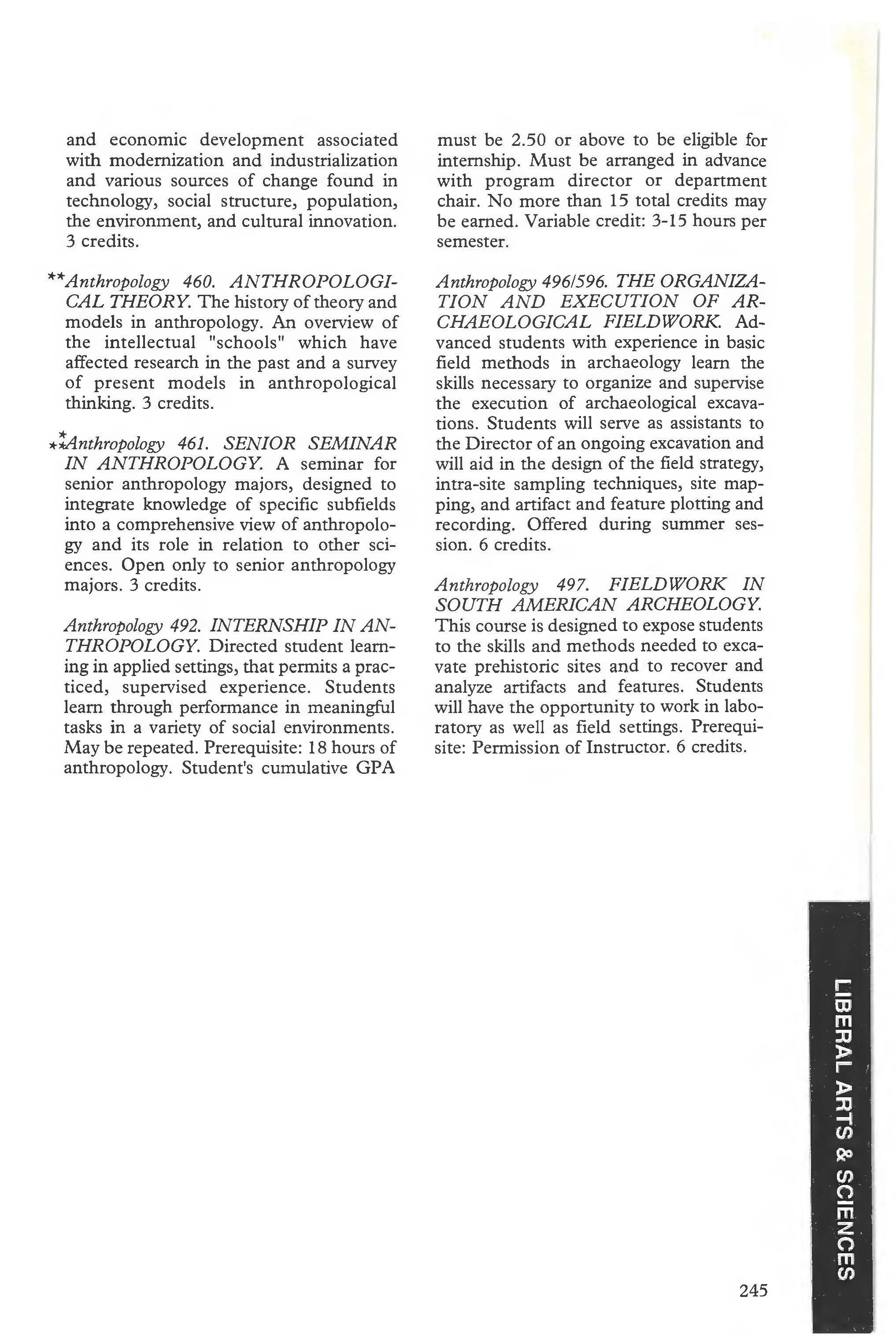
Anthropology 496/596. THE ORGANIZATION AND EXECUTION OF ARCHAEOLOGICAL FIELDWORK. Advanced students with experience in basic field methods in archaeology learn the skills necessary to organize and supervise the execution of archaeological excavations. Students will serve as assistants to the Director of an ongoing excavation and will aid in the design of the field strategy, intra-site sampling techniques, site mapping, and artifact and feature plotting and recording. Offered during summer session. 6 credits.
Anthropology 497. FIELDWORK IN SOUTH AMERICAN ARCHEOLOGY. This course is designed to expose students to the skills and methods needed to excavate prehistoric sites and to recover and analyze artifacts and features. Students will have the opportunity to work in laboratory as well as field settings. Prerequisite: Permission of Instructor. 6 credits.
The Department of Speech and Theatre offers a B.F.A. in Visual and Performing Arts with a concentration in Theatre.
*Pamela Arkin, M.F.A., Associate Professor Theatre
A. Moffatt Evans, Jr., M.F.A., Associate Professor Theatre
* On leave Fall Semester 1997
The Theatre program offers the student an opportunity to explore all facets of theatrical work as well as to pursue one of several areas of specialization: performance, technical theatre, musical theatre, theatre arts management, and drama therapy. The objective of the program is to produce trained and competent performers, managers, and theatrical technicians and to develop an appreciation for the literary, performance and historical traditions that are unique to the theatre. The drama therapy specialization prepares the student for further training in a graduate program. An audition is required for theatre majors in performance and musical theatre specialization.
Students are trained in regular course and studio work and by participating in a full schedule of major productions each year . In addition, selected students receive a full semester's training under professionals as interns, for which they receive academic credit.
For non-majors, courses in theatre offer the student insights into the human character as reflected in dramatic literature and productions, and create an awareness of the relationship of theatre to the individual's life, society, and the human condition. Nonmajors may participate and receive academic credit for work in the major theatrical productions of the Longwood Theatre program.
To graduate as a Theatre major, students are required to be assessed annually by professional performers and technicians. Each student prepares a portfolio of theatrical activities and projects for the year. Performance majors prepare contrasting monologues for assessment. Technical majors prepare projects in scene design, lighting, properties, scene technology, or costume. All majors have individual conferences and written evaluations by assessors. All assessment activities are videotaped. Strengths and weaknesses are evaluated and curriculum changes made accordingly.
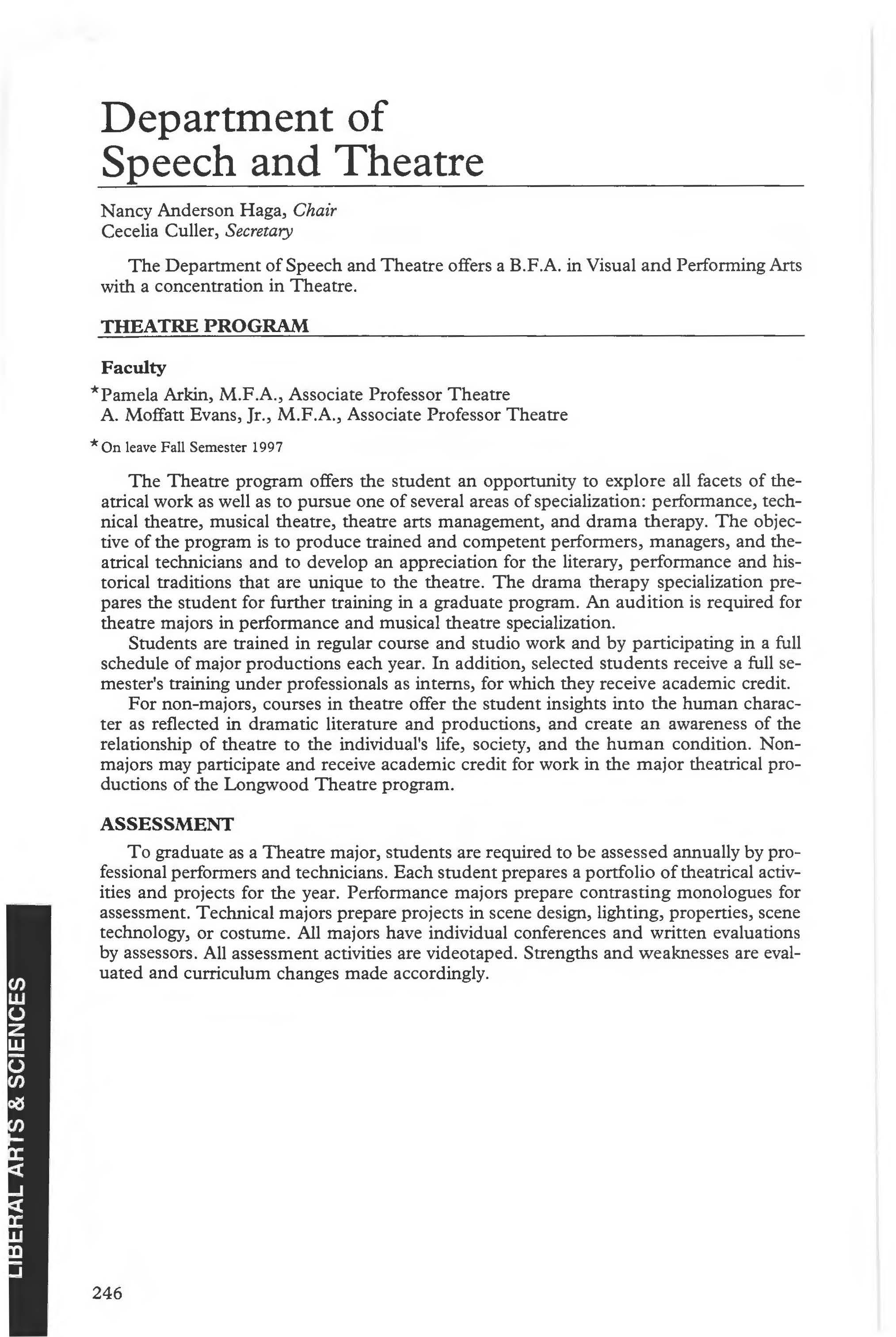
Theatre
Courses listed are not always offered every year.
A. General Education Core Reguirement. 33 credits. See General Education Requirements listed on pages 61-63. Note:Students may take Theatre 101 to meet Goal 2. Students must take Theatre 485 and Philosophy 306 to meet Goal 10.
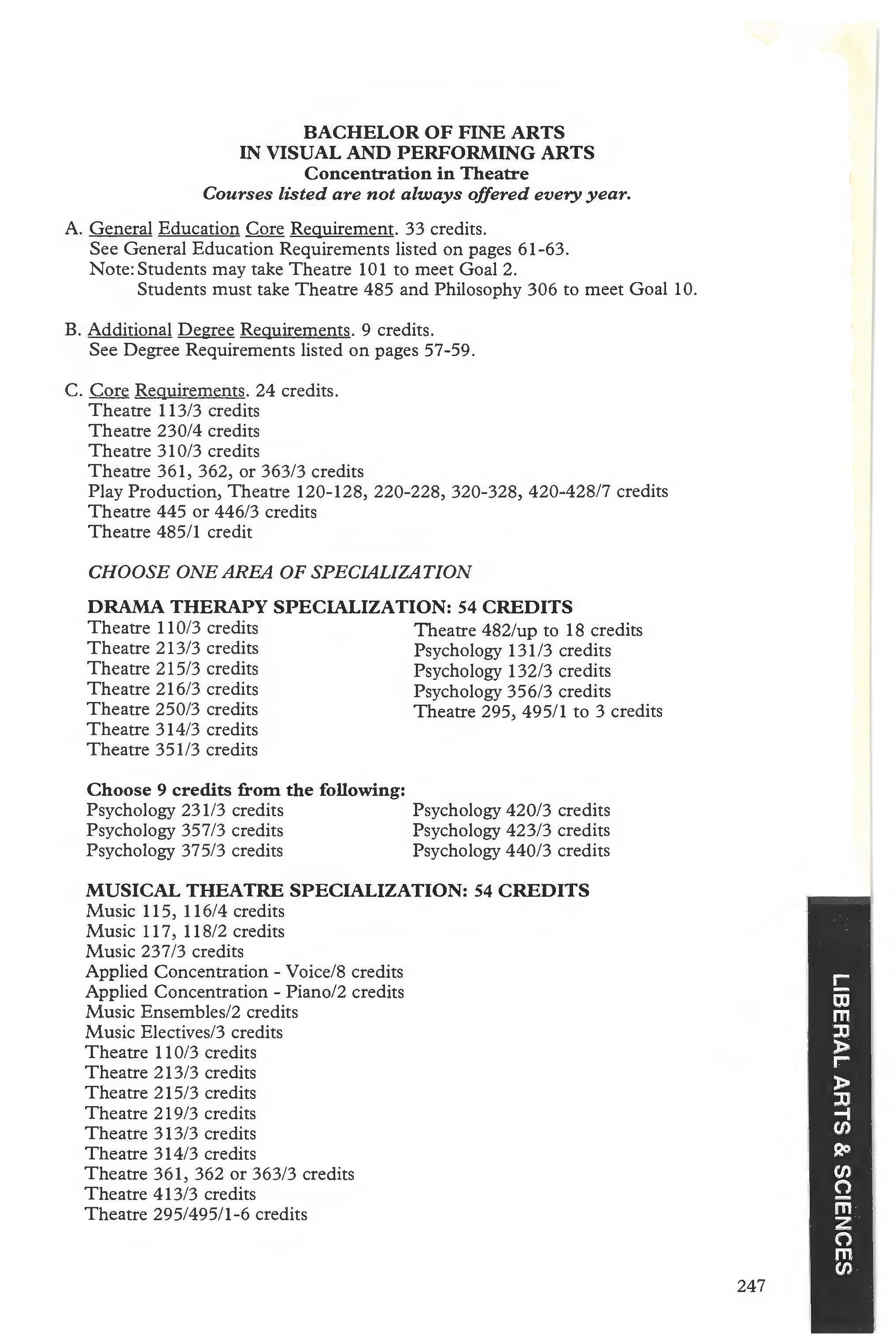
B. Additional Degree Reguirements. 9 credits. See Degree Requirements listed on pages 57-59.
C. Core Reguirements. 24 credits.
Theatre 113/3 credits
Theatre 230/4 credits
Theatre 310/3 credits
Theatre 361, 362, or 363/3 credits
Play Production, Theatre 120-128, 220-228, 320-328, 420-428/7 credits Theatre 445 or 446/3 credits Theatre 485/1 credit
CHOOSE ONE AREA OF SPEC/ALIZA TION
DRAMA THERAPY SPECIALIZATION: 54 CREDITS
Theatre 110/3 credits
Theatre 213/3 credits Theatre 215/3 credits Theatre 216/3 credits Theatre 250/3 credits Theatre 314/3 credits Theatre 351/3 credits
Choose 9 credits from the following:
Theatre 482/up to 18 credits Psychology 131 /3 credits Psychology 132/3 credits Psychology 356/3 credits Theatre 295, 495/1 to 3 credits
Psychology 231/3 credits Psychology 420/3 credits Psychology 357/3 credits Psychology 423/3 credits Psychology 375/3 credits Psychology 440/3 credits
Music 115, 116/4 credits
Music 11 7, 118/2 credits
Music 237/3 credits
Applied Concentration Voice/8 credits
Applied Concentration Piano/2 credits
Music Ensembles/2 credits
Music Electives/3 credits
Theatre 110/3 credits
Theatre 213/3 credits
Theatre 215/3 credits
Theatre 219/3 credits
Theatre 313/3 credits
Theatre 314/3 credits
Theatre 361, 362 or 363/3 credits
Theatre 413/3 credits
Theatre 295/495/1-6 credits
PERFORMANCE SPECIALIZATION: 54 CREDITS
Theatre 110/3 credits
Theatre 213/3 credits
Theatre 314/3 credits
Theatre 361, or 363/3 credits
Theatre 413/3 credits Theatre 216/3 credits Theatre 445 or 446/3 credits Theatre 219/3 credits Theatre 482/up to 18 credits Theatre 311/3 credits Theatre 295, 495/1-9 credits Theatre 313/3 credits Theatre Electives/12 credits
Theatre 215/3 credits
Theatre 231/4 credits Theatre 232/3 credits Theatre 271/3 credits Theatre 438/3 credits
Choose five of the following: Theatre 234, 275, 332, 333, 334, 335, 336/15 credits Theatre 330, 331, 430, or 431/3-6 credits
Theatre 445 or 446/3 credits
Theatre 482/up to 18 credits (opt.) Theatre 295, 495/1-9 credits Electives/ 12-14 credits
THEATRE ARTS MANAGEMENT SPECIALIZATION: 54 CREDITS
Theatre 231/4 credits Theatre 271/3 credits
Choose two of the following:
Theatre 234, 275, 332, 333, 334, 335, 336/6 credits
Theatre 361, or 362, or 363/3 credits
Theatre 482/up to 18 credits (opt.)
Theatre 445 or 446/3 credits
Theatre 295, 495/1-4 credits
Electives/3 credits Dance 267/4 credits
Art 160/4 credits or Art 263/3 credits
Music 123 or Music 237/3 credits
English 210/3 credits MIS 170/3 credits
Accounting 240/3 credits
Management 360/3 credits
Marketing 380/3 credits
Marketing 480/3 credits
Business Electives/3 credits
D. Elementary Teaching Endorsement (for teaching all subjects) Grades N, K-8. 40 credits. See professional education requirements listed on page 97.
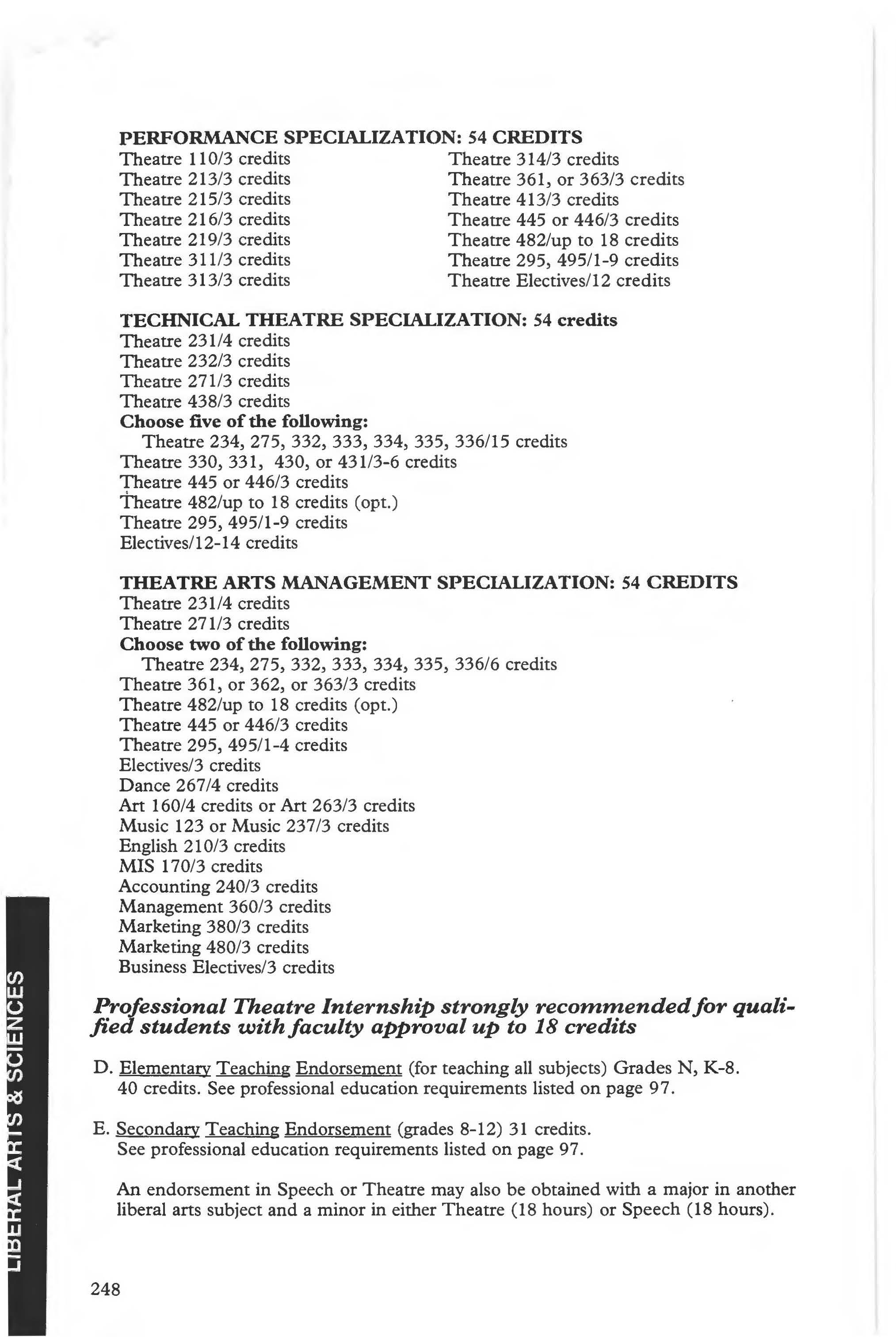
E. Secondary Teaching Endorsement (grades 8-12) 31 credits. See professional education requirements listed on page 97.
An endorsement in Speech or Theatre may also be obtained with a major in another liberal arts subject and a minor in either Theatre (18 hours) or Speech (18 hours).
Professional Theatre Internship strongly recommended/or qualified students with faculty approval up to 18 creditsF. Total Credits Required fur .a B.F.A. in Visual and Performing Arts with .!! Concentration in Theatre 120
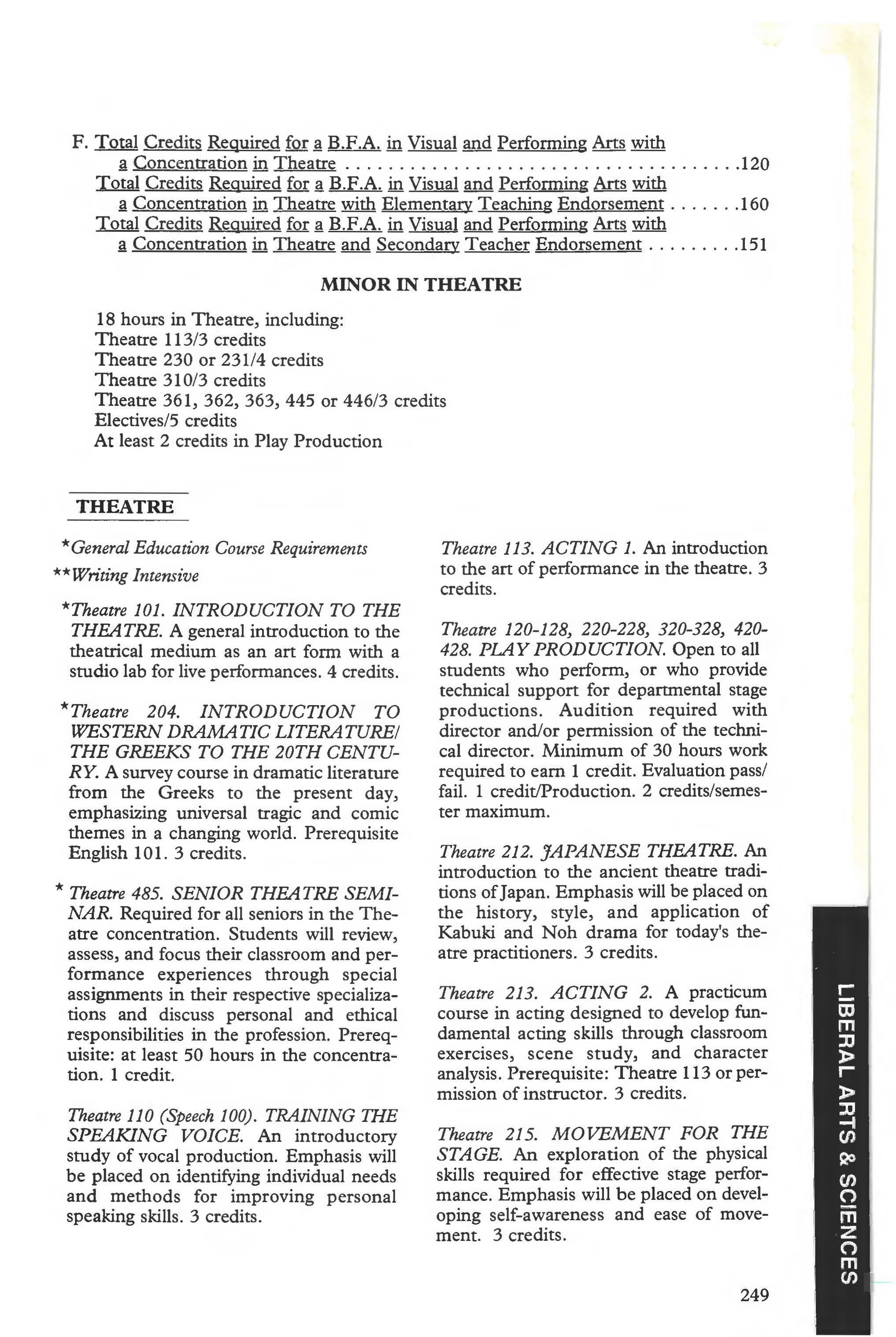
Tu!fil Credits Required fur a B.F.A. in Visual and Performing Am with .!! Concentration in Theatre with Elementary Teaching Endorsement 160
Total Credits Required fur a B.F.A. in Visual and Performing Arts with .!! Concentration in Theatre and Secondary Teacher Endorsement 151
18 hours in Theatre, including:
Theatre 113/3 credits
Theatre 230 or 231/4 credits
Theatre 310/ 3 credits
Theatre 361, 362, 363, 445 or 446 /3 credits
Electives/5 credits
At least 2 credits in Play Production
* General Education Course Requirements
**Writing Intensive
*Theatre 101 INTRODUCTION TO THE THEATRE. A general introduction to the theatrical medium as an art form with a studio lab for live performances. 4 credits.
*Theatre 204. INTRODUCTION TO WESTERN DRAMA TIC LITERATURE/ THE GREEKS TO THE 20TH CENTURY. A survey course in dramatic literature from the Greeks to the present day, emphasizing universal tragic and comic themes in a changing world. Prerequisite English 101. 3 credits .
* Theatre 485. SENIOR THEATRE SEMINAR. Required for all seniors in the Theatre concentration. Students will review, assess, and focus their classroom and performance experiences through special assignments in their respective specializations and discuss personal and ethical responsibilities in the profession. Prerequisite: at least 50 hours in the concentration. 1 credit.
Theatre 110 (Speech 100) TRAINING THE SPEAKING VOICE. An introductory study of vocal production. Emphasis will be placed on identifying individual needs and methods for improving personal speaking skills. 3 credits.
Theatre 113. ACTING 1. An introduction to the art of performance in the theatre. 3 credits
Theatre 120-128, 220-228, 320-328, 420428. PLAY PRODUCTION. Open to all students who perform, or who provide technical support for departmental stage productions. Audition required with director and/or permission of the technical director. Minimum of 30 hours work required to earn 1 credit. Evaluation pass/ fail. 1 credit/Production 2 credits/semester maximum .
Theatre 212. JAPANESE THEATRE. An introduction to the ancient theatre traditions ofJapan. Emphasis will be placed on the history, style, and application of Kabuki and Noh drama for today's theatre practitioners. 3 credits.
Theatre 213. ACTING 2. A practicum course in acting designed to develop fundamental acting skills through classroom exercises, scene study, and character analysis. Prerequisite: Theatre 113 or permission of instructor. 3 credits.
Theatre 215. MOVEMENT FOR THE STAGE. An exploration of the physical skills required for effective stage performance. Emphasis will be placed on developing self-awareness and ease of movement. 3 credits.
Theatre 216. CHILDREN'S THEATRE. Practical exploration of resources, techniques, and application of theatre for young audiences. Emphasis will be placed on participation in theatre activities appropriate for the classroom, recreational and performance settings. 3 credits.
Theatre 219. DANCE FOR THEATRE. An exploration of the history, stars and movement elements of the musical stage. Emphasis will be placed on choreography and dance styles for musical theatre. 3 credits.
Theatre 230, 231. STAGECRAFT I and II. Lecture-studio dealing with basic physical and technical skills necessary to mount a play production. First semester: scenery construction, running and rigging. Second semester: scenery construction, fundamentals of stage lighting. Work on departmental productions required. 2 periods and lab; 4 credits.
Theatre 232. DRAFTING FOR THEATRICAL DESIGN Lecture-studio dealing with the fundamentals of theatrical drafting and mechanical drawing for theatre students who will be taking scene design, scene painting, and/or lighting design (THEA-333, 334, and/or 335). 3 credits.
Theatre 234. THEATRE PROPERTIES. A course designed for actors and technicians to introduce them to the skills necessary for the gathering, construction, repair, maintenance and proper use of stage properties. 3 credits.
Theatre 250. INTRODUCTION TO DRAMA THERAPY. An introduction to the basic principles and concepts governing the therapeutic use of drama and theatre in a variety of settings for special populations 3 credits.
** Theatre 261. CONTEMPORARY DRAMA. European and American plays of recent years which have made the greatest theatrical, literary and/or social impact. 3 credits.
Theatre 271. COMPUTER TECHNOLOGY FOR THE THEATRE. Basic draft-
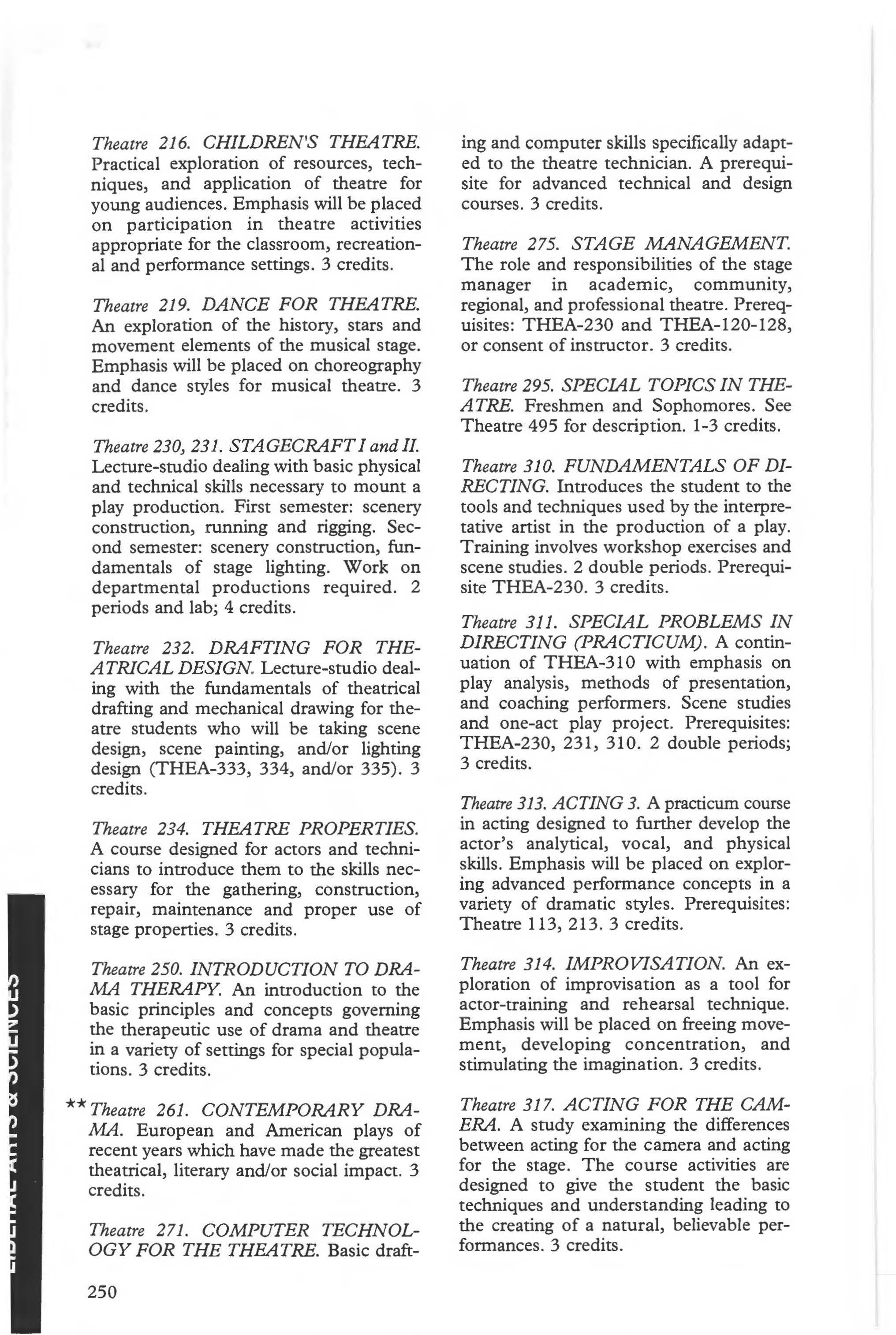
ing and computer skills specifically adapted to the theatre technician. A prerequisite for advanced technical and design courses. 3 credits.
Theatre 275. STAGE MANAGEMENT. The role and responsibilities of the stage manager in academic, community, regional, and professional theatre. Prerequisites: THEA-230 and THEA-120-128, or consent of insrructor. 3 credits .
Theatre 295. SPECIAL TOPICS IN THEATRE. Freshmen and Sophomores. See Theatre 495 for description. 1-3 credits.
Theatre 310. FUNDAMENTALS OF DIRECTING. Introduces the student to the tools and techniques used by the interpretative artist in the production of a play. Training involves workshop exercises and scene studies. 2 double periods. Prerequisite THEA-230. 3 credits.
Theatre 311. SPECIAL PROBLEMS IN DIRECTING (PRACTICUM). A continuation of THEA-310 with emphasis on play analysis, methods of presentation, and coaching performers. Scene studies and one-act play project. Prerequisites: THEA-230, 231, 310. 2 double periods; 3 credits.
Theatre 313. ACTING 3. A practicum course in acting designed to further develop the actor's analytical, vocal, and physical skills. Emphasis will be placed on exploring advanced performance concepts in a variety of dramatic styles. Prerequisites: Theatre 113, 213. 3 credits.
Theatre 314. IMPROVISATION. An exploration of improvisation as a tool for actor-training and rehearsal technique. Emphasis will be placed on freeing movement, developing concentration, and stimulating the imagination. 3 credits.
Theatre 317. ACTING FOR THE CAMERA. A study examining the differences between acting for the camera and acting for the stage. The course activities are designed to give the student the basic techniques and understanding leading to the creating of a natural, believable performances. 3 credits.
Theatre 330, 331, 430, 431. ADVANCED PRACTICUM IN TECHNICAL THEATRE. Practical application of skills accrued from classes and production work; the student will assume responsibility as a member of the production staff on one or more productions. Prerequisites: THEA-230, 231 and at least two of the following : THEA-332, 333, 334, 335. 3 credits for 330, 331; 3-6 credits for 430, 431.
Theatre 332. COSTUME DESIGN AND CONSTRUCTION. Lecture-studio analyzing scripts for costume design and construction in conjunction with basic makeup for the stage Work on departmental productions required. Prerequisites: THEA-230, 231, or consent of instructor. 2 double periods; 3 credits .
Th eatre 333 SCENE DESIGN. Lecturestudio analyzing scripts for scenic needs and creating scenic designs . Prerequisites: THEA-230, 231, 232, or consent of instructor . 2 double periods; 3 credits.
Theatr e 334. THEORY AND PRACTICE OF SCENE PAINTING. Lecture-studio dealing with fundamentals of stage painting and its practical application. Work on departmental productions required. Prerequisites: THEA-230, 231, or consent of instructor. 2 double periods; 3 credits .
Theatr e 335. LIGHTING DESIGN. Lecture-studio dealing with fundamentals of lighting design: methods, script interpretation, and practical design for the stage. Work on departmental productions required. Prerequisites: THEA-230, 231, 232, or consent of instructor. 2 double periods; 3 credits

Theatr e 336 MAKE-UP FOR THE THEATRE . This is a course designed to give the basics of theatre make-up to the drama student. It is a hands on class, and the student will actively be participating during class time in executing basic makeup techniques to develop their skills. 3 credits.
Th eatre 351 . APPLIED THEATRE TECHNIQUES IN DRAMA THERAPY. An exploration of specific theatrical tech-
niques and methods that may be applied to therapeutic situations. 3 credits.
**Theatre 361. SURVEY OF WESTERN DRAMA TIC LITERATURE TO THE SEVENTEENTH CENTURY. Play analysis, dramatic style, and stage settings from the Greek Classical Period to the advent of French Neoclassic Drama. 3 credits.
** Theatre 362. SURVEY OF WESTERN DRAMA TIC LITERATURE FROM THE SEVENTEENTH CENTURY TO THE TWENTIETH CENTURY. Play analysis, dramatic style, and stage settings from the French Neoclassic Period through Ibsen and the advent of Realism. 3 credits.
** Theatre 363. WESTERN DRAMA TIC LITERATURE IN THE TWENTIETH CENTURY. Explores traditional and avant-garde plays of the modern period with an emphasis on analysis and fluctuating styles of presentation. 3 credits.
**Theatre 364. A STUDY OF INDIVIDUAL PLAYWRIGHTS. Concentrates on one or a group of playwrights who have made a significant contribution to theatrical literature. 3 credits.
**Theatre 410 PLAYWRITING. A workshop for students interested in writing for the theatre The main emphasis is toward the development of creative work with the possible goal of studio production. Note: This course is not offered every year, but may be taken as an independent study with permission of instructor. 3 credits.
Theatre 413. ACTING 4. An advanced practicum for actors designed to address individual needs and interests. Emphasis will be placed on preparing for professional auditions. Prerequisites : THEA 113, 213, and 313. 3 credits.
Theatre 438. TECHNICAL DIRECTION. The responsibilities of the Technical Director in the roll as interpretative artist, management, engineer, safety official, technologist and designer. Problem-solving skills will be developed in a studio/ seminar setting. Prerequisites: THEA 230, 231. 3 credits.
**Theatre 445, 446. HISTORY OF THE THEATRE I & II. Surveys western theatre from its beginnings to the present. First half: origin of theatre to the 17th century; Second half: the 17th century to the present day. 3 credits.
**"Theatre 465. SHAKESPEARE. A practical study of selected works by William Shakespeare. Emphasis will be placed on interpreting the text and gathering research in order to make informed artistic decisions concerning contemporary theatrical presentation. This is a writing intensive course designed for theatre majors. 3 credits.
Theatre 480, 481. DIRECTED STUDY IN THEATRE. A directed reading and/or research program administered by quali-
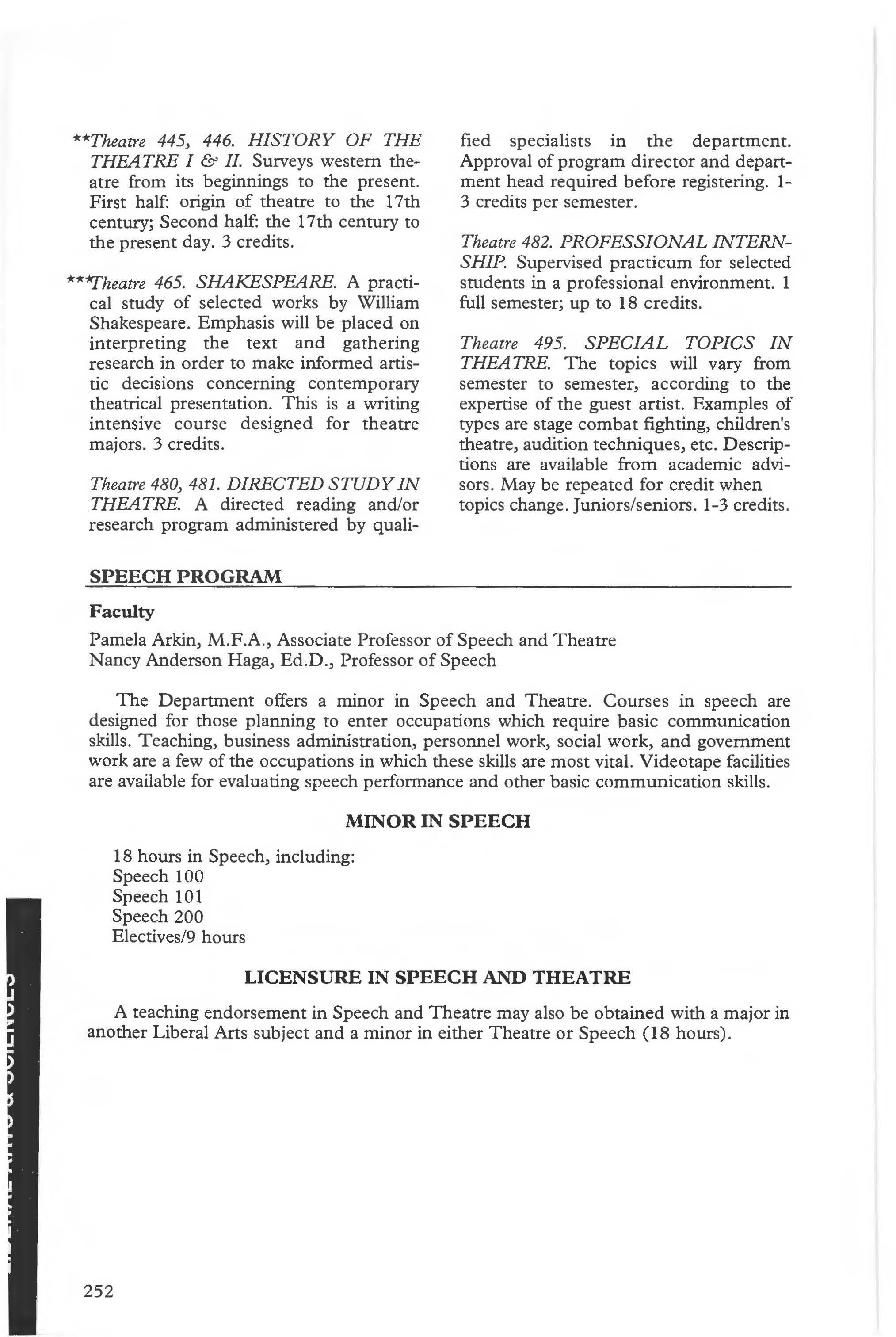
fied specialists in the department. Approval of program director and department head required before registering. 13 credits per semester.
Theatre 482. PROFESSIONAL INTERNSHIP. Supervised practicum for selected students in a professional environment. 1 full semester; up to 18 credits.
Theatre 495. SPECIAL TOPICS IN THEATRE. The topics will vary from semester to semester, according to the expertise of the guest artist. Examples of types are stage combat fighting, children's theatre, audition techniques, etc. Descriptions are available from academic advisors. May be repeated for credit when topics change. Juniors/seniors. 1-3 credits.
Pamela Arkin, M .F.A ., Associate Professor of Speech and Theatre Nancy Anderson Haga, Ed.D., Professor of Speech
The Department offers a minor in Speech and Theatre. Courses in speech are designed for those planning to enter occupations which require basic communication skills . Teaching, business administration, personnel work, social work, and government work are a few of the occupations in which these skills are most vital. Videotape facilities are available for evaluating speech performance and other basic communication skills.
18 hours in Speech, including: Speech 100 Speech 101 Speech 200 Electives/9 hours
A teaching endorsement in Speech and Theatre may also be obtained with a major in another Liberal Arts subject and a minor in either Theatre or Speech (18 hours).
Speech JOO (Theatre I JO). TRAINING THE SPEAKING VOICE. Study of the vocal mechanism and voice production. Improvement of personal speaking skills through reading exercises. Provides additional speaking skills for students with a strong interest in broadcasting and theatre. 3 credits.
Speech 101. FUNDAMENTALS OF PUBLIC SPEECH. An introductory study of effective and responsible speaking. Provisions will be made for practical application. 3 credits.
Speech 113, 114, 213, 214, 313, 314, 413, 414. COMPETITIVE FORENSICS. Principles and procedures for developing skills for forensic events (prose interpretation, poetry interpretation, dramatic !nterpretation, oral interpretation, duo mterpretation, speech to persuade, speech to inform, after dinner speaking, communication analysis, and rhetoric analysis). Includes individual practice, individual performance, and competition. 1-3 credits. A student may be involved in extensive forensic activities for which a maximum of nine credit hours can be earned.
Speech 200. INTERPERSONAL COMMUN/CA TIO NS. A course designed to introduce the student to the field of communications, its history, scope, theory, and types, including verbal and non-verbal communication. 3 credits.
Speech 210. ORAL INTERPRETATI(?N. Development of the skill of oral readmg; techniques of presentation as adapted to varying forms of literature for practice and performance. 3 credits.
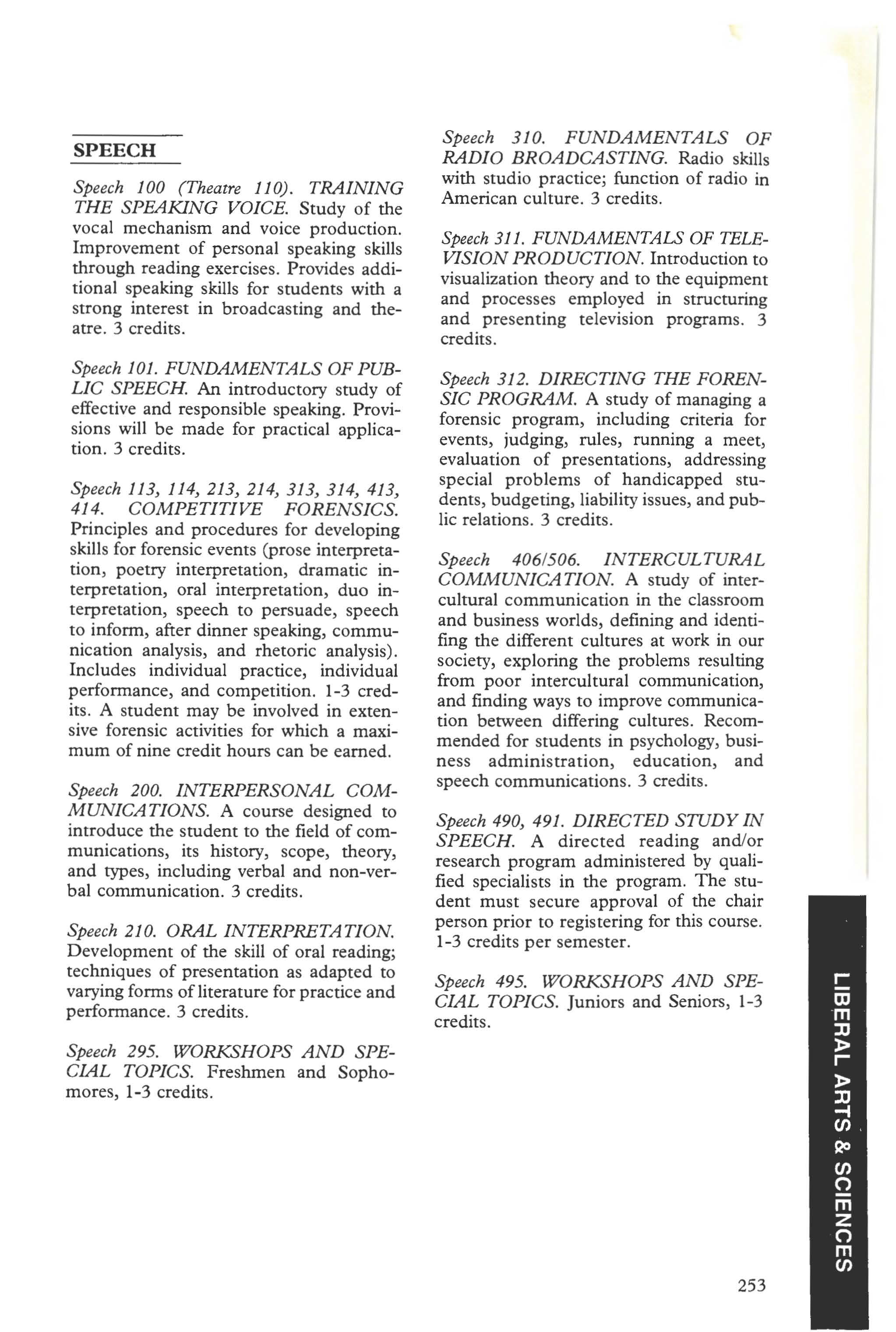
Speech 295. WORKSHOPS AND SPECIAL TOPICS. Freshmen and Sophomores, 1-3 credits.
Speech 310. FUNDAMENTALS OF RADIO BROADCASTING. Radio skills with studio practice; function of radio in American culture. 3 credits.
Speech 311. FUNDAMENTALS OF TELEVISION PRODUCTION. Introduction to visualization theory and to the equipment and processes employed in structuring and presenting television programs . 3 credits.
Speech 312. DIRECTING THE FORENSIC PROGRAM. A study of managing a forensic program, including criteria for events, judging, rules, running a m~et, evaluation of presentations, addressmg special problems of handicapped students, budgeting, liability issues, and public relations. 3 credits.
Speech 406/506. INTERCULTURAL COMMUN/CATION. A study of intercultural communication in the classroom and business worlds, defining and identifing the different cultures at work in ~ur society, exploring the problems r~sul~mg from poor intercultural commumcan_on, and finding ways to improve commumcation between differing cultures. Recommended for students in psychology, business administration, education, and speech communications. 3 credits.
Speech 490, 491. DIRECTED ?TUDY IN SPEECH. A directed readmg and/or research program administered by qualified specialists in the program. The student must secure approval of the chair person prior to registering for this course. 1-3 credits per semester.
Speech 495. WORKSHOPS AN_D SPECIAL TOPICS. Juniors and Semors, 1-3 credits.

*
WILLIAM P. ABRAMS, Assistant Professor of Mathematics ( 1990) B.A., M.S ., Ph.D., University of Virginia
C. MITCHELL ADRIAN, Assistant Professor of Management (1996) B.S., McNeese State University; M.B.A., Midwestern State University; D.B.A., Mississippi State University
EDWARD 0. ADUSEI, Associate Professor of Economics (1992) B.A., University of Ghana; M.S ., Ph.D., Virginia Polytechnic Institute and State University
EDNA V. ALLEN-BLEDSOE, Associate Professor of Social Work (1980) B.S., Springfield College; M.S W., Columbia University; L.C.S.W ., Commonwealth of Virginia; Ph.D., The Union Graduate School
B. MCRAE AMOSS, JR., Associate Professor of French (1991) AB., Georgia State University; M.A., Ph.D., University of Virginia
SUSAN CAMPBELL ANDERSON, Assistant Professor of English (1996) B.A., University of North Carolina; M.Phil., Oxford University; Ph.D., Emory University
NANCY A. ANDREWS, Professor of Health & Physical Education (1966) B.S., Longwood College; M.S., University of Tennessee; Ed.D., Virginia Polytechnic Institute and State University
JENNIFER M. APPERSON, Associate Professor and Interim Dean, Liberal Arts and Sciences (1985) B.A., Stephens College; M.A., Ph.D., University of Akron
JOHN E. AREHART, Associate Professor of Computer Science and Mathematics ( 1973) B.A., Southwestern at Memphis; M.Ed., Ed .D., University of Virginia
PAMELA ARKIN, Associate Professor of Speech and Theatre ( 1990) B.A., University of Montevallo; M.F.A. University of Alabama
JOHN M. AUSTIN, Associate Professor of Physical Science (1963) B.S , Longwood College; M.Ed., University of Virginia
FRANK W. BACON, Associate Professor of Finance (1990) B.S ., University of Richmond; M.S., Ph.D., Virginia Commonwealth University
**MARKS. BALDRIDGE, Professor of Art (1972) B.S ., State University at Buffalo; M.F.A., Cranbrook Academy of Art
ROBERT L. BANTON, III, Professor of Education (1967) B.A., Randolph-Macon College; M.Ed., Ed.D., University of Virginia
PATRICK G. BARBER, Professor of Chemistry (1978) B.S., Stanford University; Ph.D., Cornell University
BILLY S. BATTS, Associate Professor of Biology and Area Coordinator of Biology (1963) B.S., North Carolina State University; M.S., University of Washington; Ph D., North Carolina State University
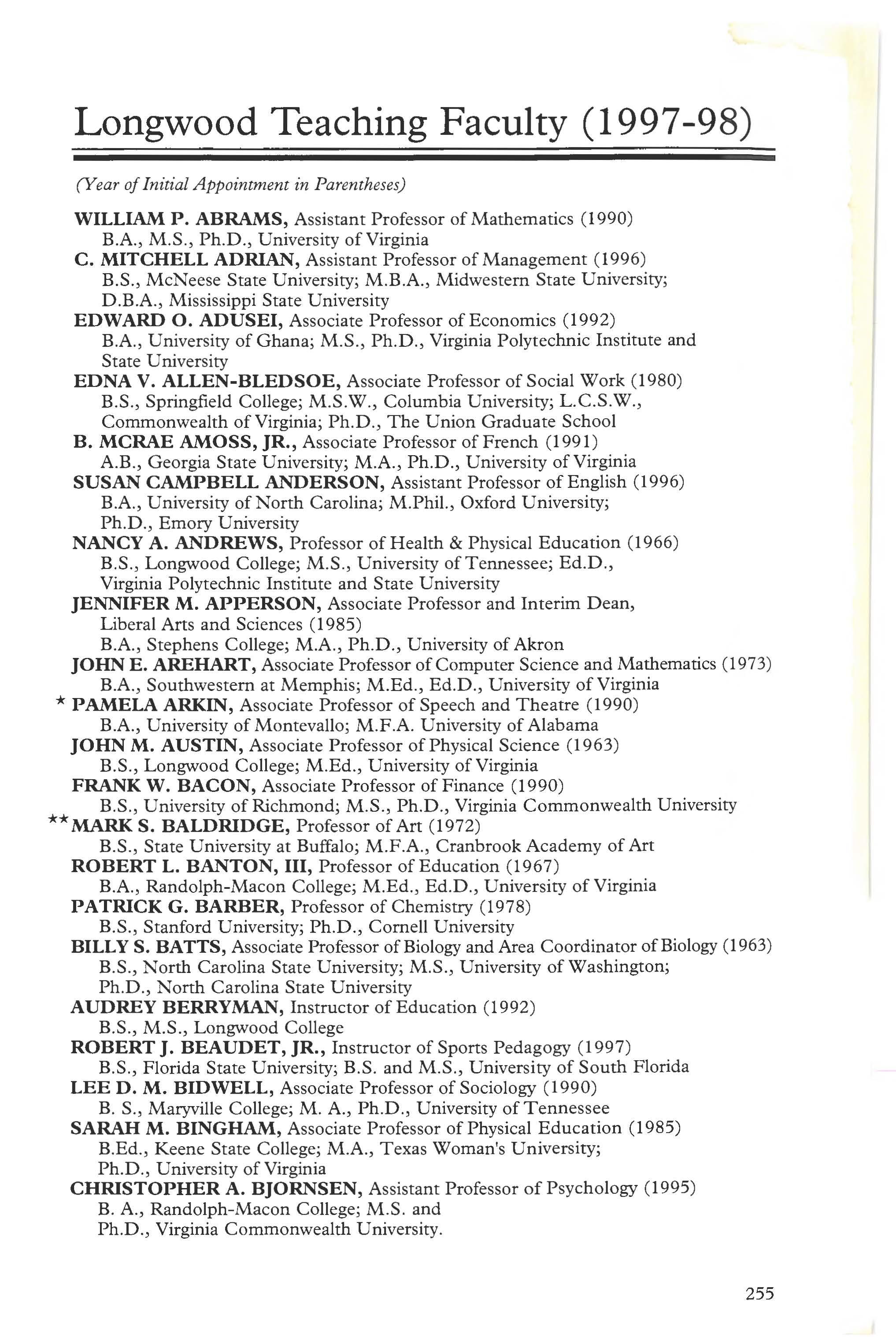
AUDREY BERRYMAN, Instructor of Education (1992) B.S., M.S., Longwood College
ROBERT J. BEAUDET, JR., Instructor of Sports Pedagogy (1997) B.S., Florida State University; B.S. and M.S., University of South Florida LEE D. M. BIDWELL, Associate Professor of Sociology ( 1990) B. S., Maryville College; M.A., Ph.D., University of Tennessee
SARAH M. BINGHAM, Associate Professor of Physical Education (1985) B.Ed., Keene State College; M.A., Texas Woman's University; Ph.D., University of Virginia
CHRISTOPHER A. BJORNSEN, Assistant Professor of Psychology (1995) B. A., Randolph-Macon College; M.S. and Ph.D., Virginia Commonwealth University.
JOSEPH C. BLAUVELT, Associate Professor of Health and Physical Education (1988) B.A., Michigan State University; M.Ed., Springfield College; Ph.D., Michigan State University
CHARLES B. BOLDING, Baseball Coach and Instructor of Physical Education (1978) B.S., Milligan College; M.S., University of Tennessee
SANDRA A. BOLLINGER, Assistant Professor of Mathematics (1968) B.A., Longwood College; M.A., University of South Carolina
CALVIN J. BOYER, Director of Library and Professor of Library Science (1994) B.S., Eastern Illinois University; M.L.S., Ph.D., University of Texas
RAYMOND T. BRASTOW, Associate Professor of Economics (1987) B.A., M.A., Ph.D., University of Washington
SANDRA J. BREIL, Associate Professor of Biology (1969) AB., University of Vermont; Ph.D., University of Massachusetts
WILLIAM P. BROWN, Associate Professor of Accounting (1987) B.A., North Carolina State University; M.B.A., Old Dominion University; Ph.D., University of North Carolina at Chapel Hill; CPA
RUTH L. BUDD, Assistant Professor of Spanish (1996) B A., Madison College; M.S., James Madison University; M.A., Ph.D., The University of North Carolina at Chapel Hill
WILLIAM BURGER, Associate Professor of Sociology (1988) B.A., John Jay College of Criminal Justice; M.A., Ph.D., New School for Social Research
JENA A. BURGES, Assistant Professor of English (1997) B.A., Arizona State University; M.A. and Ph.D., Northern Arizona University
JOHNS. J. BURKE, Associate Professor of Interior Architecture (1988) B.A., University of California, Berkeley; M.Arch., Massachusetts Institute of Technology; M. Arch.U.D., Harvard University; Ed.D., United States International University
DAVID S. CALIBAN, Associate Professor of Political Science (1981) B.A., Earlham College; J.D., Ohio State University College of Law; M.A., Ohio State University; Ph.D., Miami (Ohio) University
DAVID M. CARKENORD, Associate Professor of Psychology (1992) B.A., Clemson University; M.A., Ph.D., Bowling Green State University
WILLIAM G. CARLTON, JR., Athletic Trainer and Instructor of Physical Education (1984) B.A., University of Richmond
RONALD S. CARR, Men's Basketball Coach and Instructor (1990) B.A., Wofford College
*~RAIG C. CHALLENDER, Professor of English (1983) B.A., Bethel College; M.A., Wichita State University; Ph.D., The University of Oklahoma
THERESA A. CLARK, Instructor of Social Work (1989) B.A., Virginia State College; M.S., Longwood College
MARTHA E. COOK, Professor of English (1973) B.A., Maryville College; M.A., Ph.D., Vanderbilt University
CAROLYN I. COOPER, Associate Professor of Guidance and Counseling (1989) B.S., Hampton Institute; M.Ed., C.A.G.S., Ed.D., The College of William and Mary
JAMES R. COPE, Associate Professor of English (1992) B.S.Ed., M.Ed., Ed.D ., University of Georgia
PATRICIA P. CORMIER, President and Professor of Education (1996) AS., University of Bridgeport; B.S., Boston University; M.Ed. and Ed.D., University of Virginia
LORETTA E. COUGHLIN, Assistant Women's Basketball Coach and Instructor of Physical Education (1985) B.S., Eastern Kentucky University; M.S., University of Tennessee
RICHARD T. COUTURE, Associate Professor of History (1966) B.A., College of William and Mary; M.A., University of Virginia
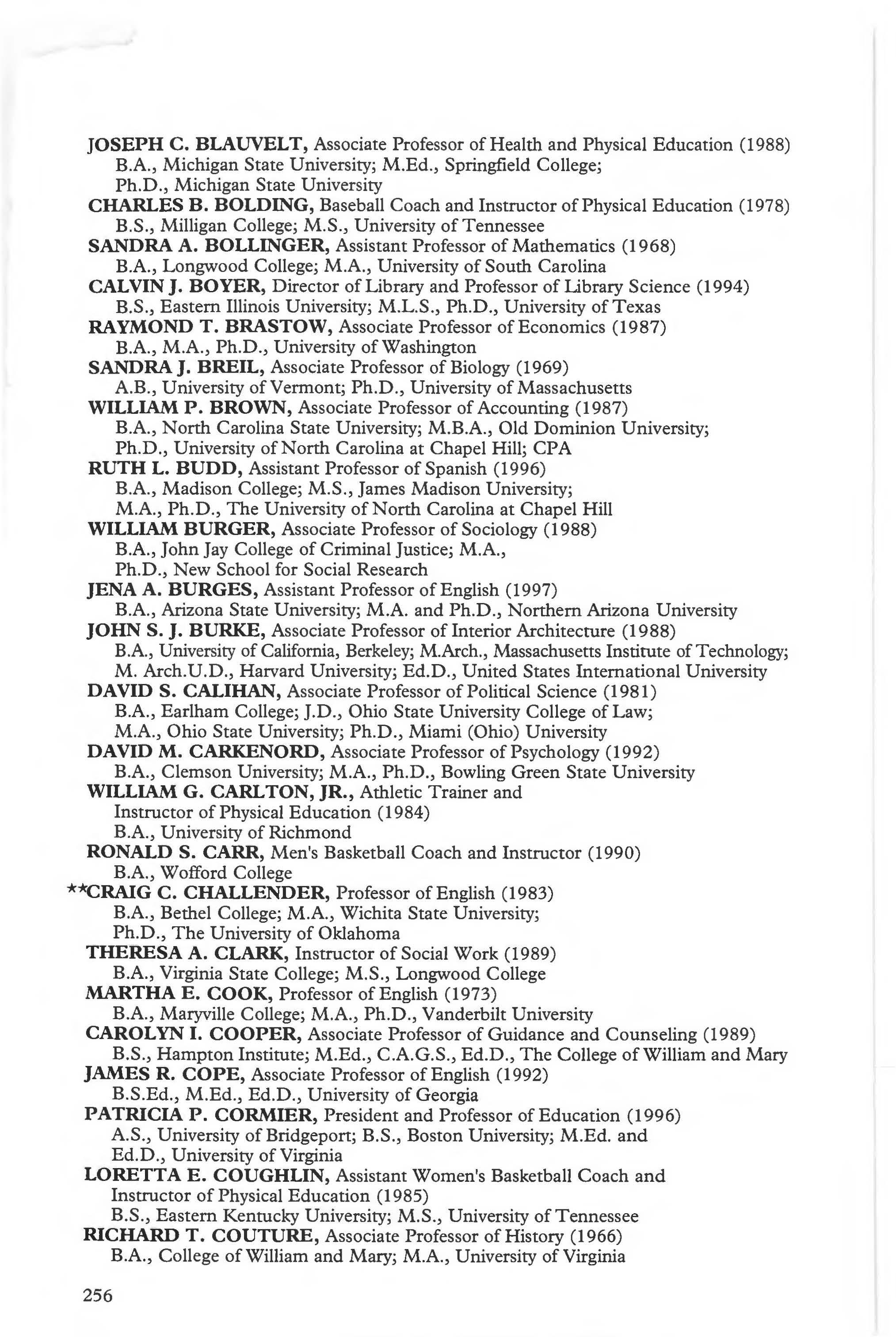
CAROLYN M. CRAFT, Professor of English (1968) B.A., Agnes Scott College; M.A., Ph.D., University of Pennsylvania
LINDA A. CRANSTON, Associate Professor of Library Science and Librarian ( 1992) B.S., Millersville University; M.S.L.S., Drexel University; M.A., University of Rhode Island
JAMES W. CROWL, Associate Professor of History (1967) B.A., Davis and Elkins College; M.A., Ph.D., University of Virginia
JAMES W. CURLEY, Assistant Professor of Physical Science (1966) B.S., Lacrosse State University; M.A.T., University of North Carolina at Chapel Hill THELMA H. DALMAS, Instructor of Biology (1993) B.S., M.S., Longwood
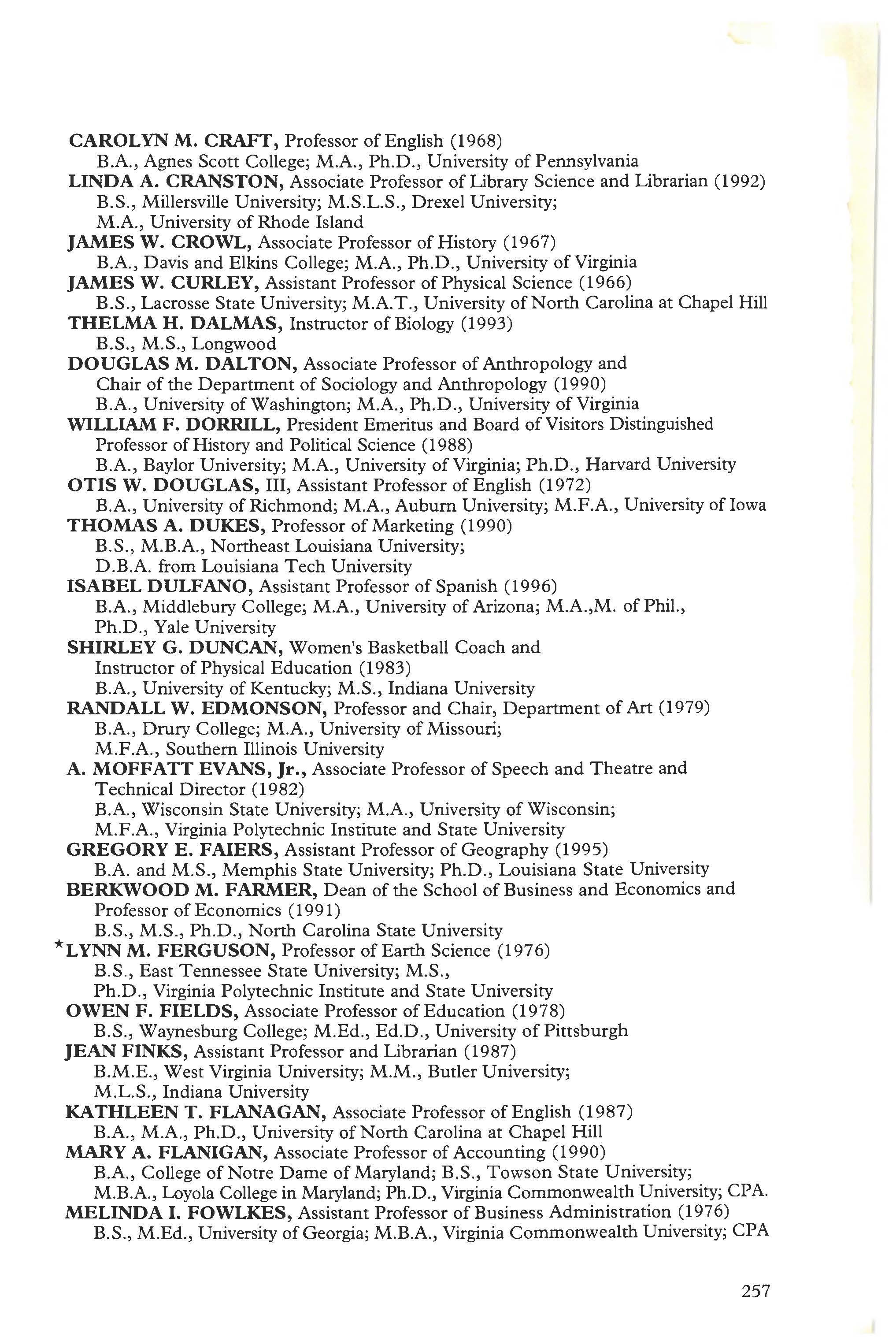
DOUGLAS M. DALTON, Associate Professor of Anthropology and Chair of the Department of Sociology and Anthropology (1990) B.A., University of Washington; M.A., Ph.D., University of Virginia
WILLIAM F. DORRILL, President Emeritus and Board of Visitors Distinguished Professor of History and Political Science (1988) B.A., Baylor University; M.A., University of Virginia; Ph.D., Harvard University OTIS W. DOUGLAS, III, Assistant Professor of English (1972) B.A., University of Richmond; M.A., Auburn University; M.F.A., University of Iowa THOMAS A. DUKES, Professor of Marketing (1990) B.S., M.B.A., Northeast Louisiana University; D.B.A. from Louisiana Tech University
ISABEL DULFANO, Assistant Professor of Spanish (1996) B.A., Middlebury College; M.A., University of Arizona; M.A.,M. of Phil., Ph.D., Yale University
SHIRLEY G. DUNCAN, Women's Basketball Coach and Instructor of Physical Education (1983) B.A., University of Kentucky; M.S., Indiana University
RANDALL W. EDMONSON, Professor and Chair, Department of Art (1979) B.A., Drury College; M.A., University of Missouri; M.F.A., Southern Illinois University
A. MOFFATT EVANS, Jr., Associate Professor of Speech and Theatre and Technical Director (1982) B.A., Wisconsin State University; M.A., University of Wisconsin; M.F.A., Virginia Polytechnic Institute and State University
GREGORY E. FAIERS, Assistant Professor of Geography (1995) B.A. and M.S., Memphis State University; Ph.D., Louisiana State University
BERKWOOD M. FARMER, Dean of the School of Business and Economics and Professor of Economics ( 1991) B.S., M.S., Ph.D., North Carolina State University
*LYNN M. FERGUSON, Professor of Earth Science (1976) B.S., East Tennessee State University; M.S., Ph.D., Virginia Polytechnic Institute and State University
OWEN F. FIELDS, Associate Professor of Education (1978) B.S., Waynesburg College; M.Ed., Ed.D., University of Pittsburgh
JEAN FINKS, Assistant Professor and Librarian (1987) B.M.E., West Virginia University; M.M., Butler University; M.L.S., Indiana University
KATHLEEN T. FLANAGAN, Associate Professor of English (1987) B.A., M.A., Ph.D., University of North Carolina at Chapel Hill
MARY A. FLANIGAN, Associate Professor of Accounting (1990) B.A., College of Notre Dame of Maryland; B.S., Towson State University; M.B.A., Loyola College in Maryland; Ph.D., Virginia Commonwealth University; CPA.
MELINDA I. FOWLKES, Assistant Professor of Business Administration (1976) B.S., M.Ed., University of Georgia; M.B.A., Virginia Commonwealth University; CPA
SALLY W. GILFILLAN, Associate Professor of Accounting (1986) B.S.B.A., Longwood College; M.S., University of Virginia; C.P.A. LILY A. GOETZ, Associate Professor of Spanish (1992) B.A., University of West Florida; M.A., Universidad de Salamanca; Ph.D., Catholic University
JAMES C. GUSSETT, Professor and Chair of the Department of Mathematics and Computer Science (1966) B.S., U.S. Naval Academy; M.Ed., Ed.D., University of Cincinnati
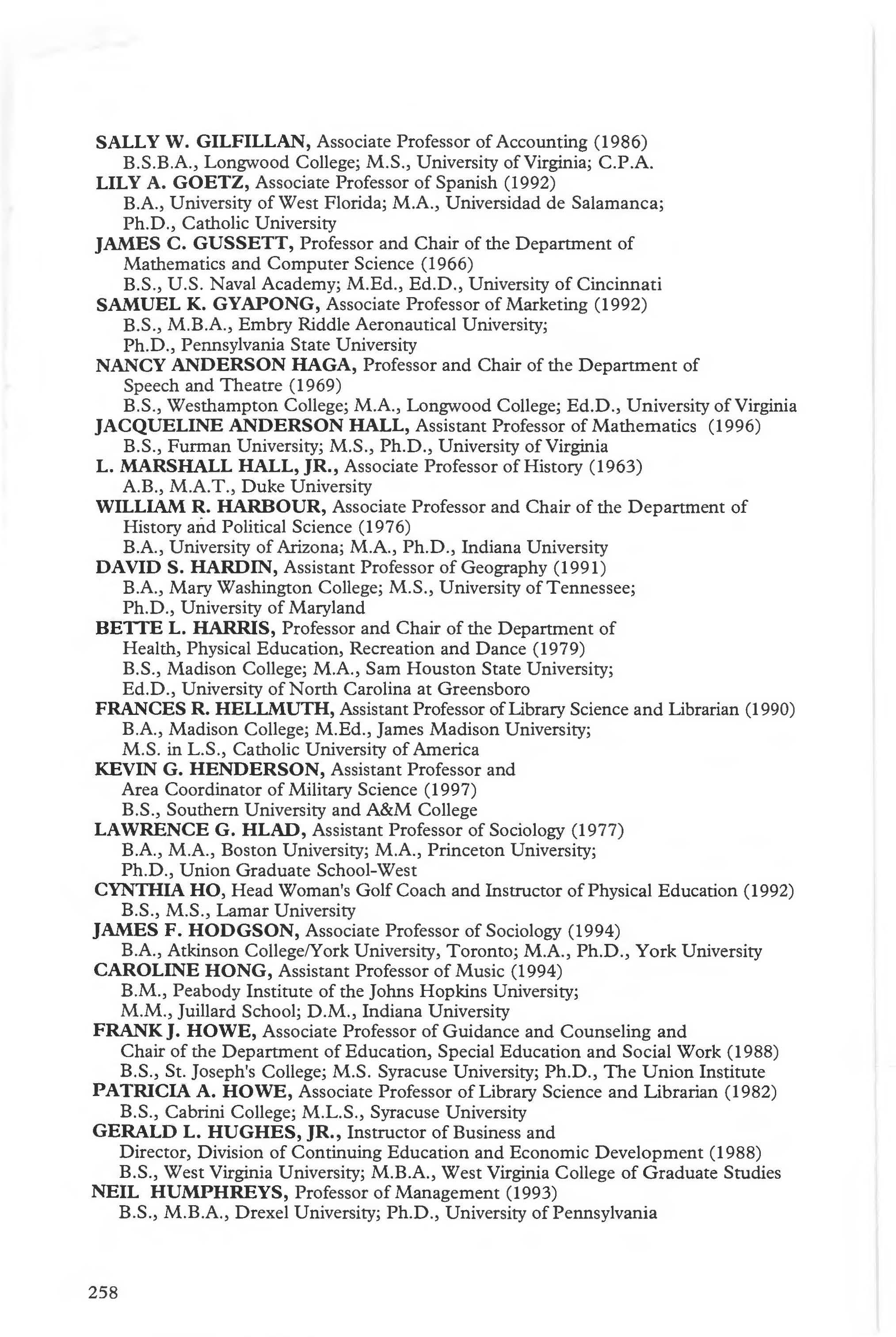
SAMUEL K. GYAPONG, Associate Professor of Marketing (I 992) B.S., M.B.A., Embry Riddle Aeronautical University; Ph.D., Pennsylvania State University
NANCY ANDERSON HAGA, Professor and Chair of the Department of Speech and Theatre (1969) B.S., Westhampton College; M.A., Longwood College; Ed.D., University of Virginia JACQUELINE ANDERSON HALL, Assistant Professor of Mathematics (1996) B.S., Furman University; M.S., Ph.D., University of Virginia
L. MARSHALL HALL, JR., Associate Professor of History (1963) A.B., M.A.T., Duke University
WILLIAM R. HARBOUR, Associate Professor and Chair of the Department of History and Political Science (1976) B.A., University of Arizona; M.A., Ph.D., Indiana University
DAVIDS. HARDIN, Assistant Professor of Geography (1991) B.A., Mary Washington College; M.S., University of Tennessee; Ph.D., University of Maryland
BETTE L. HARRIS, Professor and Chair of the Department of Health, Physical Education, Recreation and Dance (1979) B.S., Madison College; M.A., Sam Houston State University; Ed.D., University of North Carolina at Greensboro
FRANCES R. HELLMUTH, Assistant Professor of Library Science and Librarian (1990) B.A., Madison College; M.Ed., James Madison University; M.S. in L.S., Catholic University of America
KEVIN G. HENDERSON, Assistant Professor and Area Coordinator of Military Science (1997) B.S., Southern University and A&M College
LAWRENCE G. HLAD, Assistant Professor of Sociology (1977) B.A., M.A., Boston University; M.A., Princeton University; Ph.D., Union Graduate School-West
CYNTHIA HO, Head Woman's Golf Coach and Instructor of Physical Education (1992) B.S., M.S., Lamar University
JAMES F. HODGSON, Associate Professor of Sociology (1994) B.A., Atkinson College/York University, Toronto; M.A., Ph.D., York University
CAROLINE HONG, Assistant Professor of Music (1994) B.M., Peabody Institute of the Johns Hopkins University; M.M., Juillard School; D.M., Indiana University
FRANK J. HOWE, Associate Professor of Guidance and Counseling and Chair of the Department of Education, Special Education and Social Work (1988) B.S., St. Joseph's College; M.S. Syracuse University; Ph.D., The Union Institute
PATRICIA A. HOWE, Associate Professor of Library Science and Librarian (1982) B.S., Cabrini College; M.L.S., Syracuse University
GERALD L. HUGHES, JR., Instructor of Business and Director, Division of Continuing Education and Economic Development (1988) B.S., West Virginia University; M.B.A., West Virginia College of Graduate Studies
NEIL HUMPHREYS, Professor of Management (1993) B.S., M.B.A., Drexel University; Ph.D., University of Pennsylvania
JUDITH R. JOHNSON, Associate Professor of Physical Education, Health, and Recreation (1972)
B.S., Winthrop College; M.A., University of Iowa; Ph.D., University of Illinois JAMES W. JORDAN, Professor of Sociology and Anthropology (1978) B.S., Indiana University of Pennsylvania; M.A. (Sociology), M.A. (Anthropology), University of Connecticut; Ph.D., University of Georgia STEPHEN C. KEITH, Assistant Professor of Education (1992) B.S., Kent State University; M.Ed., Ed.D., University of Virginia DEBRA S. KELLEY, Assistant Professor of Sociology (1994) B.S., Virginia Commonwealth University; M.S.J., American University; Ph.D , University of Illinois at Urbana-Champaign
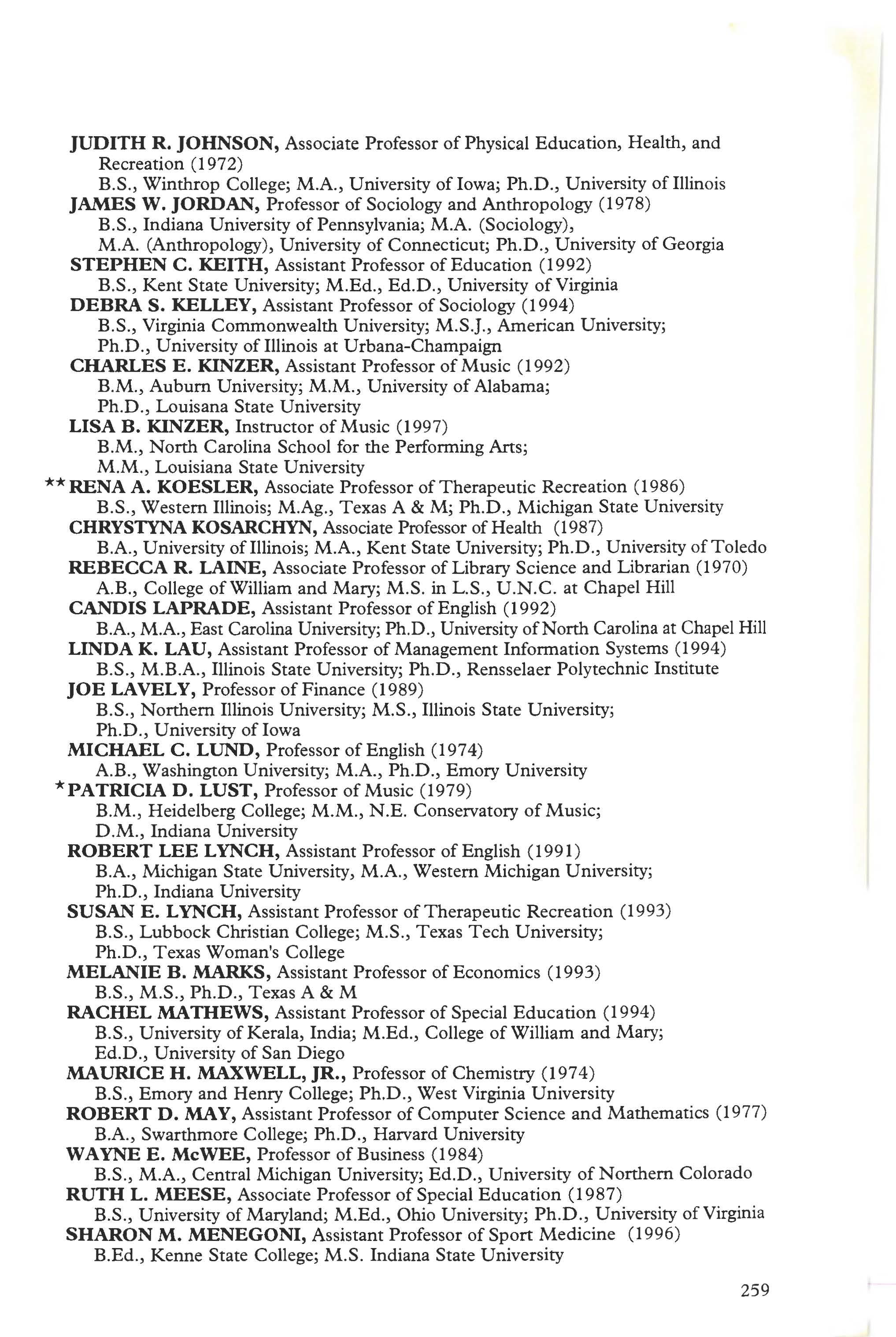
CHARLES E. KINZER, Assistant Professor of Music (1992) B.M., Auburn University; M .M., University of Alabama; Ph.D., Louisana State University
LISA B. KINZER, Instructor of Music (1997) B .M., North Carolina School for the Performing Arts; M.M., Louisiana State University
** RENA A. KOESLER, Associate Professor of Therapeutic Recreation (1986) B.S., Western Illinois; M.Ag., Texas A & M; Ph.D., Michigan State University CHRYSTYNA KOSARCHYN, Associate Professor of Health (1987) B.A., University of Illinois; M.A., Kent State University; Ph.D., University of Toledo
REBECCA R. LAINE, Associate Professor of Library Science and Librarian (1970) A.B., College of William and Mary; M.S. in L.S., U.N.C. at Chapel Hill
CANDIS LAPRADE, Assistant Professor of English (1992) B.A., M.A., East Carolina University; Ph.D., University of North Carolina at Chapel Hill
LINDA K. LAU, Assistant Professor of Management Information Systems (1994) B.S., M.B.A., Illinois State University; Ph.D., Rensselaer Polytechnic Institute
JOE LAVELY, Professor of Finance (1989) B.S., Northern Illinois University; M.S., Illinois State University; Ph.D., University of Iowa
MICHAEL C. LUND, Professor of English (1974) A.B., Washington University; M.A., Ph.D., Emory University
*PATRICIA D. LUST, Professor of Music (1979) B M., Heidelberg College; M.M., N.E. Conservatory of Music; D.M., Indiana University
ROBERT LEE LYNCH, Assistant Professor of English (1991) B.A., Michigan State University, M.A., Western Michigan University; Ph.D., Indiana University
SUSAN E. LYNCH, Assistant Professor of Therapeutic Recreation (1993) B.S., Lubbock Christian College; M.S., Texas Tech University; Ph.D., Texas Woman's College
MELANIE B. MARKS, Assistant Professor of Economics (1993) B.S., M.S., Ph.D., Texas A & M
RACHEL MATHEWS, Assistant Professor of Special Education (1994) B.S , University of Kerala, India; M.Ed., College of William and Mary; Ed.D , University of San Diego
MAURICE H. MAXWELL, JR., Professor of Chemistry (1974) B.S., Emory and Henry College; Ph.D., West Virginia University
ROBERT D. MAY, Assistant Professor of Computer Science and Mathematics (1977) B A., Swarthmore College; Ph.D., Harvard University
WAYNE E. Mc WEE, Professor of Business (1984) B.S., M.A., Central Michigan University; Ed.D., University of Northern Colorado
RUTH L. MEESE, Associate Professor of Special Education (1987) B.S., University of Maryland; M.Ed., Ohio University; Ph.D., University of Virginia
SHARON M. MENEGONI, Assistant Professor of Sport Medicine (1996) B.Ed., Kenne State College; M S. Indiana State University
DONALD A. MERKLE, Associate Professor of Biology and Area Coordinator for Pre-Professionals (1975) B.S., M.S., University of Dayton; Ph.D., Miami University
WAYNE K. MESHEJIAN, Assistant Professor of Physics and Area Coordinator of Physics (1968) B.S., Samford University; M.S., Virginia Polytechnic Institute & State University
GILBERT J. MILLAR, Professor of History and Political Science (I 970) B.A., Southeastern Louisiana College; M.A., Ph.D., Louisiana State University
W. BRUCE MONTGOMERY, Professor of Music (1970) B.A., Milligan College; M.Ed., College of William and Mary; Ph.D., Florida State University
FRANCIS X. MOORE, III, Associate Professor of French and Director of Instructional Technology (1989) B.A., University of Vermont; M.A., Hofstra University; Ph.D., Pennsylvania State University
PAUL V. MORIARTY, Instructor of Philosophy (1997) B.A., University of Virginia
VALERIE N. MORPHEW, Assistant Professor of Education and Science (1996) B.S., The University of West Florida; M.A.Ed., Virginia Polytechnic Institute and State University; Ed.D., West Virginia University
JAMES R. MUNSON, Assistant Professor of History (1992) B.A., New College; M.A., M. Phil., Ph.D ., Columbia University
NELSON D. NEAL, Professor and Area Coordinator of Dance Program (1978) B.S., State University of New York, Cortland; M.S., University of Wisconsin; Ed.D., University of Virginia
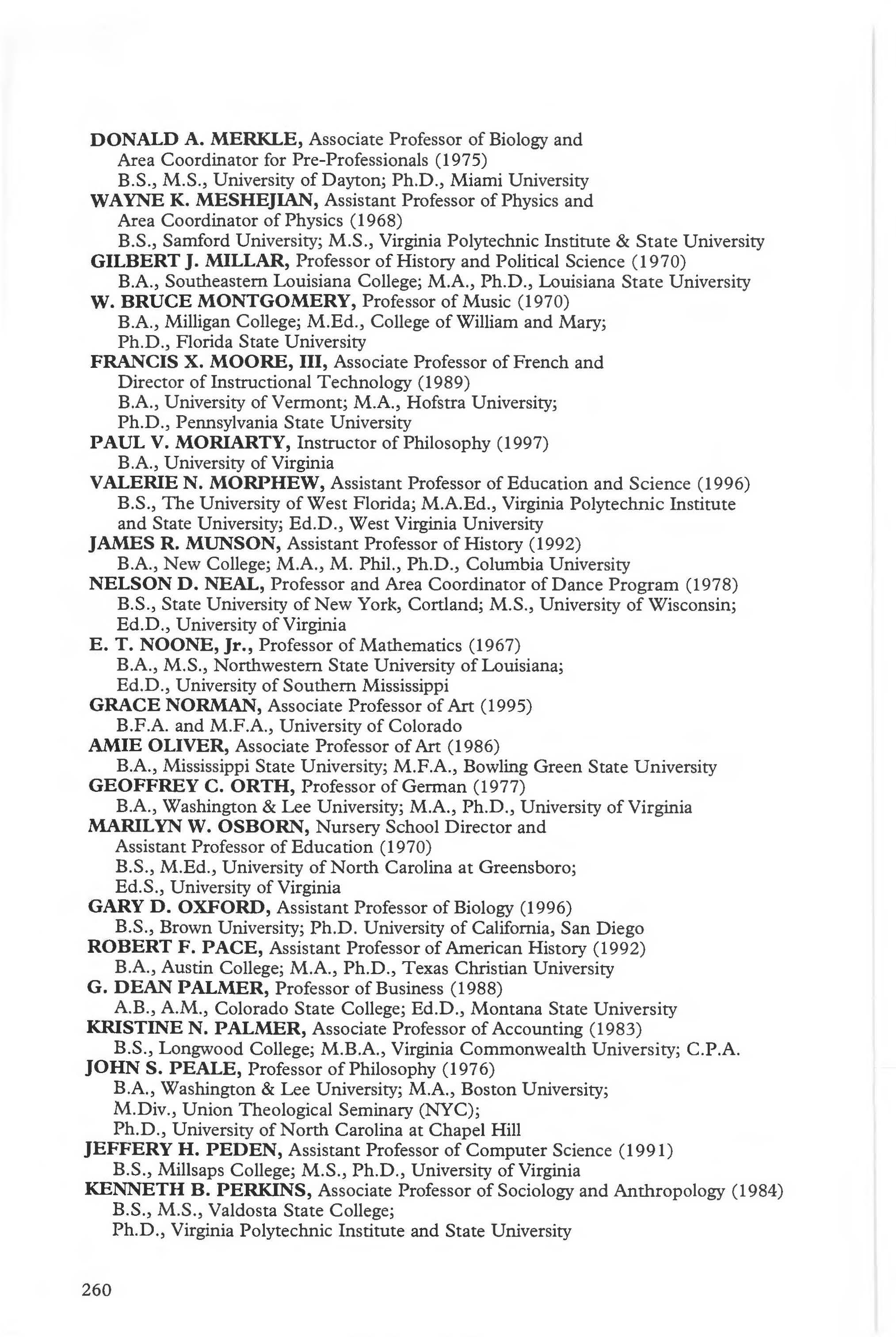
E. T. NOONE, Jr., Professor of Mathematics (1967) B.A., M.S., Northwestern State University of Louisiana; Ed.D., University of Southern Mississippi
GRACE NORMAN, Associate Professor of Art (1995) B.F.A. and M.F.A., University of Colorado
AMIE OLIVER, Associate Professor of Art (1986) B.A., Mississippi State University; M.F.A., Bowling Green State University
GEOFFREY C. ORTH, Professor of German (1977) B.A., Washington & Lee University; M.A., Ph.D., University of Virginia
MARILYN W. OSBORN, Nursery School Director and Assistant Professor of Education (1970) B.S., M.Ed., University of North Carolina at Greensboro; Ed.S., University of Virginia
GARY D. OXFORD, Assistant Professor of Biology (1996) B.S., Brown University; Ph.D. University of California, San Diego
ROBERT F. PACE, Assistant Professor of American History (1992) B.A., Austin College; M.A., Ph.D., Texas Christian University
G. DEAN PALMER, Professor of Business (1988) A.B., A.M., Colorado State College; Ed D., Montana State University
KRISTINE N. PALMER, Associate Professor of Accounting (1983) B.S., Longwood College; M.B.A., Virginia Commonwealth University; C.P.A. JOHN S. PEALE, Professor of Philosophy (197 6) B.A., Washington & Lee University; M.A., Boston University; M.Div., Union Theological Seminary (NYC); Ph.D., University of North Carolina at Chapel Hill
JEFFERY H. PEDEN, Assistant Professor of Computer Science (1991) B.S., Millsaps College; M.S., Ph.D., University of Virginia
KENNETH B. PERKINS, Associate Professor of Sociology and Anthropology (1984) B.S., M.S., Valdosta State College; Ph.D., Virginia Polytechnic Institute and State University
DAVID T. PETERSON, Instructor of Military Science (1997)
DARRYL G. POOLE, Associate Professor of Sociology (1992) B.S., M.A., Ball State University; Ph.D., University of Florida
RITA PURCELL-ROBERTSON, Instructor of Speech, Language Pathology, and Audiology (1996)
B.S ., James Madison University; M.S., Pennsylvania State University
MAN YING M. QIU, Assistant Professor of Management (1994) B.S. Central Wesleyan College; M.S., Ph.D., Clemson University
TERRI H. RAMSEY, Instructor of Speech-Language Pathology, and Audiology (1996) B.A. and M.Ed., University of Virginia
EIKE REICH, Associate Professor of Chemistry (1991) Undergraduate Degree Friedrich-Schiller University; Ph.D, Humboldt University
JOHN F. REYNOLDS, Professor of Modem Languages and Director of International Studies (1987) B.A., M.A., Tufts University; Ph.D., University of Virginia
**GORDON L. RING, Associate Professor of Music (1989) B.M.E., B.M., Central Missouri State University; M.M. and D Mus.A., North Texas State University
BILLIE F. RISACHER, Assistant Professor of Mathematics (1997) B.A, University of Massachusetts; M.Ed. and Ph.D., University of Delaware
CHARLES D. ROSS, Assistant Professor of Physics and Program Director for Pre-Engineering Programs (1992) B.S., M.S., and Ph.D., University of Virginia

JOYCE ROWE, Associate Professor of Management Information Systems (1993) B.S., M . S ., Ph.D., Virginia Commonwealth University
MARVIN W. SCOTT, Professor of Biology (1966) B.S., Hampden-Sydney College; Ph.D., Virginia Polytechnic Institute & State University
JAMES A. SECPANSKY, Instructor of Experimental Psychology (1997) B.A., Shippensburg University of Pennsylvania; M.A., Kent State University
ELLERY SEDGWICK, Professor and Chair of the Department of English, Philosophy and Modem Languages (1979) B.A., Harvard University; M A.T., Columbia Teachers College; Ph.D., Boston University
PATRICIA A. SHANK, Associate Professor of Therapeutic Recreation and Area Coordinator (1988) B.S., Southern Illinois University; M.A., Ph.D., New York University **SUE 0. SHAW, Professor of Economics (1986) B.A., Mary Washington College; A.M., Ph.D., Harvard University
BETTY JO SIMMONS, Professor of Education (1966) B.A., M.S.Ed., Longwood College; Ed.D., College of William and Mary EDWARD D. SMITH, Professor of Psychology (1971) B.A., Heidelberg College; M.A., University of Hawaii; Ph.D., Kent State University
J. DAVID SMITH, Dean of the School of Education and Human Services and Professor of Education (1997) B.S. and M.S., Virginia Commonwealth University; M.Ed., and Ed.D., Columbia University
MAURICE P. SNELLER, Professor of History (1960) B.A., M.A., Ph D., University of Virginia
HOMER L. SPRINGER, JR., Professor of Art (1969) B.F.A., Richmond Professional Institute; M.Ed., Towson State College
DAVID B. STEIN, Associate Professor of Psychology (1976) B.A., Brooklyn College; M.S., Ph.D., Virginia Commonwealth University
MASSIE C. STINSON, Associate Professor of English (1973) B.A., M.A., University of Richmond; Ph.D., University of South Carolina
CATHERINE G. STIVERS, Associate Professor of Health, Physical Education and Recreation (1994)
B.S., Bridgewater College; M.S., Indiana State University; Ph.D., Southern Illinois University
GEORGE C. STONIKINIS, JR., Associate Professor and Area Coordinator of Social Work (1970) B.S., M.S., Virginia Polytechnic Institute & State University; M.S.W., Virginia Commonwealth University
SHARON S. STONNELL, Assistant Professor of Mathematics (I 992) B.S., M.S., Southwest Texas State University; Ph D ., University of North Texas
IBRAHIM M. STWODAH, Assistant Professor of Library Science and Librarian (1981) B.A., Kabul University; M .L.S., Indiana University
PEGGY L. TARPLEY, Assistant Professor of Special Education (1995) A.B., The University of Michigan, M.A., Ph.D., University of Virginia
LINDA R. TENNISON, Assistant Professor and Acting Chair of Department of Psychology (1992) B.A., M.S., Western Washington University; Ph.D., Washington State University
CAMILLA C. TINNELL, Instructor of English (1970) B.A., M.S., Radford College
WAYNE H. TINNELL, Professor of Biology (1969) B.S., M.S., Ph.D., Virginia Polytechnic Institute & State University
LEHLOHONOLO TLOU, Assistant Professor of Political Science ( 1995) B.A., Luther College; M.A. and Ph.D., University of Virginia
M. KENT TODD, Associate Professor of Health and Physical Education (1996) B.S., M.S. Ed., James Madison University; Ph.D , University of North Carolina at Greensboro
DONALD L. TROTT, Associate Professor and Chair of the Department of Music (1988) B.M .E., Westminister Choir College; M.M. and D.Mus.A., University of Oklahoma
ARTHUR GORDON VAN NESS, III, Associate Professor of English (1987) B.A., Hampden-Sydney College; M.A., University of Richmond; Ph.D., University of South Carolina
NANCY H. VICK, Professor of Education (1972) B.S., East Carolina University; M.Ed., College of William and Mary; Ed.D., Indiana University
ROBERT P. WEBBER, Professor of Mathematics and Computer Science (1972) B.A., University of Richmond; M.S., Stephen F. Austin State College; Ph.D., University of Tennessee
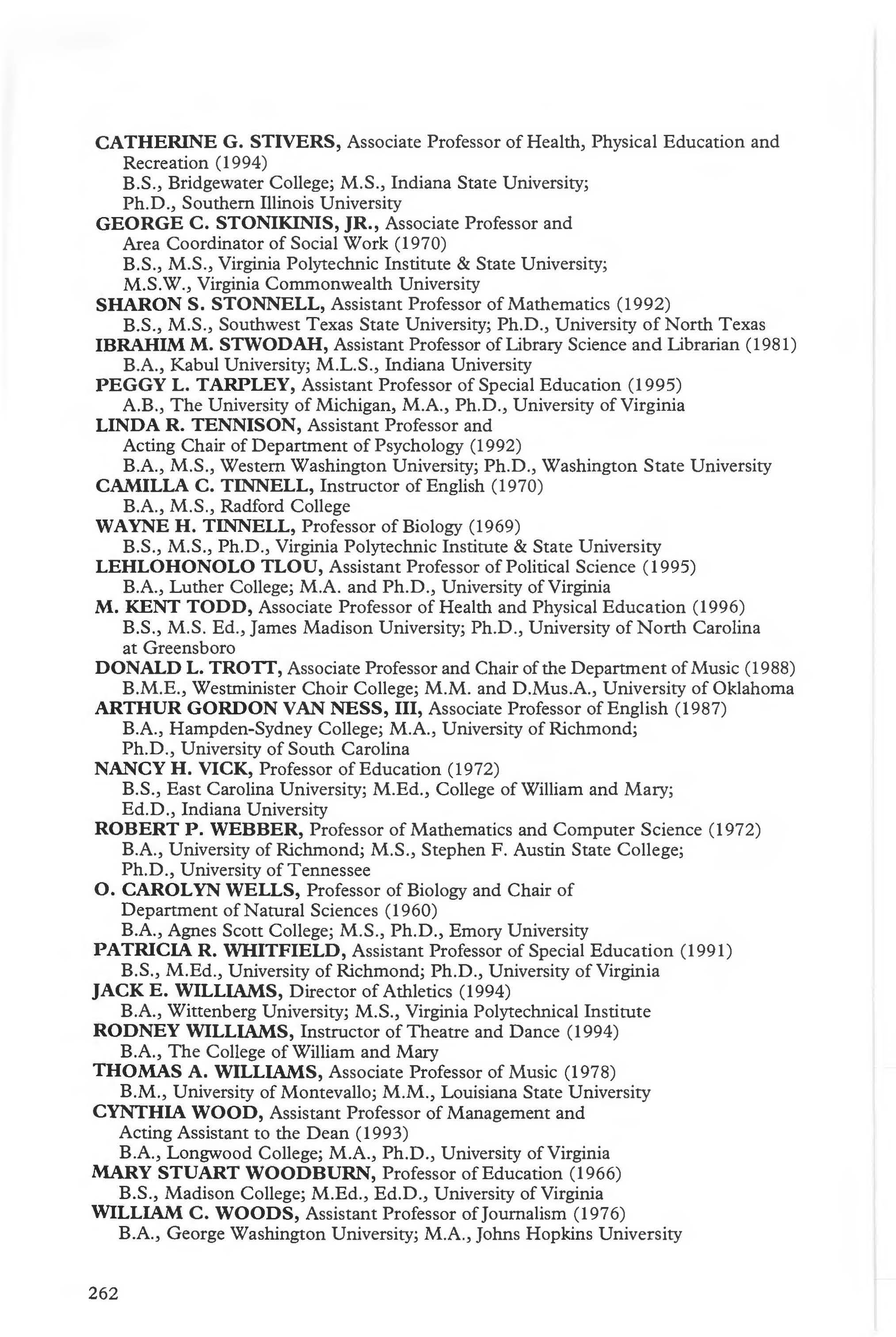
0. CAROLYN WELLS, Professor of Biology and Chair of Department of Natural Sciences (1960) B.A., Agnes Scott College; M.S ., Ph.D., Emory University
PATRICIA R. WHITFIELD, Assistant Professor of Special Education (1991) B.S., M.Ed., University of Richmond; Ph.D., University of Virginia
JACK E. WILLIAMS, Director of Athletics (1994) B.A. , Wittenberg University; M.S., Virginia Polytechnical Institute
RODNEY WILLIAMS, Instructor of Theatre and Dance (1994) B.A., The College of William and Mary
THOMAS A. WILLIAMS, Associate Professor of Music (1978) B.M., University of Montevallo; M.M., Louisiana State University
CYNTHIA WOOD, Assistant Professor of Management and Acting Assistant to the Dean (1993) B .A., Longwood College; M.A., Ph.D., University of Virginia
MARY STUART WOODBURN, Professor of Education (1966) B.S., Madison College; M.Ed., Ed.D., University of Virginia
WILLIAM C. WOODS, Assistant Professor ofJournalism (1976) B.A., George Washington University; M.A., Johns Hopkins University
ROBERTS. WU, Associate Professor of Mathematics (1965) B.S., Illinois Institute of Technology; M.S., DePaul University; Ph.D., University of Northern Colorado SARAH V. YOUNG, Associate Professor of Social Work and Director of Womens Studies ( 1971) A.B., Greensboro College; M.S.W., University of North Carolina at Chapel Hill; Ph.D., Florida State University
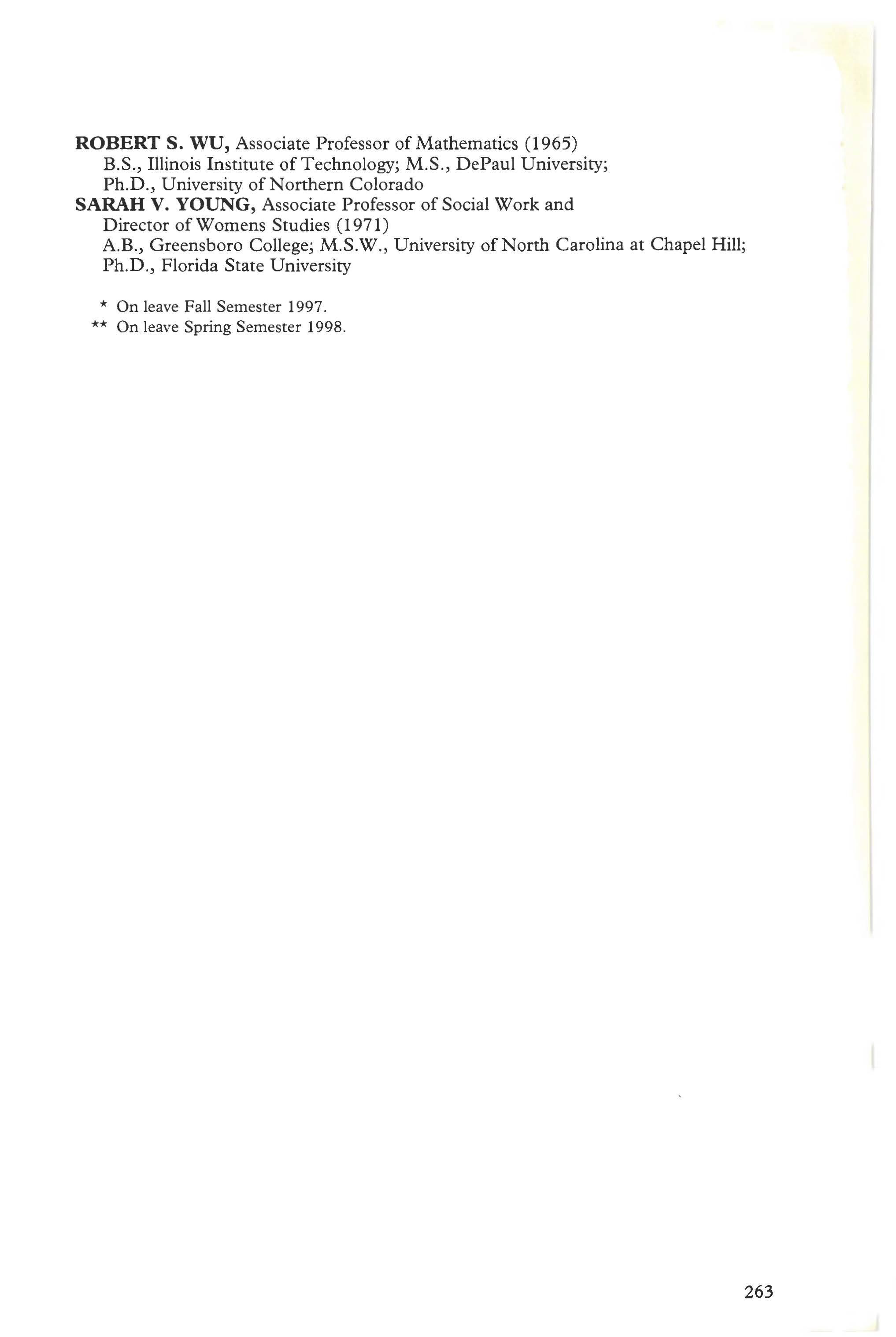
* On leave Fall Semester 1997.
** On leave Spring Semester 1998.
MERRY LEWIS ALLEN, Associate Professor Emerita of Mathematics
ELEANOR W. BOBBITT, Professor Emerita of Health & Physical Education
JOHN E. CARR, III, Professor Emeritus of Business
KATHLEEN G. COVER, Professor Emerita of Sociology
GEORGE P. ELLIOTT, Professor Emeritus of Education
ELIZABETH W. ETHERIDGE, Board of Visitors Distinguished Professor and Professor Emerita of History
L. RAYMOND FAWCETT, JR., Associate Professor Emeritus of Physics WILLIAM L. FRANK, Professor Emeritus of English ROBERT D. GIBBONS, Professor Emeritus of Education GERALD P. GRAHAM, Professor Emeritus of Health and Physical Education
FRANCES N. HAMLETT, Associate Professor Emerita of Business DARRELL G. HARBAUM, Associate Professor Emeritus of Music
ALTON M. HARVILL, JR., Professor Emeritus of Biology RICHARD L. HEINEMANN, Associate Professor Emeritus of Biology
MARY A. HEINTZ, Professor Emerita of Physical Education
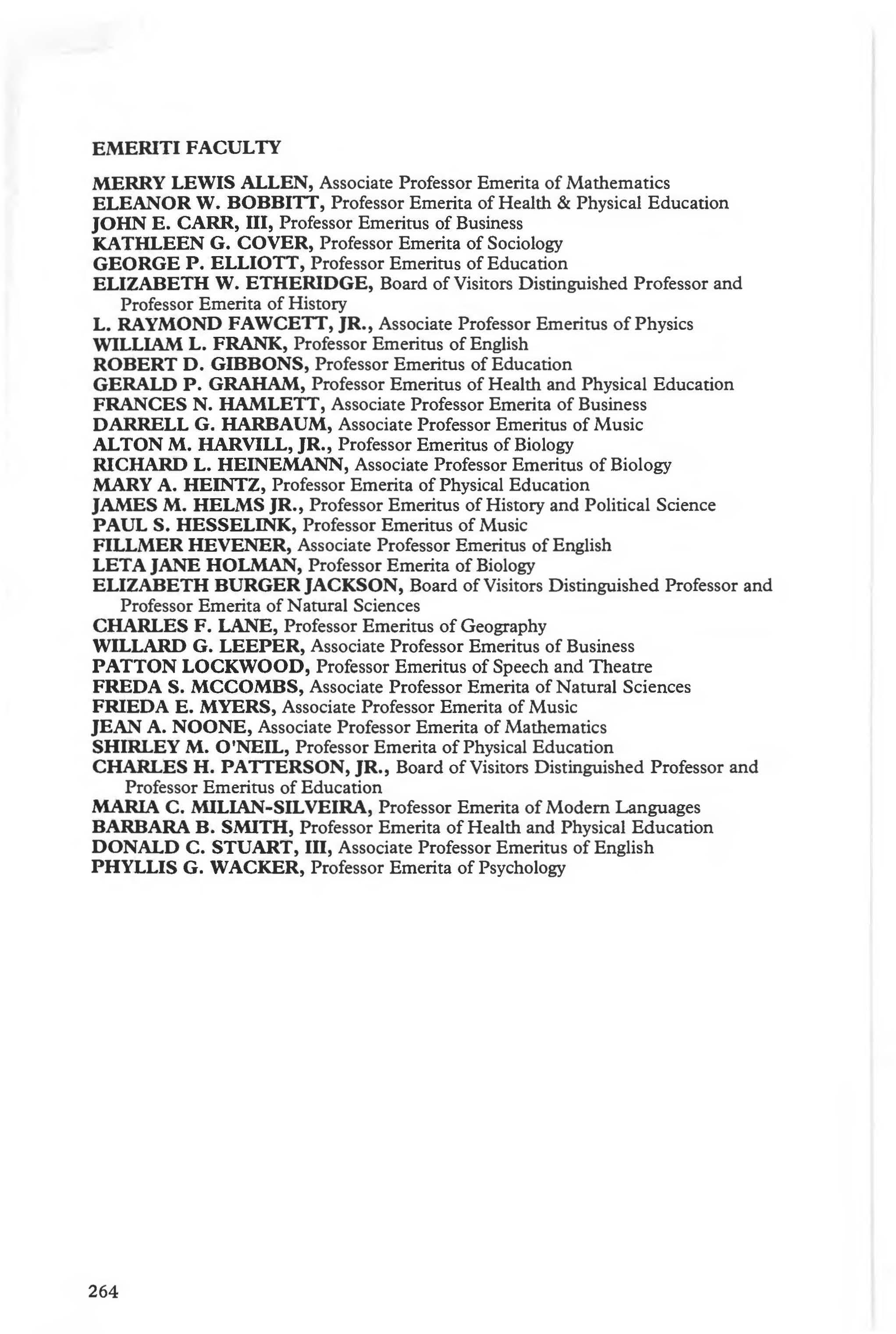
JAMES M. HELMS JR., Professor Emeritus of History and Political Science
PAULS. HESSELINK, Professor Emeritus of Music
FILLMER HEVENER, Associate Professor Emeritus of English
LETA JANE HOLMAN, Professor Emerita of Biology
ELIZABETH BURGER JACKSON, Board of Visitors Distinguished Professor and Professor Emerita of Natural Sciences
CHARLES F. LANE, Professor Emeritus of Geography
WILLARD G. LEEPER, Associate Professor Emeritus of Business
PATTON LOCKWOOD, Professor Emeritus of Speech and Theatre
FREDA S. MCCOMBS, Associate Professor Emerita of Natural Sciences
FRIEDA E. MYERS, Associate Professor Emerita of Music
JEAN A. NOONE, Associate Professor Emerita of Mathematics SHIRLEY M. O'NEIL, Professor Emerita of Physical Education
CHARLES H. PATTERSON, JR., Board of Visitors Distinguished Professor and Professor Emeritus of Education
MARIA C. MILIAN-SILVEIRA, Professor Emerita of Modem Languages
BARBARA B. SMITH, Professor Emerita of Health and Physical Education
DONALD C. STUART, III, Associate Professor Emeritus of English PHYLLIS G. WACKER, Professor Emerita of Psychology
Academic Advising 41-42
Academic Clilendar 4 Academic Honors .46, 59 Academic Organization .41 Academic Probation & Suspension . . . ... . .. . ..... 47-48
Academic Programs of Study ... .... 54
Academic Progress Satisfactory .. ... 24 Academic Regulations 41-52 Academic Requirements 57-59
Academic Schools, Department & Programs 70 Accounting Courses 81-82 Accounting & Management Information Systems, Program .. .. 7 4 Accreditation ......... . .. ..... . . 1 Activities, Student 34-35 Add Period . .. .... . ... ... . . . .. .43 Administration 6
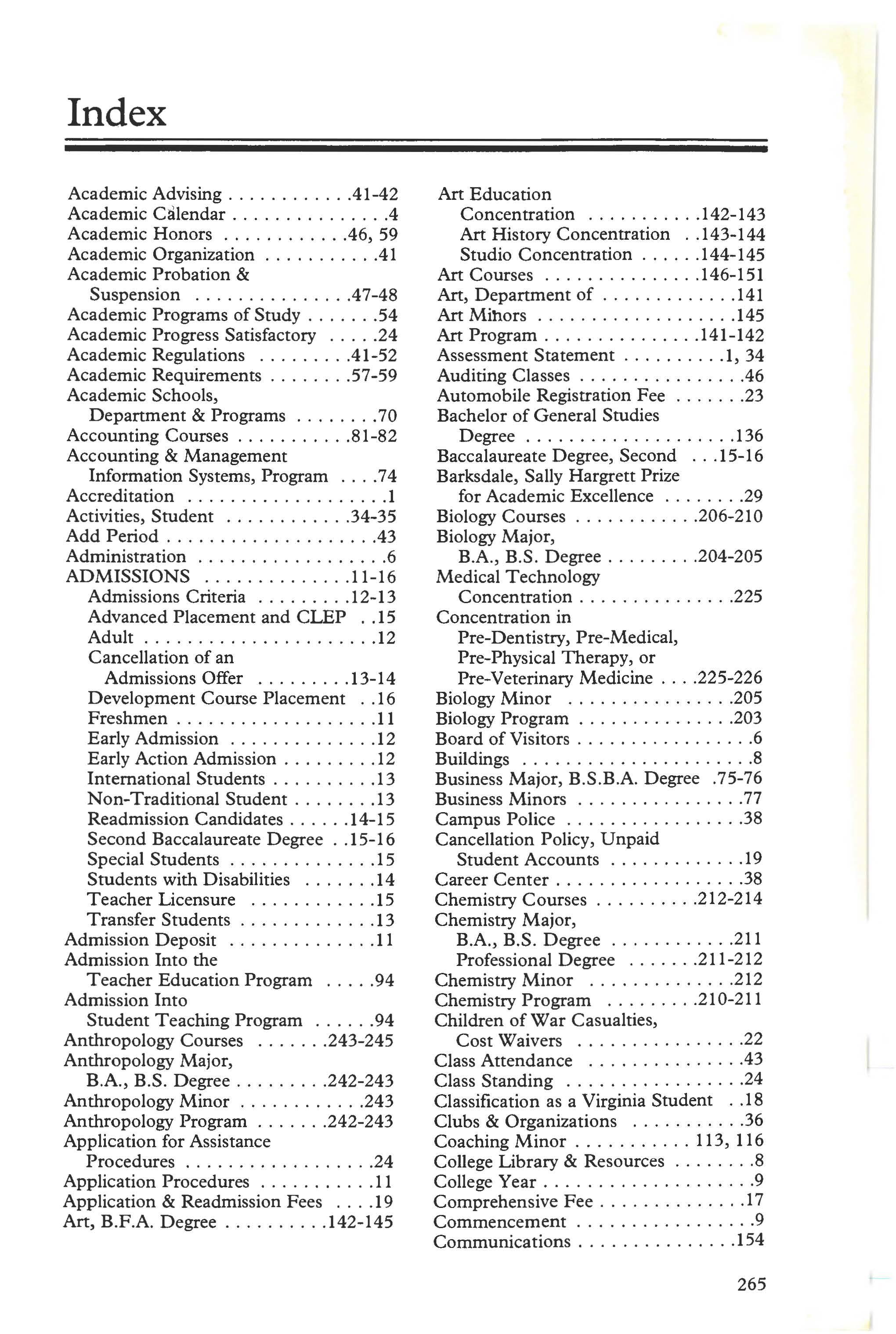
ADMISSIONS 11-16
Admissions Criteria 12-13 Advanced Placement and CLEP 15 Adult 12 Cancellation of an Admissions Offer 13-14 Development Course Placement 16 Freshmen .............. .. .. . 11 Early Admission ......... .... . 12 Early Action Admission 12 International Students ......... . 13 Non-Traditional Student .. ...... 13 Readmission Candidates 14-15 Second Baccalaureate Degree 15-16 Special Students 15 Students with Disabilities . . . ... . 14 Teacher Licensure 15 Transfer Students ...... ....... 13 Admission Deposit ....... .. . ... . 11
Admission Into the Teacher Education Program 94 Admission Into Student Teaching Program 94 Anthropology Courses 243-245 Anthropology Major, B.A., B.S. Degree 242-243 Anthropology Minor ..... . ..... .243 Anthropology Program ....... 242-243 Application for Assistance Procedures 24
Application Procedures 11 Application & Readmission Fees 19 Art, B F.A. Degree 142-145
Art Education Concentration 142-143 Art History Concentration 143-144 Studio Concentration 144-145 Art Courses 146-151 Art, Department of . .. .. ...... .. 141 Art Mihors . . . . . . .. . ... .. ... . . 145 Art Program . .... .. ........ 141-142 Assessment Statement . 1, 34 Auditing Classes .46 Automobile Registration Fee 23 Bachelor of General Studies Degree 136 Baccalaureate Degree, Second ... 15-16 Barksdale, Sally Hargrett Prize for Academic Excellence ...... . .29 Biology Courses . . . .. . ...... 206-210 Biology Major, B.A , B S Degree 204-205 Medical Technology Concentration 225 Concentration in Pre-Dentistry, Pre-Medical, Pre-Physical Therapy, or Pre-Veterinary Medicine 225-226 Biology Minor 205 Biology Program 203 Board of Visitors 6 Buildings . .... ... ... . . . . ... .. . .8 Business Major, B .S.B.A. Degree .75-76 Business Minors . .. . . .... ... . . .. 77 Campus Police .. .... ... ...... . .38 Cancellation Policy, Unpaid Student Accounts 19 Career Center 38 Chemistry Courses 212-214 Chemistry Major, B.A., B.S . Degree 211 Professional Degree ....... 211-212 Chemistry Minor ... ... . ... . . .. 212 Chemistry Program ... ...... 210-211 Children of War Casualties, Cost Waivers . . .. . ...... ... . .22 Class Attendance .43 Class Standing . . .. ............ .24 Classification as a Virginia Student 18 Clubs & Organizations ........... 36 Coaching Minor .. ......... 113, 116 College Library & Resources ....... .8 College Year . . . . . . .. . . ...... .. . .9
Comprehensive Fee .. ... ... .. .... 17 Commencement . . . .. . . .. ... .. .. .9 Communications . ... ... ... ... . . 154
Commuter Students . . .. . . . . ..... 34 Fees .... ........ ..... .. . . .. 17
Computer Science Courses .... 188-191
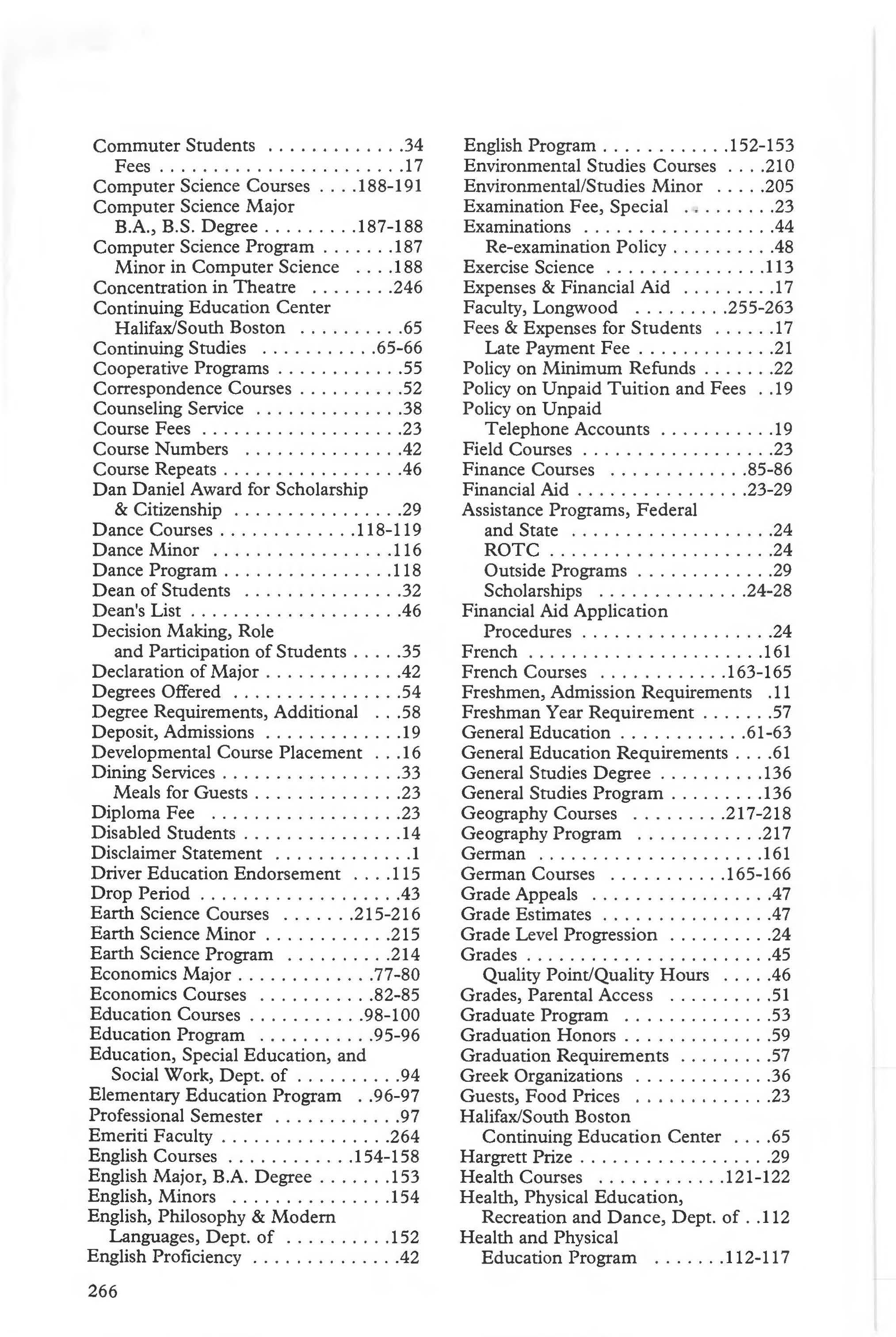
Computer Science Major B.A., B S. Degree 187-188
Computer Science Program 187 Minor in Computer Science 188
Concentration in Theatre . . . .... . 246
Continuing Education Center Halifax/South Boston 65
Continuing Studies . . . . . ... . . . 65-66
Cooperative Programs 55
Correspondence Courses 52
Counseling Service 38
Course Fees 23
Course Numbers . ... . . ... . ... . .42 Course Repeats ... ........ . . . . . .46
Dan Daniel Award for Scholarship & Citizenship ... . . .... . .. .... 29
Dance Courses .... ........ . 118-119
Dance Minor 116 Dance Program 118
Dean of Students . . . ...... . ... .. 32 Dean's List .46
Decision Making, Role and Participation of Students 35
Declaration of Major 42 Degrees Offered 54
Degree Requirements, Additional 58 Deposit, Admissions 19 Developmental Course Placement . .. 16 Dining Services .. . . ..... . ....... 33 Meals for Guests ......... .. . . .23
Diploma Fee .. ... . . ... . ... .. . . 23
Disabled Students 14 Disclaimer Statement ..... ........ 1
Driver Education Endorsement 115
Drop Period 43
Earth Science Courses 215-216
Earth Science Minor 215 Earth Science Program 214
Economics Major . ... . ... .. .. .77-80 Economics Courses ... ... .. ... 82-85 Education Courses .. . .. .. .... 98-100 Education Program ..... ... ... 95-96
Education, Special Education, and Social Work, Dept. of . . . ...... . 94 Elementary Education Program 96-97 Professional Semester ..... ... . . . .97
Emeriti Faculty . ..... ... ....... 264
English Courses 154-158
English Major, B.A. Degree .. ..... 153 English, Minors . ...... . . .. . . .. 154 English, Philosophy & Modern Languages, Dept. of .. ........ 152 English Proficiency . . . . . . . . . .. .. .42
English Program .. . .... ... .. 152-153
Environmental Studies Courses .. . .210
Environmental/Studies Minor . . ... 205 Examination Fee, Special 23 Examinations 44 Re-examination Policy 48 Exercise Science 113 Expenses & Financial Aid .. . . . . . . . 17 Faculty, Longwood ... ...... 255-263 Fees & Expenses for Students 17 Late Payment Fee 21 Policy on Minimum Refunds 22 Policy on Unpaid Tuition and Fees 19 Policy on Unpaid Telephone Accounts 19
Field Courses .. . ...... ..... ... .23
Finance Courses . . . ......... .85-86 Financial Aid 23-29 Assistance Programs, Federal and State 24 ROTC 24 Outside Programs .......... ... 29 Scholarships . . ... . . . . .. ... 24-28 Financial Aid Application Procedures 24
French 161 French Courses 163-165 Freshmen, Admission Requirements .11 Freshman Year Requirement 57 General Education . .... . .... . . 61-63 General Education Requirements .... 61 General Studies Degree 136 General Studies Program .. ....... 136 Geography Courses 217-218 Geography Program 217 German 161 German Courses 165-166 Grade Appeals 47 Grade Estimates .... . . ...... .... 47 Grade Level Progression .......... 24 Grades 45
Quality Point/Quality Hours .... .46 Grades, Parental Access 51 Graduate Program . ...... ....... 53 Graduation Honors 59 Graduation Requirements 57 Greek Organizations 36 Guests, Food Prices ...... ....... 23
Halifax/South Boston Continuing Education Center .... 65 Hargrett Prize 29 Health Courses 121-122 Health, Physical Education, Recreation and Dance, Dept. of 112 Health and Physical Education Program 112-117
History Courses ........... . 173-176
History Major, B.A. Degree 171 Historic Preservation Concentration 171-172 Pre-Law Concentration 172 History Program 170-171
History of Longwood College ...... 7-8 History & Political Science, Dept. of . . ......... . . ... . . . 170 Honor Code 9 Honor & Professional Societies 36 Honors Program, Longwood 67-69 Honors Research Program ....... . . 68 Hours Required For Graduation .... 57 Housing .................. . ... 33 Information Center, College 35 Insurance, Student 39 Intercollegiate Athletic Council & Program 37 Intramural & Campus Recreation, Division of .. ..... .. 37 International Students 13
International Studies Program ..... 137 Minor in International Studies 13 7 Japanese Courses 166-16 7 Journalism ................ 152-153 Late Payment Fees .............. 21 Leaming Center 33-34 Liability Insurance 39 Liberal Studies 138-139 Liberal Studies Major 138-139 Liberal Studies Minor ........... 139 Liberal Studies-Special Education Program . ....... . ...... 101-102 Library & Resources ........ ... ... 8 Loan Programs ................. 23 Location 7
Longwood College & Its Programs .... 7 Longwood Profile & Cost Back Cover Longwood Seminar 57 Majors 54
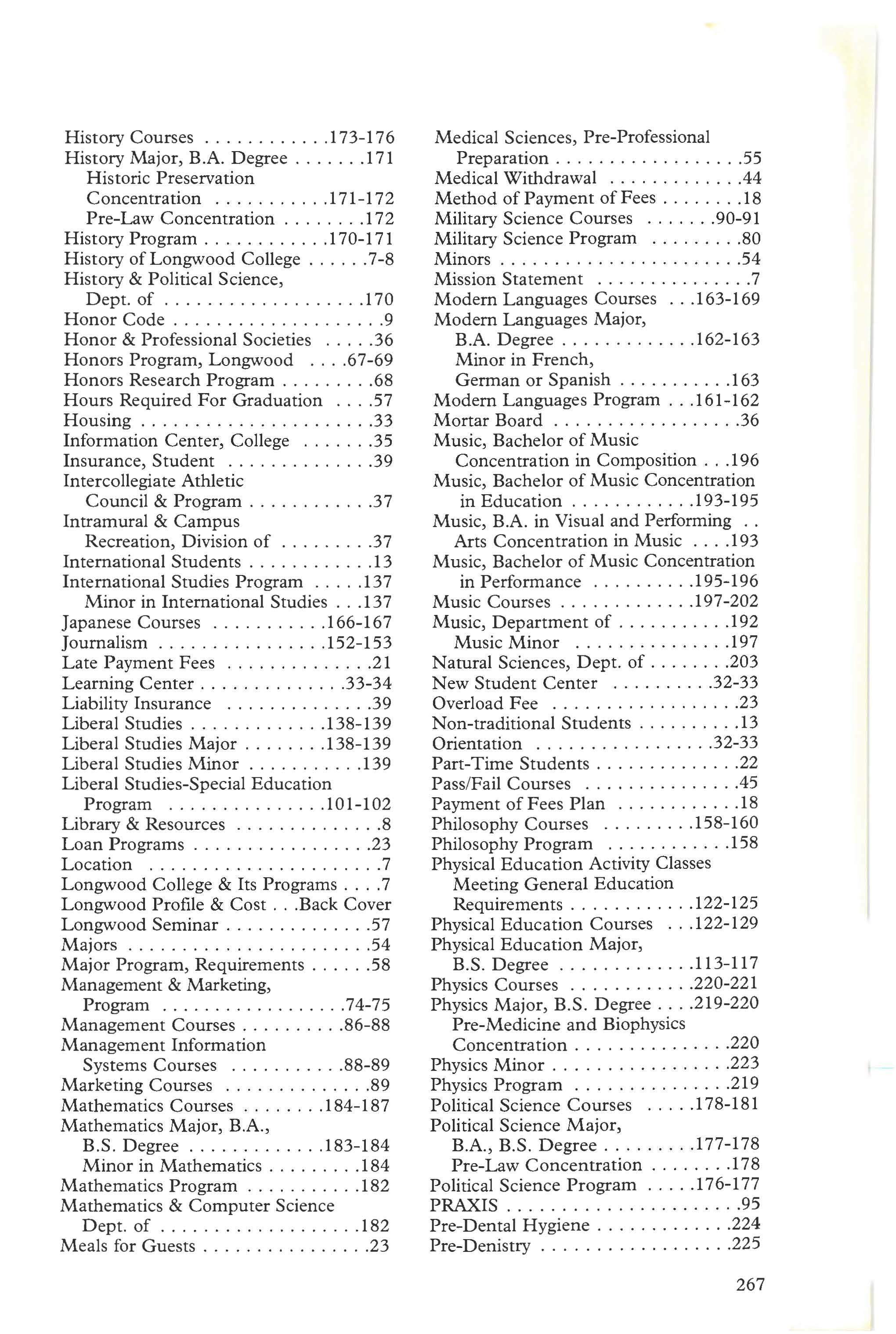
Major Program, Requirements 58 Management & Marketing, Program .................. 74-75 Management Courses 86-88 Management Information Systems Courses ....... ... . 88-89 Marketing Courses ............ .. 89 Mathematics Courses 184-187 Mathematics Major, B.A., B.S . Degree 183-184
Minor in Mathematics 184 Mathematics Program 182 Mathematics & Computer Science Dept of 182 Meals for Guests 23
Medical Sciences, Pre-Professional Preparation ................. . 55 Medical Withdrawal ............ .44 Method of Payment of Fees 18 Military Science Courses 90-91 Military Science Program 80 Minors ....................... 54 Mission Statement ............... 7
Modern Languages Courses ... 163-169 Modern Languages Major, B.A. Degree ..... . .... ... 162-163 Minor in French, German or Spanish ........... 163 Modern Languages Program 161-162 Mortar Board .................. 36 Music, Bachelor of Music Concentration in Composition ... 196 Music, Bachelor of Music Concentration in Education 193-195 Music, B.A. in Visual and Performing Arts Concentration in Music 193 Music, Bachelor of Music Concentration in Performance 195-196 Music Courses ... .......... 197-202 Music, Department of 192 Music Minor 197 Natural Sciences, Dept. of 203 New Student Center .......... 32-33 Overload Fee .................. 23 Non-traditional Students .......... 13 Orientation 32-33 Part-Time Students ....... .. ... .. 22 Pass/ Fail Courses .45 Payment of Fees Plan 18 Philosophy Courses 15 8-160 Philosophy Program 158
Physical Education Activity Classes Meeting General Education Requirements 122-125
Physical Education Courses ... 122-129 Physical Education Major, B.S. Degree .. ..... . ..... 113-117 Physics Courses . .. .. ....... 220-221 Physics Major, B.S. Degree .... 219-220 Pre-Medicine and Biophysics Concentration ............... 220 Physics Minor 223 Physics Program ............... 219
Political Science Courses 178-181 Political Science Major, B.A., B.S. Degree 177-178 Pre-Law Concentration ........ 178 Political Science Program ..... 17 6-177 PRAXIS 95 Pre-Dental Hygiene 224 Pre-Denistry 225 267
Pre-Engineering Cooperative Program .... .. . . ............ 55
Pre-Engineering Dual Degree Program . ... .. ..... .. 222
Pre-Engineering 3 plus 2 Requirements .... .. ...... 222-223
Pre-Medical Curriculum 227
Pre-Medical Technology 226
Pre-Occuptional Therapy ........ 224
Pre-Pharmacy ...... .. . . .. .. . .. 226
Pre-Physical Therapy ........... 225
Pre-Professional Program in Natural Sciences 55, 224
Pre-Veterinary Medicine . . ... .... 227 Probation 48
Probation and Suspension Policy 47-48 Programs of Study ...... ..... ... 54
Psychology Courses 230-233 Psychology, Dept. of .. .. ....... . 228
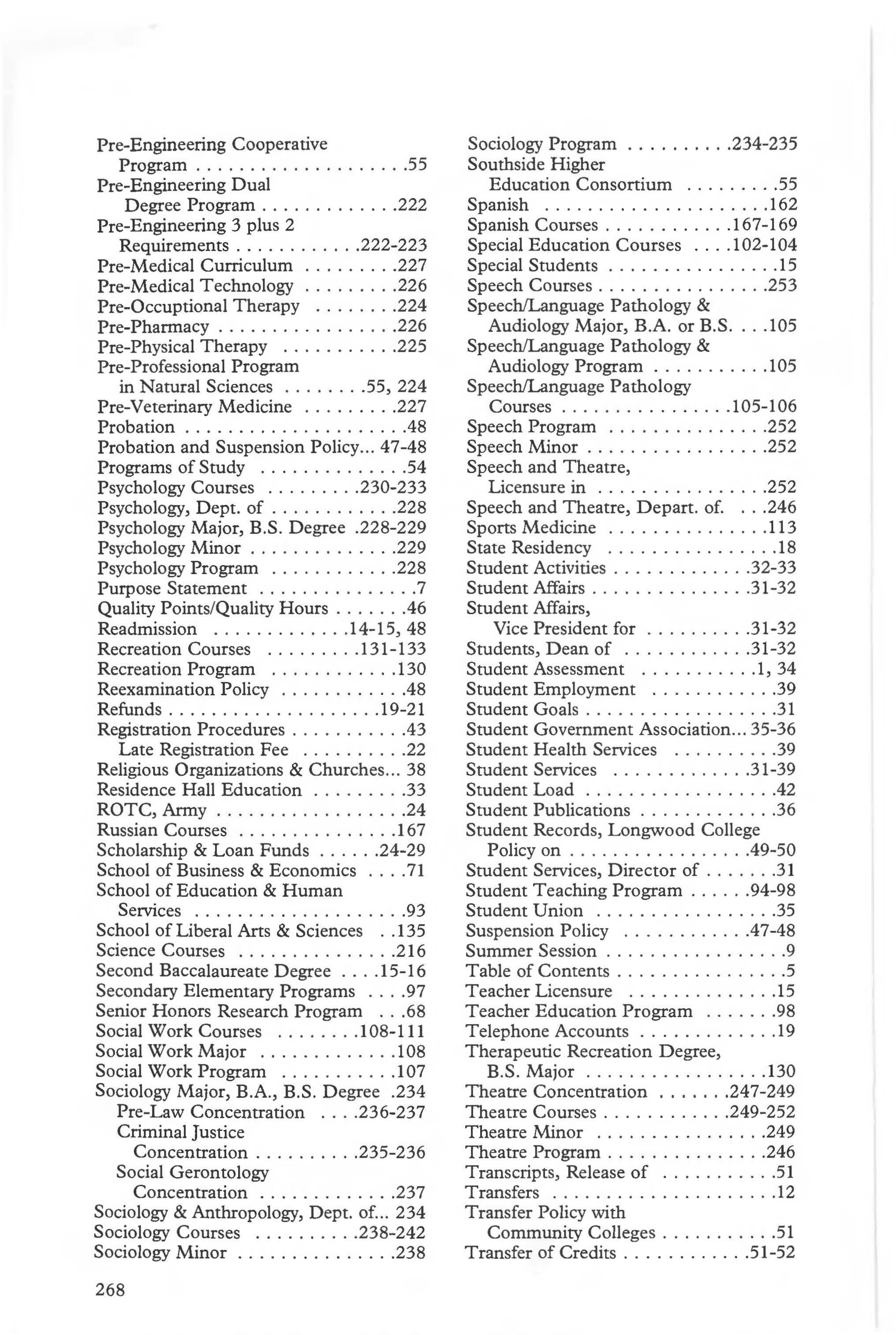
Psychology Major, B.S. Degree .228-229 Psychology Minor 229
Psychology Program ............ 228
Purpose Statement 7
Quality Points/Quality Hours 46 Readmission ............. 14-15, 48
Recreation Courses .. ....... 131-133
Recreation Program 130 Reexamination Policy . ....... .... 48 Refunds 19-21
Registration Procedures 43 Late Registration Fee 22 Religious Organizations & Churches 38 Residence Hall Education ... .... . .33
ROTC, Army . ..... . . . .. . . .... .24
Russian Courses ... ... ... .. . ... 167
Scholarship & Loan Funds . ..... 24-29
School of Business & Economics .... 71
School of Education & Human Services 93
School of Liberal Arts & Sciences 135
Science Courses 216
Second Baccalaureate Degree 15-16
Secondary Elementary Programs 97
Senior Honors Research Program ... 68
Social Work Courses ... .... . 108-111
Social Work Major ............. 108 Social Work Program ........... 107
Sociology Major, B.A., B.S. Degree .234 Pre-Law Concentration 236-237 Criminal Justice Concentration 235-236
Social Gerontology Concentration ............. 237
Sociology & Anthropology, Dept. of... 234
Sociology Courses . ... . . ... . 238-242
Sociology Minor ............... 238
Sociology Program 234-235
Southside Higher Education Consortium 55
Spanish 162 Spanish Courses . ... . ....... 167-169 Special Education Courses .... 102-104 Special Students 15 Speech Courses 253 Speech/Language Pathology & Audiology Major, B.A. or B.S 105 Speech/Language Pathology & Audiology Program . .... ...... 105 Speech/Language Pathology Courses . . . . . . . . . . ..... . 10 5-106
Speech Program ............... 252 Speech Minor 252 Speech and Theatre, Licensure in 252 Speech and Theatre, Depart. of. . .. 246 Sports Medicine . . . . ........... 113 State Residency .... . . ....... ... 18 Student Activities ............. 32-33 Student Affairs 31-32 Student Affairs, Vice President for ... ....... 31-32 Students, Dean of ... ........ .31-32 Student Assessment .. .. ....... 1, 34 Student Employment ......... ... 39 Student Goals 31 Student Government Association 35-36 Student Health Services 39 Student Services 31-39 Student Load .42 Student Publications . . . . ........ .36 Student Records, Longwood College Policy on .... . ......... ... 49-50
Student Services, Director of .... ... 31 Student Teaching Program 94-98 Student Union ................. 35 Suspension Policy 47-48 Summer Session 9 Table of Contents 5 Teacher Licensure 15 Teacher Education Program 98 Telephone Accounts ............. 19
Therapeutic Recreation Degree, B .S. Major ................. 130 Theatre Concentration ....... 24 7-249 Theatre Courses 249-252 Theatre Minor 249 Theatre Program 246 Transcripts, Release of .51 Transfers 12
Transfer Policy with Community Colleges 51 Transfer of Credits .. .......... 51-52
Transfer Students . ... . ........ .. 13 Welcome .......... . .......... .3
Tuition and Fees Unpaid Balances 19 Wellness 38 Tuition, Graduate Students . . .. . . .. 22 Withdrawal Policy 21, 44, 66 VA Plan for Students, Tuition ...... 22 Women' s Studies Program 140 Visual and Performing Arts, Bachelor of Fine Arts Degree ....... 246-249
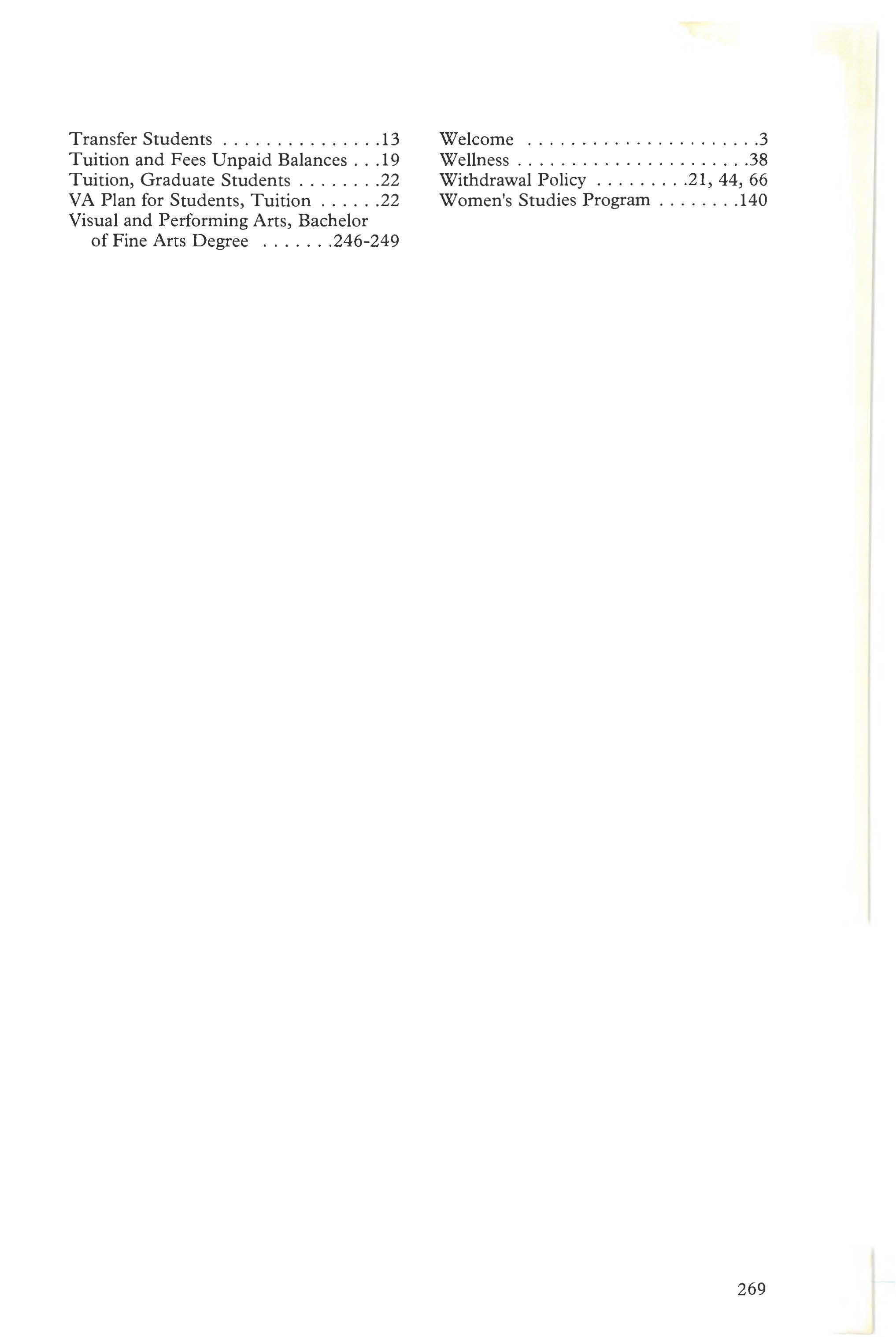




•

